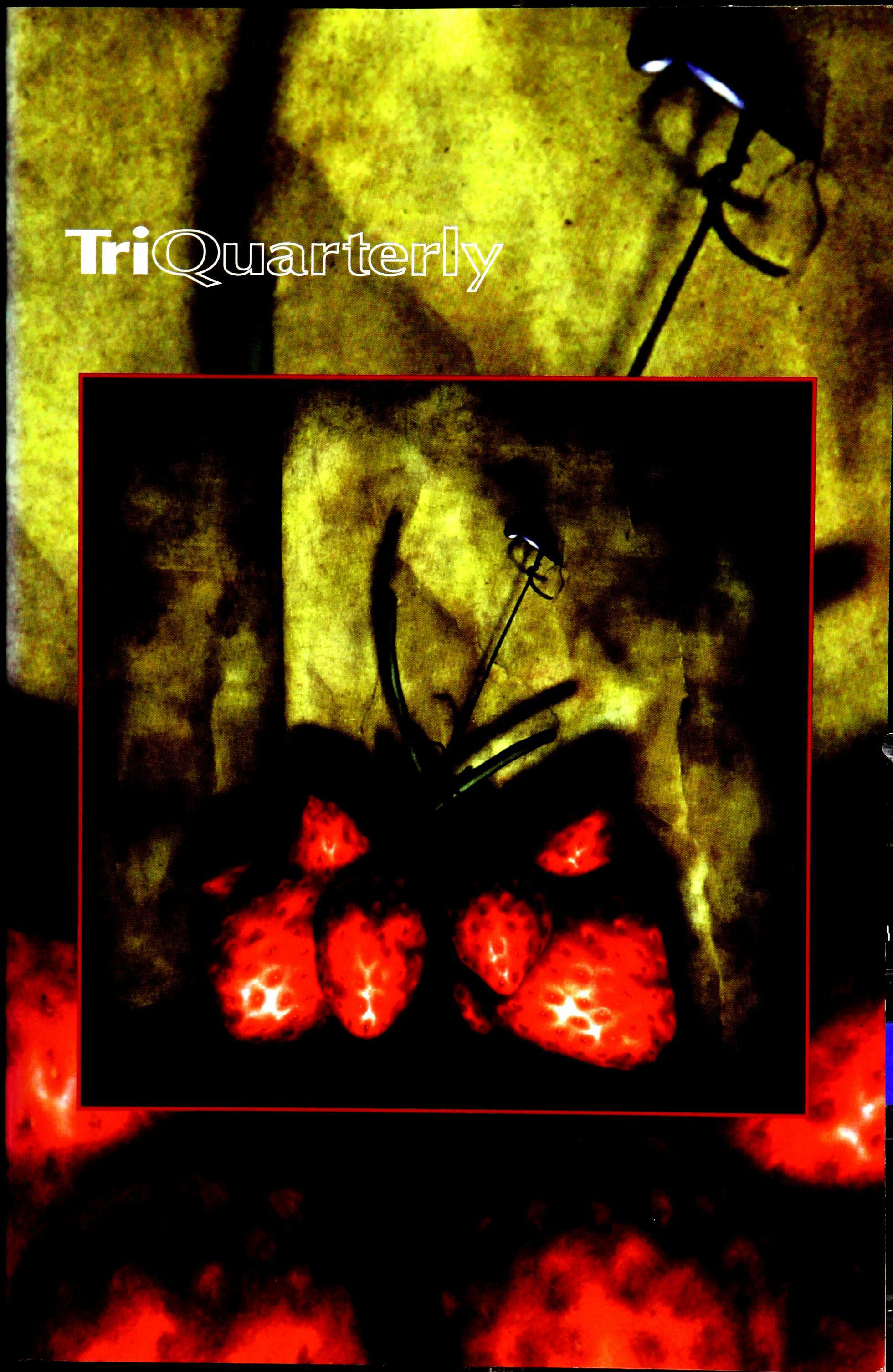

Editor Susan Firestone Hahn
Associate Editor Ian Morris
Production Manager
Bruce Frausto
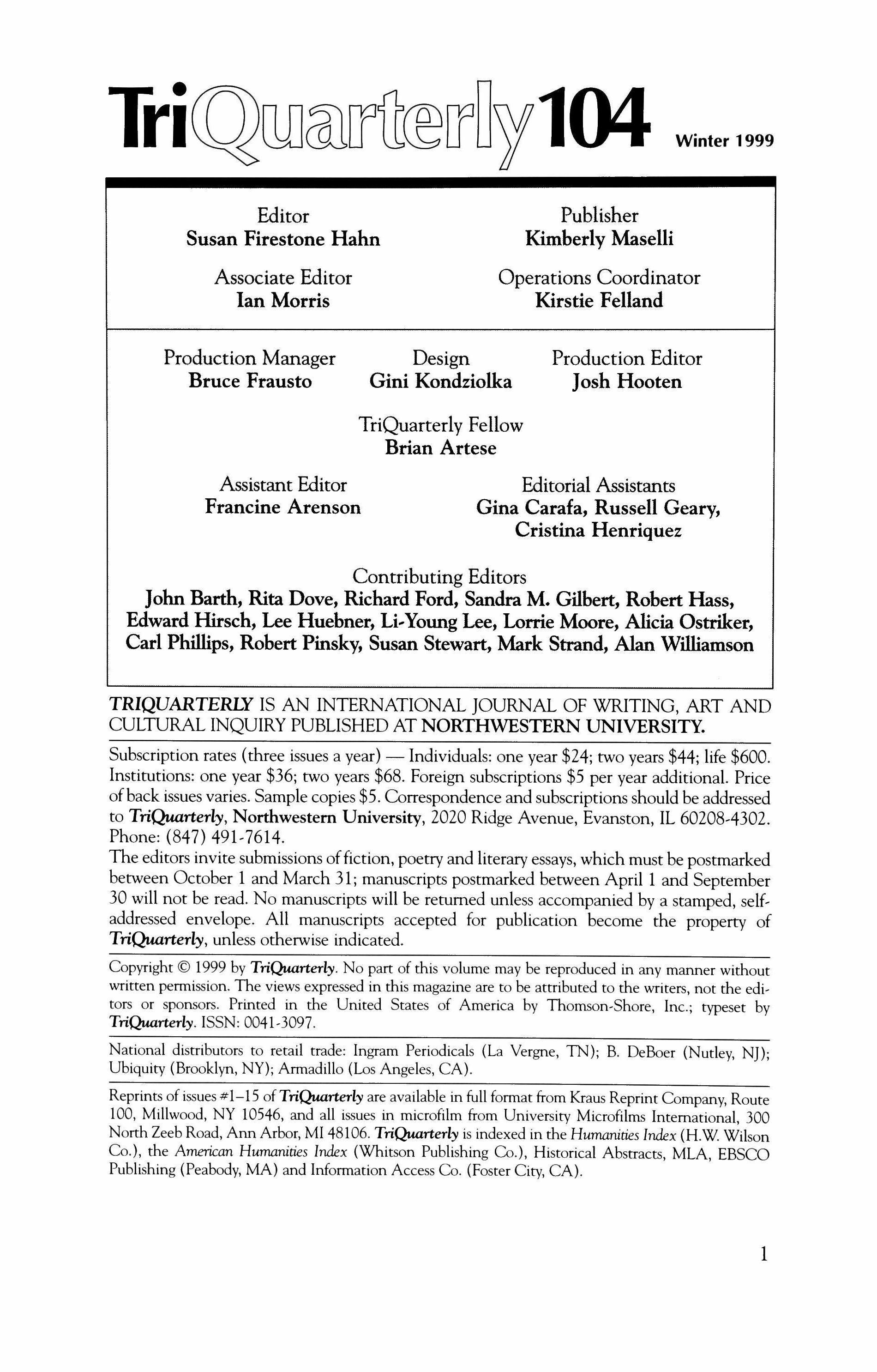
Winter 1999
Publisher Kimberly Maselli
Operations Coordinator Kirstie Felland
Design Gini Kondziolka
TriQuarterly Fellow Brian Artese
Assistant Editor Francine Arenson
Production Editor Josh Hooten
Editorial Assistants Gina Carafa, Russell Geary, Cristina Henriquez
Contributing Editors
John Barth, Rita Dove, Richard Ford, Sandra M. Gilbert, Robert Hass, Edward Hirsch, Lee Huebner, Li-Young Lee, Lorrie Moore, Alicia Ostriker, Carl Phillips, Robert Pinsky, Susan Stewart, Mark Strand, Alan Williamson
TRIQUARTERLY IS AN INTERNATIONAL JOURNAL OF WRITING, ART AND CULTURAL INQUIRY PUBLISHED AT NORTHWESTERN UNIVERSITY.
Subscription rates (three issues a year) - Individuals: one year $24; two years $44; life $600. Institutions: one year $36; two years $68. Foreign subscriptions $5 per year additional. Price ofback issues varies. Sample copies $5. Correspondence and subscriptions should be addressed to TriQuarterly, Northwestern University, 2020 Ridge Avenue, Evanston, IL 60208-4302. Phone: (847) 491-7614.
The editors invite submissions offiction, poetry and literary essays, which must be postmarked between October 1 and March 31; manuscripts postmarked between April 1 and September 30 will not be read. No manuscripts will be returned unless accompanied by a stamped, selfaddressed envelope. All manuscripts accepted for publication become the property of TriQuarterly, unless otherwise indicated.
Copyright © 1999 by TriQuarterly. No part of this volume may be reproduced in any manner without written permission. The views expressed in this magazine are to be attributed to the writers, not the editors or sponsors. Printed in the United States of America by Thomson-Shore, Inc.; typeset by TriQuarterly. ISSN: 0041-3097.
National distributors to retail trade: Ingram Periodicals (La Vergne, TN); B. DeBoer (Nutley, NJ); Ubiquity (Brooklyn, NY); Armadillo (Los Angeles, CAl.
Reprints of issues #1-15 of TriQuarterly are available in full format from Kraus Reprint Company, Route 100, Millwood, NY 10546, and all issues in microfilm from University Microfilms International, 300 North Zeeb Road, Ann Arbor, MI 48106. TriQuarterly is indexed in the Humanities lrulex (H.W. Wilson Co.), the American Humanities lrulex (Whitson Publishing Co.), Historical Abstracts, MLA, EBSCO Publishing (Peabody, MA) and Information Access Co. (Foster City, CAl.
1
Calm Sea and Prosperous Voyage novella
Bette Howland
from Thaw novel excerpt
Maxine Chernoff
Chuck's Money story
Carol Bly
Technician novella
Leigh Buchanan Bienen

Cover painting, Untitled, by Maria Tomasula
Cover design by Gini Kondziolka
TriQuarterly magazine is pleased to announce that Susan Stewart is a Contributing Editor to the magazine as of this issue. We welcome her and thank her.
Contents
3
82
141
192
Calm Sea and Prosperous Voyage
Bette Howland
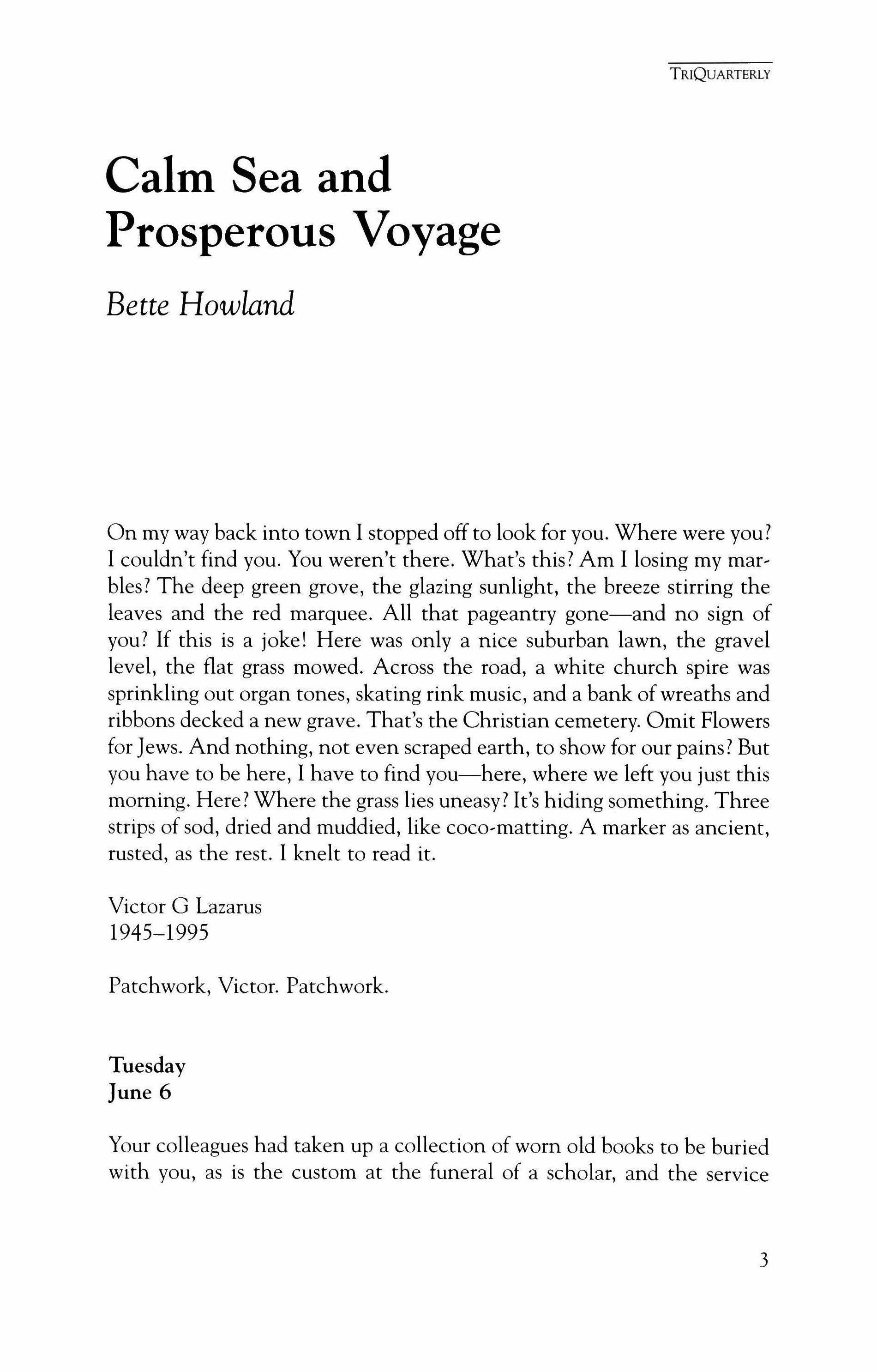
On my way back into town I stopped off to look for you. Where were you? I couldn't find you. You weren't there. What's this? Am I losing my marbles? The deep green grove, the glazing sunlight, the breeze stirring the leaves and the red marquee. All that pageantry gone-and no sign of you? If this is a joke! Here was only a nice suburban lawn, the gravel level, the flat grass mowed. Across the road, a white church spire was sprinkling out organ tones, skating rink music, and a bank of wreaths and ribbons decked a new grave. That's the Christian cemetery. Omit Flowers for Jews. And nothing, not even scraped earth, to show for our pains? But you have to be here, I have to find you-here, where we left you just this morning. Here? Where the grass lies uneasy? It's hiding something. Three strips of sod, dried and muddied, like coco-matting. A marker as ancient, rusted, as the rest. I knelt to read it.
Victor G Lazarus 1945-1995
Patchwork, Victor. Patchwork.
Tuesday June 6
Your colleagues had taken up a collection of worn old books to be buried with you, as is the custom at the funeral of a scholar, and the service
TRIQUARTERLY
3

started off with a reading from your work. I have to apologize, Victor, I couldn't keep my mind on it. Someone was sobbing out loud. Already? I thought. And the trees, the tent-top, the rug of green Astroturf, the mourners seated all in a row. Ben squirming in his necktie and skullcap, the soles of his gym shoes stuck together, his blue eyes wandering, scared. How long is this grownup stuff gonna last? His grandmother-your mother-leans down, her lips to his ear, his fist in her fist. Easy to guess what she's saying. Her head trembles, as from a long habit of chiding. How little, how aged, she is today, her white hair brittle, her face behind dark glasses bolted and barred. Next your half brother, staring boldly in front of him, a hand on either knee, as if he's been told not to blink. Then your two stepsisters. Last, an empty chair.
None of them looks to be listening either.
Not half an hour ago, everything was white; the sky, the sun, the milky mists of the hollows. The mountains were smoking like idols. Now all is made clear. It happens that way, in our valley. Truly the light is sweet. I wish you could see it.
The young Rabbi steps forward, the books close to his chest. Very young, very slight; fragile, even. The narrow black suit. The narrow black beard. The black-black eyes in the white-white face. You know those intense Jewish organs. There are one and one half Rabbis in town now, and this Rabbi Pilcher here is the half, a Rabbinical student, pinch hitting at Temple, while they search for a successor to Rabbi Jim. Rabbi Jim. Remember him? The one who used to dress as Queen Esther on Purim and deliver his sermons in drag? Something about how there's nothing wrong with being a woman, we're really okay guys. You told me they were thinking of joining up with the Ethical Culture Society anyhow, tossing in the Tallith. Another of your jokes, Victor? You know I never could tell with you. Oh, I catch on eventually; I almost always catch on-eventually. Eventually isn't always soon enough.
This must be Rabbi Pilcher's first funeral; he seems so nervous, almost pleading, hugging the books, as if for protection, holding on for dear life. He lifts his eyes to the hills. Whence shall come his help? For his Eulogy, he means to compare the life of Victor Lazarus to the life of Moses Maimonides. There are many parallels, he says; not just that, like Maimonides, Victor Lazarus was married twice, and had a son-. Wait, Victor. Don't turn over. You're not in your grave yet.
I wonder if the young Rabbi knows he's been the eye of a storm these last few days?
TRIQUARTERLY
4

It was your wish, stated in your will, to have an Orthodox Jewish Burial. Easier said than done-as you, of all people, ought to know. And among the obstacles, not the least is the fact that you, Victor Lazarus-master of languages ancient and modem, mysteries mathematic and metaphysic, authority on Maimonides, at home in Hebrew and Greek, in the Arabic of Averroes and Avicenna, in the Latin of St. Thomas Aquinas-the great medieval mystics and philosopher-healers, reconcilers of Faith and Reason-you, Victor Lazarus, to get to the point, were not Jewish.
Not technically.
Your grandmother-your mother's mother-was Mercedes (called Sadie) McDade, baptized in the Tombigbee River, which wends its way out of Mississippi down the length of western Alabama-Alabama, where the stars fall-and somewhere safe to sea. At sixteen she caught the eye of Benjamin Gottlieb, late of Warsaw, a successful businessman, lover of grand opera, Panama hats, and Havana cigars. Because of the difference in their ages and stations, he sent his bride-to-be to Finishing School. Ah, the Jewish romance with America! Nine children were born to this union before Benjamin Gottlieb collapsed one summer morning, shaking ripe gold from the pear tree; dead on the spot of a heart attack. The way you were expecting to go yourself, weren't you, Victor, and at just about your age. Goes to show how much we know. Sadie McDade, still a young woman, was to remain his faithful widow for fifty years. That was the Depression; soon came the War. At the Jewish Canteen, Belle Gottlieb-Belle of the Irish eyes and the Southern charm-met Victor Lazarus, a husky dark-browed airman stationed near Tuscaloosa. They fell in love and married, the way people do in wartime; desperate, as you said, for her to get pregnant. He was training to be a pilot; he would be flying bombing missions. They were in luck. Before he shipped overseas, your father-to-be and never-to-be spoke to his brother of the unborn child. If something happens to me, he said, take care of Victor. Something happened. So they named you, as we Jews do, after a dead relative. You became Victor Lazarus.
I like your genealogy. The American mish-mash; bedrock Southern Fundamentalism, pie-eyed immigrant dreams. It seemed right for you, Scholar of Torah and Logos, Lover of Wisdom, Lover of Women, Man of Many Contradictions-not all of them high-flown. But we are an ancient tribe, more ancient than our history, and-though you'd never know it, from all the begats and begats in the Bible---descent is through the mother's womb and in the mother's blood. This was your dark secret, your bar sinister, the sign of that shadow over your fate and character
TRIQUARTERLY
5
your friends the philosophers keep telling me about. You didn't want to be half-something. All or nothing at all. Was that the Jew in you?
Let me say right now, Victor-I have no complaints. You gave good value; I never felt short-changed. I don't see how anyone ever couldexcept for HER, your former wife, a fateful exception; and, it seems, the Rabbis. Still, there are plenty of reasons you can't have a strictly Kosher Orthodox burial. It's not all your fault, those famous last words. Were they, Victor? The last you heard? Not only the tainted blood of Sadie McDade. Sometimes the fault is in our stars.
Well, as Belle, your mother, says, in her mother's Alabama twang: We must just do as best we can.
So here goes.
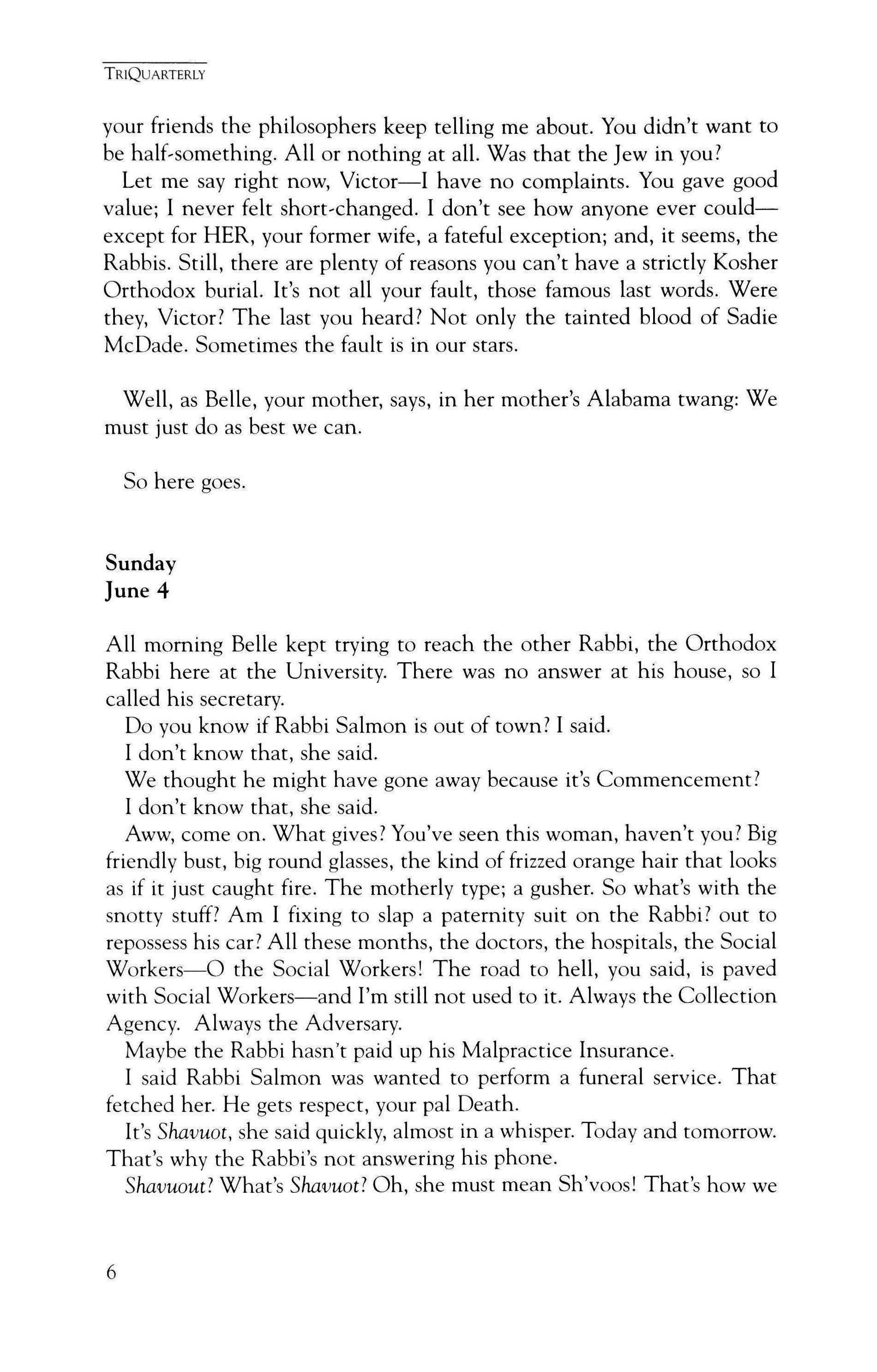
Sunday June 4
All morning Belle kept trying to reach the other Rabbi, the Orthodox Rabbi here at the University. There was no answer at his house, so I called his secretary.
Do you know if Rabbi Salmon is out of town? I said. I don't know that, she said.
We thought he might have gone away because it's Commencement? I don't know that, she said.
Aww, come on. What gives? You've seen this woman, haven't you? Big friendly bust, big round glasses, the kind of frizzed orange hair that looks as if it just caught fire. The motherly type; a gusher. So what's with the snotty stuff? Am I fixing to slap a paternity suit on the Rabbi? out to repossess his car? All these months, the doctors, the hospitals, the Social Workers-O the Social Workers! The road to hell, you said, is paved with Social Workers-and I'm still not used to it. Always the Collection Agency. Always the Adversary.
Maybe the Rabbi hasn't paid up his Malpractice Insurance.
I said Rabbi Salmon was wanted to perform a funeral service. That fetched her. He gets respect, your pal Death. It's Shavuot, she said quickly, almost in a whisper. Today and tomorrow. That's why the Rabbi's not answering his phone.
Shavuout? What's Shavuot? Oh, she must mean Sh'voos! That's how we
TRIQUARTERLY
6
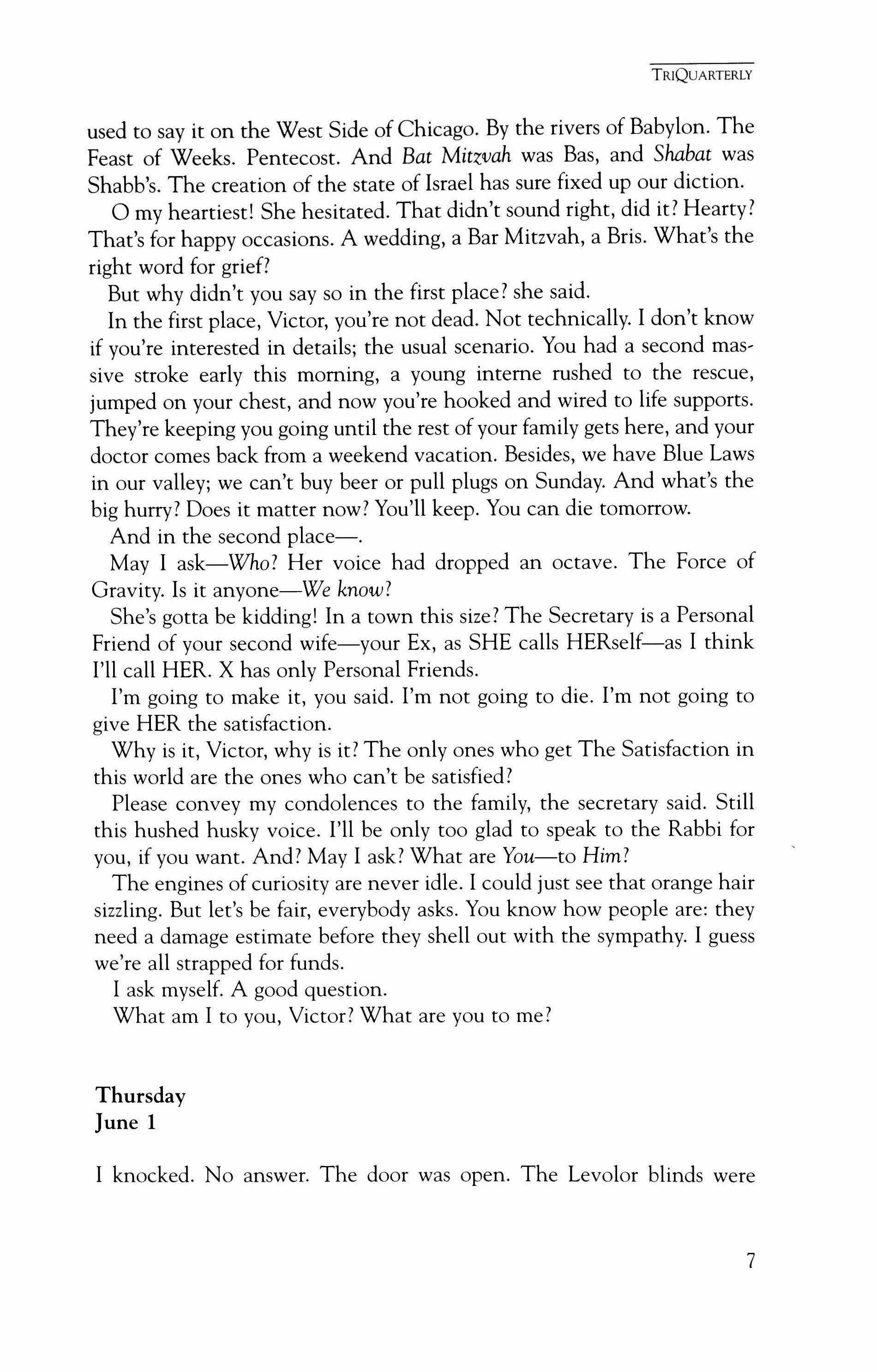
used to say it on the West Side of Chicago. By the rivers of Babylon. The Feast of Weeks. Pentecost. And Bat Mitzvah was Bas, and Shabat was Shabb's. The creation of the state of Israel has sure fixed up our diction.
o my heartiest! She hesitated. That didn't sound right, did it? Hearty? That's for happy occasions. A wedding, a Bar Mitzvah, a Bris. What's the right word for grief?
But why didn't you say so in the first place? she said.
In the first place, Victor, you're not dead. Not technically. I don't know if you're interested in details; the usual scenario. You had a second mas, sive stroke early this morning, a young interne rushed to the rescue, jumped on your chest, and now you're hooked and wired to life supports. They're keeping you going until the rest of your family gets here, and your doctor comes back from a weekend vacation. Besides, we have Blue Laws in our valley; we can't buy beer or pull plugs on Sunday. And what's the big hurry? Does it matter now? You'll keep. You can die tomorrow.
And in the second place-.
May I ask-Who? Her voice had dropped an octave. The Force of Gravity. Is it anyone-We know?
She's gotta be kidding! In a town this size? The Secretary is a Personal Friend of your second wife-your Ex, as SHE calls HERself-as I think I'll call HER. X has only Personal Friends.
I'm going to make it, you said. I'm not going to die. I'm not going to give HER the satisfaction.
Why is it, Victor, why is it? The only ones who get The Satisfaction in this world are the ones who can't be satisfied?
Please convey my condolences to the family, the secretary said. Still this hushed husky voice. I'll be only too glad to speak to the Rabbi for you, if you want. And? May I ask? What are You-to Him?
The engines of curiosity are never idle. I could just see that orange hair sizzling. But let's be fair, everybody asks. You know how people are: they need a damage estimate before they shell out with the sympathy. I guess we're all strapped for funds.
I ask myself. A good question. What am I to you, Victor? What are you to me?
Thursday June 1
I knocked. No answer. The door was open. The Levolor blinds were
TRIQUARTERLY
7
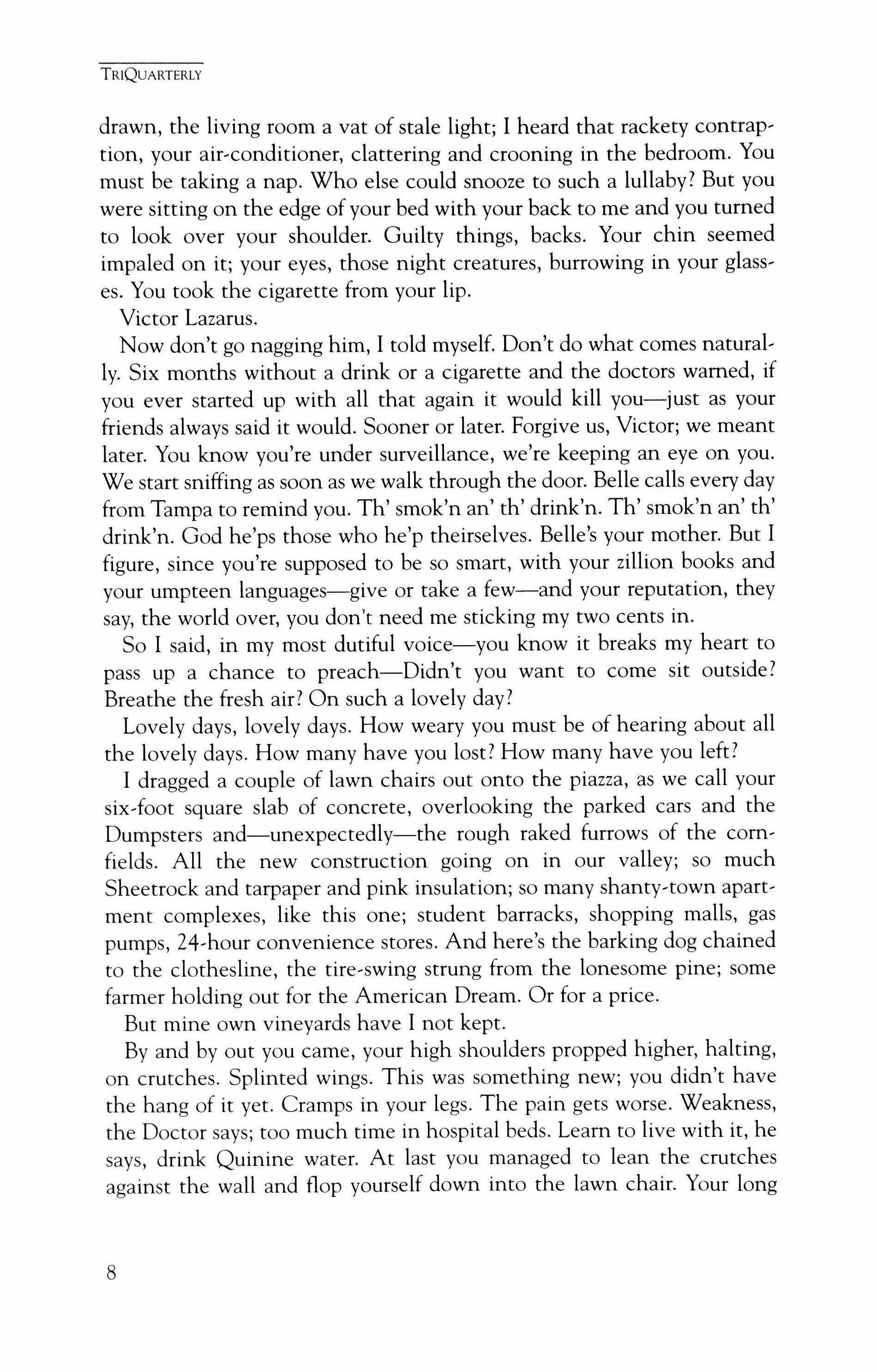
drawn, the living room a vat of stale light; I heard that rackety contraption, your air-conditioner, clattering and crooning in the bedroom. You must be taking a nap. Who else could snooze to such a lullaby? But you were sitting on the edge of your bed with your back to me and you turned to look over your shoulder. Guilty things, backs. Your chin seemed impaled on it; your eyes, those night creatures, burrowing in your glasses. You took the cigarette from your lip.
Victor Lazarus.
Now don't go nagging him, I told myself. Don't do what comes naturally. Six months without a drink or a cigarette and the doctors warned, if you ever started up with all that again it would kill you-just as your friends always said it would. Sooner or later. Forgive us, Victor; we meant later. You know you're under surveillance, we're keeping an eye on you. We start sniffing as soon as we walk through the door. Belle calls every day from Tampa to remind you. Th' smok'n an' th' drink'n. Th' smok'n an' th' drink'n. God he'ps those who he'p theirselves. Belle's your mother. But I figure, since you're supposed to be so smart, with your zillion books and your umpteen languages-give or take a few-and your reputation, they say, the world over, you don't need me sticking my two cents in.
So I said, in my most dutiful voice-you know it breaks my heart to pass up a chance to preach-Didn't you want to come sit outside? Breathe the fresh air? On such a lovely day?
Lovely days, lovely days. How weary you must be of hearing about all the lovely days. How many have you lost? How many have you left?
I dragged a couple of lawn chairs out onto the piazza, as we call your six-foot square slab of concrete, overlooking the parked cars and the Dumpsters and-unexpectedly-the rough raked furrows of the cornfields. All the new construction going on in our valley; so much Sheetrock and tarpaper and pink insulation; so many shanty-town apartment complexes, like this one; student barracks, shopping malls, gas pumps, 24�hour convenience stores. And here's the barking dog chained to the clothesline, the tire-swing strung from the lonesome pine; some farmer holding out for the American Dream. Or for a price.
But mine own vineyards have I not kept.
By and by out you came, your high shoulders propped higher, halting, on crutches. Splinted wings. This was something new; you didn't have the hang of it yet. Cramps in your legs. The pain gets worse. Weakness, the Doctor says; too much time in hospital beds. Learn to live with it, he says, drink Quinine water. At last you managed to lean the crutches against the wall and flop yourself down into the lawn chair. Your long
TRIQUARTERLY
8

skinny self, your scaffold. Six-foot-two, slouching. One hundred and twenty pounds. Hair dark, straight, Oriental. Your knee-bones poking in your trouser legs. Your skeleton was showing again.
It's harder Than It looks
Do I mention it now? The hole in your throat. The tracheotomy. All those months breathing on respirators, scribbling on slates and legal pads, mouthing your words, mute. And the wound never healed: a piece of gauze sucking in and out in and out. To speak you press your fingers to your throat, force the words to your lips. In an odd way, it's as if you're blowing kisses.
Along came three young women in shorts and halters and fresh red sunburns, dragging black plastic bags. All of a sudden these containers are cropping up everywhere, like miniature portable toilets on construction sites. They are for sorting garbage. It goes like this:
Brown glass: CRACK
Green glass: SMASH
Clear glass: CRASH
You were wincing.
I put my hands to either side of my mouth:
Hey! You guys! Can't you make it a little louder?
They laughed and wagged their ponytails. They weren't just pitching out trash; they were-performing a Mitzvah, a good deed. Such are the virtues of our times; separating the pizza boxes from the beer bottles.
They're striking a blow for humanity, I said.
You touched your fingers to your throat:
Humanity you said. Has had Enough Blows
This is no country for old men. It's a University town; they're out there by the thousands, the scores of thousands-the young in one another's arms, the skateboards, the Frisbees, the birds and Boom-boxes at their song.
But what a Spring! Even you took notice. After the smokestacks and black-topped parking lots of the Medical Center, the mountains in their moth-eaten pelts like scruffy buffalo hides, the raw cold fogs, the high blue windows. You were half-sick of windows. And Lo! the winter is past. The redbuds and cherry trees are in flower-like pink popcorn, you said-and you confessed an urge to pick dogwood, embrace the branches. That was the thing to do when you were in college, tender armloads of blossoms to your Lady Love.
Could this be Victor talking? Victor Lazarus? Victor who calls me a pantheist, a tree-worshiper, with my sunsets and moonrises and moun-
TRIQUARTERLY
9
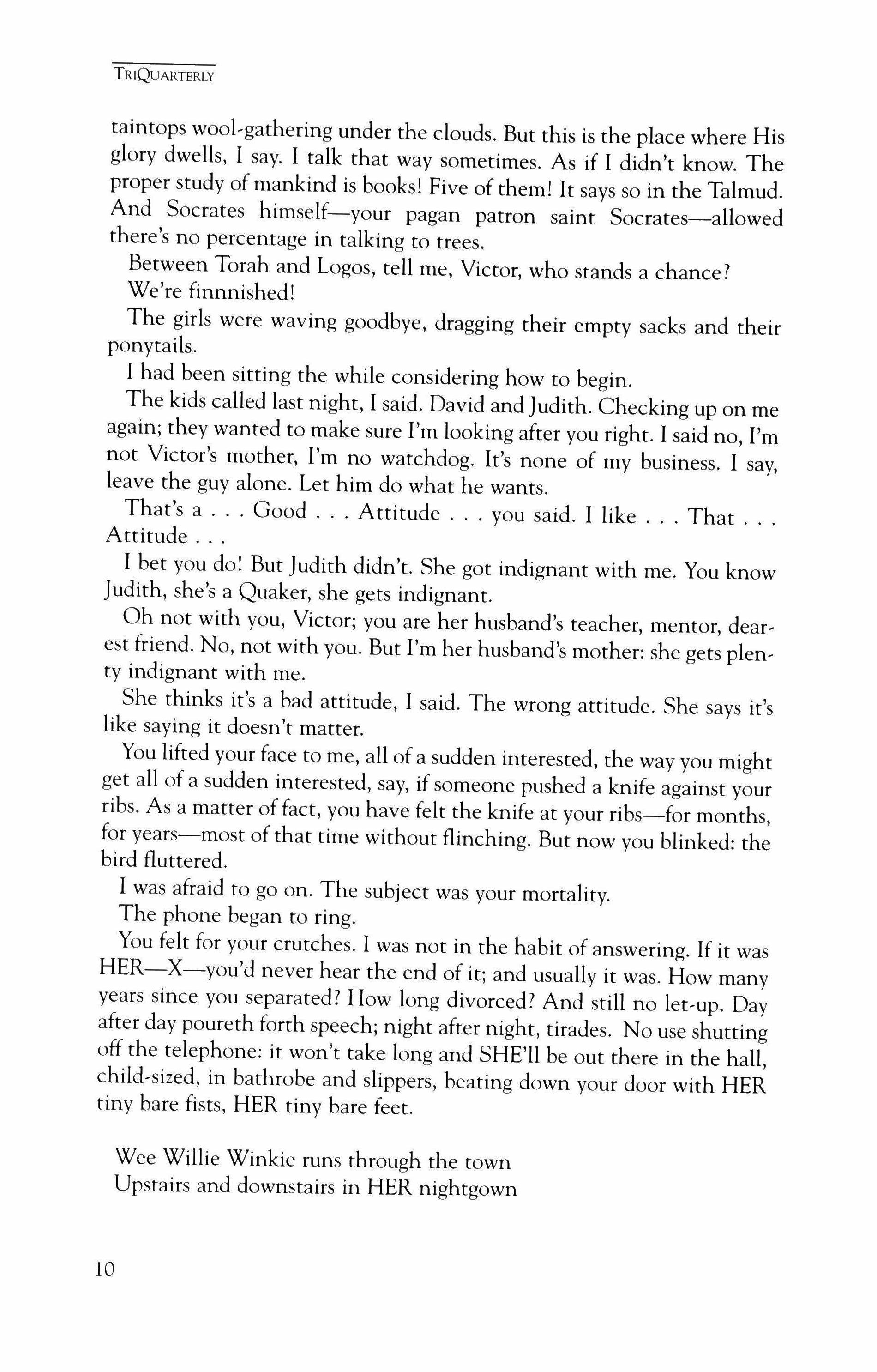
taintops wool-gathering under the clouds. But this is the place where His glory dwells, I say. I talk that way sometimes. As if I didn't know. The proper study of mankind is books! Five of them! It says so in the Talmud. And Socrates himself-your pagan patron saint Socrates-allowed there's no percentage in talking to trees.
Between Torah and Logos, tell me, Victor, who stands a chance?
We're finnnishedl
The girls were waving goodbye, dragging their empty sacks and their ponytails.
I had been sitting the while considering how to begin.
The kids called last night, I said. David and Judith. Checking up on me again; they wanted to make sure I'm looking after you right. I said no, I'm not Victor's mother, I'm no watchdog. It's none of my business. I say, leave the guy alone. Let him do what he wants.
That's a Good Attitude you said. I like That Attitude
I bet you do! But Judith didn't. She got indignant with me. You know Judith, she's a Quaker, she gets indignant.
Oh not with you, Victor; you are her husband's teacher, mentor, dearest friend. No, not with you. But I'm her husband's mother: she gets plenty indignant with me.
She thinks it's a bad attitude, I said. The wrong attitude. She says it's like saying it doesn't matter.
You lifted your face to me, all of a sudden interested, the way you might get all of a sudden interested, say, if someone pushed a knife against your ribs. As a matter of fact, you have felt the knife at your ribs-for months, for years-most of that time without flinching. But now you blinked: the bird fluttered.
I was afraid to go on. The subject was your mortality.
The phone began to ring.
You felt for your crutches. I was not in the habit of answering. If it was HER-X-you'd never hear the end of it; and usually it was. How many years since you separated? How long divorced? And still no let-up. Day after day poureth forth speech; night after night, tirades. No use shutting off the telephone: it won't take long and SHE'll be out there in the hall, child-sized, in bathrobe and slippers, beating down your door with HER tiny bare fists, HER tiny bare feet.
Wee Willie Winkie runs through the town
Upstairs and downstairs in HER nightgown
TRIQUARTERLY
10
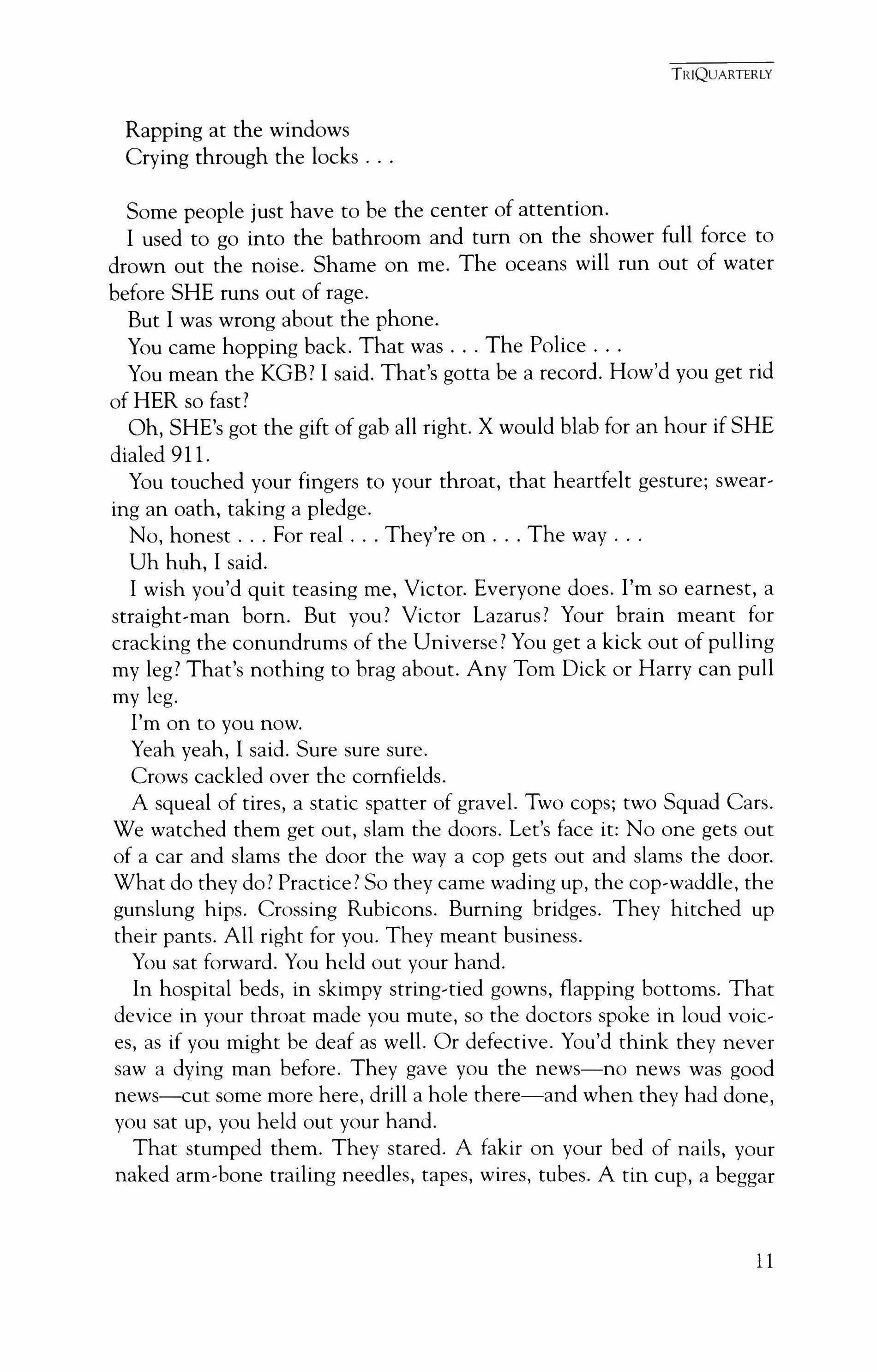
Rapping at the windows
Crying through the locks
Some people just have to be the center of attention. I used to go into the bathroom and tum on the shower full force to drown out the noise. Shame on me. The oceans will run out of water before SHE runs out of rage.
But I was wrong about the phone.
You came hopping back. That was The Police
You mean the KGB? I said. That's gotta be a record. How'd you get rid of HER so fast?
Oh, SHE's got the gift of gab all right. X would blab for an hour if SHE dialed 911.
You touched your fingers to your throat, that heartfelt gesture; swearing an oath, taking a pledge.
No, honest For real They're on The way
Uh huh, I said.
I wish you'd quit teasing me, Victor. Everyone does. I'm so earnest, a straight-man born. But you? Victor Lazarus? Your brain meant for cracking the conundrums of the Universe? You get a kick out of pulling my leg? That's nothing to brag about. Any Tom Dick or Harry can pull my leg.
I'm on to you now.
Yeah yeah, I said. Sure sure sure.
Crows cackled over the cornfields.
A squeal of tires, a static spatter of gravel. Two cops; two Squad Cars. We watched them get out, slam the doors. Let's face it: No one gets out of a car and slams the door the way a cop gets out and slams the door. What do they do? Practice? So they came wading up, the cop-waddle, the gunslung hips. Crossing Rubicons. Burning bridges. They hitched up their pants. All right for you. They meant business.
You sat forward. You held out your hand.
In hospital beds, in skimpy string-tied gowns, flapping bottoms. That device in your throat made you mute, so the doctors spoke in loud voices, as if you might be deaf as well. Or defective. You'd think they never saw a dying man before. They gave you the news-no news was good news-cut some more here, drill a hole there-and when they had done, you sat up, you held out your hand.
That stumped them. They stared. A fakir on your bed of nails, your naked arm-bone trailing needles, tapes, wires, tubes. A tin cup, a beggar
TRIQUARTERLY
11
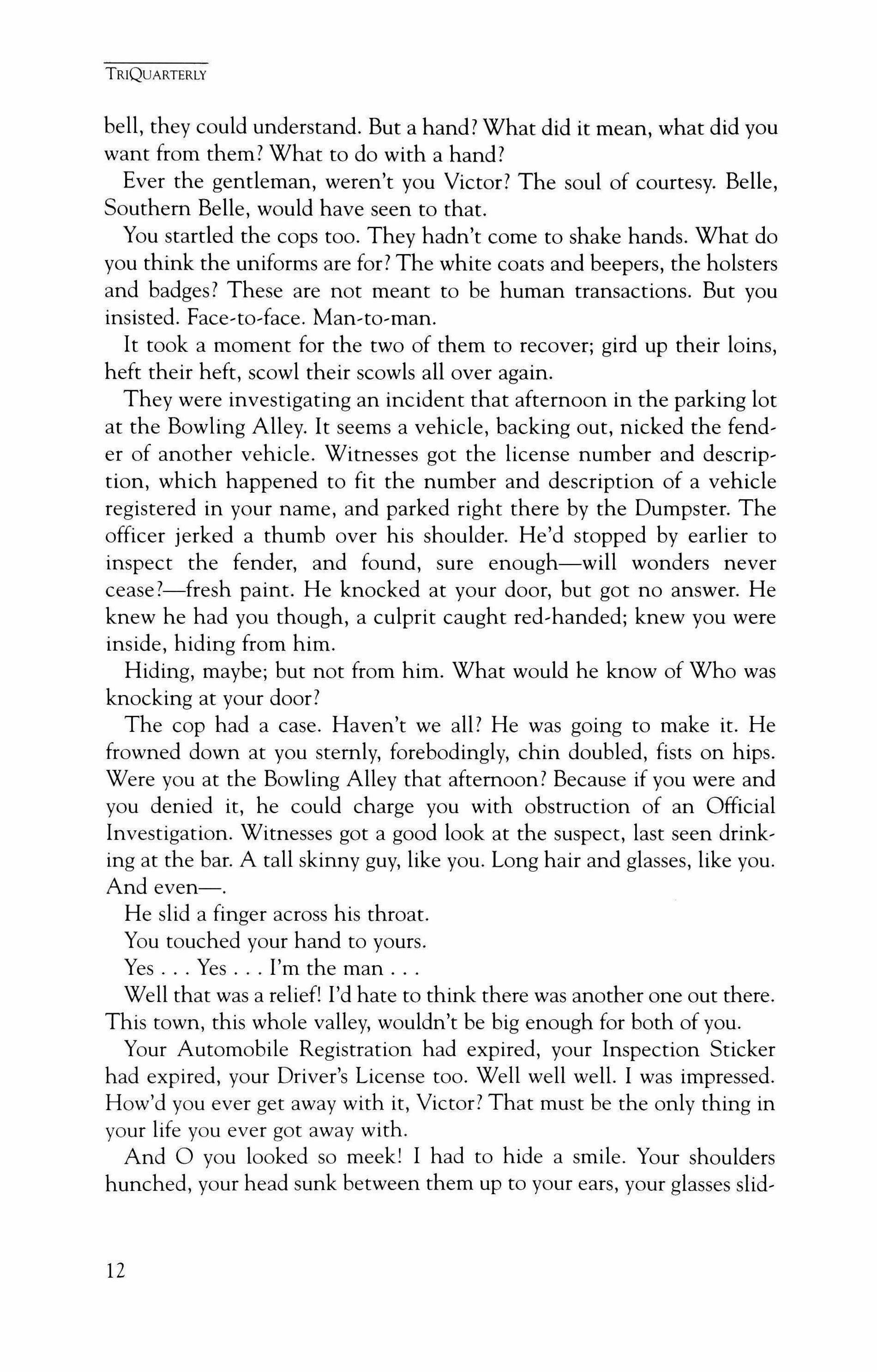
bell, they could understand. But a hand? What did it mean, what did you want from them? What to do with a hand?
Ever the gentleman, weren't you Victor? The soul of courtesy. Belle, Southern Belle, would have seen to that.
You startled the cops too. They hadn't come to shake hands. What do you think the uniforms are for? The white coats and beepers, the holsters and badges? These are not meant to be human transactions. But you insisted. Face-to-face. Man-to-man.
It took a moment for the two of them to recover; gird up their loins, heft their heft, scowl their scowls all over again.
They were investigating an incident that afternoon in the parking lot at the Bowling Alley. It seems a vehicle, backing out, nicked the fender of another vehicle. Witnesses got the license number and description, which happened to fit the number and description of a vehicle registered in your name, and parked right there by the Dumpster. The officer jerked a thumb over his shoulder. He'd stopped by earlier to inspect the fender, and found, sure enough-will wonders never cease ?-fresh paint. He knocked at your door, but got no answer. He knew he had you though, a culprit caught red-handed; knew you were inside, hiding from him.
Hiding, maybe; but not from him. What would he know of Who was knocking at your door?
The cop had a case. Haven't we all? He was going to make it. He frowned down at you sternly, forebodingly, chin doubled, fists on hips. Were you at the Bowling Alley that afternoon? Because if you were and you denied it, he could charge you with obstruction of an Official Investigation. Witnesses got a good look at the suspect, last seen drinking at the bar. A tall skinny guy, like you. Long hair and glasses, like you. And even-.
He slid a finger across his throat.
You touched your hand to yours.
Yes Yes I'm the man
Well that was a relief! I'd hate to think there was another one out there. This town, this whole valley, wouldn't be big enough for both of you.
Your Automobile Registration had expired, your Inspection Sticker had expired, your Driver's License too. Well well well. I was impressed. How'd you ever get away with it, Victor? That must be the only thing in your life you ever got away with.
And 0 you looked so meek! I had to hide a smile. Your shoulders hunched, your head sunk between them up to your ears, your glasses slid-
TRIQUARTERLY
12
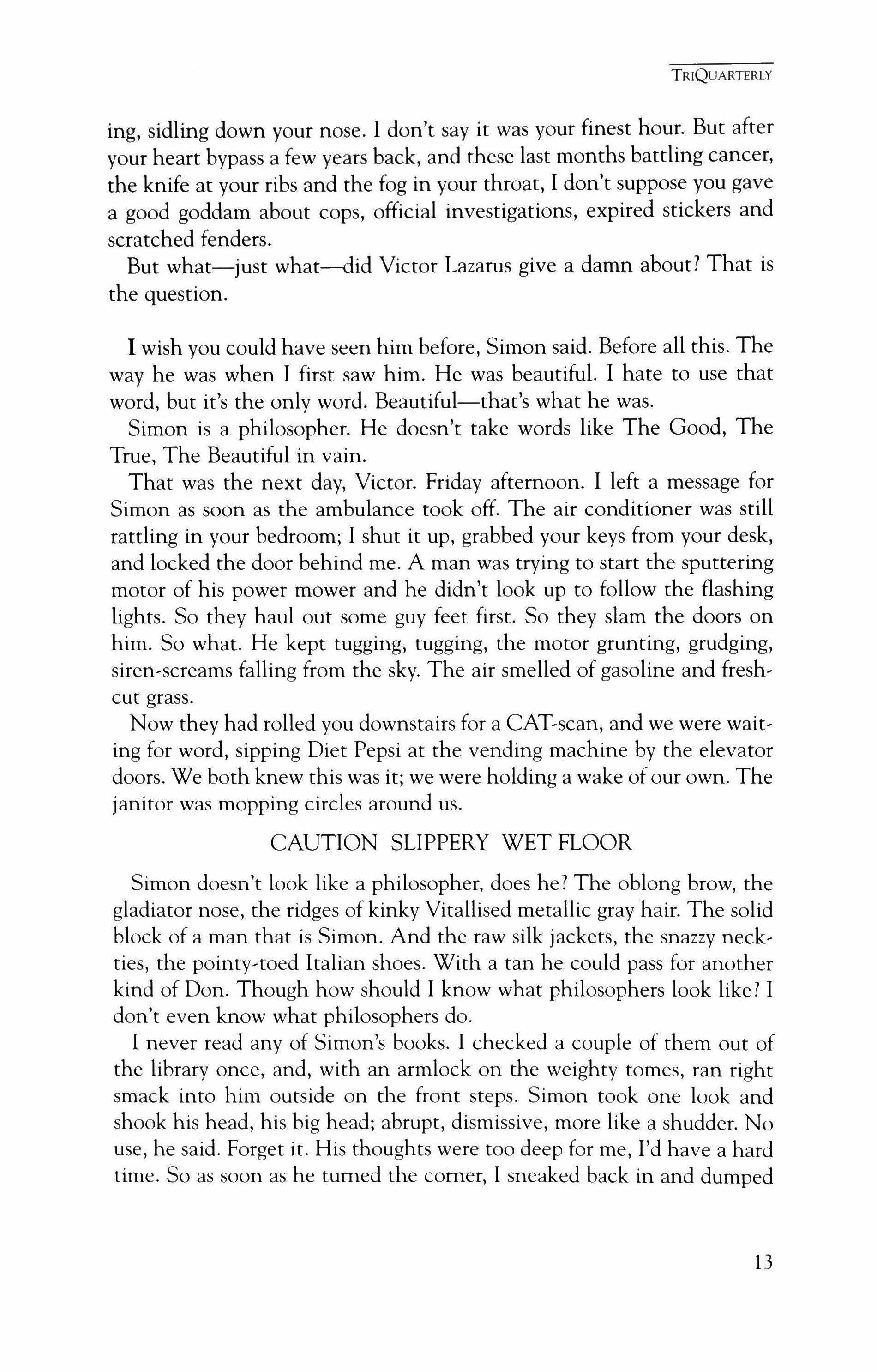
ing, sidling down your nose. I don't say it was your finest hour. But after your heart bypass a few years back, and these last months battling cancer, the knife at your ribs and the fog in your throat, I don't suppose you gave a good goddam about cops, official investigations, expired stickers and scratched fenders.
But what-just what-did Victor Lazarus give a damn about? That is the question.
I wish you could have seen him before, Simon said. Before all this. The way he was when I first saw him. He was beautiful. I hate to use that word, but it's the only word. Beautiful-that's what he was.
Simon is a philosopher. He doesn't take words like The Good, The True, The Beautiful in vain.
That was the next day, Victor. Friday afternoon. I left a message for Simon as soon as the ambulance took off. The air conditioner was still rattling in your bedroom; I shut it up, grabbed your keys from your desk, and locked the door behind me. A man was trying to start the sputtering motor of his power mower and he didn't look up to follow the flashing lights. So they haul out some guy feet first. So they slam the doors on him. So what. He kept tugging, tugging, the motor grunting, grudging, siren-screams falling from the sky. The air smelled of gasoline and freshcut grass.
Now they had rolled you downstairs for a CAT-scan, and we were waiting for word, sipping Diet Pepsi at the vending machine by the elevator doors. We both knew this was it; we were holding a wake of our own. The janitor was mopping circles around us.
CAUTION SLIPPERY WET FLOOR
Simon doesn't look like a philosopher, does he? The oblong brow, the gladiator nose, the ridges of kinky Vitallised metallic gray hair. The solid block of a man that is Simon. And the raw silk jackets, the snazzy neckties, the pointy-toed Italian shoes. With a tan he could pass for another kind of Don. Though how should I know what philosophers look like? I don't even know what philosophers do.
I never read any of Simon's books. I checked a couple of them out of the library once, and, with an armlock on the weighty tomes, ran right smack into him outside on the front steps. Simon took one look and shook his head, his big head; abrupt, dismissive, more like a shudder. No use, he said. Forget it. His thoughts were too deep for me, I'd have a hard time. So as soon as he turned the comer, I sneaked back in and dumped
TRIQUARTERLY
13
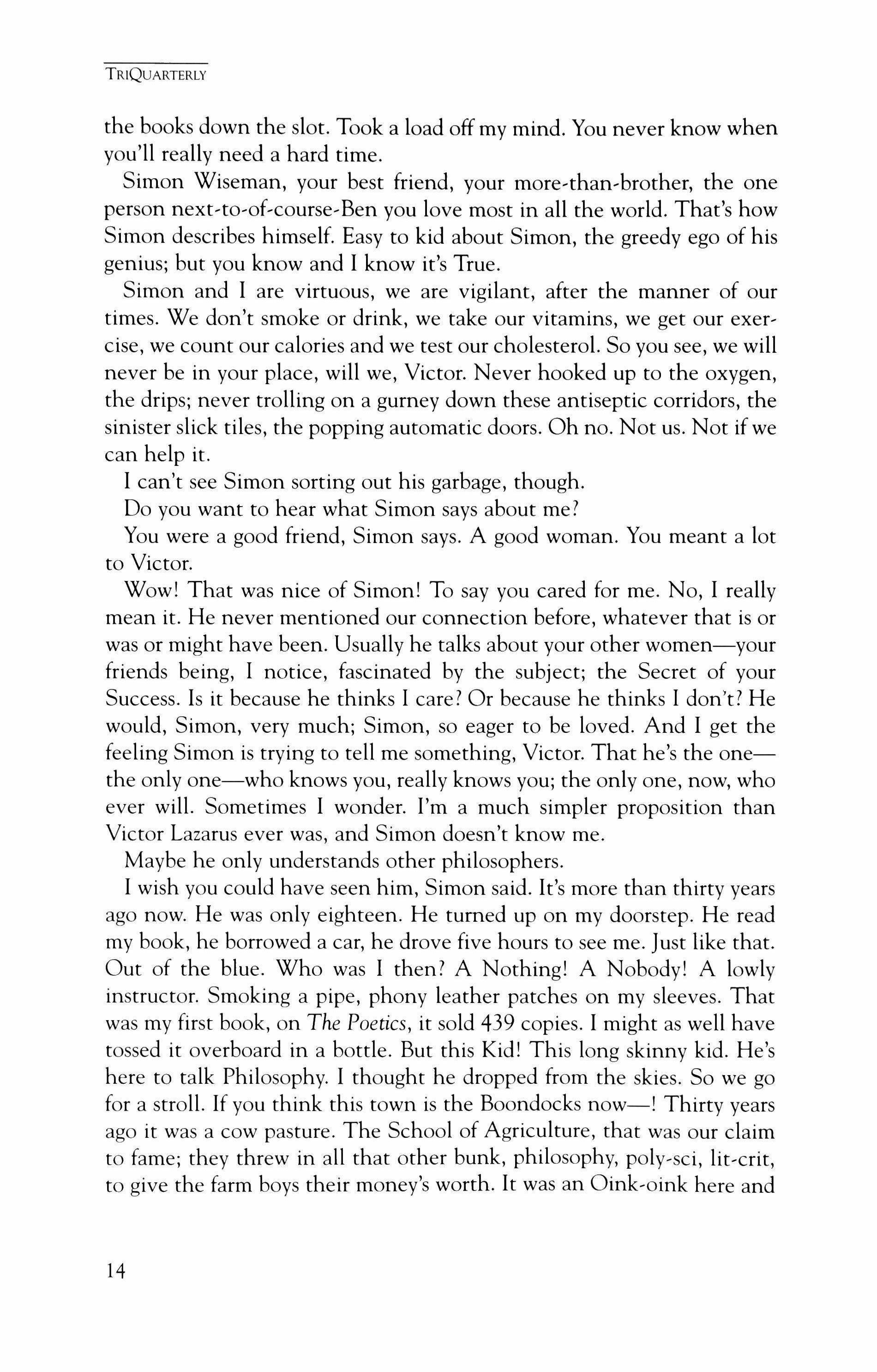
the books down the slot. Took a load off my mind. You never know when you'll really need a hard time.
Simon Wiseman, your best friend, your more-than-brother, the one person next-to-of-course-Ben you love most in all the world. That's how Simon describes himself. Easy to kid about Simon, the greedy ego of his genius; but you know and I know it's True.
Simon and I are virtuous, we are vigilant, after the manner of our times. We don't smoke or drink, we take our vitamins, we get our exercise, we count our calories and we test our cholesterol. So you see, we will never be in your place, will we, Victor. Never hooked up to the oxygen, the drips; never trolling on a gurney down these antiseptic corridors, the sinister slick tiles, the popping automatic doors. Oh no. Not us. Not if we can help it.
I can't see Simon sorting out his garbage, though.
Do you want to hear what Simon says about me?
You were a good friend, Simon says. A good woman. You meant a lot to Victor.
Wow! That was nice of Simon! To say you cared for me. No, I really mean it. He never mentioned our connection before, whatever that is or was or might have been. Usually he talks about your other women-your friends being, I notice, fascinated by the subject; the Secret of your Success. Is it because he thinks I care? Or because he thinks I don't? He would, Simon, very much; Simon, so eager to be loved. And I get the feeling Simon is trying to tell me something, Victor. That he's the onethe only one-who knows you, really knows you; the only one, now, who ever will. Sometimes I wonder. I'm a much simpler proposition than Victor Lazarus ever was, and Simon doesn't know me.
Maybe he only understands other philosophers.
I wish you could have seen him, Simon said. It's more than thirty years ago now. He was only eighteen. He turned up on my doorstep. He read my book, he borrowed a car, he drove five hours to see me. Just like that. Out of the blue. Who was I then? A Nothing! A Nobody! A lowly instructor. Smoking a pipe, phony leather patches on my sleeves. That was my first book, on The Poetics, it sold 439 copies. I might as well have tossed it overboard in a bottle. But this Kid! This long skinny kid. He's here to talk Philosophy. I thought he dropped from the skies. So we go for a stroll. If you think this town is the Boondocks now-! Thirty years ago it was a cow pasture. The School of Agriculture, that was our claim to fame; they threw in all that other bunk, philosophy, poly-sci, lit-crit, to give the farm boys their money's worth. It was an Oink-oink here and
TRIQUARTERLY
14
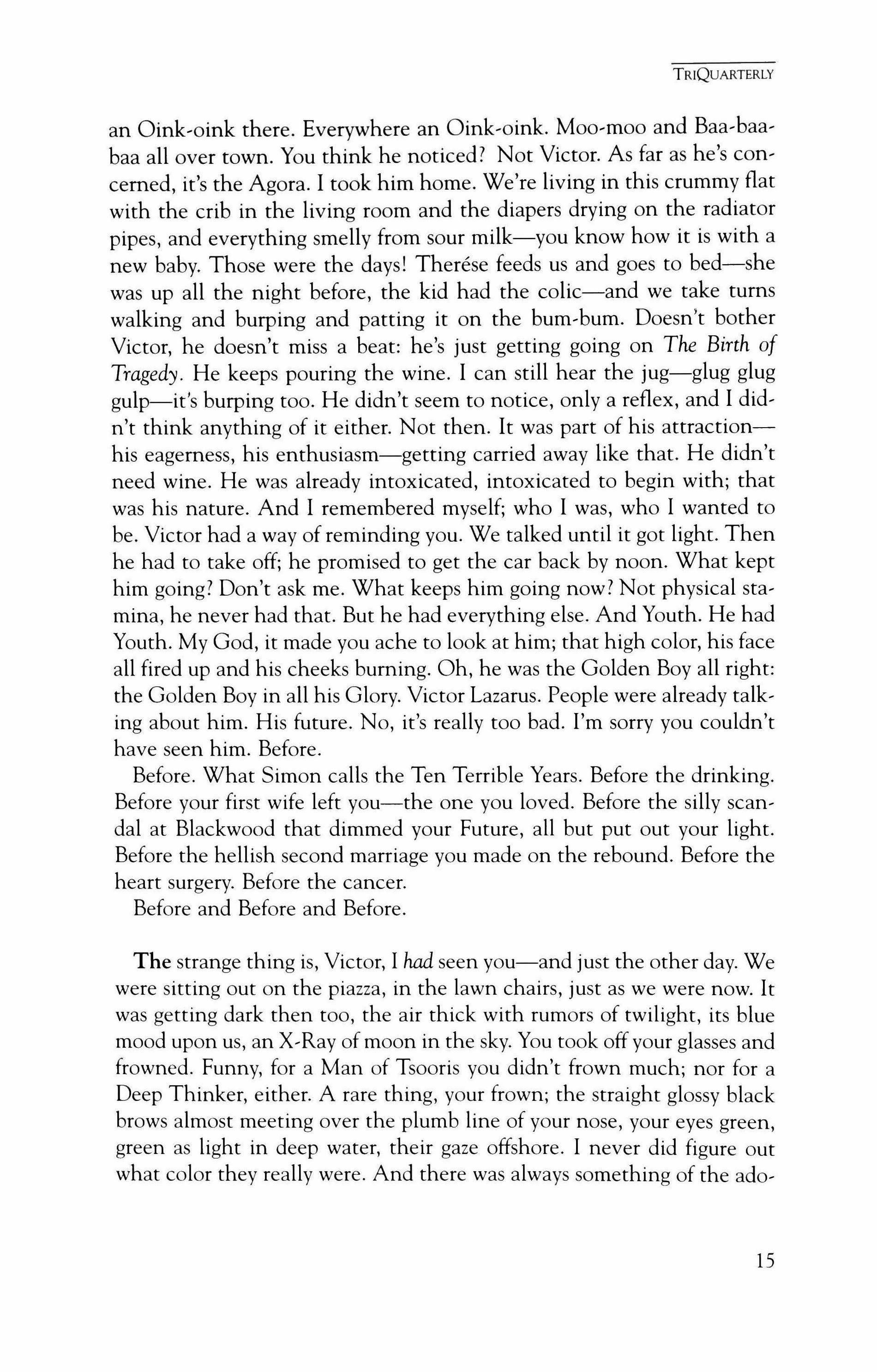
an Oink-oink there. Everywhere an Oink-oink. Moo-moo and Baa-baabaa all over town. You think he noticed? Not Victor. As far as he's concerned, it's the Agora. I took him home. We're living in this crummy flat with the crib in the living room and the diapers drying on the radiator pipes, and everything smelly from sour milk-you know how it is with a new baby. Those were the days! Therese feeds us and goes to bed-she was up all the night before, the kid had the colic-and we take turns walking and burping and patting it on the burn-bum. Doesn't bother Victor, he doesn't miss a beat: he's just getting going on The Birth of Tragedy. He keeps pouring the wine. I can still hear the jug-glug glug gulp-it's burping too. He didn't seem to notice, only a reflex, and I didn't think anything of it either. Not then. It was part of his attractionhis eagerness, his enthusiasm-getting carried away like that. He didn't need wine. He was already intoxicated, intoxicated to begin with; that was his nature. And I remembered myself; who I was, who I wanted to be. Victor had a way of reminding you. We talked until it got light. Then he had to take off; he promised to get the car back by noon. What kept him going? Don't ask me. What keeps him going now? Not physical stamina, he never had that. But he had everything else. And Youth. He had Youth. My God, it made you ache to look at him; that high color, his face all fired up and his cheeks burning. Oh, he was the Golden Boy all right: the Golden Boy in all his Glory. Victor Lazarus. People were already talking about him. His future. No, it's really too bad. I'm sorry you couldn't have seen him. Before.
Before. What Simon calls the Ten Terrible Years. Before the drinking. Before your first wife left you-the one you loved. Before the silly scandal at Blackwood that dimmed your Future, all but put out your light. Before the hellish second marriage you made on the rebound. Before the heart surgery. Before the cancer.
Before and Before and Before.
The strange thing is, Victor, I had seen you-and just the other day. We were sitting out on the piazza, in the lawn chairs, just as we were now. It was getting dark then too, the air thick with rumors of twilight, its blue mood upon us, an X�Ray of moon in the sky. You took off your glasses and frowned. Funny, for a Man of Tsooris you didn't frown much; nor for a Deep Thinker, either. A rare thing, your frown; the straight glossy black brows almost meeting over the plumb line of your nose, your eyes green, green as light in deep water, their gaze offshore. I never did figure out what color they really were. And there was always something of the ado-
TRIQUARTERLY
15
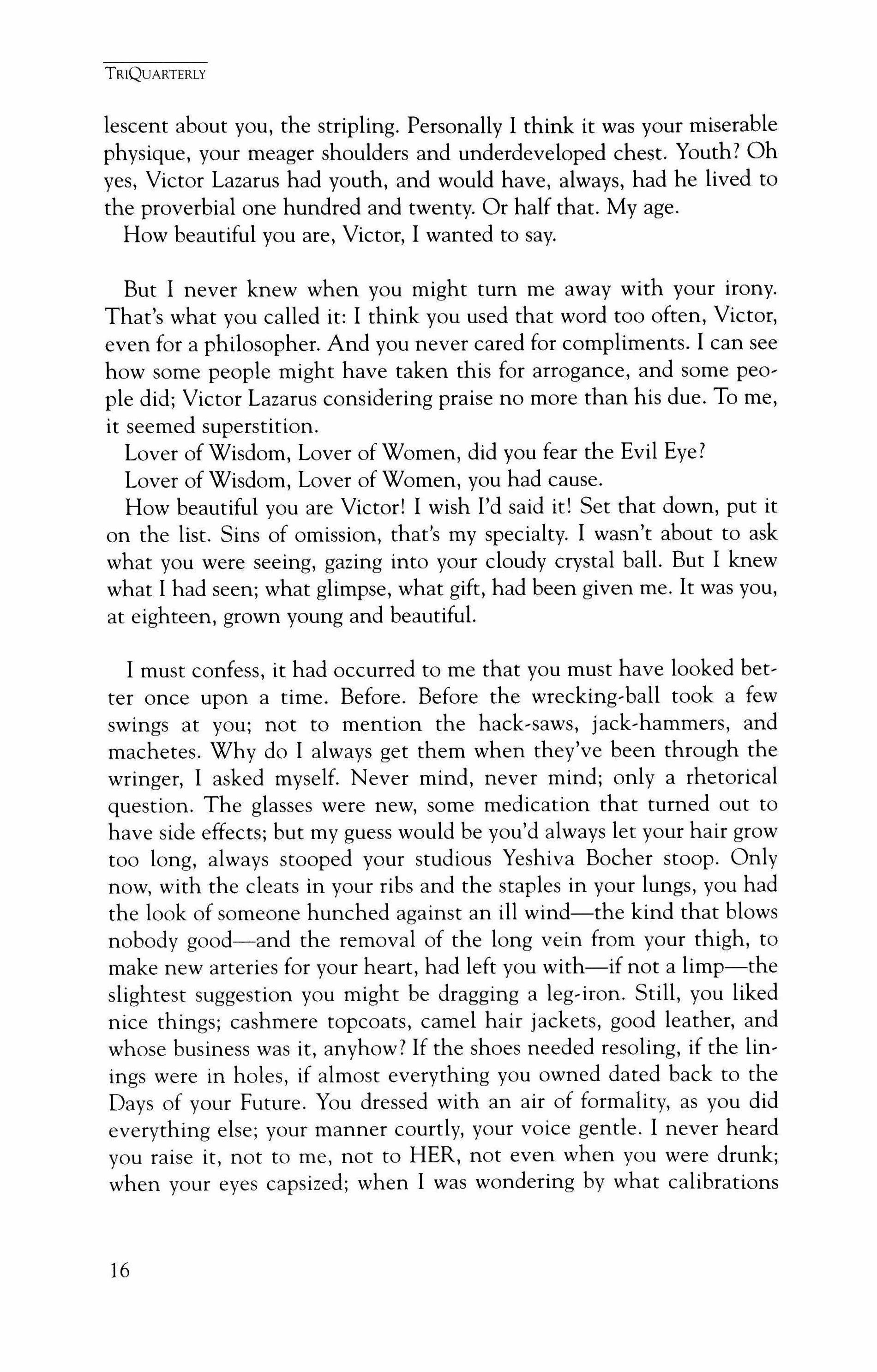
lescent about you, the stripling. Personally I think it was your miserable physique, your meager shoulders and underdeveloped chest. Youth? Oh yes, Victor Lazarus had youth, and would have, always, had he lived to the proverbial one hundred and twenty. Or half that. My age. How beautiful you are, Victor, I wanted to say.
But I never knew when you might turn me away with your irony. That's what you called it: I think you used that word too often, Victor, even for a philosopher. And you never cared for compliments. I can see how some people might have taken this for arrogance, and some people did; Victor Lazarus considering praise no more than his due. To me, it seemed superstition.
Lover of Wisdom, Lover of Women, did you fear the Evil Eye?
Lover of Wisdom, Lover of Women, you had cause.
How beautiful you are Victor! I wish I'd said it! Set that down, put it on the list. Sins of omission, that's my specialty. I wasn't about to ask what you were seeing, gazing into your cloudy crystal ball. But I knew what I had seen; what glimpse, what gift, had been given me. It was you, at eighteen, grown young and beautiful.
I must confess, it had occurred to me that you must have looked better once upon a time. Before. Before the wrecking-ball took a few swings at you; not to mention the hack-saws, jack-hammers, and machetes. Why do I always get them when they've been through the wringer, I asked myself. Never mind, never mind; only a rhetorical question. The glasses were new, some medication that turned out to have side effects; but my guess would be you'd always let your hair grow too long, always stooped your studious Yeshiva Bocher stoop. Only now, with the cleats in your ribs and the staples in your lungs, you had the look of someone hunched against an ill wind-the kind that blows nobody good-and the removal of the long vein from your thigh, to make new arteries for your heart, had left you with-if not a limp-the slightest suggestion you might be dragging a leg-iron. Still, you liked nice things; cashmere topcoats, camel hair jackets, good leather, and whose business was it, anyhow? If the shoes needed resoling, if the linings were in holes, if almost everything you owned dated back to the Days of your Future. You dressed with an air of formality, as you did everything else; your manner courtly, your voice gentle. I never heard you raise it, not to me, not to HER, not even when you were drunk; when your eyes capsized; when I was wondering by what calibrations
TRIQUARTERLY
16
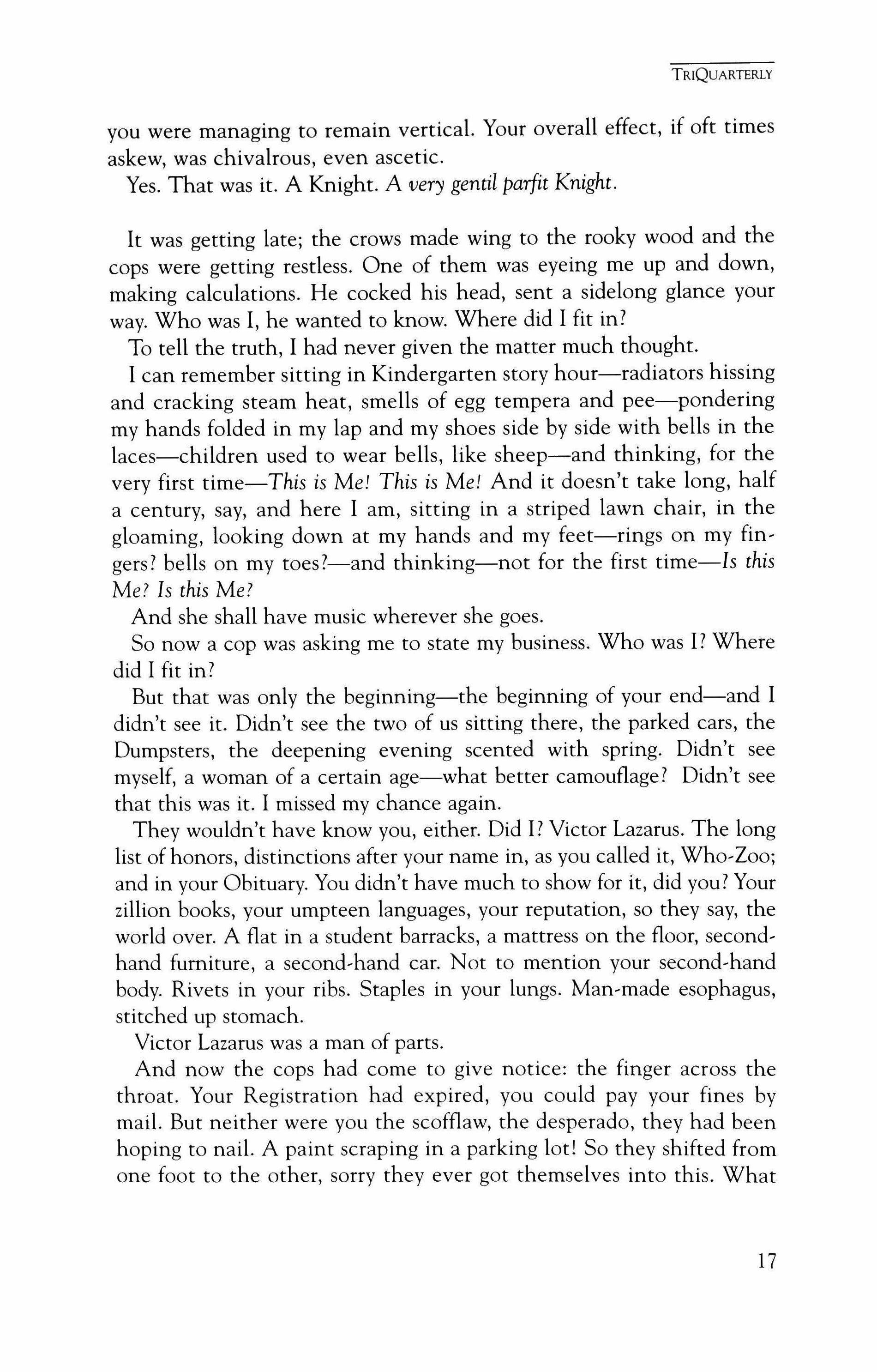
you were managing to remain vertical. Your overall effect, if oft times askew, was chivalrous, even ascetic.
Yes. That was it. A Knight. A very gentil parfit Knight.
It was getting late; the crows made wing to the rooky wood and the cops were getting restless. One of them was eyeing me up and down, making calculations. He cocked his head, sent a sidelong glance your way. Who was I, he wanted to know. Where did I fit in?
To tell the truth, I had never given the matter much thought.
I can remember sitting in Kindergarten story hour-radiators hissing and cracking steam heat, smells of egg tempera and pee-pondering my hands folded in my lap and my shoes side by side with bells in the laces-children used to wear bells, like sheep-and thinking, for the very first time-This is Me! This is Me! And it doesn't take long, half a century, say, and here I am, sitting in a striped lawn chair, in the gloaming, looking down at my hands and my feet-rings on my fingers? bells on my toes?-and thinking-not for the first time-Is this Me? Is this Me?
And she shall have music wherever she goes.
So now a cop was asking me to state my business. Who was I? Where did I fit in?
But that was only the beginning-the beginning of your end-and I didn't see it. Didn't see the two of us sitting there, the parked cars, the Dumpsters, the deepening evening scented with spring. Didn't see myself, a woman of a certain age-what better camouflage? Didn't see that this was it. I missed my chance again.
They wouldn't have know you, either. Did I? Victor Lazarus. The long list of honors, distinctions after your name in, as you called it, Who-Zoo; and in your Obituary. You didn't have much to show for it, did you? Your zillion books, your umpteen languages, your reputation, so they say, the world over. A flat in a student barracks, a mattress on the floor, secondhand furniture, a second-hand car. Not to mention your second-hand body. Rivets in your ribs. Staples in your lungs. Man-made esophagus, stitched up stomach.
Victor Lazarus was a man of parts.
And now the cops had come to give notice: the finger across the throat. Your Registration had expired, you could pay your fines by mail. But neither were you the scofflaw, the desperado, they had been hoping to nail. A paint scraping in a parking lot! So they shifted from one foot to the other, sorry they ever got themselves into this. What
TRIQUARTERLY
17
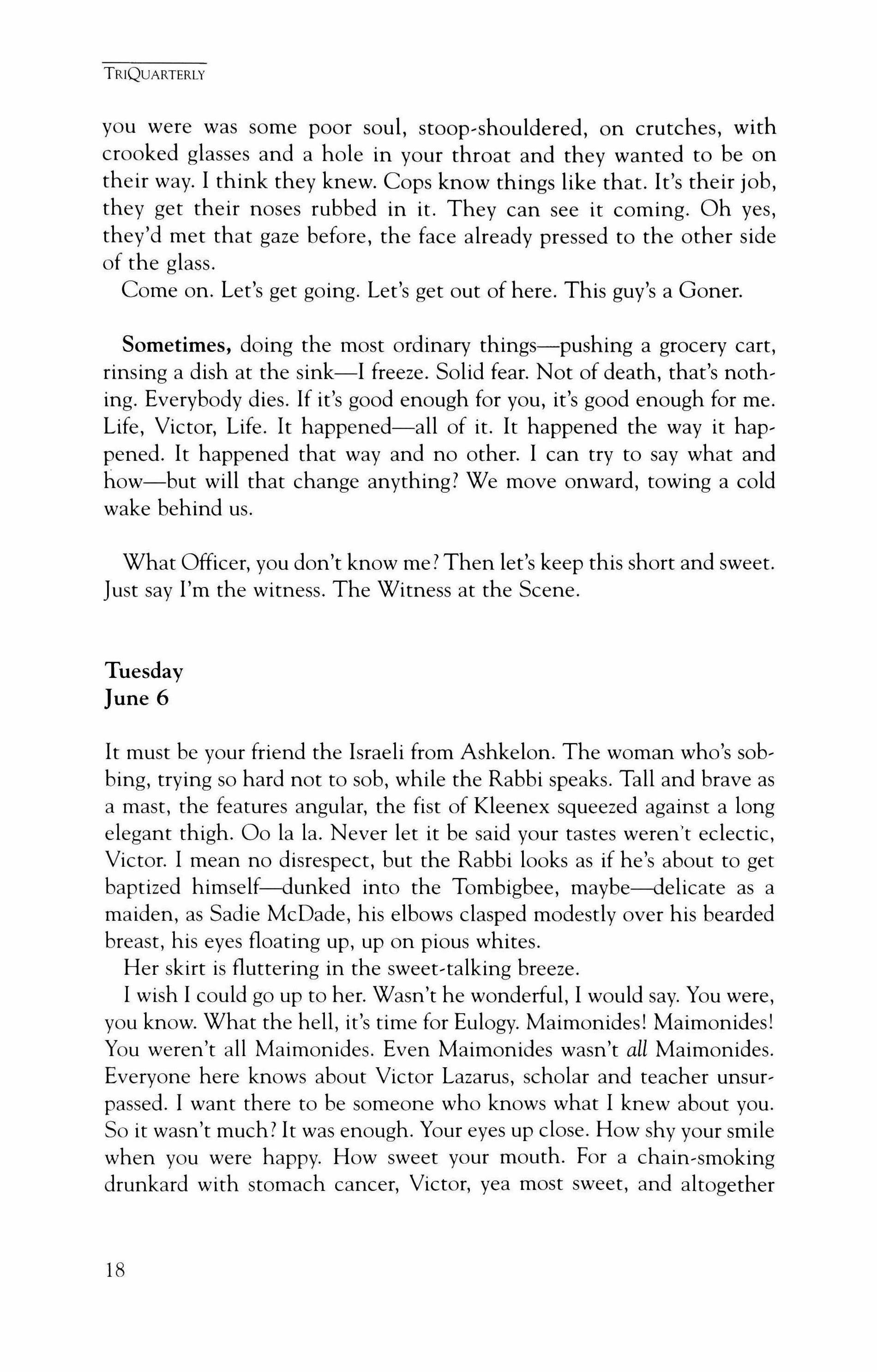
you were was some poor soul, stoop-shouldered, on crutches, with crooked glasses and a hole in your throat and they wanted to be on their way. I think they knew. Cops know things like that. It's their job, they get their noses rubbed in it. They can see it coming. Oh yes, they'd met that gaze before, the face already pressed to the other side of the glass.
Come on. Let's get going. Let's get out of here. This guy's a Goner.
Sometimes, doing the most ordinary things-pushing a grocery cart, rinsing a dish at the sink-I freeze. Solid fear. Not of death, that's nothing. Everybody dies. If it's good enough for you, it's good enough for me. Life, Victor, Life. It happened-all of it. It happened the way it happened. It happened that way and no other. I can try to say what and how-but will that change anything? We move onward, towing a cold wake behind us.
What Officer, you don't know me? Then let's keep this short and sweet. Just say I'm the witness. The Witness at the Scene.
Tuesday June 6
It must be your friend the Israeli from Ashkelon. The woman who's sobbing, trying so hard not to sob, while the Rabbi speaks. Tall and brave as a mast, the features angular, the fist of Kleenex squeezed against a long elegant thigh. 00 la lao Never let it be said your tastes weren't eclectic, Victor. I mean no disrespect, but the Rabbi looks as if he's about to get baptized himself-dunked into the Tombigbee, maybe-delicate as a maiden, as Sadie McDade, his elbows clasped modestly over his bearded breast, his eyes floating up, up on pious whites.
Her skirt is fluttering in the sweet-talking breeze. I wish I could go up to her. Wasn't he wonderful, I would say. You were, you know. What the hell, it's time for Eulogy. Maimonides! Maimonides! You weren't all Maimonides. Even Maimonides wasn't all Maimonides. Everyone here knows about Victor Lazarus, scholar and teacher unsurpassed. I want there to be someone who knows what I knew about you. So it wasn't much? It was enough. Your eyes up close. How shy your smile when you were happy. How sweet your mouth. For a chain-smoking drunkard with stomach cancer, Victor, yea most sweet, and altogether
TRIQUARTERLY
18
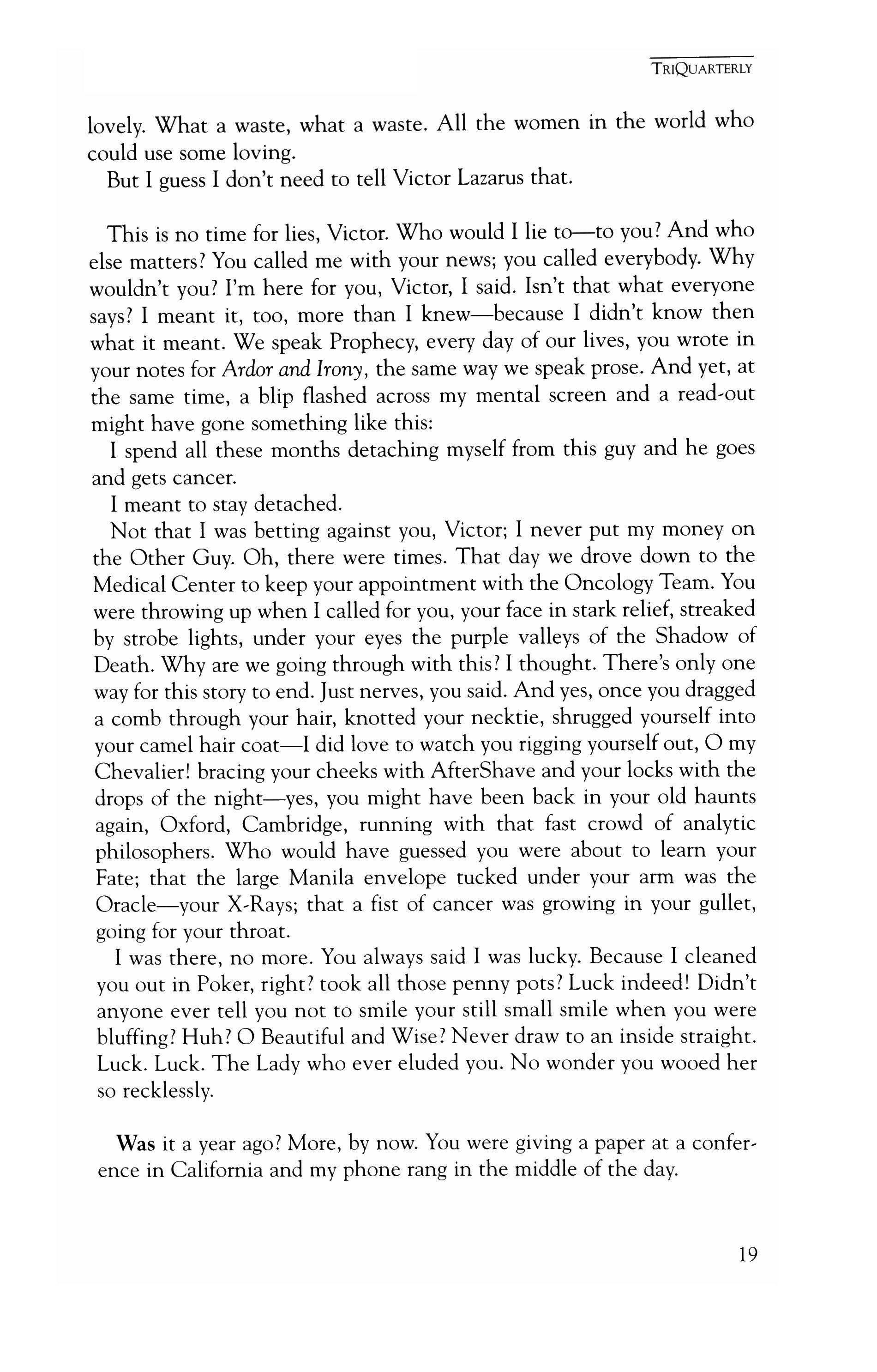
lovely. What a waste, what a waste. All the women in the world who could use some loving.
But I guess I don't need to tell Victor Lazarus that.
This is no time for lies, Victor. Who would I lie to-to you? And who else matters? You called me with your news; you called everybody. Why wouldn't you? I'm here for you, Victor, I said. Isn't that what everyone says? I meant it, too, more than I knew-because I didn't know then what it meant. We speak Prophecy, every day of our lives, you wrote in your notes for Ardor and Irony, the same way we speak prose. And yet, at the same time, a blip flashed across my mental screen and a read-out might have gone something like this:
I spend all these months detaching myself from this guy and he goes and gets cancer.
I meant to stay detached.
Not that I was betting against you, Victor; I never put my money on the Other Guy. Oh, there were times. That day we drove down to the Medical Center to keep your appointment with the Oncology Team. You were throwing up when I called for you, your face in stark relief, streaked by strobe lights, under your eyes the purple valleys of the Shadow of Death. Why are we going through with this? I thought. There's only one way for this story to end. Just nerves, you said. And yes, once you dragged a comb through your hair, knotted your necktie, shrugged yourself into your camel hair coat-I did love to watch you rigging yourself out, 0 my Chevalier! bracing your cheeks with AfterShave and your locks with the drops of the night-yes, you might have been back in your old haunts again, Oxford, Cambridge, running with that fast crowd of analytic philosophers. Who would have guessed you were about to learn your Fate; that the large Manila envelope tucked under your arm was the Oracle-your X-Rays; that a fist of cancer was growing in your gullet, going for your throat.
I was there, no more. You always said I was lucky. Because I cleaned you out in Poker, right? took all those penny pots? Luck indeed! Didn't anyone ever tell you not to smile your still small smile when you were bluffing? Huh? 0 Beautiful and Wise? Never draw to an inside straight. Luck. Luck. The Lady who ever eluded you. No wonder you wooed her so recklessly.
Was it a year ago? More, by now. You were giving a paper at a conference in California and my phone rang in the middle of the day.
TRIQUARTERLY
19
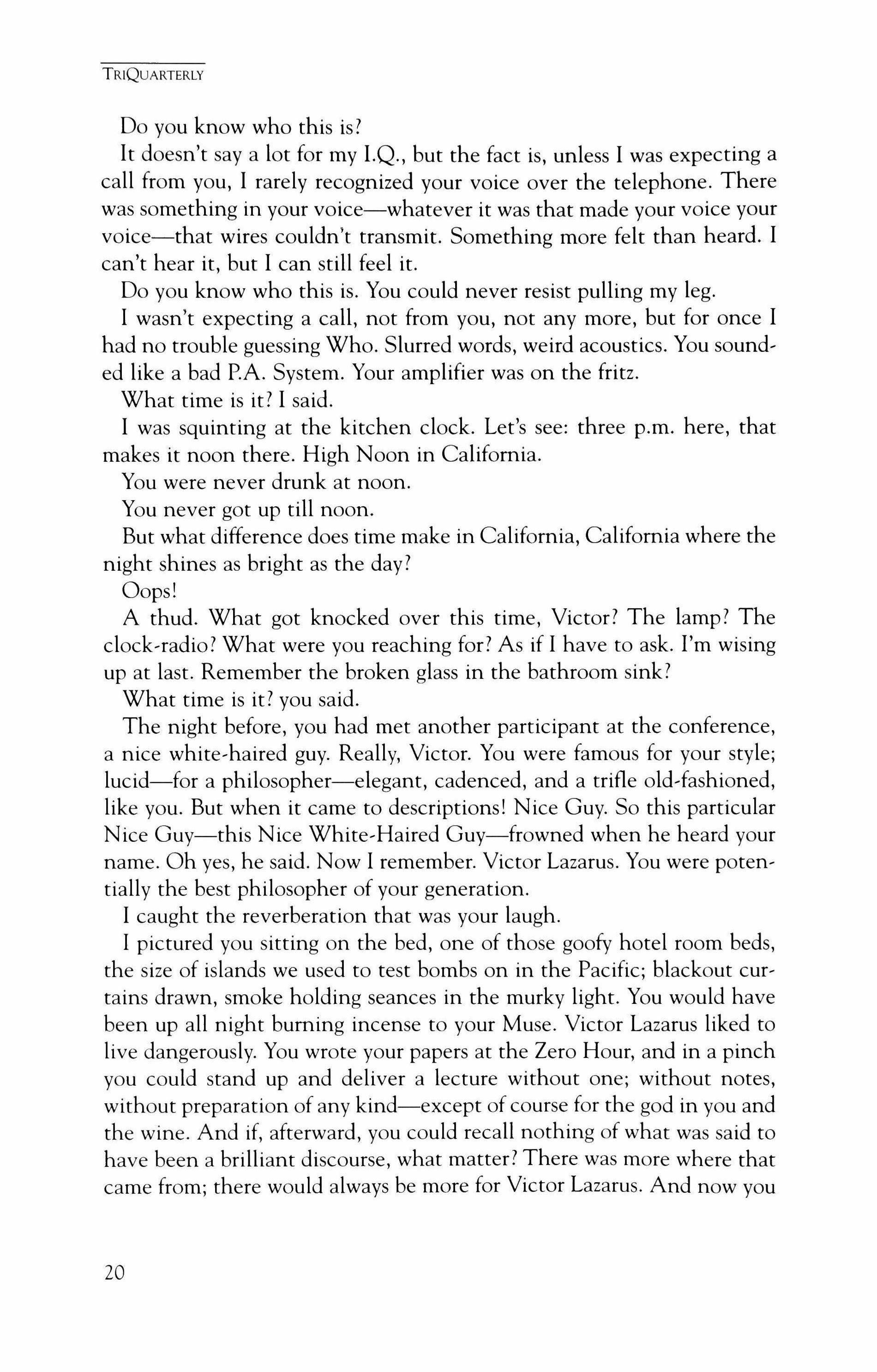
Do you know who this is?
It doesn't say a lot for my I.Q., but the fact is, unless I was expecting a call from you, I rarely recognized your voice over the telephone. There was something in your voice-whatever it was that made your voice your voice-that wires couldn't transmit. Something more felt than heard. I can't hear it, but I can still feel it.
Do you know who this is. You could never resist pulling my leg.
I wasn't expecting a call, not from you, not any more, but for once I had no trouble guessing Who. Slurred words, weird acoustics. You sounded like a bad P.A. System. Your amplifier was on the fritz.
What time is it? I said.
I was squinting at the kitchen clock. Let's see: three p.m. here, that makes it noon there. High Noon in California.
You were never drunk at noon.
You never got up till noon.
But what difference does time make in California, California where the night shines as bright as the day?
Oops!
A thud. What got knocked over this time, Victor? The lamp? The clock-radio? What were you reaching for? As if I have to ask. I'm wising up at last. Remember the broken glass in the bathroom sink?
What time is it? you said.
The night before, you had met another participant at the conference, a nice white-haired guy. Really, Victor. You were famous for your style; lucid-for a philosopher-elegant, cadenced, and a trifle old-fashioned, like you. But when it came to descriptions! Nice Guy. So this particular Nice Guy-this Nice White�Haired Guy-frowned when he heard your name. Oh yes, he said. Now I remember. Victor Lazarus. You were potentially the best philosopher of your generation.
I caught the reverberation that was your laugh.
I pictured you sitting on the bed, one of those goofy hotel room beds, the size of islands we used to test bombs on in the Pacific; blackout curtains drawn, smoke holding seances in the murky light. You would have been up all night burning incense to your Muse. Victor Lazarus liked to live dangerously. You wrote your papers at the Zero Hour, and in a pinch you could stand up and deliver a lecture without one; without notes, without preparation of any kind-except of course for the god in you and the wine. And if, afterward, you could recall nothing of what was said to have been a brilliant discourse, what matter? There was more where that came from; there would always be more for Victor Lazarus. And now you
TRIQUARTERLY
20
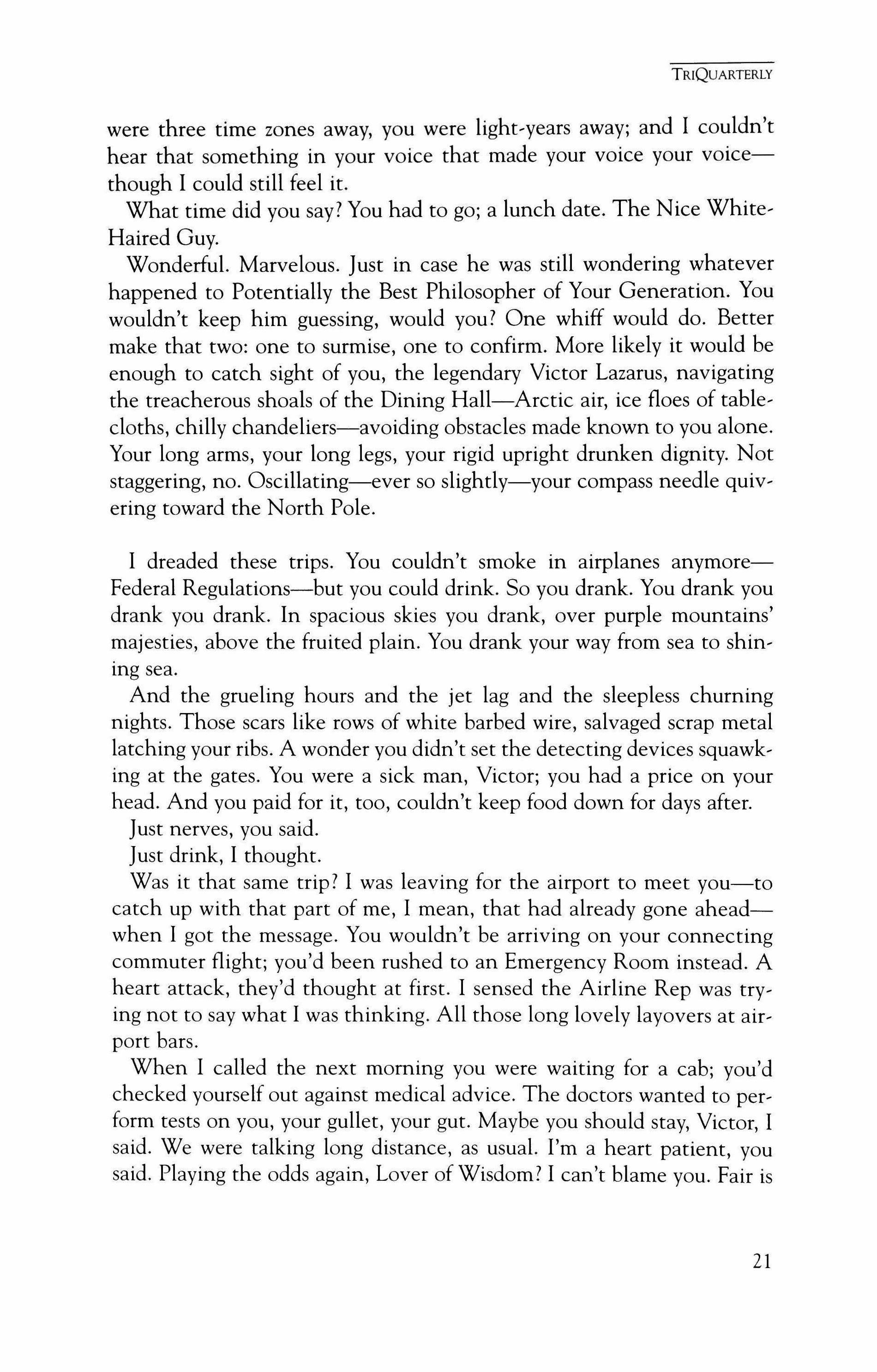
were three time zones away, you were light-years away; and I couldn't hear that something in your voice that made your voice your voicethough I could still feel it.
What time did you say? You had to go; a lunch date. The Nice WhiteHaired Guy.
Wonderful. Marvelous. Just in case he was still wondering whatever happened to Potentially the Best Philosopher of Your Generation. You wouldn't keep him guessing, would you? One whiff would do. Better make that two: one to surmise, one to confirm. More likely it would be enough to catch sight of you, the legendary Victor Lazarus, navigating the treacherous shoals of the Dining Hall-Arctic air, ice floes of tablecloths, chilly chandeliers-avoiding obstacles made known to you alone. Your long arms, your long legs, your rigid upright drunken dignity. Not staggering, no. Oscillating-ever so slightly-your compass needle quivering toward the North Pole.
I dreaded these trips. You couldn't smoke in airplanes anymoreFederal Regulations-but you could drink. So you drank. You drank you drank you drank. In spacious skies you drank, over purple mountains' majesties, above the fruited plain. You drank your way from sea to shining sea.
And the grueling hours and the jet lag and the sleepless churning nights. Those scars like rows of white barbed wire, salvaged scrap metal latching your ribs. A wonder you didn't set the detecting devices squawking at the gates. You were a sick man, Victor; you had a price on your head. And you paid for it, too, couldn't keep food down for days after.
Just nerves, you said.
Just drink, I thought.
Was it that same trip? I was leaving for the airport to meet you-to catch up with that part of me, I mean, that had already gone aheadwhen I got the message. You wouldn't be arriving on your connecting commuter flight; you'd been rushed to an Emergency Room instead. A heart attack, they'd thought at first. I sensed the Airline Rep was trying not to say what I was thinking. All those long lovely layovers at airport bars.
When I called the next morning you were waiting for a cab; you'd checked yourself out against medical advice. The doctors wanted to perform tests on you, your gullet, your gut. Maybe you should stay, Victor, I said. We were talking long distance, as usual. I'm a heart patient, you said. Playing the odds again, Lover of Wisdom? I can't blame you. Fair is
TRIQUARTERLY
21
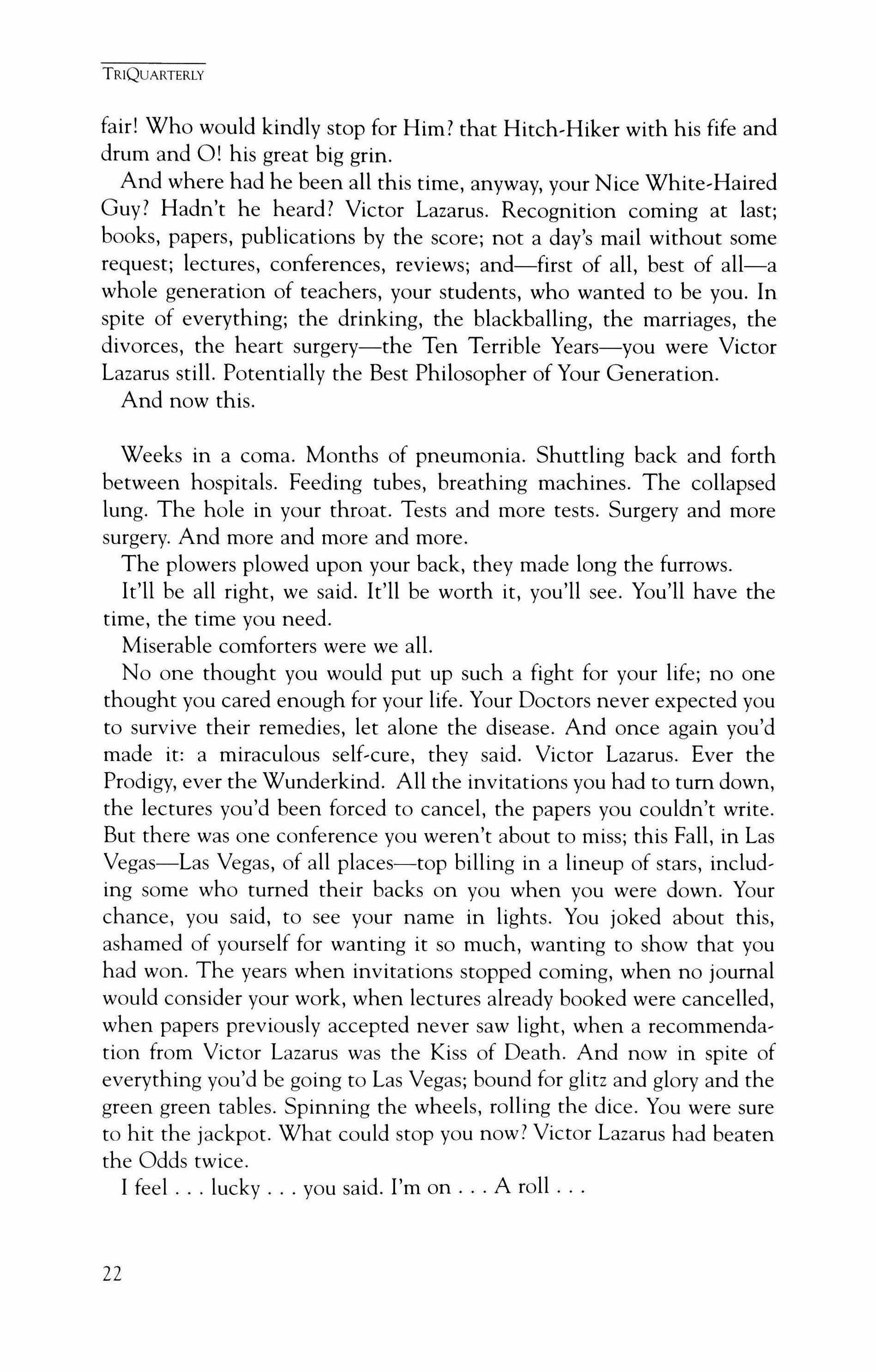
fair! Who would kindly stop for Him? that Hitch-Hiker with his fife and drum and O! his great big grin.
And where had he been all this time, anyway, your Nice White-Haired Guy? Hadn't he heard? Victor Lazarus. Recognition coming at last; books, papers, publications by the score; not a day's mail without some request; lectures, conferences, reviews; and-first of all, best of all-a whole generation of teachers, your students, who wanted to be you. In spite of everything; the drinking, the blackballing, the marriages, the divorces, the heart surgery-the Ten Terrible Years-you were Victor Lazarus still. Potentially the Best Philosopher of Your Generation.
And now this.
Weeks in a coma. Months of pneumonia. Shuttling back and forth between hospitals. Feeding tubes, breathing machines. The collapsed lung. The hole in your throat. Tests and more tests. Surgery and more surgery. And more and more and more.
The plowers plowed upon your back, they made long the furrows. It'll be all right, we said. It'll be worth it, you'll see. You'll have the time, the time you need.
Miserable comforters were we all.
No one thought you would put up such a fight for your life; no one thought you cared enough for your life. Your Doctors never expected you to survive their remedies, let alone the disease. And once again you'd made it: a miraculous self-cure, they said. Victor Lazarus. Ever the Prodigy, ever the Wunderkind. All the invitations you had to tum down, the lectures you'd been forced to cancel, the papers you couldn't write. But there was one conference you weren't about to miss; this Fall, in Las Vegas-Las Vegas, of all places-top billing in a lineup of stars, including some who turned their backs on you when you were down. Your chance, you said, to see your name in lights. You joked about this, ashamed of yourself for wanting it so much, wanting to show that you had won. The years when invitations stopped coming, when no journal would consider your work, when lectures already booked were cancelled, when papers previously accepted never saw light, when a recommendation from Victor Lazarus was the Kiss of Death. And now in spite of everything you'd be going to Las Vegas; bound for glitz and glory and the green green tables. Spinning the wheels, rolling the dice. You were sure to hit the jackpot. What could stop you now? Victor Lazarus had beaten the Odds twice.
I feel lucky you said. I'm on A roll
TRIQUARTERLY
22
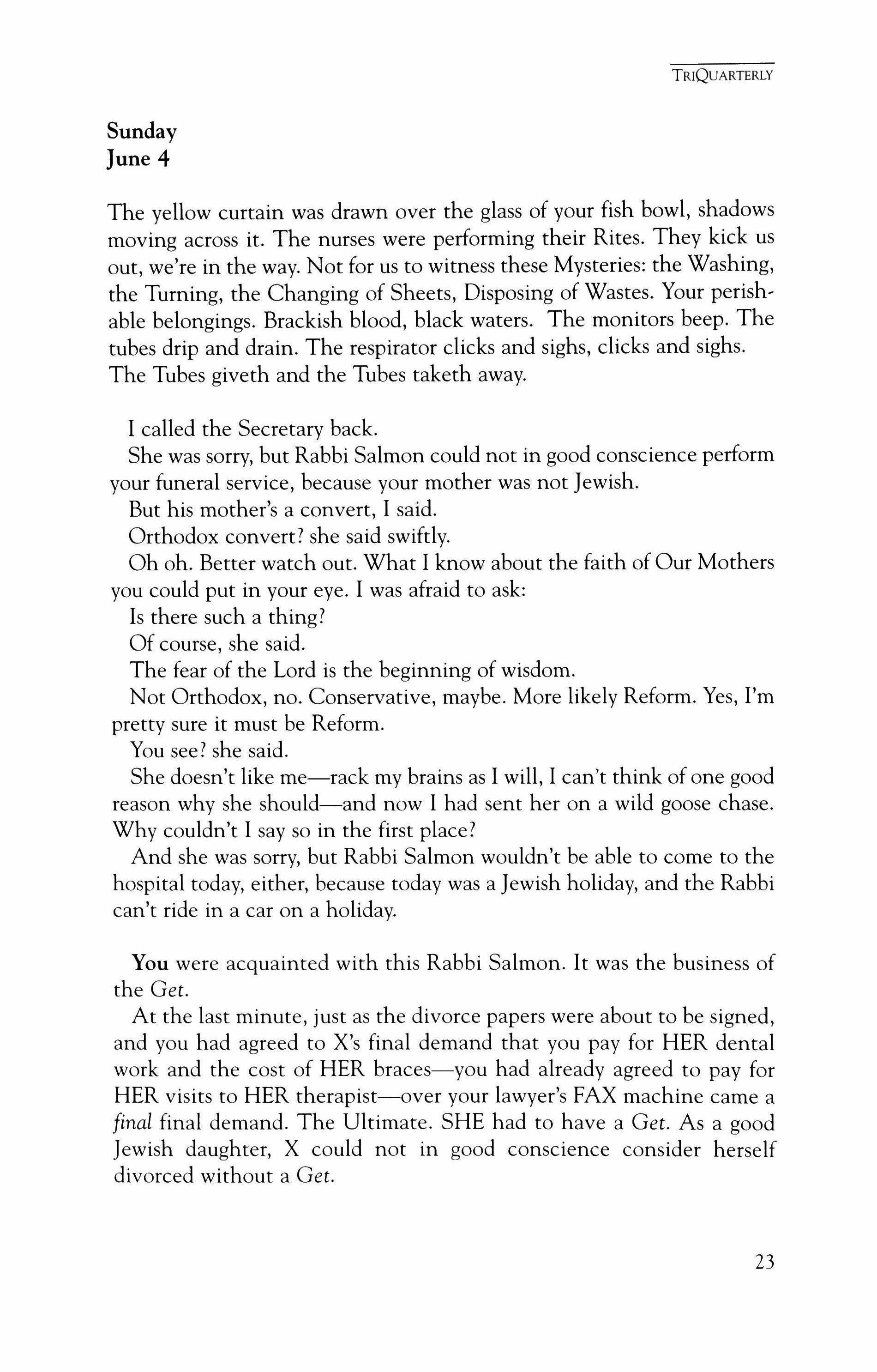
Sunday
June 4
The yellow curtain was drawn over the glass of your fish bowl, shadows moving across it. The nurses were performing their Rites. They kick us out, we're in the way. Not for us to witness these Mysteries: the Washing, the Turning, the Changing of Sheets, Disposing of Wastes. Your perishable belongings. Brackish blood, black waters. The monitors beep. The tubes drip and drain. The respirator clicks and sighs, clicks and sighs. The Tubes giveth and the Tubes taketh away.
I called the Secretary back.
She was sorry, but Rabbi Salmon could not in good conscience perform your funeral service, because your mother was not Jewish.
But his mother's a convert, I said. Orthodox convert? she said swiftly.
Oh oh. Better watch out. What I know about the faith of Our Mothers you could put in your eye. I was afraid to ask: Is there such a thing?
Of course, she said.
The fear of the Lord is the beginning of wisdom. Not Orthodox, no. Conservative, maybe. More likely Reform. Yes, I'm pretty sure it must be Reform.
You see? she said.
She doesn't like me-rack my brains as I will, I can't think of one good reason why she should-and now I had sent her on a wild goose chase. Why couldn't I say so in the first place?
And she was sorry, but Rabbi Salmon wouldn't be able to come to the hospital today, either, because today was a Jewish holiday, and the Rabbi can't ride in a car on a holiday.
You were acquainted with this Rabbi Salmon. It was the business of the Get.
At the last minute, just as the divorce papers were about to be signed, and you had agreed to X's final demand that you pay for HER dental work and the cost of HER braces-you had already agreed to pay for HER visits to HER therapist-over your lawyer's FAX machine came a final final demand. The Ultimate. SHE had to have a Get. As a good Jewish daughter, X could not in good conscience consider herself divorced without a Get.
TRIQUARTERLY
23
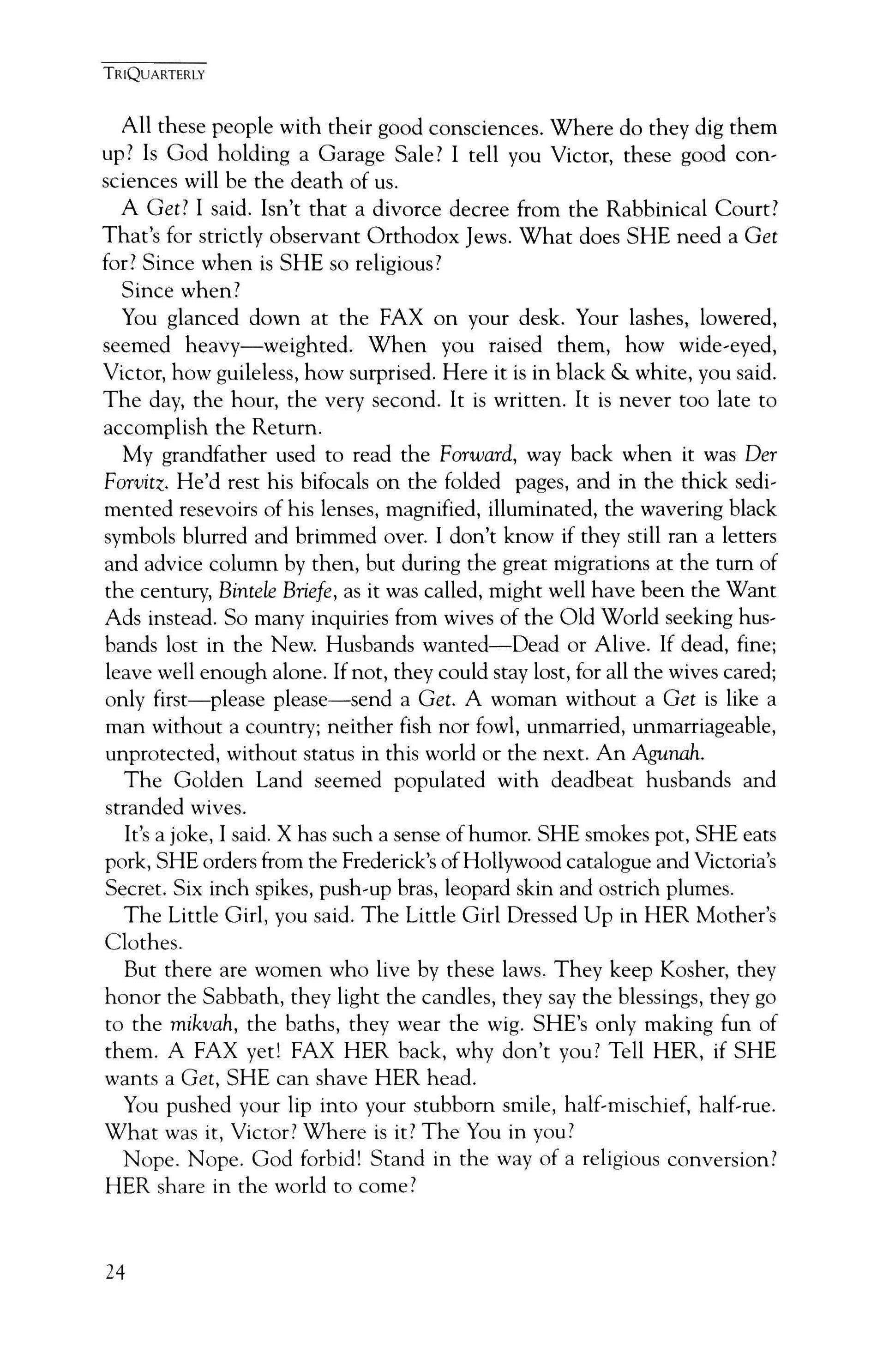
TRIQUARTERLY
All these people with their good consciences. Where do they dig them Up? Is God holding a Garage Sale? I tell you Victor, these good consciences will be the death of us.
A Get? I said. Isn't that a divorce decree from the Rabbinical Court? That's for strictly observant Orthodox Jews. What does SHE need a Get for? Since when is SHE so religious?
Since when?
You glanced down at the FAX on your desk. Your lashes, lowered, seemed heavy-weighted. When you raised them, how wide-eyed, Victor, how guileless, how surprised. Here it is in black & white, you said. The day, the hour, the very second. It is written. It is never too late to accomplish the Return.
My grandfather used to read the Forward, way back when it was Der Forvitz. He'd rest his bifocals on the folded pages, and in the thick sedimented resevoirs of his lenses, magnified, illuminated, the wavering black symbols blurred and brimmed over. I don't know if they still ran a letters and advice column by then, but during the great migrations at the tum of the century, Bintele Briefe, as it was called, might well have been the Want Ads instead. So many inquiries from wives of the Old World seeking husbands lost in the New. Husbands wanted-Dead or Alive. If dead, fine; leave well enough alone. If not, they could stay lost, for all the wives cared; only first-please please-send a Get. A woman without a Get is like a man without a country; neither fish nor fowl, unmarried, unmarriageable, unprotected, without status in this world or the next. An Agunah.
The Golden Land seemed populated with deadbeat husbands and stranded wives.
It's a joke, I said. X has such a sense ofhumor. SHE smokes pot, SHE eats pork, SHE orders from the Frederick's ofHollywood catalogue and Victoria's Secret. Six inch spikes, push-up bras, leopard skin and ostrich plumes.
The Little Girl, you said. The Little Girl Dressed Up in HER Mother's Clothes.
But there are women who live by these laws. They keep Kosher, they honor the Sabbath, they light the candles, they say the blessings, they go to the mikvah, the baths, they wear the wig. SHE's only making fun of them. A FAX yet! FAX HER back, why don't you? Tell HER, if SHE wants a Get, SHE can shave HER head.
You pushed your lip into your stubborn smile, half-mischief, half-rue. What was it, Victor? Where is it? The You in you?
Nope. Nope. God forbid! Stand in the way of a religious conversion? HER share in the world to come?
24
HER share of your flesh, you mean. So be it, you said. I gotta get a Get.
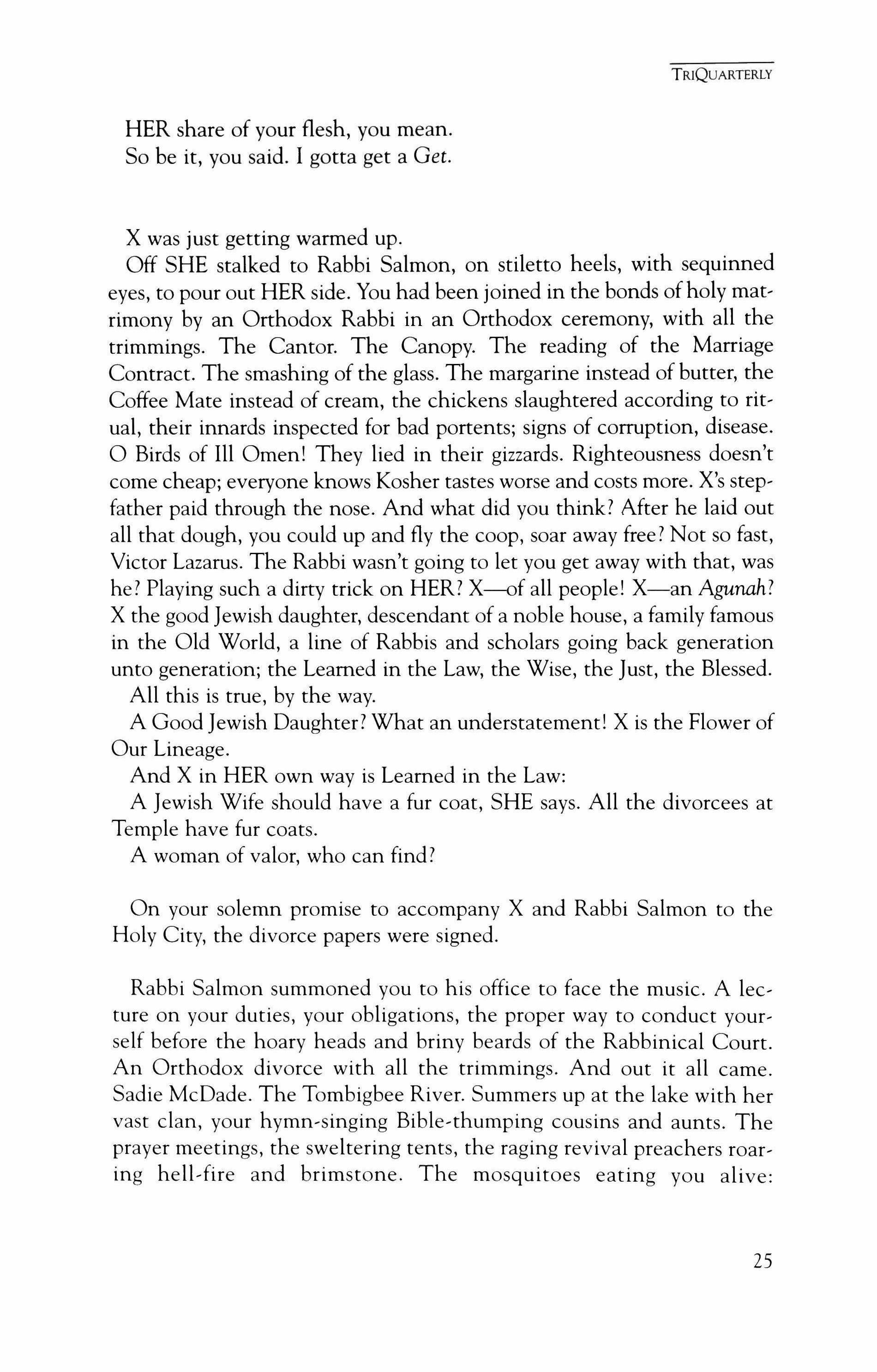
X was just getting warmed up.
Off SHE stalked to Rabbi Salmon, on stiletto heels, with sequinned eyes, to pour out HER side. You had been joined in the bonds ofholy matrimony by an Orthodox Rabbi in an Orthodox ceremony, with all the trimmings. The Cantor. The Canopy. The reading of the Marriage Contract. The smashing of the glass. The margarine instead of butter, the Coffee Mate instead of cream, the chickens slaughtered according to ritual, their innards inspected for bad portents; signs of corruption, disease. o Birds of III Omen! They lied in their gizzards. Righteousness doesn't come cheap; everyone knows Kosher tastes worse and costs more. X's stepfather paid through the nose. And what did you think? After he laid out all that dough, you could up and fly the coop, soar away free? Not so fast, Victor Lazarus. The Rabbi wasn't going to let you get away with that, was he? Playing such a dirty trick on HER? X-of all people! X-an Agunah? X the good Jewish daughter, descendant of a noble house, a family famous in the Old World, a line of Rabbis and scholars going back generation unto generation; the Learned in the Law, the Wise, the Just, the Blessed.
All this is true, by the way.
A Good Jewish Daughter? What an understatement! X is the Flower of Our Lineage.
And X in HER own way is Learned in the Law:
A Jewish Wife should have a fur coat, SHE says. All the divorcees at Temple have fur coats.
A woman of valor, who can find?
On your solemn promise to accompany X and Rabbi Salmon to the Holy City, the divorce papers were signed.
Rabbi Salmon summoned you to his office to face the music. A lecture on your duties, your obligations, the proper way to conduct yourself before the hoary heads and briny beards of the Rabbinical Court. An Orthodox divorce with all the trimmings. And out it all came. Sadie McDade. The Tombigbee River. Summers up at the lake with her vast clan, your hymn-singing Bible-thumping cousins and aunts. The prayer meetings, the sweltering tents, the raging revival preachers roaring hell-fire and brimstone. The mosquitoes eating you alive:
TRIQUARTERLY
25
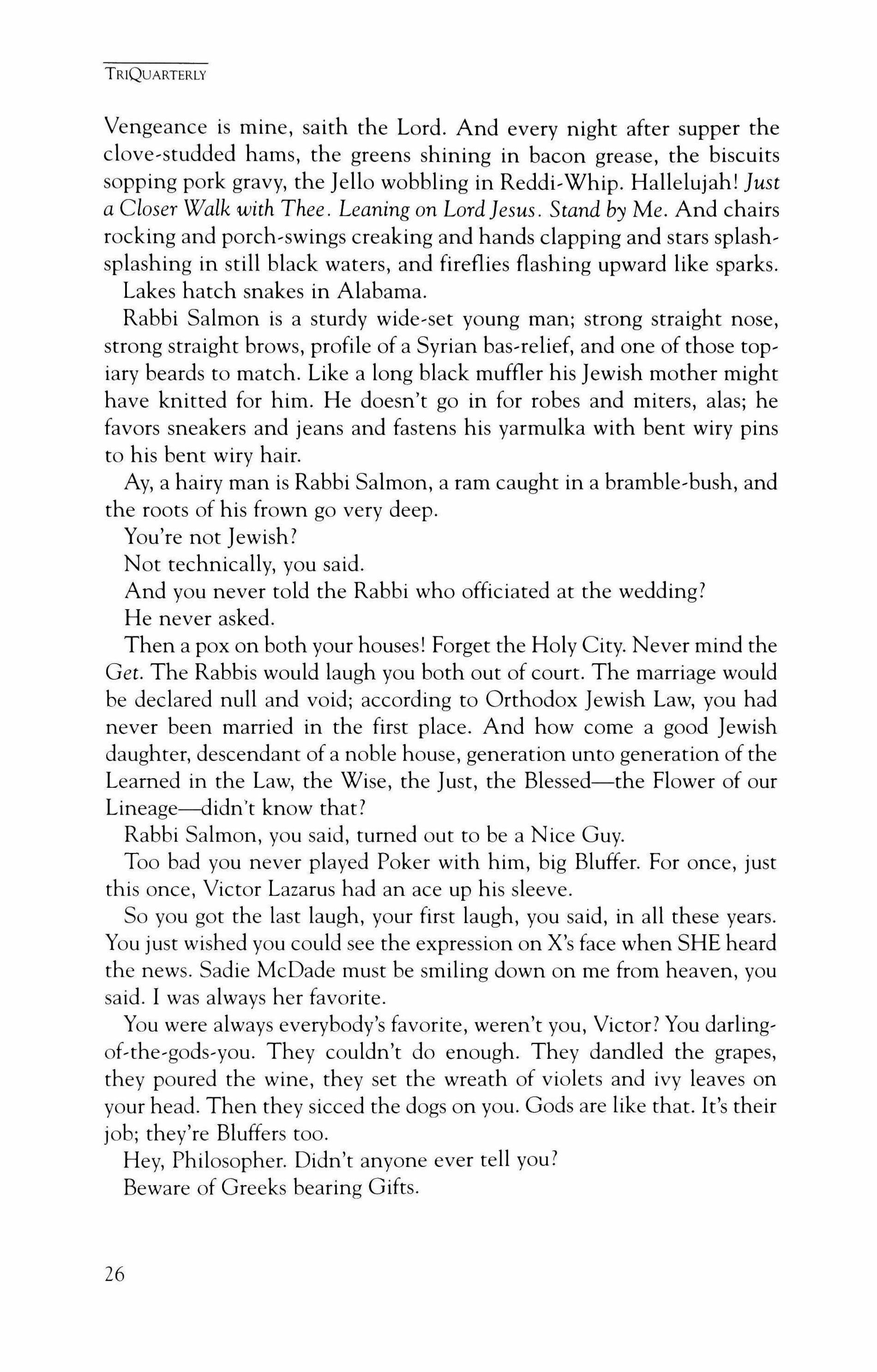
Vengeance is mine, saith the Lord. And every night after supper the clove-studded hams, the greens shining in bacon grease, the biscuits sopping pork gravy, the [ello wobbling in Reddi-Whip. Hallelujah! lust a Closer Walk with Thee. Leaning on Lordlesus. Stand by Me. And chairs rocking and porch-swings creaking and hands clapping and stars splashsplashing in still black waters, and fireflies flashing upward like sparks.
Lakes hatch snakes in Alabama.
Rabbi Salmon is a sturdy wide-set young man; strong straight nose, strong straight brows, profile of a Syrian bas-relief, and one of those topiary beards to match. Like a long black muffler his Jewish mother might have knitted for him. He doesn't go in for robes and miters, alas; he favors sneakers and jeans and fastens his yarmulka with bent wiry pins to his bent wiry hair.
Ay, a hairy man is Rabbi Salmon, a ram caught in a bramble-bush, and the roots of his frown go very deep.
You're not Jewish?
Not technically, you said.
And you never told the Rabbi who officiated at the wedding?
He never asked.
Then a pox on both your houses! Forget the Holy City. Never mind the Get. The Rabbis would laugh you both out of court. The marriage would be declared null and void; according to Orthodox Jewish Law, you had never been married in the first place. And how come a good Jewish daughter, descendant of a noble house, generation unto generation of the Learned in the Law, the Wise, the Just, the Blessed-the Flower of our Lineage-didn't know that?
Rabbi Salmon, you said, turned out to be a Nice Guy.
Too bad you never played Poker with him, big Bluffer. For once, just this once, Victor Lazarus had an ace up his sleeve.
So you got the last laugh, your first laugh, you said, in all these years. You just wished you could see the expression on X's face when SHE heard the news. Sadie McDade must be smiling down on me from heaven, you said. I was always her favorite.
You were always everybody's favorite, weren't you, Victor? You darlingof-the-gods-you. They couldn't do enough. They dandled the grapes, they poured the wine, they set the wreath of violets and ivy leaves on your head. Then they sicced the dogs on you. Gods are like that. It's their job; they're Bluffers too.
Hey, Philosopher. Didn't anyone ever tell you?
Beware of Greeks bearing Gifts.
TRIQUARTERLY
26
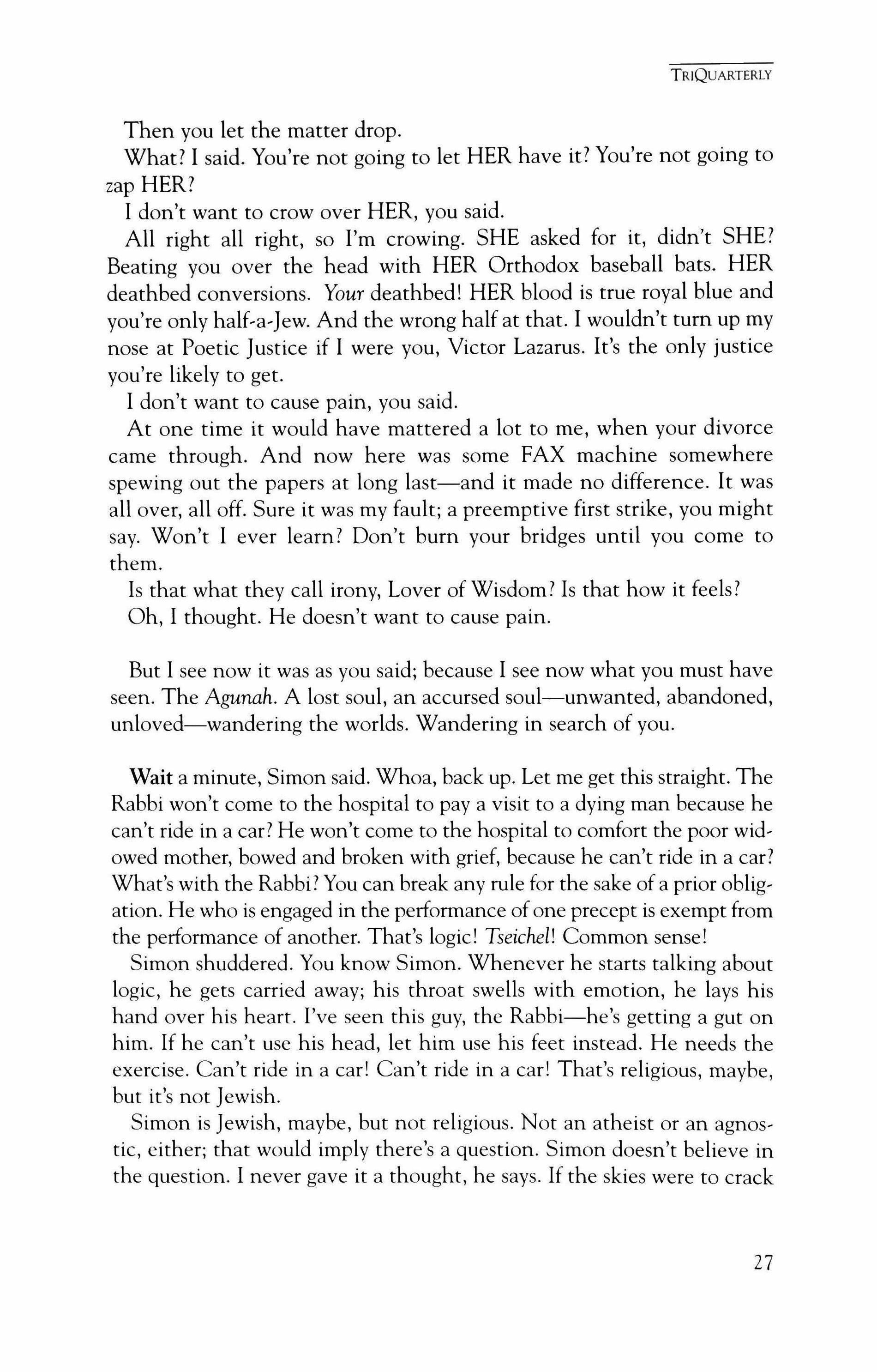
Then you let the matter drop. What? I said. You're not going to let HER have it? You're not going to zap HER?
I don't want to crow over HER, you said. All right all right, so I'm crowing. SHE asked for it, didn't SHE? Beating you over the head with HER Orthodox baseball bats. HER deathbed conversions. Your deathbed! HER blood is true royal blue and you're only half-a-Jew. And the wrong half at that. I wouldn't tum up my nose at Poetic Justice if I were you, Victor Lazarus. It's the only justice you're likely to get.
I don't want to cause pain, you said.
At one time it would have mattered a lot to me, when your divorce came through. And now here was some FAX machine somewhere spewing out the papers at long last-and it made no difference. It was all over, all off. Sure it was my fault; a preemptive first strike, you might say. Won't I ever learn? Don't burn your bridges until you come to them.
Is that what they call irony, Lover of Wisdom? Is that how it feels?
Oh, I thought. He doesn't want to cause pain.
But I see now it was as you said; because I see now what you must have seen. The Agunah. A lost soul, an accursed soul-unwanted, abandoned, unloved-wandering the worlds. Wandering in search of you.
Wait a minute, Simon said. Whoa, back up. Let me get this straight. The Rabbi won't come to the hospital to pay a visit to a dying man because he can't ride in a car? He won't come to the hospital to comfort the poor widowed mother, bowed and broken with grief, because he can't ride in a car? What's with the Rabbi? You can break any rule for the sake of a prior obligation. He who is engaged in the performance of one precept is exempt from the performance of another. That's logic! Tseichel! Common sense!
Simon shuddered. You know Simon. Whenever he starts talking about logic, he gets carried away; his throat swells with emotion, he lays his hand over his heart. I've seen this guy, the Rabbi-he's getting a gut on him. If he can't use his head, let him use his feet instead. He needs the exercise. Can't ride in a car! Can't ride in a car! That's religious, maybe, but it's not Jewish.
Simon is Jewish, maybe, but not religious. Not an atheist or an agnostic, either; that would imply there's a question. Simon doesn't believe in the question. I never gave it a thought, he says. If the skies were to crack
TRIQUARTERLY
27
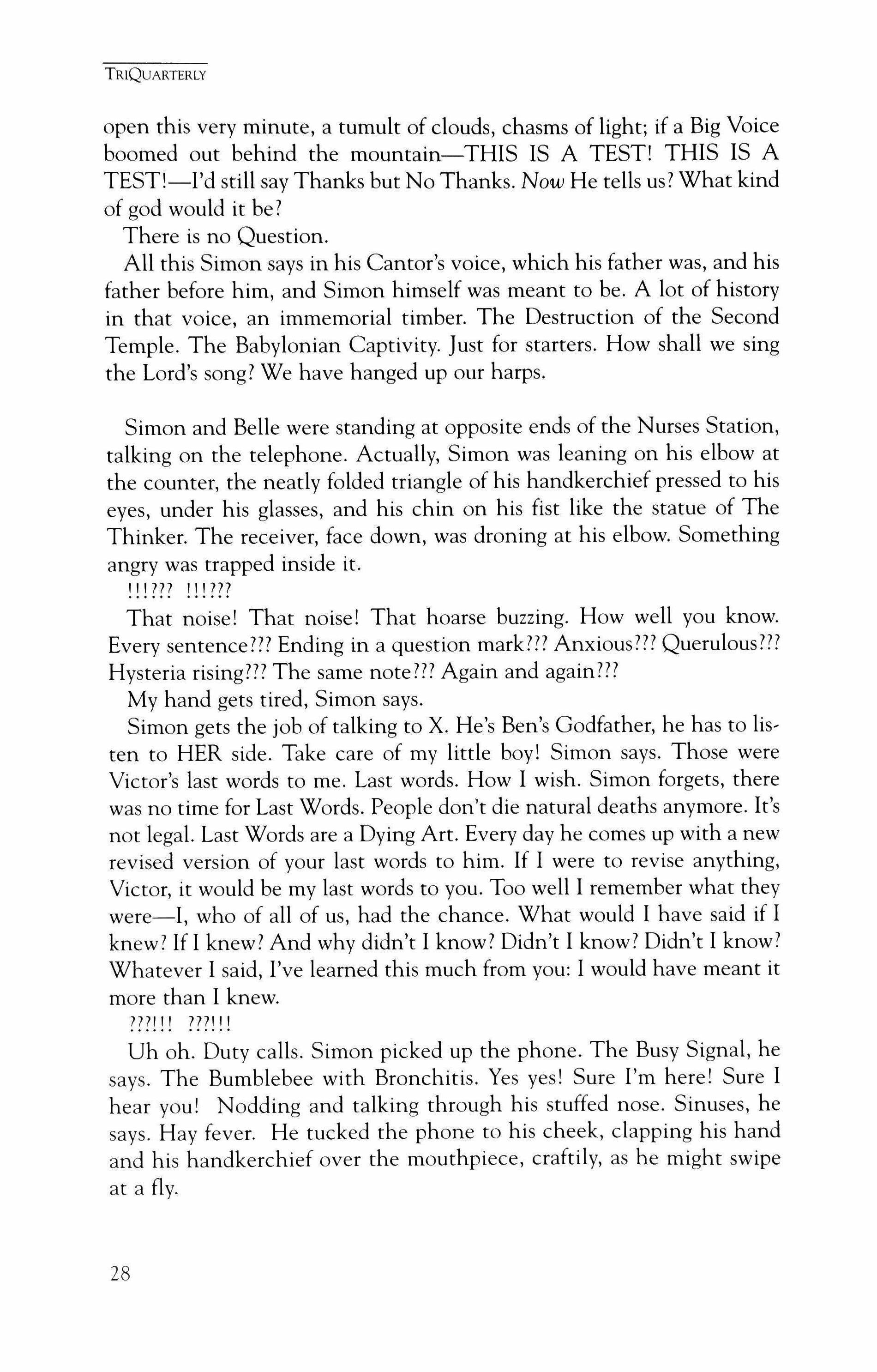
open this very minute, a tumult of clouds, chasms of light; if a Big Voice boomed out behind the mountain-THIS IS A TEST! THIS IS A TEST!-I'd still say Thanks but No Thanks. Now He tells us? What kind of god would it be?
There is no Question.
All this Simon says in his Cantor's voice, which his father was, and his father before him, and Simon himself was meant to be. A lot of history in that voice, an immemorial timber. The Destruction of the Second Temple. The Babylonian Captivity. Just for starters. How shall we sing the Lord's song? We have hanged up our harps.
Simon and Belle were standing at opposite ends of the Nurses Station, talking on the telephone. Actually, Simon was leaning on his elbow at the counter, the neatly folded triangle of his handkerchief pressed to his eyes, under his glasses, and his chin on his fist like the statue of The Thinker. The receiver, face down, was droning at his elbow. Something angry was trapped inside it.
"'777 "'777
That noise! That noise! That hoarse buzzing. How well you know. Every sentence??? Ending in a question mark??? Anxious??? Querulous??? Hysteria rising??? The same note??? Again and again???
My hand gets tired, Simon says.
Simon gets the job of talking to X. He's Ben's Godfather, he has to listen to HER side. Take care of my little boy! Simon says. Those were Victor's last words to me. Last words. How I wish. Simon forgets, there was no time for Last Words. People don't die natural deaths anymore. It's not legal. Last Words are a Dying Art. Every day he comes up with a new revised version of your last words to him. If I were to revise anything, Victor, it would be my last words to you. Too well I remember what they were-I, who of all of us, had the chance. What would I have said if I knew? If I knew? And why didn't I know? Didn't I know? Didn't I know? Whatever I said, I've learned this much from you: I would have meant it more than I knew.
777"1 7771 I I
Uh oh. Duty calls. Simon picked up the phone. The Busy Signal, he says. The Bumblebee with Bronchitis. Yes yes! Sure I'm here! Sure I hear you! Nodding and talking through his stuffed nose. Sinuses, he says. Hay fever. He tucked the phone to his cheek, clapping his hand and his handkerchief over the mouthpiece, craftily, as he might swipe at a fly.
TRIQUARTERLY
28
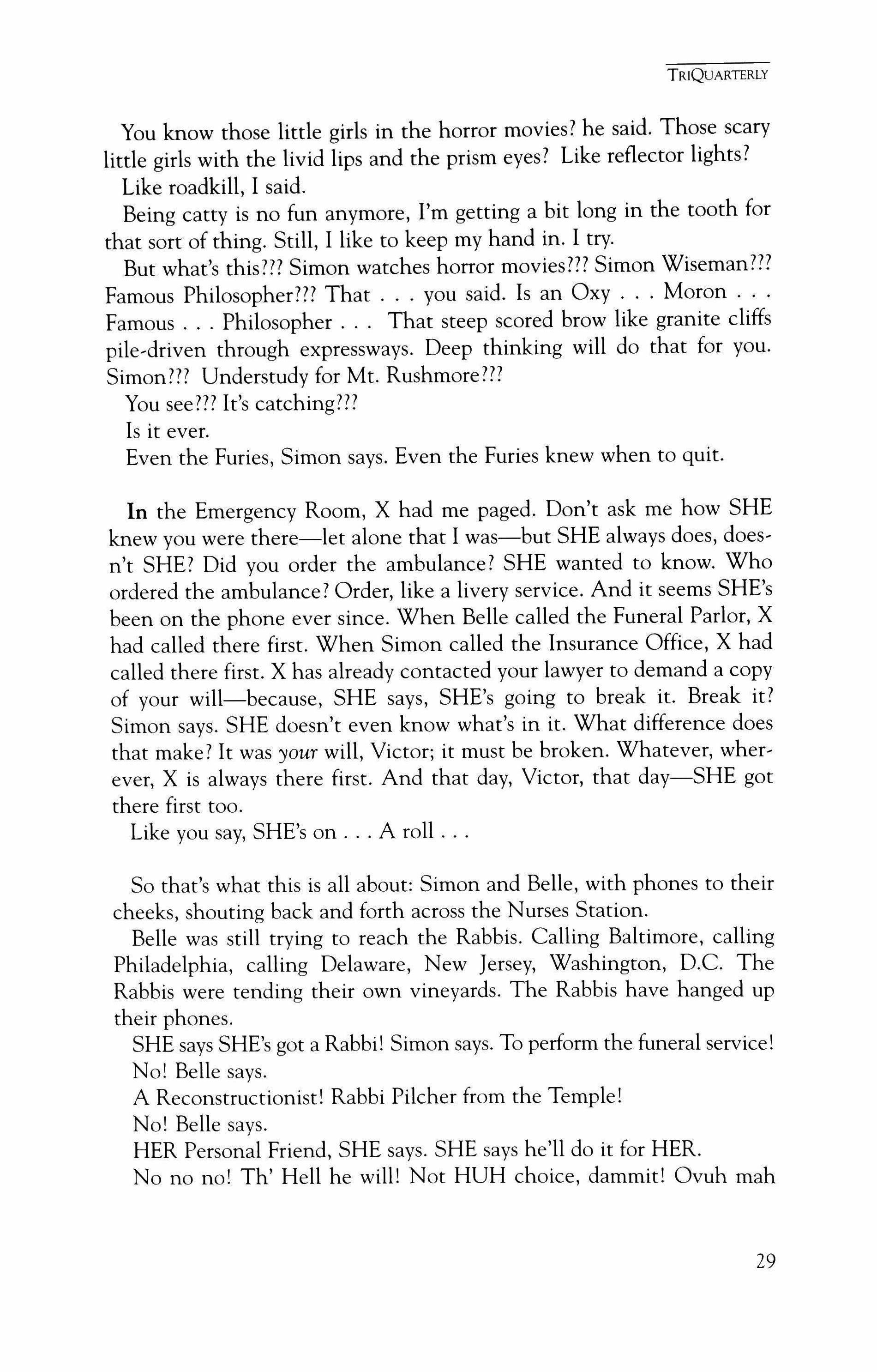
You know those little girls in the horror movies? he said. Those scary little girls with the livid lips and the prism eyes? Like reflector lights?
Like roadkill, I said.
Being catty is no fun anymore, I'm getting a bit long in the tooth for that sort of thing. Still, I like to keep my hand in. I try.
But what's this??? Simon watches horror movies??? Simon Wiseman??? Famous Philosopher??? That you said. Is an Oxy Moron Famous Philosopher. That steep scored brow like granite cliffs pile-driven through expressways. Deep thinking will do that for you. Simon??? Understudy for Mt. Rushmore???
You see??? It's catching??? Is it ever.
Even the Furies, Simon says. Even the Furies knew when to quit.
In the Emergency Room, X had me paged. Don't ask me how SHE knew you were there-let alone that I was-but SHE always does, doesn't SHE? Did you order the ambulance? SHE wanted to know. Who ordered the ambulance? Order, like a livery service. And it seems SHE's been on the phone ever since. When Belle called the Funeral Parlor, X had called there first. When Simon called the Insurance Office, X had called there first. X has already contacted your lawyer to demand a copy of your will-because, SHE says, SHE's going to break it. Break it? Simon says. SHE doesn't even know what's in it. What difference does that make? It was your will, Victor; it must be broken. Whatever, wherever, X is always there first. And that day, Victor, that day-SHE got there first too.
Like you say, SHE's on A roll
So that's what this is all about: Simon and Belle, with phones to their cheeks, shouting back and forth across the Nurses Station.
Belle was still trying to reach the Rabbis. Calling Baltimore, calling Philadelphia, calling Delaware, New Jersey, Washington, D.C. The Rabbis were tending their own vineyards. The Rabbis have hanged up their phones.
SHE says SHE's got a Rabbi! Simon says. To perform the funeral service! No! Belle says.
A Reconstructionist! Rabbi Pilcher from the Temple! No! Belle says.
HER Personal Friend, SHE says. SHE says he'll do it for HER. No no no! Th' Hell he will! Not HUH choice, dammit! Ovuh mah
TRIQUARTERLY
29
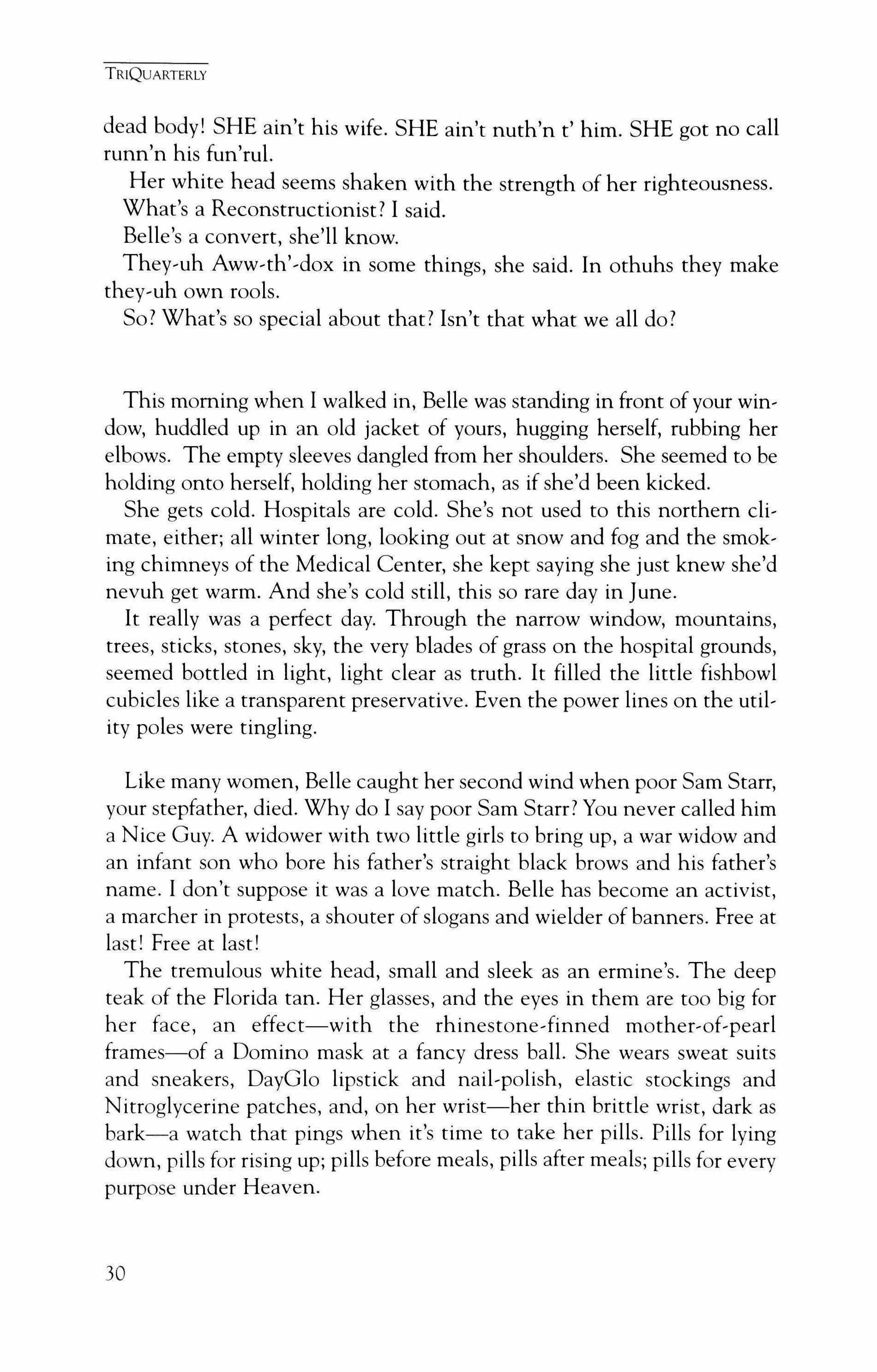
dead body! SHE ain't his wife. SHE ain't nuth'n t' him. SHE got no call runn'n his fun'rul.
Her white head seems shaken with the strength of her righteousness. What's a Reconstructionist? I said.
Belle's a convert, she'll know.
They-uh Aww-th'-dox in some things, she said. In othuhs they make they-uh own rooIs.
So? What's so special about that? Isn't that what we all do?
This morning when I walked in, Belle was standing in front of your window, huddled up in an old jacket of yours, hugging herself, rubbing her elbows. The empty sleeves dangled from her shoulders. She seemed to be holding onto herself, holding her stomach, as if she'd been kicked.
She gets cold. Hospitals are cold. She's not used to this northern climate, either; all winter long, looking out at snow and fog and the smoking chimneys of the Medical Center, she kept saying she just knew she'd nevuh get warm. And she's cold still, this so rare day in June.
It really was a perfect day. Through the narrow window, mountains, trees, sticks, stones, sky, the very blades of grass on the hospital grounds, seemed bottled in light, light clear as truth. It filled the little fishbowl cubicles like a transparent preservative. Even the power lines on the utility poles were tingling.
Like many women, Belle caught her second wind when poor Sam Starr, your stepfather, died. Why do I say poor Sam Starr? You never called him a Nice Guy. A widower with two little girls to bring up, a war widow and an infant son who bore his father's straight black brows and his father's name. I don't suppose it was a love match. Belle has become an activist, a marcher in protests, a shouter of slogans and wielder of banners. Free at last! Free at last!
The tremulous white head, small and sleek as an ermine's. The deep teak of the Florida tan. Her glasses, and the eyes in them are too big for her face, an effect-with the rhinestone-finned mother-of-pearl frames-of a Domino mask at a fancy dress ball. She wears sweat suits and sneakers, DayGlo lipstick and nail-polish, elastic stockings and Nitroglycerine patches, and, on her wrist-her thin brittle wrist, dark as bark-a watch that pings when it's time to take her pills. Pills for lying down, pills for rising up; pills before meals, pills after meals; pills for every purpose under Heaven.
TRIQUARTERLY
30
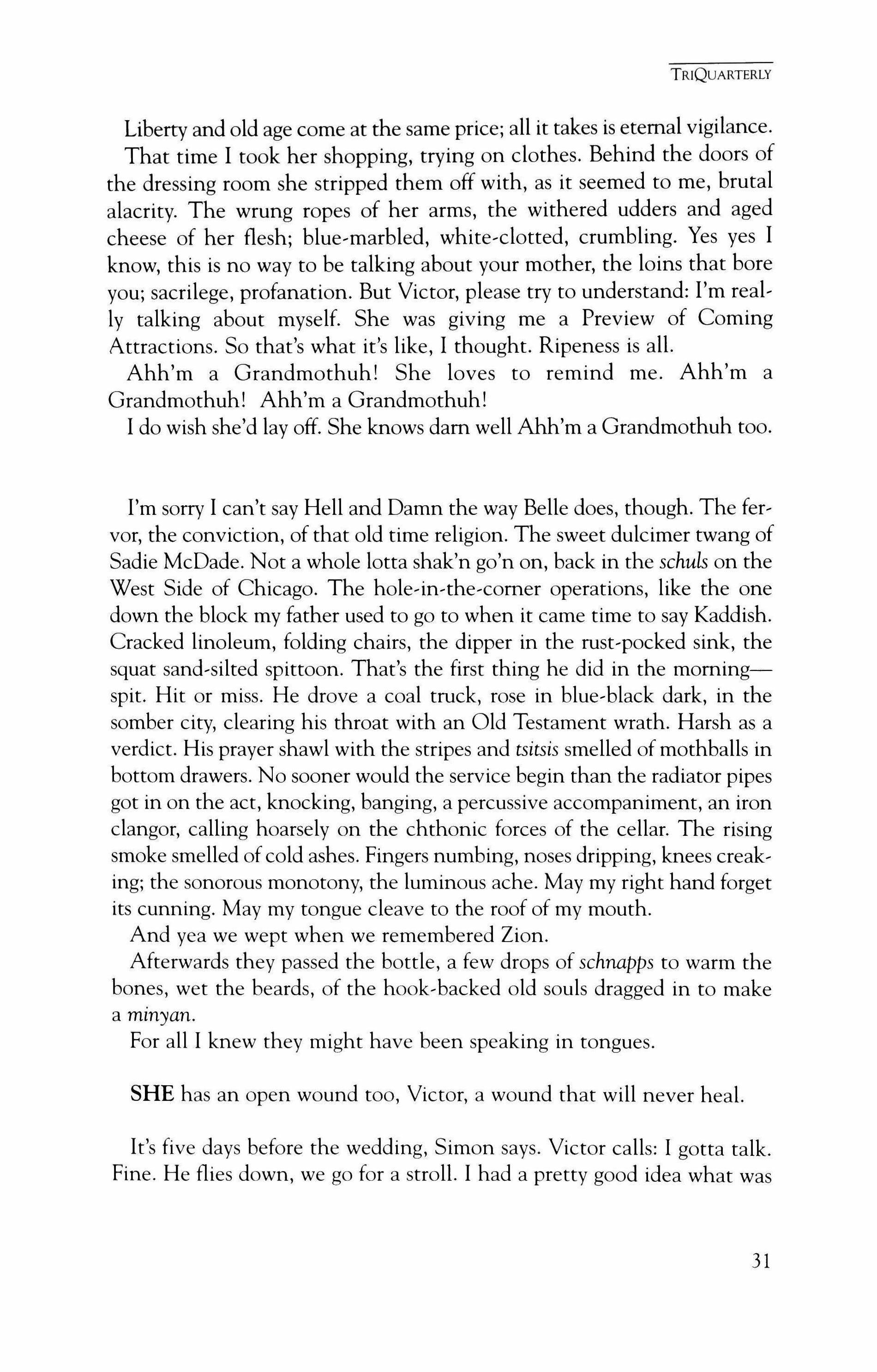
Liberty and old age come at the same price; all it takes is eternal vigilance. That time I took her shopping, trying on clothes. Behind the doors of the dressing room she stripped them off with, as it seemed to me, brutal alacrity. The wrung ropes of her arms, the withered udders and aged cheese of her flesh; blue-marbled, white-clotted, crumbling. Yes yes I know, this is no way to be talking about your mother, the loins that bore you; sacrilege, profanation. But Victor, please try to understand: I'm really talking about myself. She was giving me a Preview of Coming Attractions. So that's what it's like, I thought. Ripeness is all.
Ahh'm a Grandmothuh! She loves to remind me. Ahh'm a Grandmothuh! Ahh'm a Grandmothuh!
I do wish she'd layoff. She knows dam well Ahh'm a Grandmothuh too.
I'm sorry I can't say Hell and Damn the way Belle does, though. The fervor, the conviction, of that old time religion. The sweet dulcimer twang of Sadie McDade. Not a whole lotta shak'n go'n on, back in the schuls on the West Side of Chicago. The hole-in-the-corner operations, like the one down the block my father used to go to when it came time to say Kaddish. Cracked linoleum, folding chairs, the dipper in the rust-pocked sink, the squat sand-silted spittoon. That's the first thing he did in the morningspit. Hit or miss. He drove a coal truck, rose in blue-black dark, in the somber city, clearing his throat with an Old Testament wrath. Harsh as a verdict. His prayer shawl with the stripes and tsitsis smelled of mothballs in bottom drawers. No sooner would the service begin than the radiator pipes got in on the act, knocking, banging, a percussive accompaniment, an iron clangor, calling hoarsely on the chthonic forces of the cellar. The rising smoke smelled ofcold ashes. Fingers numbing, noses dripping, knees creaking; the sonorous monotony, the luminous ache. May my right hand forget its cunning. May my tongue cleave to the roof of my mouth.
And yea we wept when we remembered Zion.
Afterwards they passed the bottle, a few drops of schnapps to warm the bones, wet the beards, of the hook-backed old souls dragged in to make a mznyan.
For all I knew they might have been speaking in tongues.
SHE has an open wound too, Victor, a wound that will never heal.
It's five days before the wedding, Simon says. Victor calls: I gotta talk. Fine. He flies down, we go for a stroll. I had a pretty good idea what was
TRIQUARTERLY
31
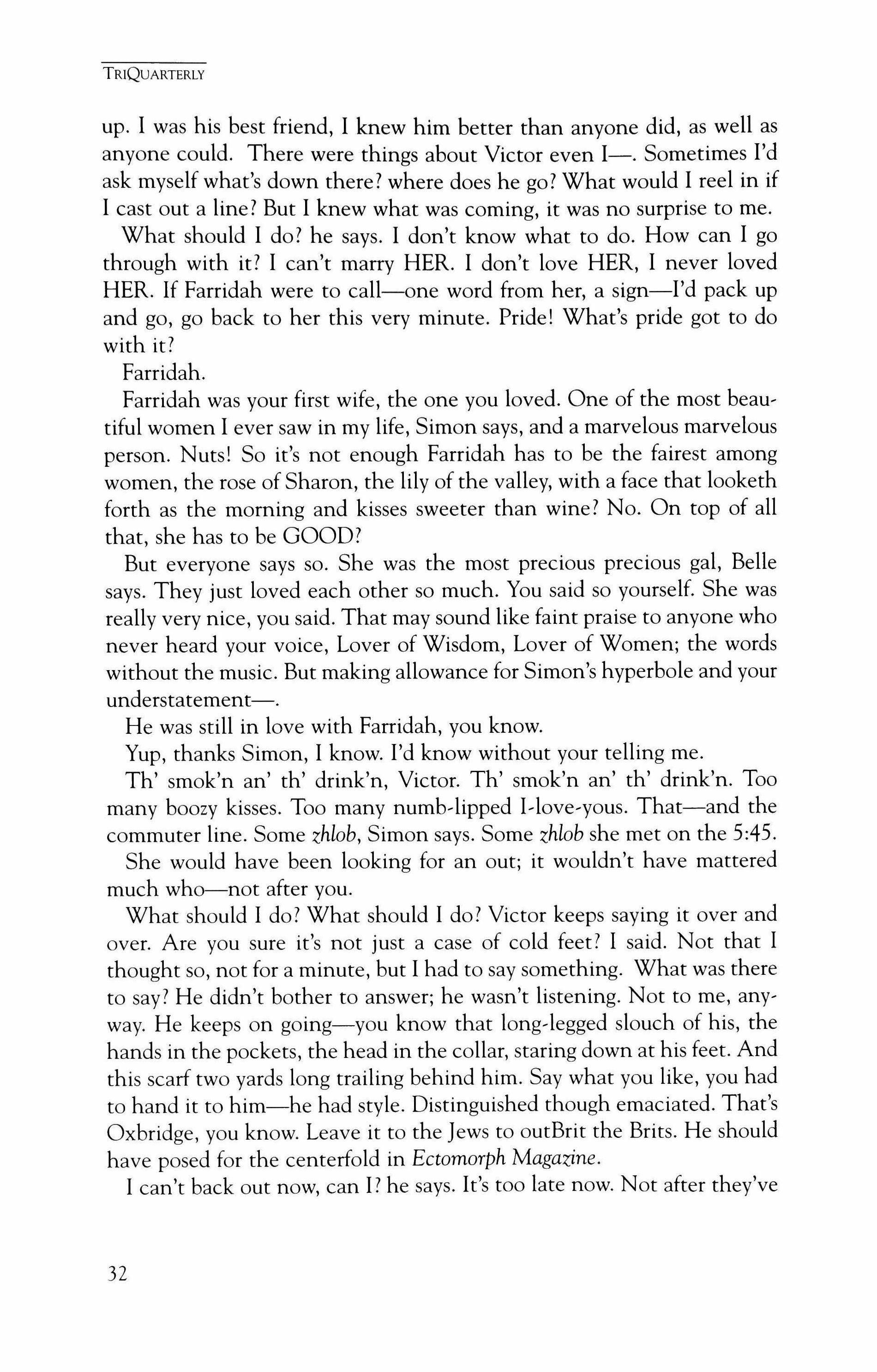
up. I was his best friend, I knew him better than anyone did, as well as anyone could. There were things about Victor even 1-. Sometimes I'd ask myself what's down there? where does he go? What would I reel in if I cast out a line? But I knew what was coming, it was no surprise to me. What should I do? he says. I don't know what to do. How can I go through with it? I can't marry HER. I don't love HER, I never loved HER. If Farridah were to call-one word from her, a sign-I'd pack up and go, go back to her this very minute. Pride! What's pride got to do with it?
Farridah.
Farridah was your first wife, the one you loved. One of the most beautiful women I ever saw in my life, Simon says, and a marvelous marvelous person. Nuts! So it's not enough Farridah has to be the fairest among women, the rose of Sharon, the lily of the valley, with a face that looketh forth as the morning and kisses sweeter than wine? No. On top of all that, she has to be GOOD?
But everyone says so. She was the most precious precious gal, Belle says. They just loved each other so much. You said so yourself. She was really very nice, you said. That may sound like faint praise to anyone who never heard your voice, Lover of Wisdom, Lover of Women; the words without the music. But making allowance for Simon's hyperbole and your understatement-.
He was still in love with Farridah, you know.
Yup, thanks Simon, I know. I'd know without your telling me.
Th' smok'n an' th' drink'n, Victor. Th' smok'n an' th' drink'n. Too many boozy kisses. Too many numb-lipped l-love-yous. That-and the commuter line. Some zhlob, Simon says. Some zhlob she met on the 5:45.
She would have been looking for an out; it wouldn't have mattered much who-not after you.
What should I do? What should I do? Victor keeps saying it over and over. Are you sure it's not just a case of cold feet? I said. Not that I thought so, not for a minute, but I had to say something. What was there to say? He didn't bother to answer; he wasn't listening. Not to me, anyway. He keeps on going-you know that long-legged slouch of his, the hands in the pockets, the head in the collar, staring down at his feet. And this scarf two yards long trailing behind him. Say what you like, you had to hand it to him-he had style. Distinguished though emaciated. That's Oxbridge, you know. Leave it to the Jews to outBrit the Brits. He should have posed for the centerfold in Ectomorph Magazine.
I can't back out now, can I? he says. It's too late now. Not after they've
TRIQUARTERLY
32

gone to all this trouble. X-HER family-HER stepfather. Not after all these preparations, these elaborate preparations.
I dare say, I said.
I told you: I keep trying.
Oh I just bet.
All right, vulgar. Simon shook his head. Vulgar vulgar vulgar. Shudder shudder shudder. Strictly Kosher? Strictly Borscht Belt! Vaudeville! Burlesque! The things they do to poor little innocent chicken livers. Where do Jews get such ideas? And they played that old Orthodox Rag, the whole routine, every last song and dance. You'd think they imported a piece of the Wailing Wall, with all the davening. And the beards? And the peyots? They're the only real Jews, and the rest of us-Phoo! Treif! You are what you eat. Orthodoxy for Orthodontists. But what could you expect? Being Jewish is the family business; that's their racket. Praise the Lord and Pass the Ammunition.
Then don't do it, I said to Victor. Don't marry her, not if you don't love HER. You'd be making a big mistake. It wouldn't be fair to HER either. That's what I said. After all, I had nothing against the woman, I hardly knew HER. Not then. Not in my wildest dreams. It had nothing to do with HER anyway, SHE never stood a chance. It was all Farridah. It was always Farridah.
Simon married for love. Who would have thought she'd give him a glance-the lovely long-legged Therese? Surrounded not by thorny hedges, but by a wall of suitors-some of them ready to risk blinding in the briar patch, if she would let down her long gold hair. Simon risked it. Not our Simon, the Simon we know, Simon splendid and successful, Simon of the silvered crest and the gilt-edged brow. Not that Simon, no. Simon pudgy and Brillo-haired and four-eyed. Simon just another smartass Jew. Simon not-so-simple. Simon of whom professors jibed: What makes Simon run? Simon carried off the prize. A thing like that can set a man up for life. Simon knows the difference.
I've wondered since, Simon said. Ever since. If there was something I could have said, something I should have done. Like what? Smash his kneecaps? Have him kidnapped? I'm not from Chicago. SHE wasn't Farridah, that's what he saw in HER; that's what he married HER for. The one woman who would never touch him, never tempt him-the opposite, in every way. What could I do? What could anyone do? He wanted sack cloth and ashes, he got sack cloth and ashes.
A hard act to follow, Farridah.
Please, I'm not blaming you, Victor, I'm not feeling sorry for HER.
TRIQUARTERLY
33
TRIQUARTERLY
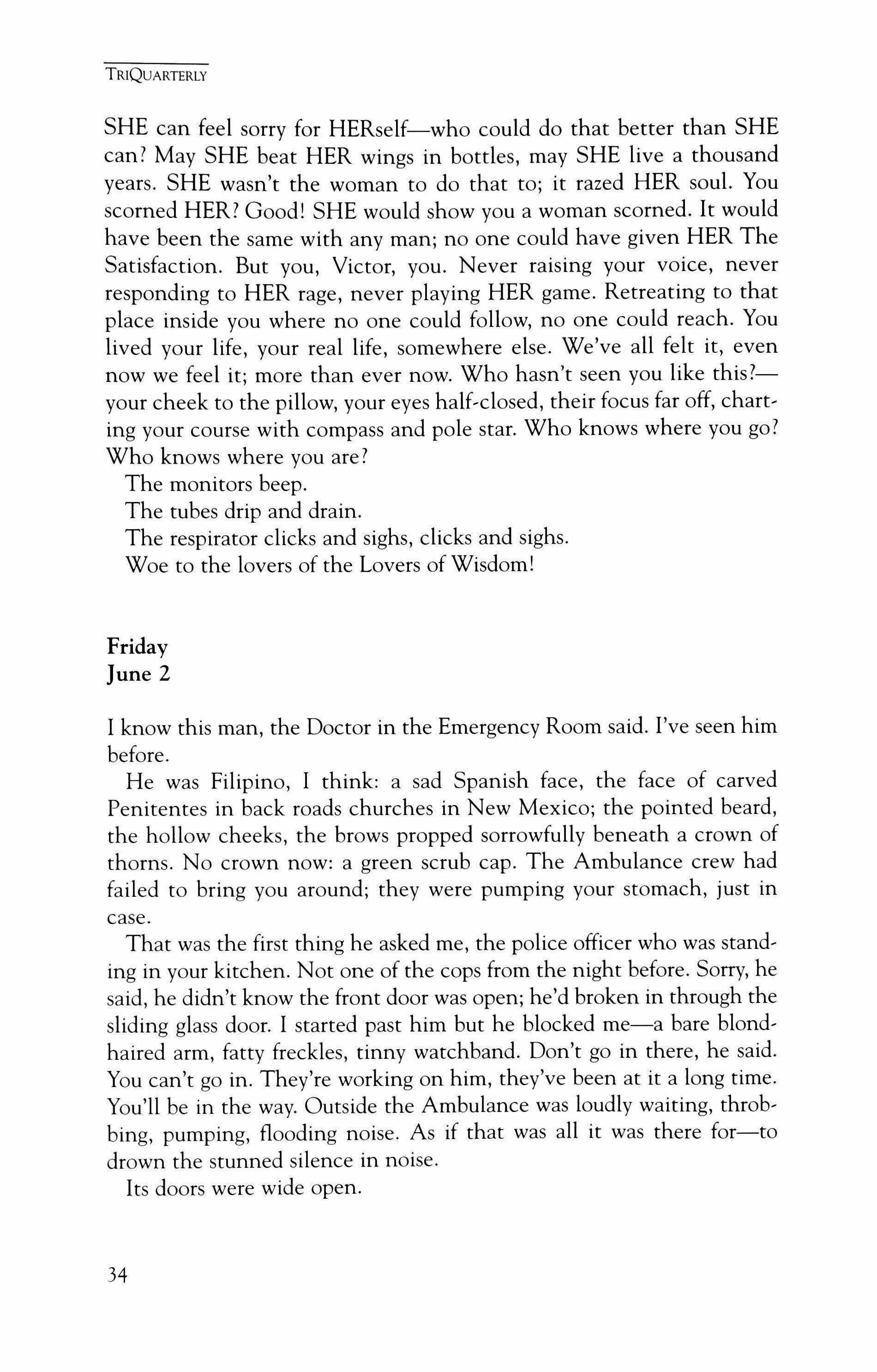
SHE can feel sorry for HERself-who could do that better than SHE can? May SHE beat HER wings in bottles, may SHE live a thousand years. SHE wasn't the woman to do that to; it razed HER soul. You scorned HER? Good! SHE would show you a woman scorned. It would have been the same with any man; no one could have given HER The Satisfaction. But you, Victor, you. Never raising your voice, never responding to HER rage, never playing HER game. Retreating to that place inside you where no one could follow, no one could reach. You lived your life, your real life, somewhere else. We've all felt it, even now we feel it; more than ever now. Who hasn't seen you like this?your cheek to the pillow, your eyes half-closed, their focus far off, charting your course with compass and pole star. Who knows where you go? Who knows where you are?
The monitors beep.
The tubes drip and drain.
The respirator clicks and sighs, clicks and sighs.
Woe to the lovers of the Lovers of Wisdom!
Friday June 2
I know this man, the Doctor in the Emergency Room said. I've seen him before.
He was Filipino, I think: a sad Spanish face, the face of carved Penitentes in back roads churches in New Mexico; the pointed beard, the hollow cheeks, the brows propped sorrowfully beneath a crown of thorns. No crown now: a green scrub cap. The Ambulance crew had failed to bring you around; they were pumping your stomach, just in case.
That was the first thing he asked me, the police officer who was standing in your kitchen. Not one of the cops from the night before. Sorry, he said, he didn't know the front door was open; he'd broken in through the sliding glass door. I started past him but he blocked me-a bare blondhaired arm, fatty freckles, tinny watchband. Don't go in there, he said. You can't go in. They're working on him, they've been at it a long time. You'll be in the way. Outside the Ambulance was loudly waiting, throbbing, pumping, flooding noise. As if that was all it was there for-to drown the stunned silence in noise.
Its doors were wide open.
34
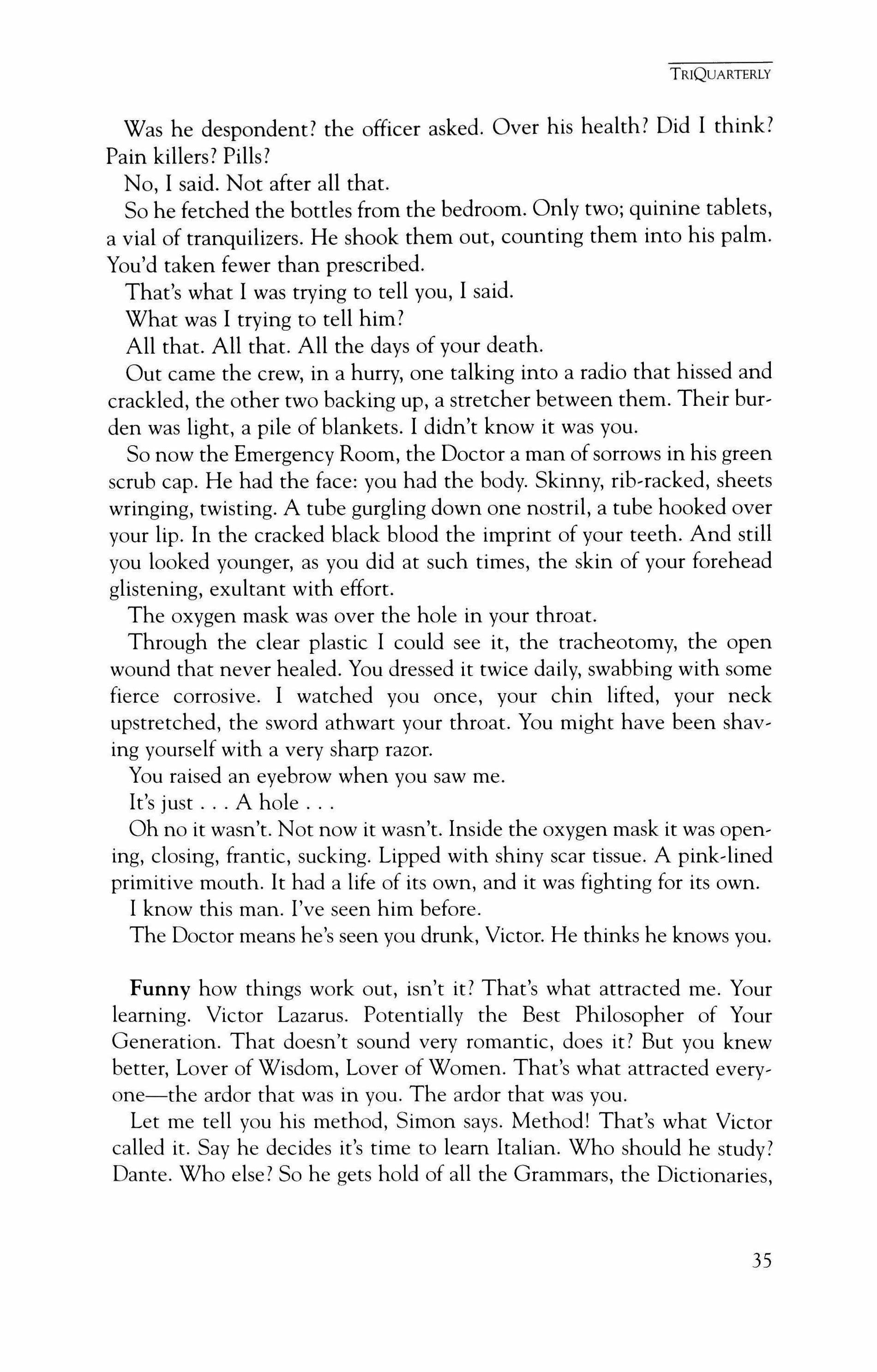
Was he despondent? the officer asked. Over his health? Did I think?
Pain killers? Pills?
No, I said. Not after all that.
So he fetched the bottles from the bedroom. Only two; quinine tablets, a vial of tranquilizers. He shook them out, counting them into his palm. You'd taken fewer than prescribed.
That's what I was trying to tell you, I said.
What was I trying to tell him?
All that. All that. All the days of your death.
Out came the crew, in a hurry, one talking into a radio that hissed and crackled, the other two backing up, a stretcher between them. Their burden was light, a pile of blankets. I didn't know it was you.
So now the Emergency Room, the Doctor a man of sorrows in his green scrub cap. He had the face: you had the body. Skinny, rib-racked, sheets wringing, twisting. A tube gurgling down one nostril, a tube hooked over your lip. In the cracked black blood the imprint of your teeth. And still you looked younger, as you did at such times, the skin of your forehead glistening, exultant with effort.
The oxygen mask was over the hole in your throat.
Through the clear plastic I could see it, the tracheotomy, the open wound that never healed. You dressed it twice daily, swabbing with some fierce corrosive. I watched you once, your chin lifted, your neck upstretched, the sword athwart your throat. You might have been shaving yourself with a very sharp razor.
You raised an eyebrow when you saw me.
It's just A hole
Oh no it wasn't. Not now it wasn't. Inside the oxygen mask it was opening, closing, frantic, sucking. Lipped with shiny scar tissue. A pink-lined primitive mouth. It had a life of its own, and it was fighting for its own.
I know this man. I've seen him before.
The Doctor means he's seen you drunk, Victor. He thinks he knows you.
Funny how things work out, isn't it? That's what attracted me. Your learning. Victor Lazarus. Potentially the Best Philosopher of Your Generation. That doesn't sound very romantic, does it? But you knew better, Lover of Wisdom, Lover of Women. That's what attracted everyone-the ardor that was in you. The ardor that was you.
Let me tell you his method, Simon says. Method! That's what Victor called it. Say he decides it's time to learn Italian. Who should he study? Dante. Who else? So he gets hold of all the Grammars, the Dictionaries,
TRIQUARTERLY
35
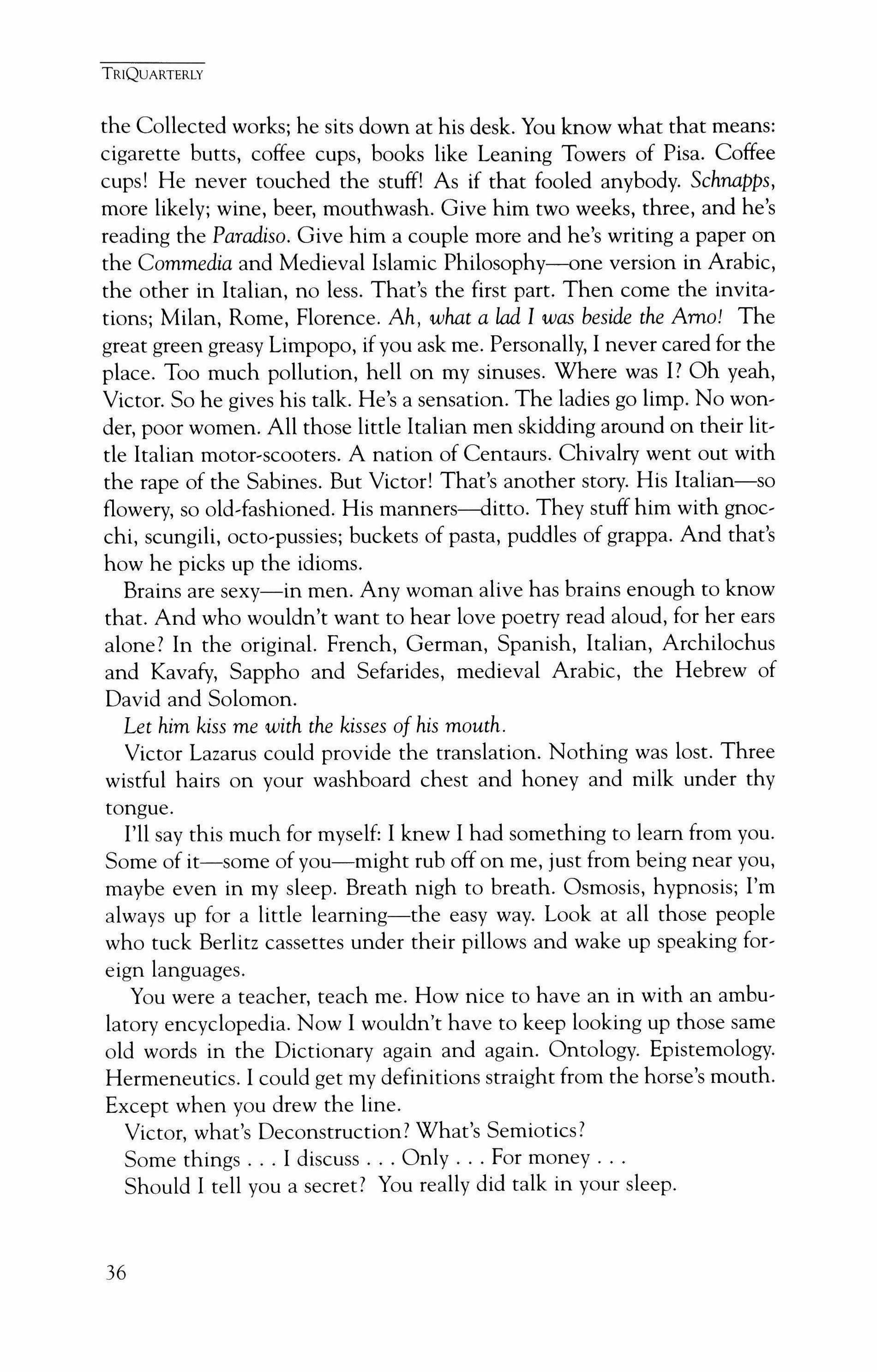
the Collected works; he sits down at his desk. You know what that means: cigarette butts, coffee cups, books like Leaning Towers of Pisa. Coffee cups! He never touched the stuff! As if that fooled anybody. Schnapps, more likely; wine, beer, mouthwash. Give him two weeks, three, and he's reading the Paradiso. Give him a couple more and he's writing a paper on the Commedia and Medieval Islamic Philosophy-one version in Arabic, the other in Italian, no less. That's the first part. Then come the invitations; Milan, Rome, Florence. Ah, what a lad I was beside the Arno! The great green greasy Limpopo, if you ask me. Personally, I never cared for the place. Too much pollution, hell on my sinuses. Where was I? Oh yeah, Victor. So he gives his talk. He's a sensation. The ladies go limp. No wonder, poor women. All those little Italian men skidding around on their little Italian motor-scooters. A nation of Centaurs. Chivalry went out with the rape of the Sabines. But Victor! That's another story. His Italian-so flowery, so old-fashioned. His manners--ditto. They stuff him with gnocchi, scungili, octo-pussies; buckets of pasta, puddles of grappa. And that's how he picks up the idioms.
Brains are sexy-in men. Any woman alive has brains enough to know that. And who wouldn't want to hear love poetry read aloud, for her ears alone? In the original. French, German, Spanish, Italian, Archilochus and Kavafy, Sappho and Sefarides, medieval Arabic, the Hebrew of David and Solomon.
Let him kiss me with the kisses of his mouth.
Victor Lazarus could provide the translation. Nothing was lost. Three wistful hairs on your washboard chest and honey and milk under thy tongue.
I'll say this much for myself: I knew I had something to learn from you. Some of it-some of you-might rub off on me, just from being near you, maybe even in my sleep. Breath nigh to breath. Osmosis, hypnosis; I'm always up for a little learning-the easy way. Look at all those people who tuck Berlitz cassettes under their pillows and wake up speaking foreign languages.
You were a teacher, teach me. How nice to have an in with an ambulatory encyclopedia. Now I wouldn't have to keep looking up those same old words in the Dictionary again and again. Ontology. Epistemology. Hermeneutics. I could get my definitions straight from the horse's mouth. Except when you drew the line.
Victor, what's Deconstruction? What's Semiotics?
Some things I discuss Only For money
Should I tell you a secret? You really did talk in your sleep.
TRIQUARTERLY
36
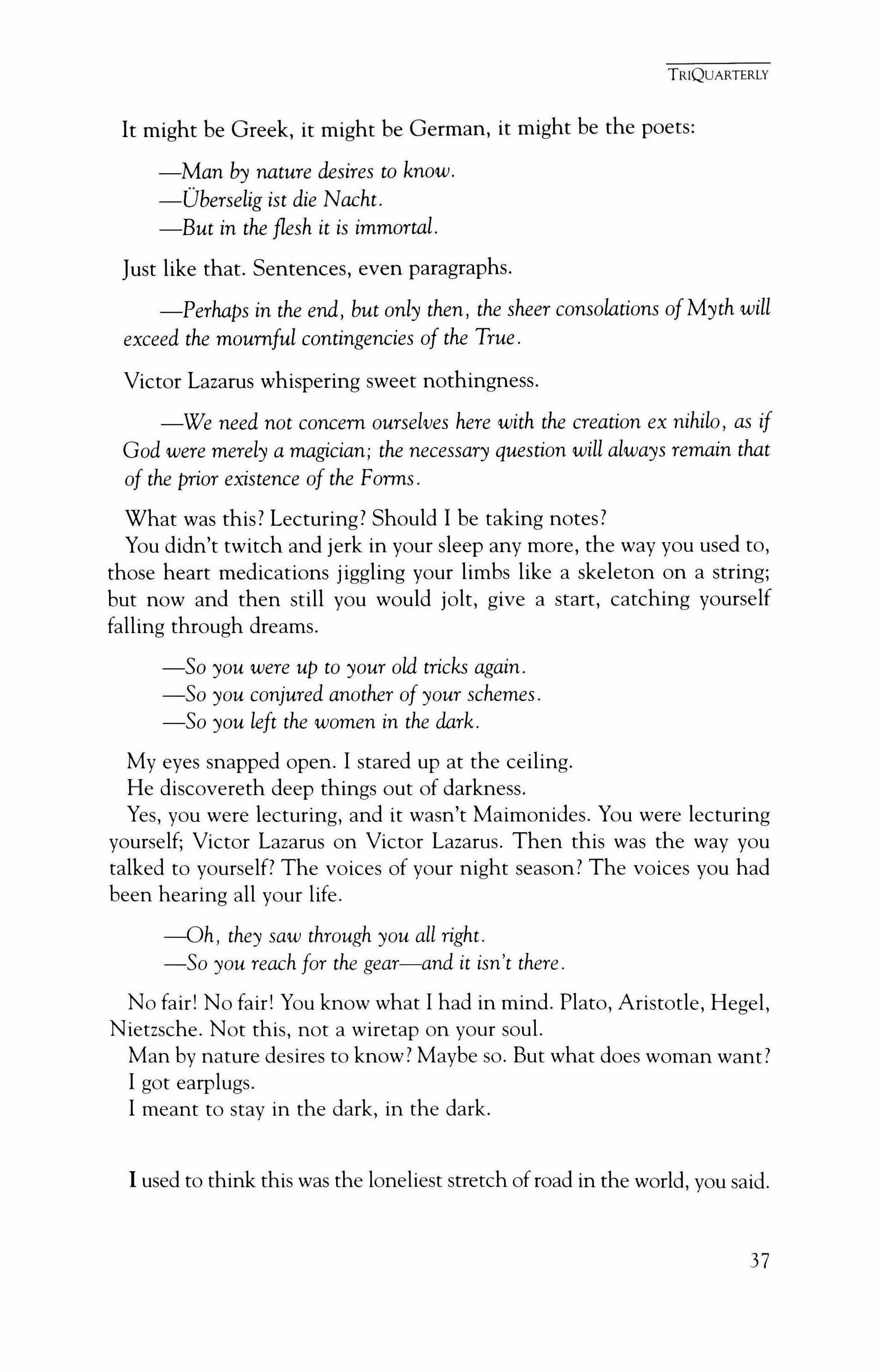
It might be Greek, it might be German, it might be the poets:
-Man by nature desires to know.
-Oberselig ist die Nacht.
-But in the flesh it is immortal.
Just like that. Sentences, even paragraphs.
-Perhaps in the end, but only then, the sheer consolations ofMyth will exceed the mournful contingencies of the True.
Victor Lazarus whispering sweet nothingness.
-We need not concern ourselves here with the creation ex nihilo, as if God were merely a magician; the necessary question will always remain that of the prior existence of the Forms.
What was this? Lecturing? Should I be taking notes?
You didn't twitch and jerk in your sleep any more, the way you used to, those heart medications jiggling your limbs like a skeleton on a string; but now and then still you would jolt, give a start, catching yourself falling through dreams.
-So you were up to your old tricks again.
-So you conjured another of your schemes.
-So you left the women in the dark.
My eyes snapped open. I stared up at the ceiling. He discovereth deep things out of darkness.
Yes, you were lecturing, and it wasn't Maimonides. You were lecturing yourself; Victor Lazarus on Victor Lazarus. Then this was the way you talked to yourself? The voices of your night season? The voices you had been hearing all your life.
-Oh, they saw through you all right.
-So you reach for the gear-and it isn't there.
No fair! No fair! You know what I had in mind. Plato, Aristotle, Hegel, Nietzsche. Not this, not a wiretap on your soul.
Man by nature desires to know? Maybe so. But what does woman want? I got earplugs.
I meant to stay in the dark, in the dark.
I used to think this was the loneliest stretch ofroad in the world, you said.
TRIQUARTERLY
37
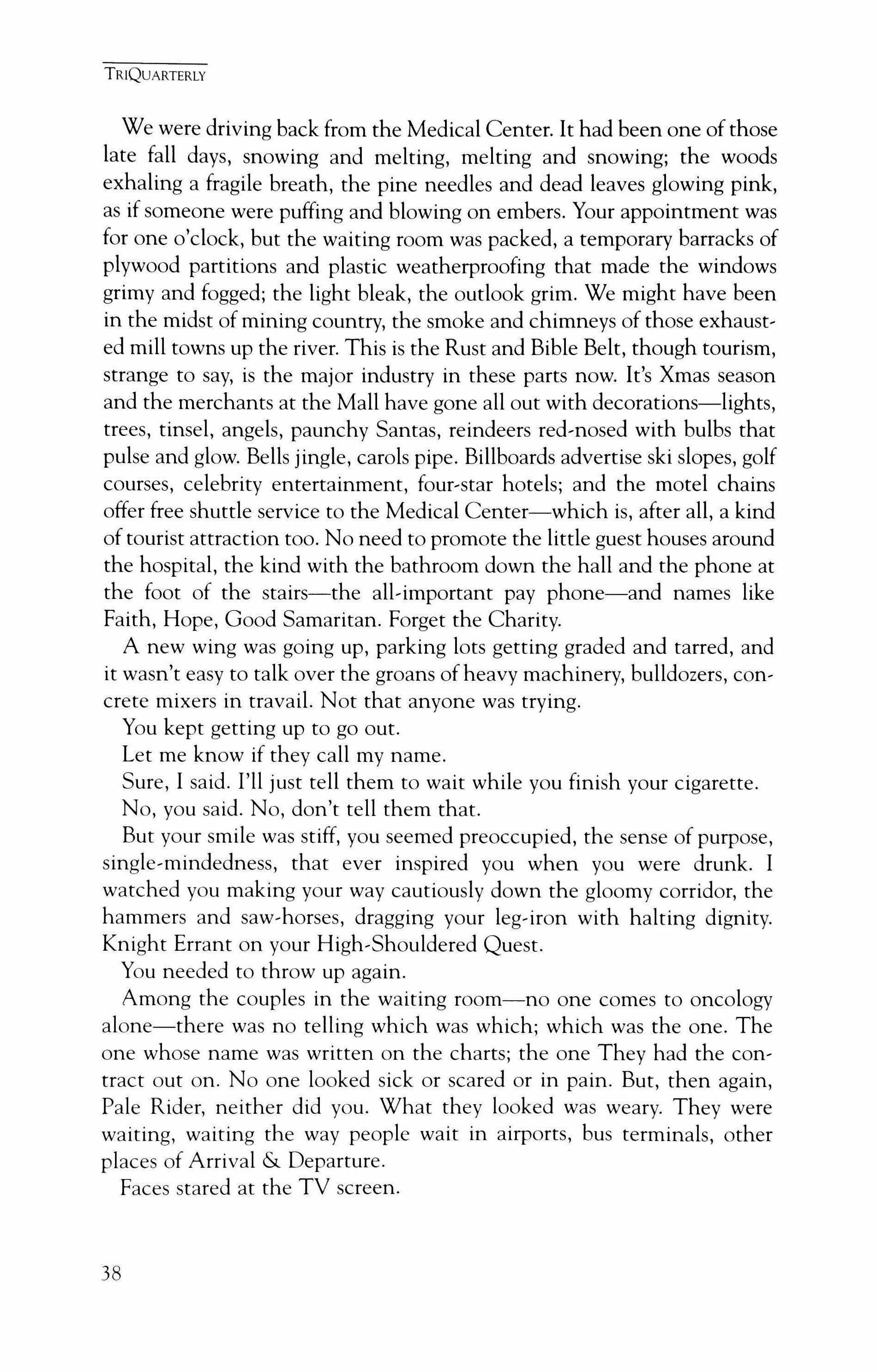
We were driving back from the Medical Center. It had been one of those late fall days, snowing and melting, melting and snowing; the woods exhaling a fragile breath, the pine needles and dead leaves glowing pink, as if someone were puffing and blowing on embers. Your appointment was for one o'clock, but the waiting room was packed, a temporary barracks of plywood partitions and plastic weatherproofing that made the windows grimy and fogged; the light bleak, the outlook grim. We might have been in the midst of mining country, the smoke and chimneys of those exhausted mill towns up the river. This is the Rust and Bible Belt, though tourism, strange to say, is the major industry in these parts now. It's Xmas season and the merchants at the Mall have gone all out with decorations-lights, trees, tinsel, angels, paunchy Santas, reindeers red-nosed with bulbs that pulse and glow. Bells jingle, carols pipe. Billboards advertise ski slopes, golf courses, celebrity entertainment, four-star hotels; and the motel chains offer free shuttle service to the Medical Center-which is, after all, a kind of tourist attraction too. No need to promote the little guest houses around the hospital, the kind with the bathroom down the hall and the phone at the foot of the stairs-the all-important pay phone-and names like Faith, Hope, Good Samaritan. Forget the Charity.
A new wing was going up, parking lots getting graded and tarred, and it wasn't easy to talk over the groans of heavy machinery, bulldozers, concrete mixers in travail. Not that anyone was trying.
You kept getting up to go out.
Let me know if they call my name.
Sure, I said. I'll just tell them to wait while you finish your cigarette.
No, you said. No, don't tell them that.
But your smile was stiff, you seemed preoccupied, the sense of purpose, single-rnindedness, that ever inspired you when you were drunk. I watched you making your way cautiously down the gloomy corridor, the hammers and saw-horses, dragging your leg-iron with halting dignity. Knight Errant on your High-Shouldered Quest.
You needed to throw up again.
Among the couples in the waiting room-no one comes to oncology alone-there was no telling which was which; which was the one. The one whose name was written on the charts; the one They had the contract out on. No one looked sick or scared or in pain. But, then again, Pale Rider, neither did you. What they looked was weary. They were waiting, waiting the way people wait in airports, bus terminals, other places of Arrival & Departure.
Faces stared at the TV screen.
TRIQUARTERLY
38
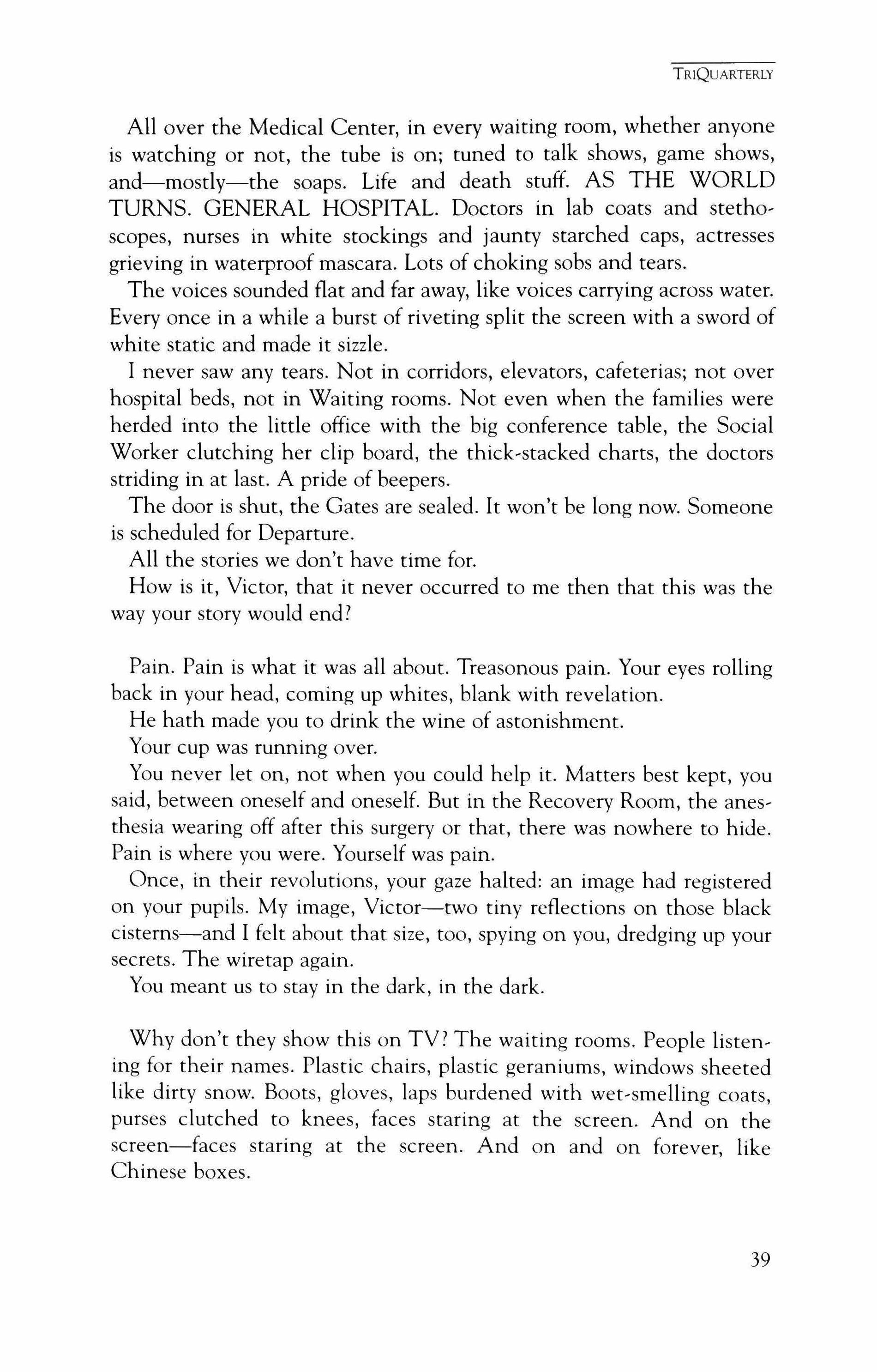
All over the Medical Center, in every waiting room, whether anyone is watching or not, the tube is on; tuned to talk shows, game shows, and-mostly-the soaps. Life and death stuff. AS THE WORLD TURNS. GENERAL HOSPITAL. Doctors in lab coats and stethoscopes, nurses in white stockings and jaunty starched caps, actresses grieving in waterproof mascara. Lots of choking sobs and tears.
The voices sounded flat and far away, like voices carrying across water. Every once in a while a burst of riveting split the screen with a sword of white static and made it sizzle.
I never saw any tears. Not in corridors, elevators, cafeterias; not over hospital beds, not in Waiting rooms. Not even when the families were herded into the little office with the big conference table, the Social Worker clutching her clip board, the thick-stacked charts, the doctors striding in at last. A pride of beepers.
The door is shut, the Gates are sealed. It won't be long now. Someone is scheduled for Departure.
All the stories we don't have time for.
How is it, Victor, that it never occurred to me then that this was the way your story would end?
Pain. Pain is what it was all about. Treasonous pain. Your eyes rolling back in your head, coming up whites, blank with revelation.
He hath made you to drink the wine of astonishment.
Your cup was running over.
You never let on, not when you could help it. Matters best kept, you said, between oneself and oneself. But in the Recovery Room, the anesthesia wearing off after this surgery or that, there was nowhere to hide. Pain is where you were. Yourself was pain.
Once, in their revolutions, your gaze halted: an image had registered on your pupils. My image, Victor-two tiny reflections on those black cisterns-and I felt about that size, too, spying on you, dredging up your secrets. The wiretap again.
You meant us to stay in the dark, in the dark.
Why don't they show this on TV? The waiting rooms. People listening for their names. Plastic chairs, plastic geraniums, windows sheeted like dirty snow. Boots, gloves, laps burdened with wet-smelling coats, purses clutched to knees, faces staring at the screen. And on the screen-faces staring at the screen. And on and on forever, like Chinese boxes.
TRIQUARTERLY
39
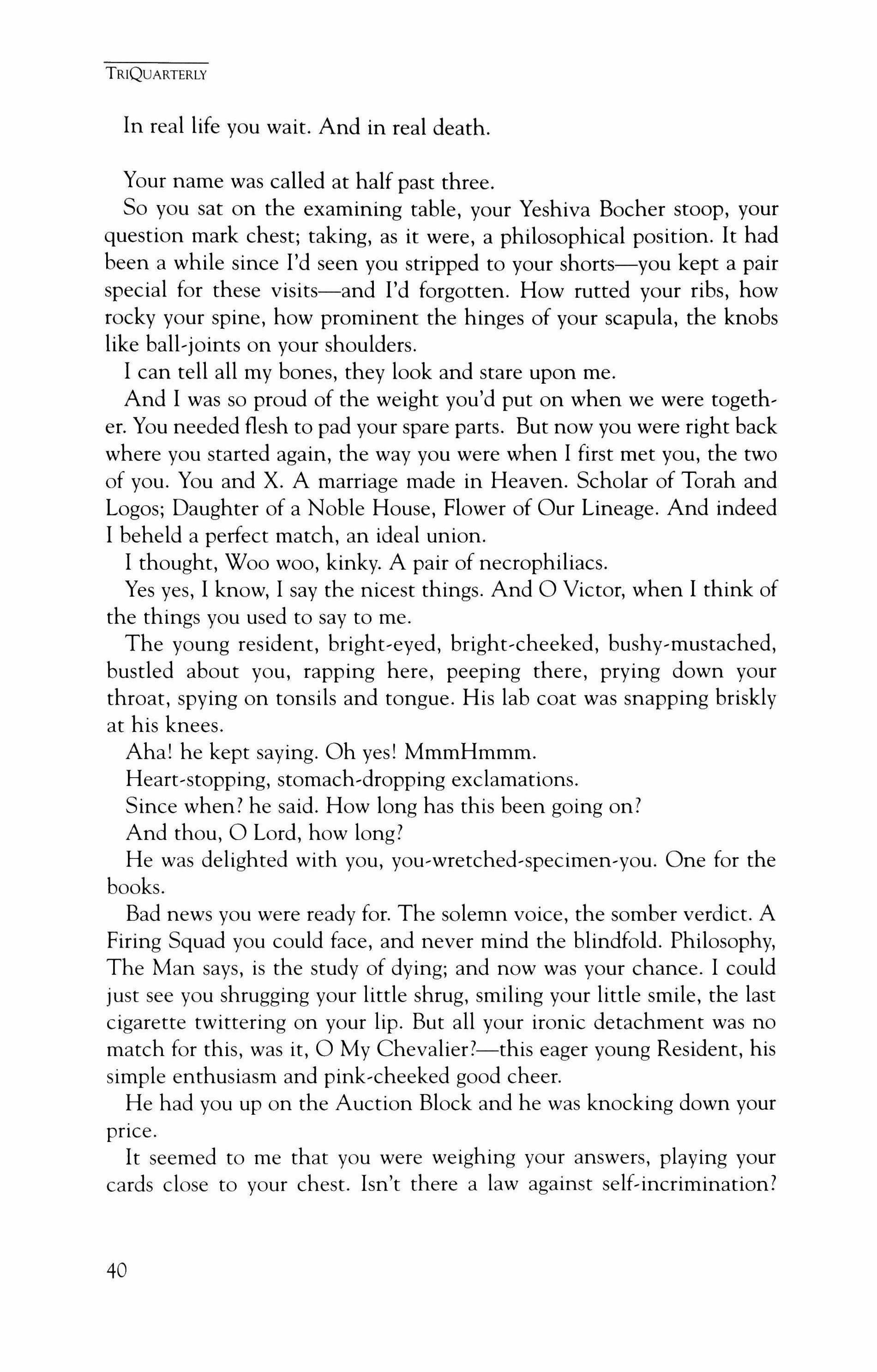
TRIQUARTERLY
In real life you wait. And in real death.
Your name was called at half past three.
So you sat on the examining table, your Yeshiva Bocher stoop, your question mark chest; taking, as it were, a philosophical position. It had been a while since I'd seen you stripped to your shorts-you kept a pair special for these visits-and I'd forgotten. How rutted your ribs, how rocky your spine, how prominent the hinges of your scapula, the knobs like ball-joints on your shoulders.
I can tell all my bones, they look and stare upon me.
And I was so proud of the weight you'd put on when we were together. You needed flesh to pad your spare parts. But now you were right back where you started again, the way you were when I first met you, the two of you. You and X. A marriage made in Heaven. Scholar of Torah and Logos; Daughter of a Noble House, Flower of Our Lineage. And indeed I beheld a perfect match, an ideal union.
I thought, Woo woo, kinky. A pair of necrophiliacs.
Yes yes, I know, I say the nicest things. And 0 Victor, when I think of the things you used to say to me.
The young resident, bright-eyed, bright,cheeked, bushy,mustached, bustled about you, rapping here, peeping there, prying down your throat, spying on tonsils and tongue. His lab coat was snapping briskly at his knees.
Aha! he kept saying. Oh yes! MmmHmmm.
Heart-stopping, stomach-dropping exclamations.
Since when? he said. How long has this been going on?
And thou, 0 Lord, how long?
He was delighted with you, you-wretched-specimen-you. One for the books.
Bad news you were ready for. The solemn voice, the somber verdict. A Firing Squad you could face, and never mind the blindfold. Philosophy, The Man says, is the study of dying; and now was your chance. I could just see you shrugging your little shrug, smiling your little smile, the last cigarette twittering on your lip. But all your ironic detachment was no match for this, was it, 0 My Chevalier?-this eager young Resident, his simple enthusiasm and pink-cheeked good cheer.
He had you up on the Auction Block and he was knocking down your pnce.
It seemed to me that you were weighing your answers, playing your cards close to your chest. Isn't there a law against self,incrimination?
40
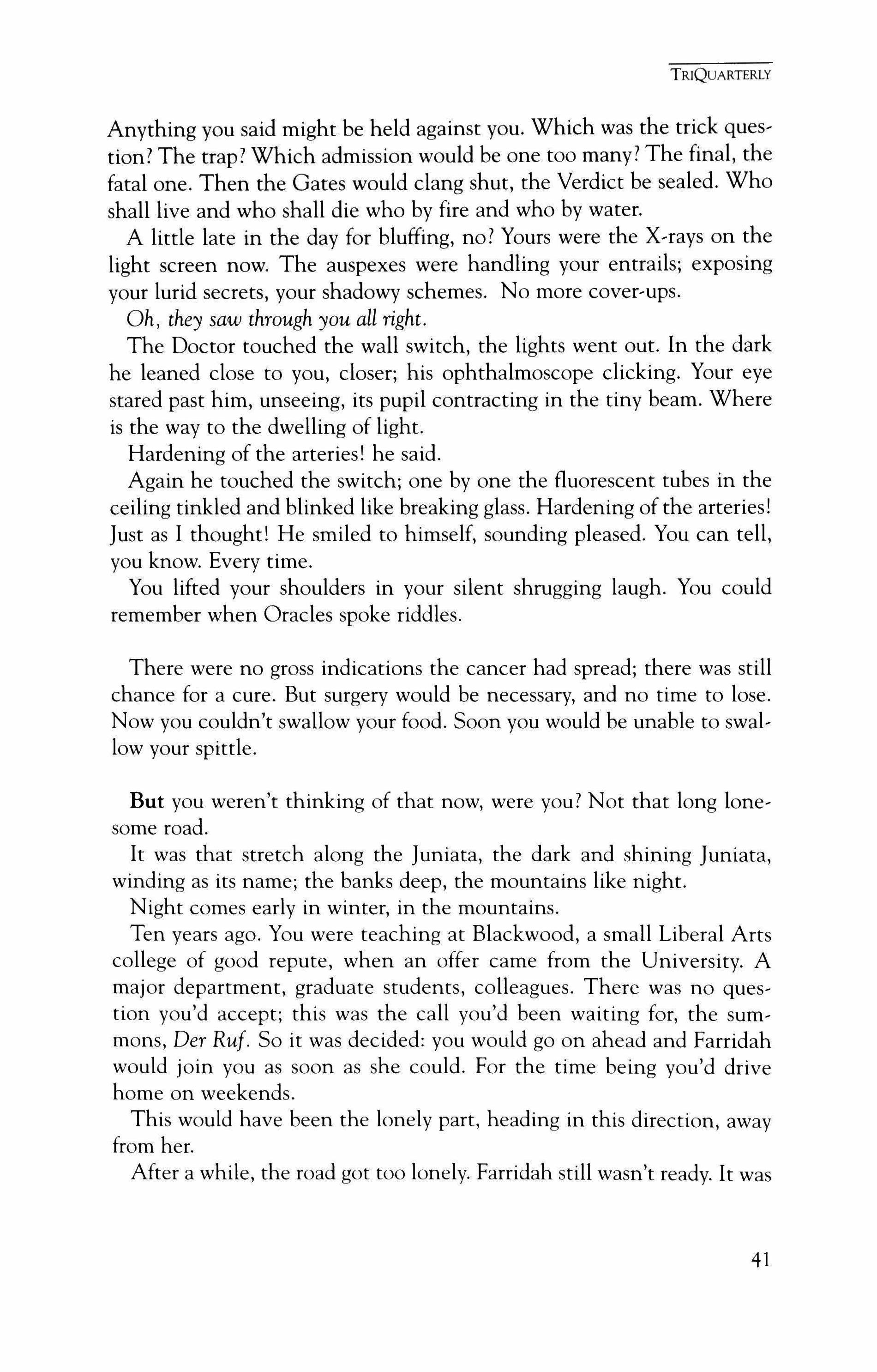
Anything you said might be held against you. Which was the trick question? The trap? Which admission would be one too many? The final, the fatal one. Then the Gates would clang shut, the Verdict be sealed. Who shall live and who shall die who by fire and who by water.
A little late in the day for bluffing, no? Yours were the Xvrays on the light screen now. The auspexes were handling your entrails; exposing your lurid secrets, your shadowy schemes. No more cover-ups.
Oh, they saw through you all right.
The Doctor touched the wall switch, the lights went out. In the dark he leaned close to you, closer; his ophthalmoscope clicking. Your eye stared past him, unseeing, its pupil contracting in the tiny beam. Where is the way to the dwelling of light.
Hardening of the arteries! he said.
Again he touched the switch; one by one the fluorescent tubes in the ceiling tinkled and blinked like breaking glass. Hardening of the arteries! Just as I thought! He smiled to himself, sounding pleased. You can tell, you know. Every time.
You lifted your shoulders in your silent shrugging laugh. You could remember when Oracles spoke riddles.
There were no gross indications the cancer had spread; there was still chance for a cure. But surgery would be necessary, and no time to lose. Now you couldn't swallow your food. Soon you would be unable to swallow your spittle.
But you weren't thinking of that now, were you? Not that long lonesome road.
It was that stretch along the Juniata, the dark and shining Juniata, winding as its name; the banks deep, the mountains like night.
Night comes early in winter, in the mountains.
Ten years ago. You were teaching at Blackwood, a small Liberal Arts college of good repute, when an offer came from the University. A major department, graduate students, colleagues. There was no question you'd accept; this was the call you'd been waiting for, the summons, Der Ruf. So it was decided: you would go on ahead and Farridah would join you as soon as she could. For the time being you'd drive home on weekends.
This would have been the lonely part, heading in this direction, away from her.
After a while, the road got too lonely. Farridah still wasn't ready. It was
TRIQUARTERLY
41
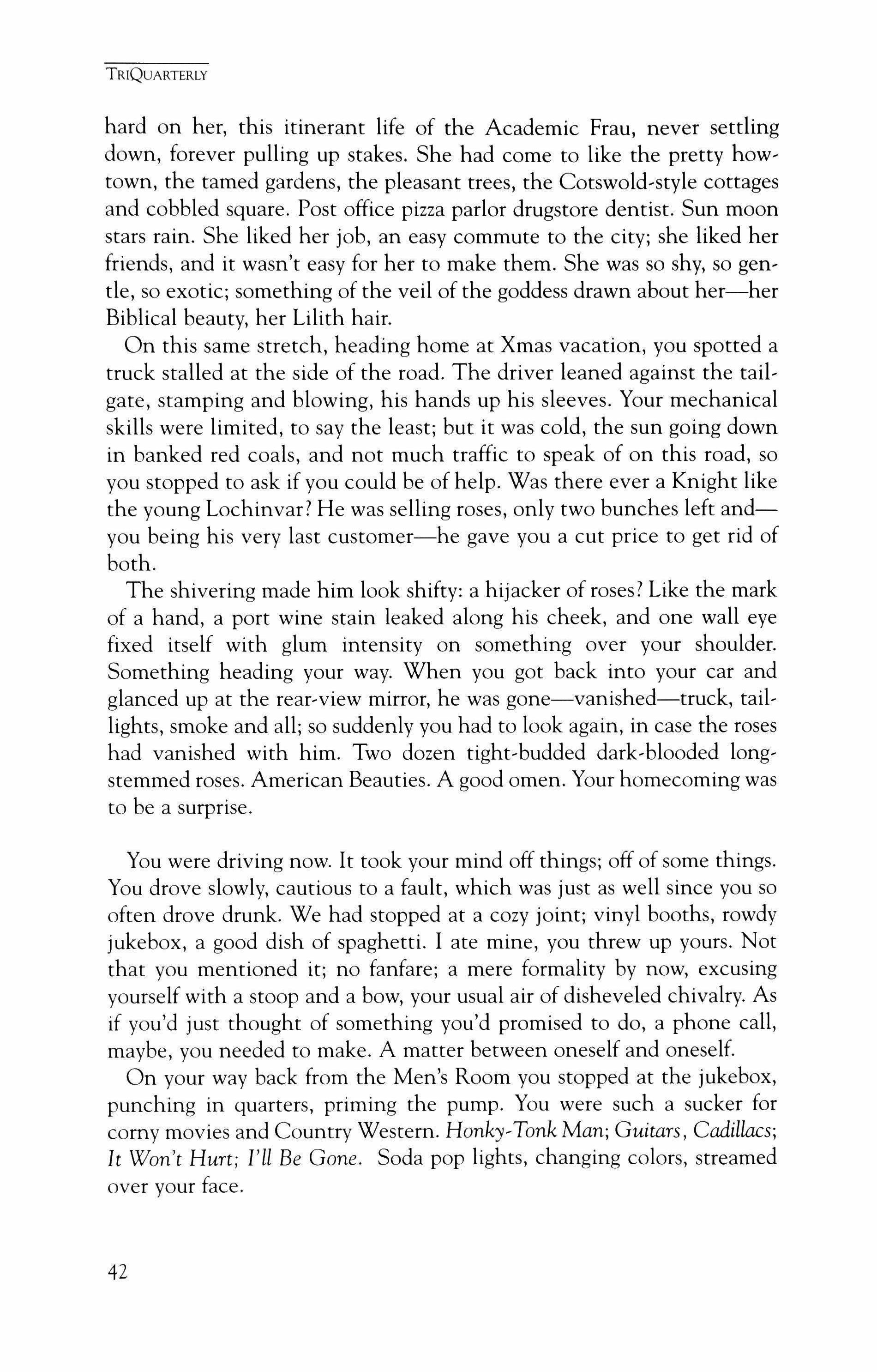
hard on her, this itinerant life of the Academic Frau, never settling down, forever pulling up stakes. She had come to like the pretty howtown, the tamed gardens, the pleasant trees, the Cotswold-style cottages and cobbled square. Post office pizza parlor drugstore dentist. Sun moon stars rain. She liked her job, an easy commute to the city; she liked her friends, and it wasn't easy for her to make them. She was so shy, so gentle, so exotic; something of the veil of the goddess drawn about her-her Biblical beauty, her Lilith hair.
On this same stretch, heading home at Xmas vacation, you spotted a truck stalled at the side of the road. The driver leaned against the tailgate, stamping and blowing, his hands up his sleeves. Your mechanical skills were limited, to say the least; but it was cold, the sun going down in banked red coals, and not much traffic to speak of on this road, so you stopped to ask if you could be of help. Was there ever a Knight like the young Lochinvar? He was selling roses, only two bunches left andyou being his very last customer-he gave you a cut price to get rid of both.
The shivering made him look shifty: a hijacker of roses? Like the mark of a hand, a port wine stain leaked along his cheek, and one wall eye fixed itself with glum intensity on something over your shoulder. Something heading your way. When you got back into your car and glanced up at the rear-view mirror, he was gone-vanished-truck, taillights, smoke and all; so suddenly you had to look again, in case the roses had vanished with him. Two dozen tight-budded dark-blooded longstemmed roses. American Beauties. A good omen. Your homecoming was to be a surprise.
You were driving now. It took your mind off things; off of some things. You drove slowly, cautious to a fault, which was just as well since you so often drove drunk. We had stopped at a cozy joint; vinyl booths, rowdy jukebox, a good dish of spaghetti. I ate mine, you threw up yours. Not that you mentioned it; no fanfare; a mere formality by now, excusing yourself with a stoop and a bow, your usual air of disheveled chivalry. As if you'd just thought of something you'd promised to do, a phone call, maybe, you needed to make. A matter between oneself and oneself.
On your way back from the Men's Room you stopped at the jukebox, punching in quarters, priming the pump. You were such a sucker for corny movies and Country Western. Honky-Tonk Man; Guitars, Cadillacs; It Won't Hurt; I'll Be Gone. Soda pop lights, changing colors, streamed over your face.
TRIQUARTERLY
42
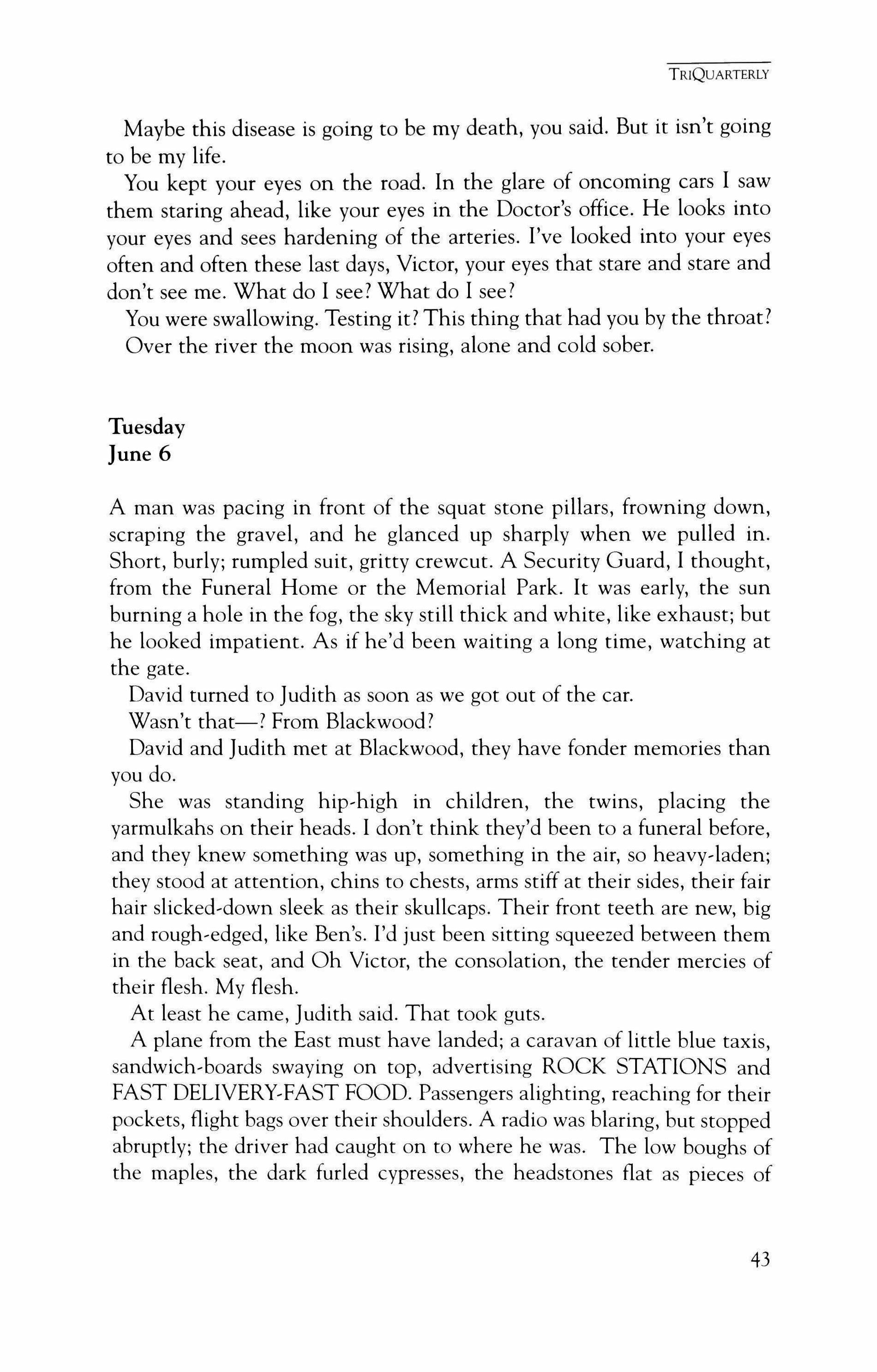
Maybe this disease is going to be my death, you said. But it isn't going to be my life.
You kept your eyes on the road. In the glare of oncoming cars I saw them staring ahead, like your eyes in the Doctor's office. He looks into your eyes and sees hardening of the arteries. I've looked into your eyes often and often these last days, Victor, your eyes that stare and stare and don't see me. What do I see? What do I see?
You were swallowing. Testing it? This thing that had you by the throat?
Over the river the moon was rising, alone and cold sober.
Tuesday June 6
A man was pacing in front of the squat stone pillars, frowning down, scraping the gravel, and he glanced up sharply when we pulled in. Short, burly; rumpled suit, gritty crewcut. A Security Guard, I thought, from the Funeral Home or the Memorial Park. It was early, the sun burning a hole in the fog, the sky still thick and white, like exhaust; but he looked impatient. As if he'd been waiting a long time, watching at the gate.
David turned to Judith as soon as we got out of the car. Wasn't that-? From Blackwood?
David and Judith met at Blackwood, they have fonder memories than you do.
She was standing hip-high in children, the twins, placing the yarmulkahs on their heads. I don't think they'd been to a funeral before, and they knew something was up, something in the air, so heavy-laden; they stood at attention, chins to chests, arms stiff at their sides, their fair hair slicked-down sleek as their skullcaps. Their front teeth are new, big and rough-edged, like Ben's. I'd just been sitting squeezed between them in the back seat, and Oh Victor, the consolation, the tender mercies of their flesh. My flesh.
At least he came, Judith said. That took guts.
A plane from the East must have landed; a caravan of little blue taxis, sandwich-boards swaying on top, advertising ROCK STATIONS and FAST DELIVERY-FAST FOOD. Passengers alighting, reaching for their pockets, flight bags over their shoulders. A radio was blaring, but stopped abruptly; the driver had caught on to where he was. The low boughs of the maples, the dark furled cypresses, the headstones flat as pieces of
TRIQUARTERLY
43
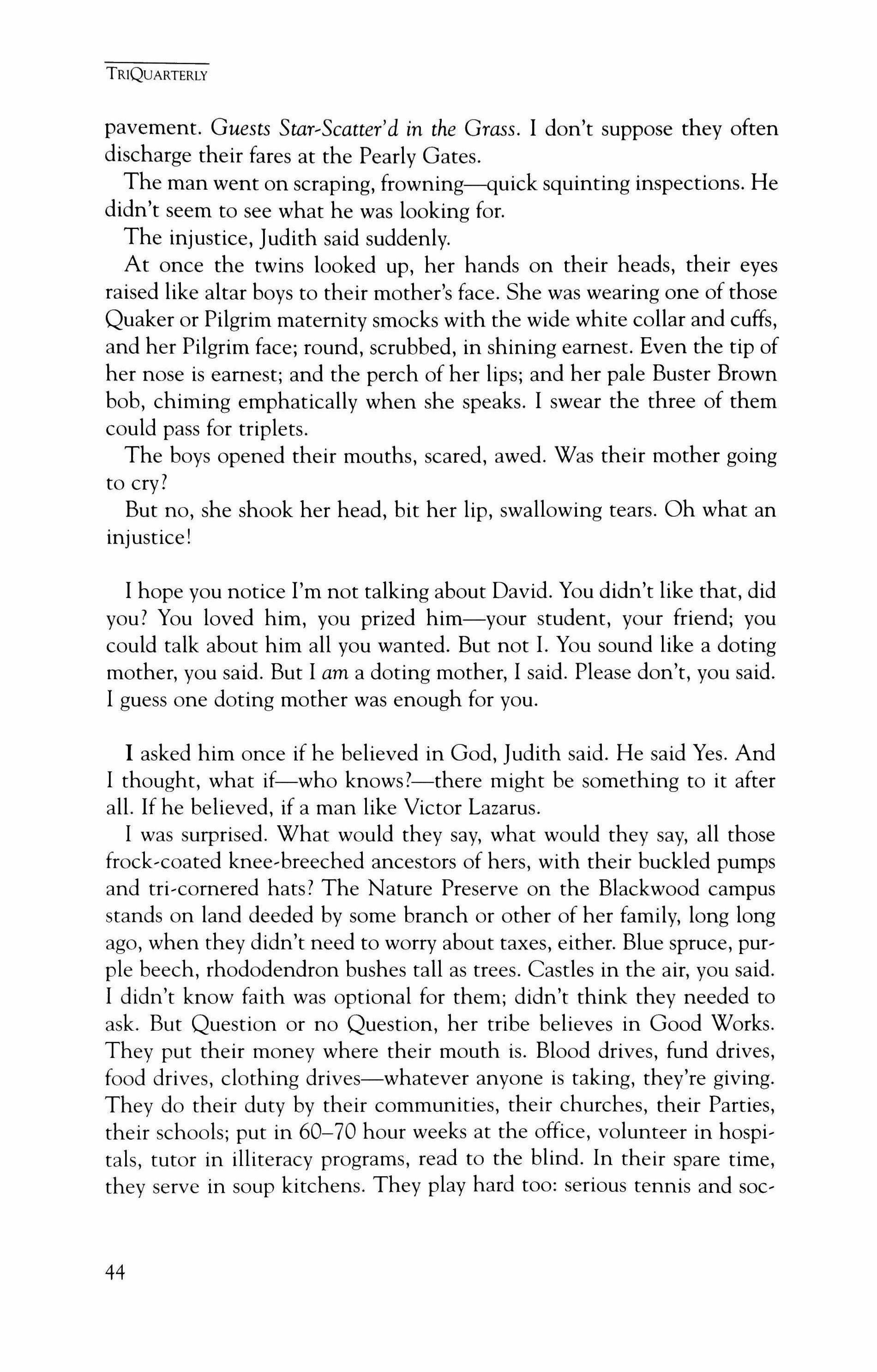
pavement. Guests Star�Scatter'd in the Grass. I don't suppose they often discharge their fares at the Pearly Gates.
The man went on scraping, frowning-quick squinting inspections. He didn't seem to see what he was looking for.
The injustice, Judith said suddenly.
At once the twins looked up, her hands on their heads, their eyes raised like altar boys to their mother's face. She was wearing one of those Quaker or Pilgrim maternity smocks with the wide white collar and cuffs, and her Pilgrim face; round, scrubbed, in shining earnest. Even the tip of her nose is earnest; and the perch of her lips; and her pale Buster Brown bob, chiming emphatically when she speaks. I swear the three of them could pass for triplets.
The boys opened their mouths, scared, awed. Was their mother going to cry?
But no, she shook her head, bit her lip, swallowing tears. Oh what an injustice!
I hope you notice I'm not talking about David. You didn't like that, did you? You loved him, you prized him-your student, your friend; you could talk about him all you wanted. But not I. You sound like a doting mother, you said. But I am a doting mother, I said. Please don't, you said. I guess one doting mother was enough for you.
I asked him once if he believed in God, Judith said. He said Yes. And I thought, what if-who knows?-there might be something to it after all. If he believed, if a man like Victor Lazarus.
I was surprised. What would they say, what would they say, all those frock-coated knee-breeched ancestors of hers, with their buckled pumps and tri-cornered hats? The Nature Preserve on the Blackwood campus stands on land deeded by some branch or other of her family, long long ago, when they didn't need to worry about taxes, either. Blue spruce, purple beech, rhododendron bushes tall as trees. Castles in the air, you said. I didn't know faith was optional for them; didn't think they needed to ask. But Question or no Question, her tribe believes in Good Works. They put their money where their mouth is. Blood drives, fund drives, food drives, clothing drives-whatever anyone is taking, they're giving. They do their duty by their communities, their churches, their Parties, their schools; put in 60-70 hour weeks at the office, volunteer in hospitals, tutor in illiteracy programs, read to the blind. In their spare time, they serve in soup kitchens. They play hard too: serious tennis and soc-
TRIQUARTERLY
44
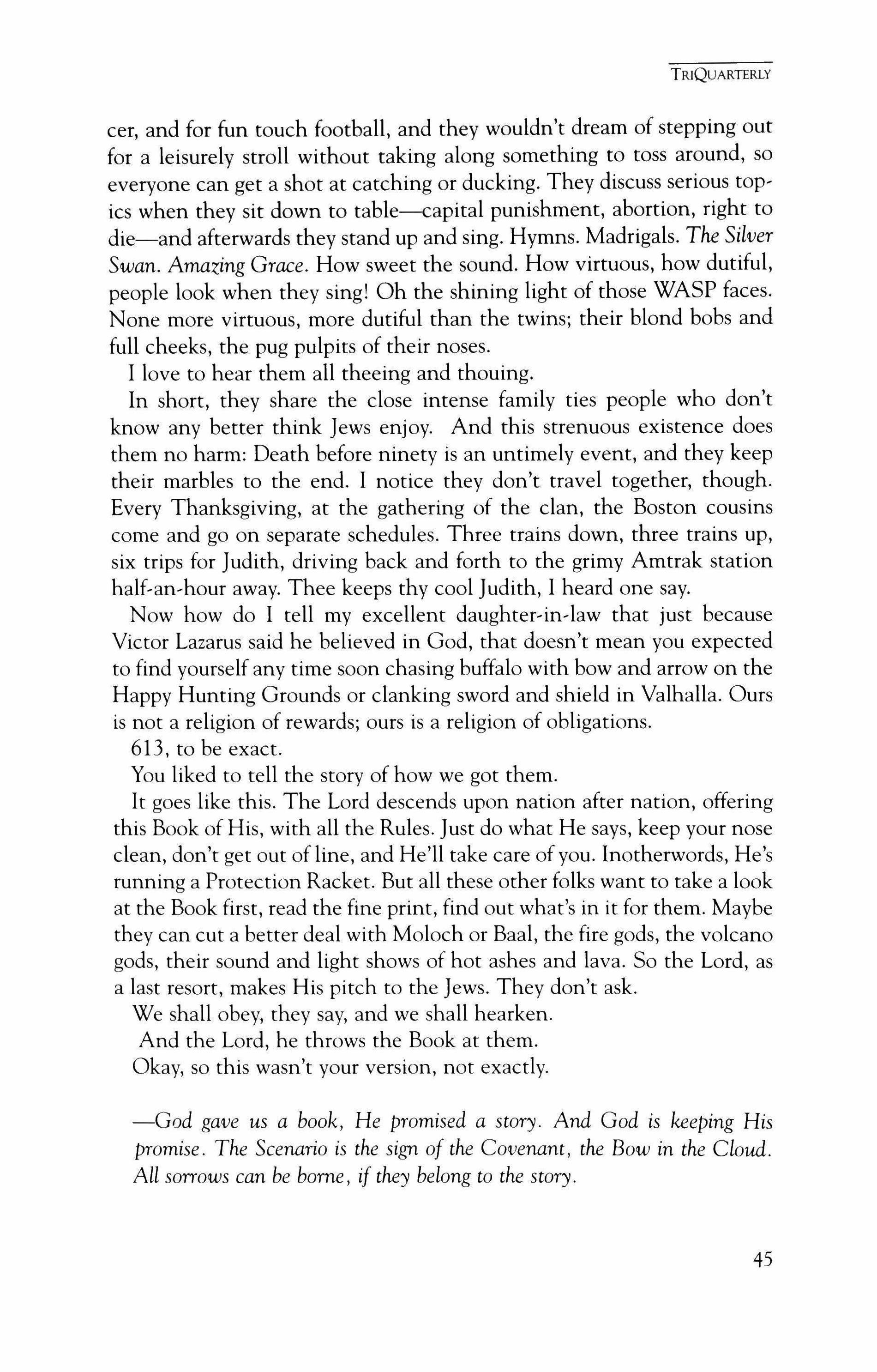
cer, and for fun touch football, and they wouldn't dream of stepping out for a leisurely stroll without taking along something to toss around, so everyone can get a shot at catching or ducking. They discuss serious topics when they sit down to table-capital punishment, abortion, right to die-and afterwards they stand up and sing. Hymns. Madrigals. The Silver Swan. Amazing Grace. How sweet the sound. How virtuous, how dutiful, people look when they sing! Oh the shining light of those WASP faces. None more virtuous, more dutiful than the twins; their blond bobs and full cheeks, the pug pulpits of their noses.
I love to hear them all theeing and thouing.
In short, they share the close intense family ties people who don't know any better think Jews enjoy. And this strenuous existence does them no harm: Death before ninety is an untimely event, and they keep their marbles to the end. I notice they don't travel together, though. Every Thanksgiving, at the gathering of the clan, the Boston cousins come and go on separate schedules. Three trains down, three trains up, six trips for Judith, driving back and forth to the grimy Amtrak station half-an-hour away. Thee keeps thy cool Judith, I heard one say.
Now how do I tell my excellent daughter-in-law that just because Victor Lazarus said he believed in God, that doesn't mean you expected to find yourself any time soon chasing buffalo with bow and arrow on the Happy Hunting Grounds or clanking sword and shield in Valhalla. Ours is not a religion of rewards; ours is a religion of obligations.
613, to be exact.
You liked to tell the story of how we got them.
It goes like this. The Lord descends upon nation after nation, offering this Book of His, with all the Rules. Just do what He says, keep your nose clean, don't get out of line, and He'll take care of you. Inotherwords, He's running a Protection Racket. But all these other folks want to take a look at the Book first, read the fine print, find out what's in it for them. Maybe they can cut a better deal with Moloch or Baal, the fire gods, the volcano gods, their sound and light shows of hot ashes and lava. So the Lord, as a last resort, makes His pitch to the Jews. They don't ask.
We shall obey, they say, and we shall hearken. And the Lord, he throws the Book at them.
Okay, so this wasn't your version, not exactly.
-God gave us a book, He promised a story. And God is keeping His promise. The Scenario is the sign of the Covenant, the Bow in the Cloud. All sorrows can be borne, if they belong to the story.
TRIQUARTERLY
45
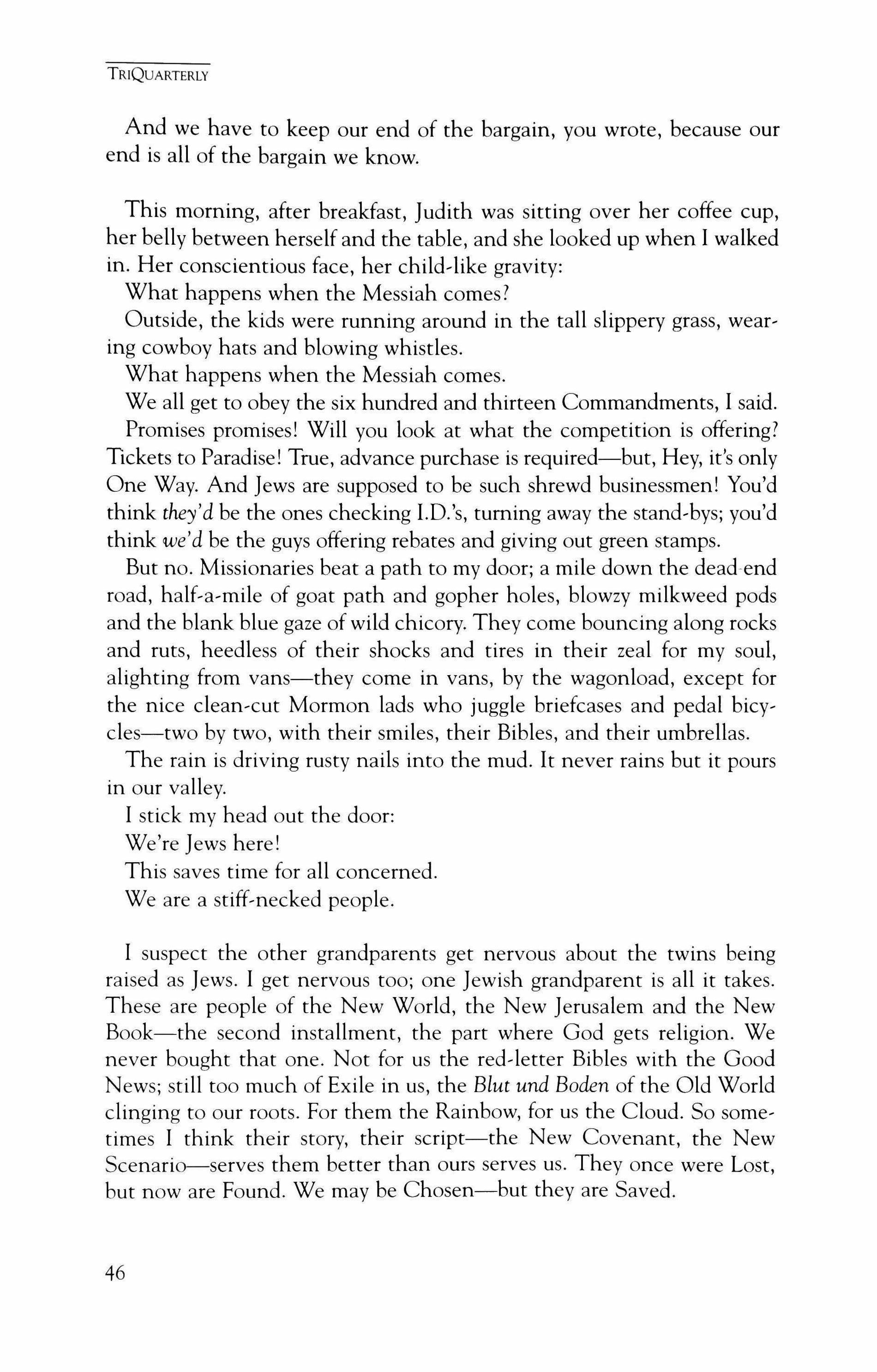
And we have to keep our end of the bargain, you wrote, because our end is all of the bargain we know.
This morning, after breakfast, Judith was sitting over her coffee cup, her belly between herself and the table, and she looked up when I walked in. Her conscientious face, her child-like gravity: What happens when the Messiah comes?
Outside, the kids were running around in the tall slippery grass, wearing cowboy hats and blowing whistles. What happens when the Messiah comes.
We all get to obey the six hundred and thirteen Commandments, I said. Promises promises! Will you look at what the competition is offering? Tickets to Paradise! True, advance purchase is required-but, Hey, it's only One Way. And Jews are supposed to be such shrewd businessmen! You'd think they'd be the ones checking 1.0.'s, turning away the stand-bys; you'd think we'd be the guys offering rebates and giving out green stamps.
But no. Missionaries beat a path to my door; a mile down the dead-end road, half-a-mile of goat path and gopher holes, blowzy milkweed pods and the blank blue gaze of wild chicory. They come bouncing along rocks and ruts, heedless of their shocks and tires in their zeal for my soul, alighting from vans-they come in vans, by the wagonload, except for the nice clean-cut Mormon lads who juggle briefcases and pedal bicycles-two by two, with their smiles, their Bibles, and their umbrellas.
The rain is driving rusty nails into the mud. It never rains but it pours in our valley.
I stick my head out the door: We're Jews here!
This saves time for all concerned. We are a stiff-necked people.
I suspect the other grandparents get nervous about the twins being raised as Jews. I get nervous too; one Jewish grandparent is all it takes. These are people of the New World, the New Jerusalem and the New Book-the second installment, the part where God gets religion. We never bought that one. Not for us the red-letter Bibles with the Good News; still too much of Exile in us, the Blut und Boden of the Old World clinging to our roots. For them the Rainbow, for us the Cloud. So sometimes I think their story, their script-the New Covenant, the New Scenario-serves them better than ours serves us. They once were Lost, but now are Found. We may be Chosen-but they are Saved.
TRIQUARTERLY
46
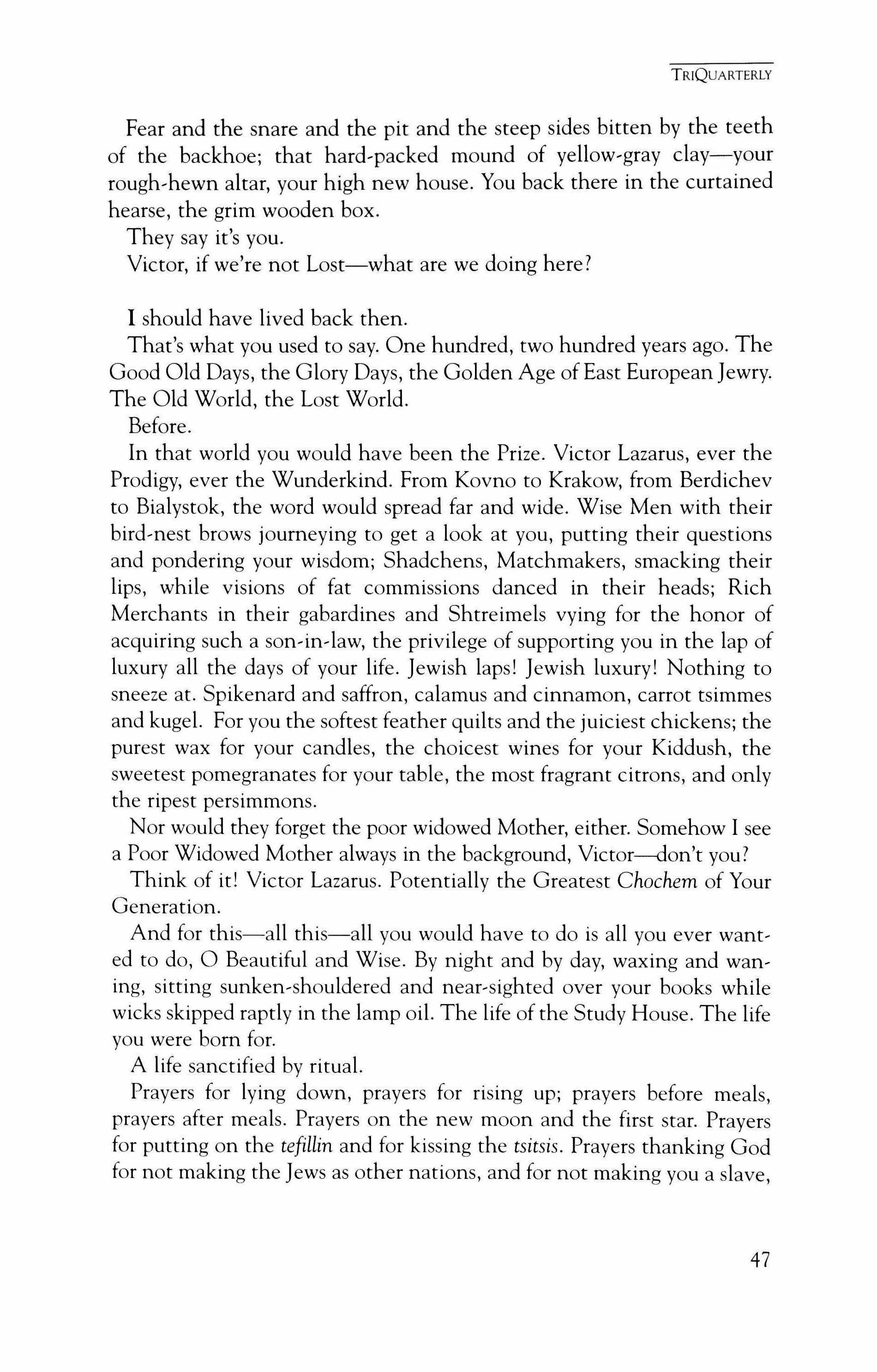
Fear and the snare and the pit and the steep sides bitten by the teeth of the backhoe; that hard-packed mound of yellow-gray clay-your rough-hewn altar, your high new house. You back there in the curtained hearse, the grim wooden box.
They say it's you.
Victor, if we're not Lost-what are we doing here?
I should have lived back then.
That's what you used to say. One hundred, two hundred years ago. The Good Old Days, the Glory Days, the Golden Age of East European Jewry. The Old World, the Lost World.
Before.
In that world you would have been the Prize. Victor Lazarus, ever the Prodigy, ever the Wunderkind. From Kovno to Krakow, from Berdichev to Bialystok, the word would spread far and wide. Wise Men with their bird-nest brows journeying to get a look at you, putting their questions and pondering your wisdom; Shadchens, Matchmakers, smacking their lips, while visions of fat commissions danced in their heads; Rich Merchants in their gabardines and Shtreimels vying for the honor of acquiring such a son-in-law, the privilege of supporting you in the lap of luxury all the days of your life. Jewish laps! Jewish luxury! Nothing to sneeze at. Spikenard and saffron, calamus and cinnamon, carrot tsimmes and kugel. For you the softest feather quilts and the juiciest chickens; the purest wax for your candles, the choicest wines for your Kiddush, the sweetest pomegranates for your table, the most fragrant citrons, and only the ripest persimmons.
Nor would they forget the poor widowed Mother, either. Somehow I see a Poor Widowed Mother always in the background, Victor---don't you?
Think of it! Victor Lazarus. Potentially the Greatest Chochem of Your Generation.
And for this-all this-all you would have to do is all you ever wanted to do, 0 Beautiful and Wise. By night and by day, waxing and waning, sitting sunken-shouldered and near-sighted over your books while wicks skipped raptly in the lamp oil. The life of the Study House. The life you were born for.
A life sanctified by ritual.
Prayers for lying down, prayers for rising up; prayers before meals, prayers after meals. Prayers on the new moon and the first star. Prayers for putting on the tefillin and for kissing the tsitsis. Prayers thanking God for not making the Jews as other nations, and for not making you a slave, 47
TRIQUARTERLY
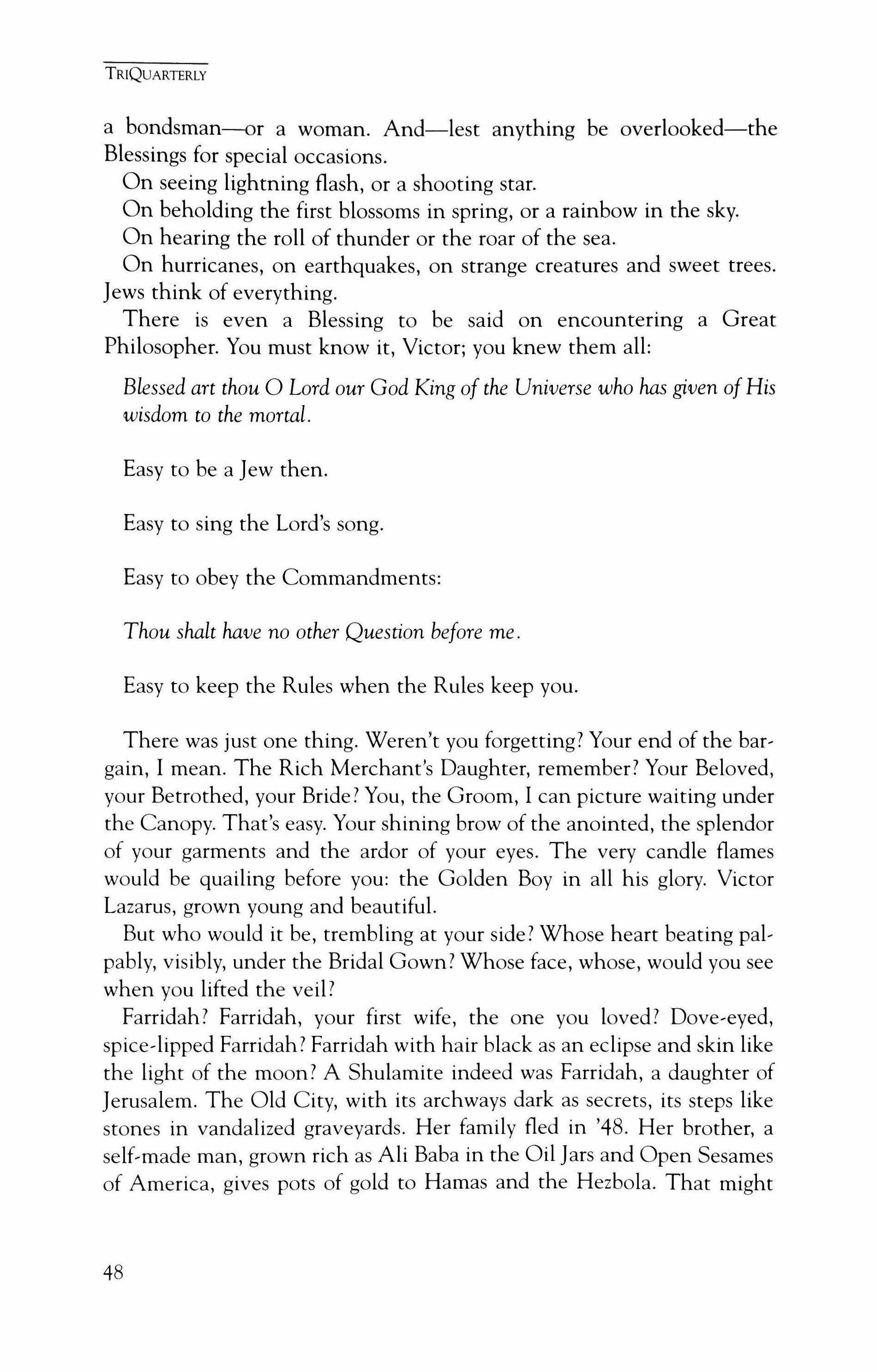
a bondsman-or a woman. And-lest anything be overlooked-the Blessings for special occasions.
On seeing lightning flash, or a shooting star.
On beholding the first blossoms in spring, or a rainbow in the sky.
On hearing the roll of thunder or the roar of the sea.
On hurricanes, on earthquakes, on strange creatures and sweet trees. Jews think of everything.
There is even a Blessing to be said on encountering a Great Philosopher. You must know it, Victor; you knew them all:
Blessed art thou 0 Lord our God King of the Universe who has given of His wisdom to the mortal.
Easy to be a Jew then.
Easy to sing the Lord's song.
Easy to obey the Commandments:
Thou shalt have no other Question before me.
Easy to keep the Rules when the Rules keep you.
There was just one thing. Weren't you forgetting? Your end of the bargain, I mean. The Rich Merchant's Daughter, remember? Your Beloved, your Betrothed, your Bride? You, the Groom, I can picture waiting under the Canopy. That's easy. Your shining brow of the anointed, the splendor of your garments and the ardor of your eyes. The very candle flames would be quailing before you: the Golden Boy in all his glory. Victor Lazarus, grown young and beautiful.
But who would it be, trembling at your side? Whose heart beating palpably, visibly, under the Bridal Gown? Whose face, whose, would you see when you lifted the veil?
Farridah? Farridah, your first wife, the one you loved? Dove-eyed, spice-lipped Farridah? Farridah with hair black as an eclipse and skin like the light of the moon? A Shulamite indeed was Farridah, a daughter of Jerusalem. The Old City, with its archways dark as secrets, its steps like stones in vandalized graveyards. Her family fled in '48. Her brother, a self-made man, grown rich as Ali Baba in the Oil Jars and Open Sesames of America, gives pots of gold to Hamas and the Hezbola. That might
TRIQUARTERLY
48
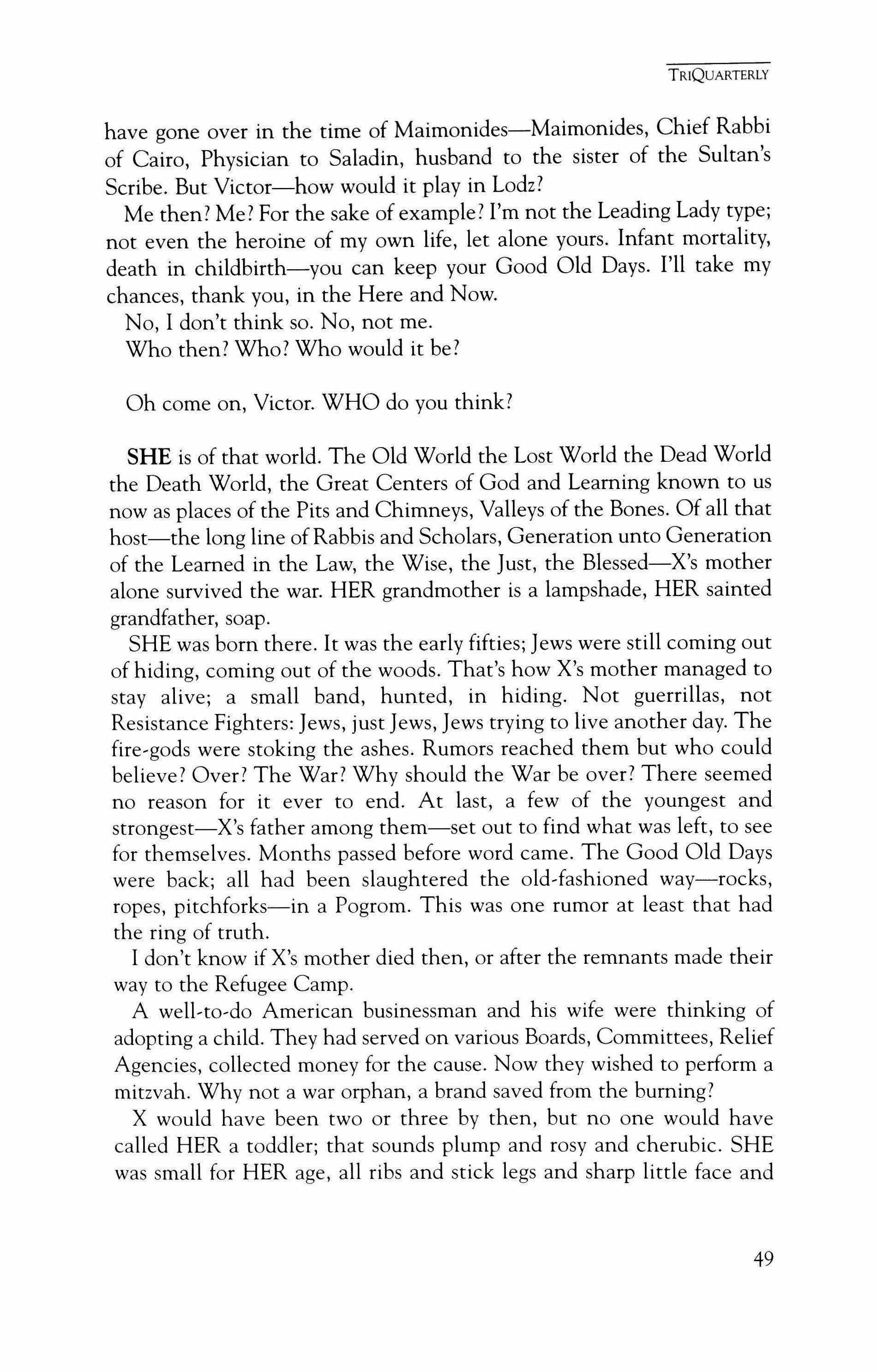
have gone over in the time of Maimonides-Maimonides, Chief Rabbi of Cairo, Physician to Saladin, husband to the sister of the Sultan's Scribe. But Victor-how would it play in Lodz?
Me then? Me? For the sake of example? I'm not the Leading Lady type; not even the heroine of my own life, let alone yours. Infant mortality, death in childbirth-you can keep your Good Old Days. I'll take my chances, thank you, in the Here and Now. No, I don't think so. No, not me. Who then? Who? Who would it be?
Oh come on, Victor. WHO do you think?
SHE is of that world. The Old World the Lost World the Dead World the Death World, the Great Centers of God and Learning known to us now as places of the Pits and Chimneys, Valleys of the Bones. Of all that host-the long line of Rabbis and Scholars, Generation unto Generation of the Learned in the Law, the Wise, the Just, the Blessed-X's mother alone survived the war. HER grandmother is a lampshade, HER sainted grandfather, soap.
SHE was born there. It was the early fifties; Jews were still coming out of hiding, coming out of the woods. That's how X's mother managed to stay alive; a small band, hunted, in hiding. Not guerrillas, not Resistance Fighters: Jews, just Jews, Jews trying to live another day. The fire-gods were stoking the ashes. Rumors reached them but who could believe? Over? The War? Why should the War be over? There seemed no reason for it ever to end. At last, a few of the youngest and strongest-X's father among them-set out to find what was left, to see for themselves. Months passed before word came. The Good Old Days were back; all had been slaughtered the old-fashioned way-rocks, ropes, pitchforks-in a Pogrom. This was one rumor at least that had the ring of truth.
I don't know if X's mother died then, or after the remnants made their way to the Refugee Camp.
A well-to-do American businessman and his wife were thinking of adopting a child. They had served on various Boards, Committees, Relief Agencies, collected money for the cause. Now they wished to perform a mitzvah. Why not a war orphan, a brand saved from the burning?
X would have been two or three by then, but no one would have called HER a toddler; that sounds plump and rosy and cherubic. SHE was small for HER age, all ribs and stick legs and sharp little face and
TRIQUARTERLY
49
TRIQUARTERLY
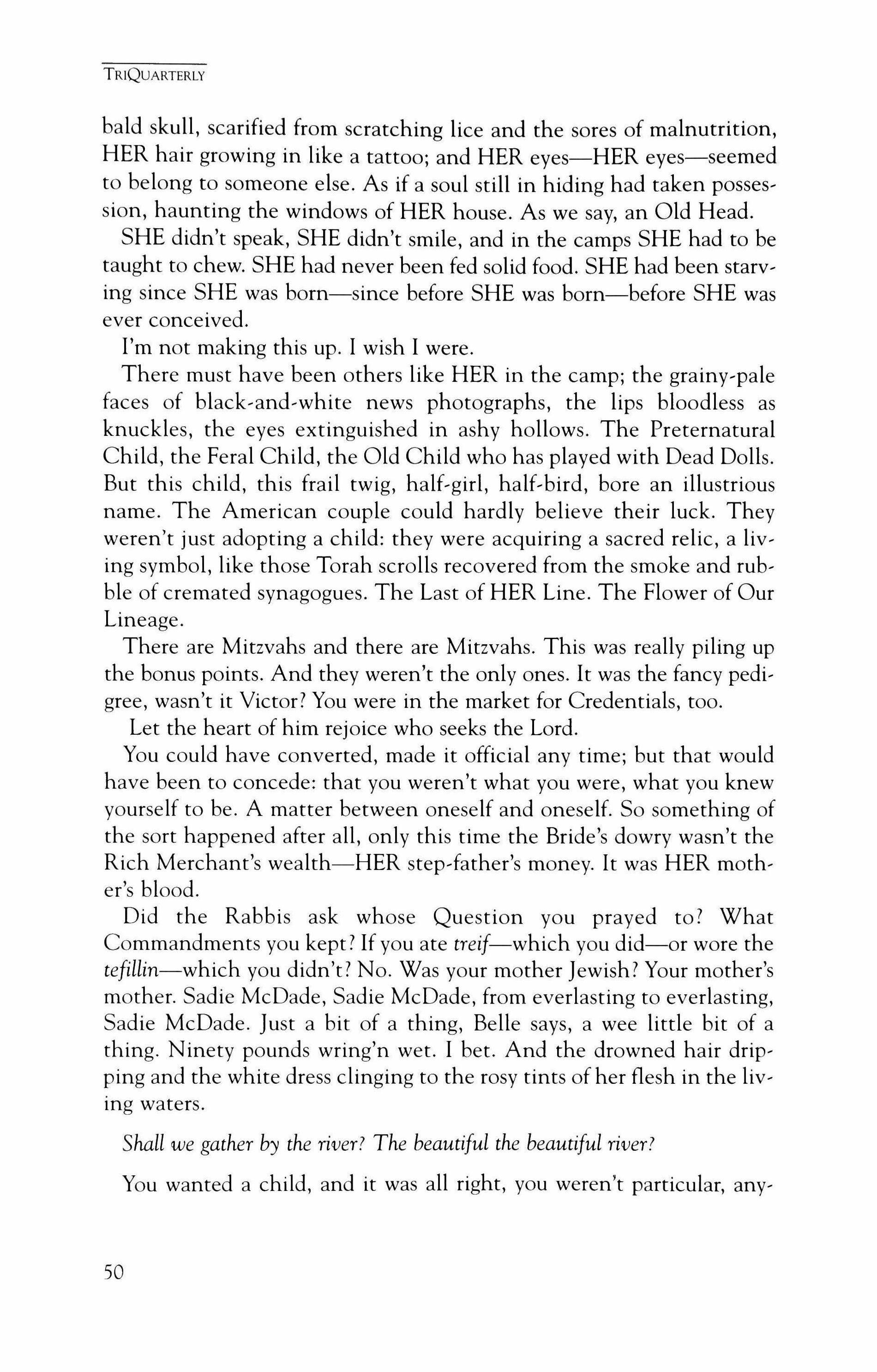
bald skull, scarified from scratching lice and the sores of malnutrition, HER hair growing in like a tattoo; and HER eyes-HER eyes-seemed to belong to someone else. As if a soul still in hiding had taken possession, haunting the windows of HER house. As we say, an Old Head.
SHE didn't speak, SHE didn't smile, and in the camps SHE had to be taught to chew. SHE had never been fed solid food. SHE had been starving since SHE was born-since before SHE was born-before SHE was ever conceived.
I'm not making this up. I wish I were.
There must have been others like HER in the camp; the grainy-pale faces of black-and-white news photographs, the lips bloodless as knuckles, the eyes extinguished in ashy hollows. The Preternatural Child, the Feral Child, the Old Child who has played with Dead Dolls. But this child, this frail twig, half-girl, half-bird, bore an illustrious name. The American couple could hardly believe their luck. They weren't just adopting a child: they were acquiring a sacred relic, a living symbol, like those Torah scrolls recovered from the smoke and rubble of cremated synagogues. The Last of HER Line. The Flower of Our Lineage.
There are Mitzvahs and there are Mitzvahs. This was really piling up the bonus points. And they weren't the only ones. It was the fancy pedigree, wasn't it Victor? You were in the market for Credentials, too.
Let the heart of him rejoice who seeks the Lord.
You could have converted, made it official any time; but that would have been to concede: that you weren't what you were, what you knew yourself to be. A matter between oneself and oneself. So something of the sort happened after all, only this time the Bride's dowry wasn't the Rich Merchant's wealth-HER step-father's money. It was HER mother's blood.
Did the Rabbis ask whose Question you prayed to? What Commandments you kept? If you ate treif-which you did-or wore the tefillin-which you didn't? No. Was your mother Jewish? Your mother's mother. Sadie McDade, Sadie McDade, from everlasting to everlasting, Sadie McDade. Just a bit of a thing, Belle says, a wee little bit of a thing. Ninety pounds wring'n wet. I bet. And the drowned hair dripping and the white dress clinging to the rosy tints of her flesh in the living waters.
Shall we gather by the river? The beautiful the beautiful river?
You wanted a child, and it was all right, you weren't particular, any-
50
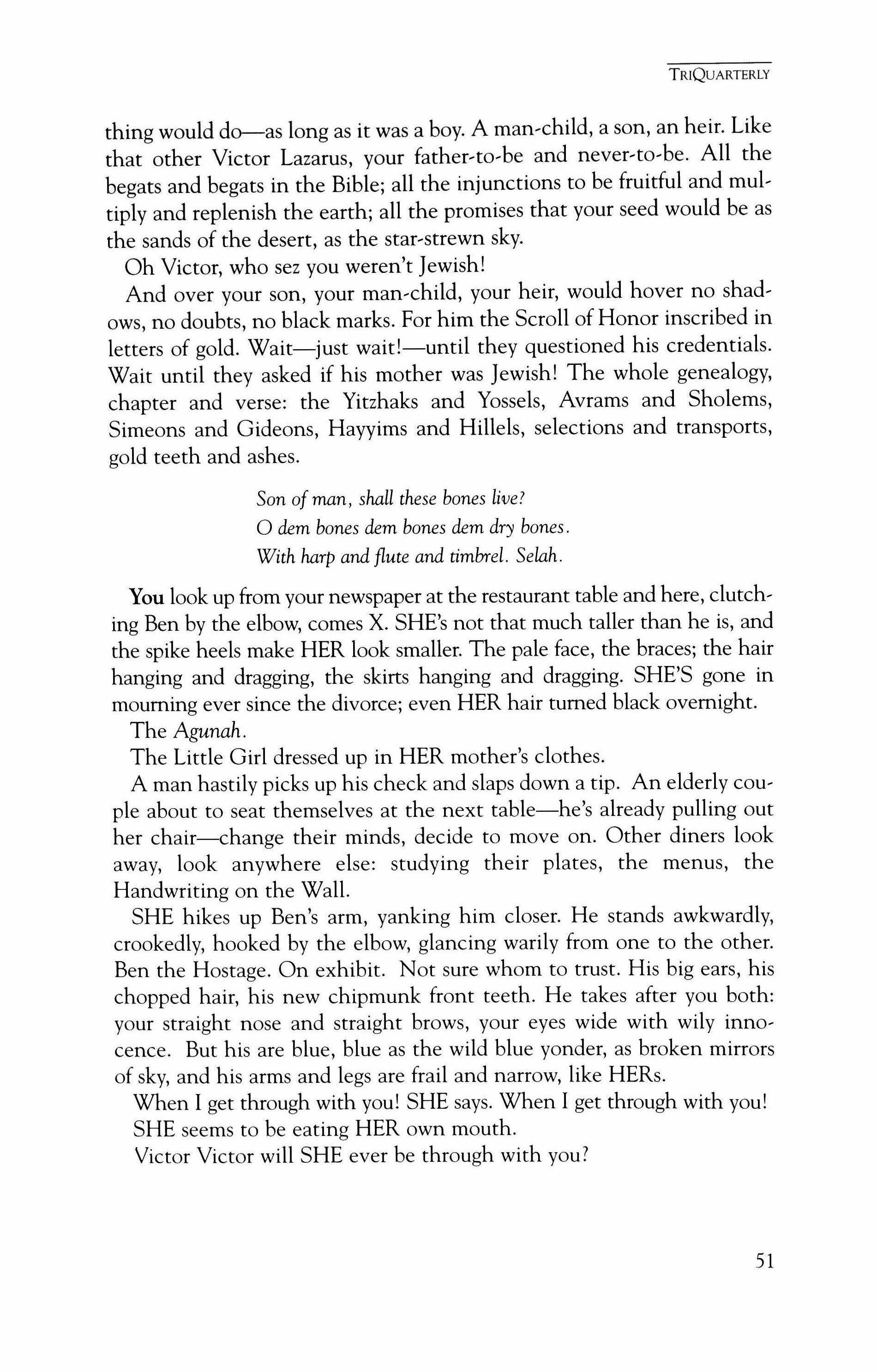
thing would do-as long as it was a boy. A man-child, a son, an heir. Like that other Victor Lazarus, your father-to-be and never-to-be. All the begats and begats in the Bible; all the injunctions to be fruitful and multiply and replenish the earth; all the promises that your seed would be as the sands of the desert, as the star-strewn sky.
Oh Victor, who sez you weren't Jewish!
And over your son, your man-child, your heir, would hover no shadows, no doubts, no black marks. For him the Scroll of Honor inscribed in letters of gold. Wait-just wait!-until they questioned his credentials. Wait until they asked if his mother was Jewish! The whole genealogy, chapter and verse: the Yitzhaks and Yossels, Avrams and Sholems, Simeons and Gideons, Hayyims and Hillels, selections and transports, gold teeth and ashes.
Son of man, shall these bones live? o dem bones dem bones dem dry bones. With harp and flute and timbrel. Selah.
You look up from your newspaper at the restaurant table and here, clutching Ben by the elbow, comes X. SHE's not that much taller than he is, and the spike heels make HER look smaller. The pale face, the braces; the hair hanging and dragging, the skirts hanging and dragging. SHE'S gone in mourning ever since the divorce; even HER hair turned black overnight.
The Agunah.
The Little Girl dressed up in HER mother's clothes.
A man hastily picks up his check and slaps down a tip. An elderly couple about to seat themselves at the next table-he's already pulling out her chair-change their minds, decide to move on. Other diners look away, look anywhere else: studying their plates, the menus, the Handwriting on the Wall.
SHE hikes up Ben's arm, yanking him closer. He stands awkwardly, crookedly, hooked by the elbow, glancing warily from one to the other. Ben the Hostage. On exhibit. Not sure whom to trust. His big ears, his chopped hair, his new chipmunk front teeth. He takes after you both: your straight nose and straight brows, your eyes wide with wily innocence. But his are blue, blue as the wild blue yonder, as broken mirrors of sky, and his arms and legs are frail and narrow, like HERs. When I get through with you! SHE says. When I get through with you! SHE seems to be eating HER own mouth.
Victor Victor will SHE ever be through with you?
TRIQUARTERLY
51
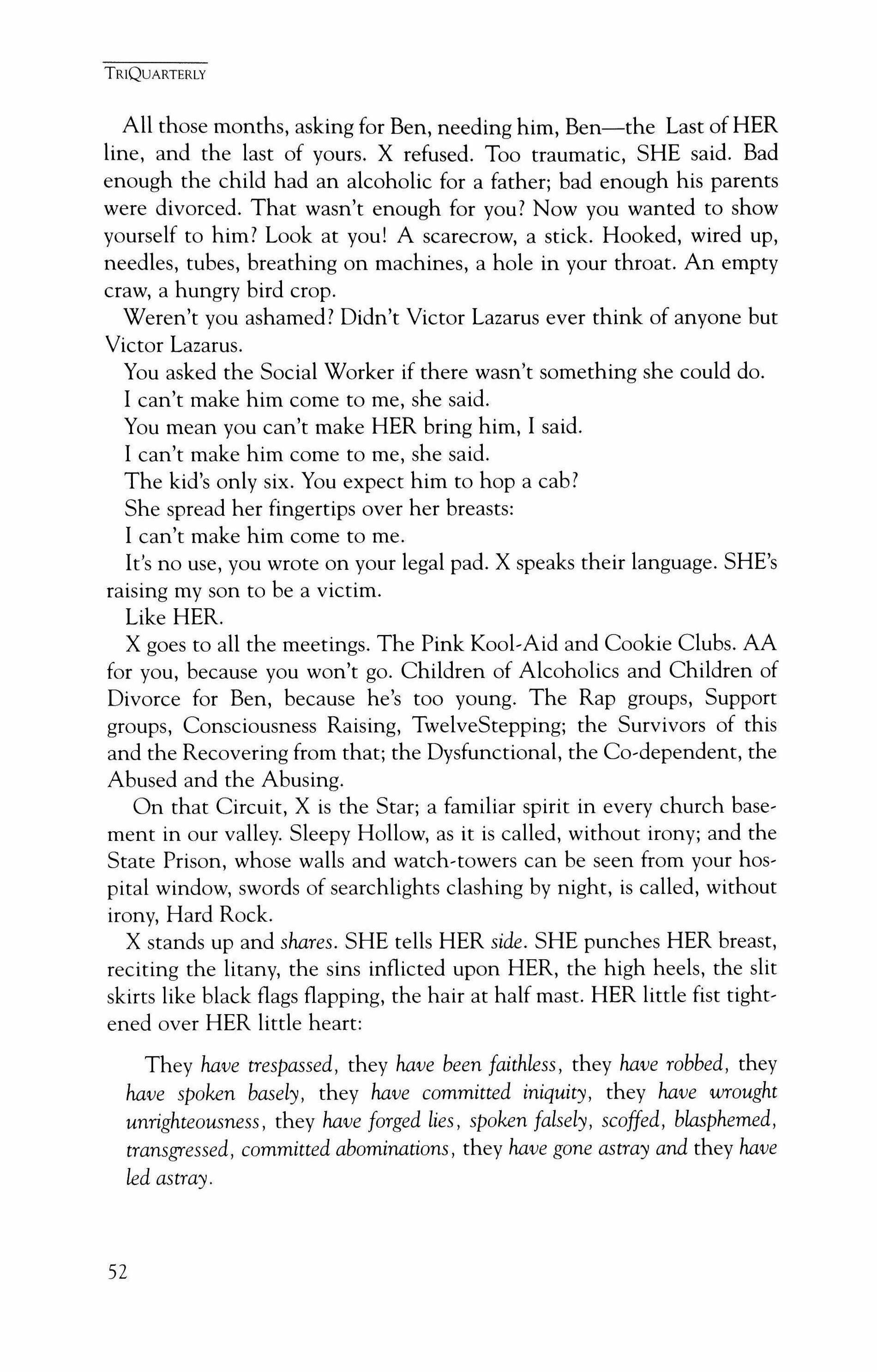
All those months, asking for Ben, needing him, Ben-the Last of HER line, and the last of yours. X refused. Too traumatic, SHE said. Bad enough the child had an alcoholic for a father; bad enough his parents were divorced. That wasn't enough for you? Now you wanted to show yourself to him? Look at you! A scarecrow, a stick. Hooked, wired up, needles, tubes, breathing on machines, a hole in your throat. An empty craw, a hungry bird crop.
Weren't you ashamed? Didn't Victor Lazarus ever think of anyone but Victor Lazarus.
You asked the Social Worker if there wasn't something she could do. I can't make him come to me, she said.
You mean you can't make HER bring him, I said. I can't make him come to me, she said.
The kid's only six. You expect him to hop a cab?
She spread her fingertips over her breasts: I can't make him come to me.
It's no use, you wrote on your legal pad. X speaks their language. SHE's raising my son to be a victim.
Like HER.
X goes to all the meetings. The Pink Kool-Aid and Cookie Clubs. AA for you, because you won't go. Children of Alcoholics and Children of Divorce for Ben, because he's too young. The Rap groups, Support groups, Consciousness Raising, TwelveStepping; the Survivors of this and the Recovering from that; the Dysfunctional, the Co-dependent, the Abused and the Abusing.
On that Circuit, X is the Star; a familiar spirit in every church basement in our valley. Sleepy Hollow, as it is called, without irony; and the State Prison, whose walls and watch-towers can be seen from your hospital window, swords of searchlights clashing by night, is called, without irony, Hard Rock.
X stands up and shares. SHE tells HER side. SHE punches HER breast, reciting the litany, the sins inflicted upon HER, the high heels, the slit skirts like black flags flapping, the hair at half mast. HER little fist tightened over HER little heart:
They have trespassed, they have been faithless, they have robbed, they have spoken basely, they have committed iniquity, they have 'Wrought unrighteousness, they have forged lies, spoken falsely, scoffed, blasphemed, transgressed, committed abominations, they have gone astray and they have led astray.
TRIQUARTERLY
52
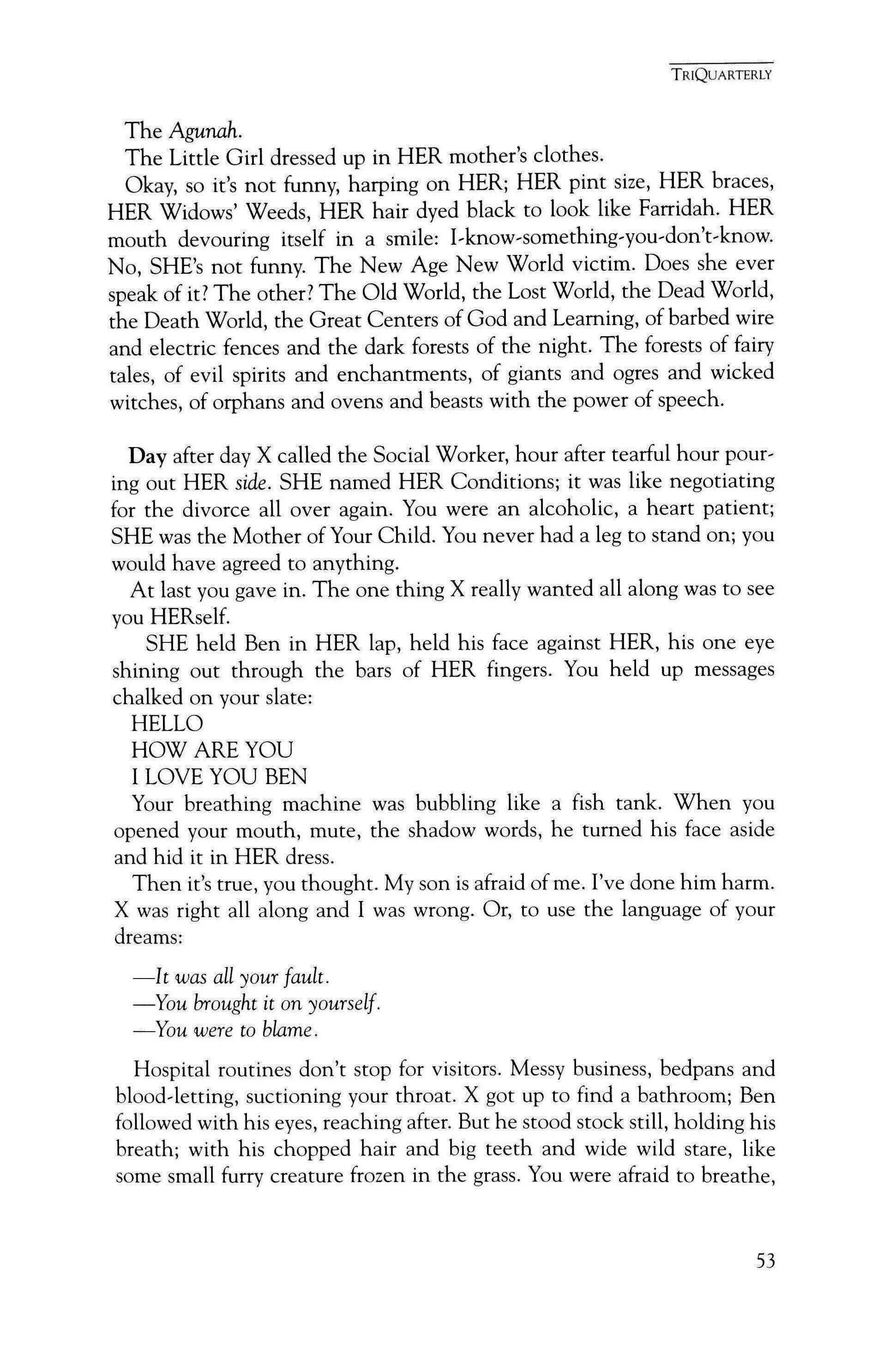
The Agunah.
The Little Girl dressed up in HER mother's clothes.
Okay, so it's not funny, harping on HER; HER pint size, HER braces, HER Widows' Weeds, HER hair dyed black to look like Farridah. HER mouth devouring itself in a smile: I�know�something�you�don't�know. No, SHE's not funny. The New Age New World victim. Does she ever speak of it? The other? The Old World, the Lost World, the Dead World, the Death World, the Great Centers of God and Learning, of barbed wire and electric fences and the dark forests of the night. The forests of fairy tales, of evil spirits and enchantments, of giants and ogres and wicked witches, of orphans and ovens and beasts with the power of speech.
Day after day X called the Social Worker, hour after tearful hour pouring out HER side. SHE named HER Conditions; it was like negotiating for the divorce all over again. You were an alcoholic, a heart patient; SHE was the Mother of Your Child. You never had a leg to stand on; you would have agreed to anything.
At last you gave in. The one thing X really wanted all along was to see you HERself.
SHE held Ben in HER lap, held his face against HER, his one eye shining out through the bars of HER fingers. You held up messages chalked on your slate:
HOW ARE YOU I LOVE YOU BEN
Your breathing machine was bubbling like a fish tank. When you opened your mouth, mute, the shadow words, he turned his face aside and hid it in HER dress.
Then it's true, you thought. My son is afraid of me. I've done him harm. X was right all along and I was wrong. Or, to use the language of your dreams:
-It was all your fault.
-You brought it on yourself.
-You were to blame.
Hospital routines don't stop for visitors. Messy business, bedpans and blood-letting, suctioning your throat. X got up to find a bathroom; Ben followed with his eyes, reaching after. But he stood stock still, holding his breath; with his chopped hair and big teeth and wide wild stare, like some small furry creature frozen in the grass. You were afraid to breathe,
TRIQUARTERLY
HELLO
53
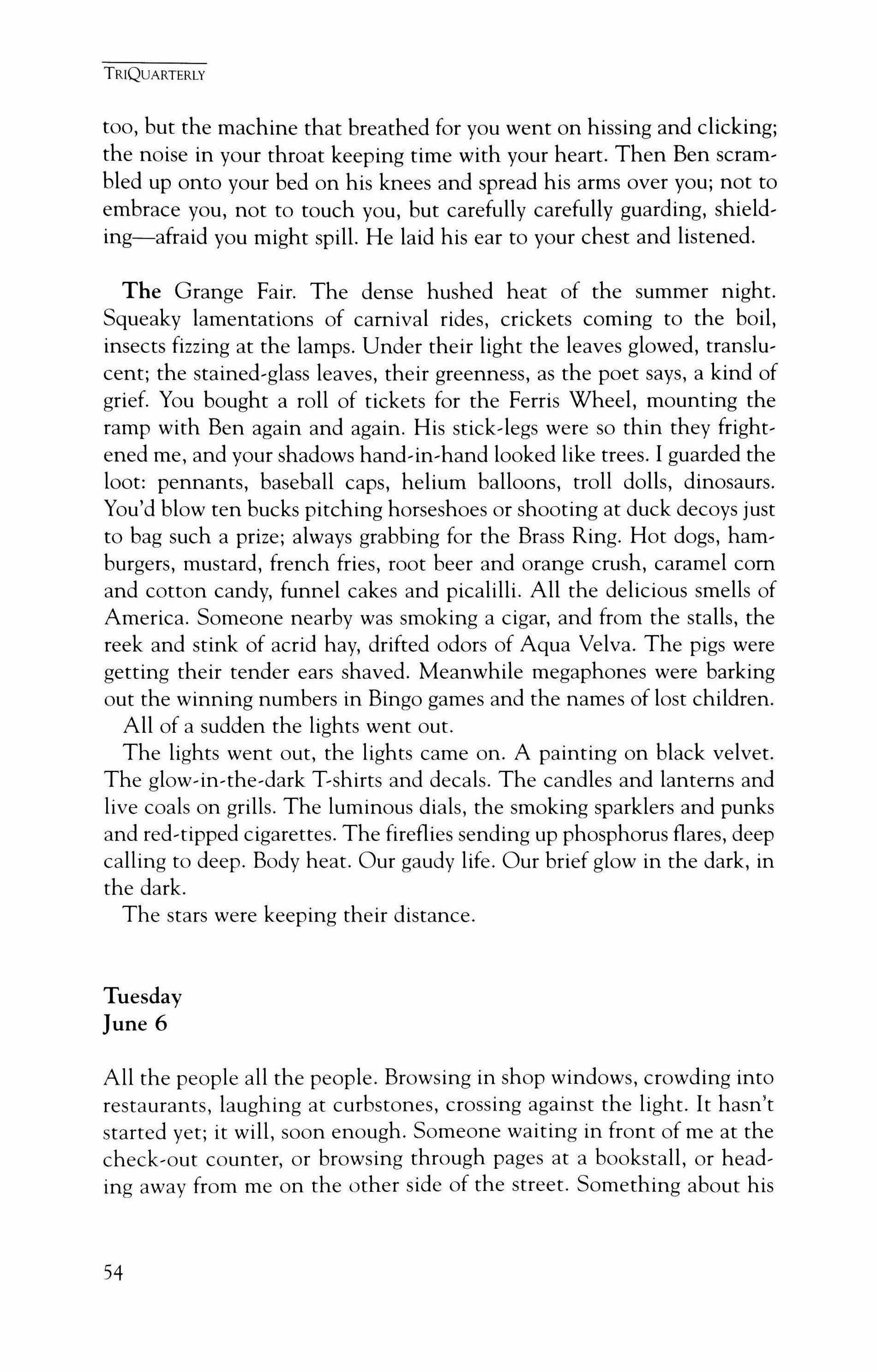
too, but the machine that breathed for you went on hissing and clicking; the noise in your throat keeping time with your heart. Then Ben scrambled up onto your bed on his knees and spread his arms over you; not to embrace you, not to touch you, but carefully carefully guarding, shielding-afraid you might spill. He laid his ear to your chest and listened.
The Grange Fair. The dense hushed heat of the summer night. Squeaky lamentations of carnival rides, crickets coming to the boil, insects fizzing at the lamps. Under their light the leaves glowed, translucent; the stained-glass leaves, their greenness, as the poet says, a kind of grief. You bought a roll of tickets for the Ferris Wheel, mounting the ramp with Ben again and again. His stick-legs were so thin they frightened me, and your shadows hand-in-hand looked like trees. I guarded the loot: pennants, baseball caps, helium balloons, troll dolls, dinosaurs. You'd blow ten bucks pitching horseshoes or shooting at duck decoys just to bag such a prize; always grabbing for the Brass Ring. Hot dogs, hamburgers, mustard, french fries, root beer and orange crush, caramel com and cotton candy, funnel cakes and picalilli. All the delicious smells of America. Someone nearby was smoking a cigar, and from the stalls, the reek and stink of acrid hay, drifted odors of Aqua Velva. The pigs were getting their tender ears shaved. Meanwhile megaphones were barking out the winning numbers in Bingo games and the names of lost children. All of a sudden the lights went out.
The lights went out, the lights came on. A painting on black velvet. The glow-in-the-dark T-shirts and decals. The candles and lanterns and live coals on grills. The luminous dials, the smoking sparklers and punks and red-tipped cigarettes. The fireflies sending up phosphorus flares, deep calling to deep. Body heat. Our gaudy life. Our brief glow in the dark, in the dark.
The stars were keeping their distance.
Tuesday June 6
All the people all the people. Browsing in shop windows, crowding into restaurants, laughing at curbstones, crossing against the light. It hasn't started yet; it will, soon enough. Someone waiting in front of me at the check-out counter, or browsing through pages at a bookstall, or heading away from me on the other side of the street. Something about his
TRIQUARTERLY
54
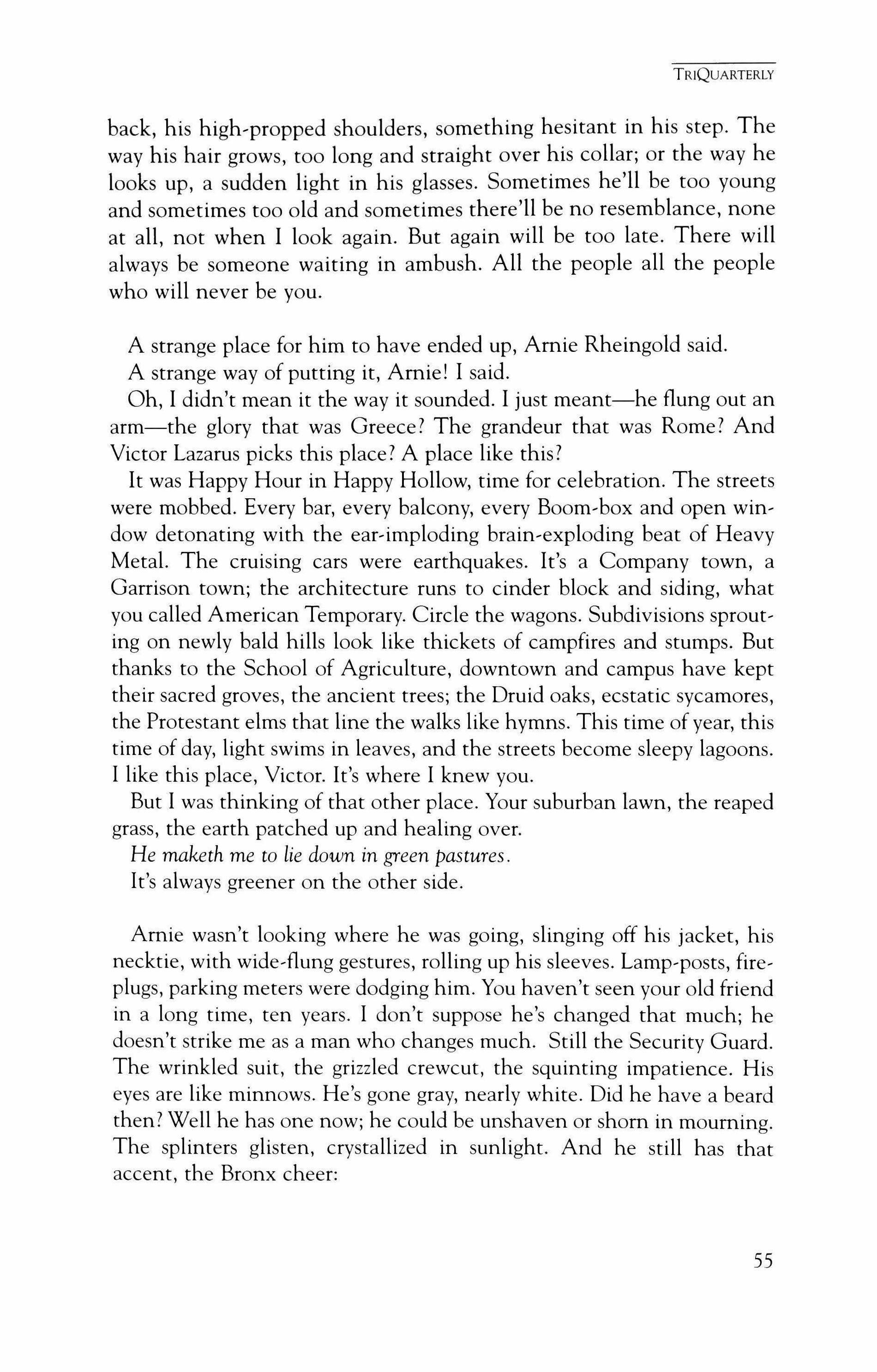
back, his high-propped shoulders, something hesitant in his step. The way his hair grows, too long and straight over his collar; or the way he looks up, a sudden light in his glasses. Sometimes he'll be too young and sometimes too old and sometimes there'll be no resemblance, none at all, not when I look again. But again will be too late. There will always be someone waiting in ambush. All the people all the people who will never be you.
A strange place for him to have ended up, Arnie Rheingold said.
A strange way of putting it, Arnie! I said.
Oh, I didn't mean it the way it sounded. I just meant-he flung out an arm-the glory that was Greece? The grandeur that was Rome? And Victor Lazarus picks this place? A place like this?
It was Happy Hour in Happy Hollow, time for celebration. The streets were mobbed. Every bar, every balcony, every Boom-box and open window detonating with the ear-imploding brain-exploding beat of Heavy Metal. The cruising cars were earthquakes. It's a Company town, a Garrison town; the architecture runs to cinder block and siding, what you called American Temporary. Circle the wagons. Subdivisions sprouting on newly bald hills look like thickets of campfires and stumps. But thanks to the School of Agriculture, downtown and campus have kept their sacred groves, the ancient trees; the Druid oaks, ecstatic sycamores, the Protestant elms that line the walks like hymns. This time of year, this time of day, light swims in leaves, and the streets become sleepy lagoons. I like this place, Victor. It's where I knew you.
But I was thinking of that other place. Your suburban lawn, the reaped grass, the earth patched up and healing over.
He maketh me to lie down in green pastures.
It's always greener on the other side.
Arnie wasn't looking where he was going, slinging off his jacket, his necktie, with wide-flung gestures, rolling up his sleeves. Lamp-posts, fireplugs, parking meters were dodging him. You haven't seen your old friend in a long time, ten years. I don't suppose he's changed that much; he doesn't strike me as a man who changes much. Still the Security Guard. The wrinkled suit, the grizzled crewcut, the squinting impatience. His eyes are like minnows. He's gone gray, nearly white. Did he have a beard then? Well he has one now; he could be unshaven or shorn in mourning. The splinters glisten, crystallized in sunlight. And he still has that accent, the Bronx cheer:
TRIQUARTERLY
55

Lady of Spain I adaww�you
Right from the time I first sore-you
Victor never talked about me? He never told you anything about Blackwood? He sounded disappointed. It wouldn't have been flattering, I gathered, if you had; but we all have our own versions of the tale, and nobody likes to get left out. Maybe it never mattered much to Victor, he said; if anything ever mattered much to Victor. But it mattered to me: I've been thinking about it for the last ten years. Victor called it a failyuh of friendship. Sounds like him, doesn't it? So Victor-ian. But don't get me wrong, I don't come as a supplicant. I'm not taking that rap, you can't pin it on me. It was all his fault. He brought it on himself.
I said that's what I used to think too, but I had learned to my sorrow it wasn't so.
Arnie frowned. It was that word sorrow. He didn't like it, no good could come of it. He wasn't here to talk about sorrow. Next thing you know, I'll be crying on his shoulder, blowing my nose in his handkerchief. Next thing you know, I'll be talking about myself.
All of a sudden the air is whizzing and whirring with big winged things that spatter and clack like wind-up toys. Tarnished, iridescent, like dark oily rainbows, like glass long buried in the earth. Empty shells tum up everywhere, discarded selves. The eye-bubbles, the antennae, the tiny nymph wings, even the cilia on the insect legs. And the trees are in an uproar, a shrill shimmering din. Every leaf metallic; tinkling cymbals, tinny discs on tambourines.
Cicadas, I said. You know-seventeen year locusts? It's the year of the Great Hatching.
Arnie had been brushing bugs off his sleeves without noticing. They don't look where they're going, either.
A strange life-cycle, I said. I looked it up in the encyclopedia. They lay their eggs deep, the roots of trees. They spend most of their lives underground, in the pupal stage. Then they hatch, they mate, they collide and die. It's a suicide mission. That's their mating call.
Cicaders?
The wincing inspection. His frown was becoming a twitch, a tic. What's with this dame? First it's sorrow, now it's cicadas? What did insects have to do with it? The trees want to talk, let them talk. A man after your own heart, Victor. For all he cared they could be yakking Greek.
And the trees of the wood sing for joy!
TRIQUARTERLY
56
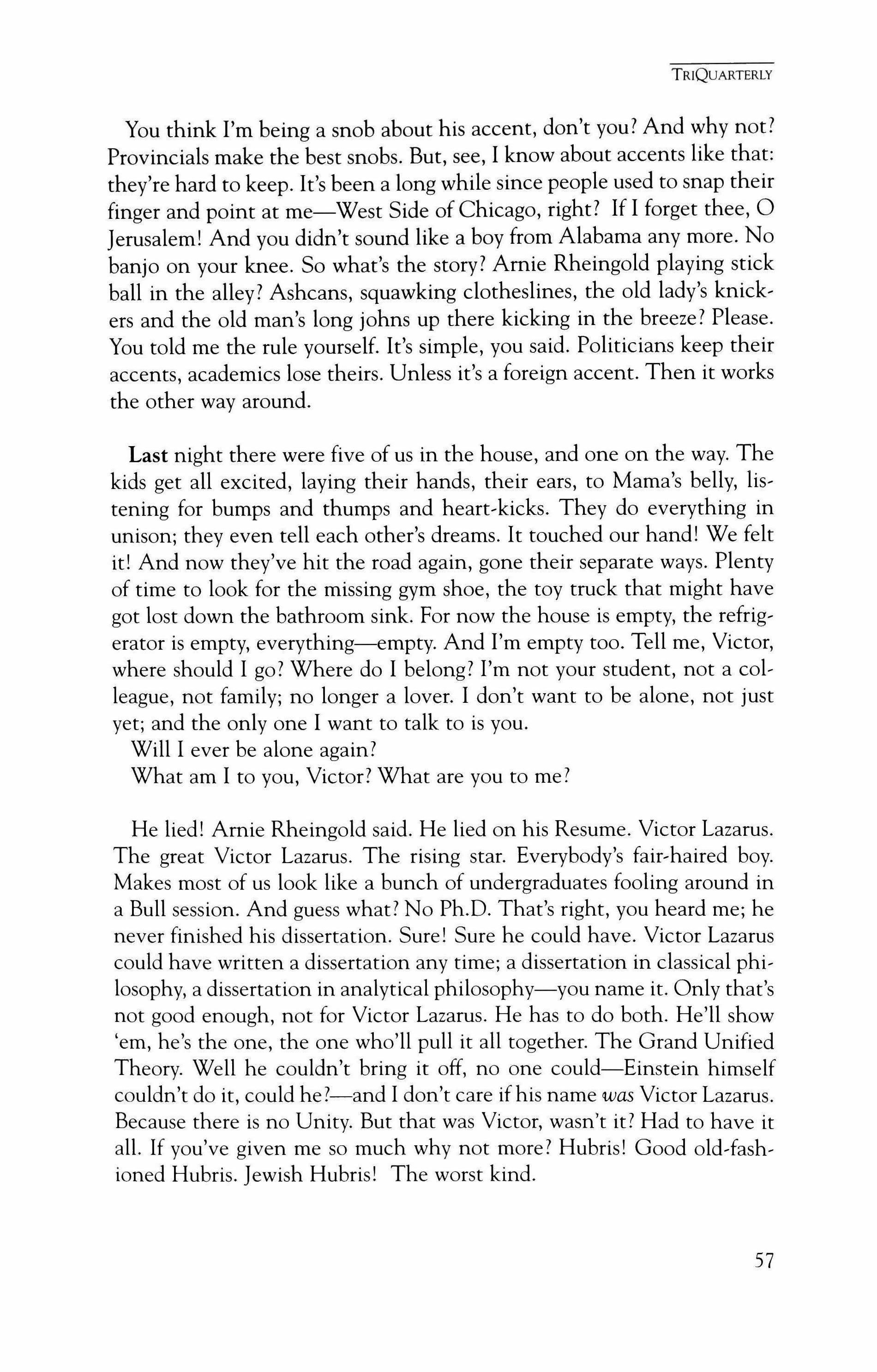
You think I'm being a snob about his accent, don't you? And why not? Provincials make the best snobs. But, see, I know about accents like that: they're hard to keep. It's been a long while since people used to snap their finger and point at me-West Side of Chicago, right? If I forget thee, 0 Jerusalem! And you didn't sound like a boy from Alabama any more. No banjo on your knee. So what's the story? Arnie Rheingold playing stick ball in the alley? Ashcans, squawking clotheslines, the old lady's knickers and the old man's long johns up there kicking in the breeze? Please. You told me the rule yourself. It's simple, you said. Politicians keep their accents, academics lose theirs. Unless it's a foreign accent. Then it works the other way around.
Last night there were five of us in the house, and one on the way. The kids get all excited, laying their hands, their ears, to Mama's belly, listening for bumps and thumps and heart-kicks. They do everything in unison; they even tell each other's dreams. It touched our hand! We felt it! And now they've hit the road again, gone their separate ways. Plenty of time to look for the missing gym shoe, the toy truck that might have got lost down the bathroom sink. For now the house is empty, the refrigerator is empty, everything-empty. And I'm empty too. Tell me, Victor, where should I go? Where do I belong? I'm not your student, not a colleague, not family; no longer a lover. I don't want to be alone, not just yet; and the only one I want to talk to is you.
Will I ever be alone again?
What am I to you, Victor? What are you to me?
He lied! Arnie Rheingold said. He lied on his Resume. Victor Lazarus. The great Victor Lazarus. The rising star. Everybody's fair-haired boy. Makes most of us look like a bunch of undergraduates fooling around in a Bull session. And guess what? No Ph.D. That's right, you heard me; he never finished his dissertation. Sure! Sure he could have. Victor Lazarus could have written a dissertation any time; a dissertation in classical philosophy, a dissertation in analytical philosophy-you name it. Only that's not good enough, not for Victor Lazarus. He has to do both. He'll show 'em, he's the one, the one who'll pull it all together. The Grand Unified Theory. Well he couldn't bring it off, no one could-Einstein himself couldn't do it, could he?-and I don't care if his name was Victor Lazarus. Because there is no Unity. But that was Victor, wasn't it? Had to have it all. If you've given me so much why not more? Hubris! Good old-fashioned Hubris. Jewish Hubris! The worst kind.
TRIQUARTERLY
57
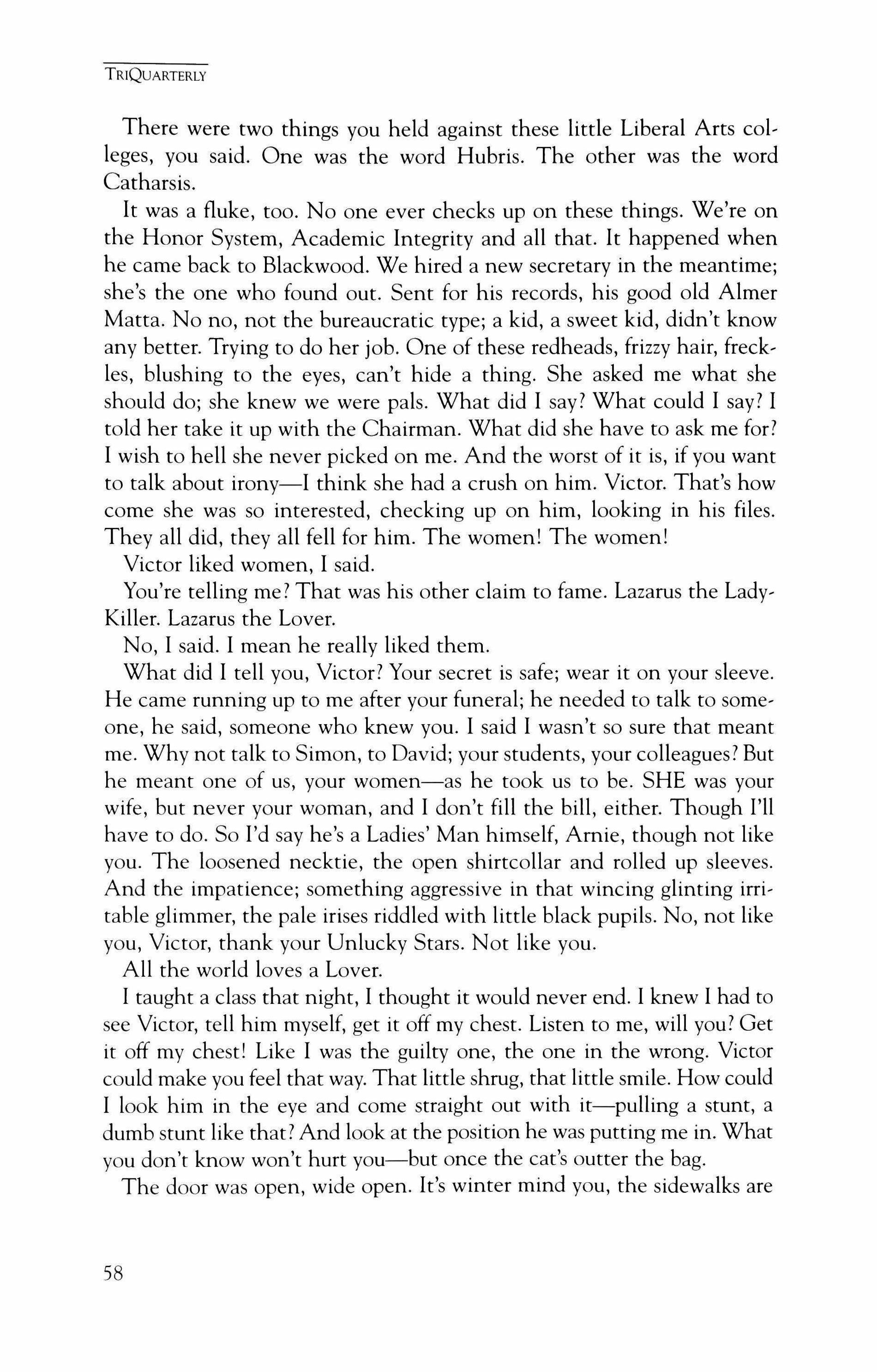
There were two things you held against these little Liberal Arts colleges, you said. One was the word Hubris. The other was the word Catharsis.
It was a fluke, too. No one ever checks up on these things. We're on the Honor System, Academic Integrity and all that. It happened when he came back to Blackwood. We hired a new secretary in the meantime; she's the one who found out. Sent for his records, his good old Almer Matta. No no, not the bureaucratic type; a kid, a sweet kid, didn't know any better. Trying to do her job. One of these redheads, frizzy hair, freckles, blushing to the eyes, can't hide a thing. She asked me what she should do; she knew we were pals. What did I say? What could I say? I told her take it up with the Chairman. What did she have to ask me for? I wish to hell she never picked on me. And the worst of it is, if you want to talk about irony-I think she had a crush on him. Victor. That's how come she was so interested, checking up on him, looking in his files. They all did, they all fell for him. The women! The women!
Victor liked women, I said.
You're telling me? That was his other claim to fame. Lazarus the LadyKiller. Lazarus the Lover.
No, I said. I mean he really liked them.
What did I tell you, Victor? Your secret is safe; wear it on your sleeve. He came running up to me after your funeral; he needed to talk to someone, he said, someone who knew you. I said I wasn't so sure that meant me. Why not talk to Simon, to David; your students, your colleagues? But he meant one of us, your women-as he took us to be. SHE was your wife, but never your woman, and I don't fill the bill, either. Though I'll have to do. So I'd say he's a Ladies' Man himself, Arnie, though not like you. The loosened necktie, the open shirtcollar and rolled up sleeves. And the impatience; something aggressive in that wincing glinting irritable glimmer, the pale irises riddled with little black pupils. No, not like you, Victor, thank your Unlucky Stars. Not like you.
All the world loves a Lover.
I taught a class that night, I thought it would never end. I knew I had to see Victor, tell him myself, get it off my chest. Listen to me, will you? Get it off my chest! Like I was the guilty one, the one in the wrong. Victor could make you feel that way. That little shrug, that little smile. How could I look him in the eye and come straight out with it-pulling a stunt, a dumb stunt like that? And look at the position he was putting me in. What you don't know won't hurt you-but once the eat's outter the bag.
The door was open, wide open. It's winter mind you, the sidewalks are
TRIQUARTERLY
58
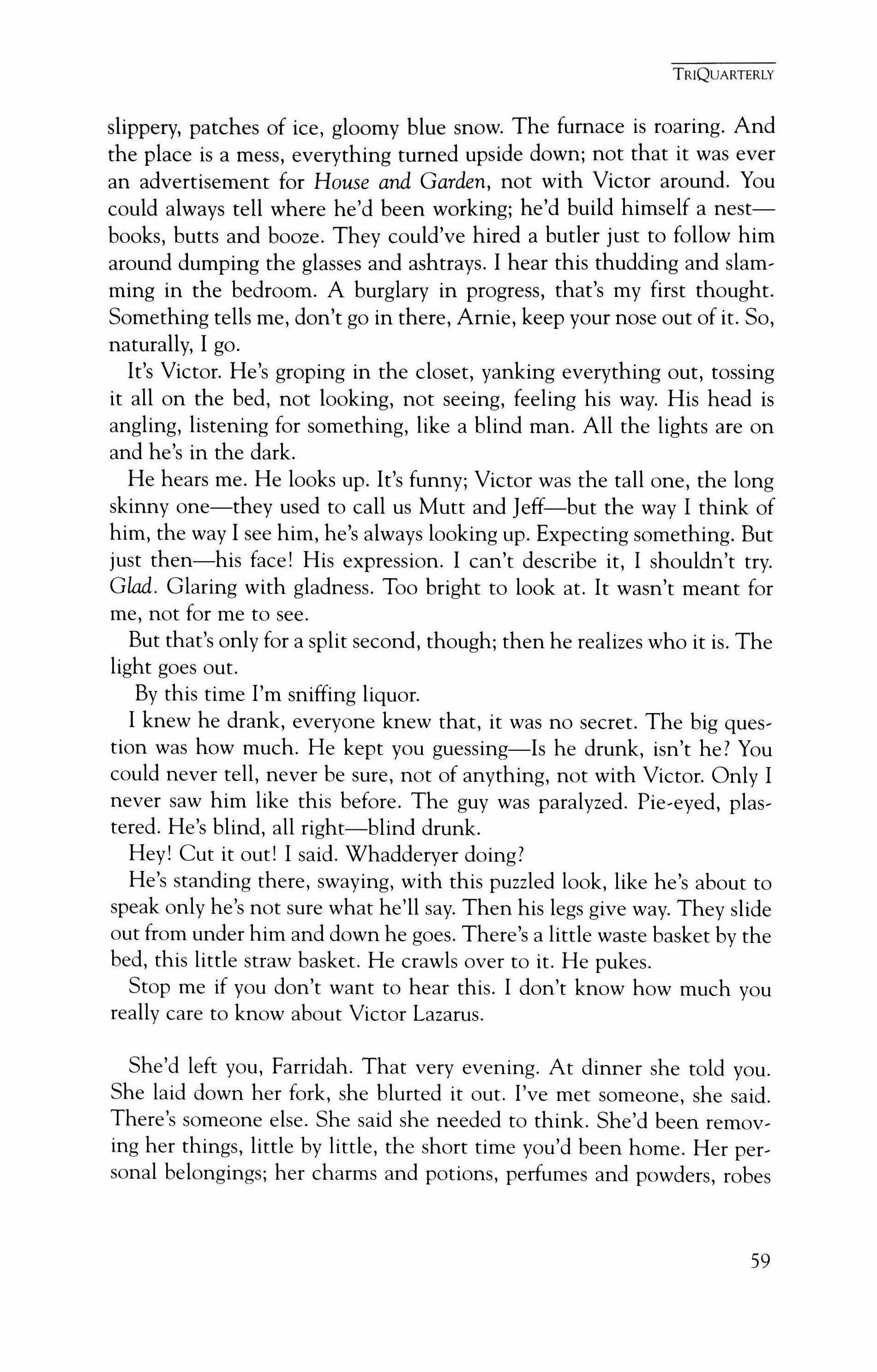
slippery, patches of ice, gloomy blue snow. The furnace is roaring. And the place is a mess, everything turned upside down; not that it was ever an advertisement for House and Garden, not with Victor around. You could always tell where he'd been working; he'd build himself a nestbooks, butts and booze. They could've hired a butler just to follow him around dumping the glasses and ashtrays. I hear this thudding and slamming in the bedroom. A burglary in progress, that's my first thought. Something tells me, don't go in there, Arnie, keep your nose out of it. So, naturally, I go.
It's Victor. He's groping in the closet, yanking everything out, tossing it all on the bed, not looking, not seeing, feeling his way. His head is angling, listening for something, like a blind man. All the lights are on and he's in the dark.
He hears me. He looks up. It's funny; Victor was the tall one, the long skinny one-they used to call us Mutt and Jeff-but the way I think of him, the way I see him, he's always looking up. Expecting something. But just then-his face! His expression. I can't describe it, I shouldn't try. Glad. Glaring with gladness. Too bright to look at. It wasn't meant for me, not for me to see.
But that's only for a split second, though; then he realizes who it is. The light goes out.
By this time I'm sniffing liquor.
I knew he drank, everyone knew that, it was no secret. The big question was how much. He kept you guessing-Is he drunk, isn't he? You could never tell, never be sure, not of anything, not with Victor. Only I never saw him like this before. The guy was paralyzed. Pie-eyed, plastered. He's blind, all right-blind drunk.
Hey! Cut it out! I said. Whadderyer doing?
He's standing there, swaying, with this puzzled look, like he's about to speak only he's not sure what he'll say. Then his legs give way. They slide out from under him and down he goes. There's a little waste basket by the bed, this little straw basket. He crawls over to it. He pukes.
Stop me if you don't want to hear this. I don't know how much you really care to know about Victor Lazarus.
She'd left you, Farridah. That very evening. At dinner she told you. She laid down her fork, she blurted it out. I've met someone, she said. There's someone else. She said she needed to think. She'd been removing her things, little by little, the short time you'd been home. Her personal belongings; her charms and potions, perfumes and powders, robes
TRIQUARTERLY
59
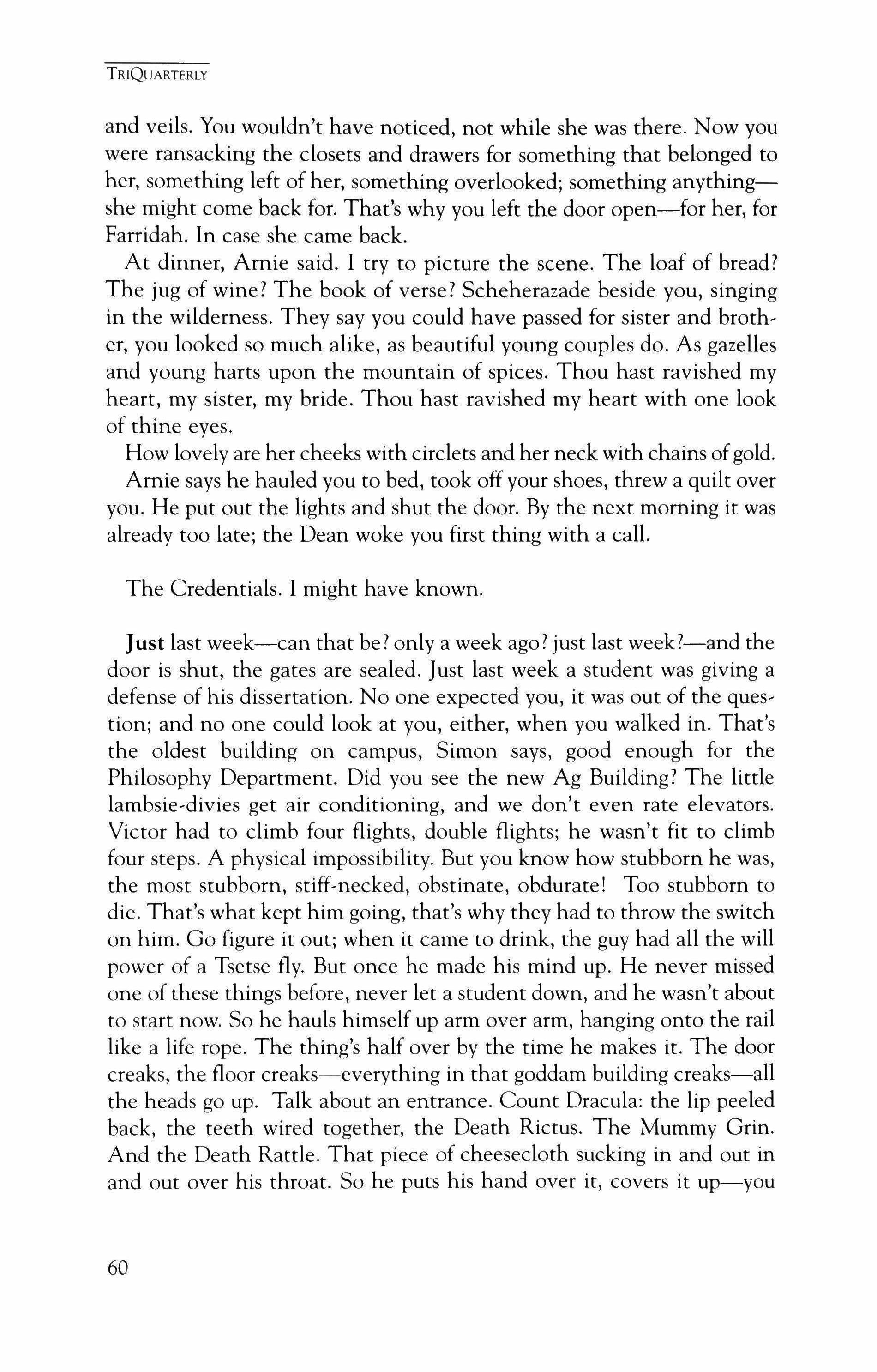
and veils. You wouldn't have noticed, not while she was there. Now you were ransacking the closets and drawers for something that belonged to her, something left of her, something overlooked; something anythingshe might come back for. That's why you left the door open-for her, for Farridah. In case she came back.
At dinner, Arnie said. I try to picture the scene. The loaf of bread? The jug of wine? The book of verse? Scheherazade beside you, singing in the wilderness. They say you could have passed for sister and brother, you looked so much alike, as beautiful young couples do. As gazelles and young harts upon the mountain of spices. Thou hast ravished my heart, my sister, my bride. Thou hast ravished my heart with one look of thine eyes.
How lovely are her cheeks with circlets and her neck with chains ofgold.
Arnie says he hauled you to bed, took off your shoes, threw a quilt over you. He put out the lights and shut the door. By the next morning it was already too late; the Dean woke you first thing with a call.
The Credentials. I might have known.
Just last week-can that be? only a week ago? just last weekI-and the door is shut, the gates are sealed. Just last week a student was giving a defense of his dissertation. No one expected you, it was out of the question; and no one could look at you, either, when you walked in. That's the oldest building on campus, Simon says, good enough for the Philosophy Department. Did you see the new Ag Building? The little lambsie-divies get air conditioning, and we don't even rate elevators. Victor had to climb four flights, double flights; he wasn't fit to climb four steps. A physical impossibility. But you know how stubborn he was, the most stubborn, stiff-necked, obstinate, obdurate! Too stubborn to die. That's what kept him going, that's why they had to throw the switch on him. Go figure it out; when it came to drink, the guy had all the will power of a Tsetse fly. But once he made his mind up. He never missed one of these things before, never let a student down, and he wasn't about to start now. So he hauls himself up arm over arm, hanging onto the rail like a life rope. The thing's half over by the time he makes it. The door creaks, the floor creaks-everything in that goddam building creaks-all the heads go up. Talk about an entrance. Count Dracula: the lip peeled back, the teeth wired together, the Death Rictus. The Mummy Grin. And the Death Rattle. That piece of cheesecloth sucking in and out in and out over his throat. So he puts his hand over it, covers it up-you
TRIQUARTERLY
60

know the gesture, touching, really. I hereby do solemnly swear. The truth the whole truth. And nothing but. He apologizes for being late. Late! Black Humor, I wouldn't put it past him. He knew he'd won only a stay of execution. I saw it then, we all saw it. We had to look away. The Late Victor Lazarus.
You did it, you said, because you thought You ought
I know what you're thinking, I know what you're going to say. The Real Thing? Sure, Victor Lazarus was the real thing. He knew it, we knew it, everybody knew it. We're talking about a principle here. An apology! That's all we wanted. An apology. Let him admit it, say he did wrong, say he's sorry. Oh no, not him. He refused to humble himself, he wouldn't give us the satisfaction.
You wanted Victor to humble himself? I said.
Why? What's so funny? Was he Gawd Awwmighty? Kings have done it before. Emperors! Who was the one, stood barefoot in the snow begging the Pope to forgive him? Three whole days! Some kind of penance. And he was the Ruler of the whole blinking bloody Holy Roman Empire.
Yeah, and I bet he made the Pope pay for it, too. Breast-beating, chest-thumping, it's all the same, you said. Just another form of selfpromotion.
Victor wasn't into confession, I said. Maybe he wasn't sorry. Not the way you wanted him to be.
Then he damn well should've been. He could've played the Game for a change, for once in his life. A little pleading wouldn't've killed him. You'd think we were the ones on trial. He never said a word. No apologies, no excuses, no denials, no self-defense. No nothing. He wasn't even listening, he wasn't even there. Humble himself! Lotsa luck. Nothing and no one could humiliate Victor Lazarus. Too stubborn-or too drunk. Same difference. And that look, that look on his face, in his eyes; the way they got when I walked in on him, when he saw it was me, only me. Me instead of her.
Yes, I know. I've seen it too, your dark-adapted eye.
Look, I'm not trying to whitewash myself. I was up for ten-vuh-e-and I'm no Victor Lazarus. I'm one of these guys, your ordinary mortals, who needs the Ph.D. Okay? I have to play the Game. The Sixties-remember them? The sit-ins, the demonstrations, the draft card burning? I was a radical, a political, a war protester; kicked out of grad school, thrown in jail. Nothing to be ashamed of, but it didn't look so hot on the Resume, not back then. That's another thing Victor never had to worry about.
TRIQUARTERLY
61
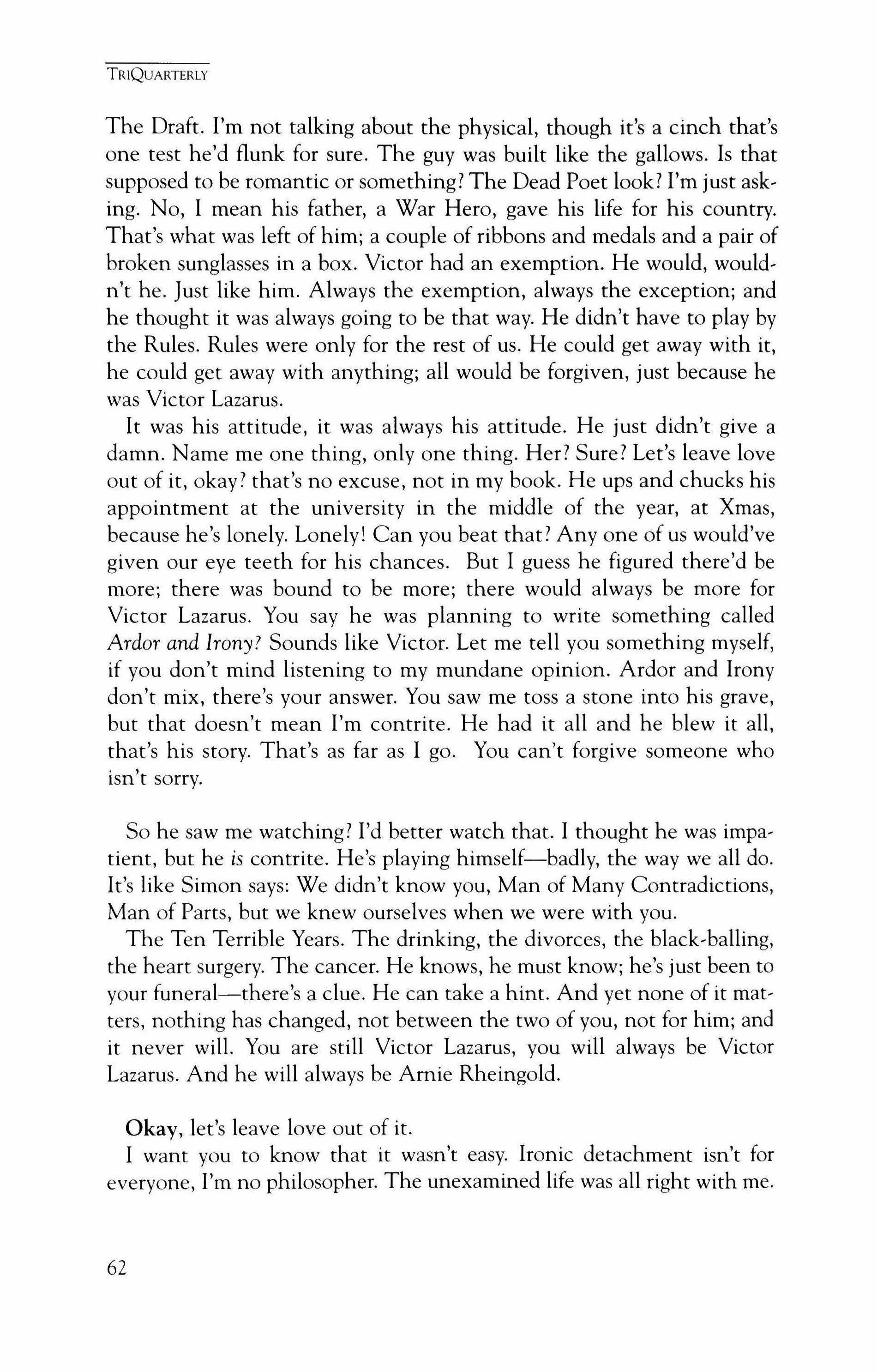
TRIQUARTERLY
The Draft. I'm not talking about the physical, though it's a cinch that's one test he'd flunk for sure. The guy was built like the gallows. Is that supposed to be romantic or something? The Dead Poet look? I'm just asking. No, I mean his father, a War Hero, gave his life for his country. That's what was left of him; a couple of ribbons and medals and a pair of broken sunglasses in a box. Victor had an exemption. He would, wouldn't he. Just like him. Always the exemption, always the exception; and he thought it was always going to be that way. He didn't have to play by the Rules. Rules were only for the rest of us. He could get away with it, he could get away with anything; all would be forgiven, just because he was Victor Lazarus.
It was his attitude, it was always his attitude. He just didn't give a damn. Name me one thing, only one thing. Her? Sure? Let's leave love out of it, okay? that's no excuse, not in my book. He ups and chucks his appointment at the university in the middle of the year, at Xmas, because he's lonely. Lonely! Can you beat that? Anyone of us would've given our eye teeth for his chances. But I guess he figured there'd be more; there was bound to be more; there would always be more for Victor Lazarus. You say he was planning to write something called Ardor and Irony? Sounds like Victor. Let me tell you something myself, if you don't mind listening to my mundane opinion. Ardor and Irony don't mix, there's your answer. You saw me toss a stone into his grave, but that doesn't mean I'm contrite. He had it all and he blew it all, that's his story. That's as far as I go. You can't forgive someone who isn t sorry.
So he saw me watching? I'd better watch that. I thought he was impatient, but he is contrite. He's playing himself-badly, the way we all do. It's like Simon says: We didn't know you, Man of Many Contradictions, Man of Parts, but we knew ourselves when we were with you.
The Ten Terrible Years. The drinking, the divorces, the black-balling, the heart surgery. The cancer. He knows, he must know; he's just been to your funeral-there's a clue. He can take a hint. And yet none of it matters, nothing has changed, not between the two of you, not for him; and it never will. You are still Victor Lazarus, you will always be Victor Lazarus. And he will always be Arnie Rheingold.
Okay, let's leave love out of it.
I want you to know that it wasn't easy. Ironic detachment isn't for everyone, I'm no philosopher. The unexamined life was all right with me.
62
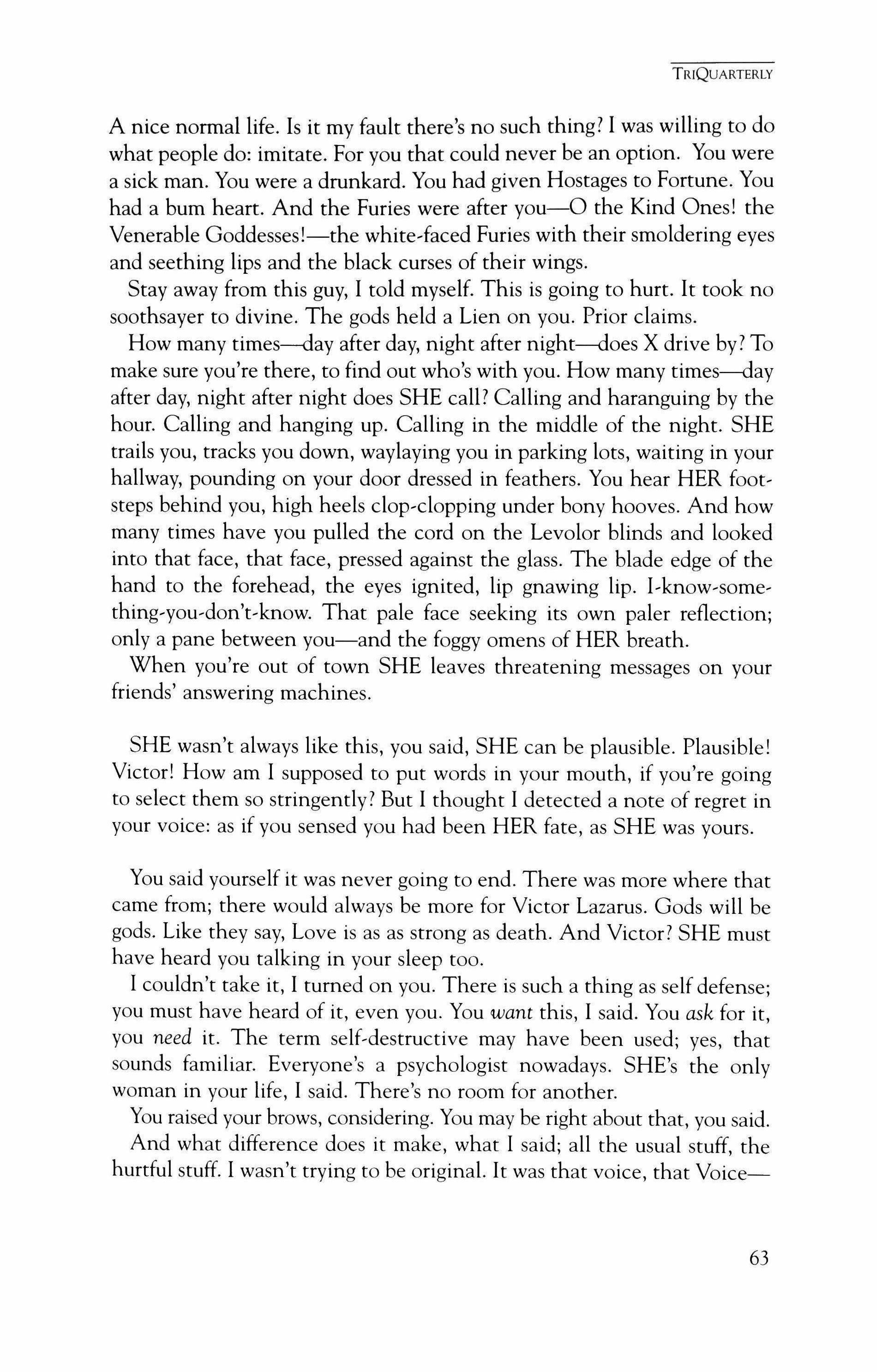
A nice normal life. Is it my fault there's no such thing? I was willing to do what people do: imitate. For you that could never be an option. You were a sick man. You were a drunkard. You had given Hostages to Fortune. You had a bum heart. And the Furies were after you-O the Kind Ones! the Venerable Goddesses!-the white-faced Furies with their smoldering eyes and seething lips and the black curses of their wings.
Stay away from this guy, I told myself. This is going to hurt. It took no soothsayer to divine. The gods held a Lien on you. Prior claims.
How many times-day after day, night after night-does X drive by? To make sure you're there, to find out who's with you. How many times-day after day, night after night does SHE call? Calling and haranguing by the hour. Calling and hanging up. Calling in the middle of the night. SHE trails you, tracks you down, waylaying you in parking lots, waiting in your hallway, pounding on your door dressed in feathers. You hear HER footsteps behind you, high heels clop-clopping under bony hooves. And how many times have you pulled the cord on the Levolor blinds and looked into that face, that face, pressed against the glass. The blade edge of the hand to the forehead, the eyes ignited, lip gnawing lip. l-know-something-you-don't-know. That pale face seeking its own paler reflection; only a pane between you-and the foggy omens of HER breath.
When you're out of town SHE leaves threatening messages on your friends' answering machines.
SHE wasn't always like this, you said, SHE can be plausible. Plausible! Victor! How am I supposed to put words in your mouth, if you're going to select them so stringently? But I thought I detected a note of regret in your voice: as if you sensed you had been HER fate, as SHE was yours.
You said yourself it was never going to end. There was more where that came from; there would always be more for Victor Lazarus. Gods will be gods. Like they say, Love is as as strong as death. And Victor? SHE must have heard you talking in your sleep too.
I couldn't take it, I turned on you. There is such a thing as self defense; you must have heard of it, even you. You want this, I said. You ask for it, you need it. The term self-destructive may have been used; yes, that sounds familiar. Everyone's a psychologist nowadays. SHE's the only woman in your life, I said. There's no room for another. You raised your brows, considering. You may be right about that, you said. And what difference does it make, what I said; all the usual stuff, the hurtful stuff. I wasn't trying to be original. It was that voice, that Voice-
TRIQUARTERLY
63
TRIQUARTERLY
Das Ewige Weiblich. Eternal Blame, Eternal Retribution. You'd heard it before; you heard it in your dreams. I must have changed from Farridah to X before your very eyes. Every woman is some of each. Where does it come from, the rage? The rage we feed on, that feeds on us? We devour ourselves. The game, the dangerous game, you wouldn't play. The danger isn't losing, it's winning. So you let us win.
Self-destructive, Victor? It all depends on what we take to be the Self.
I know you loved me because I know when you stopped: there were some things Victor Lazarus wouldn't lie about. So I'm sorry for the pain I caused you, the pain of disillusion-no small thing, for a romantic like you. It meant a lot to you to feel that way again. Me too, Victor; me too. But compared to the Gang that was working you over, the Loan Sharks, the Hired Thugs with Their Brass Knuckles and Shivs-. Anyway, like they say, it hurt me more than it hurt you. And let's face it: who was I fooling? How long could I keep it up? Since the idea was to be Young and Beautiful. That was you, Lover of Wisdom, Lover of Women, what you were, what you will always be. But it's not me. I never cared for being young, it didn't suit me; I'll take middle age any day. Too bad it can't last.
I guess I shouldn't have said that. You will never be my age.
Just like old times, isn't it, Victor? I'm doing all the talking.
Thursday June 6

32 LANES 32
the sign outside read. Thirty-two bowling lanes loudly lacquered and gleaming; and every last gutter and tunnel deserted. The place was empty as echoes. Way back in the shadows behind the pins someone was crawling around trying to fix a setting machine, a pair of knees bald in tom jeans, and overhead on the TV screen four pretty maids all in a row bounced and clapped while balls rolled in the background. Sequinned bras, flat tanned midriffs, ten-gallon hats. Cheerleaders at a Bowling Tournament? What won't they think of next? The sound was off, the pins exploding in slow motion and silence. This couldn't be the right place. I tried next door.
THE LAST RIDER
A vast dim bam, a stage set. The husky young Bartender polishing the
64
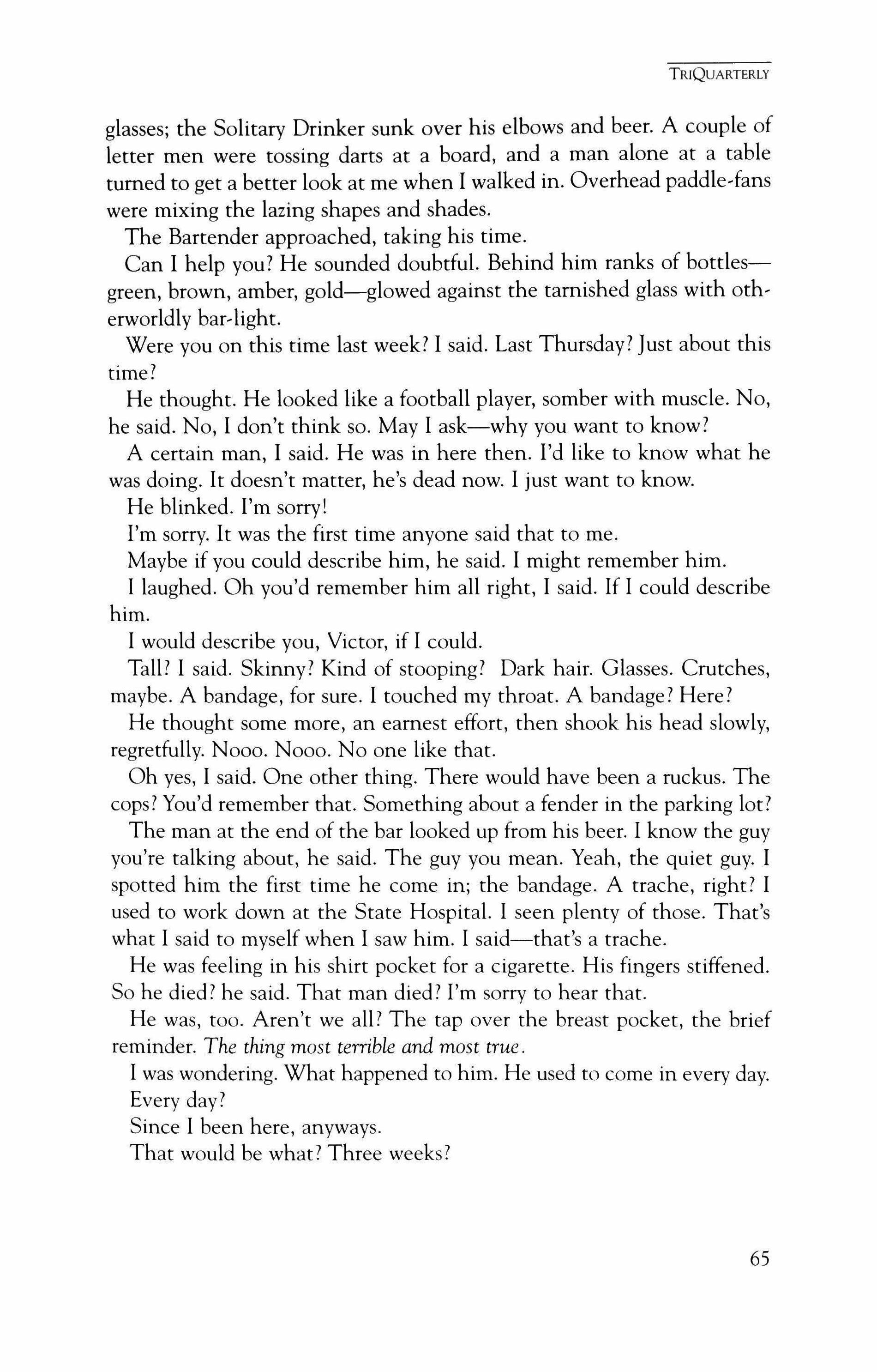
glasses; the Solitary Drinker sunk over his elbows and beer. A couple of letter men were tossing darts at a board, and a man alone at a table turned to get a better look at me when I walked in. Overhead paddle-fans were mixing the lazing shapes and shades.
The Bartender approached, taking his time.
Can I help you? He sounded doubtful. Behind him ranks of bottlesgreen, brown, amber, gold-glowed against the tarnished glass with otherworldly bar-light.
Were you on this time last week? I said. Last Thursday? Just about this time?
He thought. He looked like a football player, somber with muscle. No, he said. No, I don't think so. May I ask-why you want to know?
A certain man, I said. He was in here then. I'd like to know what he was doing. It doesn't matter, he's dead now. I just want to know.
He blinked. I'm sorry!
I'm sorry. It was the first time anyone said that to me.
Maybe if you could describe him, he said. I might remember him.
I laughed. Oh you'd remember him all right, I said. If I could describe him.
I would describe you, Victor, if I could.
Tall? I said. Skinny? Kind of stooping? Dark hair. Glasses. Crutches, maybe. A bandage, for sure. I touched my throat. A bandage? Here?
He thought some more, an earnest effort, then shook his head slowly, regretfully. Nooo. Nooo. No one like that.
Oh yes, I said. One other thing. There would have been a ruckus. The cops? You'd remember that. Something about a fender in the parking lot?
The man at the end of the bar looked up from his beer. I know the guy you're talking about, he said. The guy you mean. Yeah, the quiet guy. I spotted him the first time he come in; the bandage. A trache, right? I used to work down at the State Hospital. I seen plenty of those. That's what I said to myself when I saw him. I said-that's a trache.
He was feeling in his shirt pocket for a cigarette. His fingers stiffened. So he died? he said. That man died? I'm sorry to hear that.
He was, too. Aren't we all? The tap over the breast pocket, the brief reminder. The thing most terrible and most true.
I was wondering. What happened to him. He used to come in every day. Every day?
Since I been here, anyways.
That would be what? Three weeks?
TRIQUARTERLY
65
TRIQUARTERLY
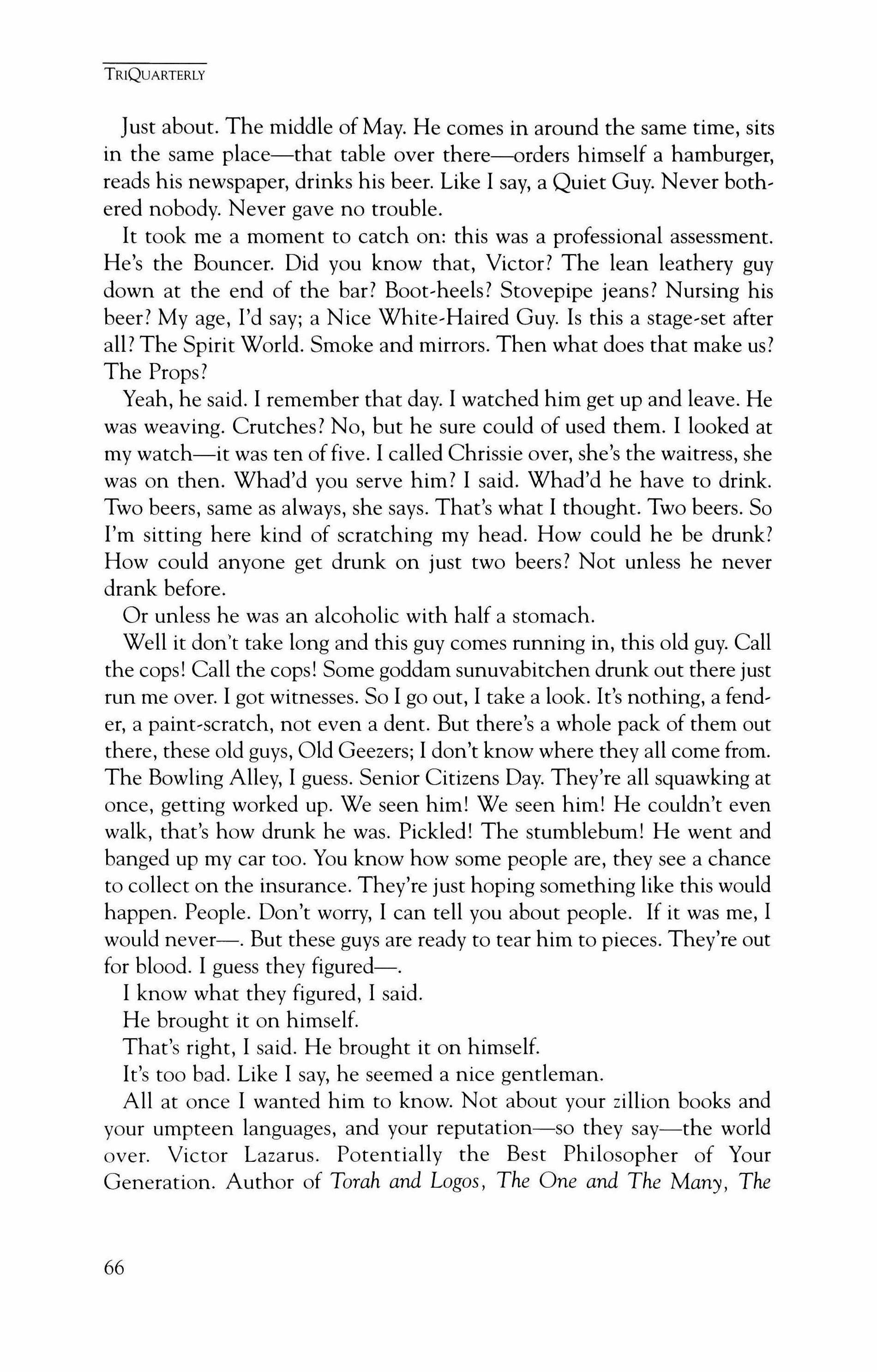
Just about. The middle of May. He comes in around the same time, sits in the same place-that table over there-orders himself a hamburger, reads his newspaper, drinks his beer. Like I say, a Quiet Guy. Never bothered nobody. Never gave no trouble. It took me a moment to catch on: this was a professional assessment. He's the Bouncer. Did you know that, Victor? The lean leathery guy down at the end of the bar? Boot-heels? Stovepipe jeans? Nursing his beer? My age, I'd say; a Nice White-Haired Guy. Is this a stage-set after all? The Spirit World. Smoke and mirrors. Then what does that make us?
The Props?
Yeah, he said. I remember that day. I watched him get up and leave. He was weaving. Crutches? No, but he sure could of used them. I looked at my watch-it was ten offive. I called Chrissie over, she's the waitress, she was on then. Whad'd you serve him? I said. Whad'd he have to drink. Two beers, same as always, she says. That's what I thought. Two beers. So I'm sitting here kind of scratching my head. How could he be drunk? How could anyone get drunk on just two beers? Not unless he never drank before.
Or unless he was an alcoholic with half a stomach.
Well it don't take long and this guy comes running in, this old guy. Call the cops! Call the cops! Some goddam sunuvabitchen drunk out there just run me over. I got witnesses. So I go out, I take a look. It's nothing, a fender, a paint-scratch, not even a dent. But there's a whole pack of them out there, these old guys, Old Geezers; I don't know where they all come from. The Bowling Alley, I guess. Senior Citizens Day. They're all squawking at once, getting worked up. We seen him! We seen him! He couldn't even walk, that's how drunk he was. Pickled! The stumblebum! He went and banged up my car too. You know how some people are, they see a chance to collect on the insurance. They're just hoping something like this would happen. People. Don't worry, I can tell you about people. If it was me, I would never-. But these guys are ready to tear him to pieces. They're out for blood. I guess they figured-.
I know what they figured, I said. He brought it on himself.
That's right, I said. He brought it on himself. It's too bad. Like I say, he seemed a nice gentleman. All at once I wanted him to know. Not about your zillion books and your umpteen languages, and your reputation-so they say-the world over. Victor Lazarus. Potentially the Best Philosopher of Your Generation. Author of Torah and Logos, The One and The Many, The
66
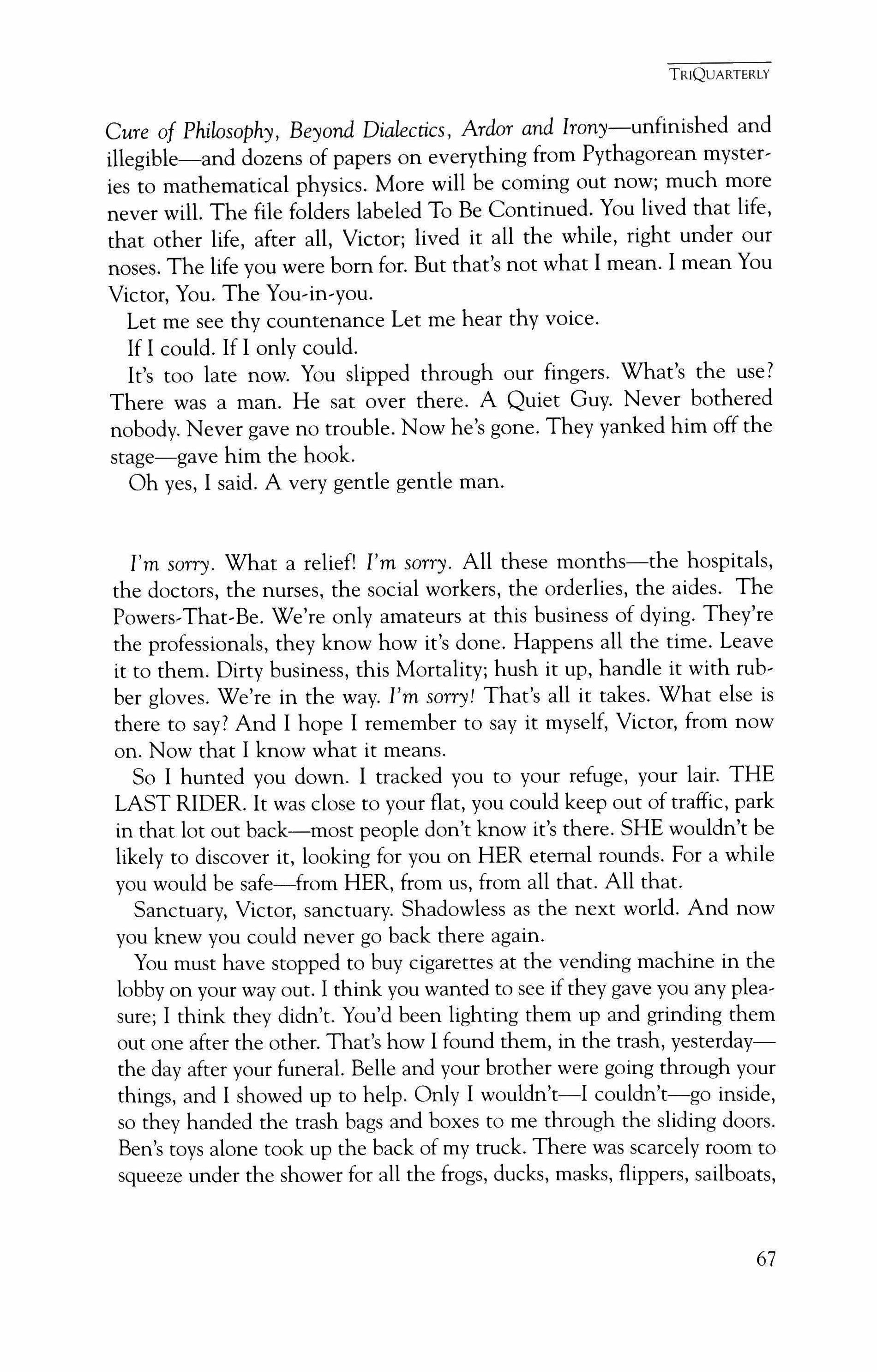
Cure of Philosophy, Beyond Dialectics, Ardor and Irony-unfinished and illegible-and dozens of papers on everything from Pythagorean mvsteries to mathematical physics. More will be coming out now; much more never will. The file folders labeled To Be Continued. You lived that life, that other life, after all, Victor; lived it all the while, right under our noses. The life you were born for. But that's not what I mean. I mean You Victor, You. The You-in-you.
Let me see thy countenance Let me hear thy voice.
If I could. If I only could.
It's too late now. You slipped through our fingers. What's the use?
There was a man. He sat over there. A Quiet Guy. Never bothered nobody. Never gave no trouble. Now he's gone. They yanked him off the stage-gave him the hook.
Oh yes, I said. A very gentle gentle man.
I'm sorry. What a relief! I'm sorry. All these months-the hospitals, the doctors, the nurses, the social workers, the orderlies, the aides. The Powers-That-Be. We're only amateurs at this business of dying. They're the professionals, they know how it's done. Happens all the time. Leave it to them. Dirty business, this Mortality; hush it up, handle it with rubber gloves. We're in the way. I'm sorry! That's all it takes. What else is there to say? And I hope I remember to say it myself, Victor, from now on. Now that I know what it means.
So I hunted you down. I tracked you to your refuge, your lair. THE LAST RIDER. It was close to your flat, you could keep out of traffic, park in that lot out back-most people don't know it's there. SHE wouldn't be likely to discover it, looking for you on HER eternal rounds. For a while you would be safe-from HER, from us, from all that. All that.
Sanctuary, Victor, sanctuary. Shadowless as the next world. And now you knew you could never go back there again.
You must have stopped to buy cigarettes at the vending machine in the lobby on your way out. I think you wanted to see if they gave you any pleasure; I think they didn't. You'd been lighting them up and grinding them out one after the other. That's how I found them, in the trash, yesterdaythe day after your funeral. Belle and your brother were going through your things, and I showed up to help. Only I wouldn't-I couldn't-go inside, so they handed the trash bags and boxes to me through the sliding doors. Ben's toys alone took up the back of my truck. There was scarcely room to squeeze under the shower for all the frogs, ducks, masks, flippers, sailboats,
TRIQUARTERLY
67
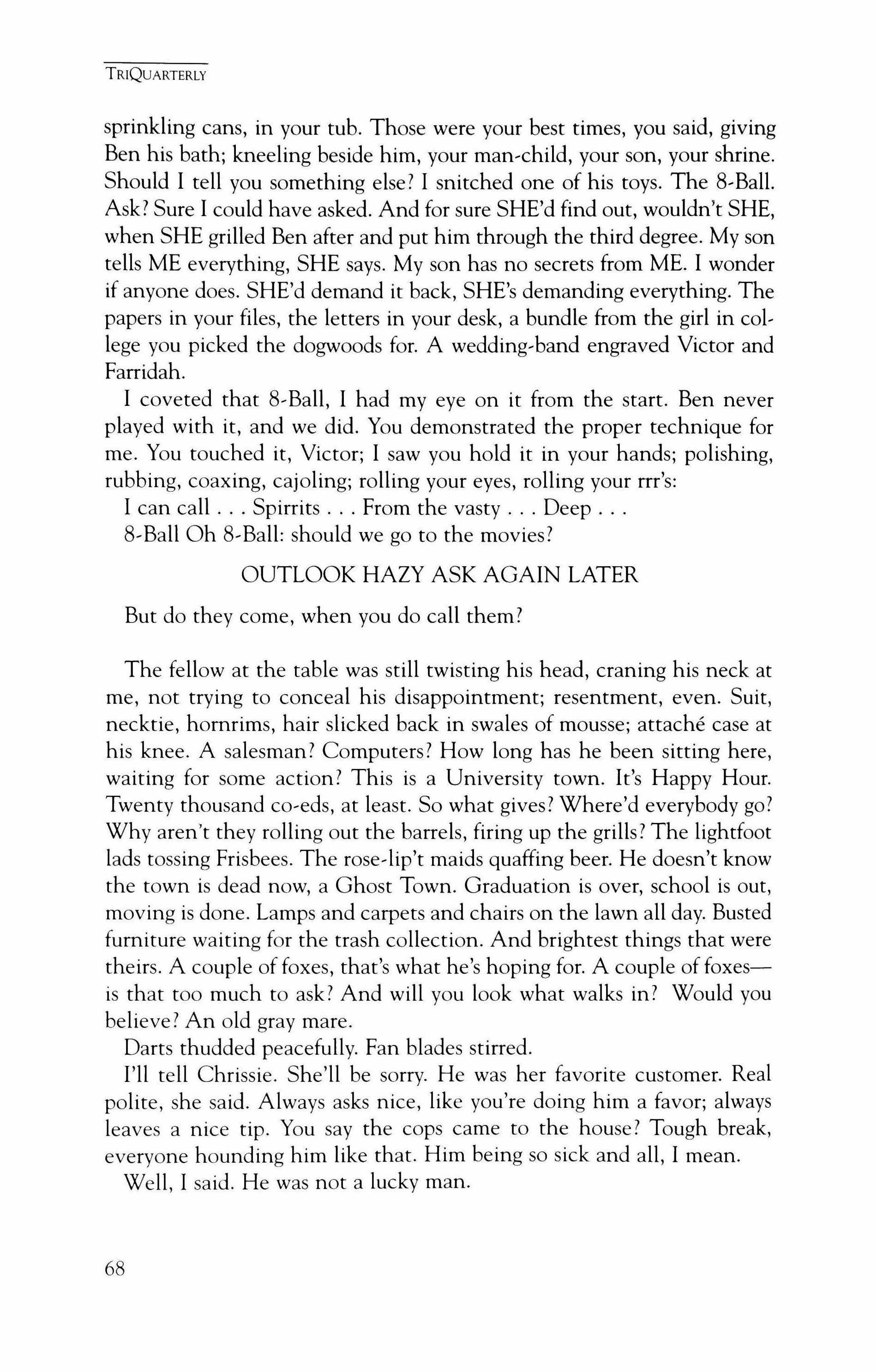
sprinkling cans, in your tub. Those were your best times, you said, giving Ben his bath; kneeling beside him, your man-child, your son, your shrine. Should I tell you something else? I snitched one of his toys. The 8-Ball. Ask? Sure I could have asked. And for sure SHE'd find out, wouldn't SHE, when SHE grilled Ben after and put him through the third degree. My son tells ME everything, SHE says. My son has no secrets from ME. I wonder if anyone does. SHE'd demand it back, SHE's demanding everything. The papers in your files, the letters in your desk, a bundle from the girl in college you picked the dogwoods for. A wedding-band engraved Victor and Farridah.
I coveted that 8-Ball, I had my eye on it from the start. Ben never played with it, and we did. You demonstrated the proper technique for me. You touched it, Victor; I saw you hold it in your hands; polishing, rubbing, coaxing, cajoling; rolling your eyes, rolling your rrr's:
I can call Spirrits From the vasty Deep 8-Ball Oh 8-Ball: should we go to the movies?
OUTLOOK HAZY ASK AGAIN LATER
But do they come, when you do call them?
The fellow at the table was still twisting his head, craning his neck at me, not trying to conceal his disappointment; resentment, even. Suit, necktie, hornrims, hair slicked back in swales of mousse; attache case at his knee. A salesman? Computers? How long has he been sitting here, waiting for some action? This is a University town. It's Happy Hour. Twenty thousand co-eds, at least. So what gives? Where'd everybody go? Why aren't they rolling out the barrels, firing up the grills? The lightfoot lads tossing Frisbees. The rose-lip't maids quaffing beer. He doesn't know the town is dead now, a Ghost Town. Graduation is over, school is out, moving is done. Lamps and carpets and chairs on the lawn all day. Busted furniture waiting for the trash collection. And brightest things that were theirs. A couple of foxes, that's what he's hoping for. A couple of foxesis that too much to ask? And will you look what walks in? Would you believe? An old gray mare.
Darts thudded peacefully. Fan blades stirred.
I'll tell Chrissie. She'll be sorry. He was her favorite customer. Real polite, she said. Always asks nice, like you're doing him a favor; always leaves a nice tip. You say the cops came to the house? Tough break, everyone hounding him like that. Him being so sick and all, I mean. Well, I said. He was not a lucky man.
TRIQUARTERLY
68
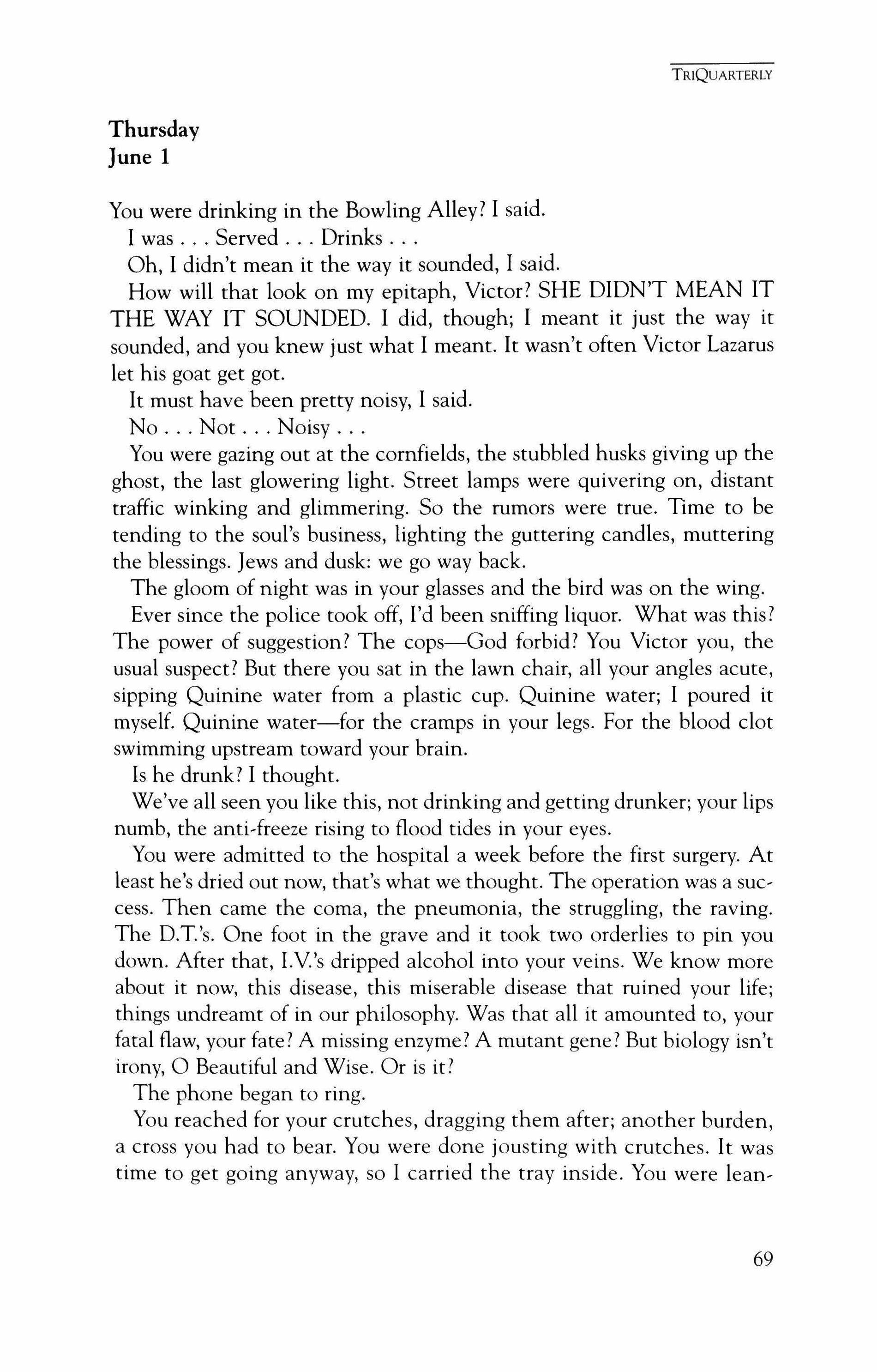
Thursday
June 1
You were drinking in the Bowling Alley? I said. I was Served Drinks
Oh, I didn't mean it the way it sounded, I said.
How will that look on my epitaph, Victor? SHE DIDN'T MEAN IT THE WAY IT SOUNDED. I did, though; I meant it just the way it sounded, and you knew just what I meant. It wasn't often Victor Lazarus let his goat get got.
It must have been pretty noisy, I said.
No Not Noisy
You were gazing out at the cornfields, the stubbled husks giving up the ghost, the last glowering light. Street lamps were quivering on, distant traffic winking and glimmering. So the rumors were true. Time to be tending to the soul's business, lighting the guttering candles, muttering the blessings. Jews and dusk: we go way back.
The gloom of night was in your glasses and the bird was on the wing.
Ever since the police took off, I'd been sniffing liquor. What was this? The power of suggestion? The cops-God forbid? You Victor you, the usual suspect? But there you sat in the lawn chair, all your angles acute, sipping Quinine water from a plastic cup. Quinine water; I poured it myself. Quinine water-for the cramps in your legs. For the blood clot swimming upstream toward your brain.
Is he drunk? I thought.
We've all seen you like this, not drinking and getting drunker; your lips numb, the anti-freeze rising to flood tides in your eyes.
You were admitted to the hospital a week before the first surgery. At least he's dried out now, that's what we thought. The operation was a success. Then came the coma, the pneumonia, the struggling, the raving. The D.T.'s. One foot in the grave and it took two orderlies to pin you down. After that, I.V.'s dripped alcohol into your veins. We know more about it now, this disease, this miserable disease that ruined your life; things undreamt of in our philosophy. Was that all it amounted to, your fatal flaw, your fate? A missing enzyme? A mutant gene? But biology isn't irony, 0 Beautiful and Wise. Or is it?
The phone began to ring.
You reached for your crutches, dragging them after; another burden, a cross you had to bear. You were done jousting with crutches. It was time to get going anyway, so I carried the tray inside. You were lean-
TRIQUARTERLY
69
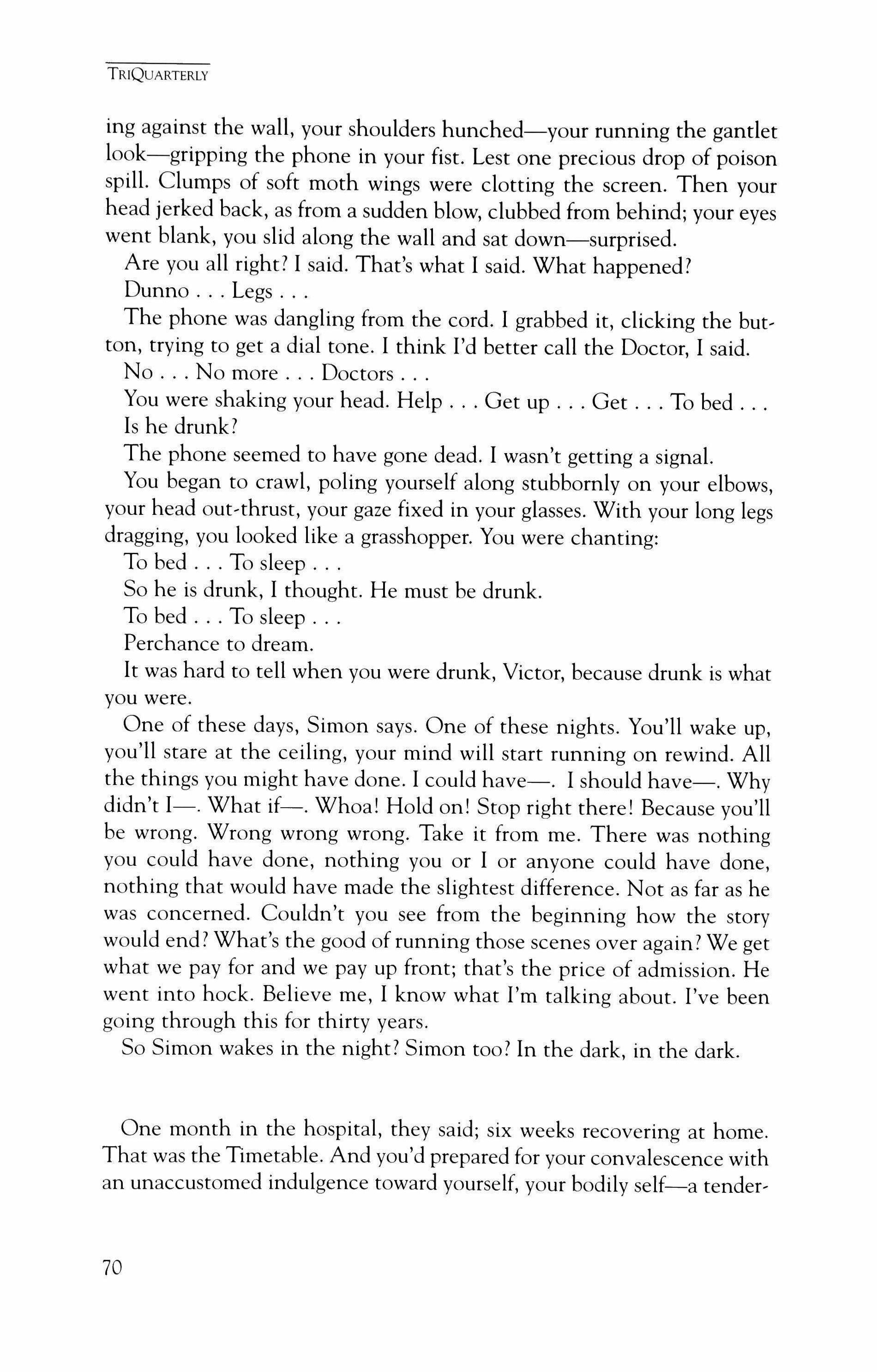
ing against the wall, your shoulders hunched-your running the gantlet look-gripping the phone in your fist. Lest one precious drop of poison spill. Clumps of soft moth wings were clotting the screen. Then your head jerked back, as from a sudden blow, clubbed from behind; your eyes went blank, you slid along the wall and sat down-surprised. Are you all right? I said. That's what I said. What happened?
Dunno Legs
The phone was dangling from the cord. I grabbed it, clicking the button, trying to get a dial tone. I think I'd better call the Doctor, I said.
No No more Doctors
You were shaking your head. Help Get up Get To bed Is he drunk?
The phone seemed to have gone dead. I wasn't getting a signal. You began to crawl, poling yourself along stubbornly on your elbows, your head out-thrust, your gaze fixed in your glasses. With your long legs dragging, you looked like a grasshopper. You were chanting:
To bed To sleep
So he is drunk, I thought. He must be drunk.
To bed To sleep
Perchance to dream.
It was hard to tell when you were drunk, Victor, because drunk is what you were.
One of these days, Simon says. One of these nights. You'll wake up, you'll stare at the ceiling, your mind will start running on rewind. All the things you might have done. I could have-. I should have-. Why didn't 1-. What if-. Whoa! Hold on! Stop right there! Because you'll be wrong. Wrong wrong wrong. Take it from me. There was nothing you could have done, nothing you or I or anyone could have done, nothing that would have made the slightest difference. Not as far as he was concerned. Couldn't you see from the beginning how the story would end? What's the good of running those scenes over again? We get what we pay for and we pay up front; that's the price of admission. He went into hock. Believe me, I know what I'm talking about. I've been going through this for thirty years.
So Simon wakes in the night? Simon too? In the dark, in the dark.
One month in the hospital, they said; six weeks recovering at home. That was the Timetable. And you'd prepared for your convalescence with an unaccustomed indulgence toward yourself, your bodily self-a tender-
TRIQUARTERLY
70
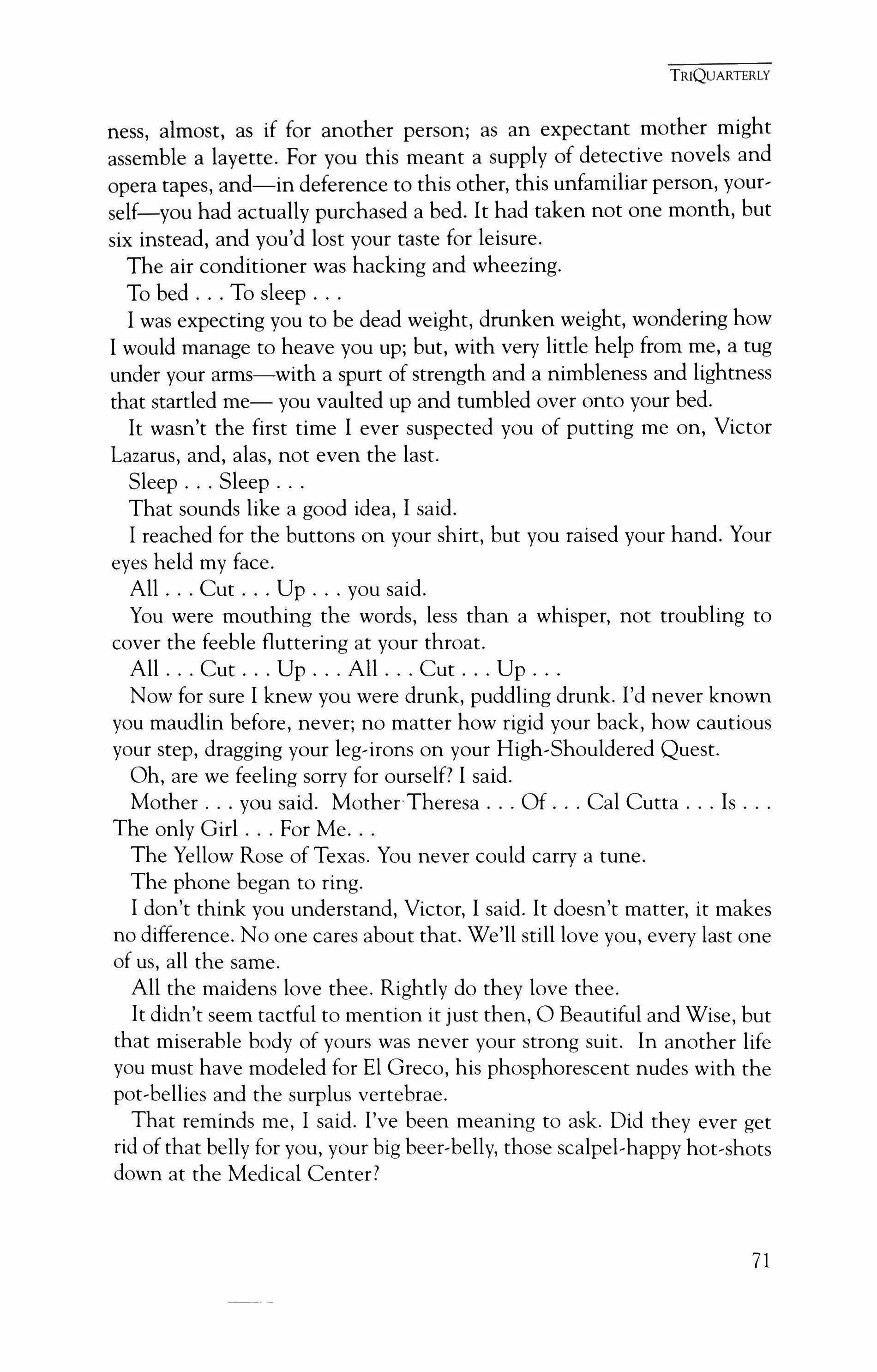
ness, almost, as if for another person; as an expectant mother might assemble a layette. For you this meant a supply of detective novels and opera tapes, and-in deference to this other, this unfamiliar person, yourself-you had actually purchased a bed. It had taken not one month, but six instead, and you'd lost your taste for leisure.
The air conditioner was hacking and wheezing.
To bed To sleep
I was expecting you to be dead weight, drunken weight, wondering how I would manage to heave you up; but, with very little help from me, a tug under your arms-with a spurt of strength and a nimbleness and lightness that startled me- you vaulted up and tumbled over onto your bed.
It wasn't the first time I ever suspected you of putting me on, Victor Lazarus, and, alas, not even the last.
Sleep Sleep
That sounds like a good idea, I said.
I reached for the buttons on your shirt, but you raised your hand. Your eyes held my face.
All Cut Up you said.
You were mouthing the words, less than a whisper, not troubling to cover the feeble fluttering at your throat.
All Cut Up All Cut Up
Now for sure I knew you were drunk, puddling drunk. I'd never known you maudlin before, never; no matter how rigid your back, how cautious your step, dragging your leg-irons on your High-Shouldered Quest.
Oh, are we feeling sorry for ourself? I said.
Mother you said. MotherTheresa Of Cal Cutta Is The only Girl For Me
The Yellow Rose of Texas. You never could carry a tune.
The phone began to ring.
I don't think you understand, Victor, I said. It doesn't matter, it makes no difference. No one cares about that. We'll still love you, every last one of us, all the same.
All the maidens love thee. Rightly do they love thee.
It didn't seem tactful to mention it just then, 0 Beautiful and Wise, but that miserable body of yours was never your strong suit. In another life you must have modeled for El Greco, his phosphorescent nudes with the pot-bellies and the surplus vertebrae.
That reminds me, I said. I've been meaning to ask. Did they ever get rid of that belly for you, your big beer-belly, those scalpel-happy hot-shots down at the Medical Center?
TRIQUARTERLY
71
TRIQUARTERLY
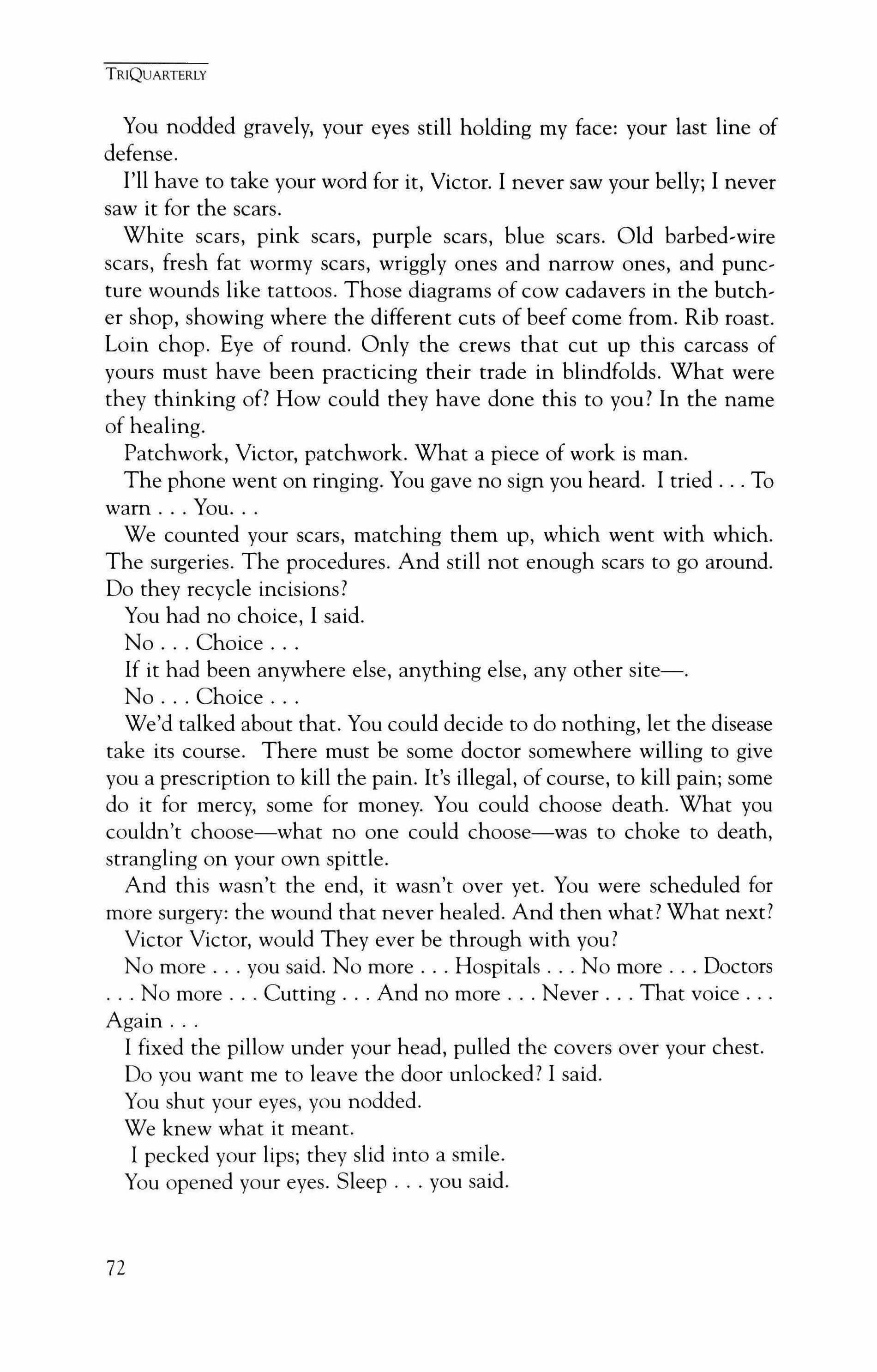
You nodded gravely, your eyes still holding my face: your last line of defense.
I'll have to take your word for it, Victor. I never saw your belly; I never saw it for the scars.
White scars, pink scars, purple scars, blue scars. Old barbed-wire scars, fresh fat wormy scars, wriggly ones and narrow ones, and puncture wounds like tattoos. Those diagrams of cow cadavers in the butcher shop, showing where the different cuts of beef come from. Rib roast. Loin chop. Eye of round. Only the crews that cut up this carcass of yours must have been practicing their trade in blindfolds. What were they thinking of? How could they have done this to yOU? In the name of healing.
Patchwork, Victor, patchwork. What a piece of work is man.
The phone went on ringing. You gave no sign you heard. I tried To warn You
We counted your scars, matching them up, which went with which. The surgeries. The procedures. And still not enough scars to go around. Do they recycle incisions?
You had no choice, I said.
No Choice
If it had been anywhere else, anything else, any other site-. No Choice
We'd talked about that. You could decide to do nothing, let the disease take its course. There must be some doctor somewhere willing to give you a prescription to kill the pain. It's illegal, of course, to kill pain; some do it for mercy, some for money. You could choose death. What you couldn't choose-what no one could choose-was to choke to death, strangling on your own spittle.
And this wasn't the end, it wasn't over yet. You were scheduled for more surgery: the wound that never healed. And then what? What next?
Victor Victor, would They ever be through with you?
No more you said. No more Hospitals No more Doctors No more Cutting And no more Never That voice
Again
I fixed the pillow under your head, pulled the covers over your chest. Do you want me to leave the door unlocked? I said. You shut your eyes, you nodded. We knew what it meant.
I pecked your lips; they slid into a smile. You opened your eyes. Sleep you said.
72
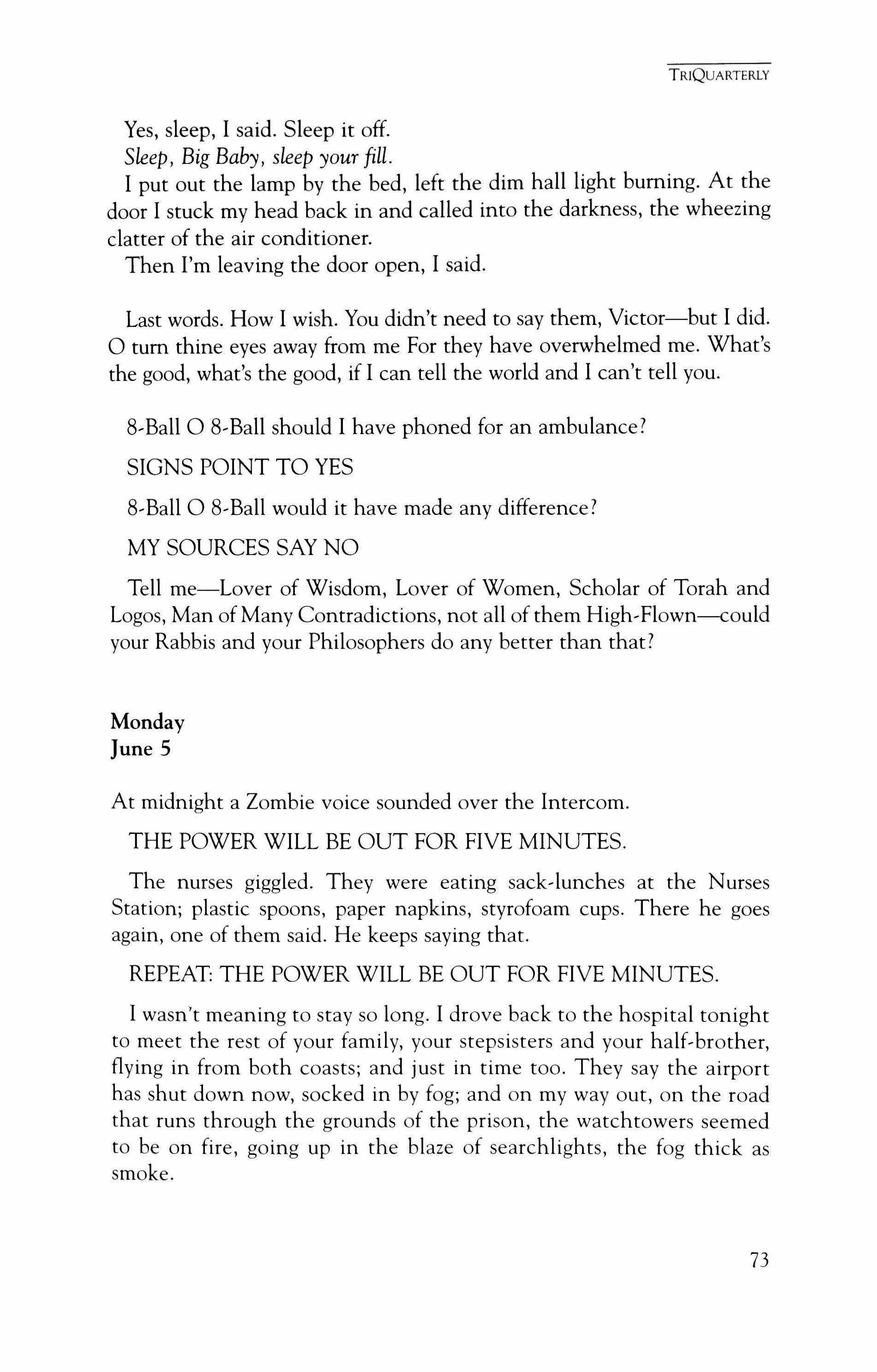
Yes, sleep, I said. Sleep it off.
Sleep, Big Baby, sleep your fill.
I put out the lamp by the bed, left the dim hall light burning. At the door I stuck my head back in and called into the darkness, the wheezing clatter of the air conditioner.
Then I'm leaving the door open, I said.
Last words. How I wish. You didn't need to say them, Victor-but I did. o tum thine eyes away from me For they have overwhelmed me. What's the good, what's the good, if I can tell the world and I can't tell you.
8-Ball 0 8-Ball should I have phoned for an ambulance?
SIGNS POINT TO YES
8-Ball 0 8-Ball would it have made any difference?
MY SOURCES SAY NO
Tell me-Lover of Wisdom, Lover of Women, Scholar of Torah and Logos, Man of Many Contradictions, not all of them High-Flown-could your Rabbis and your Philosophers do any better than that?
Monday June 5
At midnight a Zombie voice sounded over the Intercom. THE POWER WILL BE OUT FOR FIVE MINUTES.
The nurses giggled. They were eating sack-lunches at the Nurses Station; plastic spoons, paper napkins, styrofoam cups. There he goes again, one of them said. He keeps saying that.
REPEAT: THE POWER WILL BE OUT FOR FIVE MINUTES.
I wasn't meaning to stay so long. I drove back to the hospital tonight to meet the rest of your family, your stepsisters and your half-brother, flying in from both coasts; and just in time too. They say the airport has shut down now, socked in by fog; and on my way out, on the road that runs through the grounds of the prison, the watchtowers seemed to be on fire, going up in the blaze of searchlights, the fog thick as smoke.
TRIQUARTERLY
73
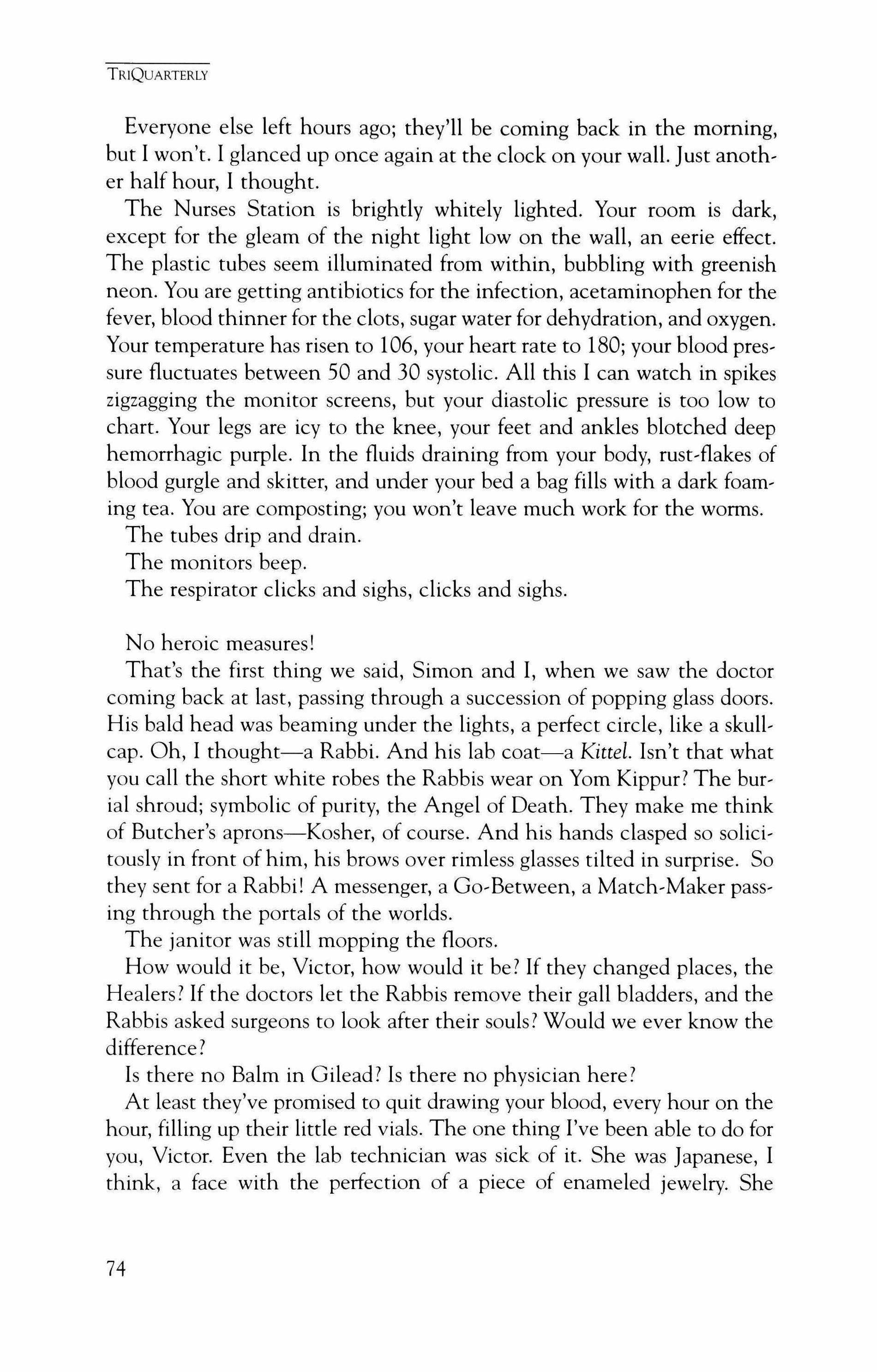
Everyone else left hours ago; they'll be coming back in the morning, but I won't. I glanced up once again at the clock on your wall. Just another half hour, I thought.
The Nurses Station is brightly whitely lighted. Your room is dark, except for the gleam of the night light low on the wall, an eerie effect. The plastic tubes seem illuminated from within, bubbling with greenish neon. You are getting antibiotics for the infection, acetaminophen for the fever, blood thinner for the clots, sugar water for dehydration, and oxygen. Your temperature has risen to 106, your heart rate to 180; your blood pressure fluctuates between 50 and 30 systolic. All this I can watch in spikes zigzagging the monitor screens, but your diastolic pressure is too low to chart. Your legs are icy to the knee, your feet and ankles blotched deep hemorrhagic purple. In the fluids draining from your body, rust-flakes of blood gurgle and skitter, and under your bed a bag fills with a dark foaming tea. You are composting; you won't leave much work for the worms.
The tubes drip and drain.
The monitors beep.
The respirator clicks and sighs, clicks and sighs.
No heroic measures!
That's the first thing we said, Simon and I, when we saw the doctor coming back at last, passing through a succession of popping glass doors. His bald head was beaming under the lights, a perfect circle, like a skullcap. Oh, I thought-a Rabbi. And his lab coat-a Kittel. Isn't that what you call the short white robes the Rabbis wear on Yom Kippur? The burial shroud; symbolic of purity, the Angel of Death. They make me think of Butcher's aprons-Kosher, of course. And his hands clasped so solicitously in front of him, his brows over rimless glasses tilted in surprise. So they sent for a Rabbi! A messenger, a Go-Between, a Match-Maker passing through the portals of the worlds.
The janitor was still mopping the floors.
How would it be, Victor, how would it be? If they changed places, the Healers? If the doctors let the Rabbis remove their gall bladders, and the Rabbis asked surgeons to look after their souls? Would we ever know the difference?
Is there no Balm in Gilead? Is there no physician here?
At least they've promised to quit drawing your blood, every hour on the hour, filling up their little red vials. The one thing I've been able to do for you, Victor. Even the lab technician was sick of it. She was Japanese, I think, a face with the perfection of a piece of enameled jewelry. She
TRIQUARTERLY
74
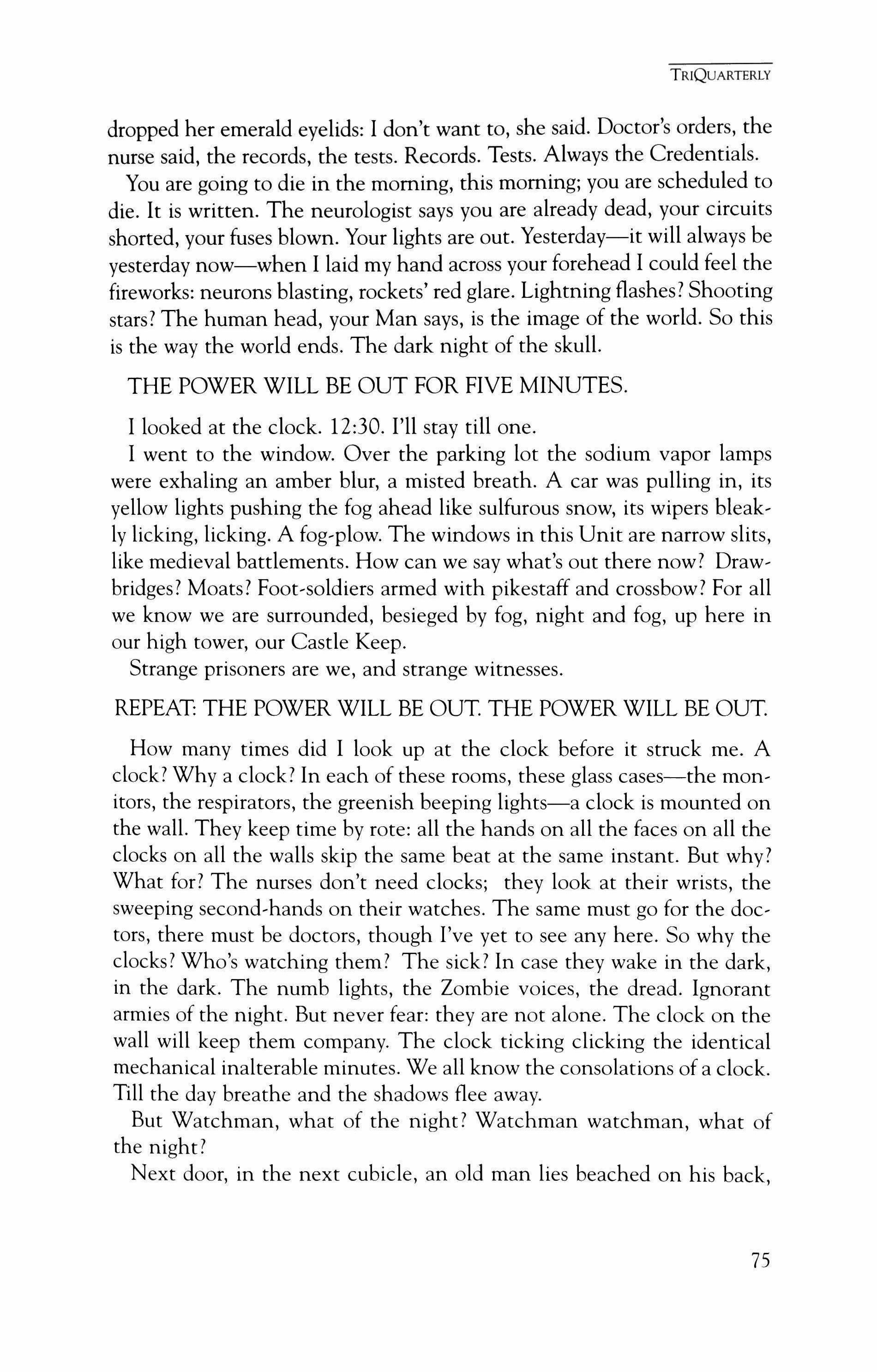
dropped her emerald eyelids: I don't want to, she said. Doctor's orders, the nurse said, the records, the tests. Records. Tests. Always the Credentials.
You are going to die in the morning, this morning; you are scheduled to die. It is written. The neurologist says you are already dead, your circuits shorted, your fuses blown. Your lights are out. Yesterday-it will always be yesterday now-when I laid my hand across your forehead I could feel the fireworks: neurons blasting, rockets' red glare. Lightning flashes? Shooting stars? The human head, your Man says, is the image of the world. So this is the way the world ends. The dark night of the skull.
THE POWER WILL BE OUT FOR FIVE MINUTES.
I looked at the clock. 12:30. I'll stay till one.
I went to the window. Over the parking lot the sodium vapor lamps were exhaling an amber blur, a misted breath. A car was pulling in, its yellow lights pushing the fog ahead like sulfurous snow, its wipers bleakly licking, licking. A fog-plow, The windows in this Unit are narrow slits, like medieval battlements. How can we say what's out there now? Draw� bridges? Moats? Foot-soldiers armed with pikestaff and crossbow? For all we know we are surrounded, besieged by fog, night and fog, up here in our high tower, our Castle Keep.
Strange prisoners are we, and strange witnesses.
REPEAT: THE POWER WILL BE OUT. THE POWER WILL BE OUT.
How many times did I look up at the clock before it struck me. A clock? Why a clock? In each of these rooms, these glass cases-the monitors, the respirators, the greenish beeping lights-a clock is mounted on the wall. They keep time by rote: all the hands on all the faces on all the clocks on all the walls skip the same beat at the same instant. But why? What for? The nurses don't need clocks; they look at their wrists, the sweeping second-hands on their watches. The same must go for the doctors, there must be doctors, though I've yet to see any here. So why the clocks? Who's watching them? The sick? In case they wake in the dark, in the dark. The numb lights, the Zombie voices, the dread. Ignorant armies of the night. But never fear: they are not alone. The clock on the wall will keep them company. The clock ticking clicking the identical mechanical inalterable minutes. We all know the consolations of a clock. Till the day breathe and the shadows flee away.
But Watchman, what of the night? Watchman watchman, what of the night?
Next door, in the next cubicle, an old man lies beached on his back,
TRIQUARTERLY
75
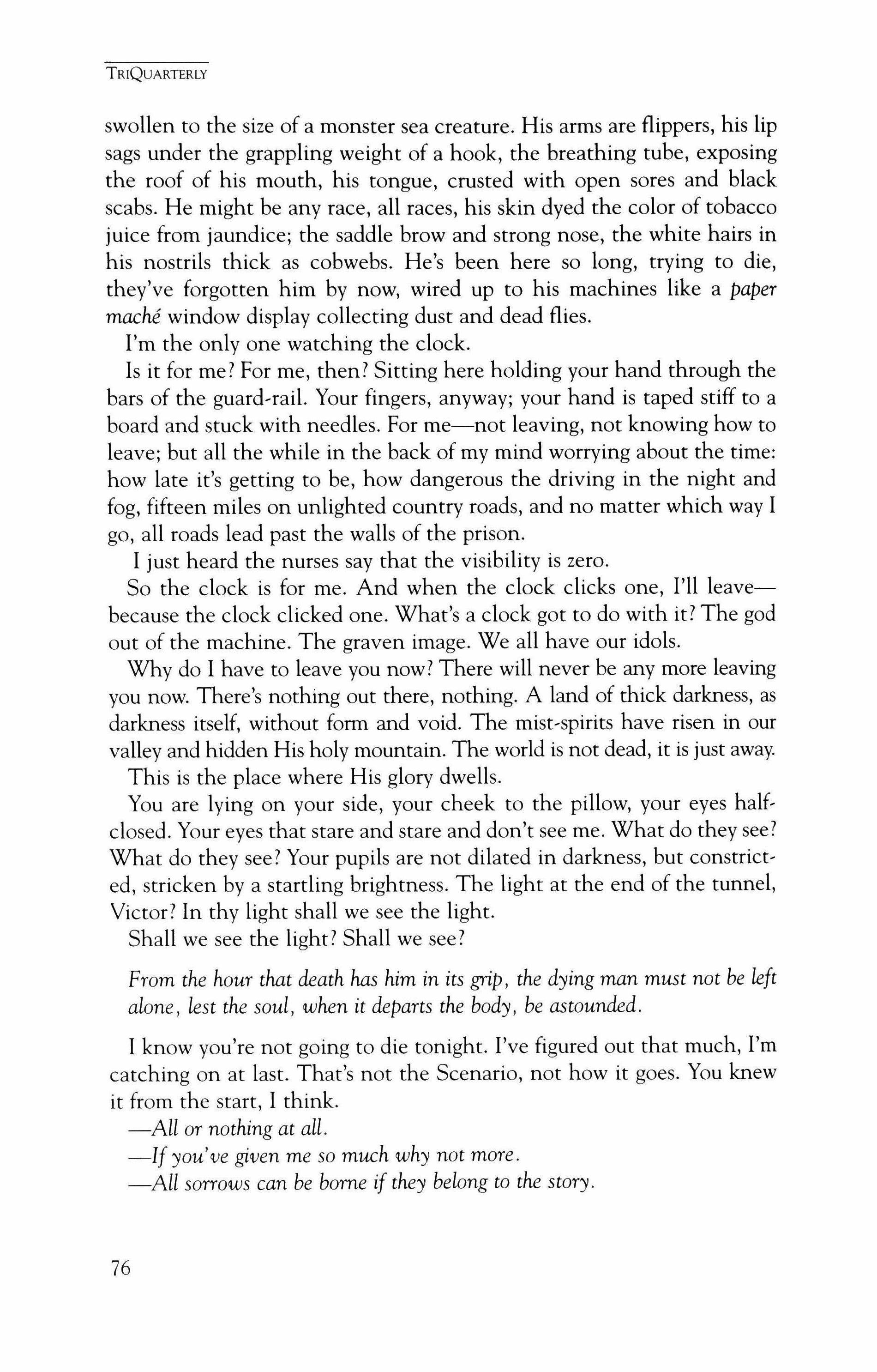
swollen to the size of a monster sea creature. His arms are flippers, his lip sags under the grappling weight of a hook, the breathing tube, exposing the roof of his mouth, his tongue, crusted with open sores and black scabs. He might be any race, all races, his skin dyed the color of tobacco juice from jaundice; the saddle brow and strong nose, the white hairs in his nostrils thick as cobwebs. He's been here so long, trying to die, they've forgotten him by now, wired up to his machines like a paper mache window display collecting dust and dead flies.
I'm the only one watching the clock.
Is it for me? For me, then? Sitting here holding your hand through the bars of the guard-rail. Your fingers, anyway; your hand is taped stiff to a board and stuck with needles. For me-not leaving, not knowing how to leave; but all the while in the back of my mind worrying about the time: how late it's getting to be, how dangerous the driving in the night and fog, fifteen miles on unlighted country roads, and no matter which way I go, all roads lead past the walls of the prison.
I just heard the nurses say that the visibility is zero.
So the clock is for me. And when the clock clicks one, I'll leavebecause the clock clicked one. What's a clock got to do with it? The god out of the machine. The graven image. We all have our idols.
Why do I have to leave you now? There will never be any more leaving you now. There's nothing out there, nothing. A land of thick darkness, as darkness itself, without form and void. The mist-spirits have risen in our valley and hidden His holy mountain. The world is not dead, it is just away. This is the place where His glory dwells.
You are lying on your side, your cheek to the pillow, your eyes halfclosed. Your eyes that stare and stare and don't see me. What do they see? What do they see? Your pupils are not dilated in darkness, but constricted, stricken by a startling brightness. The light at the end of the tunnel, Victor? In thy light shall we see the light. Shall we see the light? Shall we see?
From the hour that death has him in its grip, the dying man must not be left alone, lest the soul, when it departs the body, be astounded.
I know you're not going to die tonight. I've figured out that much, I'm catching on at last. That's not the Scenario, not how it goes. You knew it from the start, I think.
-All or nothing at all.
-Ifyou've given me so much why not more.
-All sorrows can be bome if they belong to the story.
TRIQUARTERLY
76
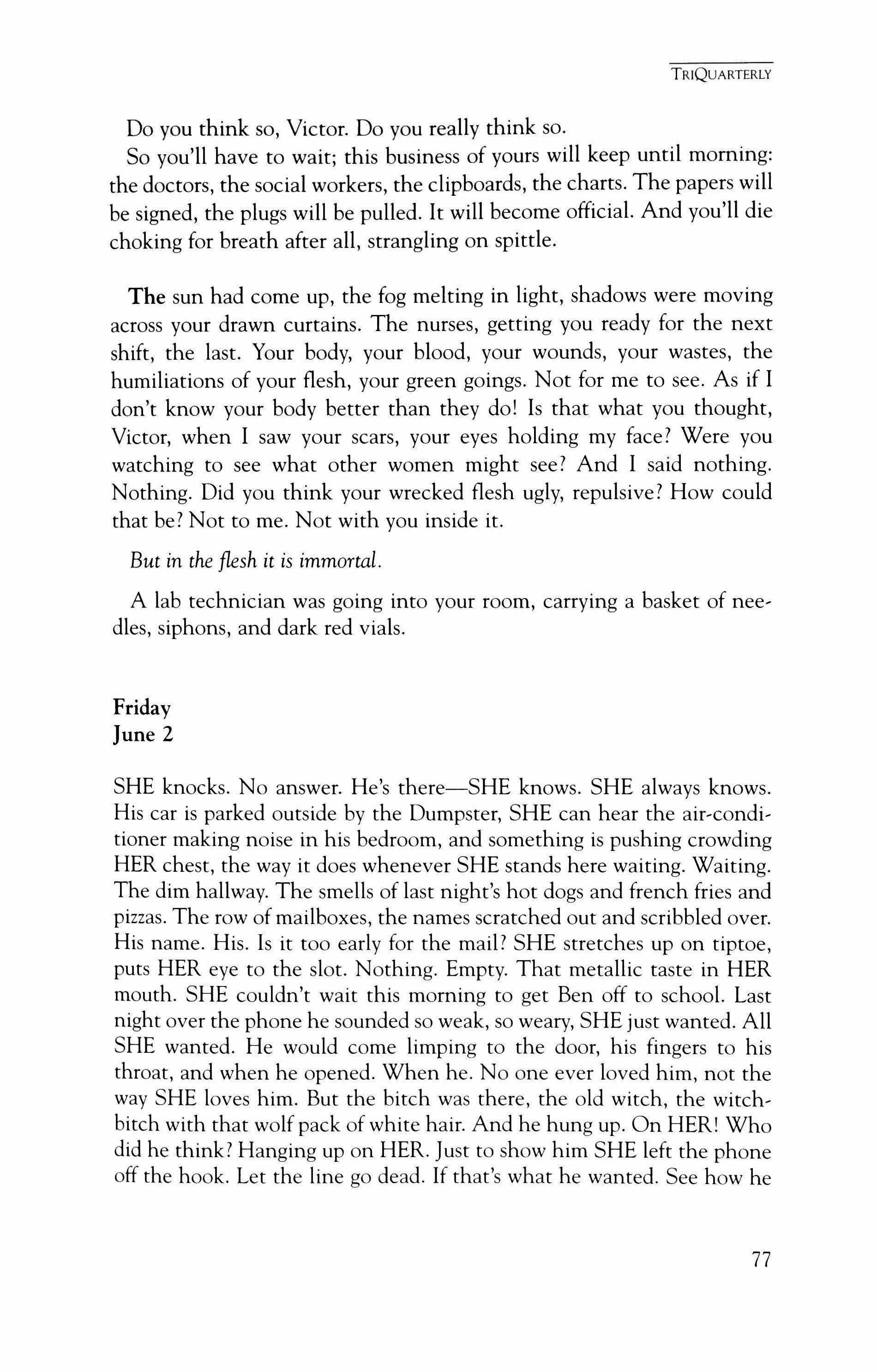
Do you think so, Victor. Do you really think so.
So you'll have to wait; this business of yours will keep until morning: the doctors, the social workers, the clipboards, the charts. The papers will be signed, the plugs will be pulled. It will become official. And you'll die choking for breath after all, strangling on spittle.
The sun had come up, the fog melting in light, shadows were moving across your drawn curtains. The nurses, getting you ready for the next shift, the last. Your body, your blood, your wounds, your wastes, the humiliations of your flesh, your green goings. Not for me to see. As if I don't know your body better than they do! Is that what you thought, Victor, when I saw your scars, your eyes holding my face? Were you watching to see what other women might see? And I said nothing. Nothing. Did you think your wrecked flesh ugly, repulsive? How could that be? Not to me. Not with you inside it.
But in the flesh it is immortal.
A lab technician was going into your room, carrying a basket of nee, dles, siphons, and dark red vials.
Friday June 2
SHE knocks. No answer. He's there-SHE knows. SHE always knows. His car is parked outside by the Dumpster, SHE can hear the air-conditioner making noise in his bedroom, and something is pushing crowding HER chest, the way it does whenever SHE stands here waiting. Waiting. The dim hallway. The smells of last night's hot dogs and french fries and pizzas. The row of mailboxes, the names scratched out and scribbled over. His name. His. Is it too early for the mail? SHE stretches up on tiptoe, puts HER eye to the slot. Nothing. Empty. That metallic taste in HER mouth. SHE couldn't wait this morning to get Ben off to school. Last night over the phone he sounded so weak, so weary, SHE just wanted. All SHE wanted. He would come limping to the door, his fingers to his throat, and when he opened. When he. No one ever loved him, not the way SHE loves him. But the bitch was there, the old witch, the witch, bitch with that wolf pack of white hair. And he hung up. On HER! Who did he think? Hanging up on HER. Just to show him SHE left the phone off the hook. Let the line go dead. If that's what he wanted. See how he
TRIQUARTERLY
77
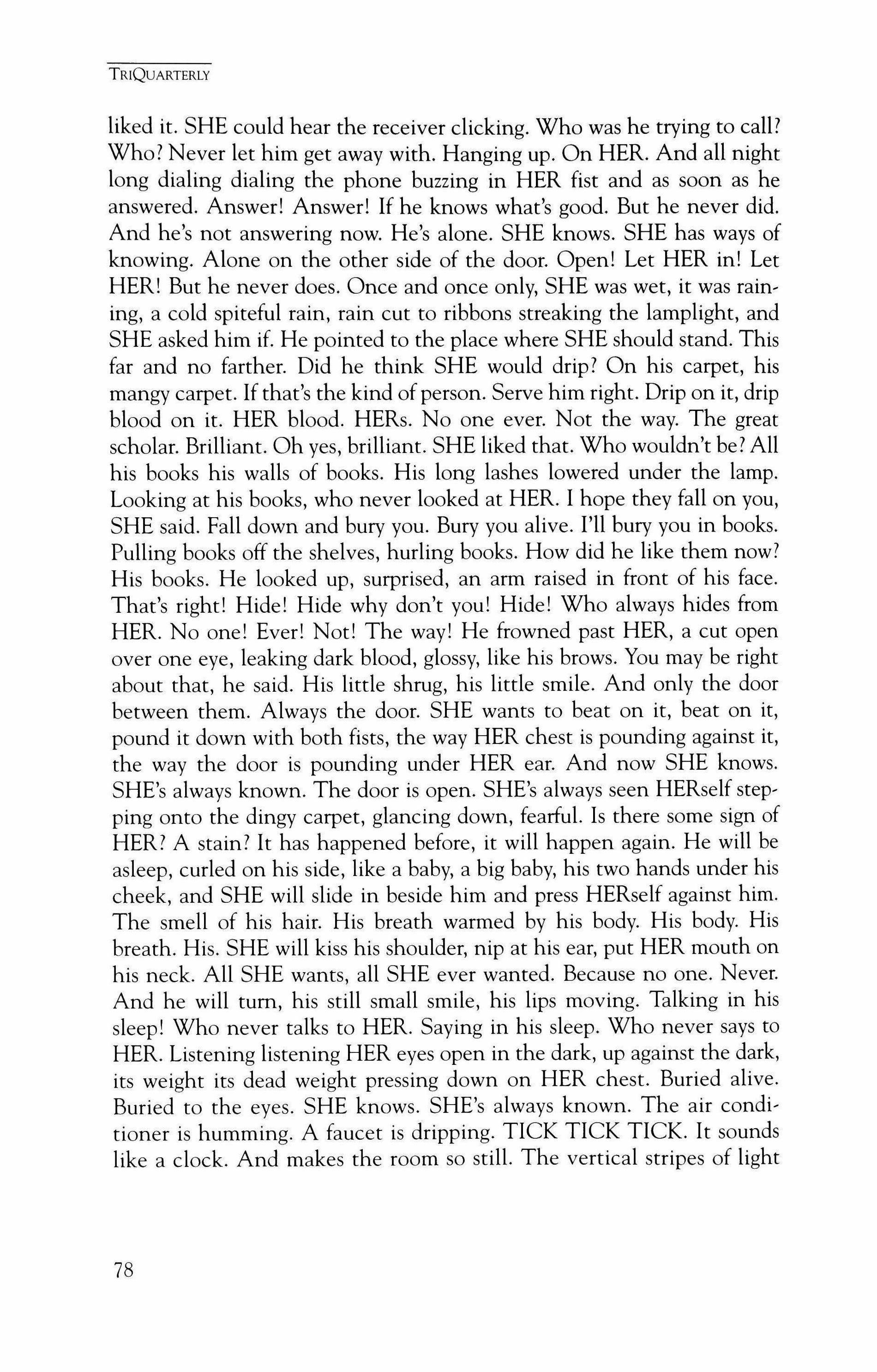
TR1QUARTERLY
liked it. SHE could hear the receiver clicking. Who was he trying to call? Who? Never let him get away with. Hanging up. On HER. And all night long dialing dialing the phone buzzing in HER fist and as soon as he answered. Answer! Answer! If he knows what's good. But he never did. And he's not answering now. He's alone. SHE knows. SHE has ways of knowing. Alone on the other side of the door. Open! Let HER in! Let HER! But he never does. Once and once only, SHE was wet, it was raining, a cold spiteful rain, rain cut to ribbons streaking the lamplight, and SHE asked him if. He pointed to the place where SHE should stand. This far and no farther. Did he think SHE would drip? On his carpet, his mangy carpet. If that's the kind of person. Serve him right. Drip on it, drip blood on it. HER blood. HERs. No one ever. Not the way. The great scholar. Brilliant. Oh yes, brilliant. SHE liked that. Who wouldn't be? All his books his walls of books. His long lashes lowered under the lamp. Looking at his books, who never looked at HER. I hope they fall on you, SHE said. Fall down and bury you. Bury you alive. I'll bury you in books. Pulling books off the shelves, hurling books. How did he like them now? His books. He looked up, surprised, an arm raised in front of his face. That's right! Hide! Hide why don't you! Hide! Who always hides from HER. No one! Ever! Not! The way! He frowned past HER, a cut open over one eye, leaking dark blood, glossy, like his brows. You may be right about that, he said. His little shrug, his little smile. And only the door between them. Always the door. SHE wants to beat on it, beat on it, pound it down with both fists, the way HER chest is pounding against it, the way the door is pounding under HER ear. And now SHE knows. SHE's always known. The door is open. SHE's always seen HERself stepping onto the dingy carpet, glancing down, fearful. Is there some sign of HER? A stain? It has happened before, it will happen again. He will be asleep, curled on his side, like a baby, a big baby, his two hands under his cheek, and SHE will slide in beside him and press HERself against him. The smell of his hair. His breath warmed by his body. His body. His breath. His. SHE will kiss his shoulder, nip at his ear, put HER mouth on his neck. All SHE wants, all SHE ever wanted. Because no one. Never. And he will tum, his still small smile, his lips moving. Talking in his sleep! Who never talks to HER. Saying in his sleep. Who never says to HER. Listening listening HER eyes open in the dark, up against the dark, its weight its dead weight pressing down on HER chest. Buried alive. Buried to the eyes. SHE knows. SHE's always known. The air conditioner is humming. A faucet is dripping. TICK TrCK TICK. It sounds like a clock. And makes the room so still. The vertical stripes of light
78
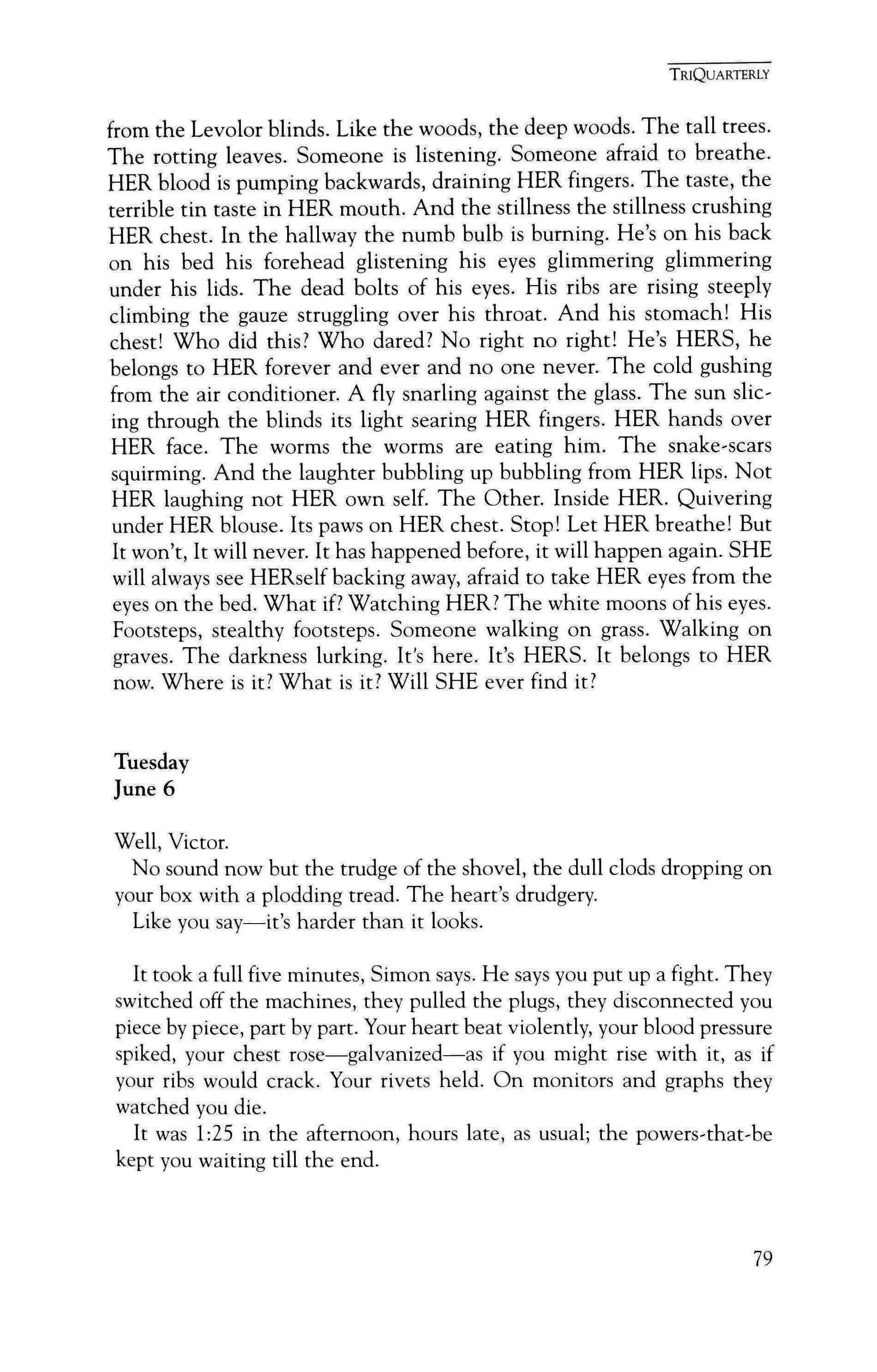
from the Levolor blinds. Like the woods, the deep woods. The tall trees. The rotting leaves. Someone is listening. Someone afraid to breathe. HER blood is pumping backwards, draining HER fingers. The taste, the terrible tin taste in HER mouth. And the stillness the stillness crushing HER chest. In the hallway the numb bulb is burning. He's on his back on his bed his forehead glistening his eyes glimmering glimmering under his lids. The dead bolts of his eyes. His ribs are rising steeply climbing the gauze struggling over his throat. And his stomach! His chest! Who did this? Who dared? No right no right! He's HERS, he belongs to HER forever and ever and no one never. The cold gushing from the air conditioner. A fly snarling against the glass. The sun slicing through the blinds its light searing HER fingers. HER hands over HER face. The worms the worms are eating him. The snake-scars squirming. And the laughter bubbling up bubbling from HER lips. Not HER laughing not HER own self. The Other. Inside HER. Quivering under HER blouse. Its paws on HER chest. Stop! Let HER breathe! But It won't, It will never. It has happened before, it will happen again. SHE will always see HERself backing away, afraid to take HER eyes from the eyes on the bed. What if? Watching HER? The white moons of his eyes. Footsteps, stealthy footsteps. Someone walking on grass. Walking on graves. The darkness lurking. It's here. It's HERS. It belongs to HER now. Where is it? What is it? Will SHE ever find it?
Tuesday June 6
Well, Victor. No sound now but the trudge of the shovel, the dull clods dropping on your box with a plodding tread. The heart's drudgery. Like you say-it's harder than it looks.
It took a full five minutes, Simon says. He says you put up a fight. They switched off the machines, they pulled the plugs, they disconnected you piece by piece, part by part. Your heart beat violently, your blood pressure spiked, your chest rose-galvanized-as if you might rise with it, as if your ribs would crack. Your rivets held. On monitors and graphs they watched you die.
It was 1 :25 in the afternoon, hours late, as usual; the powers-that-be kept you waiting till the end.
TRIQUARTERLY
79
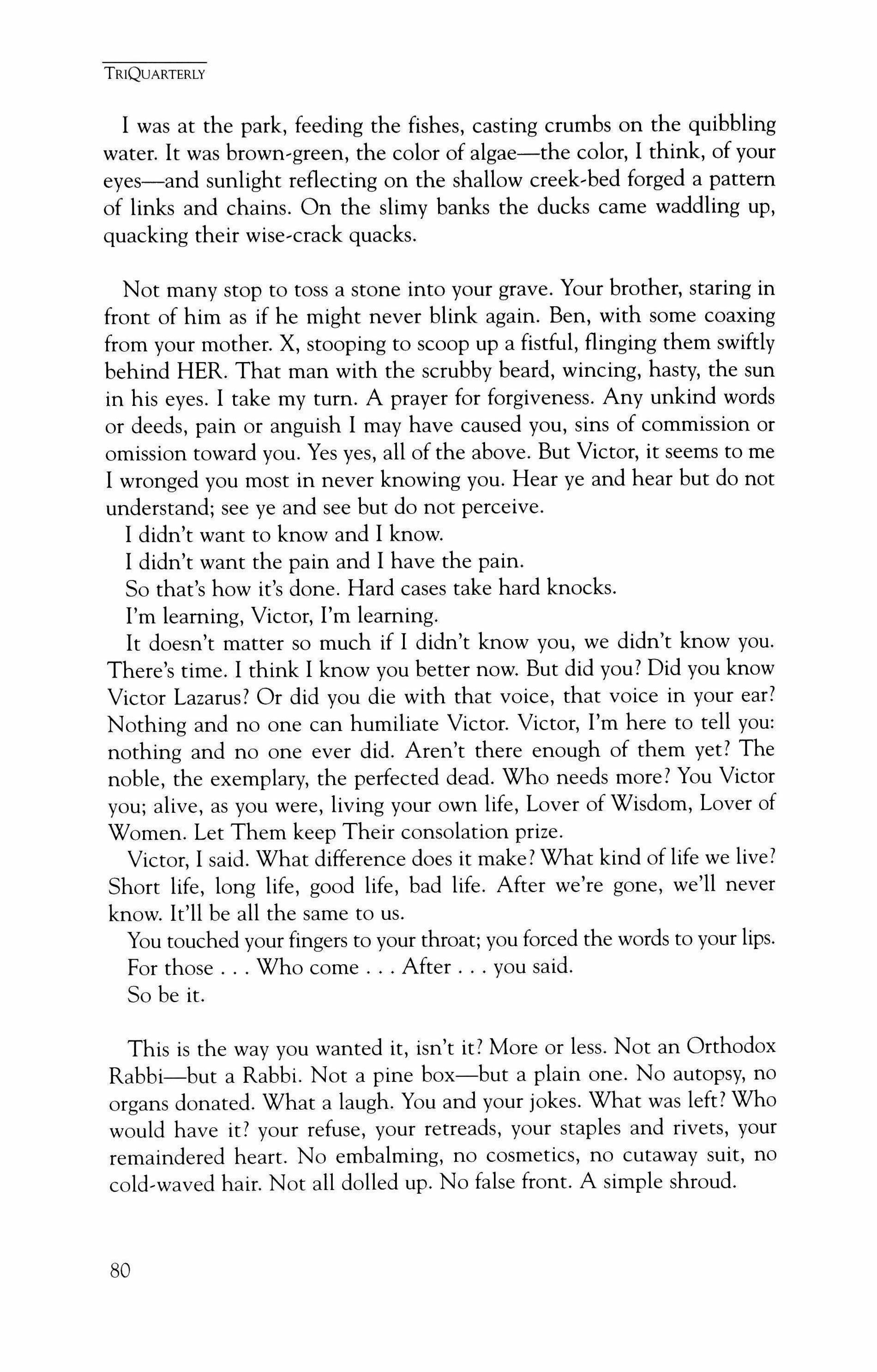
TRIQUARTERLY
I was at the park, feeding the fishes, casting crumbs on the quibbling water. It was brown-green, the color of algae-the color, I think, of your eyes-and sunlight reflecting on the shallow creek-bed forged a pattern of links and chains. On the slimy banks the ducks came waddling up, quacking their wise-crack quacks.
Not many stop to toss a stone into your grave. Your brother, staring in front of him as if he might never blink again. Ben, with some coaxing from your mother. X, stooping to scoop up a fistful, flinging them swiftly behind HER. That man with the scrubby beard, wincing, hasty, the sun in his eyes. I take my turn. A prayer for forgiveness. Any unkind words or deeds, pain or anguish I may have caused you, sins of commission or omission toward you. Yes yes, all of the above. But Victor, it seems to me I wronged you most in never knowing you. Hear ye and hear but do not understand; see ye and see but do not perceive.
I didn't want to know and I know.
I didn't want the pain and I have the pain.
So that's how it's done. Hard cases take hard knocks.
I'm learning, Victor, I'm learning. It doesn't matter so much if I didn't know you, we didn't know you. There's time. I think I know you better now. But did you? Did you know Victor Lazarus? Or did you die with that voice, that voice in your ear? Nothing and no one can humiliate Victor. Victor, I'm here to tell you: nothing and no one ever did. Aren't there enough of them yet? The noble, the exemplary, the perfected dead. Who needs more? You Victor you; alive, as you were, living your own life, Lover of Wisdom, Lover of Women. Let Them keep Their consolation prize.
Victor, I said. What difference does it make? What kind of life we live? Short life, long life, good life, bad life. After we're gone, we'll never know. It'll be all the same to us.
You touched your fingers to your throat; you forced the words to your lips. For those Who come After you said.
So be it.
This is the way you wanted it, isn't it? More or less. Not an Orthodox Rabbi-but a Rabbi. Not a pine box-but a plain one. No autopsy, no organs donated. What a laugh. You and your jokes. What was left? Who would have it? your refuse, your retreads, your staples and rivets, your remaindered heart. No embalming, no cosmetics, no cutaway suit, no cold-waved hair. Not all dolled up. No false front. A simple shroud.
80
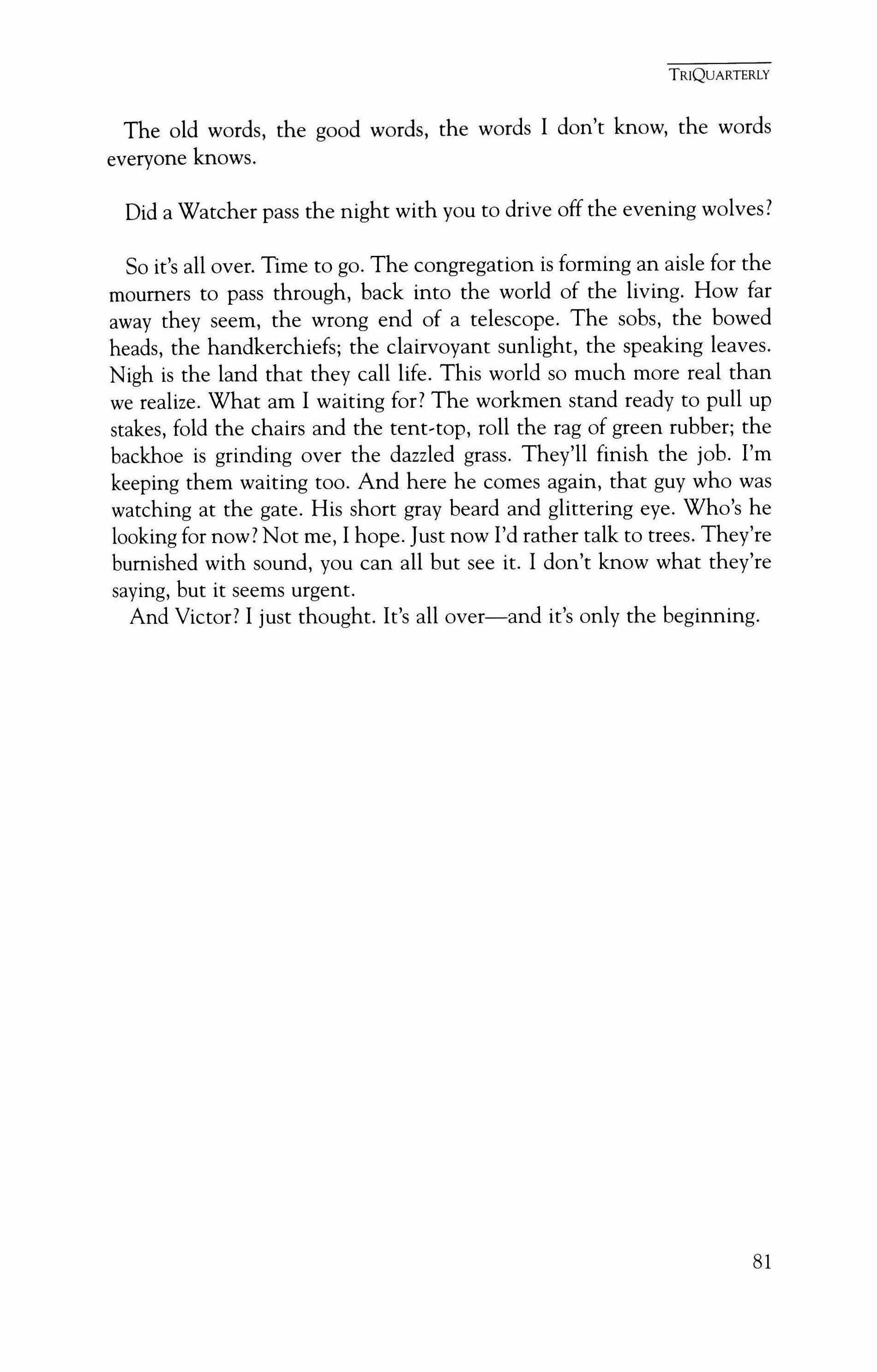
The old words, the good words, the words I don't know, the words everyone knows.
Did a Watcher pass the night with you to drive off the evening wolves?
So it's all over. Time to go. The congregation is forming an aisle for the mourners to pass through, back into the world of the living. How far away they seem, the wrong end of a telescope. The sobs, the bowed heads, the handkerchiefs; the clairvoyant sunlight, the speaking leaves. Nigh is the land that they call life. This world so much more real than we realize. What am I waiting for? The workmen stand ready to pull up stakes, fold the chairs and the tent-top, roll the rag of green rubber; the backhoe is grinding over the dazzled grass. They'll finish the job. I'm keeping them waiting too. And here he comes again, that guy who was watching at the gate. His short gray beard and glittering eye. Who's he looking for now? Not me, I hope. Just now I'd rather talk to trees. They're burnished with sound, you can all but see it. I don't know what they're saying, but it seems urgent.
And Victor? I just thought. It's all over-and it's only the beginning.
TRIQUARTERLY
81
from Thaw
Maxine Chernoff
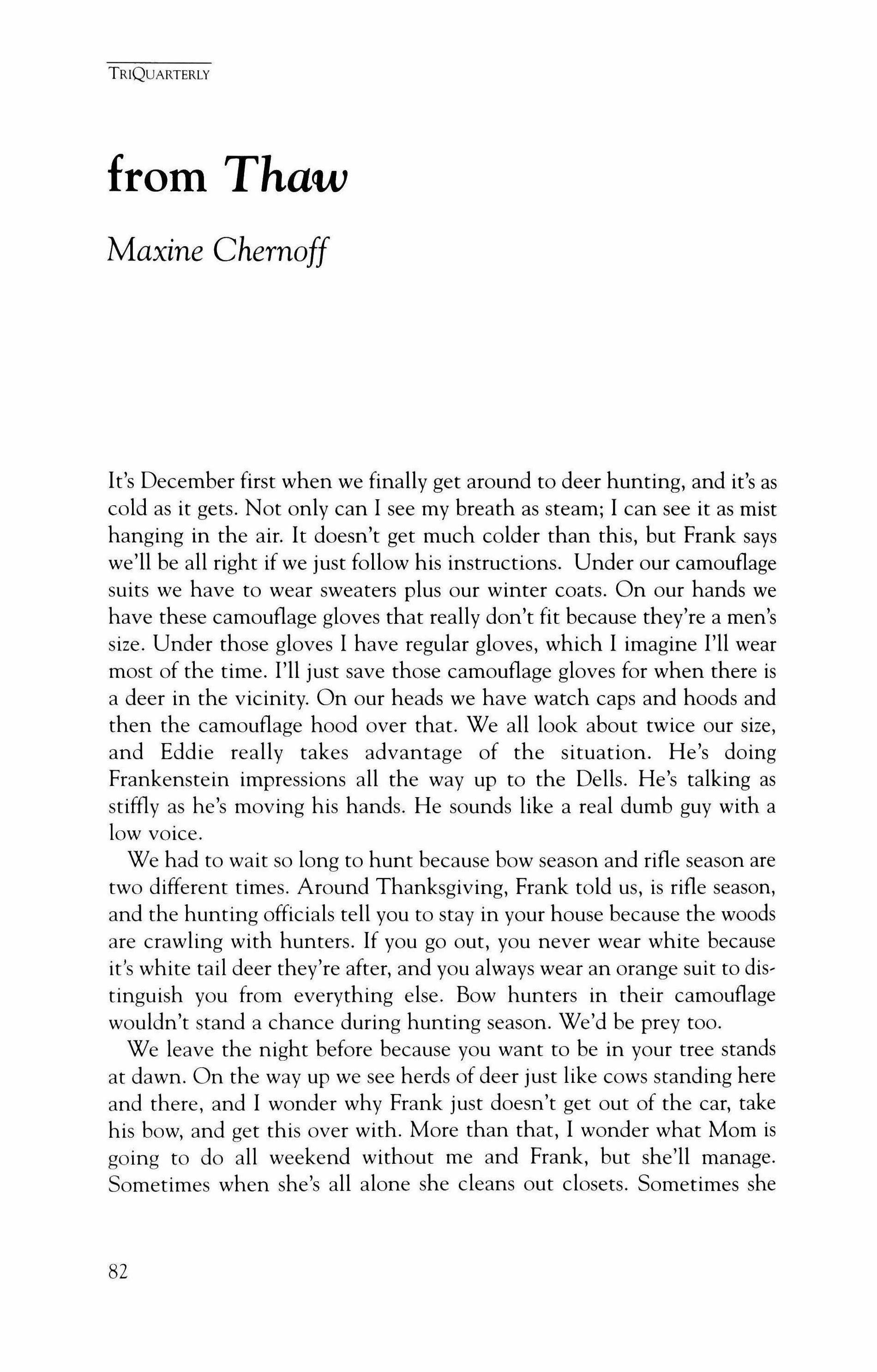
It's December first when we finally get around to deer hunting, and it's as cold as it gets. Not only can I see my breath as steam; I can see it as mist hanging in the air. It doesn't get much colder than this, but Frank says we'll be all right if we just follow his instructions. Under our camouflage suits we have to wear sweaters plus our winter coats. On our hands we have these camouflage gloves that really don't fit because they're a men's size. Under those gloves I have regular gloves, which I imagine I'll wear most of the time. I'll just save those camouflage gloves for when there is a deer in the vicinity. On our heads we have watch caps and hoods and then the camouflage hood over that. We all look about twice our size, and Eddie really takes advantage of the situation. He's doing Frankenstein impressions all the way up to the Dells. He's talking as stiffly as he's moving his hands. He sounds like a real dumb guy with a low voice.
We had to wait so long to hunt because bow season and rifle season are two different times. Around Thanksgiving, Frank told us, is rifle season, and the hunting officials tell you to stay in your house because the woods are crawling with hunters. If you go out, you never wear white because it's white tail deer they're after, and you always wear an orange suit to distinguish you from everything else. Bow hunters in their camouflage wouldn't stand a chance during hunting season. We'd be prey too.
We leave the night before because you want to be in your tree stands at dawn. On the way up we see herds of deer just like cows standing here and there, and I wonder why Frank just doesn't get out of the car, take his bow, and get this over with. More than that, I wonder what Mom is going to do all weekend without me and Frank, but she'll manage. Sometimes when she's all alone she cleans out closets. Sometimes she
TRIQUARTERLY
82
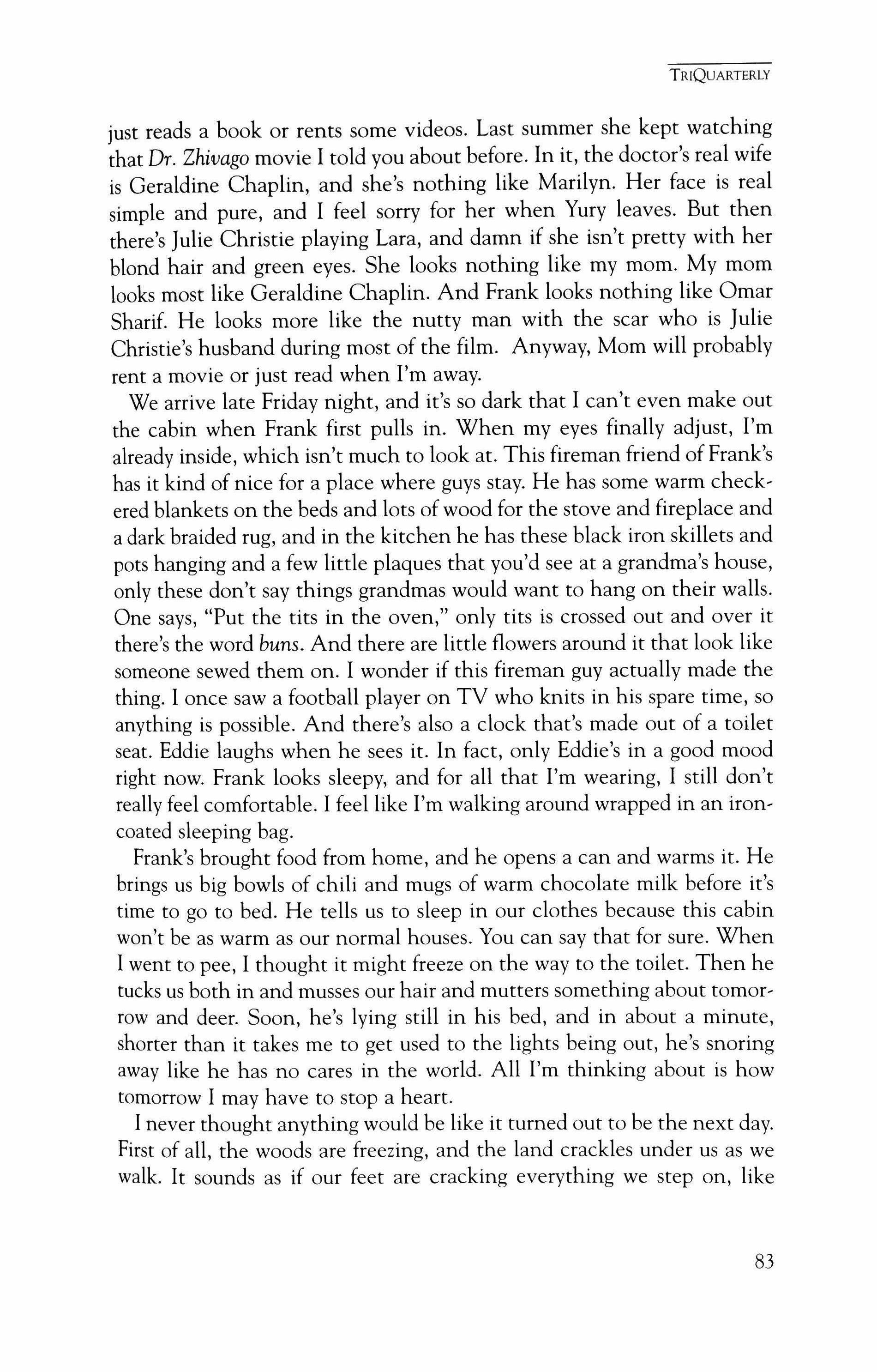
just reads a book or rents some videos. Last summer she kept watching that Dr. Zhivago movie I told you about before. In it, the doctor's real wife is Geraldine Chaplin, and she's nothing like Marilyn. Her face is real simple and pure, and I feel sorry for her when Yury leaves. But then there's Julie Christie playing Lara, and damn if she isn't pretty with her blond hair and green eyes. She looks nothing like my mom. My mom looks most like Geraldine Chaplin. And Frank looks nothing like Omar Sharif. He looks more like the nutty man with the scar who is Julie Christie's husband during most of the film. Anyway, Mom will probably rent a movie or just read when I'm away.
We arrive late Friday night, and it's so dark that I can't even make out the cabin when Frank first pulls in. When my eyes finally adjust, I'm already inside, which isn't much to look at. This fireman friend ofFrank's has it kind of nice for a place where guys stay. He has some warm checkered blankets on the beds and lots of wood for the stove and fireplace and a dark braided rug, and in the kitchen he has these black iron skillets and pots hanging and a few little plaques that you'd see at a grandma's house, only these don't say things grandmas would want to hang on their walls. One says, "Put the tits in the oven," only tits is crossed out and over it there's the word buns. And there are little flowers around it that look like someone sewed them on. I wonder if this fireman guy actually made the thing. I once saw a football player on TV who knits in his spare time, so anything is possible. And there's also a clock that's made out of a toilet seat. Eddie laughs when he sees it. In fact, only Eddie's in a good mood right now. Frank looks sleepy, and for all that I'm wearing, I still don't really feel comfortable. I feel like I'm walking around wrapped in an ironcoated sleeping bag.
Frank's brought food from home, and he opens a can and warms it. He brings us big bowls of chili and mugs of warm chocolate milk before it's time to go to bed. He tells us to sleep in our clothes because this cabin won't be as warm as our normal houses. You can say that for sure. When I went to pee, I thought it might freeze on the way to the toilet. Then he tucks us both in and musses our hair and mutters something about tomorrow and deer. Soon, he's lying still in his bed, and in about a minute, shorter than it takes me to get used to the lights being out, he's snoring away like he has no cares in the world. All I'm thinking about is how tomorrow I may have to stop a heart.
I never thought anything would be like it turned out to be the next day. First of all, the woods are freezing, and the land crackles under us as we walk. It sounds as if our feet are cracking everything we step on, like
TRIQUARTERLY
83
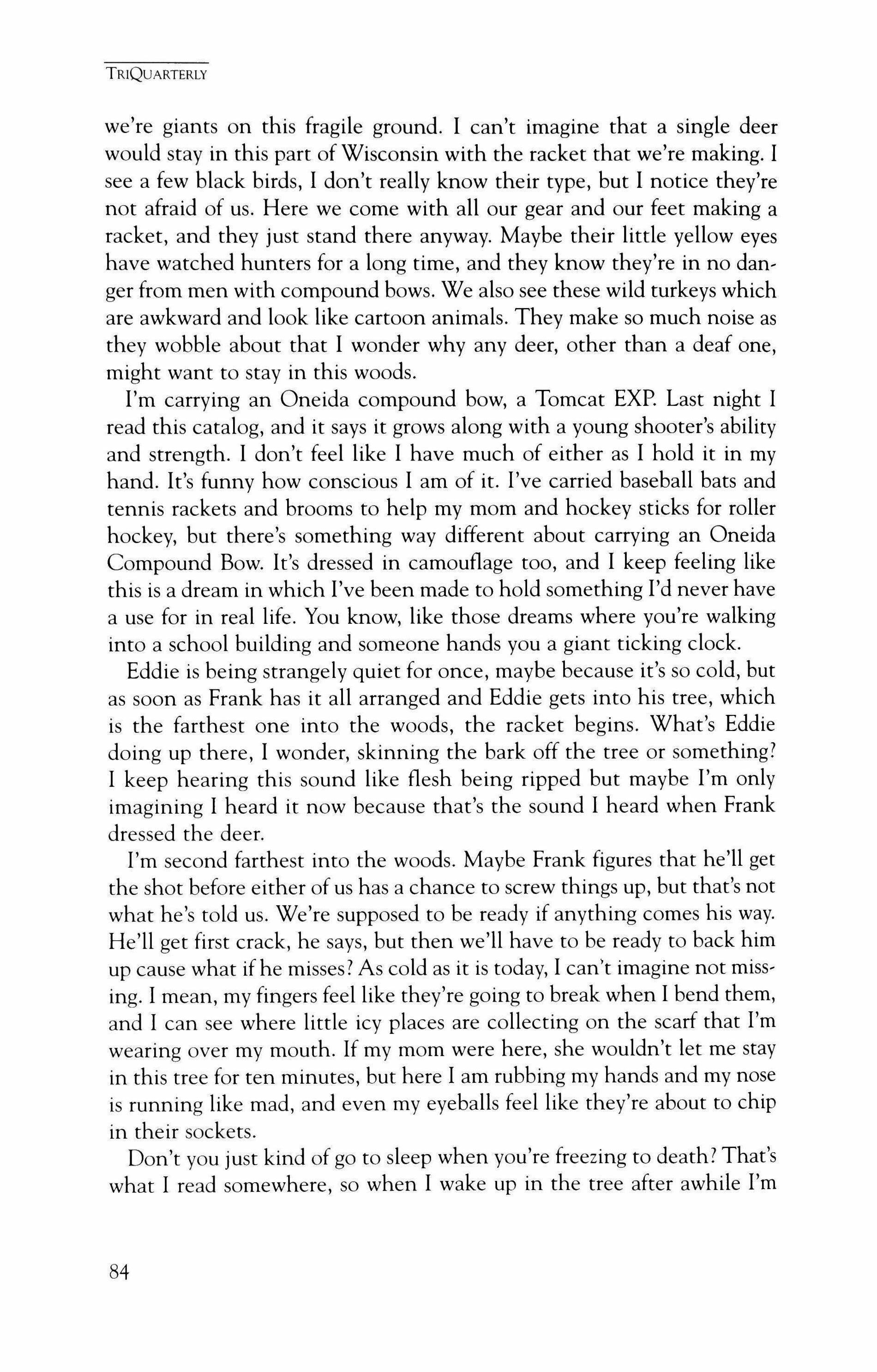
we're giants on this fragile ground. I can't imagine that a single deer would stay in this part of Wisconsin with the racket that we're making. I see a few black birds, I don't really know their type, but I notice they're not afraid of us. Here we come with all our gear and our feet making a racket, and they just stand there anyway. Maybe their little yellow eyes have watched hunters for a long time, and they know they're in no danger from men with compound bows. We also see these wild turkeys which are awkward and look like cartoon animals. They make so much noise as they wobble about that I wonder why any deer, other than a deaf one, might want to stay in this woods.
I'm carrying an Oneida compound bow, a Tomcat EXP. Last night I read this catalog, and it says it grows along with a young shooter's ability and strength. I don't feel like I have much of either as I hold it in my hand. It's funny how conscious I am of it. I've carried baseball bats and tennis rackets and brooms to help my mom and hockey sticks for roller hockey, but there's something way different about carrying an Oneida Compound Bow. It's dressed in camouflage too, and I keep feeling like this is a dream in which I've been made to hold something I'd never have a use for in real life. You know, like those dreams where you're walking into a school building and someone hands you a giant ticking clock.
Eddie is being strangely quiet for once, maybe because it's so cold, but as soon as Frank has it all arranged and Eddie gets into his tree, which is the farthest one into the woods, the racket begins. What's Eddie doing up there, I wonder, skinning the bark off the tree or something? I keep hearing this sound like flesh being ripped but maybe I'm only imagining I heard it now because that's the sound I heard when Frank dressed the deer.
I'm second farthest into the woods. Maybe Frank figures that he'll get the shot before either of us has a chance to screw things up, but that's not what he's told us. We're supposed to be ready if anything comes his way. He'll get first crack, he says, but then we'll have to be ready to back him up cause what if he misses? As cold as it is today, I can't imagine not missing. I mean, my fingers feel like they're going to break when I bend them, and I can see where little icy places are collecting on the scarf that I'm wearing over my mouth. If my mom were here, she wouldn't let me stay in this tree for ten minutes, but here I am rubbing my hands and my nose is running like mad, and even my eyeballs feel like they're about to chip in their sockets.
Don't you just kind of go to sleep when you're freezing to death? That's what I read somewhere, so when I wake up in the tree after awhile I'm
TRIQUARTERLY
84
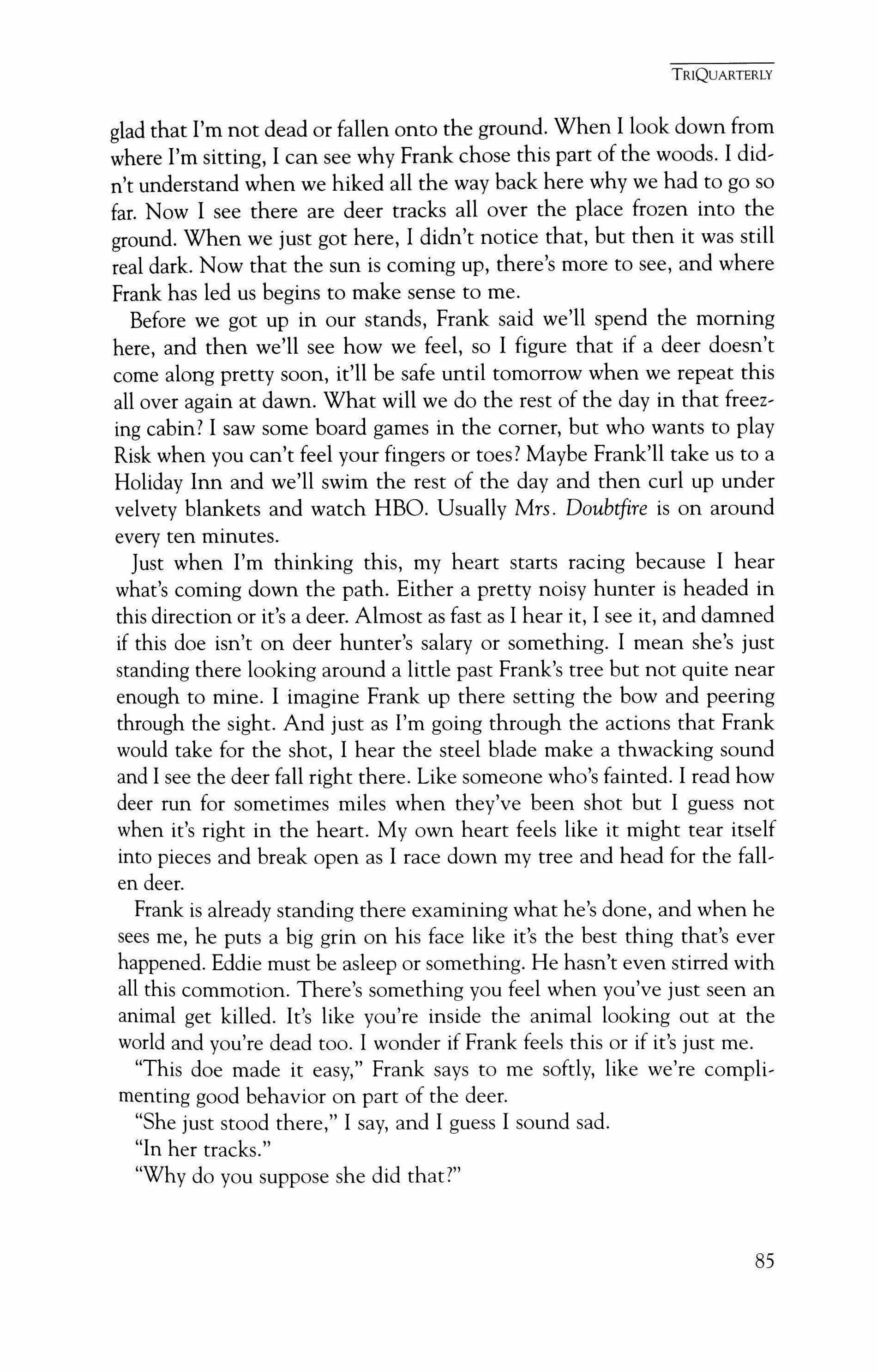
glad that I'm not dead or fallen onto the ground. When I look down from where I'm sitting, I can see why Frank chose this part of the woods. I did, n't understand when we hiked all the way back here why we had to go so far. Now I see there are deer tracks all over the place frozen into the ground. When we just got here, I didn't notice that, but then it was still real dark. Now that the sun is coming up, there's more to see, and where Frank has led us begins to make sense to me.
Before we got up in our stands, Frank said we'll spend the morning here, and then we'll see how we feel, so I figure that if a deer doesn't come along pretty soon, it'll be safe until tomorrow when we repeat this all over again at dawn. What will we do the rest of the day in that freezing cabin? I saw some board games in the comer, but who wants to play Risk when you can't feel your fingers or toes? Maybe Frank'll take us to a Holiday Inn and we'll swim the rest of the day and then curl up under velvety blankets and watch HBO. Usually Mrs. Doubtfire is on around every ten minutes.
Just when I'm thinking this, my heart starts racing because I hear what's coming down the path. Either a pretty noisy hunter is headed in this direction or it's a deer. Almost as fast as I hear it, I see it, and damned if this doe isn't on deer hunter's salary or something. I mean she's just standing there looking around a little past Frank's tree but not quite near enough to mine. I imagine Frank up there setting the bow and peering through the sight. And just as I'm going through the actions that Frank would take for the shot, I hear the steel blade make a thwacking sound and I see the deer fall right there. Like someone who's fainted. I read how deer run for sometimes miles when they've been shot but I guess not when it's right in the heart. My own heart feels like it might tear itself into pieces and break open as I race down my tree and head for the fall, en deer.
Frank is already standing there examining what he's done, and when he sees me, he puts a big grin on his face like it's the best thing that's ever happened. Eddie must be asleep or something. He hasn't even stirred with all this commotion. There's something you feel when you've just seen an animal get killed. It's like you're inside the animal looking out at the world and you're dead too. I wonder if Frank feels this or if it's just me.
"This doe made it easy," Frank says to me softly, like we're complimenting good behavior on part of the deer.
"She just stood there," I say, and I guess I sound sad.
"In her tracks."
"Why do you suppose she did that?"
TRIQUARTERLY
85

"Maybe it was her time," Frank said, and I thought about how people say things like that a lot. I remembered my mom telling me about when my grandfather died, how everyone acted like it was meant to be, but she felt broken in two. Maybe they're the normal ones and my mom and me are extra sensitive. I feel like the deer's glassy eyes are targeting mine as they stare into the sky.
I guess it took me a while to get here because the deer isn't twitching or bleeding anymore. You can see from its glazed look that it's dead, period, and I guess that's the one good thing about arrows. If you strike the deer in the right place, it's a quick death. If you hit it, say, in the shoulder, the deer will just run around the woods for the rest of its life with an arrow stuck there. I saw a photo of a deer like that at our hunting safety lessons. The whole woods might be filled with near misses, I suddenly thought, while Frank and me are standing over this deer for the longest time without saying anything more. Maybe he can't believe it either. It's not like he hunts every day of his life. He's bending down and touching the deer here and there with the palm of his camouflage glove. Sometimes it looks like he's massaging it. It's kind of a skinny young deer. Maybe it weighs about a hundred pounds. I guess he's checking for a heartbeat, but you can tell by the deer's dead face that what Frank's doing isn t necessary.
Suddenly it dawns on him that Eddie hasn't come down from perch, and he goes down the path a ways in search of his son, who has probably managed to do himself some damage up in that tree. I'm left alone with the body, which is giving off light steam because it's so cold, and I'm kind of hoping that the deer will leap up and make its way back out of the woods, the way that opossum did once in our yard.
When Eddie gets to the deer, he's noisy as usual. He's shouting and jumping around and acting like he's at a hockey game. He puts his finger on the deer's nose, and that's when I most want the deer to do its Night of the Living Dead impression. Instead, Frank gives Eddie the tag that goes on the doe. Eddie ties the tag to the doe's head like an earring. Frank's number shows clearly on the bright orange tag.
The next thing you have to do, you need a strong stomach for. Frank has a hunting knife and makes a slit in the deer's throat. Blood oozes out of her neck onto the steaming ground, and I think of pictures of saints I've seen at the Art Institute. One of the lady saints even had her breasts cut off. But this deer is another kind of saint, I'm thinking, because she didn't really want to be one. She's more innocent than a saint because she was in the wrong place at the wrong time. Plus, I keep
TRIQUARTERLY
86
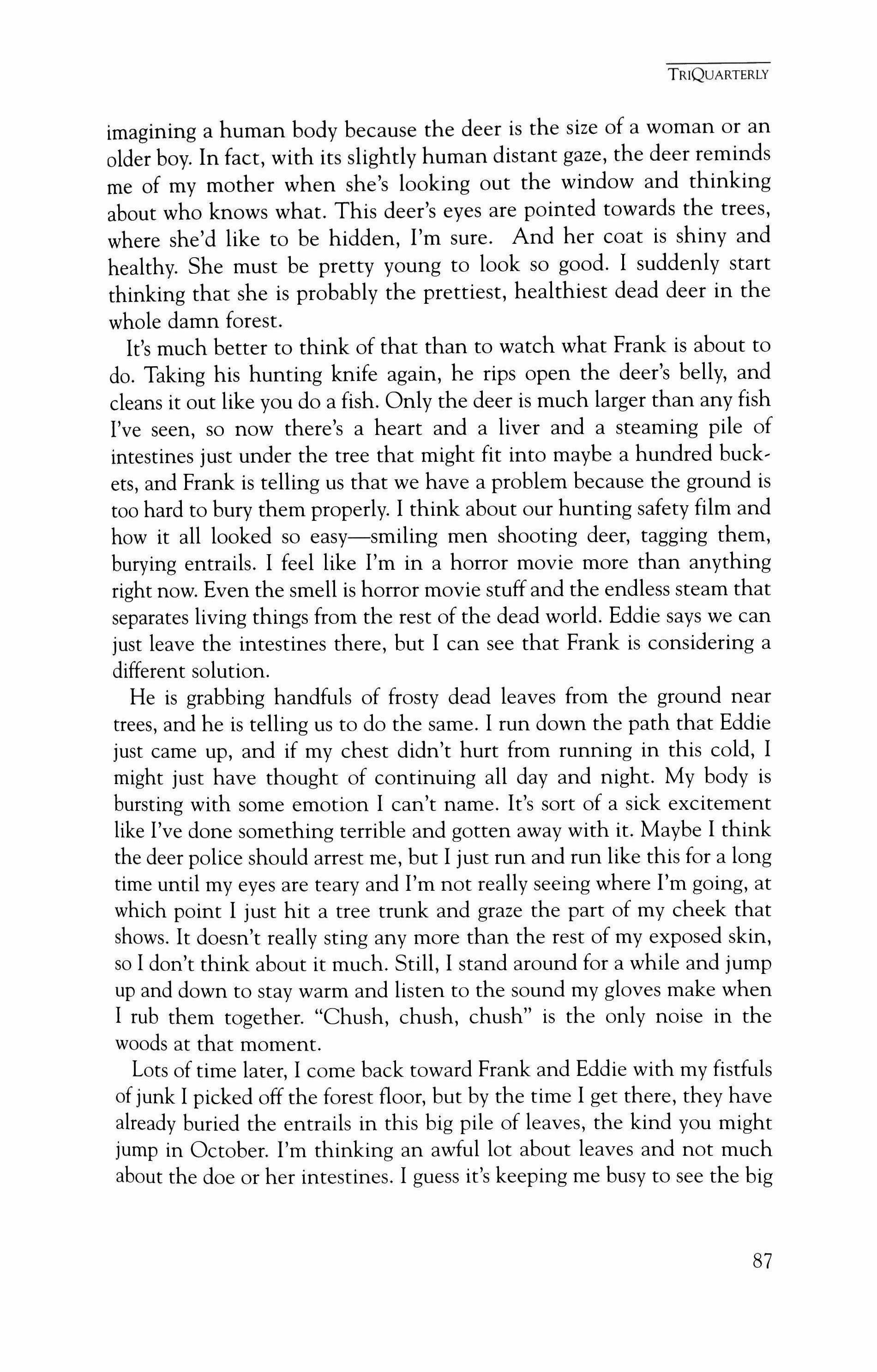
imagining a human body because the deer is the size of a woman or an older boy. In fact, with its slightly human distant gaze, the deer reminds me of my mother when she's looking out the window and thinking about who knows what. This deer's eyes are pointed towards the trees, where she'd like to be hidden, I'm sure. And her coat is shiny and healthy. She must be pretty young to look so good. I suddenly start thinking that she is probably the prettiest, healthiest dead deer in the whole damn forest.
It's much better to think of that than to watch what Frank is about to do. Taking his hunting knife again, he rips open the deer's belly, and cleans it out like you do a fish. Only the deer is much larger than any fish I've seen, so now there's a heart and a liver and a steaming pile of intestines just under the tree that might fit into maybe a hundred buckets, and Frank is telling us that we have a problem because the ground is too hard to bury them properly. I think about our hunting safety film and how it all looked so easy-smiling men shooting deer, tagging them, burying entrails. I feel like I'm in a horror movie more than anything right now. Even the smell is horror movie stuff and the endless steam that separates living things from the rest of the dead world. Eddie says we can just leave the intestines there, but I can see that Frank is considering a different solution.
He is grabbing handfuls of frosty dead leaves from the ground near trees, and he is telling us to do the same. I run down the path that Eddie just carne up, and if my chest didn't hurt from running in this cold, I might just have thought of continuing all day and night. My body is bursting with some emotion I can't name. It's sort of a sick excitement like I've done something terrible and gotten away with it. Maybe I think the deer police should arrest me, but I just run and run like this for a long time until my eyes are teary and I'm not really seeing where I'm going, at which point I just hit a tree trunk and graze the part of my cheek that shows. It doesn't really sting any more than the rest of my exposed skin, so I don't think about it much. Still, I stand around for a while and jump up and down to stay warm and listen to the sound my gloves make when I rub them together. "Chush, chush, chush" is the only noise in the woods at that moment.
Lots of time later, I come back toward Frank and Eddie with my fistfuls of junk I picked off the forest floor, but by the time I get there, they have already buried the entrails in this big pile of leaves, the kind you might jump in October. I'm thinking an awful lot about leaves and not much about the doe or her intestines. I guess it's keeping me busy to see the big
TRIQUARTERLY
87
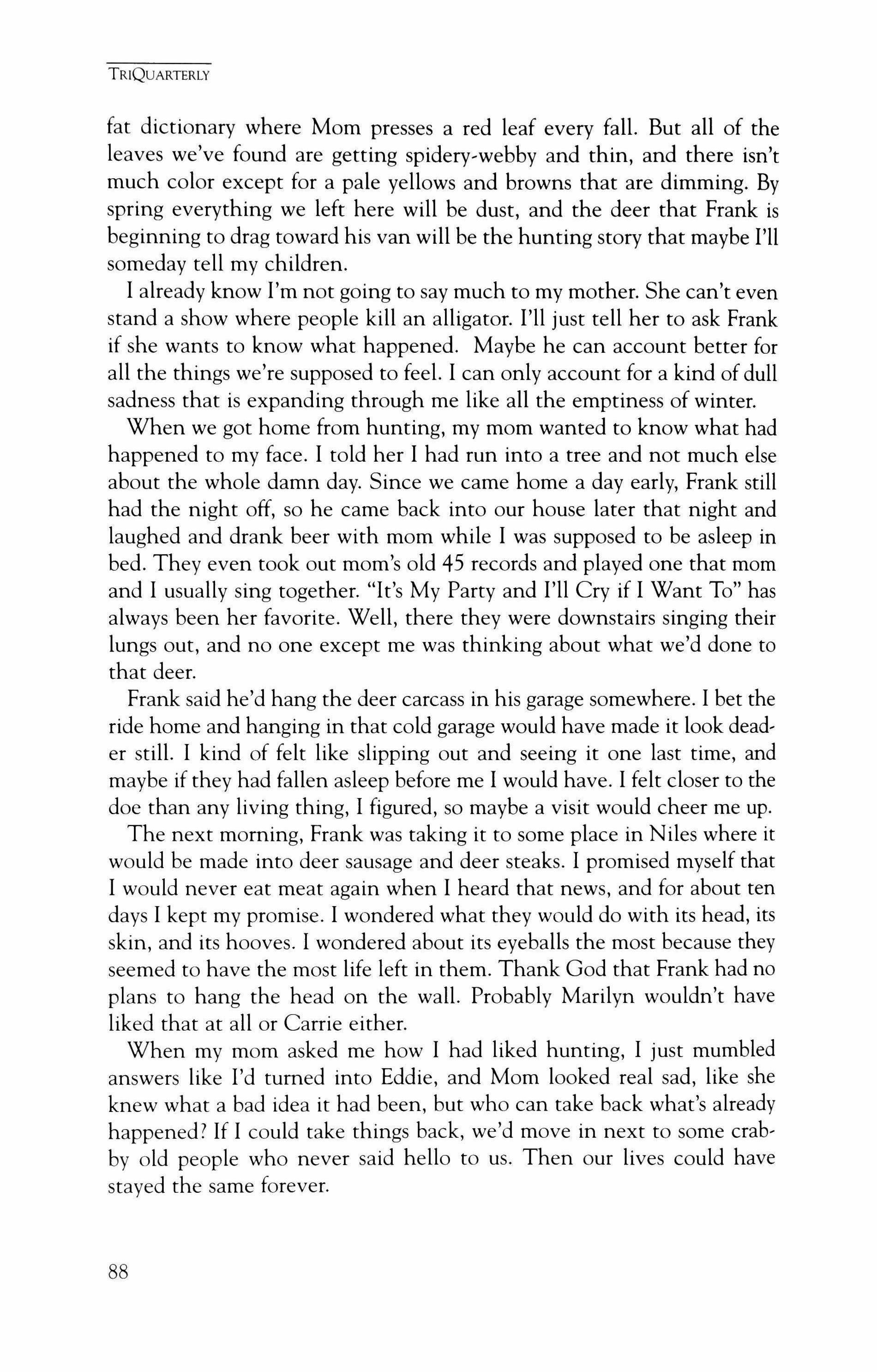
fat dictionary where Mom presses a red leaf every fall. But all of the leaves we've found are getting spidery-webby and thin, and there isn't much color except for a pale yellows and browns that are dimming. By spring everything we left here will be dust, and the deer that Frank is beginning to drag toward his van will be the hunting story that maybe I'll someday tell my children.
I already know I'm not going to say much to my mother. She can't even stand a show where people kill an alligator. I'll just tell her to ask Frank if she wants to know what happened. Maybe he can account better for all the things we're supposed to feel. I can only account for a kind of dull sadness that is expanding through me like all the emptiness of winter.
When we got home from hunting, my mom wanted to know what had happened to my face. I told her I had run into a tree and not much else about the whole damn day. Since we came home a day early, Frank still had the night off, so he came back into our house later that night and laughed and drank beer with mom while I was supposed to be asleep in bed. They even took out mom's old 45 records and played one that mom and I usually sing together. "It's My Party and I'll Cry if I Want To" has always been her favorite. Well, there they were downstairs singing their lungs out, and no one except me was thinking about what we'd done to that deer.
Frank said he'd hang the deer carcass in his garage somewhere. I bet the ride home and hanging in that cold garage would have made it look deader still. I kind of felt like slipping out and seeing it one last time, and maybe if they had fallen asleep before me I would have. I felt closer to the doe than any living thing, I figured, so maybe a visit would cheer me up.
The next morning, Frank was taking it to some place in Niles where it would be made into deer sausage and deer steaks. I promised myself that I would never eat meat again when I heard that news, and for about ten days I kept my promise. I wondered what they would do with its head, its skin, and its hooves. I wondered about its eyeballs the most because they seemed to have the most life left in them. Thank God that Frank had no plans to hang the head on the wall. Probably Marilyn wouldn't have liked that at all or Carrie either.
When my mom asked me how I had liked hunting, I just mumbled answers like I'd turned into Eddie, and Mom looked real sad, like she knew what a bad idea it had been, but who can take back what's already happened? If I could take things back, we'd move in next to some crabby old people who never said hello to us. Then our lives could have stayed the same forever.
TRIQUARTERLY
88
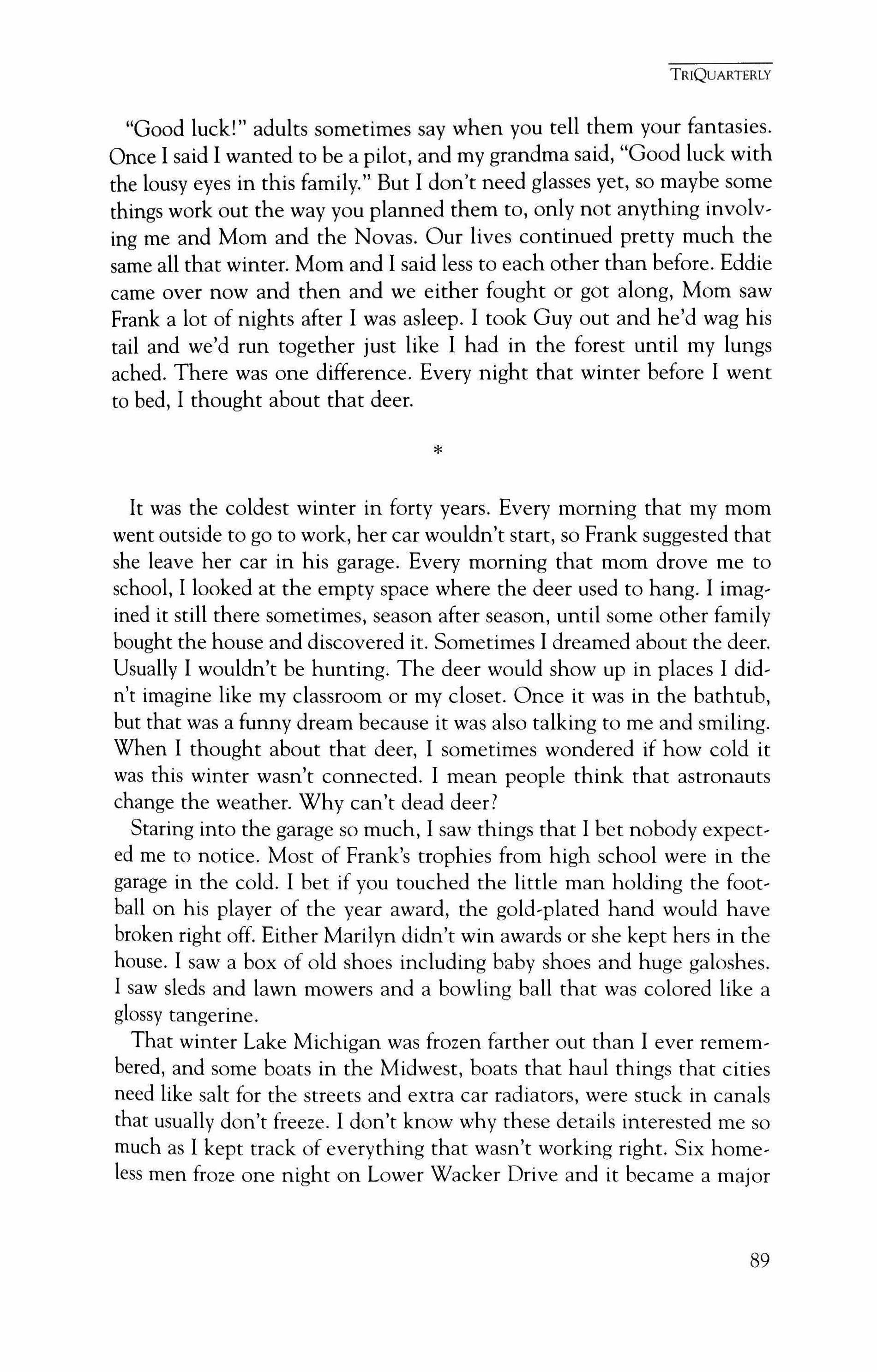
"Good luck!" adults sometimes say when you tell them your fantasies. Once I said I wanted to be a pilot, and my grandma said, "Good luck with the lousy eyes in this family." But I don't need glasses yet, so maybe some things work out the way you planned them to, only not anything involving me and Mom and the Novas. Our lives continued pretty much the same all that winter. Mom and I said less to each other than before. Eddie came over now and then and we either fought or got along, Mom saw Frank a lot of nights after I was asleep. I took Guy out and he'd wag his tail and we'd run together just like I had in the forest until my lungs ached. There was one difference. Every night that winter before I went to bed, I thought about that deer.
*
It was the coldest winter in forty years. Every morning that my mom went outside to go to work, her car wouldn't start, so Frank suggested that she leave her car in his garage. Every morning that mom drove me to school, I looked at the empty space where the deer used to hang. I imagined it still there sometimes, season after season, until some other family bought the house and discovered it. Sometimes I dreamed about the deer. Usually I wouldn't be hunting. The deer would show up in places I didn't imagine like my classroom or my closet. Once it was in the bathtub, but that was a funny dream because it was also talking to me and smiling. When I thought about that deer, I sometimes wondered if how cold it was this winter wasn't connected. I mean people think that astronauts change the weather. Why can't dead deer?
Staring into the garage so much, I saw things that I bet nobody expected me to notice. Most of Frank's trophies from high school were in the garage in the cold. I bet if you touched the little man holding the football on his player of the year award, the gold-plated hand would have broken right off. Either Marilyn didn't win awards or she kept hers in the house. I saw a box of old shoes including baby shoes and huge galoshes. I saw sleds and lawn mowers and a bowling ball that was colored like a glossy tangerine.
That winter Lake Michigan was frozen farther out than I ever remembered, and some boats in the Midwest, boats that haul things that cities need like salt for the streets and extra car radiators, were stuck in canals that usually don't freeze. I don't know why these details interested me so much as I kept track of everything that wasn't working right. Six homeless men froze one night on Lower Wacker Drive and it became a major
TRIQUARTERLY
89

scandal for the city. The mayor himself walked around for a few days and invited all the street people to come to some fancy new shelters he just had opened. Pictures showed a few of them holding mugs of something and smiling kind of crooked. But my mom says most of the homeless people can't accept a favor because they're mentally ill and wouldn't be on the street otherwise. All of the people the mayor spoke to looked like frozen residents of another more seedy galaxy. The mayor's face was redder than usual. He wore silly ear muffs under his hat. When I was little, my mom said I used to call ear muffs ear muffins.
In that garage I bet I was looking for something that would give me a clue to what I was looking for. While I laid in bed and listened to news and weather reports until one in the morning, Mom and Frank whispered downstairs and sometimes laughed. The way they laughed together made a sound like music, but it was when their talking stopped completely and I knew they were in the house that I always thought of this winter story. There was a Polish lady, ninety or so years old, living all by herself on the Near West Side. Her neighborhood had some older Polish people like herself and lots of Puerto Ricans. Mom and I used to go to some resale stores over there because people with money had started to move in too, and sometimes they thought that junk was anything two years old or more. We got some real nice things for the house there, like this table that looks like a treasure chest where I keep all my games.
Anyway, this woman's husband had died a long time ago, and she never had any children. She owned her house but not much else, and she didn't have money to keep it up anymore. When her heating went off during the worst week of all the cold, she went down to the basement to look at the damage. While she was in the room, she must have fallen and not been able to get up. A few days later, neighbors remembered they hadn't seen her in a long time, and when they came to check on her, they found her frozen to the basement floor, still breathing.
This was a typical Chicago story that winter. Somehow the lady managed to live, but I kept thinking of her all alone down there, knees frozen. I imagined that she was the loneliest person in the world. I thought maybe I should call her and take her to lunch or something. Sometimes I disagreed with myself. I thought that maybe I was the loneliest person. After all, who was lying in bed alone night after night listening to my mom whispering? Who was listening to music and laughter? At least the old lady had God to talk to.
Around the time that the lady froze to the floor and lived, Reilly and Carol came to dinner. I was real happy they were coming because my
TRIQUARTERLY
90
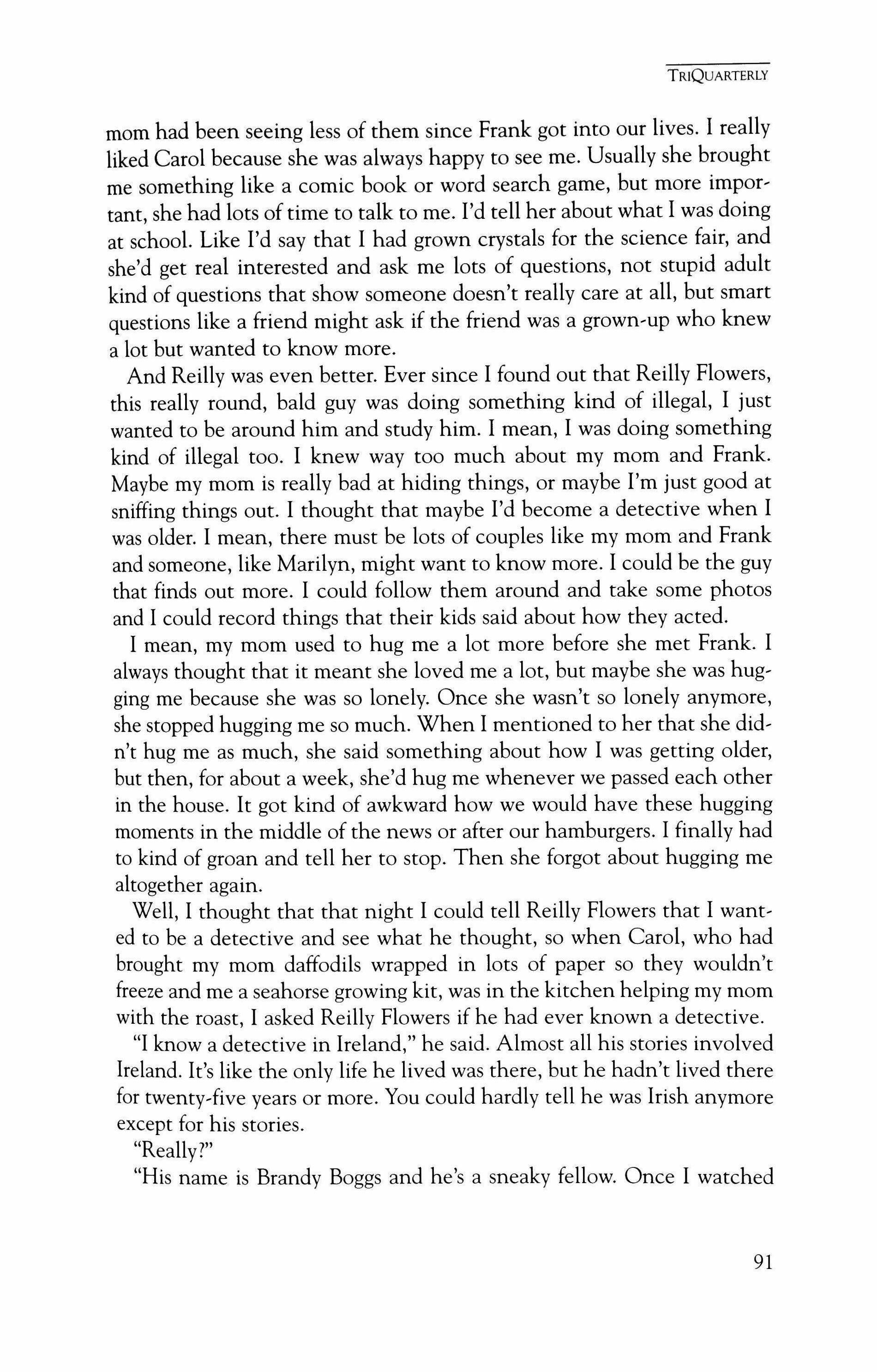
morn had been seeing less of them since Frank got into our lives. I really liked Carol because she was always happy to see me. Usually she brought me something like a comic book or word search game, but more important, she had lots of time to talk to me. I'd tell her about what I was doing at schooL Like I'd say that I had grown crystals for the science fair, and she'd get real interested and ask me lots of questions, not stupid adult kind of questions that show someone doesn't really care at all, but smart questions like a friend might ask if the friend was a grown-up who knew a lot but wanted to know more.
And Reilly was even better. Ever since I found out that Reilly Flowers, this really round, bald guy was doing something kind of illegal, I just wanted to be around him and study him. I mean, I was doing something kind of illegal too. I knew way too much about my mom and Frank. Maybe my mom is really bad at hiding things, or maybe I'm just good at sniffing things out. I thought that maybe I'd become a detective when I was older. I mean, there must be lots of couples like my mom and Frank and someone, like Marilyn, might want to know more. I could be the guy that finds out more. I could follow them around and take some photos and I could record things that their kids said about how they acted.
I mean, my mom used to hug me a lot more before she met Frank. I always thought that it meant she loved me a lot, but maybe she was hugging me because she was so lonely. Once she wasn't so lonely anymore, she stopped hugging me so much. When I mentioned to her that she didn't hug me as much, she said something about how I was getting older, but then, for about a week, she'd hug me whenever we passed each other in the house. It got kind of awkward how we would have these hugging moments in the middle of the news or after our hamburgers. I finally had to kind of groan and tell her to stop. Then she forgot about hugging me altogether again.
Well, I thought that that night I could tell Reilly Flowers that I wanted to be a detective and see what he thought, so when Carol, who had brought my mom daffodils wrapped in lots of paper so they wouldn't freeze and me a seahorse growing kit, was in the kitchen helping my mom with the roast, I asked Reilly Flowers if he had ever known a detective.
"I know a detective in Ireland," he said. Almost all his stories involved Ireland. It's like the only life he lived was there, but he hadn't lived there for twenty-five years or more. You could hardly tell he was Irish anymore except for his stories.
"R 11 7" ea y.
"His name is Brandy Boggs and he's a sneaky fellow. Once I watched
TRIQUARTERLY
91
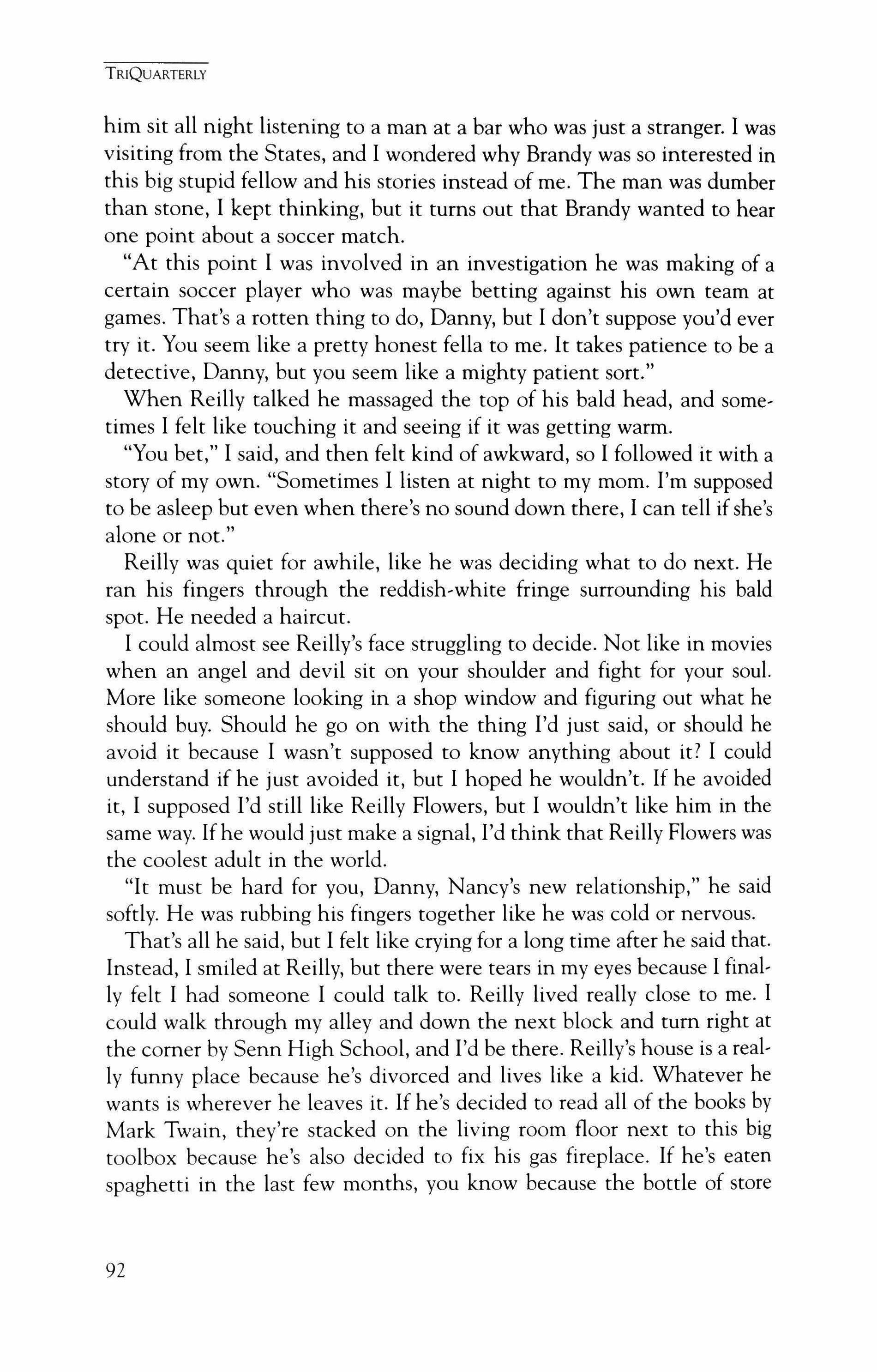
TRIQUARTERLY
him sit all night listening to a man at a bar who was just a stranger. I was visiting from the States, and I wondered why Brandy was so interested in this big stupid fellow and his stories instead of me. The man was dumber than stone, I kept thinking, but it turns out that Brandy wanted to hear one point about a soccer match.
"At this point I was involved in an investigation he was making of a certain soccer player who was maybe betting against his own team at games. That's a rotten thing to do, Danny, but I don't suppose you'd ever try it. You seem like a pretty honest fella to me. It takes patience to be a detective, Danny, but you seem like a mighty patient sort."
When Reilly talked he massaged the top of his bald head, and sometimes I felt like touching it and seeing if it was getting warm.
"You bet," I said, and then felt kind of awkward, so I followed it with a story of my own. "Sometimes I listen at night to my mom. I'm supposed to be asleep but even when there's no sound down there, I can tell ifshe's alone or not."
Reilly was quiet for awhile, like he was deciding what to do next. He ran his fingers through the reddish-white fringe surrounding his bald spot. He needed a haircut.
I could almost see Reilly's face struggling to decide. Not like in movies when an angel and devil sit on your shoulder and fight for your soul. More like someone looking in a shop window and figuring out what he should buy. Should he go on with the thing I'd just said, or should he avoid it because I wasn't supposed to know anything about it? I could understand if he just avoided it, but I hoped he wouldn't. If he avoided it, I supposed I'd still like Reilly Flowers, but I wouldn't like him in the same way. Ifhe would just make a signal, I'd think that Reilly Flowers was the coolest adult in the world.
"It must be hard for you, Danny, Nancy's new relationship," he said softly. He was rubbing his fingers together like he was cold or nervous.
That's all he said, but I felt like crying for a long time after he said that. Instead, I smiled at Reilly, but there were tears in my eyes because I finally felt I had someone I could talk to. Reilly lived really close to me. I could walk through my alley and down the next block and tum right at the comer by Senn High School, and I'd be there. Reilly's house is a really funny place because he's divorced and lives like a kid. Whatever he wants is wherever he leaves it. If he's decided to read all of the books by Mark Twain, they're stacked on the living room floor next to this big toolbox because he's also decided to fix his gas fireplace. If he's eaten spaghetti in the last few months, you know because the bottle of store
92
bought sauce is washed out and has a few dried leaves in it. If he's going to grow tomatoes that spring, he has rows of tomato seeds germinating in little brown cardboard pots. If his dog Michael decides to knock over the tomatoes that are germinating, Reilly just lets them fall. If his cat Stump, who has three legs, wants to sit on the Twain books, she does for a few days without Reilly saying a thing. And now that he works fulltime at the church, his house has gotten even stranger. He has church stuff all over, outdated bulletins and broken signs and even old collection plates. I can't imagine what he does with them. Maybe Stump and Michael use them as food dishes or maybe he's just collecting old collection plates. Anyway, I felt like I'd accomplished something that Reilly knew that I knew. Now I was like the frozen lady. Somebody had come to thaw me out.
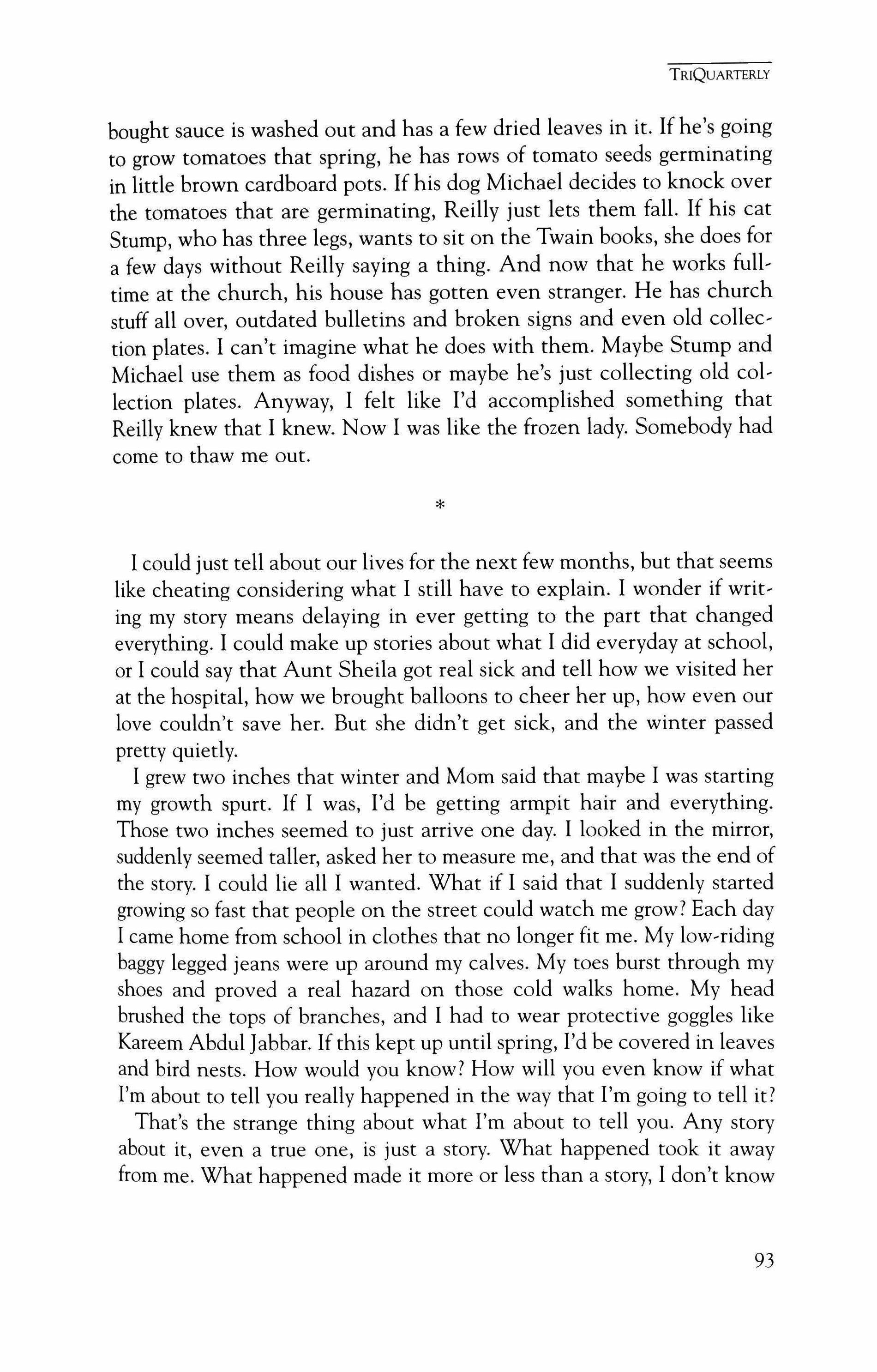
I could just tell about our lives for the next few months, but that seems like cheating considering what I still have to explain. I wonder if writing my story means delaying in ever getting to the part that changed everything. I could make up stories about what I did everyday at school, or I could say that Aunt Sheila got real sick and tell how we visited her at the hospital, how we brought balloons to cheer her up, how even our love couldn't save her. But she didn't get sick, and the winter passed pretty quietly.
I grew two inches that winter and Mom said that maybe I was starting my growth spurt. If I was, I'd be getting armpit hair and everything. Those two inches seemed to just arrive one day. I looked in the mirror, suddenly seemed taller, asked her to measure me, and that was the end of the story. I could lie all I wanted. What if I said that I suddenly started growing so fast that people on the street could watch me grow? Each day I came home from school in clothes that no longer fit me. My low-riding baggy legged jeans were up around my calves. My toes burst through my shoes and proved a real hazard on those cold walks home. My head brushed the tops of branches, and I had to wear protective goggles like Kareem Abdul [abbar, If this kept up until spring, I'd be covered in leaves and bird nests. How would you know? How will you even know if what I'm about to tell you really happened in the way that I'm going to tell it?
That's the strange thing about what I'm about to tell you. Any story about it, even a true one, is just a story. What happened took it away from me. What happened made it more or less than a story, I don't know
TRIQUARTERLY
*
93
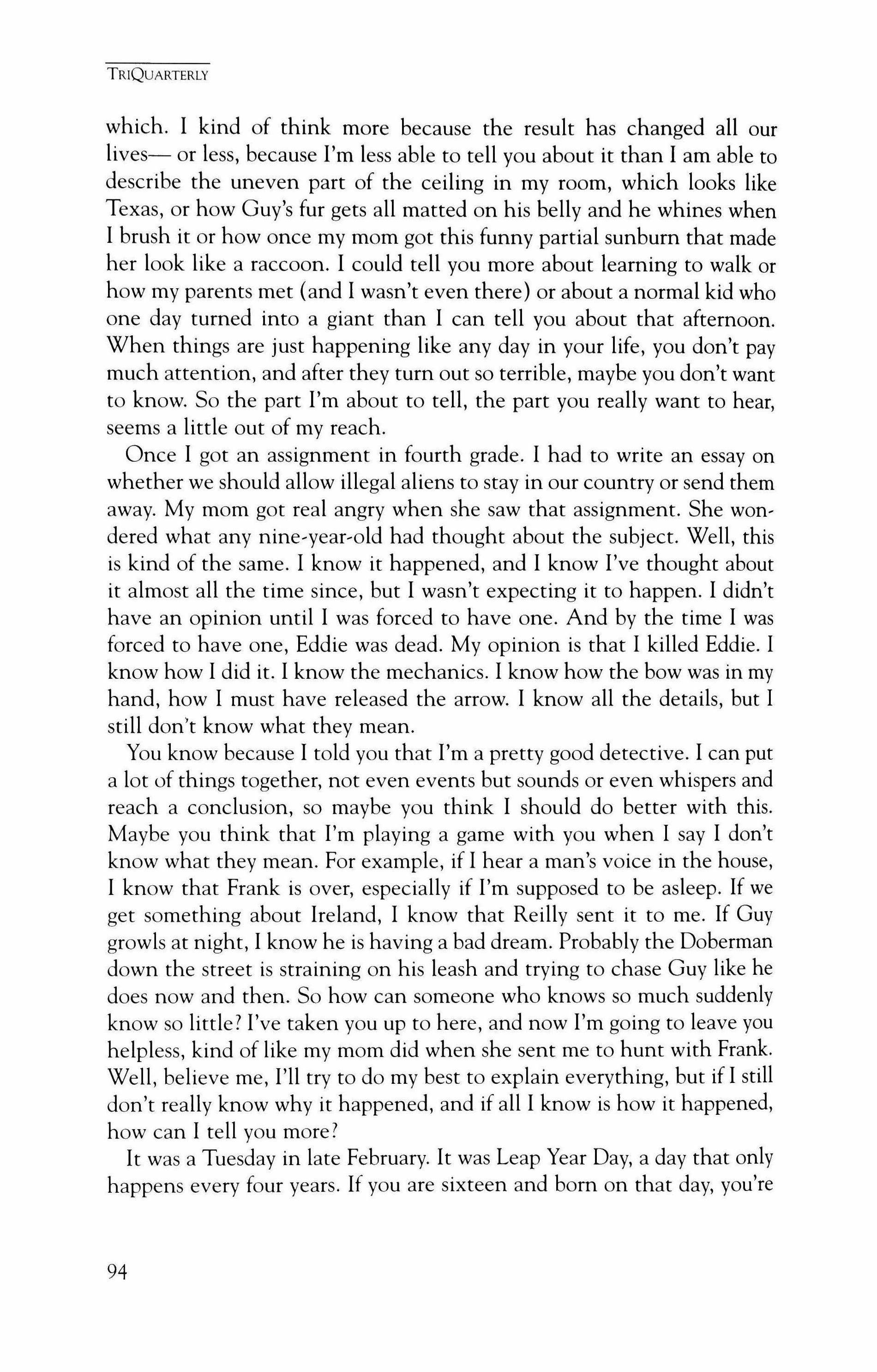
which. I kind of think more because the result has changed all our lives- or less, because I'm less able to tell you about it than I am able to describe the uneven part of the ceiling in my room, which looks like Texas, or how Guy's fur gets all matted on his belly and he whines when I brush it or how once my mom got this funny partial sunburn that made her look like a raccoon. I could tell you more about learning to walk or how my parents met {and I wasn't even there} or about a normal kid who one day turned into a giant than I can tell you about that afternoon. When things are just happening like any day in your life, you don't pay much attention, and after they turn out so terrible, maybe you don't want to know. So the part I'm about to tell, the part you really want to hear, seems a little out of my reach.
Once I got an assignment in fourth grade. I had to write an essay on whether we should allow illegal aliens to stay in our country or send them away. My mom got real angry when she saw that assignment. She wondered what any nine-year-old had thought about the subject. Well, this is kind of the same. I know it happened, and I know I've thought about it almost all the time since, but I wasn't expecting it to happen. I didn't have an opinion until I was forced to have one. And by the time I was forced to have one, Eddie was dead. My opinion is that I killed Eddie. I know how I did it. I know the mechanics. I know how the bow was in my hand, how I must have released the arrow. I know all the details, but I still don't know what they mean.
You know because I told you that I'm a pretty good detective. I can put a lot of things together, not even events but sounds or even whispers and reach a conclusion, so maybe you think I should do better with this. Maybe you think that I'm playing a game with you when I say I don't know what they mean. For example, if I hear a man's voice in the house, I know that Frank is over, especially if I'm supposed to be asleep. If we get something about Ireland, I know that Reilly sent it to me. If Guy growls at night, I know he is having a bad dream. Probably the Doberman down the street is straining on his leash and trying to chase Guy like he does now and then. So how can someone who knows so much suddenly know so little? I've taken you up to here, and now I'm going to leave you helpless, kind of like my mom did when she sent me to hunt with Frank. Well, believe me, I'll try to do my best to explain everything, but if I still don't really know why it happened, and if all I know is how it happened, how can I tell you more?
It was a Tuesday in late February. It was Leap Year Day, a day that only happens every four years. If you are sixteen and born on that day, you're
TRIQUARTERLY
94
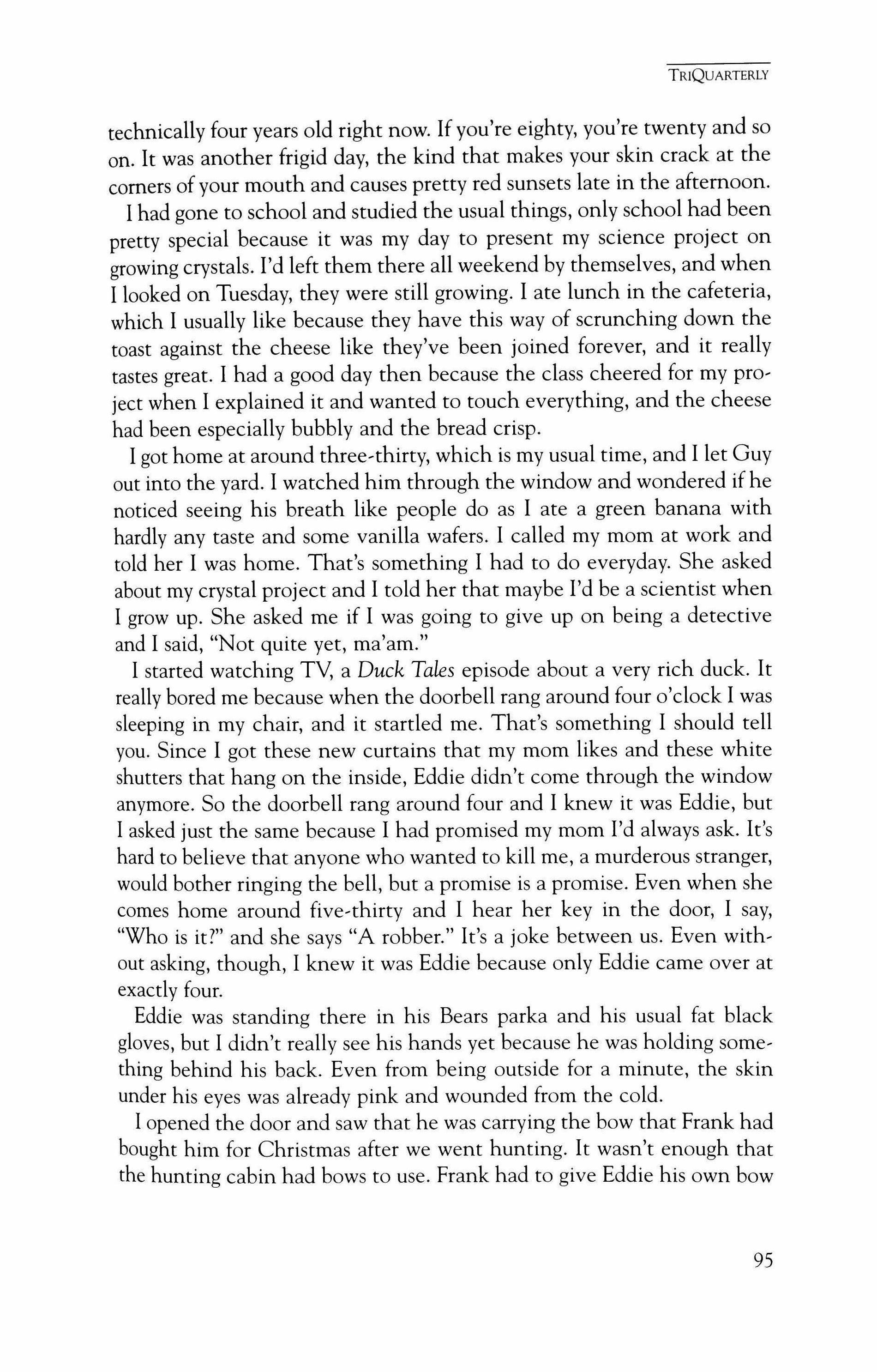
technically four years old right now. If you're eighty, you're twenty and so on. It was another frigid day, the kind that makes your skin crack at the comers of your mouth and causes pretty red sunsets late in the afternoon. I had gone to school and studied the usual things, only school had been pretty special because it was my day to present my science project on growing crystals. I'd left them there all weekend by themselves, and when I looked on Tuesday, they were still growing. I ate lunch in the cafeteria, which I usually like because they have this way of scrunching down the toast against the cheese like they've been joined forever, and it really tastes great. I had a good day then because the class cheered for my project when I explained it and wanted to touch everything, and the cheese had been especially bubbly and the bread crisp.
I got home at around three-thirty, which is my usual time, and I let Guy out into the yard. I watched him through the window and wondered if he noticed seeing his breath like people do as I ate a green banana with hardly any taste and some vanilla wafers. I called my mom at work and told her I was home. That's something I had to do everyday. She asked about my crystal project and I told her that maybe I'd be a scientist when I grow up. She asked me if I was going to give up on being a detective and I said, "Not quite yet, ma'am."
I started watching TV, a Duck Tales episode about a very rich duck. It really bored me because when the doorbell rang around four 0'clock I was sleeping in my chair, and it startled me. That's something I should tell you. Since I got these new curtains that my mom likes and these white shutters that hang on the inside, Eddie didn't come through the window anymore. So the doorbell rang around four and I knew it was Eddie, but I asked just the same because I had promised my mom I'd always ask. It's hard to believe that anyone who wanted to kill me, a murderous stranger, would bother ringing the bell, but a promise is a promise. Even when she comes home around five-thirty and I hear her key in the door, I say, "Who is it?" and she says "A robber." It's a joke between us. Even without asking, though, I knew it was Eddie because only Eddie came over at exactly four.
Eddie was standing there in his Bears parka and his usual fat black gloves, but I didn't really see his hands yet because he was holding something behind his back. Even from being outside for a minute, the skin under his eyes was already pink and wounded from the cold.
I opened the door and saw that he was carrying the bow that Frank had bought him for Christmas after we went hunting. It wasn't enough that the hunting cabin had bows to use. Frank had to give Eddie his own bow
TRIQUARTERLY
95
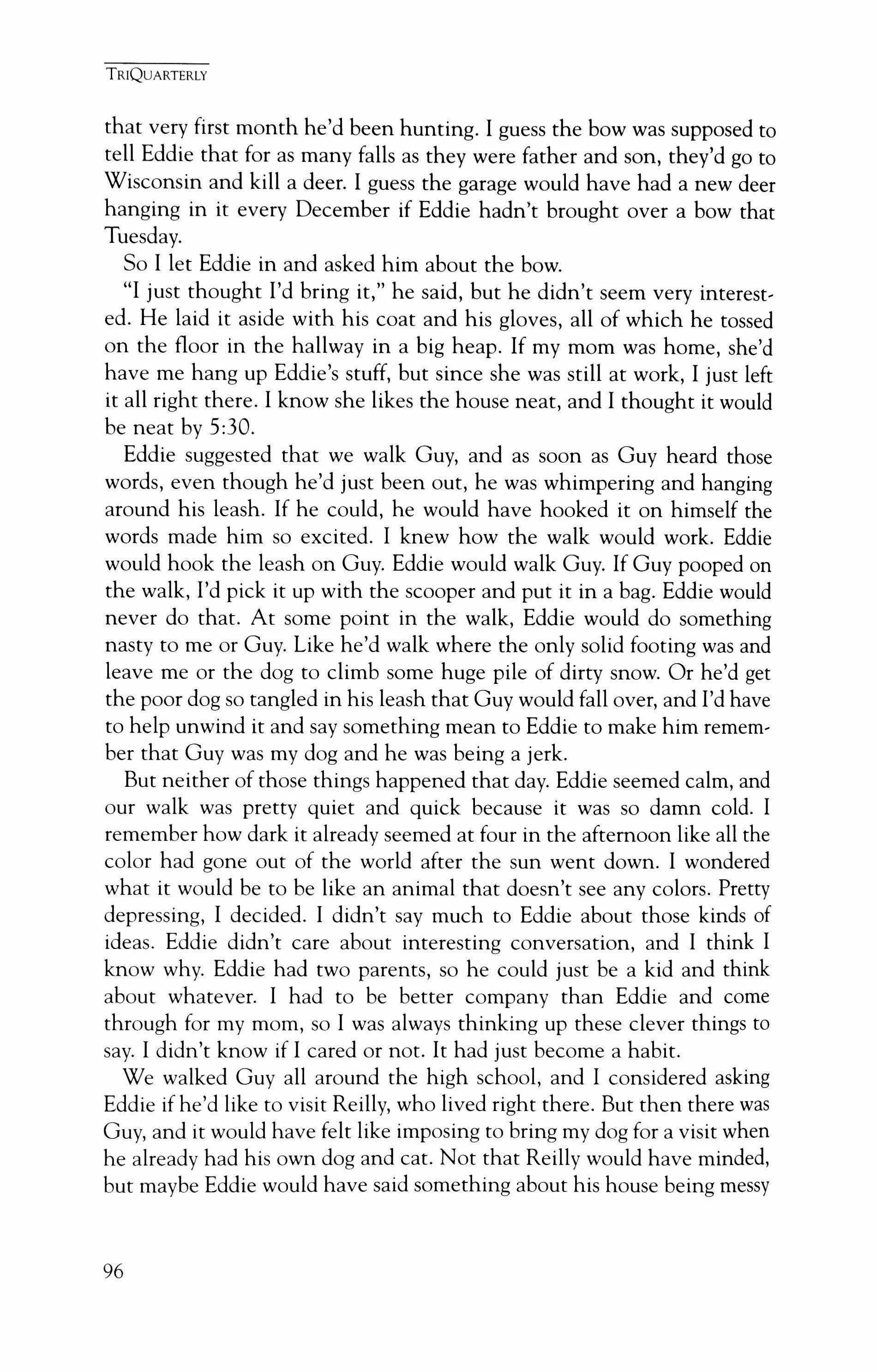
TRIQUARTERLY
that very first month he'd been hunting. I guess the bow was supposed to tell Eddie that for as many falls as they were father and son, they'd go to Wisconsin and kill a deer. I guess the garage would have had a new deer hanging in it every December if Eddie hadn't brought over a bow that Tuesday.
So I let Eddie in and asked him about the bow.
"I just thought I'd bring it," he said, but he didn't seem very interested. He laid it aside with his coat and his gloves, all of which he tossed on the floor in the hallway in a big heap. If my mom was home, she'd have me hang up Eddie's stuff, but since she was still at work, I just left it all right there. I know she likes the house neat, and I thought it would be neat by 5:30.
Eddie suggested that we walk Guy, and as soon as Guy heard those words, even though he'd just been out, he was whimpering and hanging around his leash. If he could, he would have hooked it on himself the words made him so excited. I knew how the walk would work. Eddie would hook the leash on Guy. Eddie would walk Guy. If Guy pooped on the walk, I'd pick it up with the scooper and put it in a bag. Eddie would never do that. At some point in the walk, Eddie would do something nasty to me or Guy. Like he'd walk where the only solid footing was and leave me or the dog to climb some huge pile of dirty snow. Or he'd get the poor dog so tangled in his leash that Guy would fall over, and I'd have to help unwind it and say something mean to Eddie to make him remember that Guy was my dog and he was being a jerk.
But neither of those things happened that day. Eddie seemed calm, and our walk was pretty quiet and quick because it was so damn cold. I remember how dark it already seemed at four in the afternoon like all the color had gone out of the world after the sun went down. I wondered what it would be to be like an animal that doesn't see any colors. Pretty depressing, I decided. I didn't say much to Eddie about those kinds of ideas. Eddie didn't care about interesting conversation, and I think I know why. Eddie had two parents, so he could just be a kid and think about whatever. I had to be better company than Eddie and come through for my mom, so I was always thinking up these clever things to say. I didn't know if I cared or not. It had just become a habit.
We walked Guy all around the high school, and I considered asking Eddie if he'd like to visit Reilly, who lived right there. But then there was Guy, and it would have felt like imposing to bring my dog for a visit when he already had his own dog and cat. Not that Reilly would have minded, but maybe Eddie would have said something about his house being messy
96
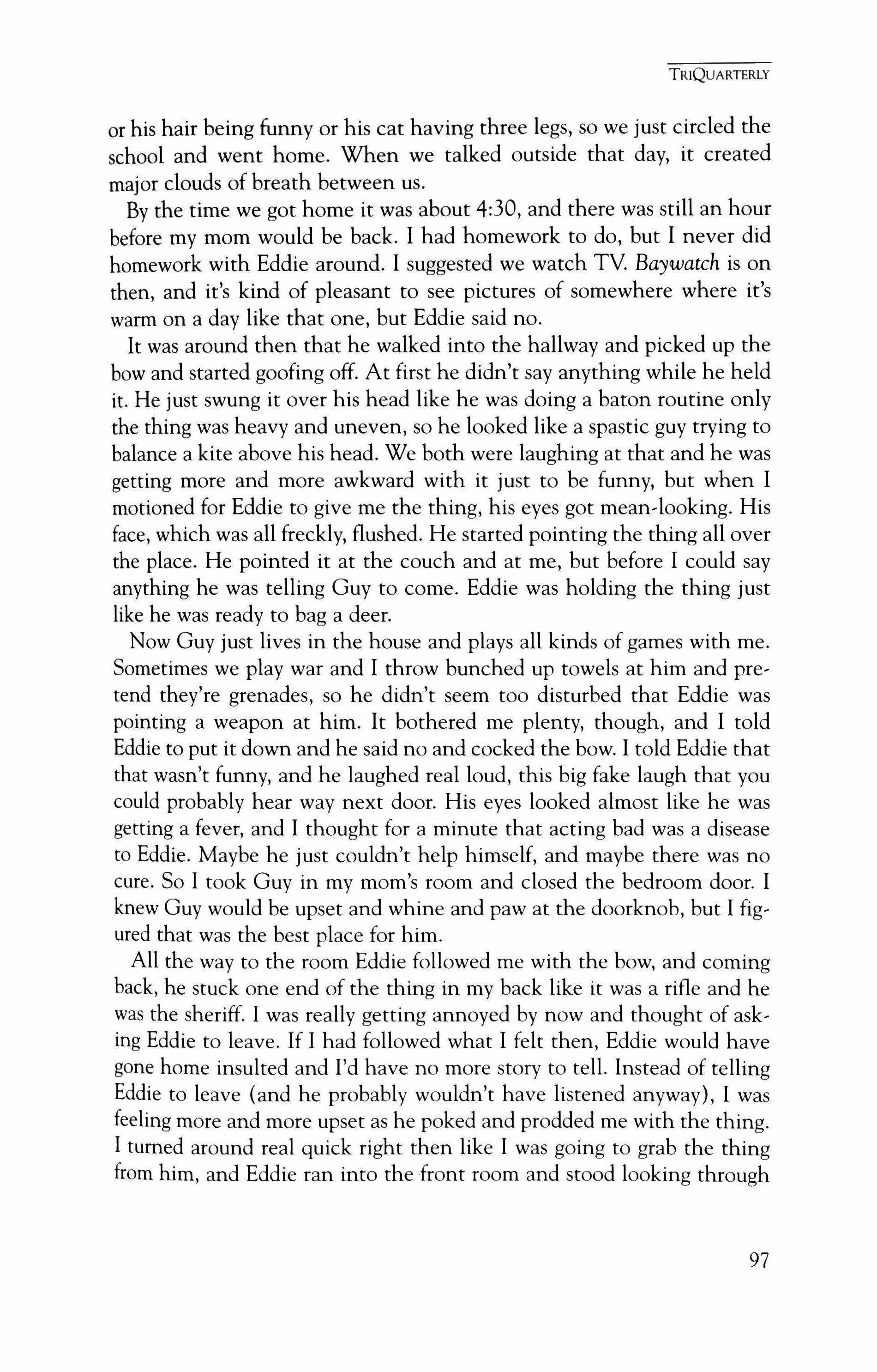
or his hair being funny or his cat having three legs, so we just circled the school and went home. When we talked outside that day, it created major clouds of breath between us.
By the time we got home it was about 4:30, and there was still an hour before my mom would be back. I had homework to do, but I never did homework with Eddie around. I suggested we watch TV. Baywatch is on then, and it's kind of pleasant to see pictures of somewhere where it's warm on a day like that one, but Eddie said no.
It was around then that he walked into the hallway and picked up the bow and started goofing off. At first he didn't say anything while he held it. He just swung it over his head like he was doing a baton routine only the thing was heavy and uneven, so he looked like a spastic guy trying to balance a kite above his head. We both were laughing at that and he was getting more and more awkward with it just to be funny, but when I motioned for Eddie to give me the thing, his eyes got mean-looking. His face, which was all freckly, flushed. He started pointing the thing all over the place. He pointed it at the couch and at me, but before I could say anything he was telling Guy to come. Eddie was holding the thing just like he was ready to bag a deer.
Now Guy just lives in the house and plays all kinds of games with me. Sometimes we play war and I throw bunched up towels at him and pretend they're grenades, so he didn't seem too disturbed that Eddie was pointing a weapon at him. It bothered me plenty, though, and I told Eddie to put it down and he said no and cocked the bow. I told Eddie that that wasn't funny, and he laughed real loud, this big fake laugh that you could probably hear way next door. His eyes looked almost like he was getting a fever, and I thought for a minute that acting bad was a disease to Eddie. Maybe he just couldn't help himself, and maybe there was no cure. So I took Guy in my mom's room and closed the bedroom door. I knew Guy would be upset and whine and paw at the doorknob, but I figured that was the best place for him.
All the way to the room Eddie followed me with the bow, and coming back, he stuck one end of the thing in my back like it was a rifle and he was the sheriff. I was really getting annoyed by now and thought of asking Eddie to leave. If I had followed what I felt then, Eddie would have gone home insulted and I'd have no more story to tell. Instead of telling Eddie to leave {and he probably wouldn't have listened anyway}, I was feeling more and more upset as he poked and prodded me with the thing. I turned around real quick right then like I was going to grab the thing from him, and Eddie ran into the front room and stood looking through
TRIQUARTERLY
97
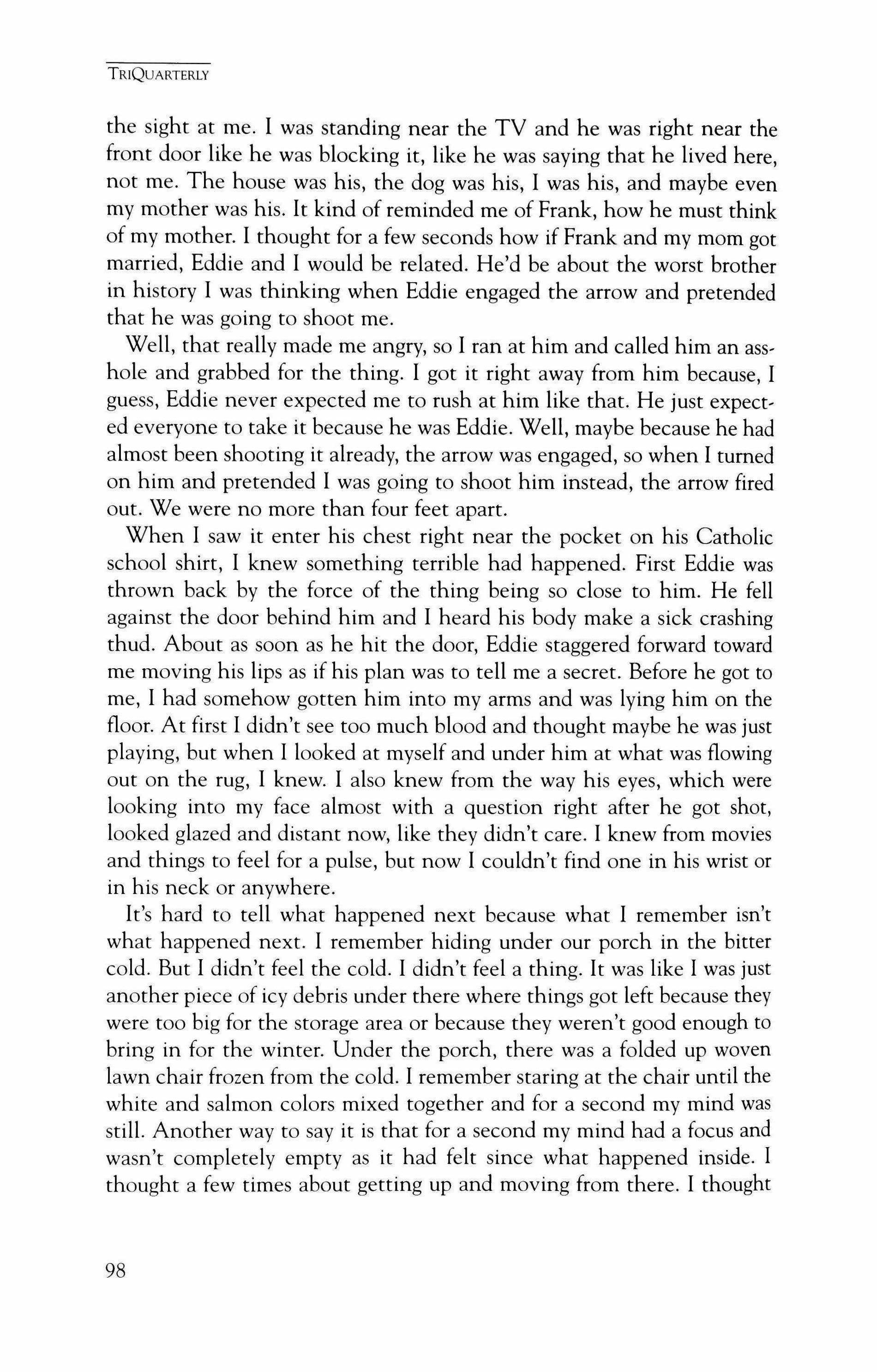
the sight at me. I was standing near the TV and he was right near the front door like he was blocking it, like he was saying that he lived here, not me. The house was his, the dog was his, I was his, and maybe even my mother was his. It kind of reminded me of Frank, how he must think of my mother. I thought for a few seconds how if Frank and my mom got married, Eddie and I would be related. He'd be about the worst brother in history I was thinking when Eddie engaged the arrow and pretended that he was going to shoot me.
Well, that really made me angry, so I ran at him and called him an asshole and grabbed for the thing. I got it right away from him because, I guess, Eddie never expected me to rush at him like that. He just expected everyone to take it because he was Eddie. Well, maybe because he had almost been shooting it already, the arrow was engaged, so when I turned on him and pretended I was going to shoot him instead, the arrow fired out. We were no more than four feet apart.
When I saw it enter his chest right near the pocket on his Catholic school shirt, I knew something terrible had happened. First Eddie was thrown back by the force of the thing being so close to him. He fell against the door behind him and I heard his body make a sick crashing thud. About as soon as he hit the door, Eddie staggered forward toward me moving his lips as if his plan was to tell me a secret. Before he got to me, I had somehow gotten him into my arms and was lying him on the floor. At first I didn't see too much blood and thought maybe he was just playing, but when I looked at myself and under him at what was flowing out on the rug, I knew. I also knew from the way his eyes, which were looking into my face almost with a question right after he got shot, looked glazed and distant now, like they didn't care. I knew from movies and things to feel for a pulse, but now I couldn't find one in his wrist or in his neck or anywhere.
It's hard to tell what happened next because what I remember isn't what happened next. I remember hiding under our porch in the bitter cold. But I didn't feel the cold. I didn't feel a thing. It was like I was just another piece of icy debris under there where things got left because they were too big for the storage area or because they weren't good enough to bring in for the winter. Under the porch, there was a folded up woven lawn chair frozen from the cold. I remember staring at the chair until the white and salmon colors mixed together and for a second my mind was still. Another way to say it is that for a second my mind had a focus and wasn't completely empty as it had felt since what happened inside. I thought a few times about getting up and moving from there. I thought
TRIQUARTERLY
98
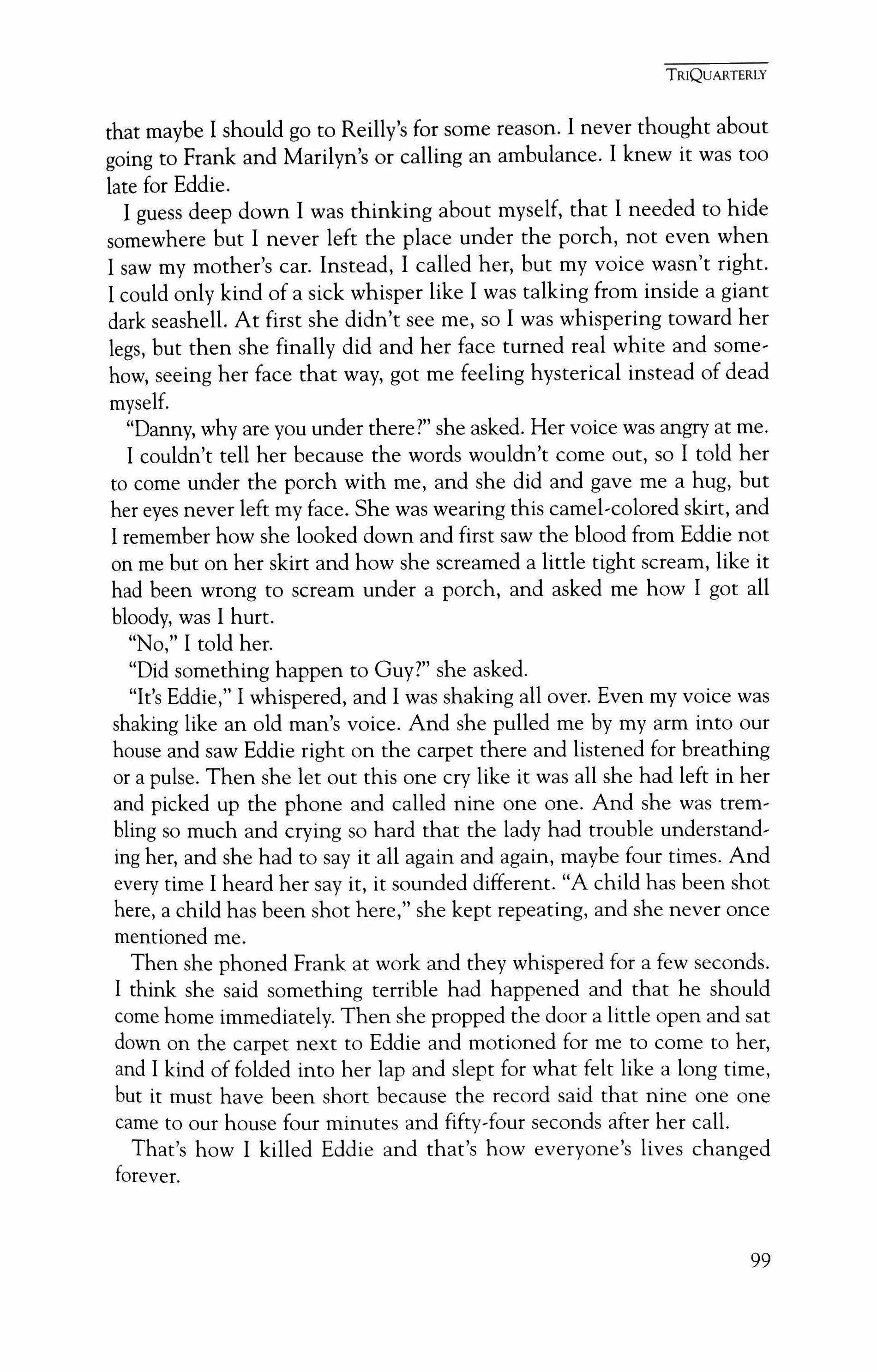
that maybe I should go to Reilly's for some reason. I never thought about going to Frank and Marilyn's or calling an ambulance. I knew it was too late for Eddie.
I guess deep down I was thinking about myself, that I needed to hide somewhere but I never left the place under the porch, not even when I saw my mother's car. Instead, I called her, but my voice wasn't right. I could only kind of a sick whisper like I was talking from inside a giant dark seashell. At first she didn't see me, so I was whispering toward her legs, but then she finally did and her face turned real white and somehow, seeing her face that way, got me feeling hysterical instead of dead myself.
"Danny, why are you under there?" she asked. Her voice was angry at me. I couldn't tell her because the words wouldn't come out, so I told her to come under the porch with me, and she did and gave me a hug, but her eyes never left my face. She was wearing this camel-colored skirt, and I remember how she looked down and first saw the blood from Eddie not on me but on her skirt and how she screamed a little tight scream, like it had been wrong to scream under a porch, and asked me how I got all bloody, was I hurt.
"No," I told her.
"Did something happen to Guy?" she asked.
"It's Eddie," I whispered, and I was shaking all over. Even my voice was shaking like an old man's voice. And she pulled me by my arm into our house and saw Eddie right on the carpet there and listened for breathing or a pulse. Then she let out this one cry like it was all she had left in her and picked up the phone and called nine one one. And she was trembling so much and crying so hard that the lady had trouble understanding her, and she had to say it all again and again, maybe four times. And every time I heard her say it, it sounded different. "A child has been shot here, a child has been shot here," she kept repeating, and she never once mentioned me.
Then she phoned Frank at work and they whispered for a few seconds. I think she said something terrible had happened and that he should come home immediately. Then she propped the door a little open and sat down on the carpet next to Eddie and motioned for me to come to her, and I kind of folded into her lap and slept for what felt like a long time, but it must have been short because the record said that nine one one came to our house four minutes and fifty-four seconds after her call.
That's how I killed Eddie and that's how everyone's lives changed forever.
TRIQUARTERLY
99
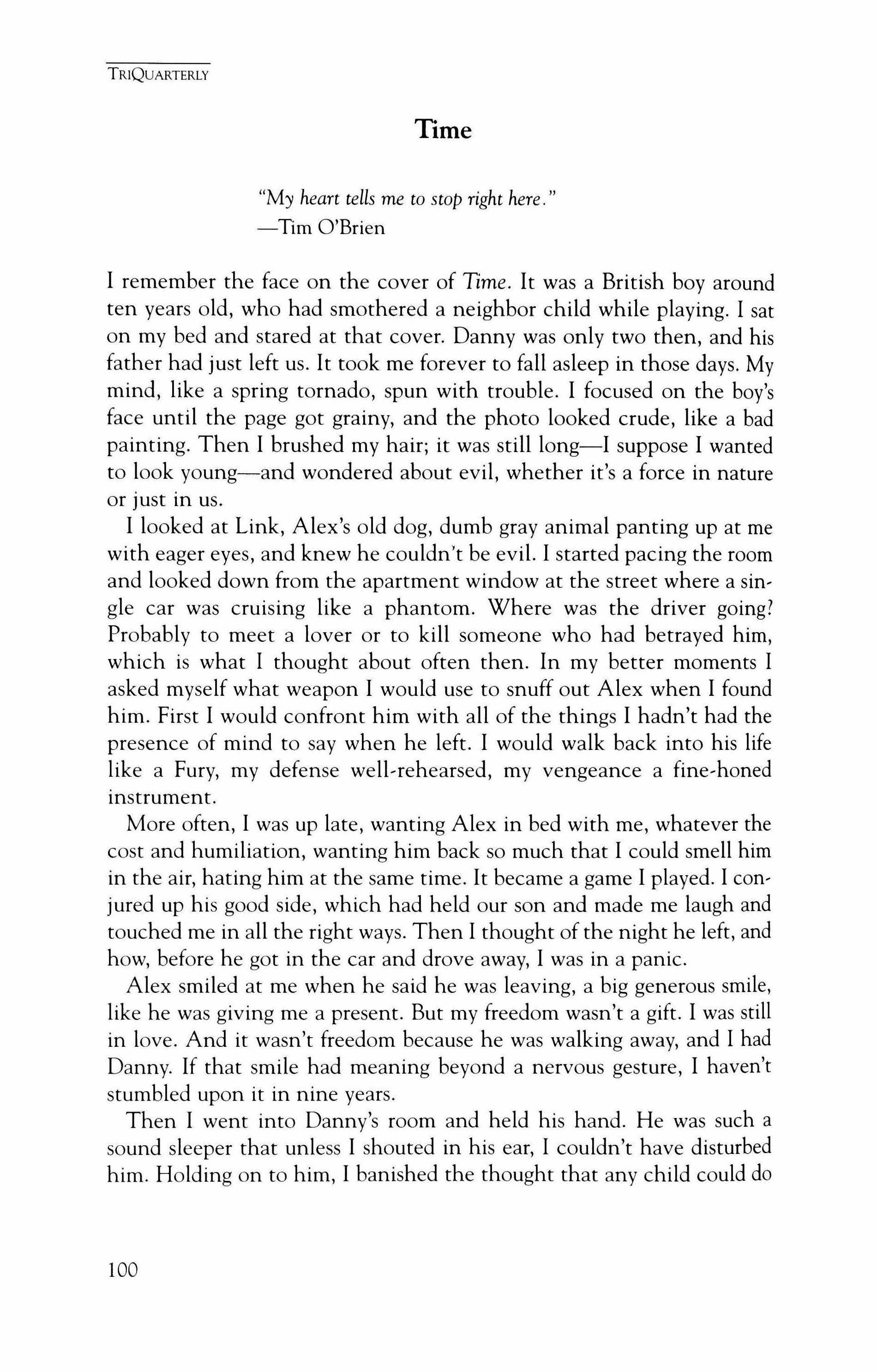
Time
"My heart tells me to stop right here.
-Tim O'Brien
I remember the face on the cover of Time. It was a British boy around ten years old, who had smothered a neighbor child while playing. I sat on my bed and stared at that cover. Danny was only two then, and his father had just left us. It took me forever to fall asleep in those days. My mind, like a spring tornado, spun with trouble. I focused on the boy's face until the page got grainy, and the photo looked crude, like a bad painting. Then I brushed my hair; it was still long-I suppose I wanted to look young-and wondered about evil, whether it's a force in nature or just in us.
I looked at Link, Alex's old dog, dumb gray animal panting up at me with eager eyes, and knew he couldn't be evil. I started pacing the room and looked down from the apartment window at the street where a single car was cruising like a phantom. Where was the driver going? Probably to meet a lover or to kill someone who had betrayed him, which is what I thought about often then. In my better moments I asked myself what weapon I would use to snuff out Alex when I found him. First I would confront him with all of the things I hadn't had the presence of mind to say when he left. I would walk back into his life like a Fury, my defense well-rehearsed, my vengeance a fine-honed instrument.
More often, I was up late, wanting Alex in bed with me, whatever the cost and humiliation, wanting him back so much that I could smell him in the air, hating him at the same time. It became a game I played. I conjured up his good side, which had held our son and made me laugh and touched me in all the right ways. Then I thought of the night he left, and how, before he got in the car and drove away, I was in a panic.
Alex smiled at me when he said he was leaving, a big generous smile, like he was giving me a present. But my freedom wasn't a gift. I was still in love. And it wasn't freedom because he was walking away, and I had Danny. If that smile had meaning beyond a nervous gesture, I haven't stumbled upon it in nine years.
Then I went into Danny's room and held his hand. He was such a sound sleeper that unless I shouted in his ear, I couldn't have disturbed him. Holding on to him, I banished the thought that any child could do 100
TRIQUARTERLY
such a terrible thing. I wouldn't allow it to enter my mind or to occupy Danny's room with its shiny yellow walls and tulip-faced trim. When I went back to my bedroom, I threw the magazine away just like that. Now that I'm looking for answers about Danny, I wish that I had saved it.
Slogans
I see cars all time with the slogan, "Guns don't kill, people do." I see cars all the time with the slogan, "When guns are outlawed, only outlaws will have guns." I see cars all the time with the slogan, "Shit happens," "Practice acts of random kindness," "Save the Whales." I want a bumper sticker that says "Save Danny." I need to understand, though, how it happened that I need to save him, how my son, a normal, twelve-yearold child, became newsworthy, how Frank Nova aided and abetted my son in this process, how a compound bow is fired, how it will feel if I lose Danny forever.
Sometimes I think being locked up with him would be the best solution. We could be sent away together somewhere safe. I'd still be able to take care of him then, and I could spend all the rest of my time figuring this out. What will Danny do in this new place, which I imagine to be Montana, woodsy and isolated, somewhere a boy can't meet other people and cause trouble? Watch TV, play video games, build model gliders, collect baseball cards, tell lame jokes that I pretend are funny, all the things he's always done: Until we met the Novas and our lives changed, first for the better and then for the worse.
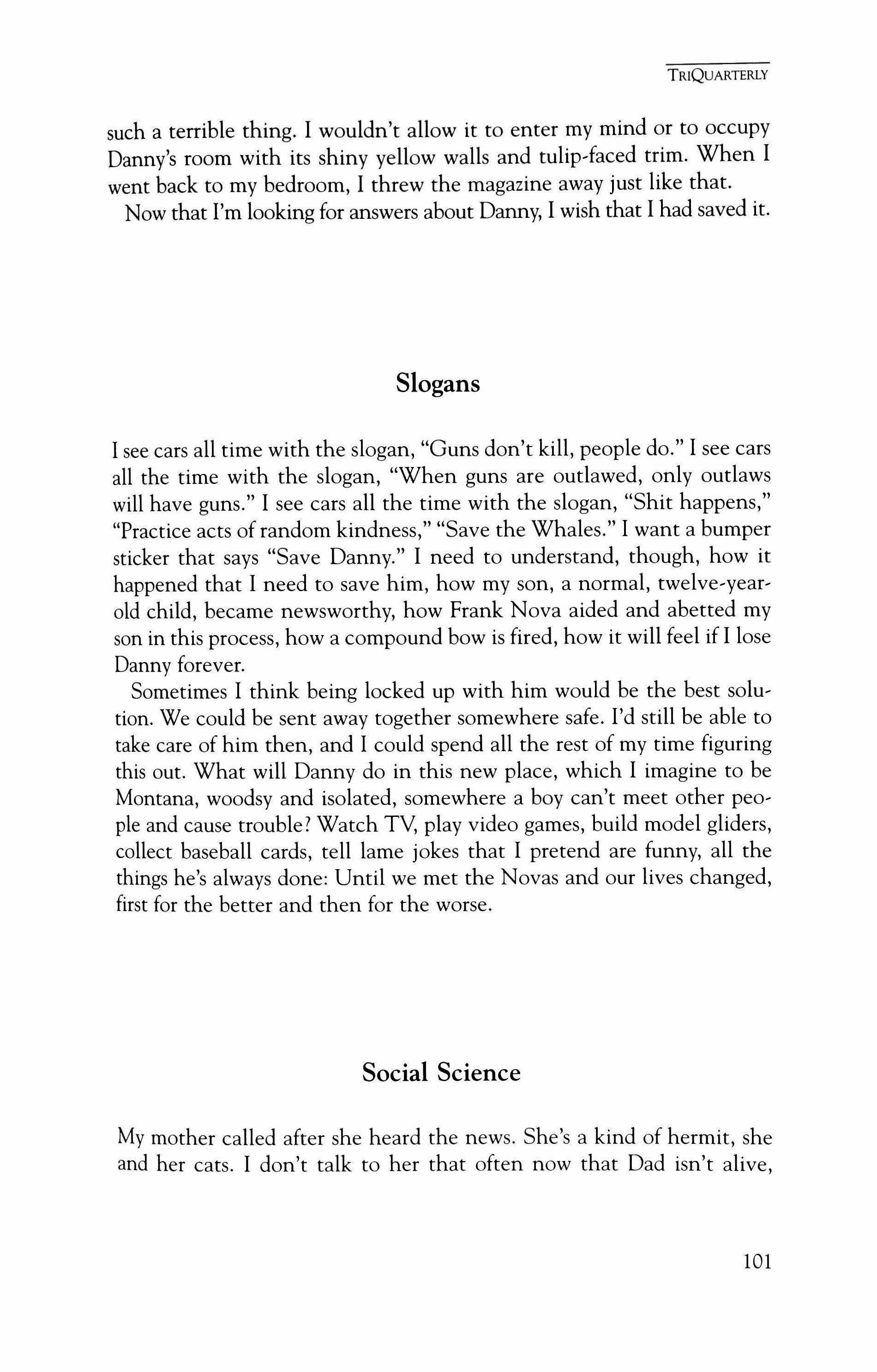
Social Science
My mother called after she heard the news. She's a kind of hermit, she and her cats. I don't talk to her that often now that Dad isn't alive, 101
TRIQUARTERLY

which might make her feel inhibited with me. Instead, it makes her more frank, like our estrangement is a way for her to leverage power when we do speak.
"I can understand those children at Cabrini-Green," she said, "doing things like this. They throw each other out ofwindows everyday." Her voice was calm and low. I could see her in her house dress, coffee at the ready, a cloud of cats billowing around her ankles. "I can see why a child who has nothing, no love at all, goes out and harms another child. But Danny?"
I could only be silent, and my silence provided another window for my mother, who can jimmy any psychological lock. Knowing my mother's power to be fierce makes me believe in all those determined lady detectives that fiction is handing us lately.
"What did you do to him?" she asks flatly.
"Nothing. I love him, Mother."
"Did you sleep around? Did men visit you?"
"I had dates now and then, but nothing too serious." I wasn't going to try and explain Frank Nova and me to my mother.
"There's always motivation, Nancy. Things make sense."
"Well, this breaks all the rules, Mom."
"Was he jealous of the other child?"
"Eddie was his friend. They were as close as brothers."
Then we didn't speak. She was probably pursing her lips and waiting for me to admit something. Give her some evidence; she'll grip it, jaws locked. While she waited for me to offer a guilty clue, the kitchen filled with the sound of order that entered from the outside. It was Tuesday, and the streets were being swept. A giant whooshing engulfed the room. Sad music oozed from a window across the street.
"I've learned a lot from my cats, Nancy," her voice interrupted. "I can give you two examples. One cat I had, Chloe, the white one-you remember her maybe-was an only child. She was a crazy nervous little thing, afraid of her own shadow. And when she got too frightened, she'd sink her teeth into things. When we moved and Dad went to pick her up, she gave your father's hand a real good bite. Remember that?"
"I do."
"Well, I say it was being an only child."
More silence from me. No clues.
"The other possibility," she continued, undaunted by my silence, "is hardship. George, my new cat- you haven't met him- was a stray. He's the best hunter I've ever seen. Without claws he can pick birds right out of the trees."
TRIQUARTERLY
102
"Amazing," I say flatly.
"We do what we need to survive."
"People aren't cats, Mother."
"I'm just saying that there was some need in Danny, some hole he had to fill."
"I still think he was playing. I say that without the bow, Eddie would be alive. This nightmare wouldn't be. I believe what he's told me. Why can't yOU?"
I think she said, "Wishful thinking, Nancy," before I hung up on her for the first time in thirty-eight years.
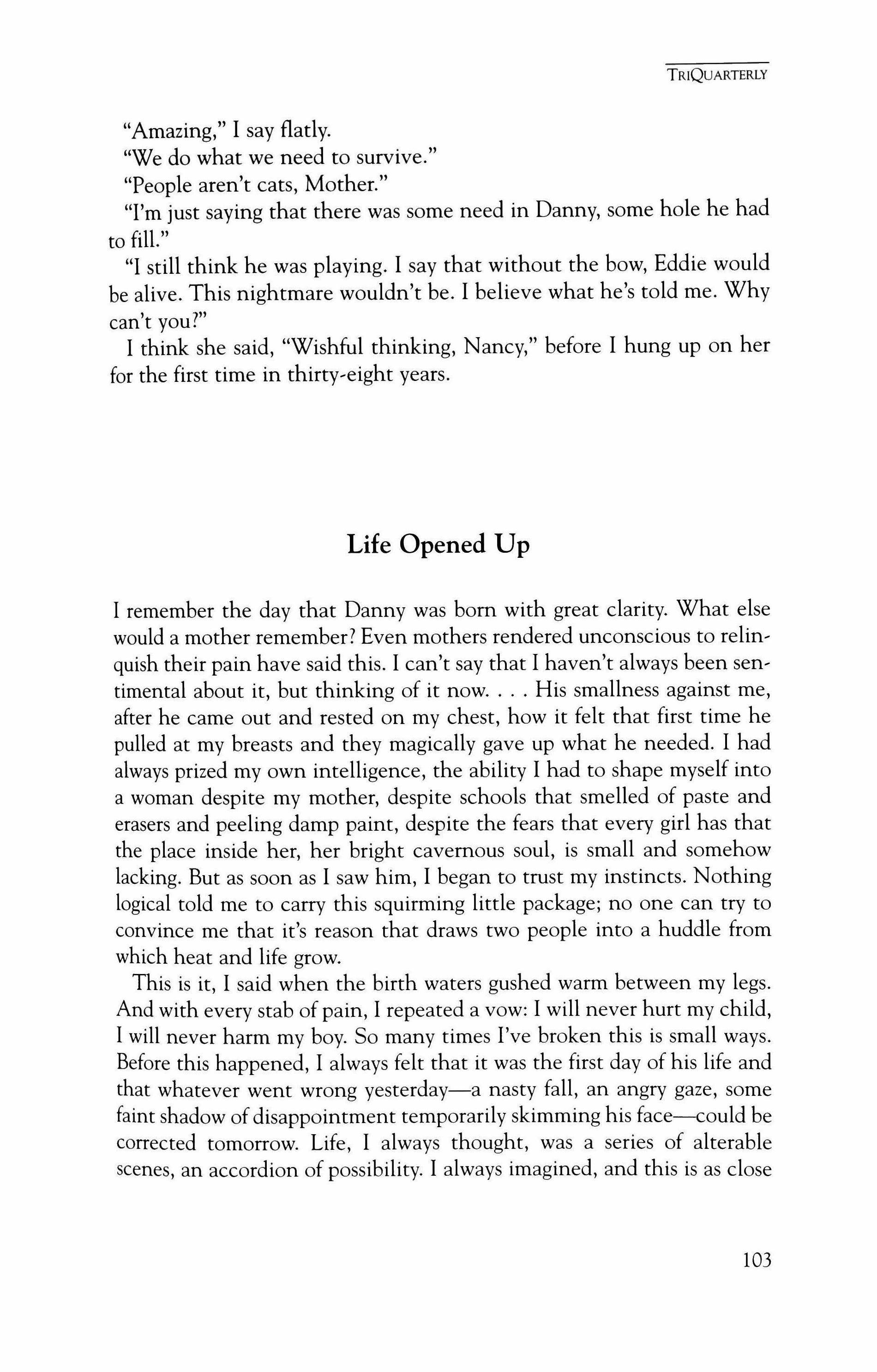
Life Opened Up
I remember the day that Danny was born with great clarity. What else would a mother remember? Even mothers rendered unconscious to relinquish their pain have said this. I can't say that I haven't always been sentimental about it, but thinking of it now His smallness against me, after he came out and rested on my chest, how it felt that first time he pulled at my breasts and they magically gave up what he needed. I had always prized my own intelligence, the ability I had to shape myself into a woman despite my mother, despite schools that smelled of paste and erasers and peeling damp paint, despite the fears that every girl has that the place inside her, her bright cavernous soul, is small and somehow lacking. But as soon as I saw him, I began to trust my instincts. Nothing logical told me to carry this squirming little package; no one can try to convince me that it's reason that draws two people into a huddle from which heat and life grow.
This is it, I said when the birth waters gushed warm between my legs. And with every stab of pain, I repeated a vow: I will never hurt my child, I will never harm my boy. So many times I've broken this is small ways. Before this happened, I always felt that it was the first day of his life and that whatever went wrong yesterday-a nasty fall, an angry gaze, some faint shadow ofdisappointment temporarily skimming his face-could be corrected tomorrow. Life, I always thought, was a series of alterable scenes, an accordion of possibility. I always imagined, and this is as close
TRIQUARTERLY
103

to religion as I ever got, that what connects us, what holds us all to this world is the river that flows from the moment that a life begins. The worst thing is losing that hope.
Solitude
With Danny away at the boy's facility for now, I'm alone for the first time since he was born. At work, I used to imagine what I'd do with any free time I might someday have. I saw myselfgetting pampered. I'd get a massage, a spa pedicure, meet Carol for lunch at a ferny place in a mall, buy some colored lights, those wispy Italian ones for the shaking trees outside the house. I could have done most of these things with Danny, of course, but it would have been different if I were alone, like I'm Mary Tyler Moore, and someone's making a movie of me just for my winning smile and positive attitude.
I'd see films everyday. I'd go to the bargain matinee and get the tallest coke and the largest popcorn-with butter- and have it all to myself. I would sit up close, four rows back, right in the middle, and put my feet up, not worried about the example I was setting. I'd see all kinds of movies: foreign films, student films, animation festivals, sneak previews. Not just my usual fare, the ones about women in trouble or in love or in both.
Now that I'm alone, I go to work. I don't get massaged, pedicured, buy lights, see movies, or even talk much to Carol. I do my eight hours and come home. And then I call Danny and we talk, mostly small talk. His voice is so tiny that it frightens me. The Boy Who Disappeared I title the play that we're starring in, despite ourselves.
I sit at the kitchen table and stare at the cabinets until their handles give offthe sheen of a drug-induced dream. I don't blink, and my eyes grow tired. I clear my mind except for one thought: Danny killed Eddie Nova. Sometimes I frame it in a thick black border. Sometimes I see it in red italics, the typography of emotion. The actual 20 letters: 9 vowels, 11 consonants, 3 capital letters, 3 spaces. Seven syllables. The truth about my life, my son's life. A marquee, a headline, a pain so deep that I fall asleep with my head on a stack ofmail and wake up with envelope creases on my cheek.
Do I cry? Every night. In the shower. On the phone with Carol.
Do I cry? Never at work.
TRIQUARTERLY
104
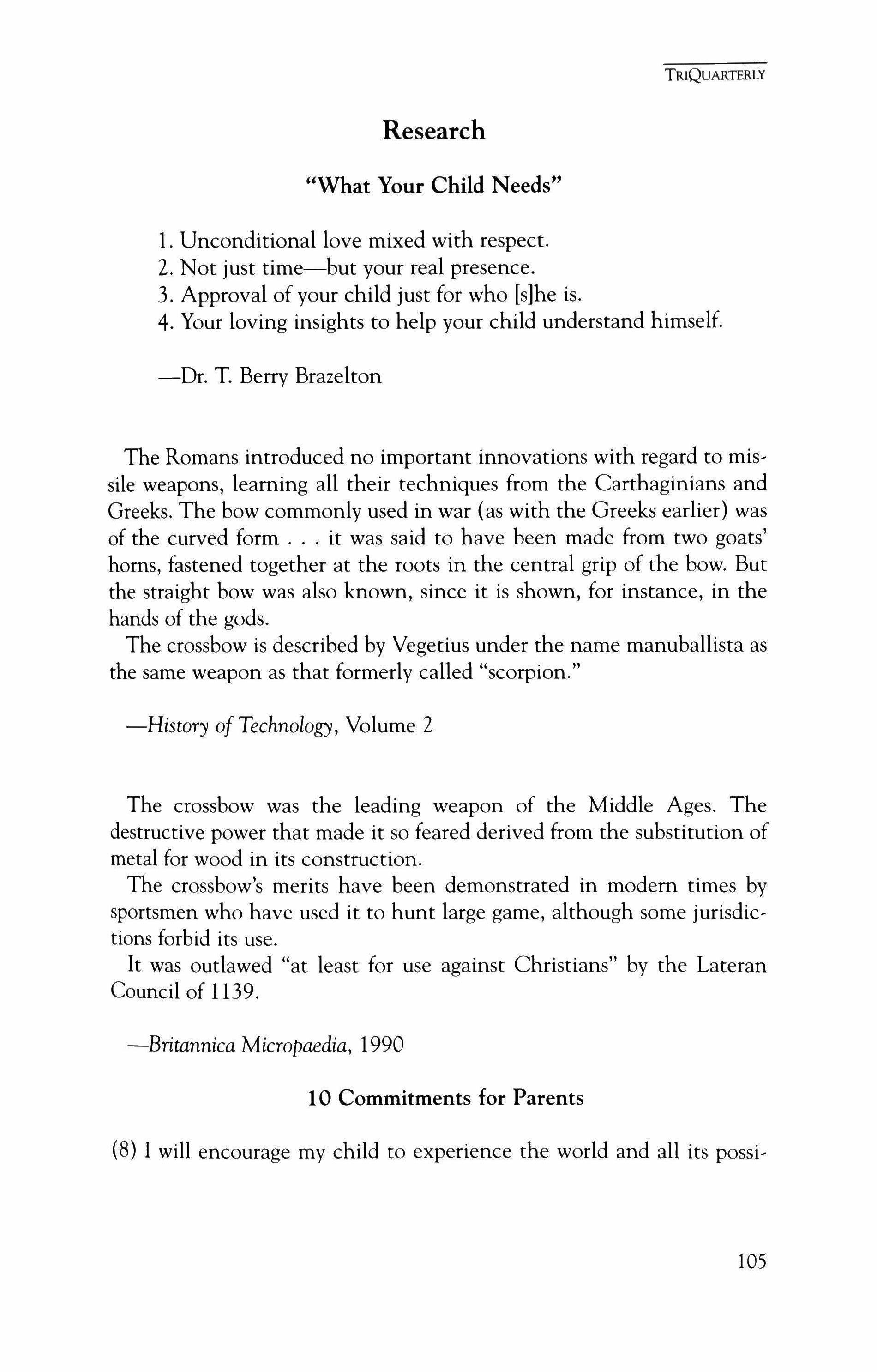
Research
"What Your Child Needs"
1. Unconditional love mixed with respect.
2. Not just time-but your real presence.
3. Approval of your child just for who [s]he is.
4. Your loving insights to help your child understand himself.
-Dr. T. Berry Brazelton
The Romans introduced no important innovations with regard to missile weapons, learning all their techniques from the Carthaginians and Greeks. The bow commonly used in war (as with the Greeks earlier) was of the curved form it was said to have been made from two goats' horns, fastened together at the roots in the central grip of the bow. But the straight bow was also known, since it is shown, for instance, in the hands of the gods.
The crossbow is described by Vegetius under the name manuballista as the same weapon as that formerly called "scorpion."
-History of Technology, Volume 2
The crossbow was the leading weapon of the Middle Ages. The destructive power that made it so feared derived from the substitution of metal for wood in its construction.
The crossbow's merits have been demonstrated in modem times by sportsmen who have used it to hunt large game, although some jurisdictions forbid its use.
It was outlawed "at least for use against Christians" by the Lateran Council of 1139.
-Britannica Micropaedia, 1990
10 Commitments for Parents
(8) I will encourage my child to experience the world and all its possi-
TRIQUARTERLY
105
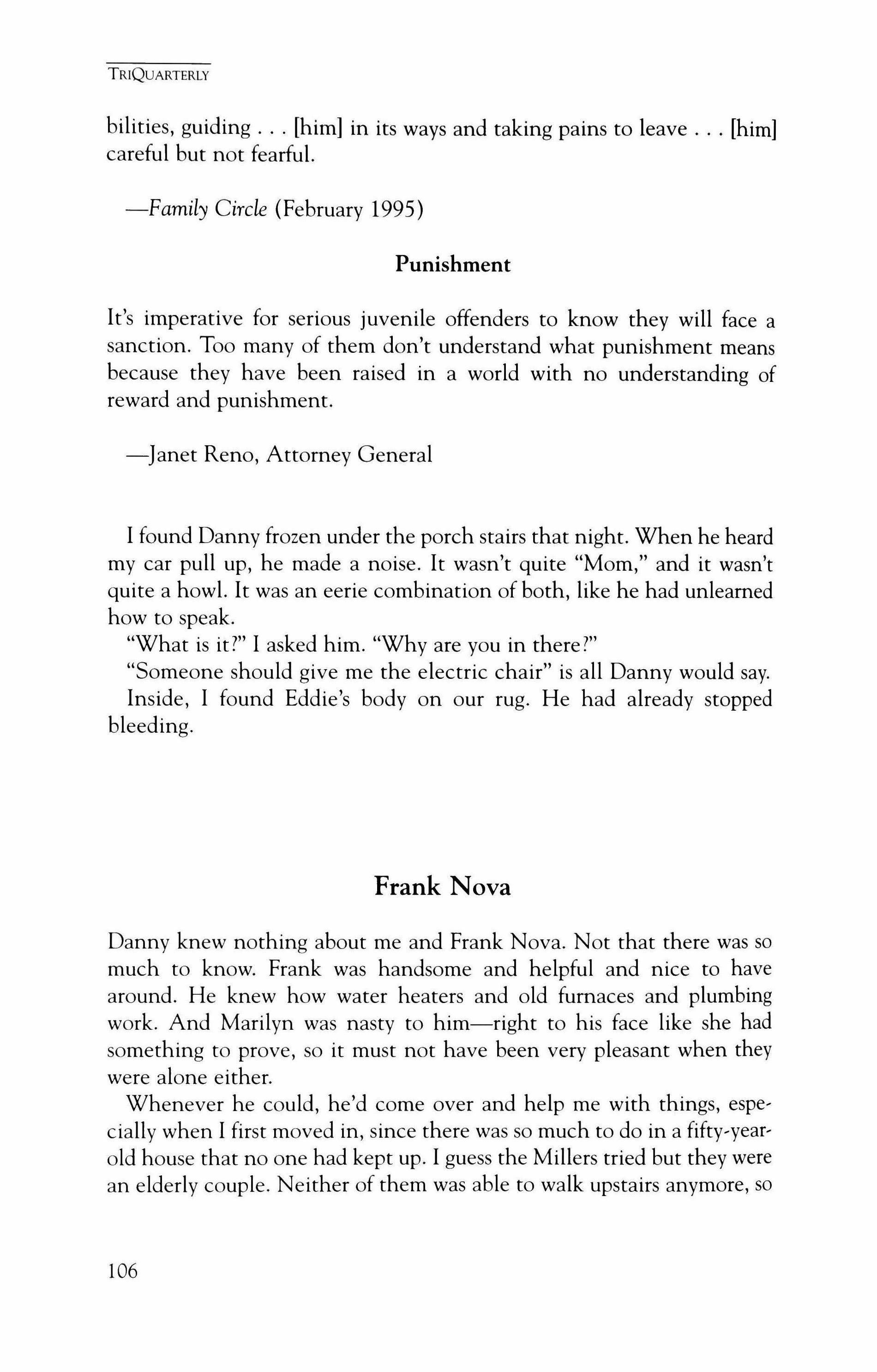
bilities, guiding [him] in its ways and taking pains to leave [him] careful but not fearful.
-Family Circle (February 1995)
Punishment
It's imperative for serious juvenile offenders to know they will face a sanction. Too many of them don't understand what punishment means because they have been raised in a world with no understanding of reward and punishment.
-Janet Reno, Attorney General
I found Danny frozen under the porch stairs that night. When he heard my car pull up, he made a noise. It wasn't quite "Mom," and it wasn't quite a howl. It was an eerie combination of both, like he had unlearned how to speak.
"What is it?" I asked him. "Why are you in there?"
"Someone should give me the electric chair" is all Danny would say. Inside, I found Eddie's body on our rug. He had already stopped bleeding.
Frank Nova
Danny knew nothing about me and Frank Nova. Not that there was so much to know. Frank was handsome and helpful and nice to have around. He knew how water heaters and old furnaces and plumbing work. And Marilyn was nasty to him-right to his face like she had something to prove, so it must not have been very pleasant when they were alone either.
Whenever he could, he'd come over and help me with things, especially when I first moved in, since there was so much to do in a fifty-yearold house that no one had kept up. I guess the Millers tried but they were an elderly couple. Neither of them was able to walk upstairs anymore, so
TRIQUARTERLY
106
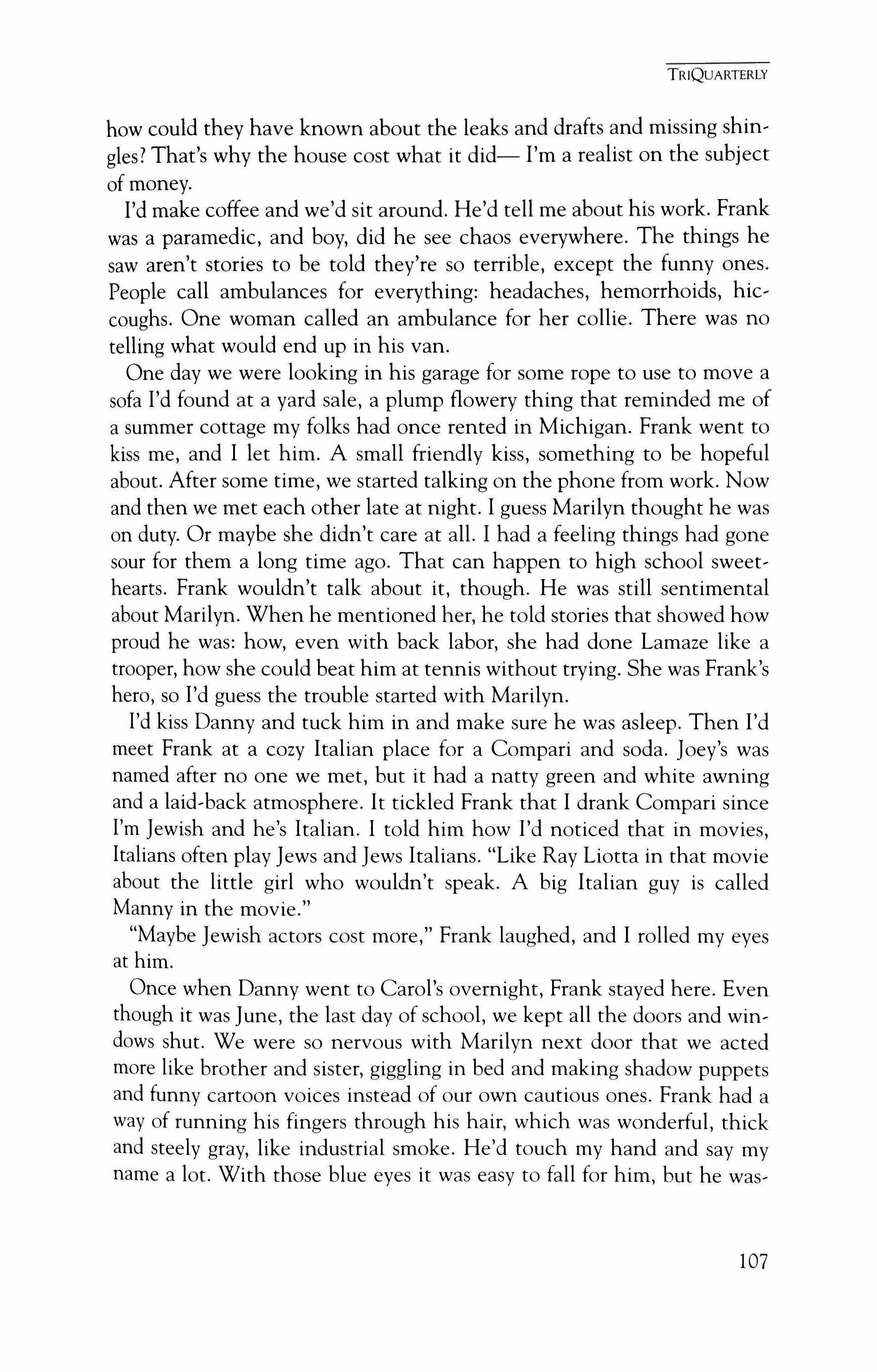
how could they have known about the leaks and drafts and missing shingles? That's why the house cost what it did- I'm a realist on the subject of money.
I'd make coffee and we'd sit around. He'd tell me about his work. Frank was a paramedic, and boy, did he see chaos everywhere. The things he saw aren't stories to be told they're so terrible, except the funny ones. People call ambulances for everything: headaches, hemorrhoids, hiecoughs. One woman called an ambulance for her collie. There was no telling what would end up in his van.
One day we were looking in his garage for some rope to use to move a sofa I'd found at a yard sale, a plump flowery thing that reminded me of a summer cottage my folks had once rented in Michigan. Frank went to kiss me, and I let him. A small friendly kiss, something to be hopeful about. After some time, we started talking on the phone from work. Now and then we met each other late at night. I guess Marilyn thought he was on duty. Or maybe she didn't care at all. I had a feeling things had gone sour for them a long time ago. That can happen to high school sweethearts. Frank wouldn't talk about it, though. He was still sentimental about Marilyn. When he mentioned her, he told stories that showed how proud he was: how, even with back labor, she had done Lamaze like a trooper, how she could beat him at tennis without trying. She was Frank's hero, so I'd guess the trouble started with Marilyn.
I'd kiss Danny and tuck him in and make sure he was asleep. Then I'd meet Frank at a cozy Italian place for a Compari and soda. Joey's was named after no one we met, but it had a natty green and white awning and a laid-back atmosphere. It tickled Frank that I drank Compari since I'm Jewish and he's Italian. I told him how I'd noticed that in movies, Italians often play Jews and Jews Italians. "Like Ray Liotta in that movie about the little girl who wouldn't speak. A big Italian guy is called Manny in the movie."
"Maybe Jewish actors cost more," Frank laughed, and I rolled my eyes at him.
Once when Danny went to Carol's overnight, Frank stayed here. Even though it was June, the last day of school, we kept all the doors and windows shut. We were so nervous with Marilyn next door that we acted more like brother and sister, giggling in bed and making shadow puppets and funny cartoon voices instead of our own cautious ones. Frank had a way of running his fingers through his hair, which was wonderful, thick and steely gray, like industrial smoke. He'd touch my hand and say my name a lot. With those blue eyes it was easy to fall for him, but he was-
TRIQUARTERLY
107

TRIQUARTERLY
n't slick. This was a man who was trained to make people's hearts start again. He was good with his body, not afraid of intimacy. It was so nat, ural for him that I don't think he had any idea how seductive it was. When it was almost morning and he had to go home, we finally made love. "Quick as bees," he smiled. Then he kissed me, showered, slammed his car door in the garage like he was just getting home from work, and walked into the house.
"It would be nice to have Frank for a father," Danny once said on the way to school as we passed all the usual places that were suddenly more vivid for his having said that: red red houses, blue blue sky. I wondered if he was checking out my reaction.
"He's a real good man," I told him. Sometimes I imagined Marilyn cast, ing Frank out in a howling snowstorm. He'd come scratching at my door like my mother's dozen cats, and, of course, ears trained, I'd let him in.
No, I don't think Danny knew, and I don't think it would have mat, tered to Marilyn if she had. She was one of those women who hates things casually with great conviction. Once when I took her shopping (Marilyn rarely drove), she said, "I wish there was some way to have babies without having sex."
"I guess we could have ourselves pollinated like flowers."
"Anything," Marilyn said, "would be better than it is now."
"Are you unhappy with Frank?" I asked her. This was before Frank and I were more than friends.
"No, I'm unhappy with sex," she laughed. "I don't really need it. I work out like mad, Nancy. I take care of myself. I can make myselfhappy with, out anyone else getting involved." She was sitting there with her perfect posture and her little white shorts. Her legs were tan well into October, a real trick in Chicago. Even her face seemed to have well-developed muscles now that I examined it more closely. When she smiled at me, her teeth like little tiles, I tried to imagine her before she got so stuck on her' self. She must have been a young cheerleader when she met Frank at some drab high school dance with the limp crepe paper decorations and the Kool-Aid punch bowl smeared with sherbet. They'd have made a beautiful couple way back then. Just as I was sitting there envying her long maroon fingernails and her lousy marriage, I heard her say just like that, "You can have Frank." We both laughed.
A few months later I took her up on the offer.
108
Eddie
What can be said about Eddie? He was a sweet little boy with Frank's sapphire eyes and Marilyn's taut nervous body and gestures. I remember how he told me stories sometimes with so much exuberance that the words got confused. "Start again," I'd say, "and relax, kid." I remember how his cheeks would freckle up in summer. Redheads are prone to that. I remember him on our living room rug that terrible afternoon. When a child dies you can't sum him up like an adult. That's the tragedy. What has he accomplished? Eddie learned to read at age six, Eddie loved to tell stories about monsters, Eddie had pale skin and a tough little body. He was built to last. I imagine Eddie lost in a forest and finding his way out. I imagine Eddie falling off a sailboat and managing to drag himself to shore. Some day Eddie would have made a good teacher or lawyer or president. Eddie was Jenny Rosemont's sweetheart in third grade. Eddie could be heard above the others on the playground. "His voice was like a bell," the choir director once told Frank. At the funeral, which I couldn't attend, Marilyn fainted and said his name repeatedly. Frank sat like a stone, Carol reported. No one can get over it. Eddie's gone, they keep telling themselves at night. But that's no consolation. And what am I to do with the rest of the sentence? Eddie's gone because of Danny. I see the two of them spinning into space, unhinged from this earth and its consolations; and the rest of us, left behind, like distant satellites flung out of orbit. Eddie, I want to tell you that Danny loved you. He told me. And Danny wants you to know something else too. He'd rather it had happened the other way. "Just you'd be sad the other way around, Mom," Danny told me. "That would have been better, maybe." Because it wasn't a question, I had no answer. My mind, stiff with those words, deserted my body, which sat in its proper chair thinking it sad that I can count what I love on one hand.
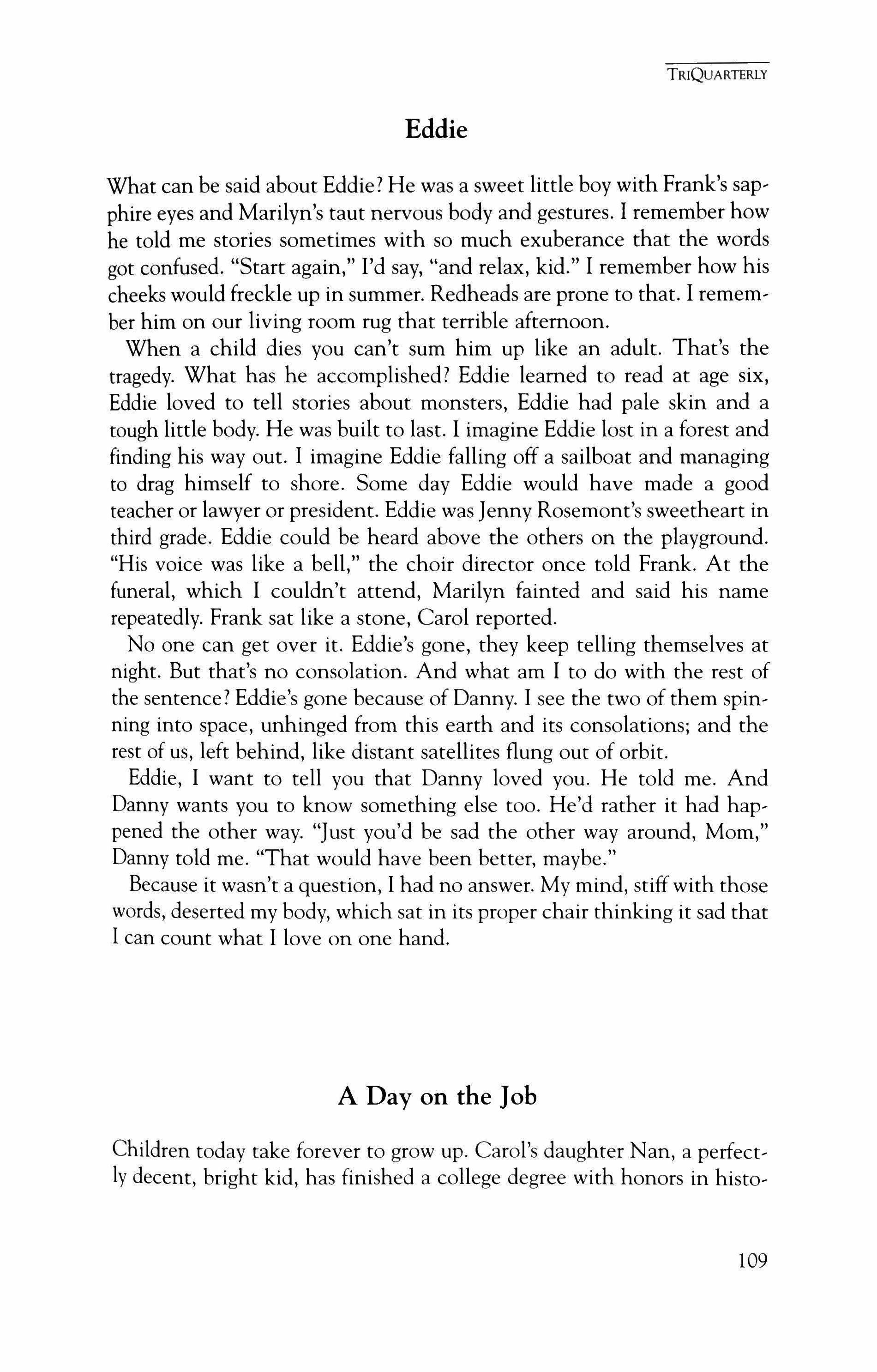
A Day on the Job
Children today take forever to grow up. Carol's daughter Nan, a perfectly decent, bright kid, has finished a college degree with honors in histo-
TRIQUARTERLY
109
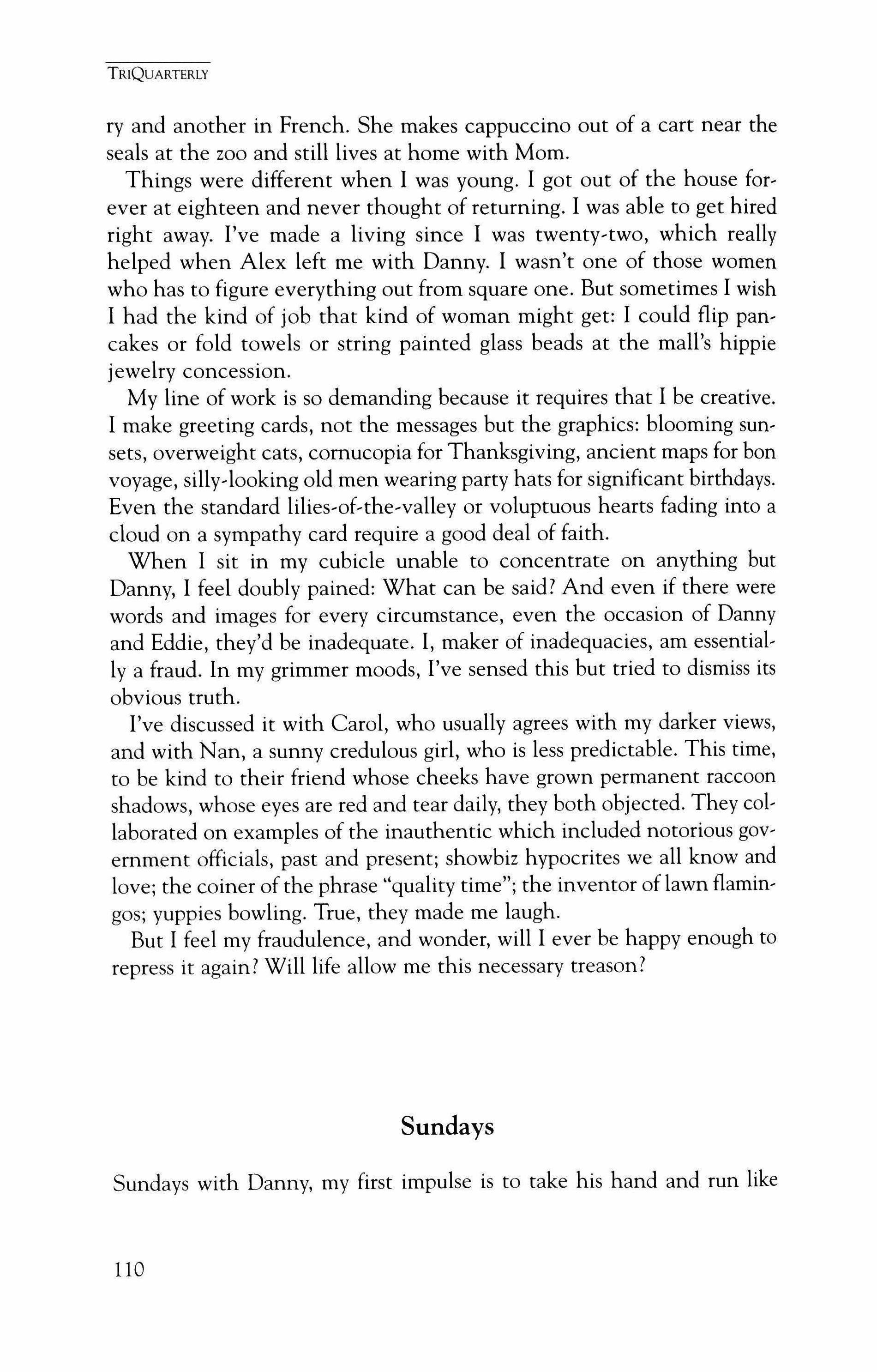
ry and another in French. She makes cappuccino out of a cart near the seals at the zoo and still lives at home with Mom.
Things were different when I was young. I got out of the house forever at eighteen and never thought of returning. I was able to get hired right away. I've made a living since I was twenty-two, which really helped when Alex left me with Danny. I wasn't one of those women who has to figure everything out from square one. But sometimes I wish I had the kind of job that kind of woman might get: I could flip pancakes or fold towels or string painted glass beads at the mall's hippie jewelry concession.
My line of work is so demanding because it requires that I be creative. I make greeting cards, not the messages but the graphics: blooming sunsets, overweight cats, cornucopia for Thanksgiving, ancient maps for bon voyage, silly-looking old men wearing party hats for significant birthdays. Even the standard lilies-of-the-valley or voluptuous hearts fading into a cloud on a sympathy card require a good deal of faith.
When I sit in my cubicle unable to concentrate on anything but Danny, I feel doubly pained: What can be said? And even if there were words and images for every circumstance, even the occasion of Danny and Eddie, they'd be inadequate. I, maker of inadequacies, am essentially a fraud. In my grimmer moods, I've sensed this but tried to dismiss its obvious truth.
I've discussed it with Carol, who usually agrees with my darker views, and with Nan, a sunny credulous girl, who is less predictable. This time, to be kind to their friend whose cheeks have grown permanent raccoon shadows, whose eyes are red and tear daily, they both objected. They collaborated on examples of the inauthentic which included notorious government officials, past and present; showbiz hypocrites we all know and love; the coiner of the phrase "quality time"; the inventor of lawn flamingos; yuppies bowling. True, they made me laugh.
But I feel my fraudulence, and wonder, will I ever be happy enough to repress it again? Will life allow me this necessary treason?
Sundays
Sundays with Danny, my first impulse is to take his hand and run like
TRIQUARTERLY
110

hell. We're in the last scene of the movie where the rhapsodic music swells, the ocean glitters, the sun glows, and we walk away unscathed. No, we're in a state-run juvenile home where authorities in blue coats are poking and prodding my son. How can the medical functionaries at Friendship House help Danny more than I can?
Ms. Riordan is talking to me. She's young enough to be someone I once babysat. Her lips are an unadulterated pink. She looks like she's worked here twelve minutes. "Danny is suicidally depressed," she explains.
"Of course, he shot someone. Wouldn't you be too?" I shout as though she's a fool. I can feel my face take on color, see spit fly from my imperfect lips. I'm a rabid dog. I'm her worst nightmare. But apparently, I'm no original. There's a location on Miss Riordan, M.S.W.'s chart, for my attitude. All of my rage at her idiocy is grist for their familial symptom mill. Remember yourself, I say in my mother's most strident tone. Breathe evenly. Visualize. Count to ten, I remind myself, as Carol would in her best yoga voice. Then my practical wisdom rises to the surface: Save it for the lawyer. You can call him on Monday. Don't let them think you're a bad mother. Don't let them take Danny away.
Danny and I haven't seen Alex since he grew a beard and a new family three years ago. They are named Karina and Lilith. Lilith is the child. This Sunday, the third that Danny's been away, Alex is joining me for the visit. Meeting him at Friendship House is either a new beginning or the final tum of the screw. Carol calls his sudden interest in Danny Alex's corningof-age. Nine years late, I say. Thirty-nine years late, she corrects me.
When I see Alex down the hall, I can feel my eyes well over. I tum toward the wall and chew on my lip, a substantial enough piece of myself to remind me not to cry. Not in front of him, I tell myself. Not now.
"Alex," I say, recomposed, leak-free.
"Nancy," he smiles, the same Mona Lisa shadow of a grin that he offered up the night he left, "how's Danny doing?"
"What do you expect? He's distraught. He's beside himself."
"You mean he understands?"
"Of course he understands. Didn't you listen at the hearing? He understands perfectly."
"I mean, it's got to be tough."
"It is tough."
"Well, often when things are hard we try to forget them."
"Alex, they're holding him here. He's a prisoner until the judge decides he can go. What do you imagine he'd think about in his spare time? They're wiping his face in it."
TRIQUARTERLY
111
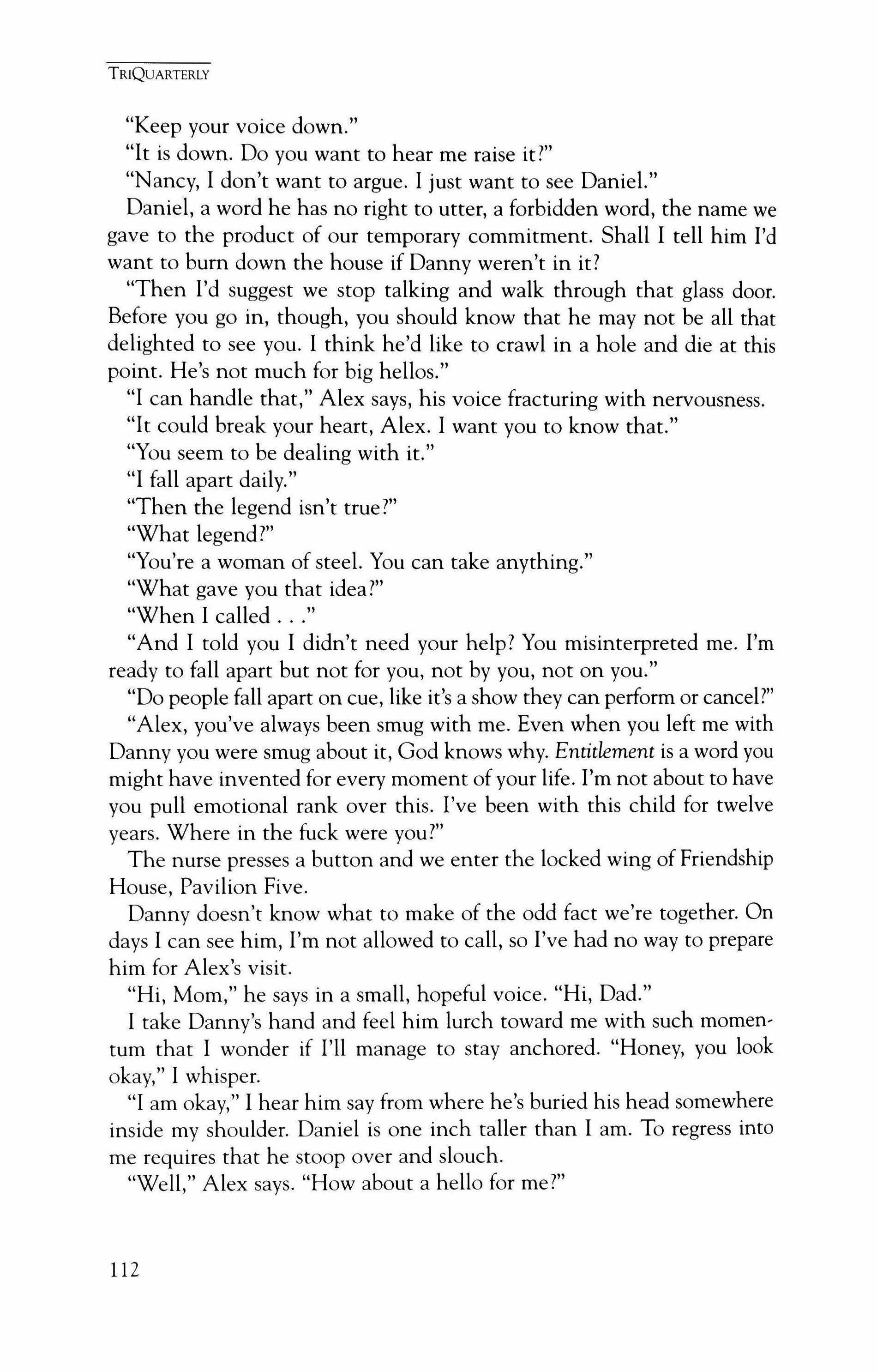
"Keep your voice down."
"It is down. Do you want to hear me raise it?"
"Nancy, I don't want to argue. I just want to see Daniel."
Daniel, a word he has no right to utter, a forbidden word, the name we gave to the product of our temporary commitment. Shall I tell him I'd want to burn down the house if Danny weren't in it?
"Then I'd suggest we stop talking and walk through that glass door. Before you go in, though, you should know that he may not be all that delighted to see you. I think he'd like to crawl in a hole and die at this point. He's not much for big hellos."
"I can handle that," Alex says, his voice fracturing with nervousness.
"It could break your heart, Alex. I want you to know that."
"You seem to be dealing with it."
"I fall apart daily."
"Then the legend isn't true?"
"What legend?"
"You're a woman of steel. You can take anything."
"What gave you that idea?"
"When I called ."
"And I told you I didn't need your help? You misinterpreted me. I'm ready to fall apart but not for you, not by you, not on you."
"Do people fall apart on cue, like it's a show they can perform or cancel?"
"Alex, you've always been smug with me. Even when you left me with Danny you were smug about it, God knows why. Entitlement is a word you might have invented for every moment of your life. I'm not about to have you pull emotional rank over this. I've been with this child for twelve years. Where in the fuck were you?"
The nurse presses a button and we enter the locked wing of Friendship House, Pavilion Five.
Danny doesn't know what to make of the odd fact we're together. On days I can see him, I'm not allowed to call, so I've had no way to prepare him for Alex's visit.
"Hi, Mom," he says in a small, hopeful voice. "Hi, Dad."
I take Danny's hand and feel him lurch toward me with such momentum that I wonder if I'll manage to stay anchored. "Honey, you look okay," I whisper.
"I am okay," I hear him say from where he's buried his head somewhere inside my shoulder. Daniel is one inch taller than I am. To regress into me requires that he stoop over and slouch.
"Well," Alex says. "How about a hello for me?"
TRIQUARTERLY
112
"Hello," Danny says and extends his hand for a Mr. Schulien handshake. We can learn so much from lawyers, I think to myself.
"How about a hug?"
"Okay," Danny says, waiting for Alex to begin.

Fishing
Two summers ago, before he taught them to use the compound bow, Frank took Danny and Eddie fishing a couple of times. The first time they planned a trip, both boys acted badly, and they came home early. So Frank approached the second trip like an expedition. They went overnight after planning the trip with the care of a moonwalk. They took notes and read guidebooks and even practiced setting up the tent in Eddie's yard. It was a big deal for Danny, his first time away from home "doing boy things," as we jokingly called it. Until we moved next door to Frank, we were so distant from these activities ourselves, Danny and his well-meaning female entourage of mother and friends, that "doing boy things" came to connote the special effort it took, fatherless, to engage ourselves seriously enough to convince Danny of our seriousness. Doing boy things meant little league baseball, where Danny was one of the few kids who couldn't throw right when the season began. "Don't throw like a girl," one memorable coach remarked. Doing boy things meant letting him get a skateboard that led to altering the length of his two front teeth on an unexpected curb. It meant riding his bike more than a mile to school before spring had displayed its first green shoots under the snow. I bought Danny his own lantern and sleeping bag for the trip. For windowdressing, I threw in a Swiss Army knife, a red bandanna and an Army surplus camouflage canteen.
From all reports, the trip went well. I can show you photos of the tall dark pines and Fuji film-azure metal sky at Kettle Moraine State Park. Bluegill sizzle on a miniature red grill as Danny and Eddie stand side by side, buddies forever, smiles wider than space. But there's one photo that concerns me. Danny took it at Frank's request. It shows Eddie and Frank together, only the odd thing is that Eddie's hardly in it. Standing on a gray, sloped rock, Frank is at the center of the picture. Eddie is leaning out of it, so that part of his face and body are missing.
TRIQUARTERLY
113
Now, Danny knows how to take pictures. That's one advantage he had in life. Most boys without fathers can aim a hammer or a camera with some skill. So I have to wonder--did Danny arrange this excision? Should I show anyone?
My heart pounds as my search for clues leads me to his yellowembossed baby book, where I read, "Danny is a jealous little boy. When he sees Alex kiss me, he tugs at my face."
Me, a word larger than its two meager letters. Me. Me. Me, a billboard blinking endlessly into the night. Hold me, thrill me, kiss me, the ballad demands. Our children's needs should be the subject of love songsthey're so much stronger than any other human requirements.
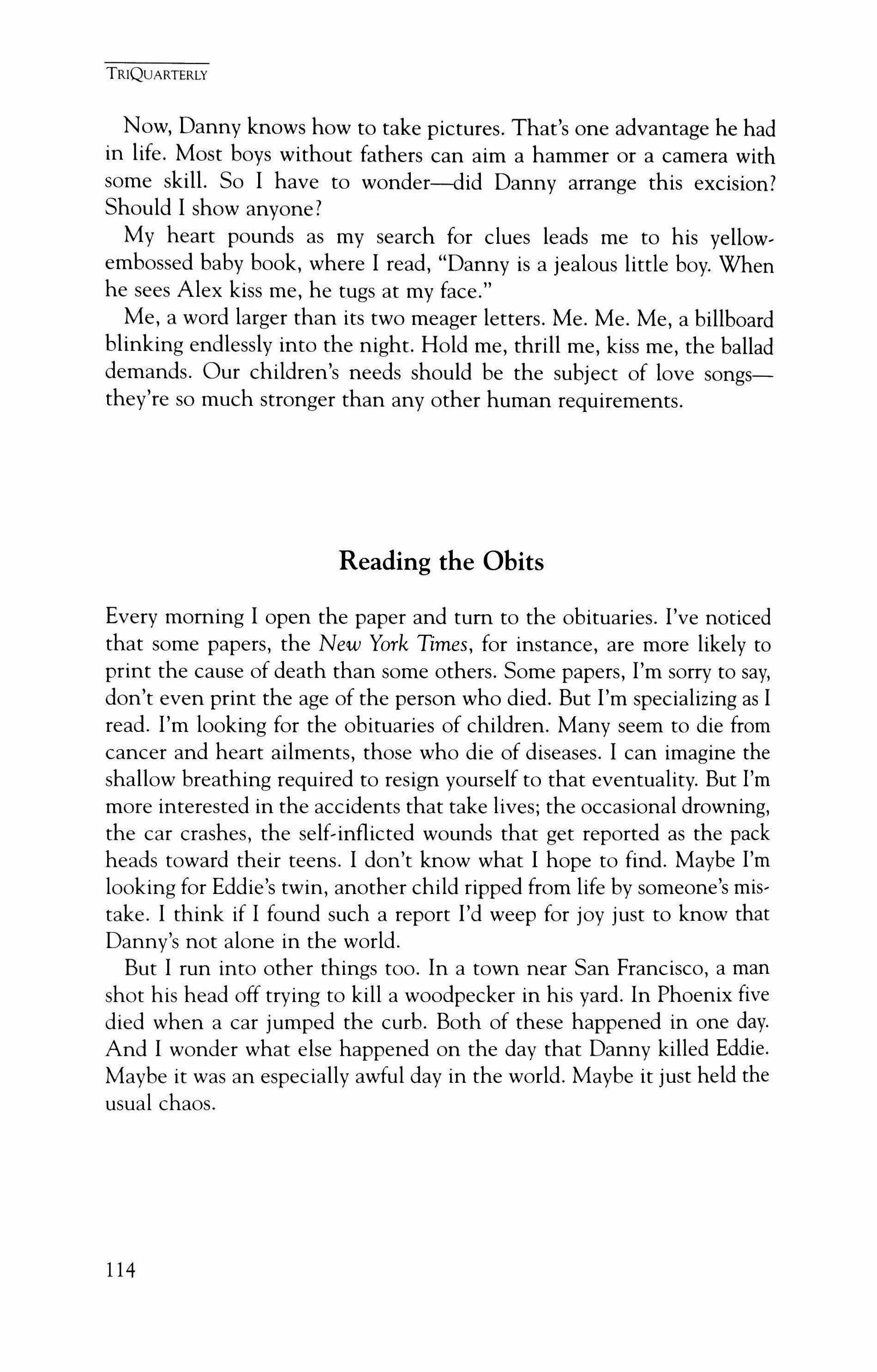
Reading the Obits
Every morning I open the paper and tum to the obituaries. I've noticed that some papers, the New York Times, for instance, are more likely to print the cause of death than some others. Some papers, I'm sorry to say, don't even print the age of the person who died. But I'm specializing as I read. I'm looking for the obituaries of children. Many seem to die from cancer and heart ailments, those who die of diseases. I can imagine the shallow breathing required to resign yourself to that eventuality. But I'm more interested in the accidents that take lives; the occasional drowning, the car crashes, the self-inflicted wounds that get reported as the pack heads toward their teens. I don't know what I hope to find. Maybe I'm looking for Eddie's twin, another child ripped from life by someone's mistake. I think if I found such a report I'd weep for joy just to know that Danny's not alone in the world.
But I run into other things too. In a town near San Francisco, a man shot his head off trying to kill a woodpecker in his yard. In Phoenix five died when a car jumped the curb. Both of these happened in one day. And I wonder what else happened on the day that Danny killed Eddie. Maybe it was an especially awful day in the world. Maybe it just held the usual chaos.
TRIQUARTERLY
114
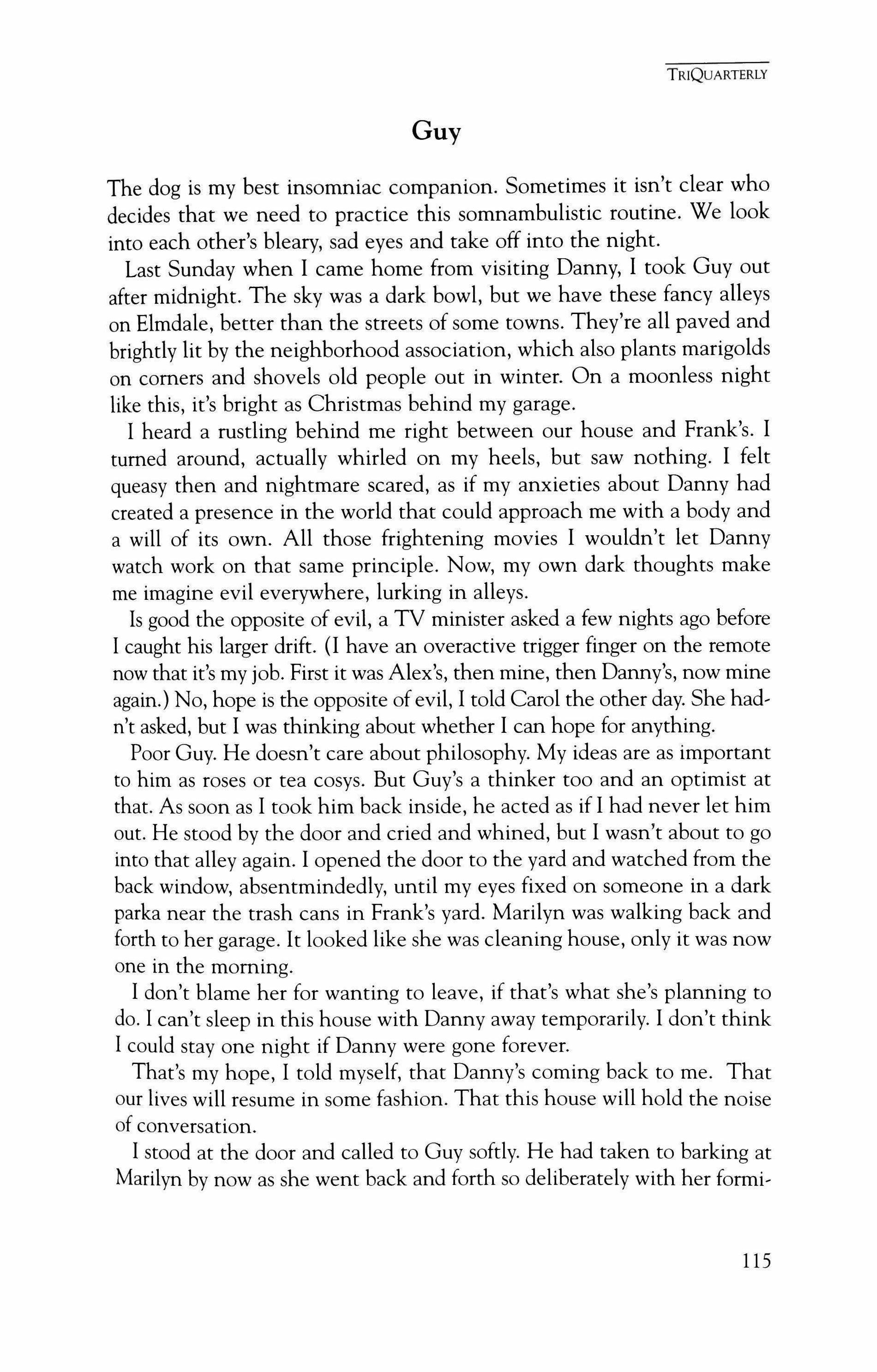
Guy
The dog is my best insomniac companion. Sometimes it isn't clear who decides that we need to practice this somnambulistic routine. We look into each other's bleary, sad eyes and take off into the night.
Last Sunday when I came home from visiting Danny, I took Guy out after midnight. The sky was a dark bowl, but we have these fancy alleys on Elmdale, better than the streets of some towns. They're all paved and brightly lit by the neighborhood association, which also plants marigolds on comers and shovels old people out in winter. On a moonless night like this, it's bright as Christmas behind my garage.
I heard a rustling behind me right between our house and Frank's. I turned around, actually whirled on my heels, but saw nothing. I felt queasy then and nightmare scared, as if my anxieties about Danny had created a presence in the world that could approach me with a body and a will of its own. All those frightening movies I wouldn't let Danny watch work on that same principle. Now, my own dark thoughts make me imagine evil everywhere, lurking in alleys.
Is good the opposite of evil, a TV minister asked a few nights ago before I caught his larger drift. (l have an overactive trigger finger on the remote now that it's my job. First it was Alex's, then mine, then Danny's, now mine again.) No, hope is the opposite ofevil, I told Carol the other day. She hadn't asked, but I was thinking about whether I can hope for anything.
Poor Guy. He doesn't care about philosophy. My ideas are as important to him as roses or tea cosys. But Guy's a thinker too and an optimist at that. As soon as I took him back inside, he acted as if I had never let him out. He stood by the door and cried and whined, but I wasn't about to go into that alley again. I opened the door to the yard and watched from the back window, absentmindedly, until my eyes fixed on someone in a dark parka near the trash cans in Frank's yard. Marilyn was walking back and forth to her garage. It looked like she was cleaning house, only it was now one in the morning.
I don't blame her for wanting to leave, if that's what she's planning to do. I can't sleep in this house with Danny away temporarily. I don't think I could stay one night if Danny were gone forever.
That's my hope, I told myself, that Danny's coming back to me. That our lives will resume in some fashion. That this house will hold the noise of conversation.
I stood at the door and called to Guy softly. He had taken to barking at Marilyn by now as she went back and forth so deliberately with her formi-
TRIQUARTERLY
115
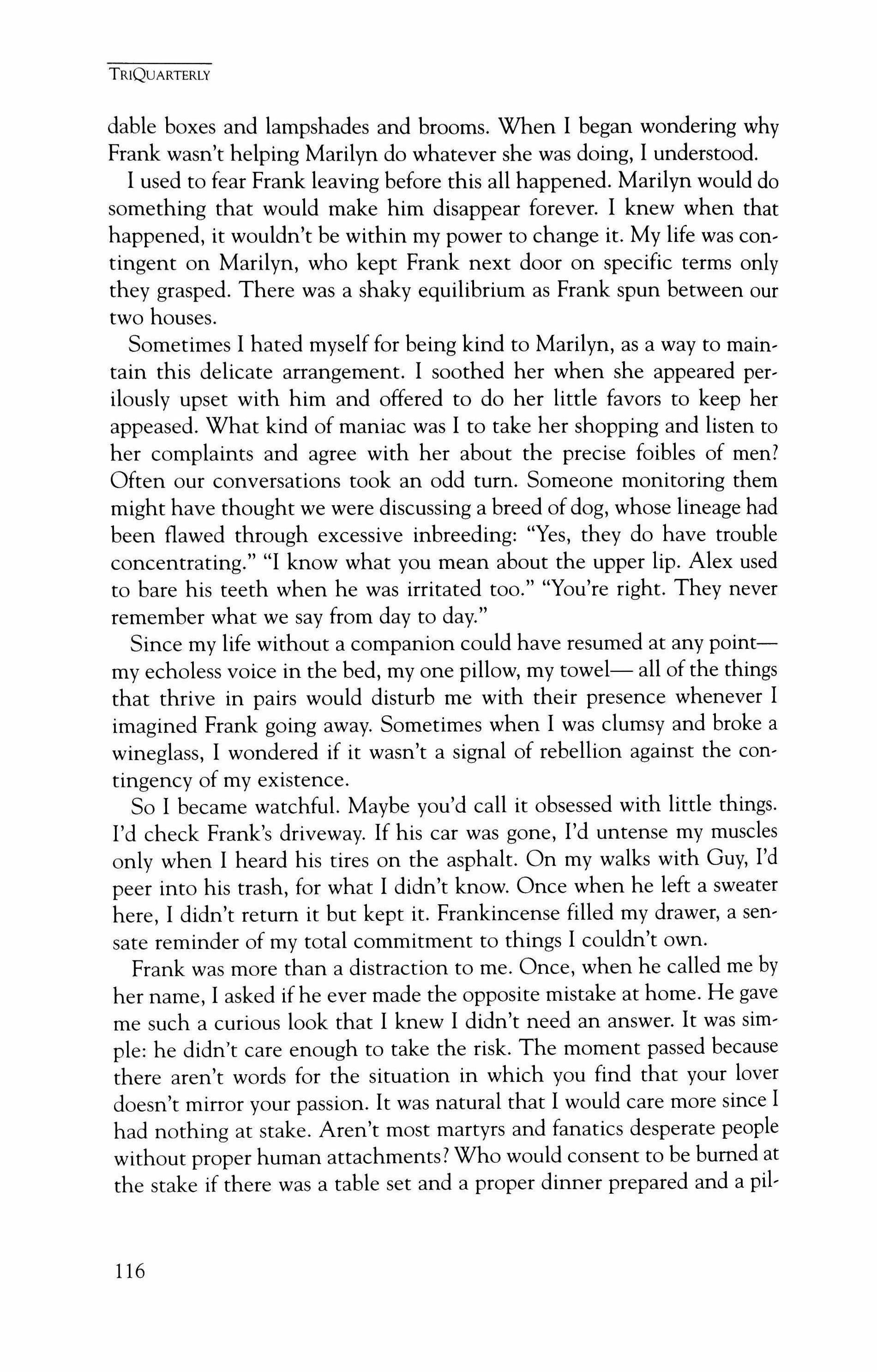
dable boxes and lampshades and brooms. When I began wondering why Frank wasn't helping Marilyn do whatever she was doing, I understood. I used to fear Frank leaving before this all happened. Marilyn would do something that would make him disappear forever. I knew when that happened, it wouldn't be within my power to change it. My life was contingent on Marilyn, who kept Frank next door on specific terms only they grasped. There was a shaky equilibrium as Frank spun between our two houses.
Sometimes I hated myself for being kind to Marilyn, as a way to maintain this delicate arrangement. I soothed her when she appeared perilously upset with him and offered to do her little favors to keep her appeased. What kind of maniac was I to take her shopping and listen to her complaints and agree with her about the precise foibles of men? Often our conversations took an odd turn. Someone monitoring them might have thought we were discussing a breed of dog, whose lineage had been flawed through excessive inbreeding: "Yes, they do have trouble concentrating." "I know what you mean about the upper lip. Alex used to bare his teeth when he was irritated too." "You're right. They never remember what we say from day to day."
Since my life without a companion could have resumed at any pointmy echoless voice in the bed, my one pillow, my towel- all of the things that thrive in pairs would disturb me with their presence whenever I imagined Frank going away. Sometimes when I was clumsy and broke a wineglass, I wondered if it wasn't a signal of rebellion against the contingency of my existence.
So I became watchful. Maybe you'd call it obsessed with little things. I'd check Frank's driveway. If his car was gone, I'd untense my muscles only when I heard his tires on the asphalt. On my walks with Guy, I'd peer into his trash, for what I didn't know. Once when he left a sweater here, I didn't return it but kept it. Frankincense filled my drawer, a sensate reminder of my total commitment to things I couldn't own.
Frank was more than a distraction to me. Once, when he called me by her name, I asked if he ever made the opposite mistake at home. He gave me such a curious look that I knew I didn't need an answer. It was simple: he didn't care enough to take the risk. The moment passed because there aren't words for the situation in which you find that your lover doesn't mirror your passion. It was natural that I would care more since I had nothing at stake. Aren't most martyrs and fanatics desperate people without proper human attachments? Who would consent to be burned at the stake if there was a table set and a proper dinner prepared and a pil-
TR1QUARTERLY
116

low awaiting the distinct impression of our mortal heads? We bum for love, but we only consent to being burned in its absence.
Now that Frank is gone, I realize that I've hardly thought about him lately. True, I have another cause and, true, I'd wear a hairshirt, walk on nails or poke out my eyes to get Danny back right now.
Still, faced with Marilyn's figure in the garage, I think of what I can save. I could warn Frank that she's planning to go and he could race home. I think of calling Frank at the station. A man so good at saving lives would want to stop this hemorrhage at home. I could leave ames, sage for him without identifying myself. Thinking of punching the numbers, my pulse races like a teenager's.
But what right do I have to any part of his life, even the slippage? Danny has disqualified us from human connections. Would I feel this way if Frank and I hadn't made love, if his lips hadn't breathed words in my bed? Fingerprints would reveal all the things he's touched here. DNA tests might show him on my sheets and my towels and inside of me.
I've taken to doodling now, which is what insane people do in their spare time. It's better than cleaning out my refrigerator which now con, tains 1) a quart of milk past its date, 2) three Granny Smith apples, 3) half a cooked chicken. Angry women are Spartans; they also have the cleanest refrigerators. On the little diagram I've drawn, Frank and I are dots that can't be connected because of the pain. But the body gets lone, ly remembering, and the pain hovers, like a malevolent cloud, over our two houses. Will it ever blow away, or will we breathe its anxious air for, ever?
The phone rings and I pick it up, adrenaline running like a train through my veins and chugging in my head. When nobody talks, I hang up. I sit up in bed and look around. Everything's in place. There's no rea, son for me to enumerate the objects- chair, TV, nightstand- in the soft light of my room but to calm myself. Guy comes over to me and lays his long-jawed bullet head on my lap. We breathe together in the uneasy darkness, and he whimpers like he knows something about sadness. I'm wondering about the call when the phone rings again.
"Mom, it's me," Danny's voice whispers.
"What is it, honey?"
"I just wanted to say hi."
"Where are you calling from?"
"It's like a nurse's station."
"And where's the nurse?"
TRIQUARTERLY
117
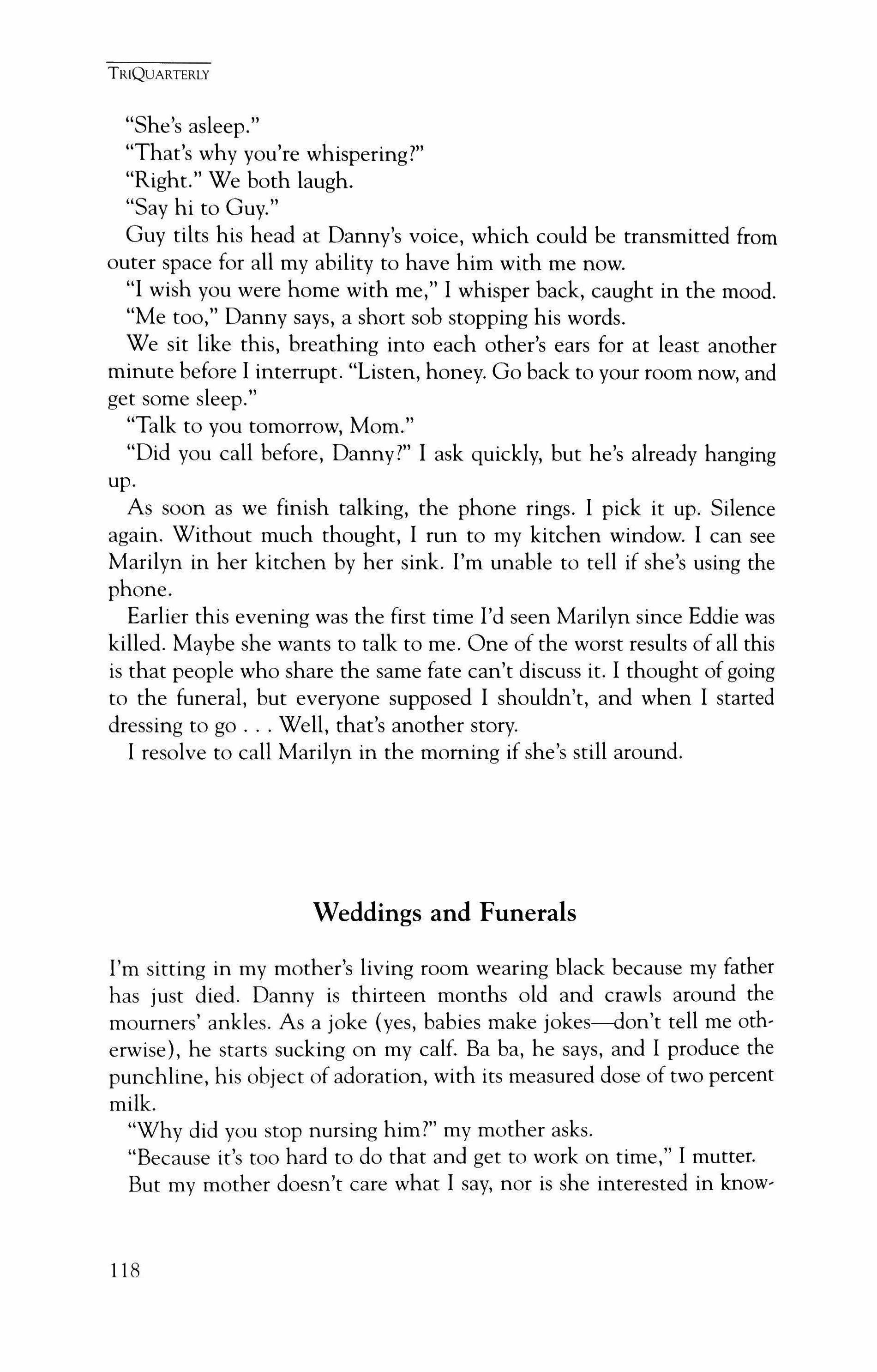
"She's asleep."
"That's why you're whispering?" "Right." We both laugh.
"Say hi to Guy."
Guy tilts his head at Danny's voice, which could be transmitted from outer space for all my ability to have him with me now.
"I wish you were home with me," I whisper back, caught in the mood. "Me too," Danny says, a short sob stopping his words. We sit like this, breathing into each other's ears for at least another minute before I interrupt. "Listen, honey. Go back to your room now, and get some sleep."
"Talk to you tomorrow, Mom."
"Did you call before, Danny?" I ask quickly, but he's already hanging up.
As soon as we finish talking, the phone rings. I pick it up. Silence again. Without much thought, I run to my kitchen window. I can see Marilyn in her kitchen by her sink. I'm unable to tell if she's using the phone.
Earlier this evening was the first time I'd seen Marilyn since Eddie was killed. Maybe she wants to talk to me. One of the worst results of all this is that people who share the same fate can't discuss it. I thought of going to the funeral, but everyone supposed I shouldn't, and when I started dressing to go Well, that's another story.
I resolve to call Marilyn in the morning if she's still around.
Weddings and Funerals
I'm sitting in my mother's living room wearing black because my father has just died. Danny is thirteen months old and crawls around the mourners' ankles. As a joke (yes, babies make jokes---don't tell me otherwise), he starts sucking on my calf. Ba ba, he says, and I produce the punchline, his object of adoration, with its measured dose of two percent milk.
"Why did you stop nursing him?" my mother asks.
"Because it's too hard to do that and get to work on time," I mutter.
But my mother doesn't care what I say, nor is she interested in know-
TRIQUARTERLY
118
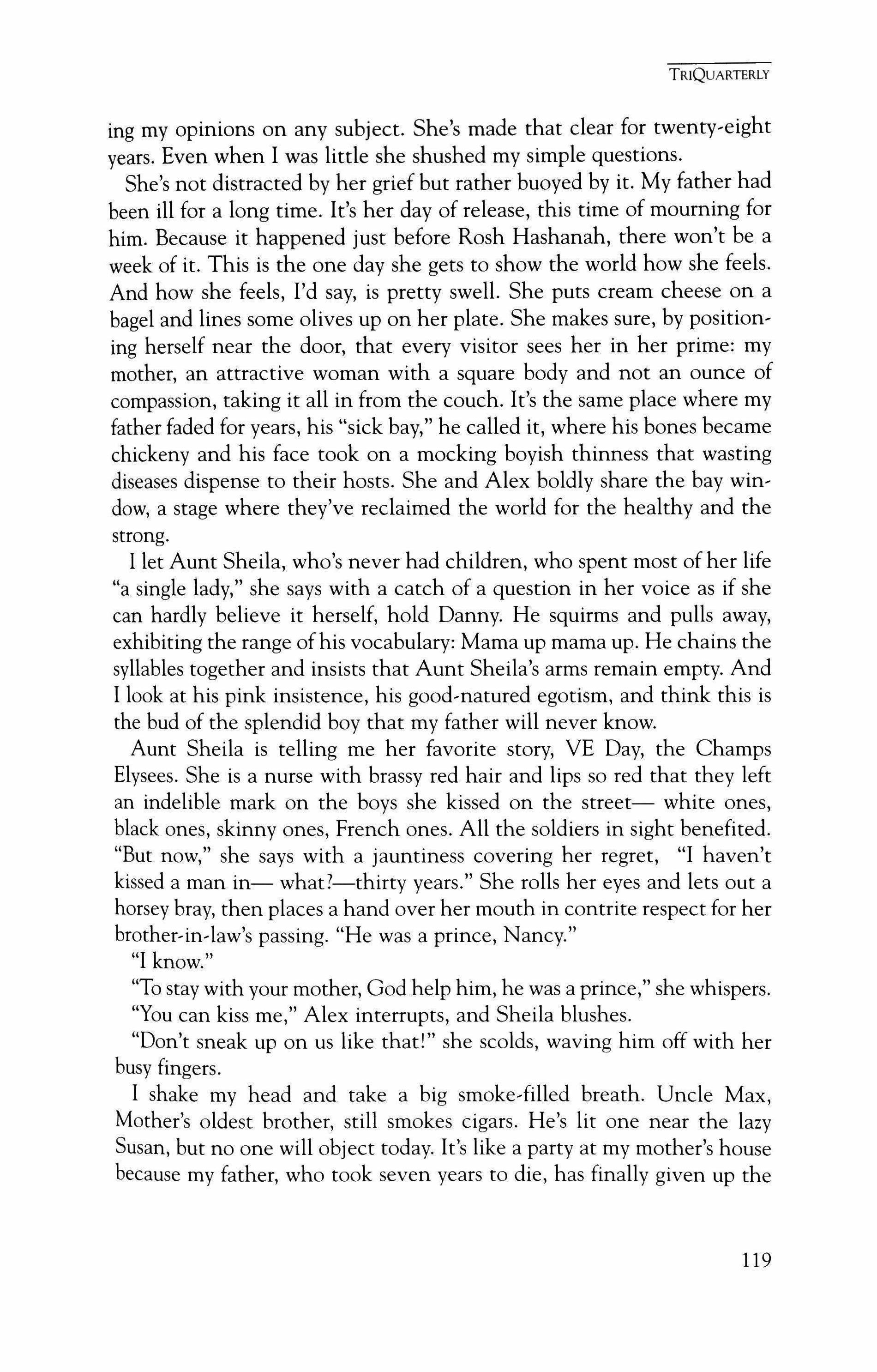
ing my opinions on any subject. She's made that clear for twenty-eight years. Even when I was little she shushed my simple questions.
She's not distracted by her grief but rather buoyed by it. My father had been ill for a long time. It's her day of release, this time of mourning for him. Because it happened just before Rosh Hashanah, there won't be a week of it. This is the one day she gets to show the world how she feels. And how she feels, I'd say, is pretty swell. She puts cream cheese on a bagel and lines some olives up on her plate. She makes sure, by positioning herself near the door, that every visitor sees her in her prime: my mother, an attractive woman with a square body and not an ounce of compassion, taking it all in from the couch. It's the same place where my father faded for years, his "sick bay," he called it, where his bones became chickeny and his face took on a mocking boyish thinness that wasting diseases dispense to their hosts. She and Alex boldly share the bay window, a stage where they've reclaimed the world for the healthy and the strong.
I let Aunt Sheila, who's never had children, who spent most of her life "a single lady," she says with a catch of a question in her voice as if she can hardly believe it herself, hold Danny. He squirms and pulls away, exhibiting the range ofhis vocabulary: Mama up mama up. He chains the syllables together and insists that Aunt Sheila's arms remain empty. And I look at his pink insistence, his good-natured egotism, and think this is the bud of the splendid boy that my father will never know.
Aunt Sheila is telling me her favorite story, VE Day, the Champs Elysees. She is a nurse with brassy red hair and lips so red that they left an indelible mark on the boys she kissed on the street- white ones, black ones, skinny ones, French ones. All the soldiers in sight benefited. "But now," she says with a jauntiness covering her regret, "I haven't kissed a man in- what?-thirty years." She rolls her eyes and lets out a horsey bray, then places a hand over her mouth in contrite respect for her brother-in-law's passing. "He was a prince, Nancy."
"I lenow.
"To stay with your mother, God help him, he was a prince," she whispers. "You can kiss me," Alex interrupts, and Sheila blushes.
"Don't sneak up on us like that!" she scolds, waving him off with her busy fingers.
I shake my head and take a big smoke-filled breath. Uncle Max, Mother's oldest brother, still smokes cigars. He's lit one near the lazy Susan, but no one will object today. It's like a party at my mother's house because my father, who took seven years to die, has finally given up the 119
TRIQUARTERLY

fight. "At least he's not suffering," my mother offers to the guests, who agree with nods and murmurs and more prune Danish and decaf and strawberries dipped in brown sugar.
And she's right about suffering. When we die it stops. But I'm sitting here in my little black skirt and jacket thinking something else. For so many years, even before Dad got ill, they had suffered each other's presence. It was a well-known fact. And just like them, steering their little boats into constantly troubled water, Alex and I are having a war of our own. Before we arrived at my mother's, we'd had at least six skirmishes. From the moment we got up the morning of my father's funeral, we'd exchange words, small artillery that finally means more than its meager fire power. If babies remember their infancy, Danny won't think of the geometric mobiles and little ducks on his blanket trim but of snarling, raised voices: the ballistics of anger.
I remembered Carol telling me that it was her husband's father's funeral that had gotten Bill thinking: "I'm forty years old and I'm just like him." A few months later, Carol and Bill were deciding that marriage counseling couldn't help. Maybe there's something about funerals that provides more outline to every moment. Maybe the scales we use to weigh up experience get balanced at these events.
Weddings serve a different purpose. They're the smoke screen, the diversion, akin to parades and holidays whose significance we've forgotten. I remember the infectious strains of "Moon River" at his boss's wedding reception softening Alex's regard for me weeks before he left. "You look beautiful," he told his limp-haired wife as he cupped his hands around her behind and ever so delicately massaged her reluctant back. He's touching me like he loves me, I heard my confused self repeating.
A good year before Alex left, I sat at my father's funeral thinking two things: that kind men shouldn't die. Keats's immortal vase should hold us all at our best moments: me, suspended on the rope swing my father had fashioned, his capable hands lifting me into the sky; Aunt Sheila locked in an embrace with some huge soldier from the Dordognes; Alex, just when he met me in European history class and shot me a smile that had nothing in common with a sneer. My ode to immortality was interrupted by my knowledge of impermanence. Alex and I won't last. Alex and I won't last, I chanted to myself like Danny's invocation of his beloved bottle. When Alex touched me at the wedding, it was just part of the denouement.
The day Eddie was buried I lost control. I asked Aunt Sheila to take Danny because Carol wanted to go to the funeral, and I had hoped to go with her. The morning in question, I knew I couldn't abide the pained
TRIQUARTERLY
120
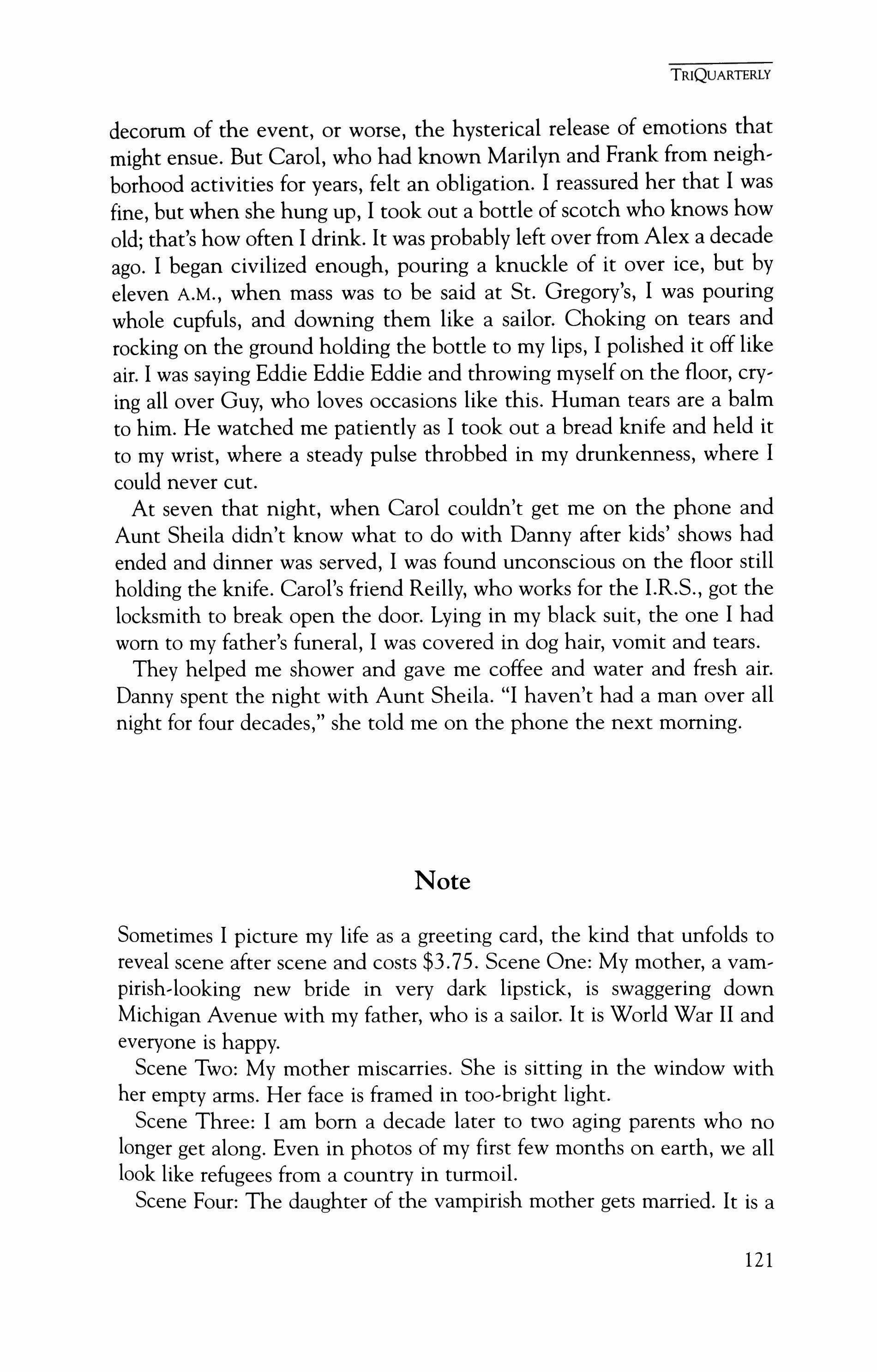
decorum of the event, or worse, the hysterical release of emotions that might ensue. But Carol, who had known Marilyn and Frank from neighborhood activities for years, felt an obligation. I reassured her that I was fine, but when she hung up, I took out a bottle of scotch who knows how old; that's how often I drink. It was probably left over from Alex a decade ago. I began civilized enough, pouring a knuckle of it over ice, but by eleven A.M., when mass was to be said at St. Gregory's, I was pouring whole cupfuls, and downing them like a sailor. Choking on tears and rocking on the ground holding the bottle to my lips, I polished it off like air. I was saying Eddie Eddie Eddie and throwing myself on the floor, crying all over Guy, who loves occasions like this. Human tears are a balm to him. He watched me patiently as I took out a bread knife and held it to my wrist, where a steady pulse throbbed in my drunkenness, where I could never cut.
At seven that night, when Carol couldn't get me on the phone and Aunt Sheila didn't know what to do with Danny after kids' shows had ended and dinner was served, I was found unconscious on the floor still holding the knife. Carol's friend Reilly, who works for the I.R.S., got the locksmith to break open the door. Lying in my black suit, the one I had worn to my father's funeral, I was covered in dog hair, vomit and tears. They helped me shower and gave me coffee and water and fresh air. Danny spent the night with Aunt Sheila. "I haven't had a man over all night for four decades," she told me on the phone the next morning.
Note
Sometimes I picture my life as a greeting card, the kind that unfolds to reveal scene after scene and costs $3.75. Scene One: My mother, a vampirish-looking new bride in very dark lipstick, is swaggering down Michigan Avenue with my father, who is a sailor. It is World War II and everyone is happy.
Scene Two: My mother miscarries. She is sitting in the window with her empty arms. Her face is framed in too-bright light.
Scene Three: I am born a decade later to two aging parents who no longer get along. Even in photos of my first few months on earth, we all look like refugees from a country in turmoil.
Scene Four: The daughter of the vampirish mother gets married. It is a
TRIQUARTERLY
121
small ceremony attended by latter-day hippies. No one knows the proper gift to bring or the correct attire. One friend is photographed wearing a denim pair of shorts and striped knee socks. The newlyweds look mildly dazed or giddy with pleasure. In the typical cake-sharing photo, there seems to have been an earlier disaster. The cake looks uneven, disheveled, like a hat which has seen better days. The bride and groom kiss, their eyes floating like candles in water, full of hope and impermanence.
Scene Five: A baby is born to the young couple shown in Scene Four. He is wide-eyed with a moon-face. He is the prettiest baby they have ever seen.
Scene Six: The father is leaving in a beige sedan. No one is waving. The baby has all his teeth and can say things. This isn't a photograph but an air-brushed drawing. The baby has a speech bubble over his head. He is saying, "Bye, Daddy." The mother, who looks sullen, has a speech bubble over her head. She is saying, "What took you so long?" to the shadow of the moving car.
Scene Seven: The mother and son move into a new house and live happily ever after. The story, despite its dubious record of success, ends here.
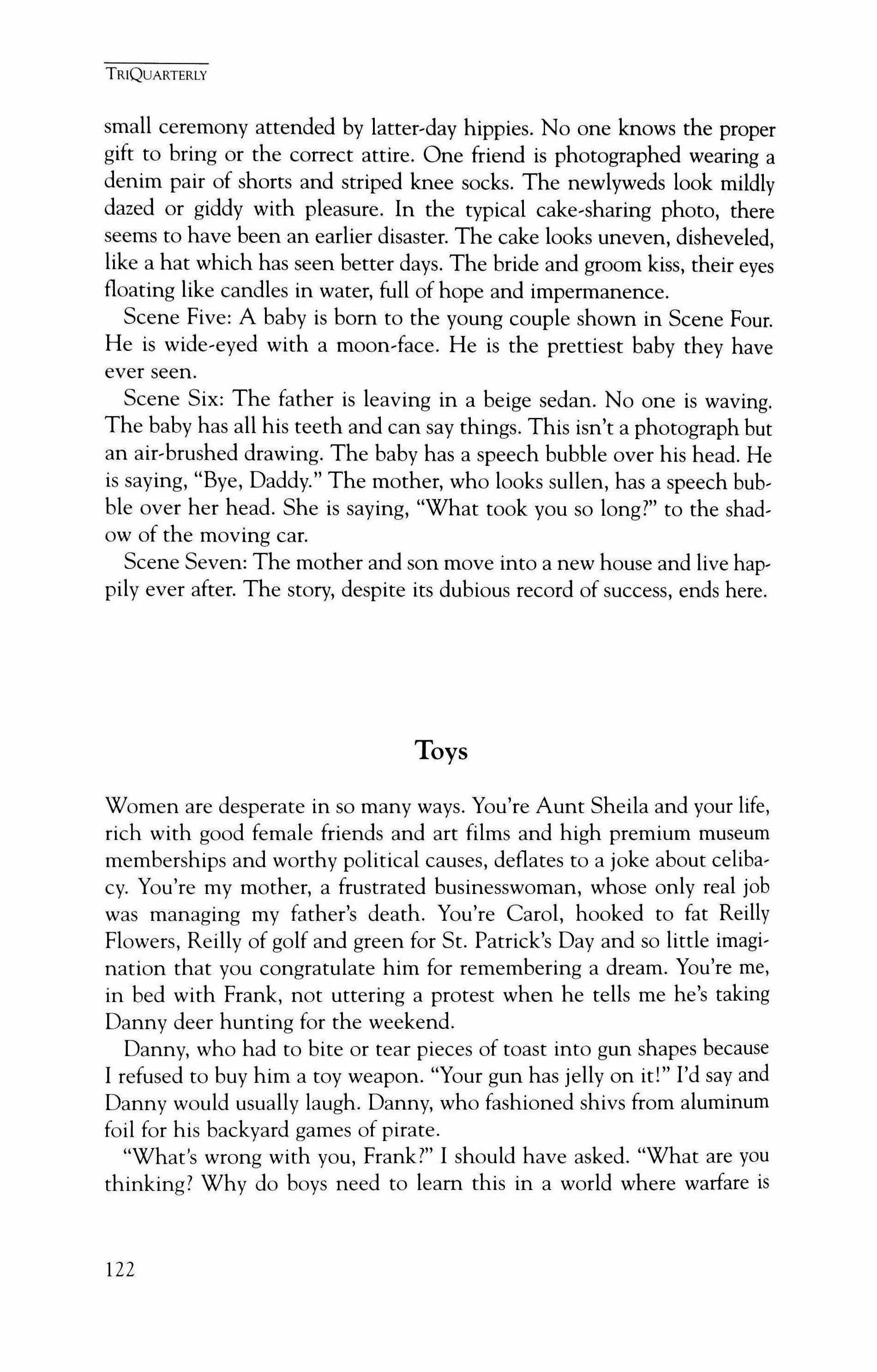
Toys
Women are desperate in so many ways. You're Aunt Sheila and your life, rich with good female friends and art films and high premium museum memberships and worthy political causes, deflates to a joke about celibacy. You're my mother, a frustrated businesswoman, whose only real job was managing my father's death. You're Carol, hooked to fat Reilly Flowers, Reilly of golf and green for St. Patrick's Day and so little imagination that you congratulate him for remembering a dream. You're me, in bed with Frank, not uttering a protest when he tells me he's taking Danny deer hunting for the weekend.
Danny, who had to bite or tear pieces of toast into gun shapes because I refused to buy him a toy weapon. "Your gun has jelly on it!" I'd say and Danny would usually laugh. Danny, who fashioned shivs from aluminum foil for his backyard games of pirate.
"What's wrong with you, Frank?" I should have asked. "What are you thinking? Why do boys need to learn this in a world where warfare is
TRIQUARTERLY
122
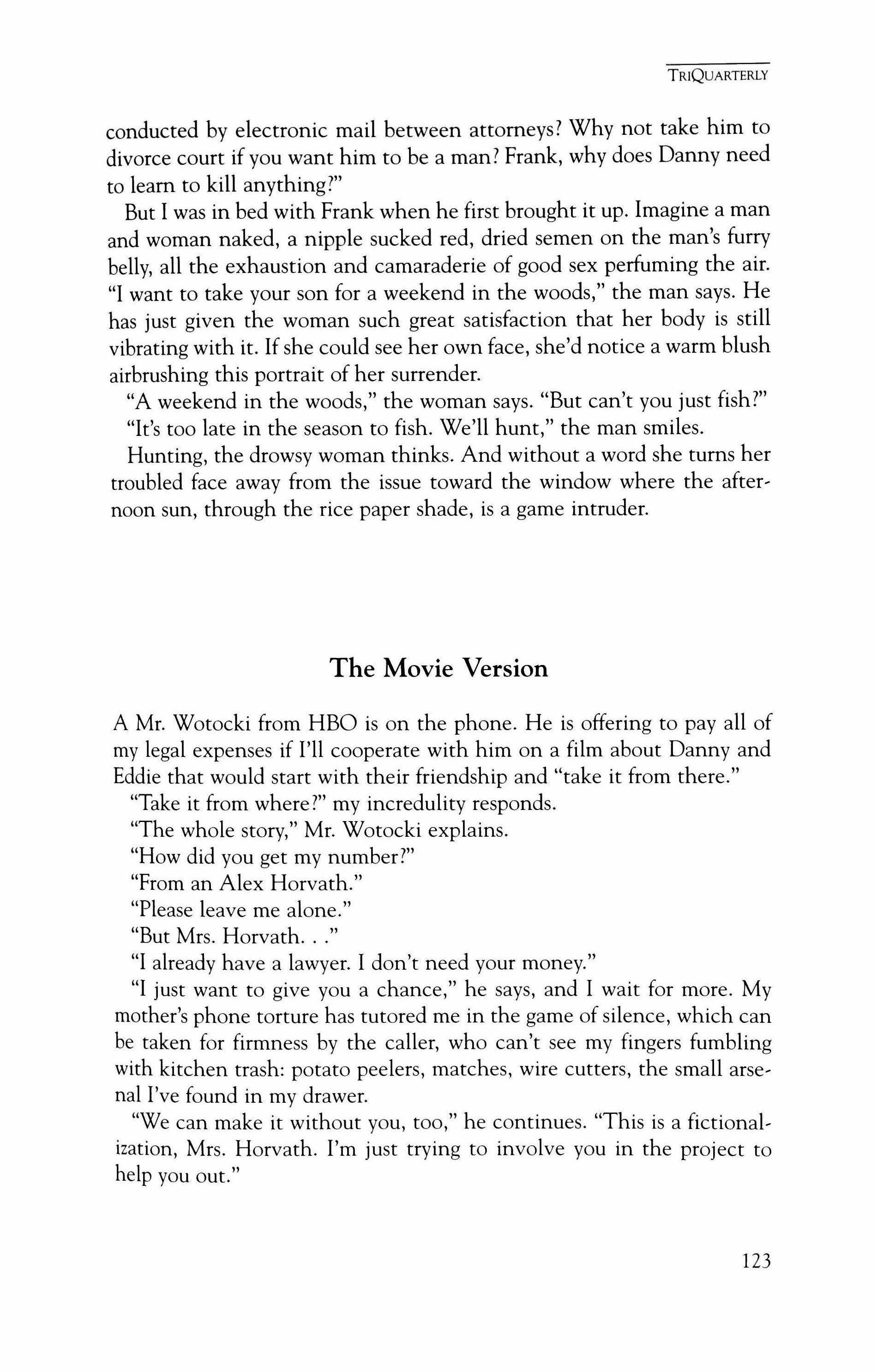
conducted by electronic mail between attorneys? Why not take him to divorce court if you want him to be a man? Frank, why does Danny need to learn to kill anything?"
But I was in bed with Frank when he first brought it up. Imagine a man and woman naked, a nipple sucked red, dried semen on the man's furry belly, all the exhaustion and camaraderie of good sex perfuming the air. "I want to take your son for a weekend in the woods," the man says. He has just given the woman such great satisfaction that her body is still vibrating with it. If she could see her own face, she'd notice a warm blush airbrushing this portrait of her surrender.
"A weekend in the woods," the woman says. "But can't you just fish?"
"It's too late in the season to fish. We'll hunt," the man smiles.
Hunting, the drowsy woman thinks. And without a word she turns her troubled face away from the issue toward the window where the afternoon sun, through the rice paper shade, is a game intruder.
The Movie Version
A Mr. Wotocki from HBO is on the phone. He is offering to pay all of my legal expenses if I'll cooperate with him on a film about Danny and Eddie that would start with their friendship and "take it from there."
"Take it from where?" my incredulity responds.
"The whole story," Mr. Wotocki explains.
"How did you get my number?"
"From an Alex Horvath."
"Please leave me alone."
"But Mrs. Horvath
"I already have a lawyer. I don't need your money."
"I just want to give you a chance," he says, and I wait for more. My mother's phone torture has tutored me in the game of silence, which can be taken for firmness by the caller, who can't see my fingers fumbling with kitchen trash: potato peelers, matches, wire cutters, the small arsenal I've found in my drawer.
"We can make it without you, too," he continues. "This is a fictionalization, Mrs. Horvath. I'm just trying to involve you in the project to help you out."
TRIQUARTERLY
123
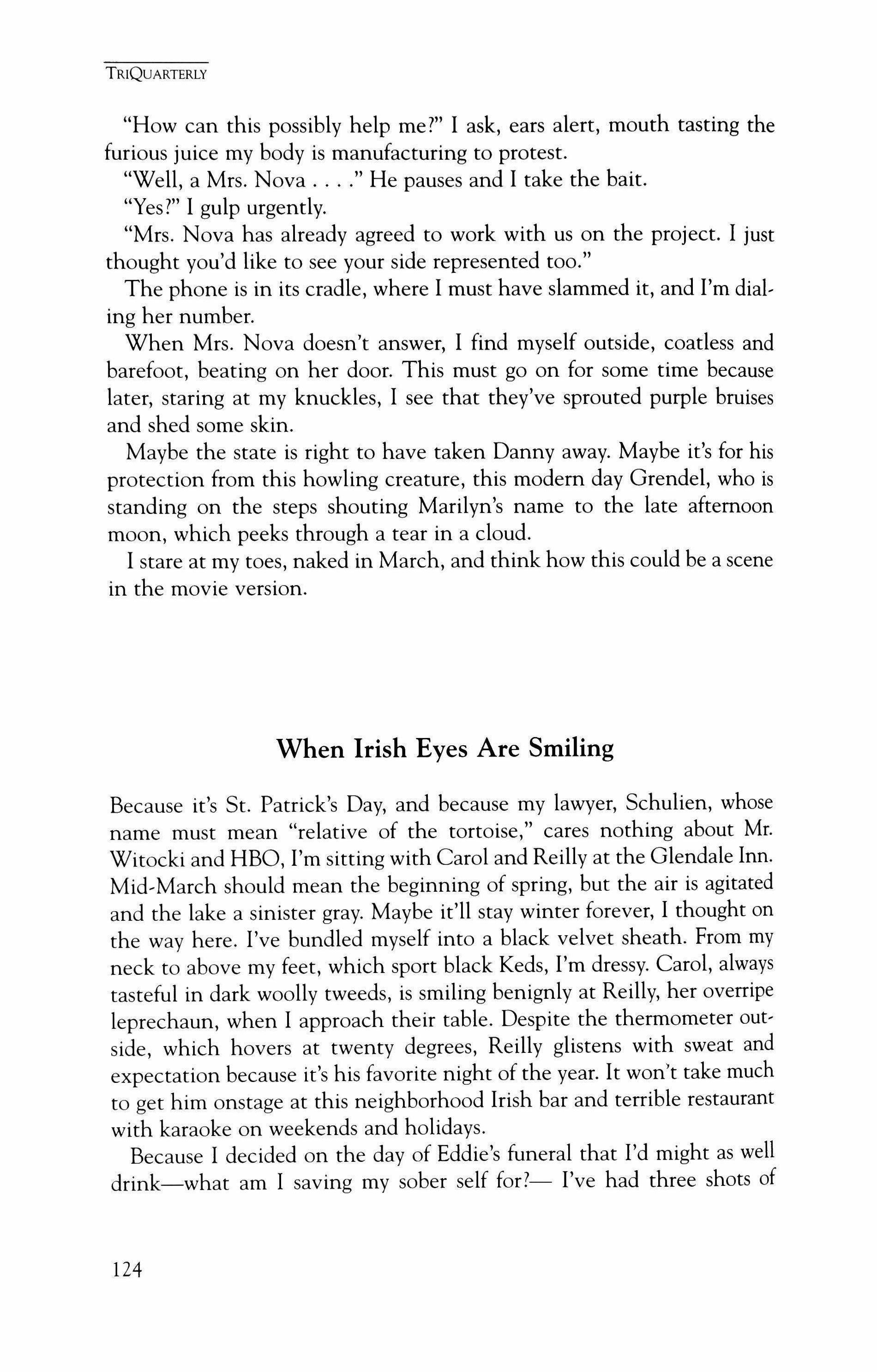
TRIQUARTERLY
"How can this possibly help me?" I ask, ears alert, mouth tasting the furious juice my body is manufacturing to protest.
"Well, a Mrs. Nova He pauses and I take the bait.
"Yes?" I gulp urgently.
"Mrs. Nova has already agreed to work with us on the project. I just thought you'd like to see your side represented too."
The phone is in its cradle, where I must have slammed it, and I'm dialing her number.
When Mrs. Nova doesn't answer, I find myself outside, coatless and barefoot, beating on her door. This must go on for some time because later, staring at my knuckles, I see that they've sprouted purple bruises and shed some skin.
Maybe the state is right to have taken Danny away. Maybe it's for his protection from this howling creature, this modern day Grendel, who is standing on the steps shouting Marilyn's name to the late afternoon moon, which peeks through a tear in a cloud.
I stare at my toes, naked in March, and think how this could be a scene in the movie version.
When Irish Eyes Are Smiling
Because it's St. Patrick's Day, and because my lawyer, Schulien, whose name must mean "relative of the tortoise," cares nothing about Mr. Witocki and HBO, I'm sitting with Carol and Reilly at the Glendale Inn. Mid-March should mean the beginning of spring, but the air is agitated and the lake a sinister gray. Maybe it'll stay winter forever, I thought on the way here. I've bundled myself into a black velvet sheath. From my neck to above my feet, which sport black Keds, I'm dressy. Carol, always tasteful in dark woolly tweeds, is smiling benignly at Reilly, her overripe leprechaun, when I approach their table. Despite the thermometer outside, which hovers at twenty degrees, Reilly glistens with sweat and expectation because it's his favorite night of the year. It won't take much to get him onstage at this neighborhood Irish bar and terrible restaurant with karaoke on weekends and holidays.
Because I decided on the day of Eddie's funeral that I'd might as well drink-what am I saving my sober self for?- I've had three shots of
124
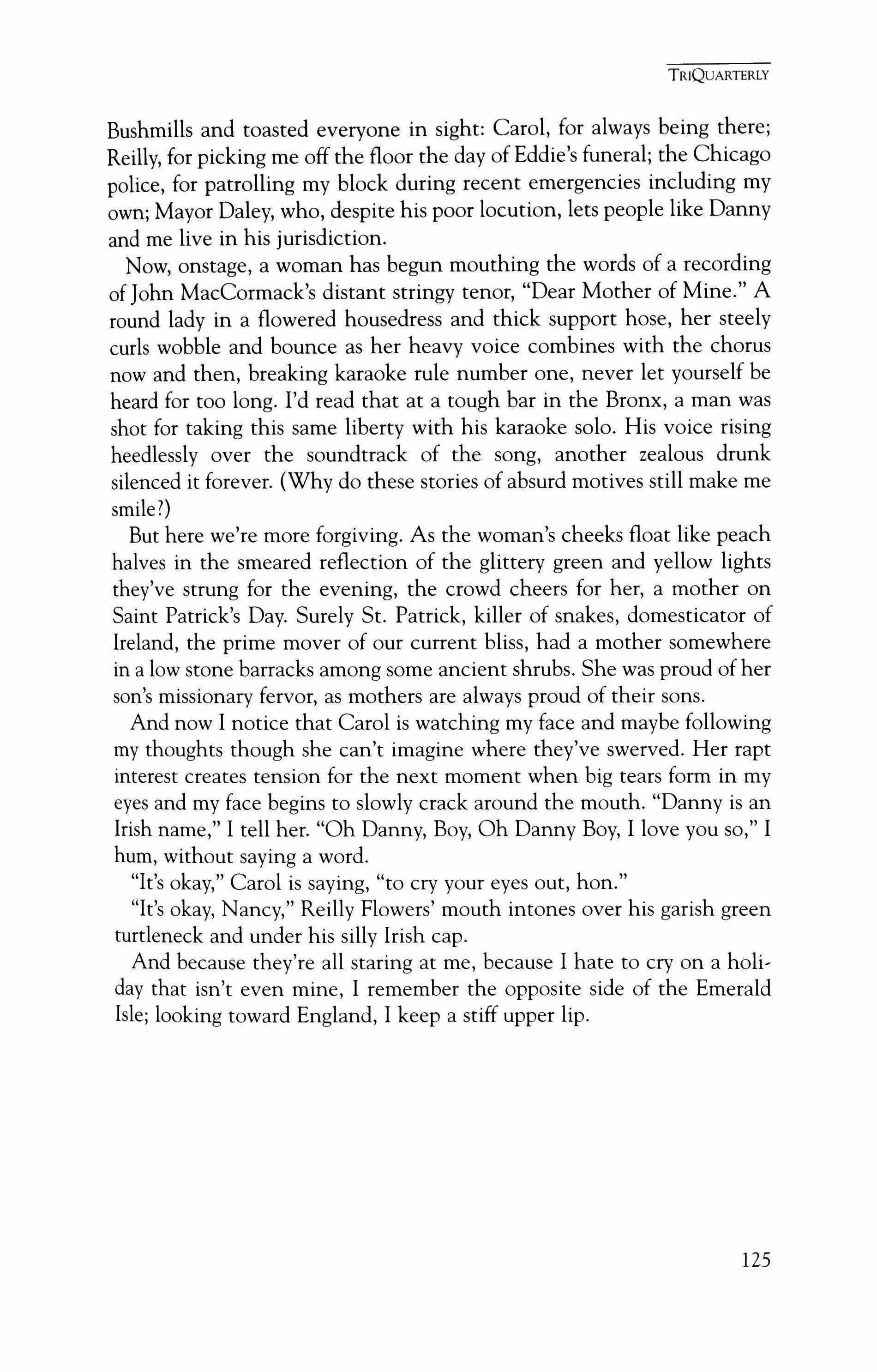
Bushmills and toasted everyone in sight: Carol, for always being there; Reilly, for picking me off the floor the day of Eddie's funeral; the Chicago police, for patrolling my block during recent emergencies including my own; Mayor Daley, who, despite his poor locution, lets people like Danny and me live in his jurisdiction.
Now, onstage, a woman has begun mouthing the words of a recording of John MacCormack's distant stringy tenor, "Dear Mother of Mine." A round lady in a flowered housedress and thick support hose, her steely curls wobble and bounce as her heavy voice combines with the chorus now and then, breaking karaoke rule number one, never let yourself be heard for too long. I'd read that at a tough bar in the Bronx, a man was shot for taking this same liberty with his karaoke solo. His voice rising heedlessly over the soundtrack of the song, another zealous drunk silenced it forever. (Why do these stories of absurd motives still make me smile?)
But here we're more forgiving. As the woman's cheeks float like peach halves in the smeared reflection of the glittery green and yellow lights they've strung for the evening, the crowd cheers for her, a mother on Saint Patrick's Day. Surely St. Patrick, killer of snakes, domesticator of Ireland, the prime mover of our current bliss, had a mother somewhere in a low stone barracks among some ancient shrubs. She was proud of her son's missionary fervor, as mothers are always proud of their sons.
And now I notice that Carol is watching my face and maybe following my thoughts though she can't imagine where they've swerved. Her rapt interest creates tension for the next moment when big tears form in my eyes and my face begins to slowly crack around the mouth. "Danny is an Irish name," I tell her. "Oh Danny, Boy, Oh Danny Boy, I love you so," I hum, without saying a word.
"It's okay," Carol is saying, "to cry your eyes out, hon."
"It's okay, Nancy," Reilly Flowers' mouth intones over his garish green turtleneck and under his silly Irish cap.
And because they're all staring at me, because I hate to cry on a holiday that isn't even mine, I remember the opposite side of the Emerald Isle; looking toward England, I keep a stiff upper lip.
TRIQUARTERLY
125
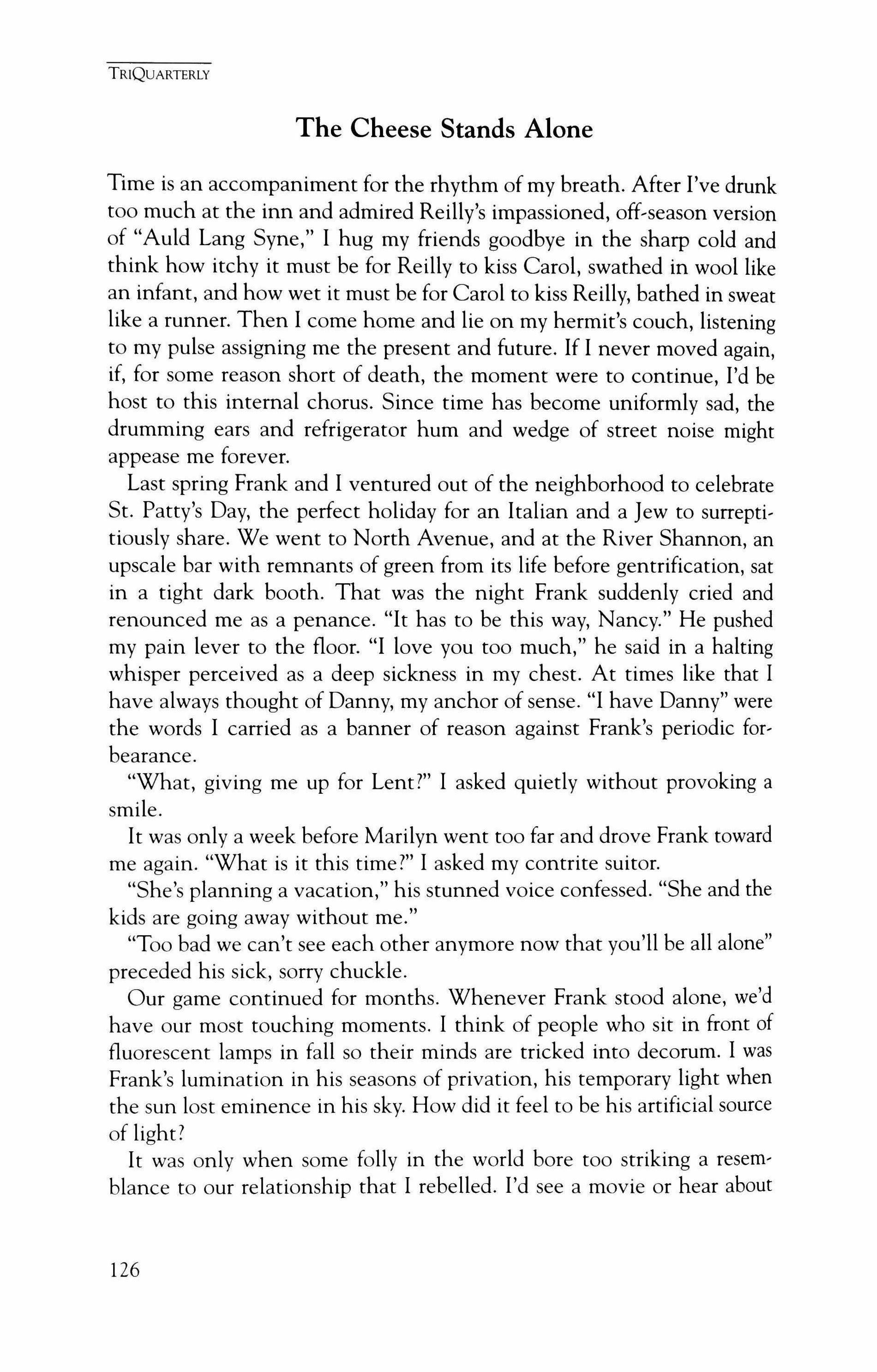
The Cheese Stands Alone
Time is an accompaniment for the rhythm of my breath. After I've drunk too much at the inn and admired Reilly's impassioned, off-season version of "Auld Lang Syne," I hug my friends goodbye in the sharp cold and think how itchy it must be for Reilly to kiss Carol, swathed in wool like an infant, and how wet it must be for Carol to kiss Reilly, bathed in sweat like a runner. Then I come home and lie on my hermit's couch, listening to my pulse assigning me the present and future. If I never moved again, if, for some reason short of death, the moment were to continue, I'd be host to this internal chorus. Since time has become uniformly sad, the drumming ears and refrigerator hum and wedge of street noise might appease me forever.
Last spring Frank and I ventured out of the neighborhood to celebrate St. Patty's Day, the perfect holiday for an Italian and a Jew to surreptitiously share. We went to North Avenue, and at the River Shannon, an upscale bar with remnants of green from its life before gentrification, sat in a tight dark booth. That was the night Frank suddenly cried and renounced me as a penance. "It has to be this way, Nancy." He pushed my pain lever to the floor. "I love you too much," he said in a halting whisper perceived as a deep sickness in my chest. At times like that I have always thought of Danny, my anchor of sense. "I have Danny" were the words I carried as a banner of reason against Frank's periodic forbearance.
"What, giving me up for Lent?" I asked quietly without provoking a smile.
It was only a week before Marilyn went too far and drove Frank toward me again. "What is it this time?" I asked my contrite suitor.
"She's planning a vacation," his stunned voice confessed. "She and the kids are going away without me."
"Too bad we can't see each other anymore now that you'll be all alone" preceded his sick, sorry chuckle.
Our game continued for months. Whenever Frank stood alone, we'd have our most touching moments. I think of people who sit in front of fluorescent lamps in fall so their minds are tricked into decorum. I was Frank's lumination in his seasons of privation, his temporary light when the sun lost eminence in his sky. How did it feel to be his artificial source of light?
It was only when some folly in the world bore too striking a resemblance to our relationship that I rebelled. I'd see a movie or hear about
TRIQUARTERLY
126
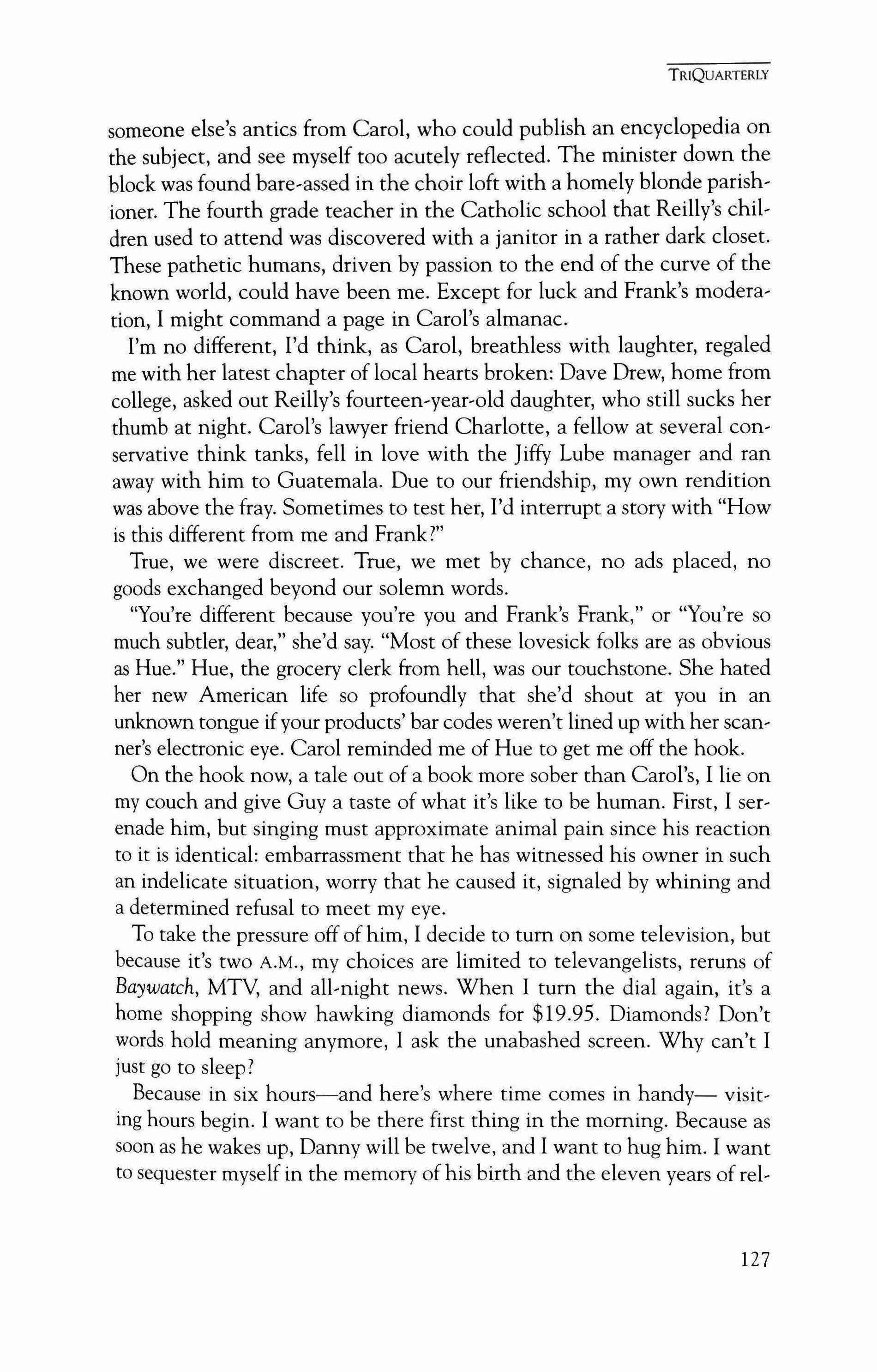
someone else's antics from Carol, who could publish an encyclopedia on the subject, and see myself too acutely reflected. The minister down the block was found bare-assed in the choir loft with a homely blonde parish, ioner. The fourth grade teacher in the Catholic school that Reilly's children used to attend was discovered with a janitor in a rather dark closet. These pathetic humans, driven by passion to the end of the curve of the known world, could have been me. Except for luck and Frank's moderation, I might command a page in Carol's almanac.
I'm no different, I'd think, as Carol, breathless with laughter, regaled me with her latest chapter of local hearts broken: Dave Drew, home from college, asked out Reilly's fourteen-year-old daughter, who still sucks her thumb at night. Carol's lawyer friend Charlotte, a fellow at several con' servative think tanks, fell in love with the Jiffy Lube manager and ran away with him to Guatemala. Due to our friendship, my own rendition was above the fray. Sometimes to test her, I'd interrupt a story with "How is this different from me and Frank?"
True, we were discreet. True, we met by chance, no ads placed, no goods exchanged beyond our solemn words.
"You're different because you're you and Frank's Frank," or "You're so much subtler, dear," she'd say. "Most of these lovesick folks are as obvious as Hue." Hue, the grocery clerk from hell, was our touchstone. She hated her new American life so profoundly that she'd shout at you in an unknown tongue if your products' bar codes weren't lined up with her scan, ner's electronic eye. Carol reminded me of Hue to get me off the hook.
On the hook now, a tale out of a book more sober than Carol's, I lie on my couch and give Guy a taste of what it's like to be human. First, I serenade him, but singing must approximate animal pain since his reaction to it is identical: embarrassment that he has witnessed his owner in such an indelicate situation, worry that he caused it, signaled by whining and a determined refusal to meet my eye.
To take the pressure off ofhim, I decide to tum on some television, but because it's two A.M., my choices are limited to televangelists, reruns of Baywatch, MTV, and all-night news. When I tum the dial again, it's a home shopping show hawking diamonds for $19.95. Diamonds? Don't words hold meaning anymore, I ask the unabashed screen. Why can't I just go to sleep?
Because in six hours-and here's where time comes in handy- visit, ing hours begin. I want to be there first thing in the morning. Because as soon as he wakes up, Danny will be twelve, and I want to hug him. I want to sequester myself in the memory of his birth and the eleven years of rel-
TRIQUARTERLY
127
ative peace that followed. "How did you know to have me on my birthday!" my clever boy, aged four, once asked his grinning mother, who mussed his hair and gulped in his fearless laugh.
Fearlessness comes of innocence. Now there are dejected monosyllables and pleas to be forgotten: "Don't buy me anything," Danny told me on the phone. But I went to the bookstore and found him a few things: a book of Escher drawings and colored pencils, an atlas of the world, and a leatherbound copy of To Kill a Mockingbird: peace, hope, and justice all in red, shiny wrapping for my son who is twelve today, for my son who no longer is guiltless, for my son who has done the most awful thing a person can do.
I tum off the television and wind the comforter around my legs. Blanket, I rechristen the useless thing.
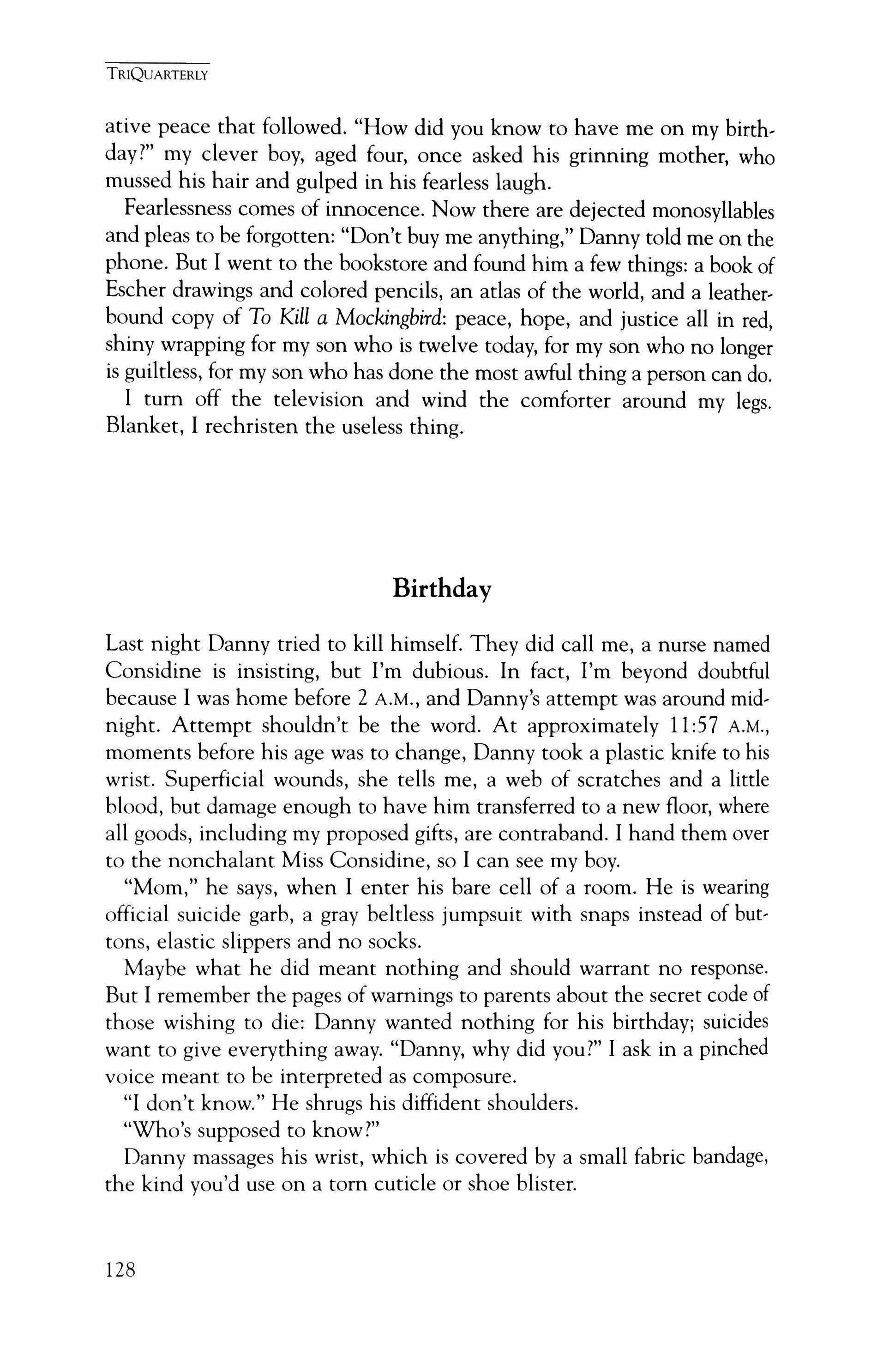
Birthday
Last night Danny tried to kill himself. They did call me, a nurse named Considine is insisting, but I'm dubious. In fact, I'm beyond doubtful because I was home before 2 A.M., and Danny's attempt was around midnight. Attempt shouldn't be the word. At approximately 11:57 A.M., moments before his age was to change, Danny took a plastic knife to his wrist. Superficial wounds, she tells me, a web of scratches and a little blood, but damage enough to have him transferred to a new floor, where all goods, including my proposed gifts, are contraband. I hand them over to the nonchalant Miss Considine, so I can see my boy.
"Mom," he says, when I enter his bare cell of a room. He is wearing official suicide garb, a gray beltless jumpsuit with snaps instead of buttons, elastic slippers and no socks.
Maybe what he did meant nothing and should warrant no response. But I remember the pages of warnings to parents about the secret code of those wishing to die: Danny wanted nothing for his birthday; suicides want to give everything away. "Danny, why did you!" I ask in a pinched voice meant to be interpreted as composure.
"I don't know." He shrugs his diffident shoulders.
"Who's supposed to know!"
Danny massages his wrist, which is covered by a small fabric bandage, the kind you'd use on a tom cuticle or shoe blister.
TRIQUARTERLY
128
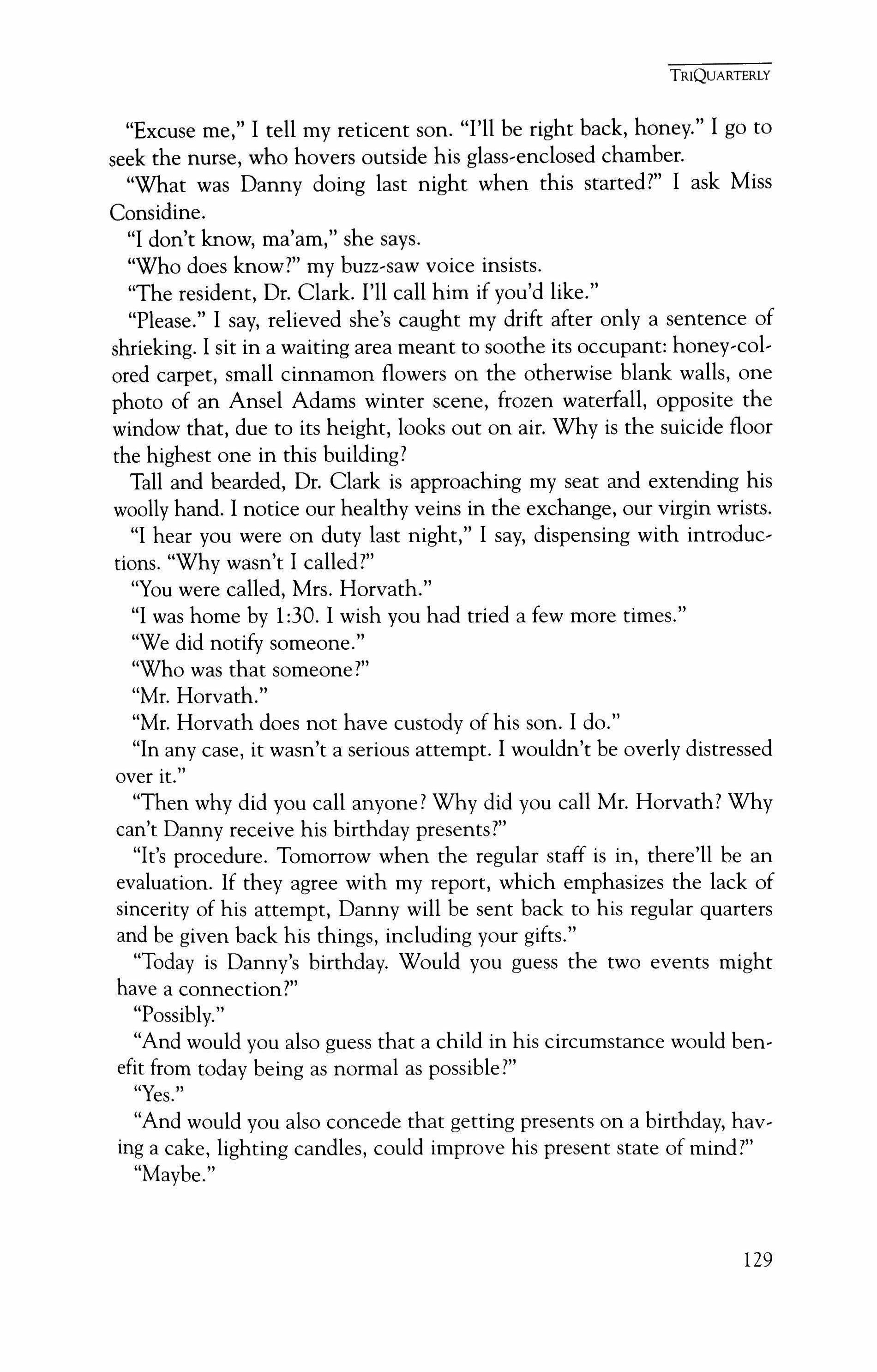
"Excuse me," I tell my reticent son. "I'll be right back, honey." I go to seek the nurse, who hovers outside his glass-enclosed chamber.
"What was Danny doing last night when this started?" I ask Miss Considine.
"I don't know, ma'am," she says.
"Who does know?" my buzz-saw voice insists.
"The resident, Dr. Clark. I'll call him if you'd like."
"Please." I say, relieved she's caught my drift after only a sentence of shrieking. I sit in a waiting area meant to soothe its occupant: honey-colored carpet, small cinnamon flowers on the otherwise blank walls, one photo of an Ansel Adams winter scene, frozen waterfall, opposite the window that, due to its height, looks out on air. Why is the suicide floor the highest one in this building?
Tall and bearded, Dr. Clark is approaching my seat and extending his woolly hand. I notice our healthy veins in the exchange, our virgin wrists.
"I hear you were on duty last night," I say, dispensing with introductions. "Why wasn't I called?"
"You were called, Mrs. Horvath."
"I was home by 1:30. I wish you had tried a few more times."
"We did notify someone."
"Who was that someone?"
"Mr. Horvath."
"Mr. Horvath does not have custody of his son. I do."
"In any case, it wasn't a serious attempt. I wouldn't be overly distressed over it."
"Then why did you call anyone? Why did you call Mr. Horvath? Why can't Danny receive his birthday presents?"
"It's procedure. Tomorrow when the regular staff is in, there'll be an evaluation. If they agree with my report, which emphasizes the lack of sincerity of his attempt, Danny will be sent back to his regular quarters and be given back his things, including your gifts."
"Today is Danny's birthday. Would you guess the two events might have a connection?"
"P iblv."OSSl y.
"And would you also guess that a child in his circumstance would benefit from today being as normal as possible?"
"V res.
"And would you also concede that getting presents on a birthday, having a cake, lighting candles, could improve his present state of mind?" "Maybe."
TRIQUARTERLY
129

TRIQUARTERLY
"Than let me give him his presents, for heaven's sakes. Let me have lunch with him and put this little candle in whatever dessert we're given. Don't take his birthday away, please."
"I wish I could cooperate fully, but we're bound by procedure. He can't have the gifts, but you can eat lunch together and light the candle as long as there's supervision in the room."
"I'm his mother. Isn't he safe with me?"
"Mrs. Horvath, we're burdened with rules that don't make too much sense at times. This is one of them," Dr. Clark smiles meekly.
Back in the glass suite under the eyes of bored nurse Considine who must hate to work Sundays, I've stuck a blue candle into Danny's wobbly [ell-O. I take the matches from my purse and wonder why I haven't been searched more completely, given their precautions. We watch the small fire sway as we breathe gravely in its direction. "Happy birthday, kid," I whisper to keep the celebration private. "I'll get you your presents tomorrow if I have to sneak them in under my coat," I smile.
"I didn't want presents, Mom." Exasperation fuels his words.
"Danny, I know what you said. I know what happened and how you feel, but if you're ever going to get out of here, you're going to have to make a choice."
"What do you mean?" he asks with small inquisitive eyes.
"You're going to have to stop screwing around with knives, even little plastic ones, and show these people you can stand to live."
I'm crying and shaking like it's the tundra here, and Danny is trembling too.
"C'mon," I say, "I have an idea." I lead with my body across the room. Miss Considine looks up. She must wonder about our destination in this twelve foot square. Dumbly, Danny follows me to the sealed window, where we observe the dirty snow fringing the parking lot and beyond it, the naked trees and lake. When my Australian friends visited last winter, they couldn't believe that it was frozen in February. Today, the ice is melting in tweedy patches about 100 feet from shore.
"See? It's almost spring out there, Danny. I want you out of here and back in that world soon."
"Don't you remember?"
"Remember what?"
"Eddie."
"I know, honey."
"Well?"
130
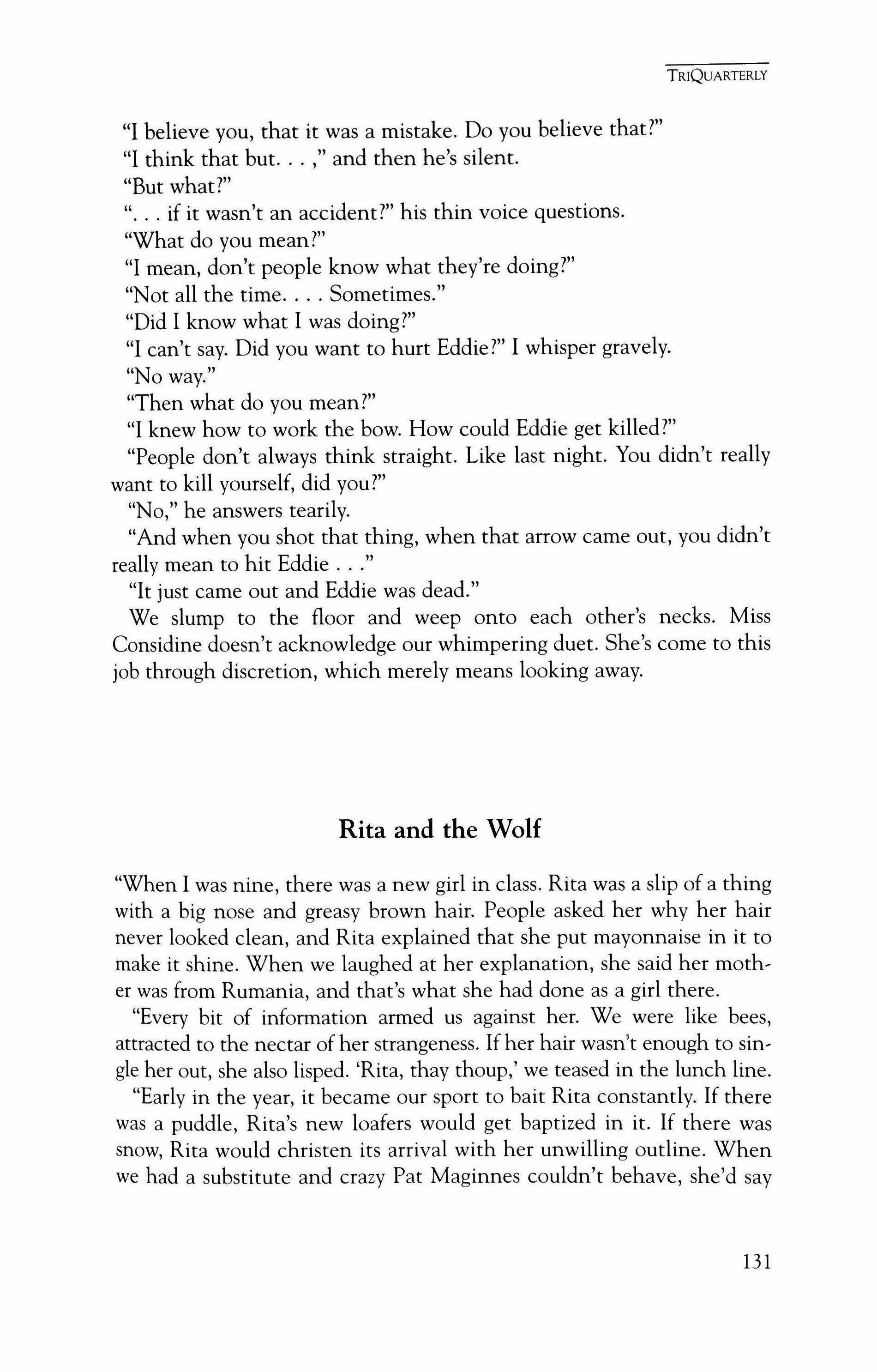
"I believe you, that it was a mistake. Do you believe that?"
"I think that but ," and then he's silent.
"But what?"
if it wasn't an accident?" his thin voice questions. "What do you mean?"
"I mean, don't people know what they're doing?"
"Not all the time Sometimes."
"Did I know what I was doing?"
"I can't say. Did you want to hurt Eddie?" I whisper gravely.
"No way."
"Then what do you mean?"
"I knew how to work the bow. How could Eddie get killed?"
"People don't always think straight. Like last night. You didn't really want to kill yourself, did you?"
"No," he answers tearily.
"And when you shot that thing, when that arrow came out, you didn't really mean to hit Eddie
"It just came out and Eddie was dead."
We slump to the floor and weep onto each other's necks. Miss Considine doesn't acknowledge our whimpering duet. She's come to this job through discretion, which merely means looking away.
Rita and the Wolf
"When I was nine, there was a new girl in class. Rita was a slip of a thing with a big nose and greasy brown hair. People asked her why her hair never looked clean, and Rita explained that she put mayonnaise in it to make it shine. When we laughed at her explanation, she said her mother was from Rumania, and that's what she had done as a girl there.
"Every bit of information armed us against her. We were like bees, attracted to the nectar of her strangeness. If her hair wasn't enough to single her out, she also lisped. 'Rita, thay thoup,' we teased in the lunch line.
"Early in the year, it became our sport to bait Rita constantly. If there was a puddle, Rita's new loafers would get baptized in it. If there was snow, Rita would christen its arrival with her unwilling outline. When we had a substitute and crazy Pat Maginnes couldn't behave, she'd say
TRIQUARTERLY
131
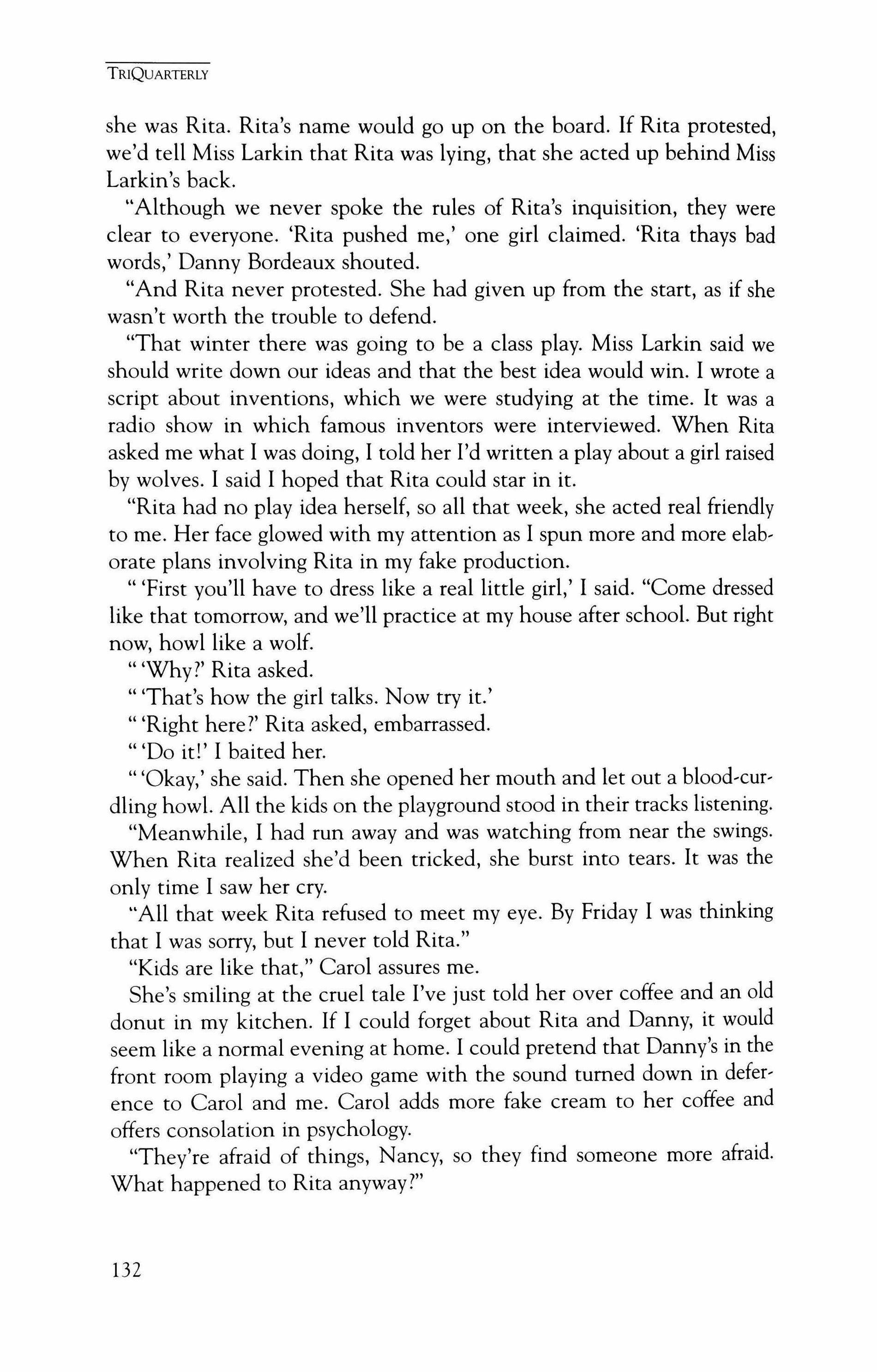
TRIQUARTERLY
she was Rita. Rita's name would go up on the board. If Rita protested, we'd tell Miss Larkin that Rita was lying, that she acted up behind Miss Larkin's back.
"Although we never spoke the rules of Rita's inquisition, they were clear to everyone. 'Rita pushed me,' one girl claimed. 'Rita thays bad words,' Danny Bordeaux shouted.
"And Rita never protested. She had given up from the start, as if she wasn't worth the trouble to defend.
"That winter there was going to be a class play. Miss Larkin said we should write down our ideas and that the best idea would win. I wrote a script about inventions, which we were studying at the time. It was a radio show in which famous inventors were interviewed. When Rita asked me what I was doing, I told her I'd written a play about a girl raised by wolves. I said I hoped that Rita could star in it.
"Rita had no play idea herself, so all that week, she acted real friendly to me. Her face glowed with my attention as I spun more and more elaborate plans involving Rita in my fake production.
'First you'll have to dress like a real little girl,' I said. "Come dressed like that tomorrow, and we'll practice at my house after school. But right now, howl like a wolf.
"'Why?' Rita asked.
'That's how the girl talks. Now try it.'
'Right here?' Rita asked, embarrassed.
'((Do it!' I baited her.
"'Okay,' she said. Then she opened her mouth and let out a blood-curdling howl. All the kids on the playground stood in their tracks listening.
"Meanwhile, I had run away and was watching from near the swings. When Rita realized she'd been tricked, she burst into tears. It was the only time I saw her cry.
"All that week Rita refused to meet my eye. By Friday I was thinking that I was sorry, but I never told Rita."
"Kids are like that," Carol assures me.
She's smiling at the cruel tale I've just told her over coffee and an old donut in my kitchen. If I could forget about Rita and Danny, it would seem like a normal evening at home. I could pretend that Danny's in the front room playing a video game with the sound turned down in deference to Carol and me. Carol adds more fake cream to her coffee and offers consolation in psychology.
"They're afraid of things, Nancy, so they find someone more afraid. What happened to Rita anyway?"
132
"Her father died, and they moved away." My own story has depressed me and led me back to my only theme. "Was Danny afraid?"
"Was Danny ever afraid?" she mocks. "Isn't everyone? Remember when Nan stuttered? When she slouched like a noodle? When she would answer by nodding her head? When her scowl was permanent? Every kid is afraid. Well, so what?"
"So everything. I keep thinking about Rita. My parents were angry people. They made me nervous. I took it out on Rita for no good reason at all." I wish I smoked. I'd have a cigarette now. I am left to hair tugging and hand wringing, which I'm turning into an art form.
"And Danny had a good reason? Is that your point?"
"I don't know, Carol. I just think about it. Who wouldn't?"
"Well, I wouldn't worry, Nancy. Danny liked Eddie, and he was happy that you and Frank "
"Me and Frank what?"
"He was happy that Frank was so fond of you."
"Danny knew about me and Frank?" I hear my breath wheezing. We are back in the amphitheater of my fears. "No."
"He told me you were seeing Frank, Nancy. I assumed you knew."
"What did he say exactly?"
"He said that Eddie's mom didn't like Frank and that she didn't care if you were his friend."
"And who told him that?"
"Eddie, I'd guess. Or Marilyn, from what I know of her. She was pretty outspoken, wasn't she? I thought nothing of it at the time."
"Should I tell Schulien?"
"I'd tell him anything that might help Danny."
"Will this help Danny, Carol?"
"I can't see how," she says, offering me a commiserating little scowl over her coffee cup.
The Story
What is the story and what isn't? A boy shoots another boy. One boy dies. That could be the story if there were no reason for more. Or, simpler still. A boy is dead. Another isn't. Even more clean, more factual.
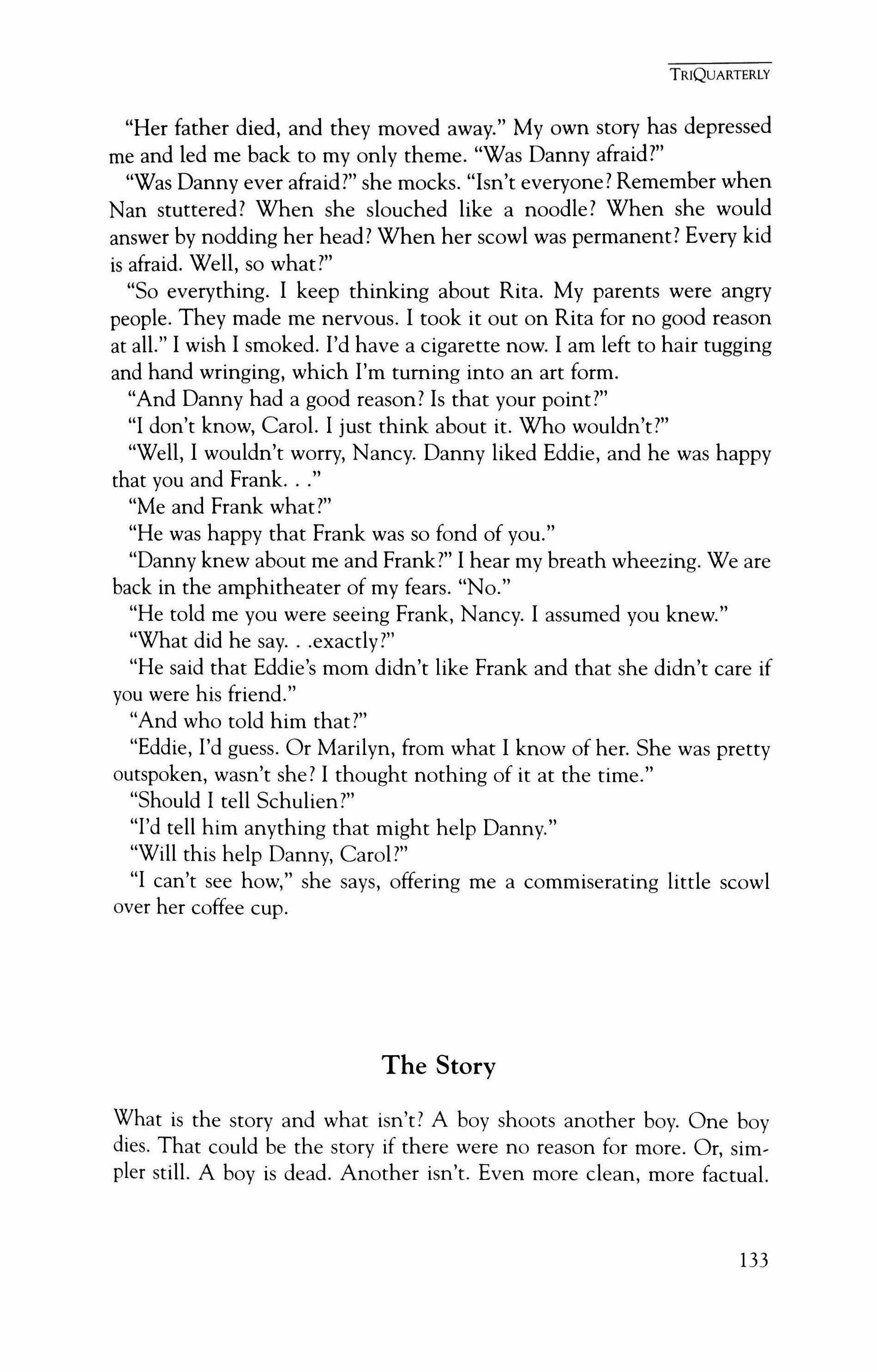
133
TRIQUARTERLY
TRIQUARTERLY

But facts have a way of tripping over themselves on their way to being understood. Why did the boy shoot? Was there something the boy knew that was troubling him? Did he aim at more than his target? What did he kill?
Two answers to everything, a plot that can be read like one of those comics that tells one story as you read it front to back, another when you turn it upside down and read it back to front.
A guiltless child accidentally shoots another. It is terrible. It causes great suffering. All feel the loss.
Or, a child wanting revenge for the unfairness of circumstance lashes out. The object of his anger is related to the cause of his pain. He is fatherless. The other child has a father. He wants that father.
And his mother has that father for herself.
He knows what grown-ups do. He's seen his mother leave late at night in a car without headlights. He's seen her pretend distance between herself and the man who touches her breasts. He's heard her furtive calls late at night after she's supervised his bedtime hygiene and tucked him in. What does she think she's doing sneaking around like a spy? Who is she fooling?
In one maneuver he can end all this irony by causing more pain. He can hurt people more than he's ever been hurt. He can have power beyond all the liars and hypocrites who say they love him. Really one liar, one hypocrite.
Mom, I shot Eddie. What?
Look in the front room.
What are you saying?
Just look.
Before her, incontrovertible, the evidence. The boy has been good. He has told the truth. The body is too pale to hope for a lie.
If it were just a story, the boy thinks. If it were just a story, the boy wishes as soon as it's done.
If only I hadn't known the man, the mother thinks. If only I had been perfectly pure.
134

Talk Show
"Tum on channel thirty-two," Carol says, "and call me later."
I tune in during a commercial for toilet tissue. Some products are so basic, what's the point of advertising, but, oh well. Then Kathy Lee sings about a cruise to the Caribbean. At this point in my life, I'd love to take me and Danny on a cruise to most anywhere. Once we went to Hawaii for Christmas. Just smelling the air was a gift.
After the theme song, the guests are reintroduced, and before words become necessary, I see Marilyn. The subject is mothers who have lost their children to violence, and Carol has cued me in to her quarter of an hour.
Marilyn looks good. She's tipped her hair again and is wearing a little black dress with a red scarf. She's listening with wide eyes as Jerry Spitzer recreates Eddie's death.
"And then your husband got a call from next door, is that correct?"
"Yes," she barely speaks.
"And who was that, Marilyn?"
"It was my neighbor, the boy's mother."
"And what did she say?"
"She told him to come over fast, that something had happened."
"And he got there
"They had already gone to the hospital."
"And when you finally arrived at the hospital, what did you see?"
"I saw my son. They told me he was gone."
"And as I shared with the audience before, this was a shooting accident?"
"Right."
"How was it that they were playing with a gun?"
"It was a hunting bow. My husband hunts and he took the children. Eddie my son brought it next door and then
Marilyn is wailing and Jerry Spitzer is patting her back. They pan the audience and I see the mothers of Chicago sharing her grief.
"Now, I know this is hard, Mrs. Nova, but can you go on?"
"They were playing a game," she sobs.
"And where did the arrow shoot?"
"It hit him in the chest. He died immediately."
"And what has it done to your family?"
"My husband and I are separated. My daughter's in therapy. I never imagined something like this
TRIQUARTERLY
135
TRIQUARTERLY
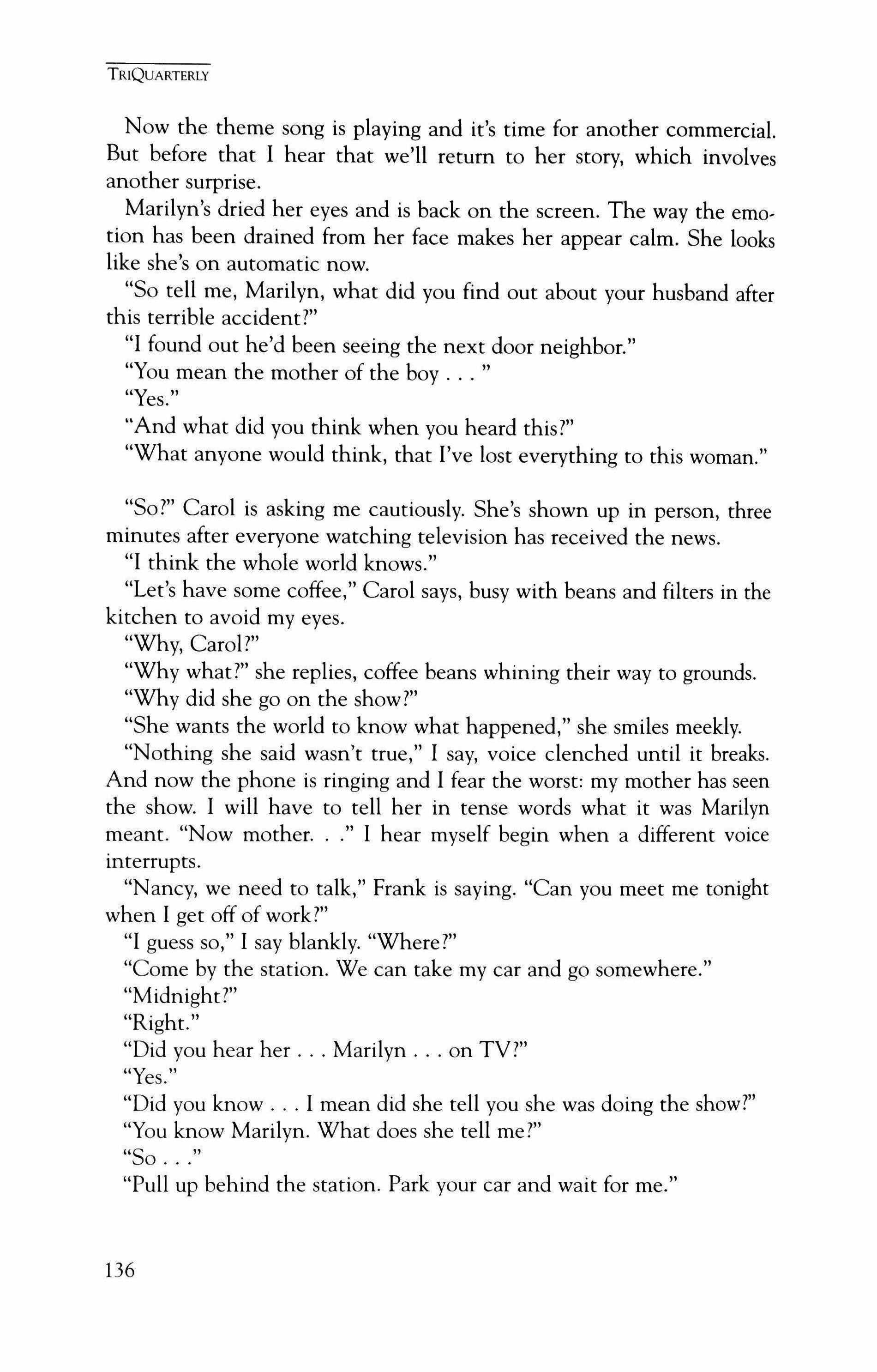
Now the theme song is playing and it's time for another commercial. But before that I hear that we'll return to her story, which involves another surprise.
Marilyn's dried her eyes and is back on the screen. The way the emotion has been drained from her face makes her appear calm. She looks like she's on automatic now.
"So tell me, Marilyn, what did you find out about your husband after this terrible accident?"
"I found out he'd been seeing the next door neighbor."
"You mean the mother of the boy
"Yes.
"And what did you think when you heard this?"
"What anyone would think, that I've lost everything to this woman."
"So?" Carol is asking me cautiously. She's shown up in person, three minutes after everyone watching television has received the news.
"I think the whole world knows."
"Let's have some coffee," Carol says, busy with beans and filters in the kitchen to avoid my eyes.
"Why, Carol?"
"Why what?" she replies, coffee beans whining their way to grounds.
"Why did she go on the show?"
"She wants the world to know what happened," she smiles meekly.
"Nothing she said wasn't true," I say, voice clenched until it breaks. And now the phone is ringing and I fear the worst: my mother has seen the show. I will have to tell her in tense words what it was Marilyn meant. "Now mother I hear myself begin when a different voice interrupts.
"Nancy, we need to talk," Frank is saying. "Can you meet me tonight when I get off of work?"
"I guess so," I say blankly. "Where?"
"Come by the station. We can take my car and go somewhere."
"Midnight?"
"Right.
"Did you hear her Marilyn on TV?"
"Yes.
"Did you know I mean did she tell you she was doing the show?"
"You know Marilyn. What does she tell me?"
"S " 0
"Pull up behind the station. Park your car and wait for me."
136
"Okay," I pause, pulse clanking in my ears.
"You're sure you want to talk to me?"
"Yes."
"Okay."
As simple as that, it's over.
"Who were you whispering to?"
"Joyce, from work," I explain.
There's something about Frank that goes hand in hand with subterfuge. 1 should tell Carol, who knows everything about me: my bra size, 34C; how my left eye gets puffier than my right when I cry; how, when Danny was born, I got carried away with enthusiasm and temporarily quit my job; how Carol's sister Jerrie helped me get it back. I should tell her about Frank-but I don't.
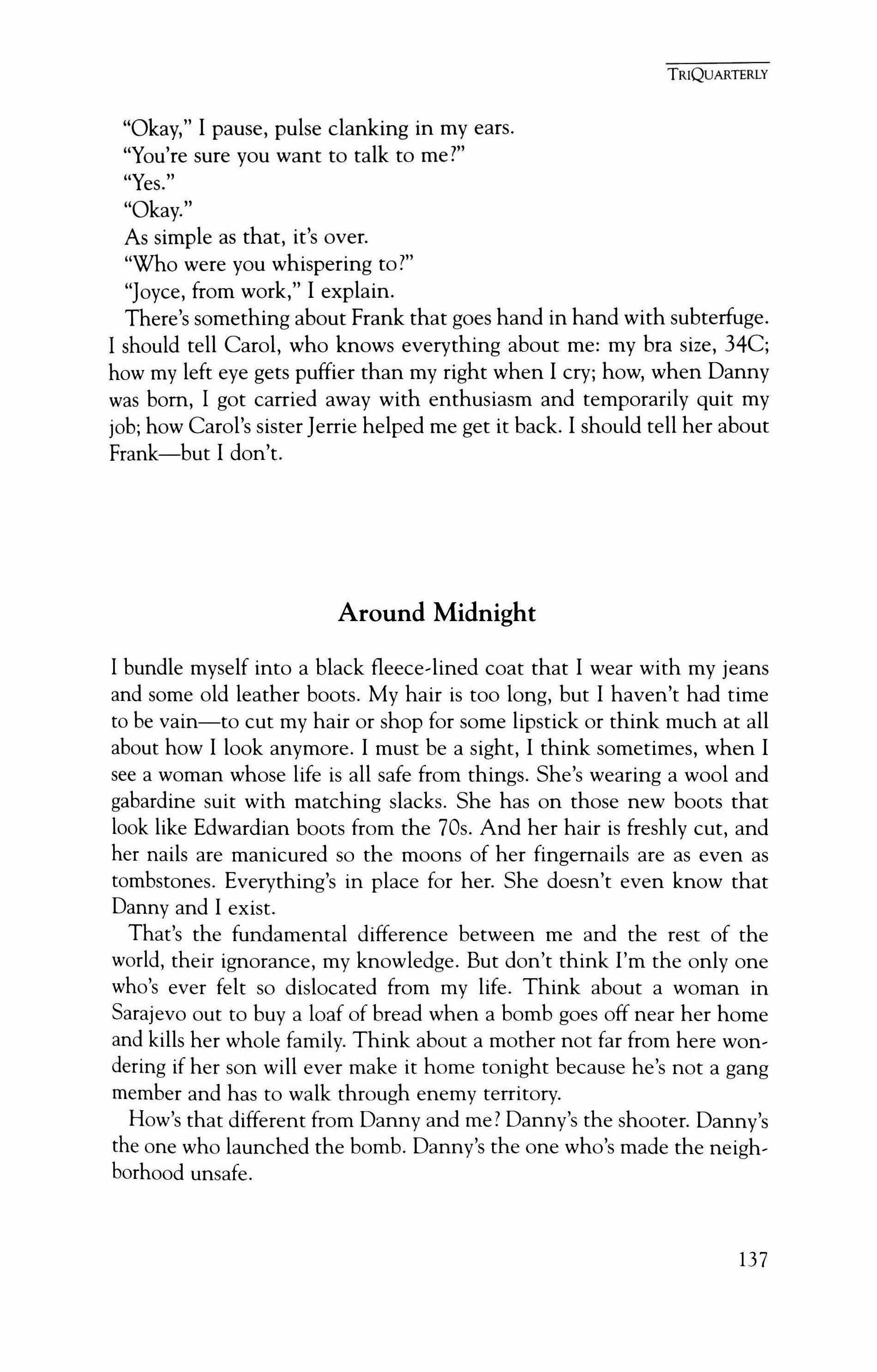
Around Midnight
1 bundle myself into a black fleece-lined coat that I wear with my jeans and some old leather boots. My hair is too long, but I haven't had time to be vain-to cut my hair or shop for some lipstick or think much at all about how 1 look anymore. I must be a sight, I think sometimes, when I see a woman whose life is all safe from things. She's wearing a wool and gabardine suit with matching slacks. She has on those new boots that look like Edwardian boots from the 70s. And her hair is freshly cut, and her nails are manicured so the moons of her fingernails are as even as tombstones. Everything's in place for her. She doesn't even know that Danny and I exist.
That's the fundamental difference between me and the rest of the world, their ignorance, my knowledge. But don't think I'm the only one who's ever felt so dislocated from my life. Think about a woman in Sarajevo out to buy a loaf of bread when a bomb goes off near her home and kills her whole family. Think about a mother not far from here wondering if her son will ever make it home tonight because he's not a gang member and has to walk through enemy territory. How's that different from Danny and me? Danny's the shooter. Danny's the one who launched the bomb. Danny's the one who's made the neighborhood unsafe. 137
TRIQUARTERLY
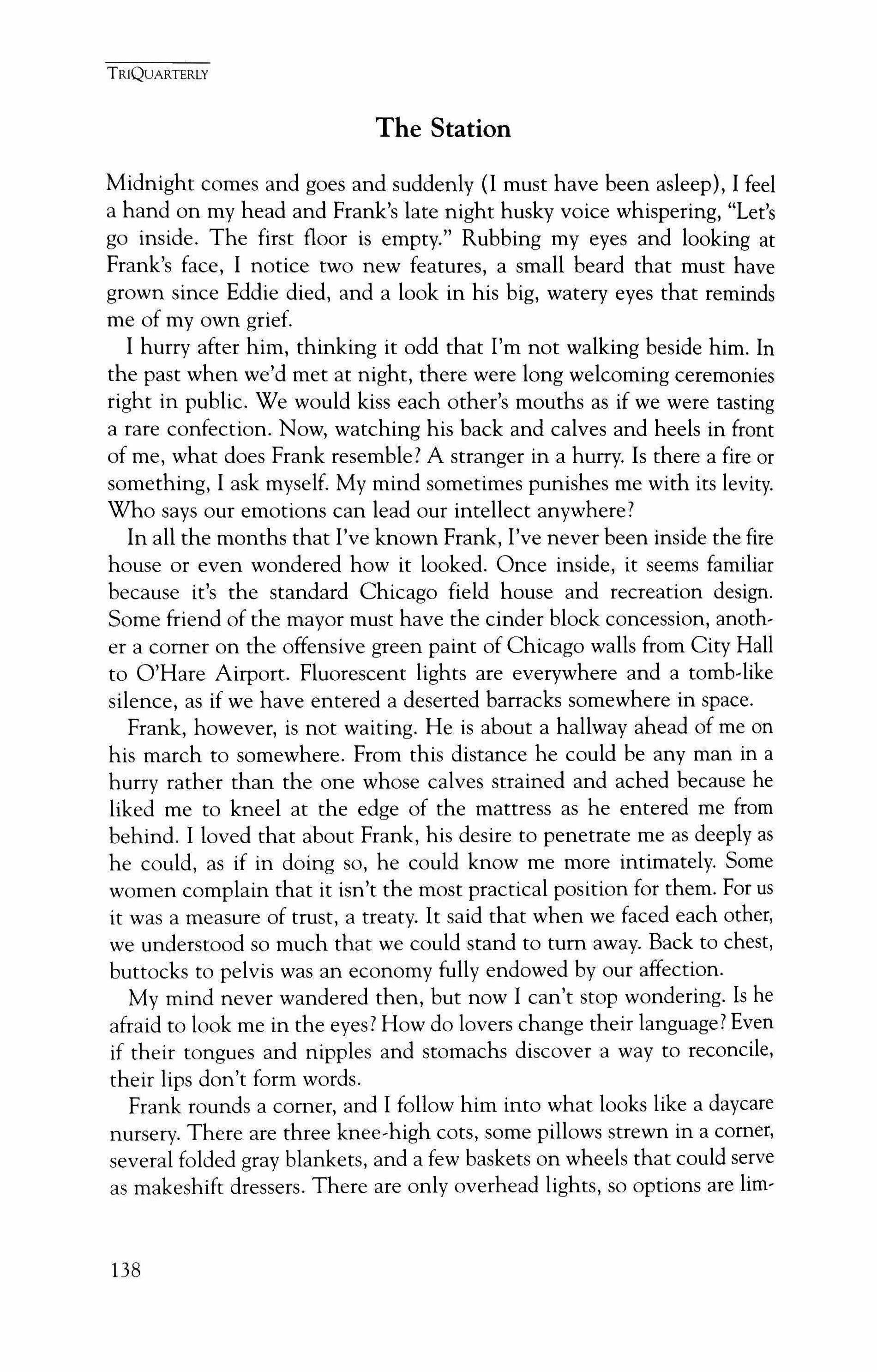
The Station
Midnight comes and goes and suddenly (I must have been asleep), I feel a hand on my head and Frank's late night husky voice whispering, "Let's go inside. The first floor is empty." Rubbing my eyes and looking at Frank's face, I notice two new features, a small beard that must have grown since Eddie died, and a look in his big, watery eyes that reminds me of my own grief.
I hurry after him, thinking it odd that I'm not walking beside him. In the past when we'd met at night, there were long welcoming ceremonies right in public. We would kiss each other's mouths as if we were tasting a rare confection. Now, watching his back and calves and heels in front of me, what does Frank resemble? A stranger in a hurry. Is there a fire or something, I ask myself. My mind sometimes punishes me with its levity. Who says our emotions can lead our intellect anywhere?
In all the months that I've known Frank, I've never been inside the fire house or even wondered how it looked. Once inside, it seems familiar because it's the standard Chicago field house and recreation design. Some friend of the mayor must have the cinder block concession, another a comer on the offensive green paint of Chicago walls from City Hall to O'Hare Airport. Fluorescent lights are everywhere and a tomb-like silence, as if we have entered a deserted barracks somewhere in space. Frank, however, is not waiting. He is about a hallway ahead of me on his march to somewhere. From this distance he could be any man in a hurry rather than the one whose calves strained and ached because he liked me to kneel at the edge of the mattress as he entered me from behind. I loved that about Frank, his desire to penetrate me as deeply as he could, as if in doing so, he could know me more intimately. Some women complain that it isn't the most practical position for them. For us it was a measure of trust, a treaty. It said that when we faced each other, we understood so much that we could stand to tum away. Back to chest, buttocks to pelvis was an economy fully endowed by our affection.
My mind never wandered then, but now I can't stop wondering. Is he afraid to look me in the eyes? How do lovers change their language? Even if their tongues and nipples and stomachs discover a way to reconcile, their lips don't form words.
Frank rounds a comer, and I follow him into what looks like a daycare nursery. There are three knee-high cots, some pillows strewn in a comer, several folded gray blankets, and a few baskets on wheels that could serve as makeshift dressers. There are only overhead lights, so options are lim-
TRIQUARTERLY
138

ited. Frank chooses no light at all, so 1 fumble in the dark squinting in his direction.
In the cloudy dark, which my eyes are bravely combing, 1 see Frank motioning from the farthest comer of the room. "Come here," he says softly. 1 can identify in his voice the static that fills mine whenever 1 think about our doom.
1 glide in his direction but stop short because 1 feel like falling onto his chest and sobbing until 1 have no breath to give, but I'm certain that our new rules forbid such comfort. As soon as 1 pause, perhaps two feet away, Frank lunges and grips me. He squeezes my shoulders and chest into him until they are concave. His body is a knot that 1 have tied for eternity. "Frank," 1 say desperately, but nothing sensible can follow. "1 shouldn't be here," 1 breathe into his neck.
Even as Frank wrenches me closer and closer, tight fisted hands grabbing my shoulders, 1 know that he can't hold me. His mind is with Eddie. 1 knew this before 1 even saw him.
"What is this room for?" 1 ask to break his wrestler's grasp. Like a sleepy butler, he steps back and offers his bent elbow for me to lay my coat on. I oblige. My jeans and top follow. 1 seat myself knees up on this low cot, wearing just my patterned black tights, and my lifeless white bra and my boots, and Frank moves toward me. He hasn't taken off one article of clothing. He hasn't said my name, which used to hang in the air like perfume when we made love before. Am 1 who 1 used to be?
He presses me back on the bed, and without a word, digs his body into mine as if our weights could tunnel us into the floor and erase our existence. We lie atop the tortured cot, rocking up and down, Frank fully clothed, me almost naked. Soon, 1 feel him unzipping his pants and arching up his back so he can pull down my tights and stick his penis in. I've become very wet, but he isn't fully erect. When 1 try to touch him there, he pushes my hand away. "No," he says in a voice flat as sand. He massages his penis and gets it inside me. 1 lie completely still, afraid to move, afraid to speak. And as he rocks on top of me and groans, all 1 want to say is, "I'm sorry, Frank," a simple phrase that means that Eddie is dead, that our lives are ruined, that we can't be lovers, that my son is locked away, that Frank can't look at me, that I can't touch him, that we can't make love.
By the time that 1 finish my litany of regrets, Frank's body is huge and strange and silent, and my breasts feel cold. Only his breath on the pillow indicates that we're alive. "Frank," 1 say and nothing else.
"F k 1 "1' ran, continue. m so sorry.
TRIQUARTERLY
139
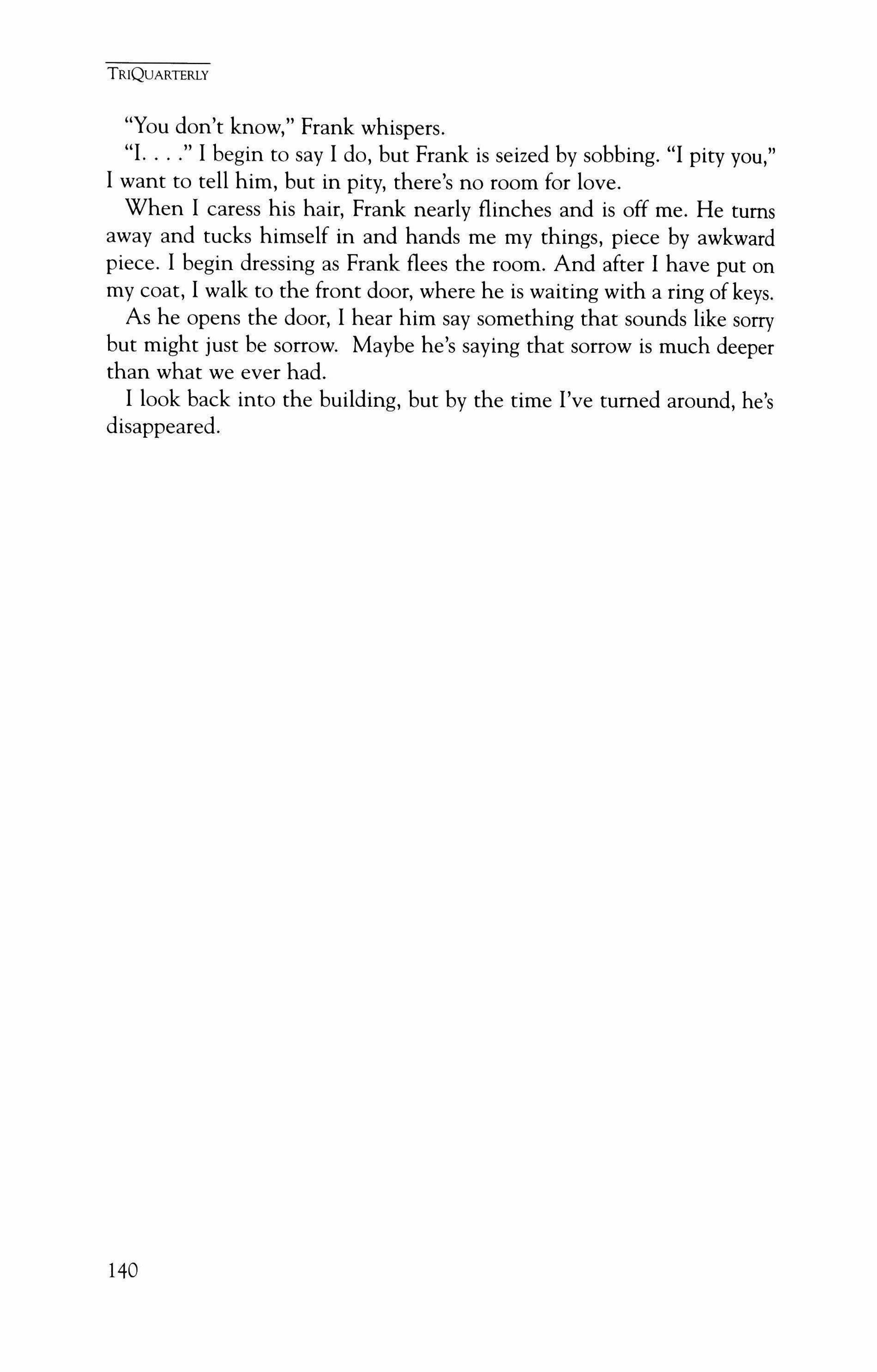
TRIQUARTERLY
"You don't know," Frank whispers.
"I. " I begin to say I do, but Frank is seized by sobbing. "I pity you," I want to tell him, but in pity, there's no room for love.
When I caress his hair, Frank nearly flinches and is off me. He turns away and tucks himself in and hands me my things, piece by awkward piece. I begin dressing as Frank flees the room. And after I have put on my coat, I walk to the front door, where he is waiting with a ring of keys.
As he opens the door, I hear him say something that sounds like sorry but might just be sorrow. Maybe he's saying that sorrow is much deeper than what we ever had.
I look back into the building, but by the time I've turned around, he's disappeared.
140
Chuck's Money
Carol Bly
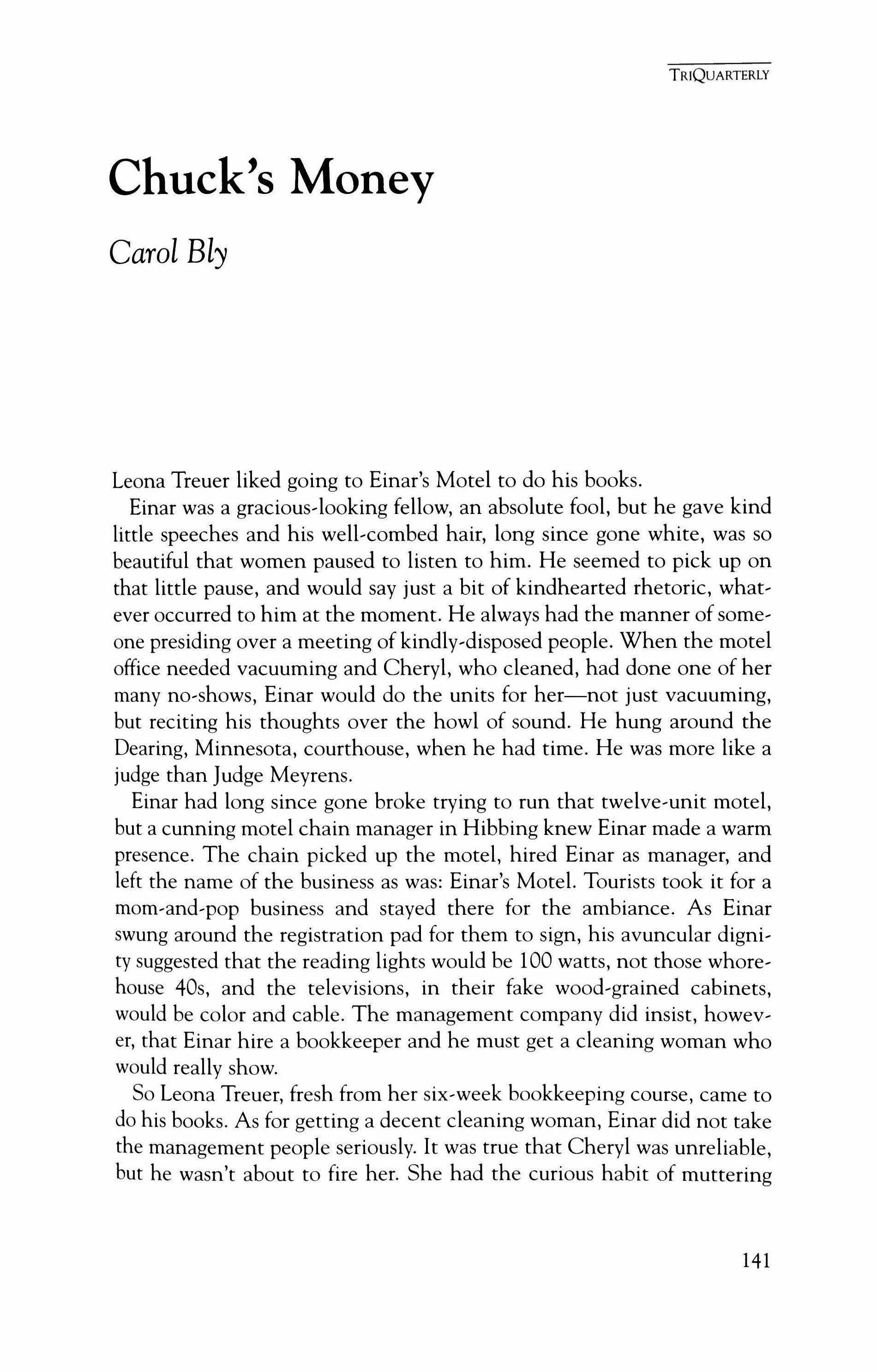
Leona Treuer liked going to Einar's Motel to do his books.
Einar was a gracious-looking fellow, an absolute fool, but he gave kind little speeches and his well-combed hair, long since gone white, was so beautiful that women paused to listen to him. He seemed to pick up on that little pause, and would say just a bit of kindhearted rhetoric, whatever occurred to him at the moment. He always had the manner of someone presiding over a meeting of kindly-disposed people. When the motel office needed vacuuming and Cheryl, who cleaned, had done one of her many no-shows, Einar would do the units for her-not just vacuuming, but reciting his thoughts over the howl of sound. He hung around the Dearing, Minnesota, courthouse, when he had time. He was more like a judge than Judge Meyrens.
Einar had long since gone broke trying to run that twelve-unit motel, but a cunning motel chain manager in Hibbing knew Einar made a warm presence. The chain picked up the motel, hired Einar as manager, and left the name of the business as was: Einar's Motel. Tourists took it for a mom-and-pop business and stayed there for the ambiance. As Einar swung around the registration pad for them to sign, his avuncular dignity suggested that the reading lights would be 100 watts, not those whorehouse 40s, and the televisions, in their fake wood-grained cabinets, would be color and cable. The management company did insist, however, that Einar hire a bookkeeper and he must get a cleaning woman who would really show.
So Leona Treuer, fresh from her six-week bookkeeping course, came to do his books. As for getting a decent cleaning woman, Einar did not take the management people seriously. It was true that Cheryl was unreliable, but he wasn't about to fire her. She had the curious habit of muttering
TRIQUARTERLY
141
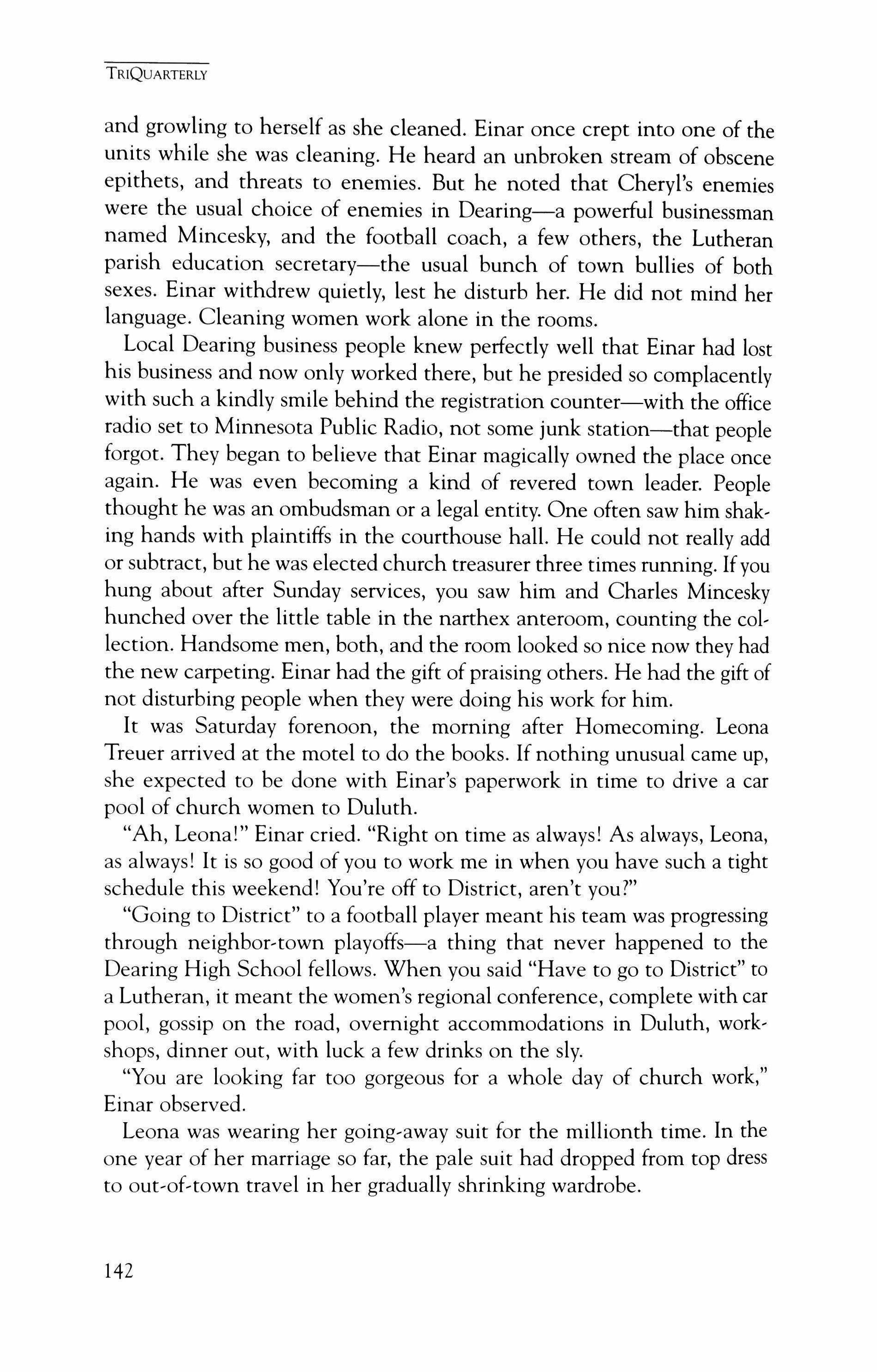
and growling to herself as she cleaned. Einar once crept into one of the units while she was cleaning. He heard an unbroken stream of obscene epithets, and threats to enemies. But he noted that Cheryl's enemies were the usual choice of enemies in Dearing-a powerful businessman named Mincesky, and the football coach, a few others, the Lutheran parish education secretary-the usual bunch of town bullies of both sexes. Einar withdrew quietly, lest he disturb her. He did not mind her language. Cleaning women work alone in the rooms.
Local Dearing business people knew perfectly well that Einar had lost his business and now only worked there, but he presided so complacently with such a kindly smile behind the registration counter-with the office radio set to Minnesota Public Radio, not some junk station-that people forgot. They began to believe that Einar magically owned the place once again. He was even becoming a kind of revered town leader. People thought he was an ombudsman or a legal entity. One often saw him shaking hands with plaintiffs in the courthouse hall. He could not really add or subtract, but he was elected church treasurer three times running. If you hung about after Sunday services, you saw him and Charles Mincesky hunched over the little table in the narthex anteroom, counting the collection. Handsome men, both, and the room looked so nice now they had the new carpeting. Einar had the gift of praising others. He had the gift of not disturbing people when they were doing his work for him.
It was Saturday forenoon, the morning after Homecoming. Leona Treuer arrived at the motel to do the books. If nothing unusual came up, she expected to be done with Einar's paperwork in time to drive a car pool of church women to Duluth.
"Ah, Leona!" Einar cried. "Right on time as always! As always, Leona, as always! It is so good of you to work me in when you have such a tight schedule this weekend! You're off to District, aren't you?"
"Going to District" to a football player meant his team was progressing through neighbor-town playoffs-a thing that never happened to the Dearing High School fellows. When you said "Have to go to District" to a Lutheran, it meant the women's regional conference, complete with car pool, gossip on the road, overnight accommodations in Duluth, workshops, dinner out, with luck a few drinks on the sly.
"You are looking far too gorgeous for a whole day of church work," Einar observed.
Leona was wearing her going-away suit for the millionth time. In the one year of her marriage so far, the pale suit had dropped from top dress to out-of-town travel in her gradually shrinking wardrobe.
TRIQUARTERLY
142
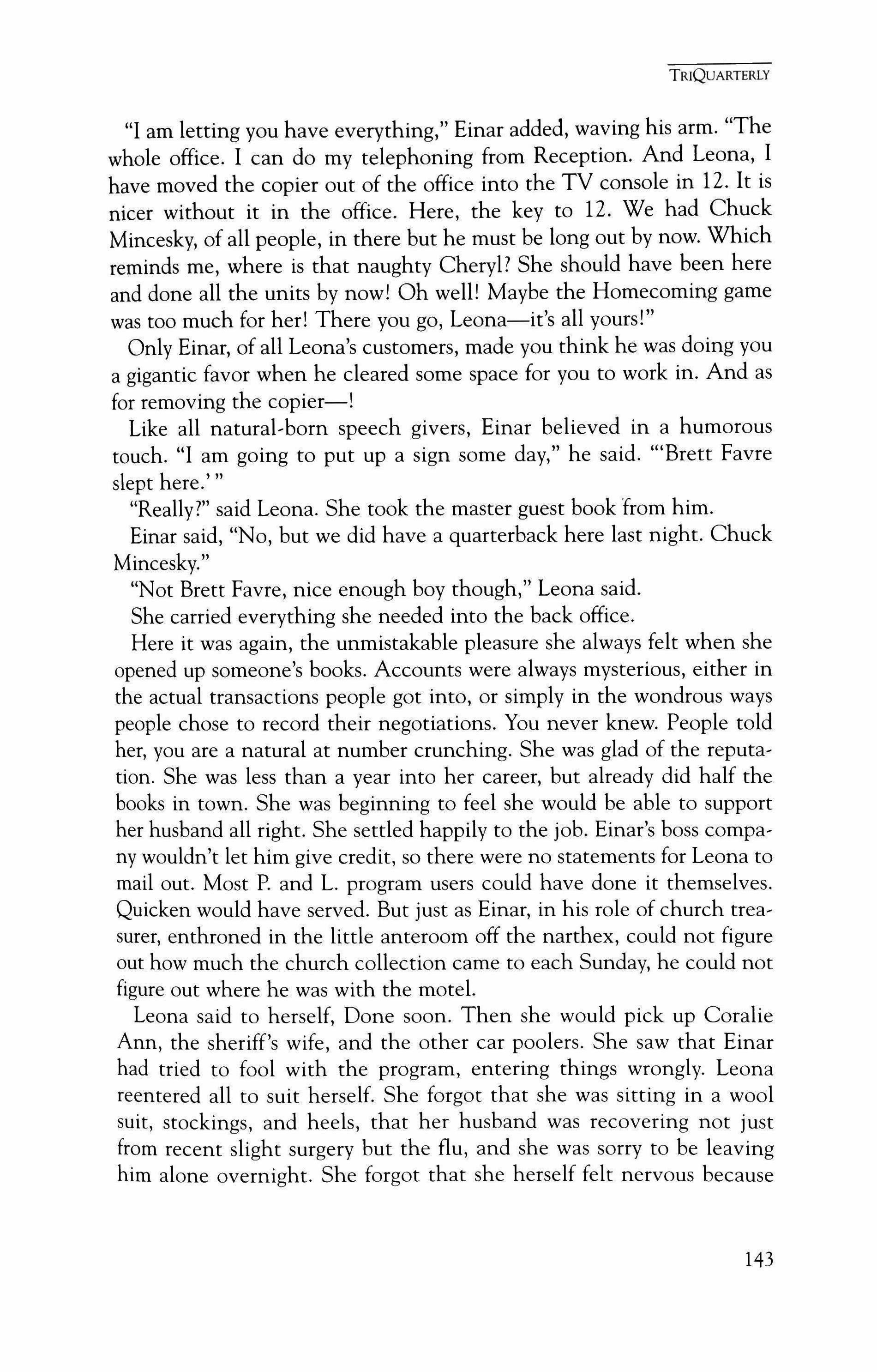
"I am letting you have everything," Einar added, waving his arm. "The whole office. 1 can do my telephoning from Reception. And Leona, 1 have moved the copier out of the office into the TV console in 12. It is nicer without it in the office. Here, the key to 12. We had Chuck Mincesky, of all people, in there but he must be long out by now. Which reminds me, where is that naughty Cheryl? She should have been here and done all the units by now! Oh well! Maybe the Homecoming game was too much for her! There you go, Leona-it's all yours!"
Only Einar, of all Leona's customers, made you think he was doing you a gigantic favor when he cleared some space for you to work in. And as for removing the copier-!
Like all natural-born speech givers, Einar believed in a humorous touch. "1 am going to put up a sign some day," he said. '''Brett Favre slept here.'
"Really?" said Leona. She took the master guest book from him. Einar said, "No, but we did have a quarterback here last night. Chuck Mincesky."
"Not Brett Favre, nice enough boy though," Leona said. She carried everything she needed into the back office. Here it was again, the unmistakable pleasure she always felt when she opened up someone's books. Accounts were always mysterious, either in the actual transactions people got into, or simply in the wondrous ways people chose to record their negotiations. You never knew. People told her, you are a natural at number crunching. She was glad of the reputation. She was less than a year into her career, but already did half the books in town. She was beginning to feel she would be able to support her husband all right. She settled happily to the job. Einar's boss company wouldn't let him give credit, so there were no statements for Leona to mail out. Most P. and L. program users could have done it themselves. Quicken would have served. But just as Einar, in his role of church treasurer, enthroned in the little anteroom off the narthex, could not figure out how much the church collection came to each Sunday, he could not figure out where he was with the motel.
Leona said to herself, Done soon. Then she would pick up Coralie Ann, the sheriff's wife, and the other car poolers. She saw that Einar had tried to fool with the program, entering things wrongly. Leona reentered all to suit herself. She forgot that she was sitting in a wool suit, stockings, and heels, that her husband was recovering not just from recent slight surgery but the flu, and she was sorry to be leaving him alone overnight. She forgot that she herself felt nervous because
TRIQUARTERLY
143
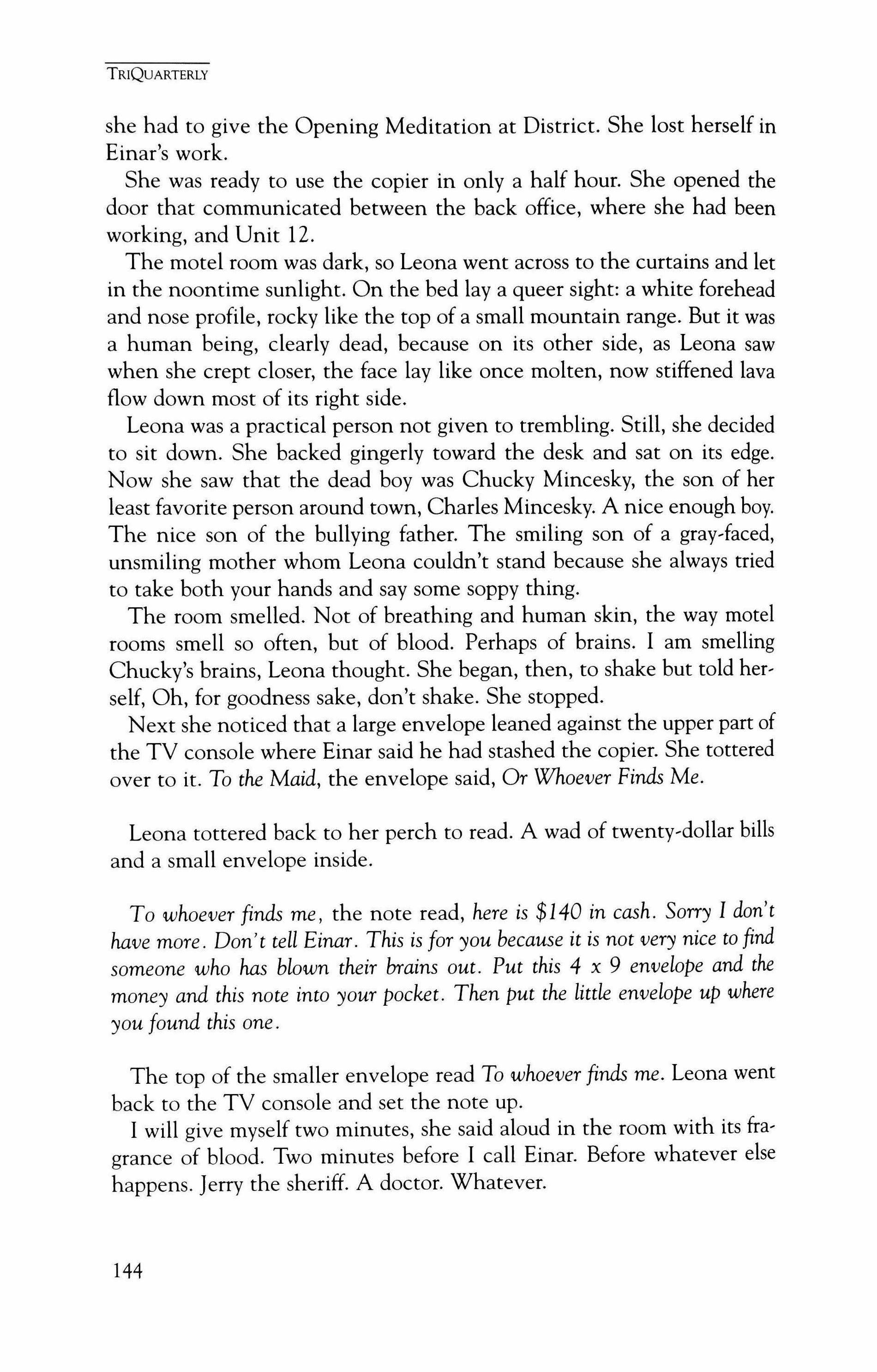
TRIQUARTERLY
she had to give the Opening Meditation at District. She lost herself in Einar's work.
She was ready to use the copier in only a half hour. She opened the door that communicated between the back office, where she had been working, and Unit 12.
The motel room was dark, so Leona went across to the curtains and let in the noontime sunlight. On the bed lay a queer sight: a white forehead and nose profile, rocky like the top of a small mountain range. But it was a human being, clearly dead, because on its other side, as Leona saw when she crept closer, the face lay like once molten, now stiffened lava flow down most of its right side.
Leona was a practical person not given to trembling. Still, she decided to sit down. She backed gingerly toward the desk and sat on its edge. Now she saw that the dead boy was Chucky Mincesky, the son of her least favorite person around town, Charles Mincesky. A nice enough boy. The nice son of the bullying father. The smiling son of a gray-faced, unsmiling mother whom Leona couldn't stand because she always tried to take both your hands and say some soppy thing.
The room smelled. Not of breathing and human skin, the way motel rooms smell so often, but of blood. Perhaps of brains. I am smelling Chucky's brains, Leona thought. She began, then, to shake but told herself, Oh, for goodness sake, don't shake. She stopped.
Next she noticed that a large envelope leaned against the upper part of the TV console where Einar said he had stashed the copier. She tottered over to it. To the Maid, the envelope said, Or Whoever Finds Me.
Leona tottered back to her perch to read. A wad of twenty-dollar bills and a small envelope inside.
To whoever finds me, the note read, here is $140 in cash. Sorry I don't have more. Don't tell Einar. This is for you because it is not very nice to find someone who has blown their brains out. Put this 4 x 9 envelope and the money and this note into your pocket. Then put the little envelope up where you found this one.
The top of the smaller envelope read To whoever finds me. Leona went back to the TV console and set the note up.
I will give myself two minutes, she said aloud in the room with its fragrance of blood. Two minutes before I call Einar. Before whatever else happens. Jerry the sheriff. A doctor. Whatever.
144
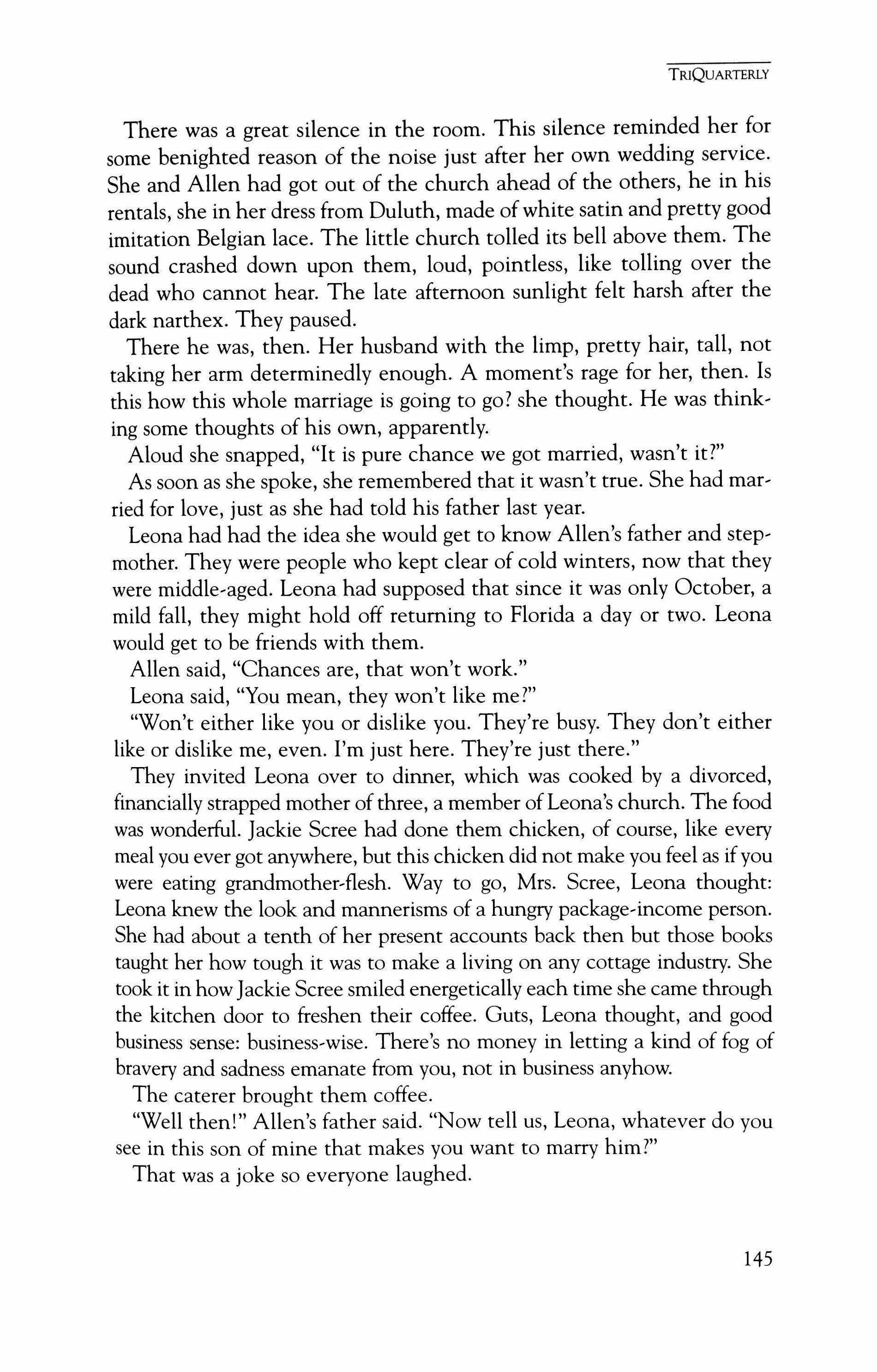
There was a great silence in the room. This silence reminded her for some benighted reason of the noise just after her own wedding service. She and Allen had got out of the church ahead of the others, he in his rentals, she in her dress from Duluth, made ofwhite satin and pretty good imitation Belgian lace. The little church tolled its bell above them. The sound crashed down upon them, loud, pointless, like tolling over the dead who cannot hear. The late afternoon sunlight felt harsh after the dark narthex. They paused.
There he was, then. Her husband with the limp, pretty hair, tall, not taking her arm determinedly enough. A moment's rage for her, then. Is this how this whole marriage is going to go? she thought. He was thinking some thoughts of his own, apparently.
Aloud she snapped, "It is pure chance we got married, wasn't it?"
As soon as she spoke, she remembered that it wasn't true. She had married for love, just as she had told his father last year.
Leona had had the idea she would get to know Allen's father and stepmother. They were people who kept clear of cold winters, now that they were middle-aged. Leona had supposed that since it was only October, a mild fall, they might hold off returning to Florida a day or two. Leona would get to be friends with them.
Allen said, "Chances are, that won't work."
Leona said, "You mean, they won't like me?"
"Won't either like you or dislike you. They're busy. They don't either like or dislike me, even. I'm just here. They're just there."
They invited Leona over to dinner, which was cooked by a divorced, financially strapped mother of three, a member ofLeona's church. The food was wonderful. Jackie Scree had done them chicken, of course, like every meal you ever got anywhere, but this chicken did not make you feel as if you were eating grandmother-flesh. Way to go, Mrs. Scree, Leona thought: Leona knew the look and mannerisms of a hungry package-income person. She had about a tenth of her present accounts back then but those books taught her how tough it was to make a living on any cottage industry. She took it in how Jackie Scree smiled energetically each time she came through the kitchen door to freshen their coffee. Guts, Leona thought, and good business sense: business-wise. There's no money in letting a kind of fog of bravery and sadness emanate from you, not in business anyhow.
The caterer brought them coffee.
"Well then!" Allen's father said. "Now tell us, Leona, whatever do you see in this son of mine that makes you want to marry him?"
That was a joke so everyone laughed.
TRIQUARTERLY
145
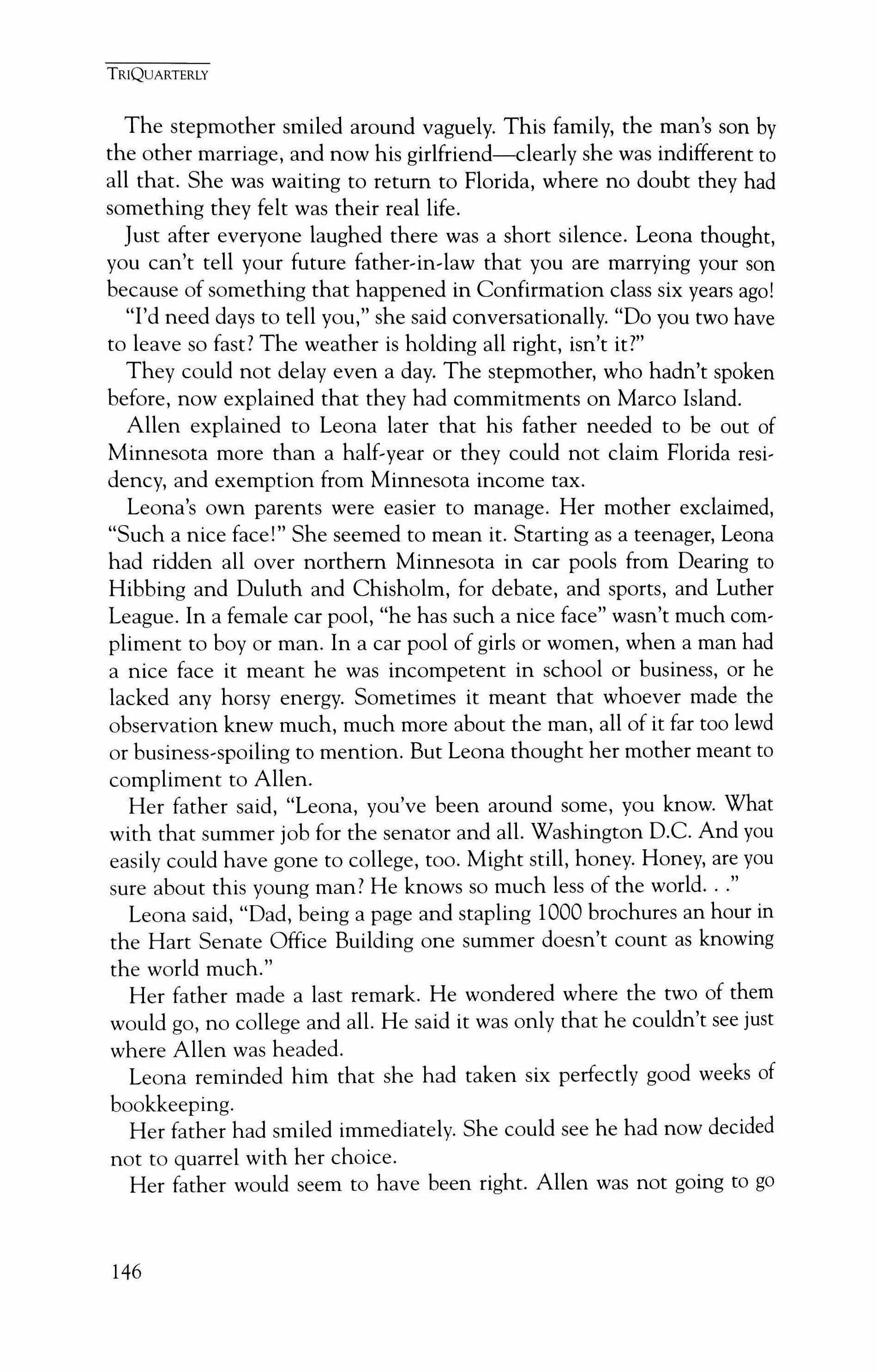
TRIQUARTERLY
The stepmother smiled around vaguely. This family, the man's son by the other marriage, and now his girlfriend-clearly she was indifferent to all that. She was waiting to return to Florida, where no doubt they had something they felt was their real life.
Just after everyone laughed there was a short silence. Leona thought, you can't tell your future father-in-law that you are marrying your son because of something that happened in Confirmation class six years ago! "I'd need days to tell you," she said conversationally. "Do you two have to leave so fast? The weather is holding all right, isn't it?"
They could not delay even a day. The stepmother, who hadn't spoken before, now explained that they had commitments on Marco Island. Allen explained to Leona later that his father needed to be out of Minnesota more than a half-year or they could not claim Florida residency, and exemption from Minnesota income tax.
Leona's own parents were easier to manage. Her mother exclaimed, "Such a nice face!" She seemed to mean it. Starting as a teenager, Leona had ridden all over northern Minnesota in car pools from Dearing to Hibbing and Duluth and Chisholm, for debate, and sports, and Luther League. In a female car pool, "he has such a nice face" wasn't much compliment to boy or man. In a car pool of girls or women, when a man had a nice face it meant he was incompetent in school or business, or he lacked any horsy energy. Sometimes it meant that whoever made the observation knew much, much more about the man, all of it far too lewd or business-spoiling to mention. But Leona thought her mother meant to compliment to Allen.
Her father said, "Leona, you've been around some, you know. What with that summer job for the senator and all. Washington D.C. And you easily could have gone to college, too. Might still, honey. Honey, are you sure about this young man? He knows so much less of the world "
Leona said, "Dad, being a page and stapling 1000 brochures an hour in the Hart Senate Office Building one summer doesn't count as knowing the world much."
Her father made a last remark. He wondered where the two of them would go, no college and all. He said it was only that he couldn't see just where Allen was headed.
Leona reminded him that she had taken six perfectly good weeks of bookkeeping.
Her father had smiled immediately. She could see he had now decided not to quarrel with her choice.
Her father would seem to have been right. Allen was not going to go
146
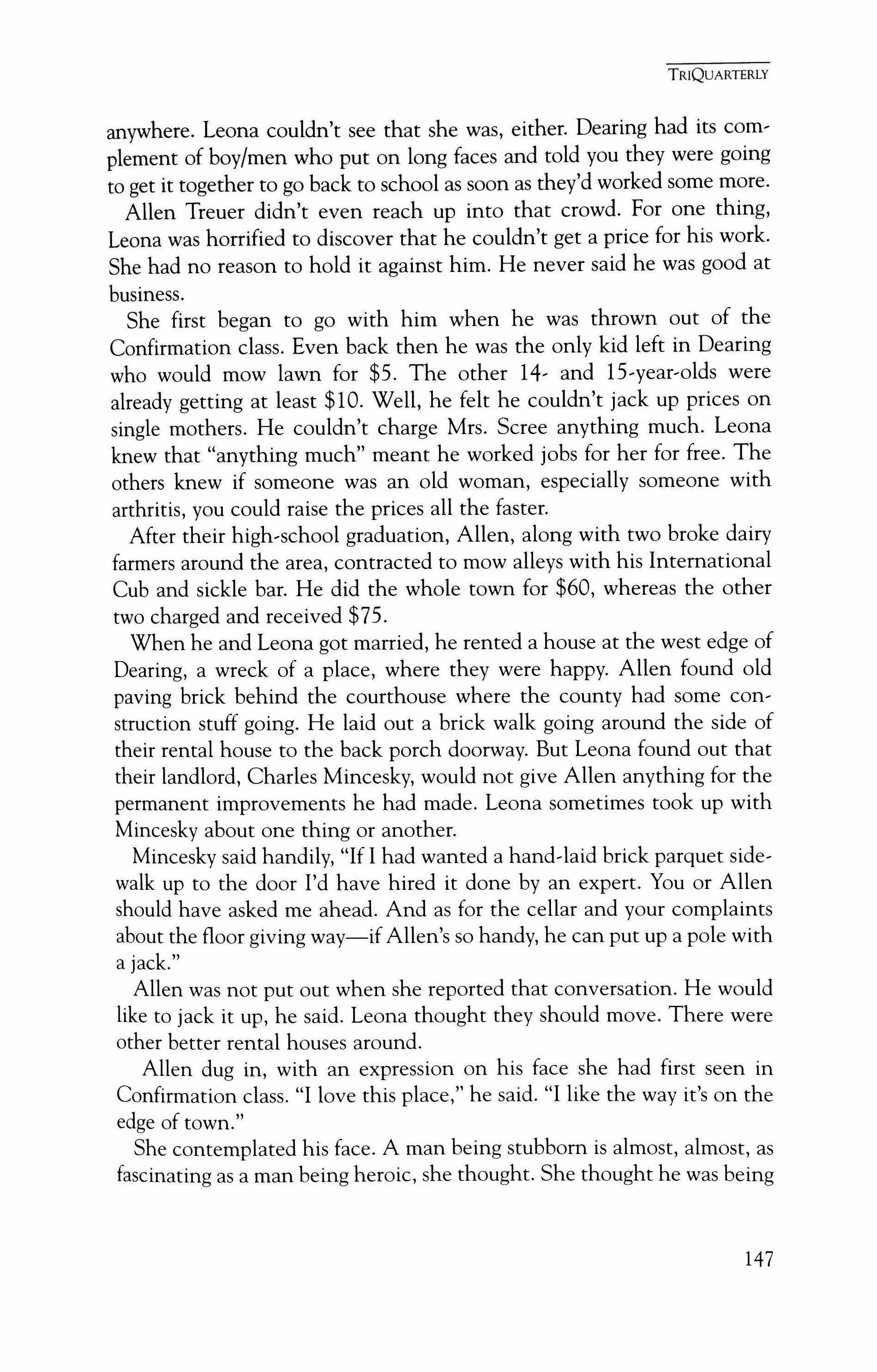
anywhere. Leona couldn't see that she was, either. Dearing had its cornplement of boy/men who put on long faces and told you they were going to get it together to go back to school as soon as they'd worked some more.
Allen Treuer didn't even reach up into that crowd. For one thing, Leona was horrified to discover that he couldn't get a price for his work. She had no reason to hold it against him. He never said he was good at business.
She first began to go with him when he was thrown out of the Confirmation class. Even back then he was the only kid left in Dearing who would mow lawn for $5. The other 14� and 15�year�0Ids were already getting at least $10. Well, he felt he couldn't jack up prices on single mothers. He couldn't charge Mrs. Scree anything much. Leona knew that "anything much" meant he worked jobs for her for free. The others knew if someone was an old woman, especially someone with arthritis, you could raise the prices all the faster.
After their high-school graduation, Allen, along with two broke dairy farmers around the area, contracted to mow alleys with his International Cub and sickle bar. He did the whole town for $60, whereas the other two charged and received $75.
When he and Leona got married, he rented a house at the west edge of Dearing, a wreck of a place, where they were happy. Allen found old paving brick behind the courthouse where the county had some construction stuff going. He laid out a brick walk going around the side of their rental house to the back porch doorway. But Leona found out that their landlord, Charles Mincesky, would not give Allen anything for the permanent improvements he had made. Leona sometimes took up with Mincesky about one thing or another.
Mincesky said handily, "If I had wanted a hand-laid brick parquet sidewalk up to the door I'd have hired it done by an expert. You or Allen should have asked me ahead. And as for the cellar and your complaints about the floor giving way-if Allen's so handy, he can put up a pole with a jack."
Allen was not put out when she reported that conversation. He would like to jack it up, he said. Leona thought they should move. There were other better rental houses around.
Allen dug in, with an expression on his face she had first seen in Confirmation class. "I love this place," he said. "I like the way it's on the edge of town."
She contemplated his face. A man being stubborn is almost, almost, as fascinating as a man being heroic, she thought. She thought he was being
TRIQUARTERLY
147

stubborn, hanging to a stupid idea like spending time and money on a rotten house they didn't own-but the stubbornness glowed in him, making the lock of straight hair look swept like a seaman's-as she imagined a seaman, of course, having seen only one C.P.o. who wandered through the senate office she worked in one summer. Anyhow, not just lank hair on a guy losing weight with a taste for alternative lifestyle.
Their rickety porch gave out to the west. Across McCabe Creek, a disused pasture was beginning to come up in willows. On the far edge of the pasture a ring of fir forest made the skyline. Well, she liked it all right herself.
It was beautiful, Allen said. He had gathered Leona tighter against him as they looked out.
In his arms Leona thought, O.K., everyone is going to clip Allen whenever they can. That's what people do in this town. Well, she bet they did it in Washington, too, even if the particular senator she'd worked for that one summer didn't clip any people so far as she knew. O.K., then, she said to herself, I will be the income person. I will do books for everyone in this town. I will get to know all the businesses and I will keep high visibility in church work and I won't make any mistakes and people will trust me. I will keep my mouth shut at all times. That'll be worth about fifteen thou per annum all by itself. I'll support us O.K.
Just having made up her mind to it relaxed her; out of simple resigned feeling, she moved closer in Allen's arm.
He read her gesture his own way. He said, "I'm proud you trust in me, Leona."
To please him she said, "That's a very beautiful river and meadow, anyway." But she hadn't much feeling for nature.
On their honeymoon they had by accident established a style of intimacy neither could have guessed at ahead of time. Allen had proposed they go camping in the Lake of the Woods somewhere. Leona said, well yes they could she supposed. They could, of course.
Allen heard her tone. If not camping, what would she like?
She had thought to see some sights. Like, Iron World, that museum in Chisholm, where she'd heard there were Events. And people serving ethnic foods. And then they could camp, too. Mrs. Preck, the parish secretary, recommended a place where she had very much enjoyed a spiritual-journeys conference. One of Leona's first jobs was going over the church books every fourth Monday so even back then she knew the parish secretary was as crooked as an auger shaft. But Allen and Leona hadn't any ideas of their own about resorts, so when
TRIQUARTERLY
148

Mrs. Preck mentioned the name of a particular lodge, Allen and Leona reserved a week there.
One day they went to Iron World and were served German pastries by a young woman dressed in German national costume. This woman told them she was proud ofher German grandparents and of all that Germany had done for Minnesota. There were 10 German-Americans for every one of all the other ethnic groups put together. So (she laughed with a certain brilliance) "we Germans can take a lot of credit!" The next day a familiar figure went around the Iron World grounds wearing Norwegian nasjonal drakt. The same woman grinned but this time cried "God dag!"-and offered them sm0rbr0d, the egg og ansj0s looking so good that Leona and Allen each took two. Their server told them that her Norwegian grandparents had come from the [utenheirn, which had made a huge contribution to the population and culture of Minnesota. She may have seen something quizzical in their faces, for she gave Allen his change quickly and turned away. They heard her gaily crying, "Vaer sa god!" and "Takk skal De ha!" as she moved about with her tray.
Then they went into a little building near the edge of the old Hull Rust pit, from which 65% of the world's mined iron came. Chairs had been set out for 20 people or so. A black and white film said that the mining operators were largely Englishmen and Americans of English descent. The miners themselves were of central European and Finnish stock.
Allen and Leona knew that the mine operators had fought every possible improvement to the lifestyle of their workers. They left the film once they saw it wasn't going to deal with the subject fairly. They felt a little forlorn, yet-it was so difficult. Leona felt, they were supposed to be happy on their honeymoon, weren't they? She half-hated public issues of any kind.
Their unhappiness led to their pattern of lovemaking. They had retired early to their tent. Outside two loons made a wonderful racket. A bobwhite called. But they began to talk about the girl who lied for her job, at the museum. Then they talked about how the mining operators, of English extraction, had not been interested in housing or health arrangements for the workers. It is true they paid enormous taxes, so the Chisholm schools were rich. Allen said, it is hard to bend your mind around it, though. A few hundreds of thousands of dollars would have made all the difference in the workers' lives-but they wouldn't do it until forced.
They talked to each other quietly, dispiritedly, feeling bad that their wedding trip was so lackluster. Allen had much the smaller self-confi-
TRIQUARTERLY
149
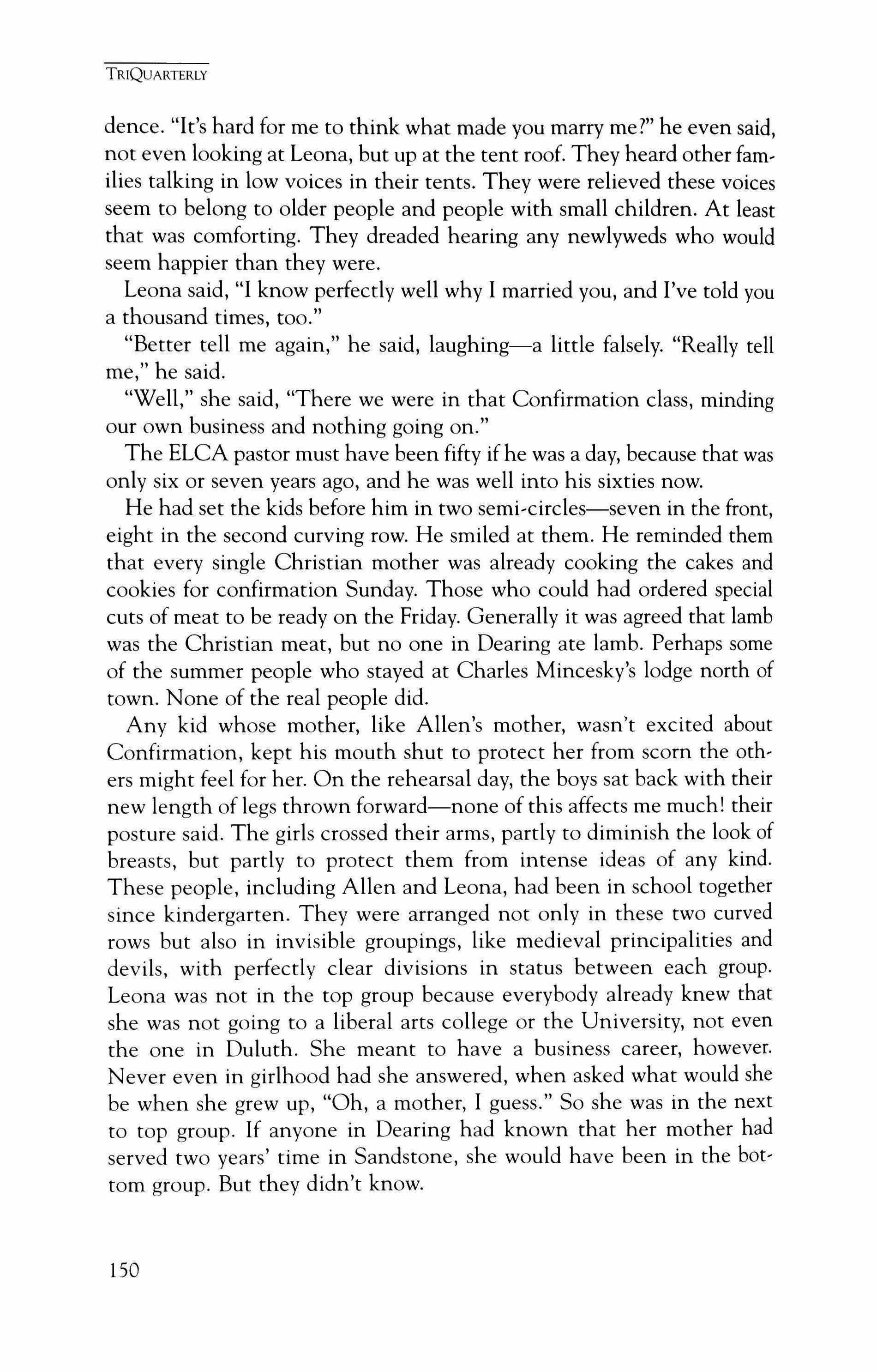
dence. "It's hard for me to think what made you marry me?" he even said, not even looking at Leona, but up at the tent roof. They heard other families talking in low voices in their tents. They were relieved these voices seem to belong to older people and people with small children. At least that was comforting. They dreaded hearing any newlyweds who would seem happier than they were.
Leona said, "I know perfectly well why I married you, and I've told you a thousand times, too."
"Better tell me again," he said, laughing-a little falsely. "Really tell me," he said.
"Well," she said, "There we were in that Confirmation class, minding our own business and nothing going on."
The ELCA pastor must have been fifty ifhe was a day, because that was only six or seven years ago, and he was well into his sixties now.
He had set the kids before him in two semi-circles-seven in the front, eight in the second curving row. He smiled at them. He reminded them that every single Christian mother was already cooking the cakes and cookies for confirmation Sunday. Those who could had ordered special cuts of meat to be ready on the Friday. Generally it was agreed that lamb was the Christian meat, but no one in Dearing ate lamb. Perhaps some of the summer people who stayed at Charles Mincesky's lodge north of town. None of the real people did.
Any kid whose mother, like Allen's mother, wasn't excited about Confirmation, kept his mouth shut to protect her from scorn the others might feel for her. On the rehearsal day, the boys sat back with their new length of legs thrown forward-none of this affects me much! their posture said. The girls crossed their arms, partly to diminish the look of breasts, but partly to protect them from intense ideas of any kind. These people, including Allen and Leona, had been in school together since kindergarten. They were arranged not only in these two curved rows but also in invisible groupings, like medieval principalities and devils, with perfectly clear divisions in status between each group. Leona was not in the top group because everybody already knew that she was not going to a liberal arts college or the University, not even the one in Duluth. She meant to have a business career, however. Never even in girlhood had she answered, when asked what would she be when she grew up, "Oh, a mother, I guess." So she was in the next to top group. If anyone in Dearing had known that her mother had served two years' time in Sandstone, she would have been in the bottom group. But they didn't know.
TRIQUARTERLY
150
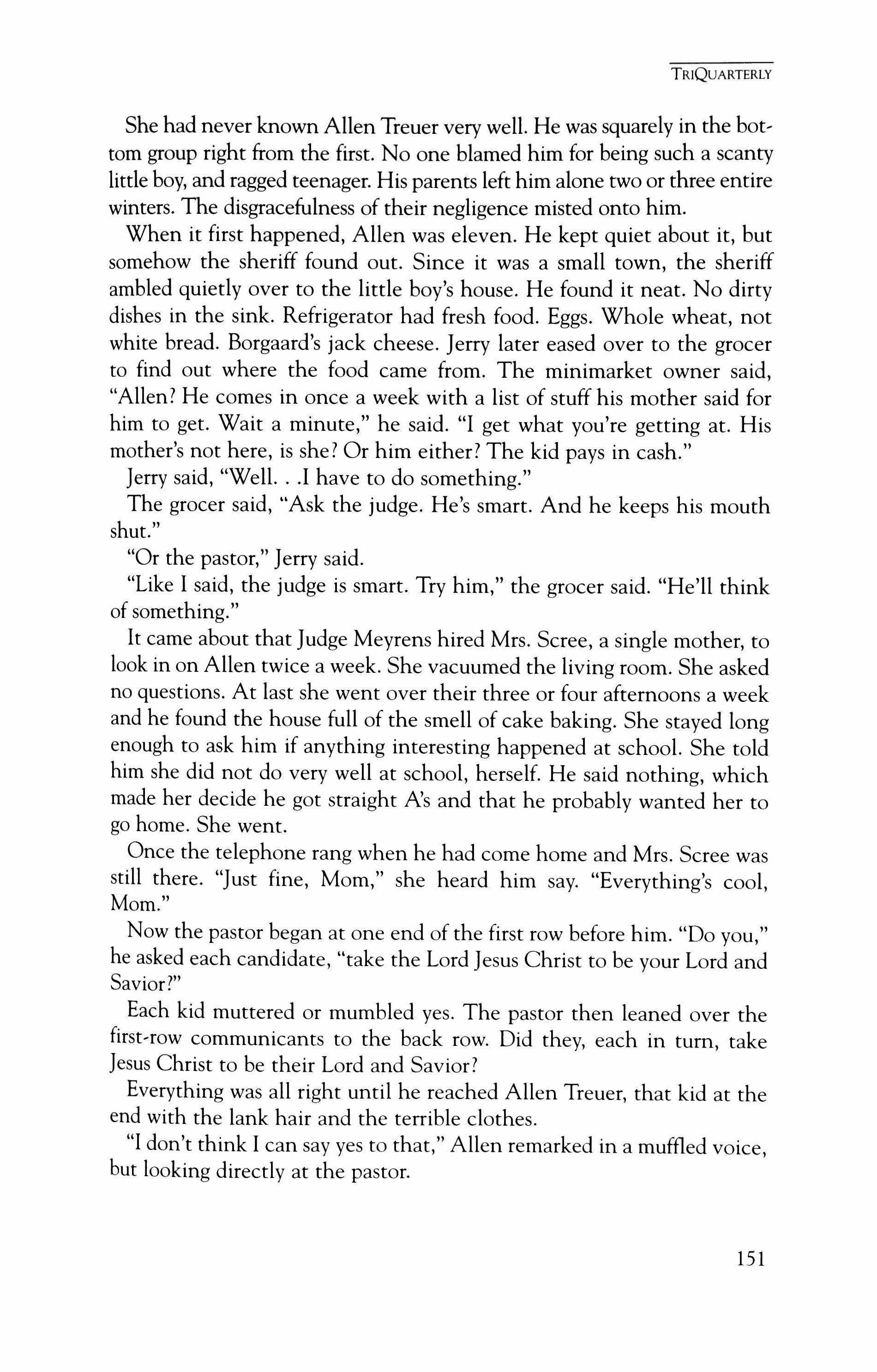
She had never known Allen Treuer very well. He was squarely in the bottom group right from the first. No one blamed him for being such a scanty little boy, and ragged teenager. His parents left him alone two or three entire winters. The disgracefulness of their negligence misted onto him.
When it first happened, Allen was eleven. He kept quiet about it, but somehow the sheriff found out. Since it was a small town, the sheriff ambled quietly over to the little boy's house. He found it neat. No dirty dishes in the sink. Refrigerator had fresh food. Eggs. Whole wheat, not white bread. Borgaard's jack cheese. Jerry later eased over to the grocer to find out where the food came from. The minimarket owner said, "Allen? He comes in once a week with a list of stuff his mother said for him to get. Wait a minute," he said. "I get what you're getting at. His mother's not here, is she? Or him either? The kid pays in cash."
Jerry said, "Well. .I have to do something."
The grocer said, "Ask the judge. He's smart. And he keeps his mouth shut."
"Or the pastor," Jerry said.
"Like I said, the judge is smart. Try him," the grocer said. "He'll think of something."
It came about that Judge Meyrens hired Mrs. Scree, a single mother, to look in on Allen twice a week. She vacuumed the living room. She asked no questions. At last she went over their three or four afternoons a week and he found the house full of the smell of cake baking. She stayed long enough to ask him if anything interesting happened at school. She told him she did not do very well at school, herself. He said nothing, which made her decide he got straight A:s and that he probably wanted her to go home. She went.
Once the telephone rang when he had come home and Mrs. Scree was still there. "Just fine, Mom," she heard him say. "Everything's cool, Mom."
Now the pastor began at one end of the first row before him. "Do you," he asked each candidate, "take the Lord Jesus Christ to be your Lord and Savior?"
Each kid muttered or mumbled yes. The pastor then leaned over the first-row communicants to the back row. Did they, each in tum, take Jesus Christ to be their Lord and Savior?
Everything was all right until he reached Allen Treuer, that kid at the end with the lank hair and the terrible clothes.
"I don't think I can say yes to that," Allen remarked in a muffled voice, but looking directly at the pastor.
TRIQUARTERLY
151
TRIQUARTERLY
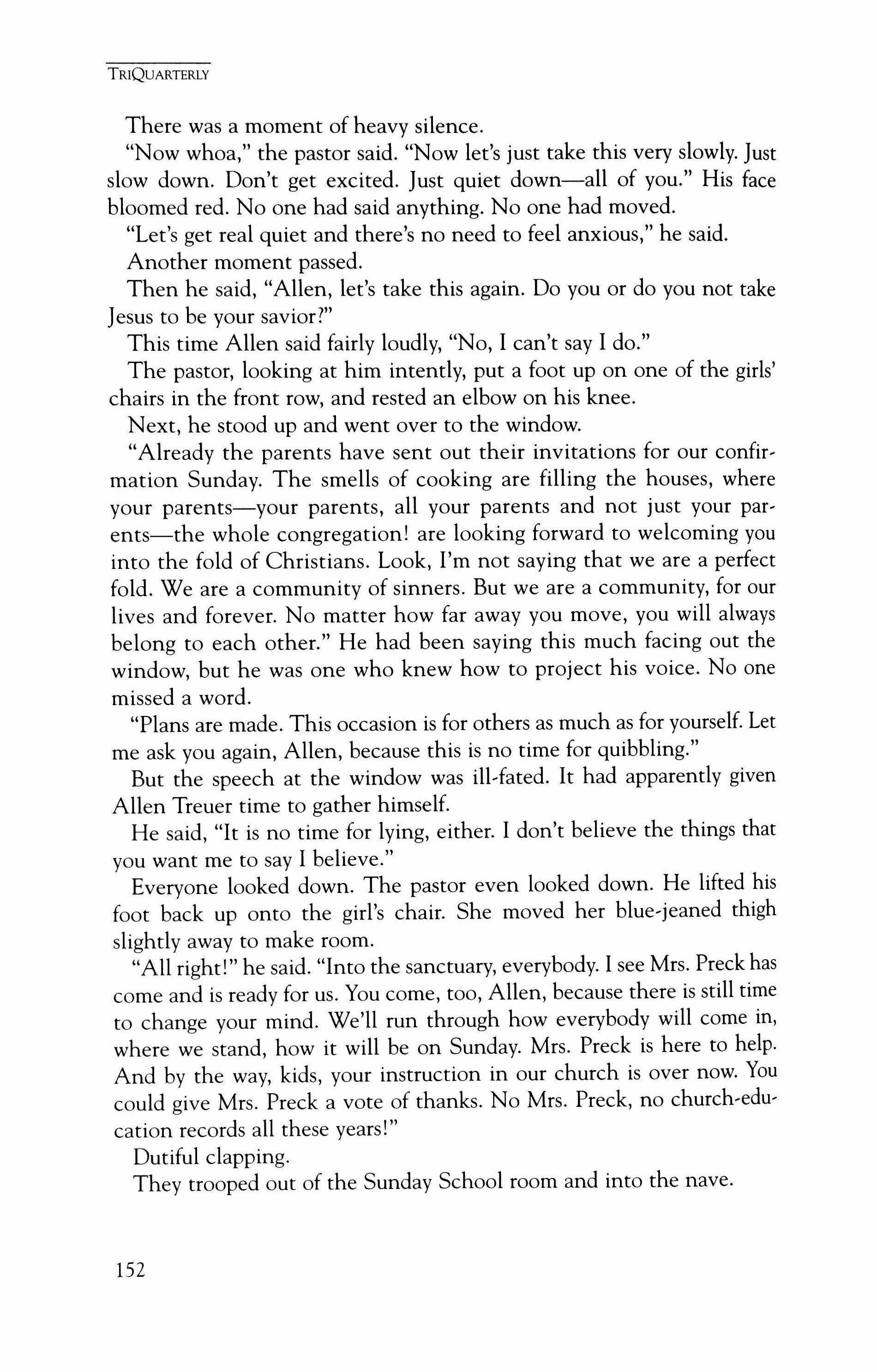
There was a moment of heavy silence.
"Now whoa," the pastor said. "Now let's just take this very slowly. Just slow down. Don't get excited. Just quiet down-all of you." His face bloomed red. No one had said anything. No one had moved.
"Let's get real quiet and there's no need to feel anxious," he said.
Another moment passed.
Then he said, "Allen, let's take this again. Do you or do you not take Jesus to be your savior?"
This time Allen said fairly loudly, "No, I can't say I do."
The pastor, looking at him intently, put a foot up on one of the girls' chairs in the front row, and rested an elbow on his knee.
Next, he stood up and went over to the window.
"Already the parents have sent out their invitations for our confirmation Sunday. The smells of cooking are filling the houses, where your parents-your parents, all your parents and not just your parents-the whole congregation! are looking forward to welcoming you into the fold of Christians. Look, I'm not saying that we are a perfect fold. We are a community of sinners. But we are a community, for our lives and forever. No matter how far away you move, you will always belong to each other." He had been saying this much facing out the window, but he was one who knew how to project his voice. No one missed a word.
"Plans are made. This occasion is for others as much as for yourself. Let me ask you again, Allen, because this is no time for quibbling."
But the speech at the window was ill-fated. It had apparently given Allen Treuer time to gather himself.
He said, "It is no time for lying, either. I don't believe the things that you want me to say I believe."
Everyone looked down. The pastor even looked down. He lifted his foot back up onto the girl's chair. She moved her blue-jeaned thigh slightly away to make room.
"All right!" he said. "Into the sanctuary, everybody. I see Mrs. Preck has come and is ready for us. You come, too, Allen, because there is still time to change your mind. We'll run through how everybody will come in, where we stand, how it will be on Sunday. Mrs. Preck is here to help. And by the way, kids, your instruction in our church is over now. You could give Mrs. Preck a vote of thanks. No Mrs. Preck, no church-education records all these years!"
Dutiful clapping.
They trooped out of the Sunday School room and into the nave.
152
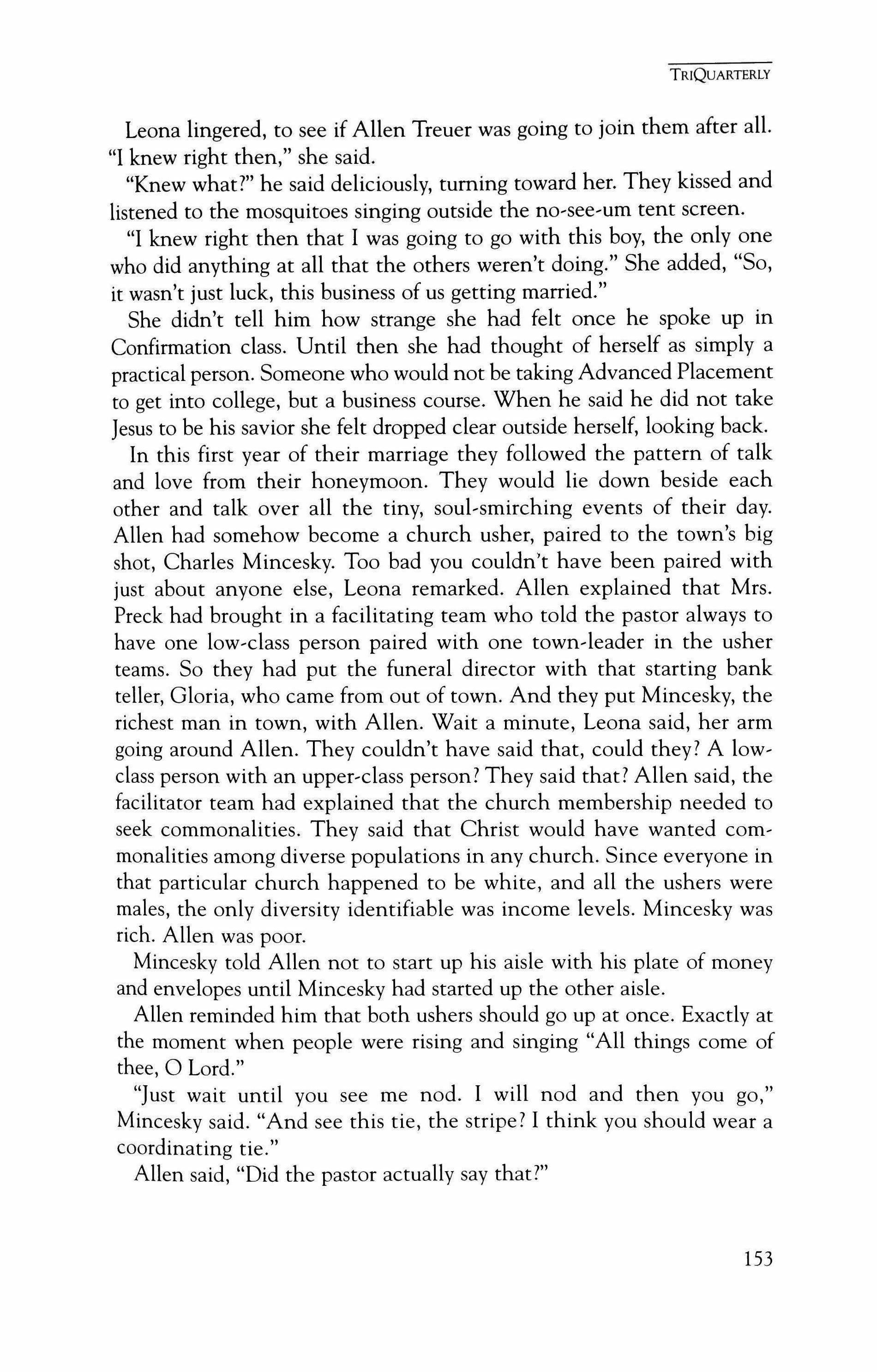
Leona lingered, to see if Allen Treuer was going to join them after all. "I knew right then," she said.
"Knew what?" he said deliciously, turning toward her. They kissed and listened to the mosquitoes singing outside the no-see-urn tent screen.
"I knew right then that I was going to go with this boy, the only one who did anything at all that the others weren't doing." She added, "So, it wasn't just luck, this business of us getting married."
She didn't tell him how strange she had felt once he spoke up in Confirmation class. Until then she had thought of herself as simply a practical person. Someone who would not be taking Advanced Placement to get into college, but a business course. When he said he did not take Jesus to be his savior she felt dropped clear outside herself, looking back.
In this first year of their marriage they followed the pattern of talk and love from their honeymoon. They would lie down beside each other and talk over all the tiny, soul-smirching events of their day. Allen had somehow become a church usher, paired to the town's big shot, Charles Mincesky. Too bad you couldn't have been paired with just about anyone else, Leona remarked. Allen explained that Mrs. Preck had brought in a facilitating team who told the pastor always to have one low-class person paired with one town-leader in the usher teams. So they had put the funeral director with that starting bank teller, Gloria, who came from out of town. And they put Mincesky, the richest man in town, with Allen. Wait a minute, Leona said, her arm going around Allen. They couldn't have said that, could they? A lowclass person with an upper-class person? They said that? Allen said, the facilitator team had explained that the church membership needed to seek commonalities. They said that Christ would have wanted cornmonalities among diverse populations in any church. Since everyone in that particular church happened to be white, and all the ushers were males, the only diversity identifiable was income levels. Mincesky was rich. Allen was poor.
Mincesky told Allen not to start up his aisle with his plate of money and envelopes until Mincesky had started up the other aisle.
Allen reminded him that both ushers should go up at once. Exactly at the moment when people were rising and singing "All things come of thee, 0 Lord."
"Just wait until you see me nod. I will nod and then you go," Mincesky said. "And see this tie, the stripe? I think you should wear a coordinating tie."
Allen said, "Did the pastor actually say that?"
TRIQUARTERLY
153
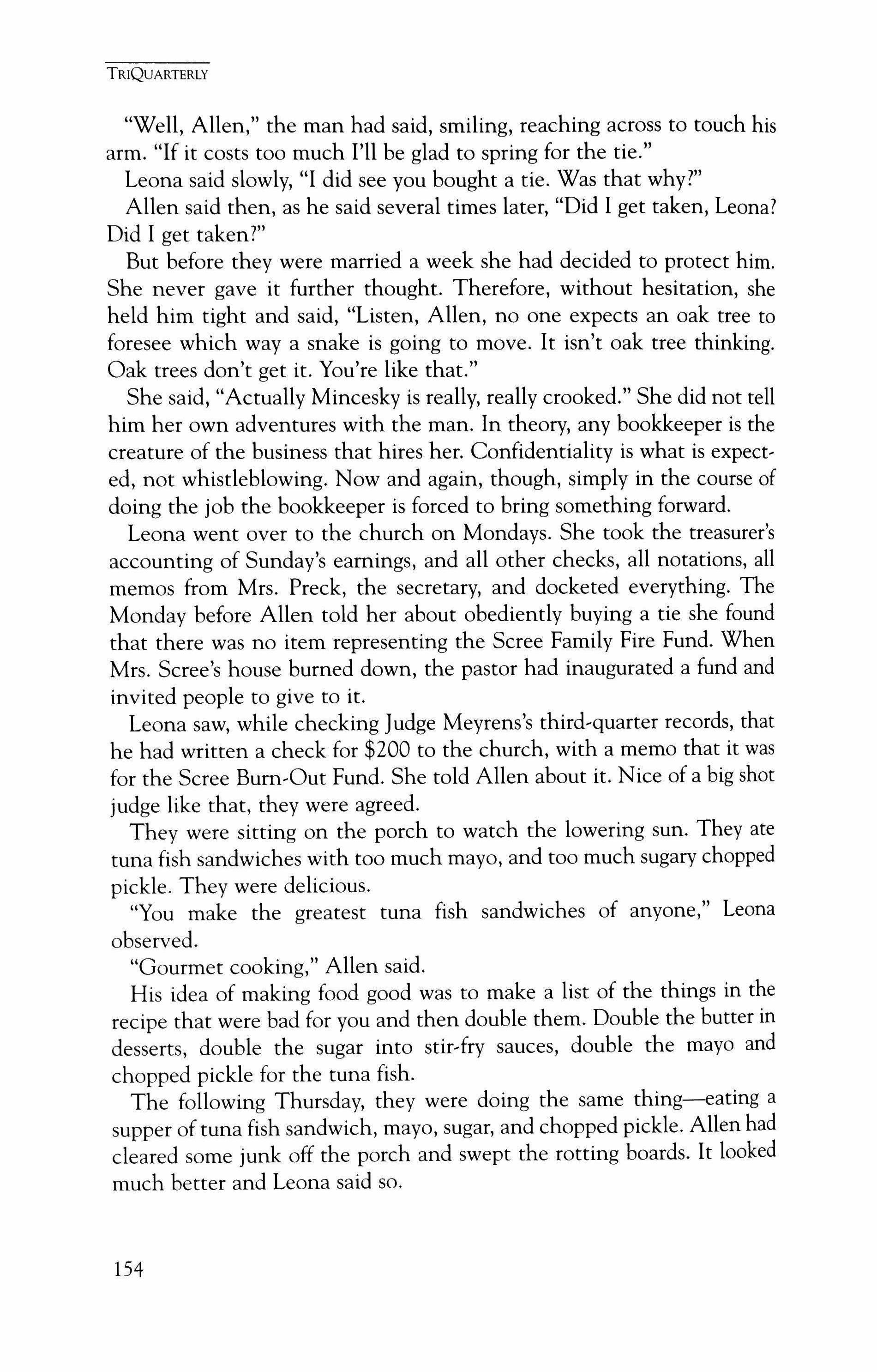
"Well, Allen," the man had said, smiling, reaching across to touch his arm. "If it costs too much I'll be glad to spring for the tie."
Leona said slowly, "I did see you bought a tie. Was that why?"
Allen said then, as he said several times later, "Did I get taken, Leona? Did I get taken?"
But before they were married a week she had decided to protect him. She never gave it further thought. Therefore, without hesitation, she held him tight and said, "Listen, Allen, no one expects an oak tree to foresee which way a snake is going to move. It isn't oak tree thinking. Oak trees don't get it. You're like that."
She said, "Actually Mincesky is really, really crooked." She did not tell him her own adventures with the man. In theory, any bookkeeper is the creature of the business that hires her. Confidentiality is what is expected, not whistleblowing. Now and again, though, simply in the course of doing the job the bookkeeper is forced to bring something forward.
Leona went over to the church on Mondays. She took the treasurer's accounting of Sunday's earnings, and all other checks, all notations, all memos from Mrs. Preck, the secretary, and docketed everything. The Monday before Allen told her about obediently buying a tie she found that there was no item representing the Scree Family Fire Fund. When Mrs. Scree's house burned down, the pastor had inaugurated a fund and invited people to give to it.
Leona saw, while checking Judge Meyrens's third-quarter records, that he had written a check for $200 to the church, with a memo that it was for the Scree Bum-Out Fund. She told Allen about it. Nice of a big shot judge like that, they were agreed.
They were sitting on the porch to watch the lowering sun. They ate tuna fish sandwiches with too much mayo, and too much sugary chopped pickle. They were delicious.
"You make the greatest tuna fish sandwiches of anyone," Leona observed.
"Gourmet cooking," Allen said.
His idea of making food good was to make a list of the things in the recipe that were bad for you and then double them. Double the butter in desserts, double the sugar into stir-fry sauces, double the mayo and chopped pickle for the tuna fish.
The following Thursday, they were doing the same thing--eating a supper of tuna fish sandwich, mayo, sugar, and chopped pickle. Allen had cleared some junk off the porch and swept the rotting boards. It looked much better and Leona said so.
TRIQUARTERLY
154
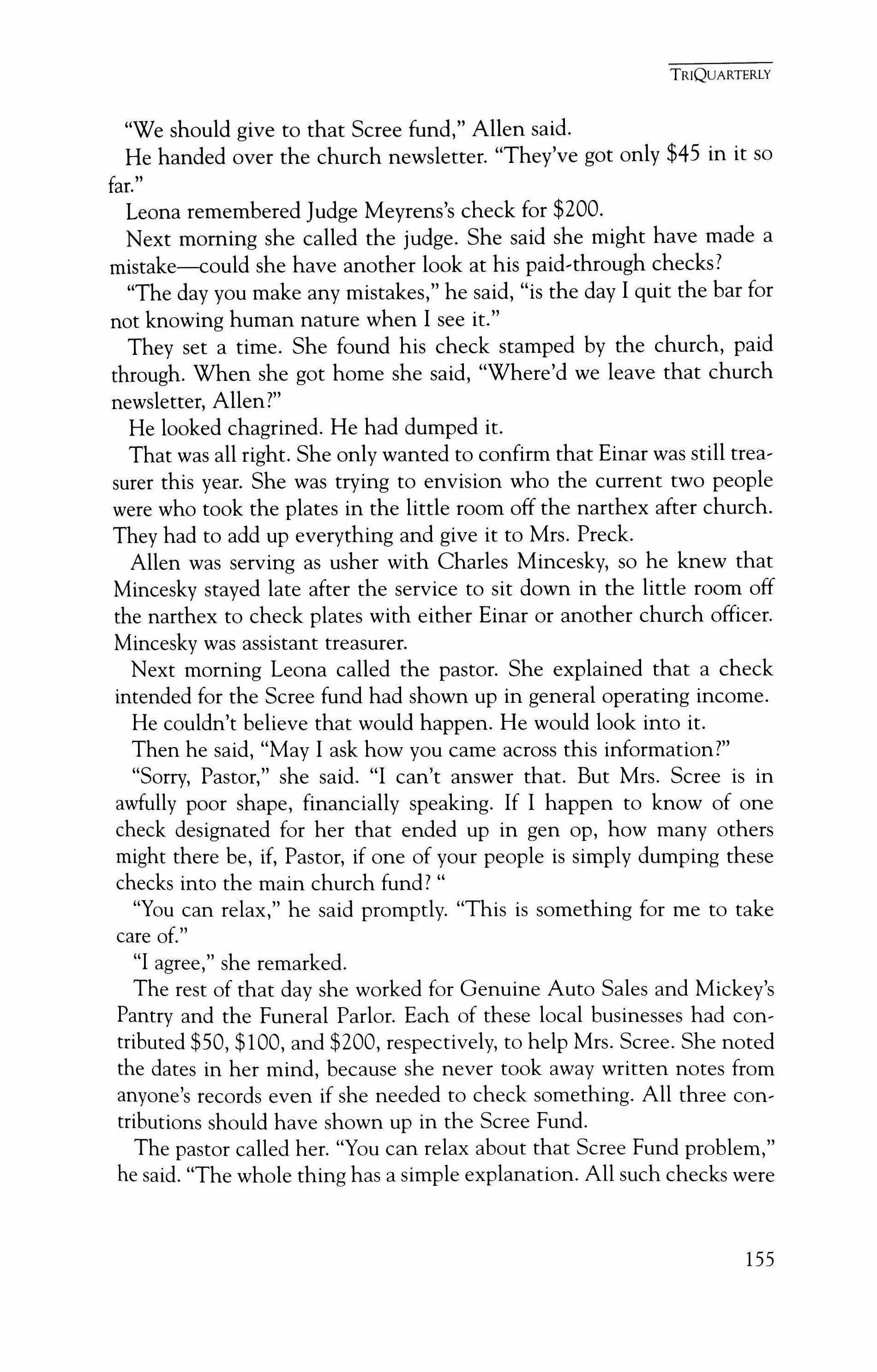
"We should give to that Scree fund," Allen said. He handed over the church newsletter. "They've got only $45 in it so f " ar.
Leona remembered Judge Meyrens's check for $200.
Next morning she called the judge. She said she might have made a mistake-could she have another look at his paid-through checks?
"The day you make any mistakes," he said, "is the day I quit the bar for not knowing human nature when I see it."
They set a time. She found his check stamped by the church, paid through. When she got home she said, "Where'd we leave that church newsletter, Allen?"
He looked chagrined. He had dumped it.
That was all right. She only wanted to confirm that Einar was still treasurer this year. She was trying to envision who the current two people were who took the plates in the little room off the narthex after church. They had to add up everything and give it to Mrs. Preck.
Allen was serving as usher with Charles Mincesky, so he knew that Mincesky stayed late after the service to sit down in the little room off the narthex to check plates with either Einar or another church officer. Mincesky was assistant treasurer.
Next morning Leona called the pastor. She explained that a check intended for the Scree fund had shown up in general operating income. He couldn't believe that would happen. He would look into it.
Then he said, "May I ask how you came across this information?"
"Sorry, Pastor," she said. "I can't answer that. But Mrs. Scree is in awfully poor shape, financially speaking. If I happen to know of one check designated for her that ended up in gen op, how many others might there be, if, Pastor, if one of your people is simply dumping these checks into the main church fund?
"You can relax," he said promptly. "This is something for me to take care of."
"I agree," she remarked.
The rest of that day she worked for Genuine Auto Sales and Mickey's Pantry and the Funeral Parlor. Each of these local businesses had contributed $50, $100, and $200, respectively, to help Mrs. Scree. She noted the dates in her mind, because she never took away written notes from anyone's records even if she needed to check something. All three contributions should have shown up in the Scree Fund.
The pastor called her. "You can relax about that Scree Fund problem," he said. "The whole thing has a simple explanation. All such checks were
TRIQUARTERLY
155
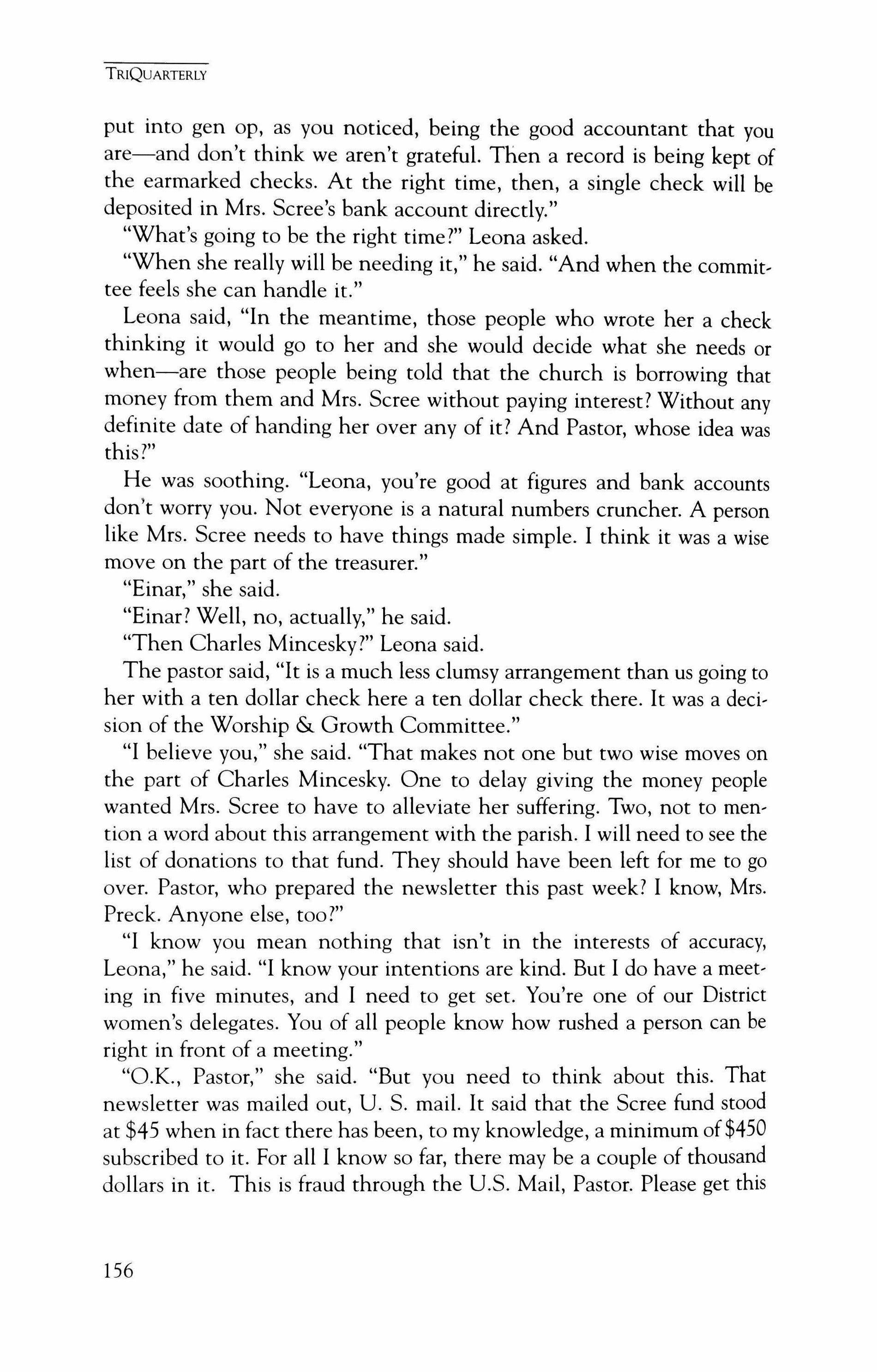
put into gen op, as you noticed, being the good accountant that you are-and don't think we aren't grateful. Then a record is being kept of the earmarked checks. At the right time, then, a single check will be deposited in Mrs. Scree's bank account directly."
"What's going to be the right time?" Leona asked.
"When she really will be needing it," he said. "And when the committee feels she can handle it."
Leona said, "In the meantime, those people who wrote her a check thinking it would go to her and she would decide what she needs or when-are those people being told that the church is borrowing that money from them and Mrs. Scree without paying interest? Without any definite date of handing her over any of it? And Pastor, whose idea was this?"
He was soothing. "Leona, you're good at figures and bank accounts don't worry you. Not everyone is a natural numbers cruncher. A person like Mrs. Scree needs to have things made simple. I think it was a wise move on the part of the treasurer."
"Einar," she said.
"Einar? Well, no, actually," he said.
"Then Charles Mincesky?" Leona said.
The pastor said, "It is a much less clumsy arrangement than us going to her with a ten dollar check here a ten dollar check there. It was a decision of the Worship & Growth Committee."
"I believe you," she said. "That makes not one but two wise moves on the part of Charles Mincesky. One to delay giving the money people wanted Mrs. Scree to have to alleviate her suffering. Two, not to mention a word about this arrangement with the parish. I will need to see the list of donations to that fund. They should have been left for me to go over. Pastor, who prepared the newsletter this past week? I know, Mrs. Preck. Anyone else, too?"
"I know you mean nothing that isn't in the interests of accuracy, Leona," he said. "I know your intentions are kind. But I do have a meeting in five minutes, and I need to get set. You're one of our District women's delegates. You of all people know how rushed a person can be right in front of a meeting."
"O.K., Pastor," she said. "But you need to think about this. That newsletter was mailed out, U. S. mail. It said that the Scree fund stood at $45 when in fact there has been, to my knowledge, a minimum of$450 subscribed to it. For all I know so far, there may be a couple of thousand dollars in it. This is fraud through the U.S. Mail, Pastor. Please get this
TRIQUARTERLY
156
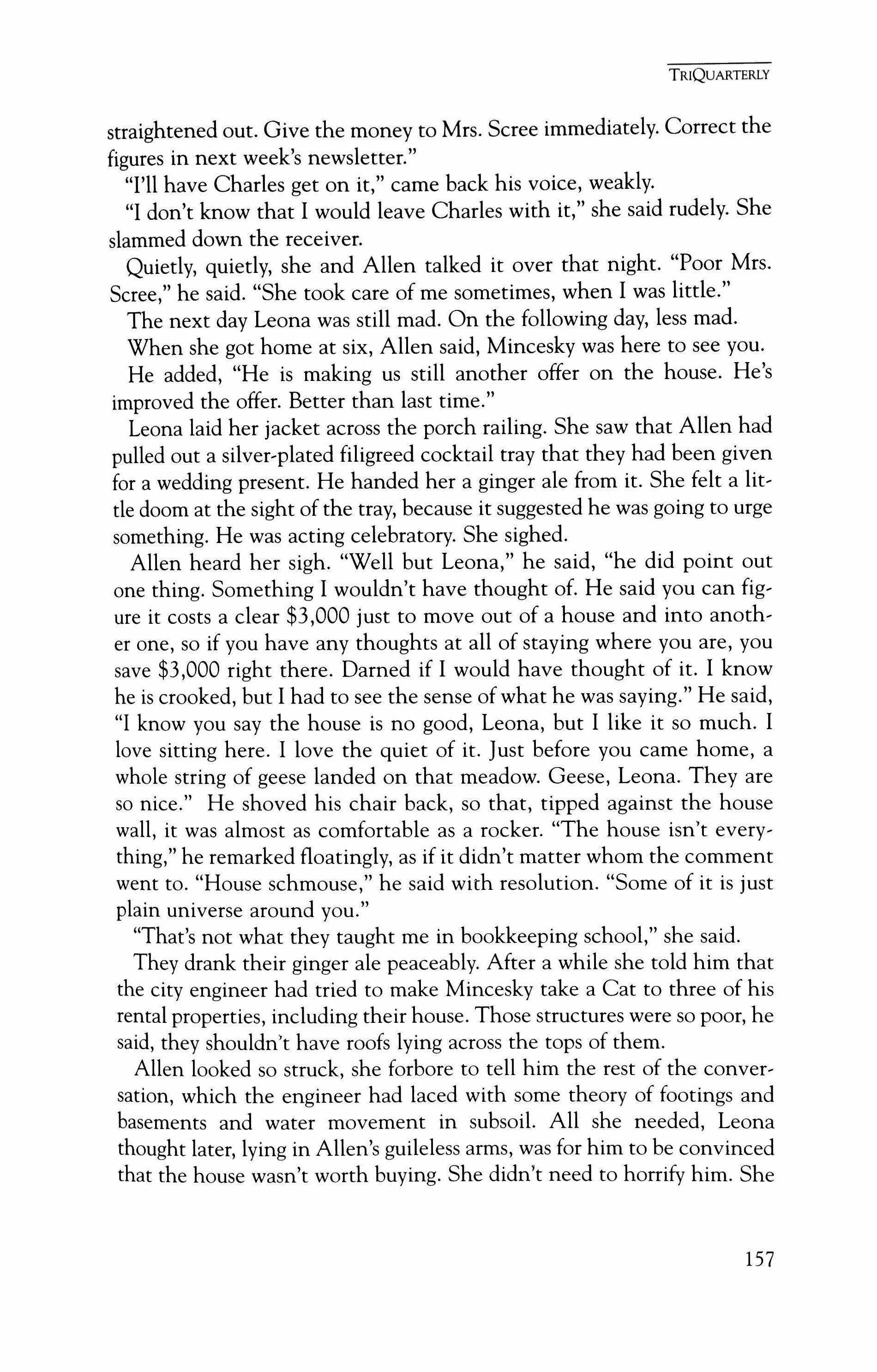
straightened out. Give the money to Mrs. Scree immediately. Correct the figures in next week's newsletter."
"I'll have Charles get on it," came back his voice, weakly.
"I don't know that I would leave Charles with it," she said rudely. She slammed down the receiver.
Quietly, quietly, she and Allen talked it over that night. "Poor Mrs. Scree," he said. "She took care of me sometimes, when I was little."
The next day Leona was still mad. On the following day, less mad.
When she got home at six, Allen said, Mincesky was here to see you.
He added, "He is making us still another offer on the house. He's improved the offer. Better than last time."
Leona laid her jacket across the porch railing. She saw that Allen had pulled out a silver-plated filigreed cocktail tray that they had been given for a wedding present. He handed her a ginger ale from it. She felt a litde doom at the sight of the tray, because it suggested he was going to urge something. He was acting celebratory. She sighed.
Allen heard her sigh. "Well but Leona," he said, "he did point out one thing. Something I wouldn't have thought of. He said you can figure it costs a clear $3,000 just to move out of a house and into anether one, so if you have any thoughts at all of staying where you are, you save $3,000 right there. Darned if I would have thought of it. I know he is crooked, but I had to see the sense of what he was saying." He said, "I know you say the house is no good, Leona, but I like it so much. I love sitting here. I love the quiet of it. Just before you came home, a whole string of geese landed on that meadow. Geese, Leona. They are so nice." He shoved his chair back, so that, tipped against the house wall, it was almost as comfortable as a rocker. "The house isn't everything," he remarked floatingly, as if it didn't matter whom the comment went to. "House schmouse," he said with resolution. "Some of it is just plain universe around you."
"That's not what they taught me in bookkeeping school," she said.
They drank their ginger ale peaceably. After a while she told him that the city engineer had tried to make Mincesky take a Cat to three of his rental properties, including their house. Those structures were so poor, he said, they shouldn't have roofs lying across the tops of them.
Allen looked so struck, she forbore to tell him the rest of the conversation, which the engineer had laced with some theory of footings and basements and water movement in subsoil. All she needed, Leona thought later, lying in Allen's guileless arms, was for him to be convinced that the house wasn't worth buying. She didn't need to horrify him. She
TRIQUARTERLY
157
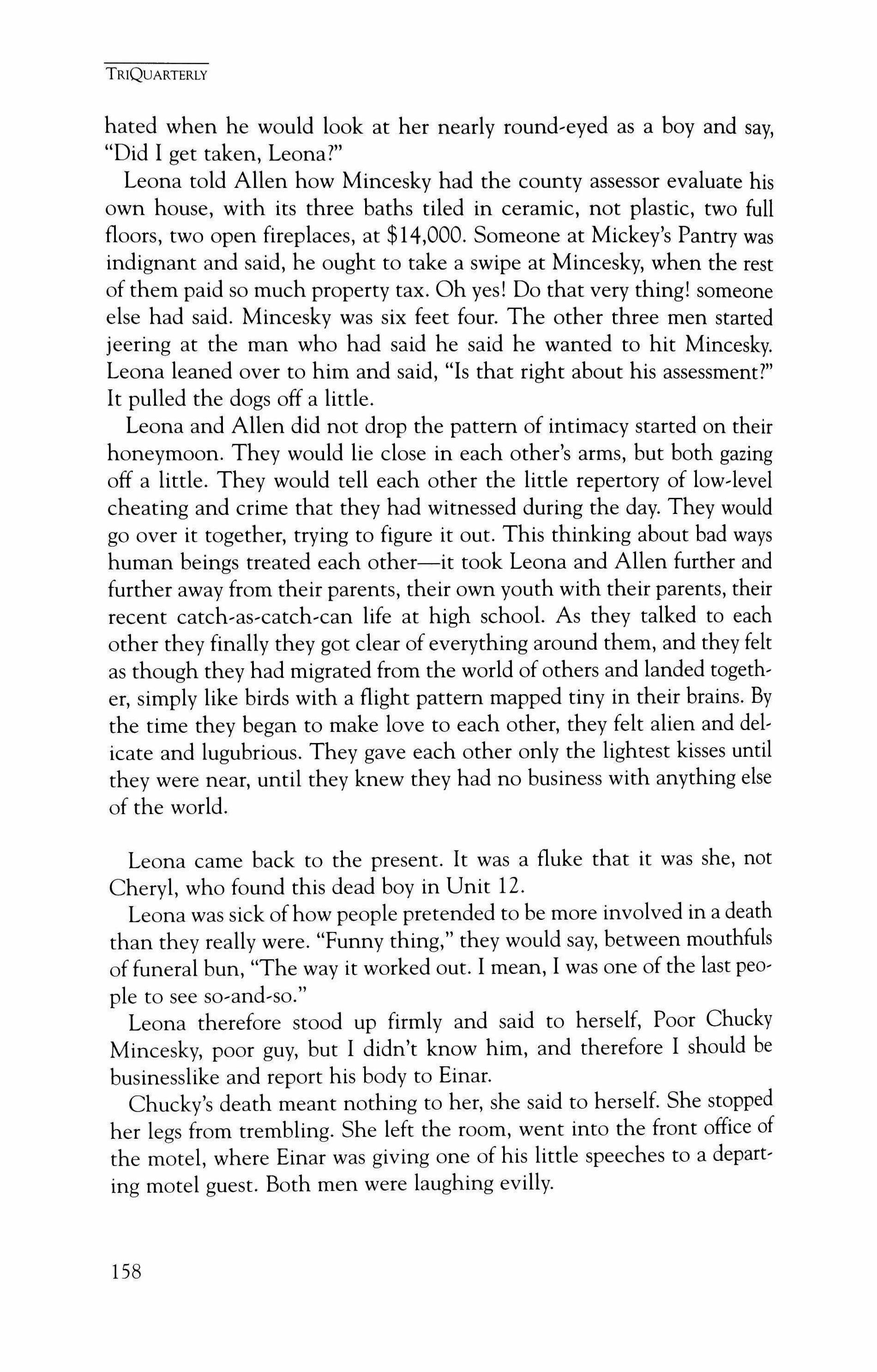
hated when he would look at her nearly round-eyed as a boy and say, "Did I get taken, Leona?"
Leona told Allen how Mincesky had the county assessor evaluate his own house, with its three baths tiled in ceramic, not plastic, two full floors, two open fireplaces, at $14,000. Someone at Mickey's Pantry was indignant and said, he ought to take a swipe at Mincesky, when the rest of them paid so much property tax. Oh yes! Do that very thing! someone else had said. Minceskv was six feet four. The other three men started jeering at the man who had said he said he wanted to hit Mincesky. Leona leaned over to him and said, "Is that right about his assessment?" It pulled the dogs off a little.
Leona and Allen did not drop the pattern of intimacy started on their honeymoon. They would lie close in each other's arms, but both gazing off a little. They would tell each other the little repertory of low-level cheating and crime that they had witnessed during the day. They would go over it together, trying to figure it out. This thinking about bad ways human beings treated each other-it took Leona and Allen further and further away from their parents, their own youth with their parents, their recent catch-as-catch-can life at high school. As they talked to each other they finally they got clear of everything around them, and they felt as though they had migrated from the world of others and landed together, simply like birds with a flight pattern mapped tiny in their brains. By the time they began to make love to each other, they felt alien and delicate and lugubrious. They gave each other only the lightest kisses until they were near, until they knew they had no business with anything else of the world.
Leona came back to the present. It was a fluke that it was she, not Cheryl, who found this dead boy in Unit 12.
Leona was sick ofhow people pretended to be more involved in a death than they really were. "Funny thing," they would say, between mouthfuls of funeral bun, "The way it worked out. I mean, I was one of the last people to see so-and-so."
Leona therefore stood up firmly and said to herself, Poor Chucky Mincesky, poor guy, but I didn't know him, and therefore I should be businesslike and report his body to Einar.
Chucky's death meant nothing to her, she said to herself. She stopped her legs from trembling. She left the room, went into the front office of the motel, where Einar was giving one of his little speeches to a departing motel guest. Both men were laughing evilly.
TRIQUARTERLY
158
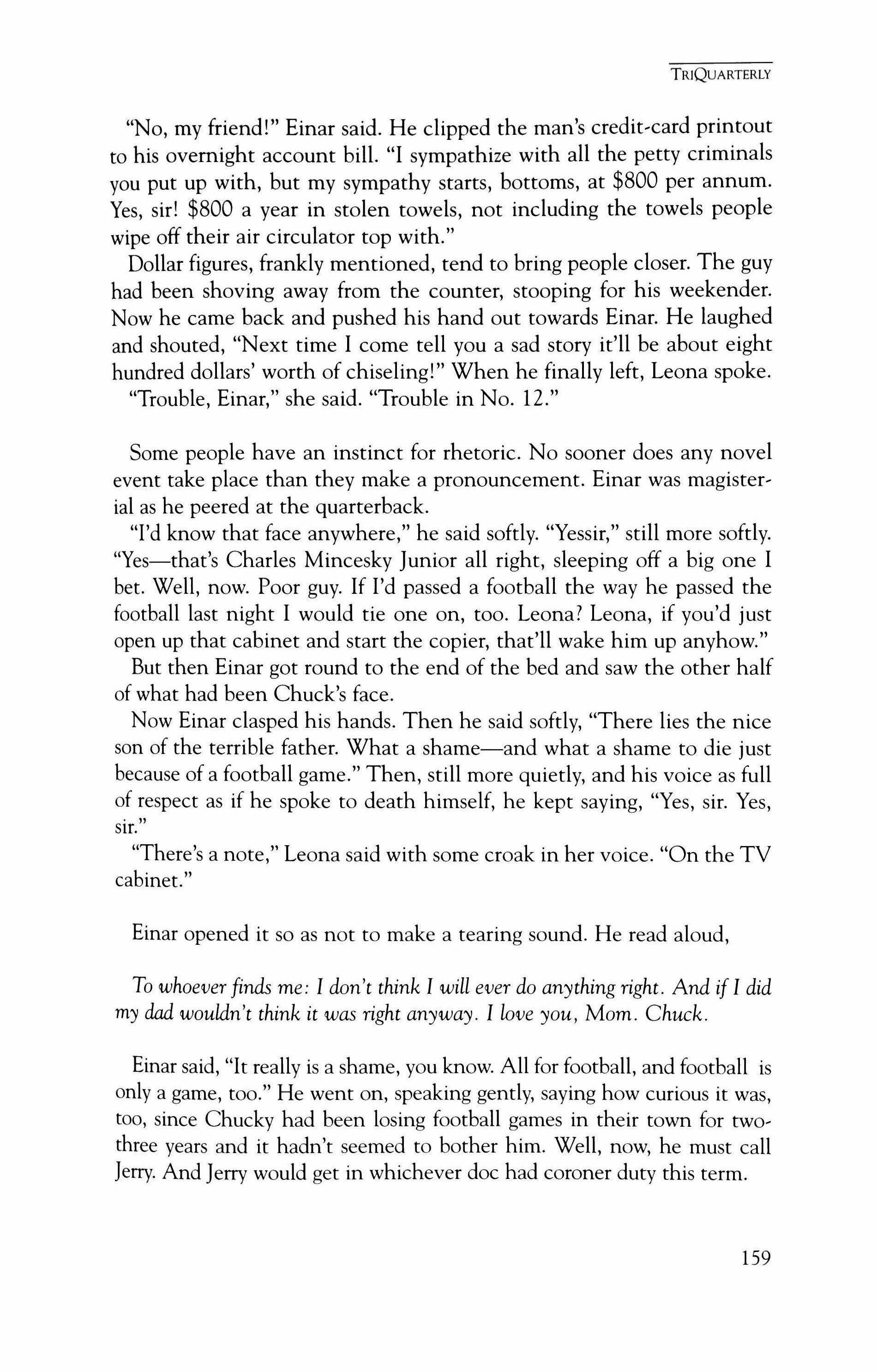
"No, my friend!" Einar said. He clipped the man's credit-card printout to his overnight account bill. "I sympathize with all the petty criminals you put up with, but my sympathy starts, bottoms, at $800 per annum. Yes, sir! $800 a year in stolen towels, not including the towels people wipe off their air circulator top with."
Dollar figures, frankly mentioned, tend to bring people closer. The guy had been shoving away from the counter, stooping for his weekender. Now he came back and pushed his hand out towards Einar. He laughed and shouted, "Next time I come tell you a sad story it'll be about eight hundred dollars' worth of chiseling!" When he finally left, Leona spoke.
"Trouble, Einar," she said. "Trouble in No. 12."
Some people have an instinct for rhetoric. No sooner does any novel event take place than they make a pronouncement. Einar was magisterial as he peered at the quarterback.
"I'd know that face anywhere," he said softly. "Yessir," still more softly. "Yes-that's Charles Mincesky Junior all right, sleeping off a big one I bet. Well, now. Poor guy. If I'd passed a football the way he passed the football last night I would tie one on, too. Leona? Leona, if you'd just open up that cabinet and start the copier, that'll wake him up anyhow."
But then Einar got round to the end of the bed and saw the other half of what had been Chuck's face.
Now Einar clasped his hands. Then he said softly, "There lies the nice son of the terrible father. What a shame-and what a shame to die just because of a football game." Then, still more quietly, and his voice as full of respect as if he spoke to death himself, he kept saying, "Yes, sir. Yes, " Sir.
"There's a note," Leona said with some croak in her voice. "On the TV cabinet."
Einar opened it so as not to make a tearing sound. He read aloud,
To whoever finds me: I don't think I will ever do anything right. And if I did my dad wouldn't think it was right anyway. I love you, Mom. Chuck.
Einar said, "It really is a shame, you know. All for football, and football is only a game, too." He went on, speaking gently, saying how curious it was, too, since Chucky had been losing football games in their town for twothree years and it hadn't seemed to bother him. Well, now, he must call Jerry. And Jerry would get in whichever doc had coroner duty this term.
TRIQUARTERLY
159
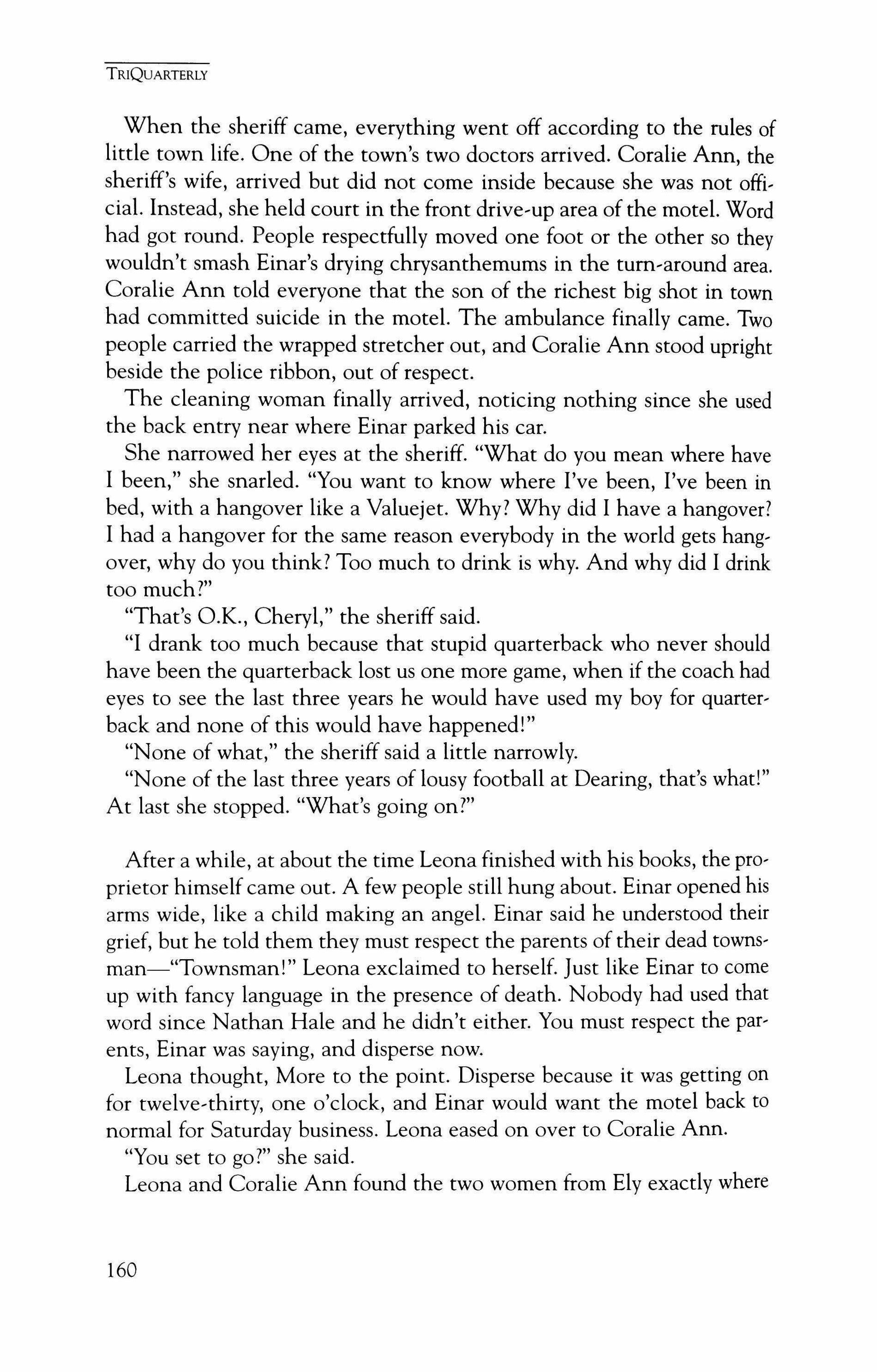
TRIQUARTERLY
When the sheriff came, everything went off according to the rules of little town life. One of the town's two doctors arrived. Coralie Ann, the sheriff's wife, arrived but did not come inside because she was not official. Instead, she held court in the front drive-up area of the motel. Word had got round. People respectfully moved one foot or the other so they wouldn't smash Einar's drying chrysanthemums in the tum-around area. Coralie Ann told everyone that the son of the richest big shot in town had committed suicide in the motel. The ambulance finally came. Two people carried the wrapped stretcher out, and Coralie Ann stood upright beside the police ribbon, out of respect.
The cleaning woman finally arrived, noticing nothing since she used the back entry near where Einar parked his car.
She narrowed her eyes at the sheriff. "What do you mean where have I been," she snarled. "You want to know where I've been, I've been in bed, with a hangover like a Valuejet. Why? Why did I have a hangover? I had a hangover for the same reason everybody in the world gets hangover, why do you think? Too much to drink is why. And why did I drink too much?"
"That's O.K., Cheryl," the sheriff said.
"I drank too much because that stupid quarterback who never should have been the quarterback lost us one more game, when if the coach had eyes to see the last three years he would have used my boy for quarterback and none of this would have happened!"
"None of what," the sheriff said a little narrowly.
"None of the last three years of lousy football at Dearing, that's what!" At last she stopped. "What's going on?"
After a while, at about the time Leona finished with his books, the proprietor himself came out. A few people still hung about. Einar opened his arms wide, like a child making an angel. Einar said he understood their grief, but he told them they must respect the parents of their dead townsman-"Townsman!" Leona exclaimed to herself. Just like Einar to come up with fancy language in the presence of death. Nobody had used that word since Nathan Hale and he didn't either. You must respect the parents, Einar was saying, and disperse now.
Leona thought, More to the point. Disperse because it was getting on for twelve-thirty, one o'clock, and Einar would want the motel back to normal for Saturday business. Leona eased on over to Coralie Ann.
"You set to go?" she said.
Leona and Coralie Ann found the two women from Ely exactly where
160
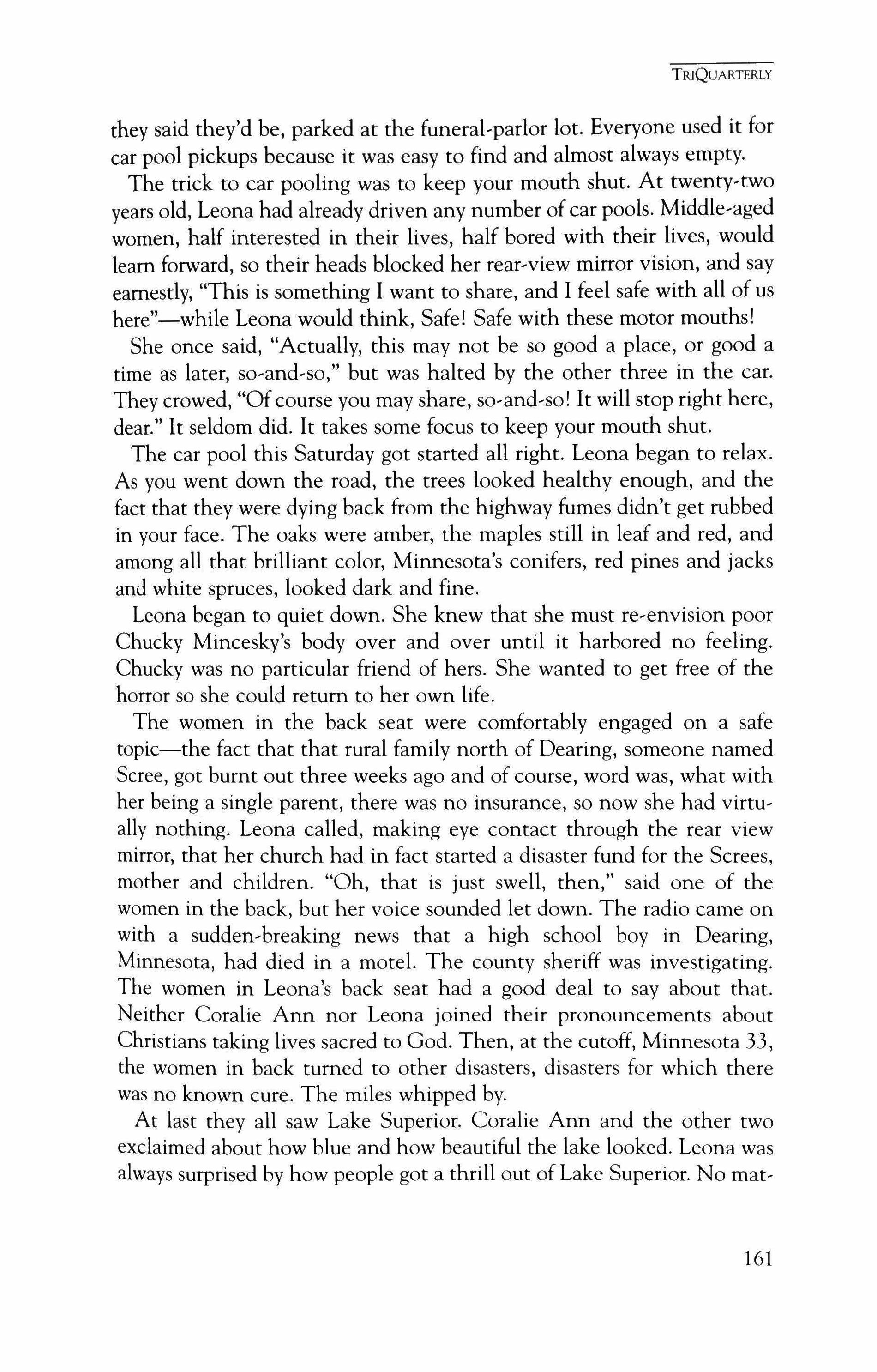
they said they'd be, parked at the funeral-parlor lot. Everyone used it for car pool pickups because it was easy to find and almost always empty.
The trick to car pooling was to keep your mouth shut. At twenty-two years old, Leona had already driven any number of car pools. Middle-aged women, half interested in their lives, half bored with their lives, would learn forward, so their heads blocked her rear-view mirror vision, and say earnestly, "This is something I want to share, and I feel safe with all of us here"-while Leona would think, Safe! Safe with these motor mouths!
She once said, "Actually, this may not be so good a place, or good a time as later, so-and-so," but was halted by the other three in the car. They crowed, "Of course you may share, so-and-so! It will stop right here, dear." It seldom did. It takes some focus to keep your mouth shut.
The car pool this Saturday got started all right. Leona began to relax. As you went down the road, the trees looked healthy enough, and the fact that they were dying back from the highway fumes didn't get rubbed in your face. The oaks were amber, the maples still in leaf and red, and among all that brilliant color, Minnesota's conifers, red pines and jacks and white spruces, looked dark and fine.
Leona began to quiet down. She knew that she must re-envision poor Chucky Mincesky's body over and over until it harbored no feeling. Chucky was no particular friend of hers. She wanted to get free of the horror so she could return to her own life.
The women in the back seat were comfortably engaged on a safe topic-the fact that that rural family north of Dearing, someone named Scree, got burnt out three weeks ago and of course, word was, what with her being a single parent, there was no insurance, so now she had virtually nothing. Leona called, making eye contact through the rear view mirror, that her church had in fact started a disaster fund for the Screes, mother and children. "Oh, that is just swell, then," said one of the women in the back, but her voice sounded let down. The radio came on with a sudden-breaking news that a high school boy in Dearing, Minnesota, had died in a motel. The county sheriff was investigating. The women in Leona's back seat had a good deal to say about that. Neither Coralie Ann nor Leona joined their pronouncements about Christians taking lives sacred to God. Then, at the cutoff, Minnesota 33, the women in back turned to other disasters, disasters for which there was no known cure. The miles whipped by.
At last they all saw Lake Superior. Coralie Ann and the other two exclaimed about how blue and how beautiful the lake looked. Leona was always surprised by how people got a thrill out of Lake Superior. No mat-
TRIQUARTERLY
161
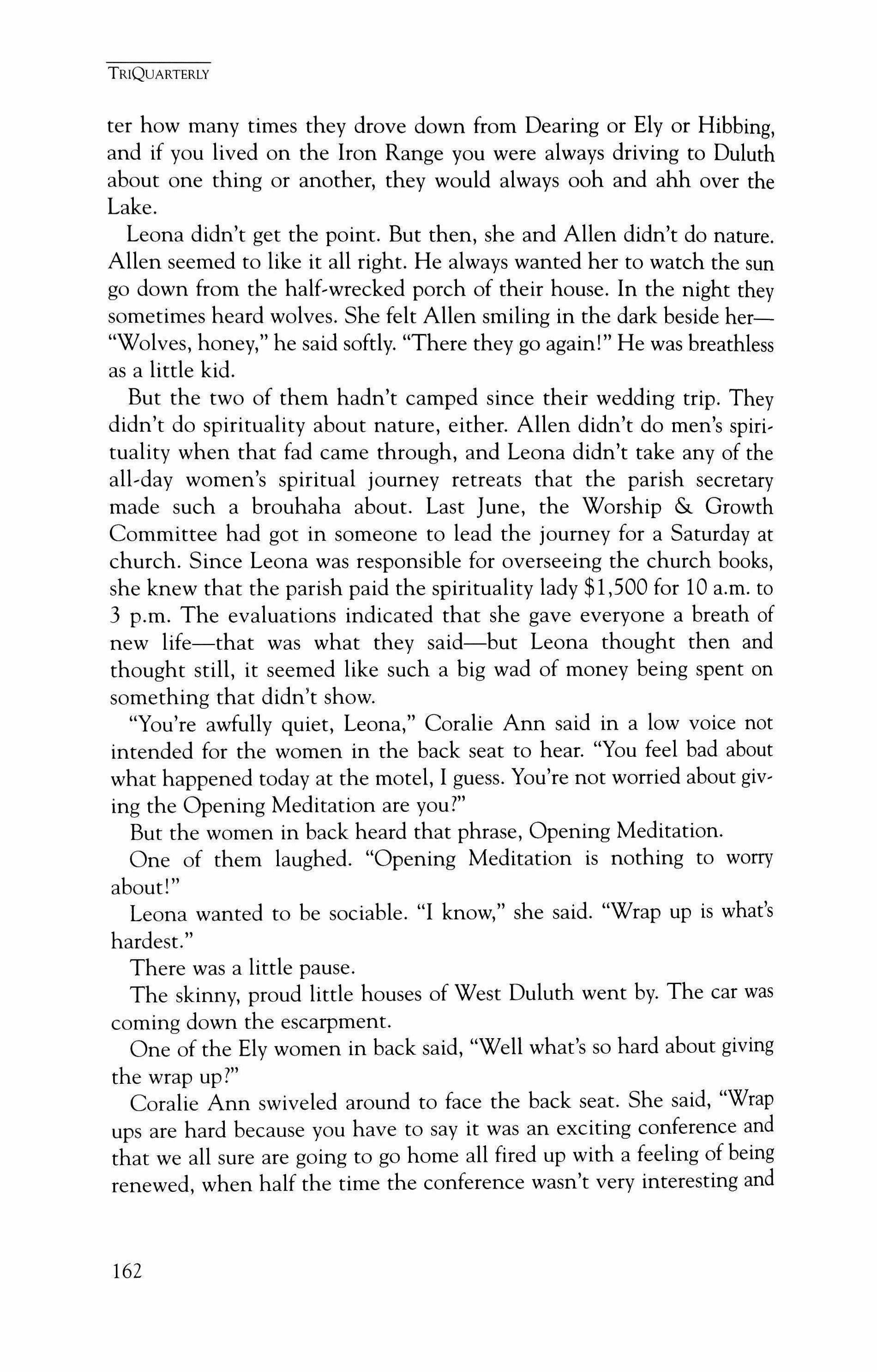
ter how many times they drove down from Dearing or Ely or Hibbing, and if you lived on the Iron Range you were always driving to Duluth about one thing or another, they would always ooh and ahh over the Lake.
Leona didn't get the point. But then, she and Allen didn't do nature. Allen seemed to like it all right. He always wanted her to watch the sun go down from the half-wrecked porch of their house. In the night they sometimes heard wolves. She felt Allen smiling in the dark beside her"Wolves, honey," he said softly. "There they go again!" He was breathless as a little kid.
But the two of them hadn't camped since their wedding trip. They didn't do spirituality about nature, either. Allen didn't do men's spirituality when that fad came through, and Leona didn't take any of the all-day women's spiritual journey retreats that the parish secretary made such a brouhaha about. Last June, the Worship & Growth Committee had got in someone to lead the journey for a Saturday at church. Since Leona was responsible for overseeing the church books, she knew that the parish paid the spirituality lady $1,500 for 10 a.m. to 3 p.m. The evaluations indicated that she gave everyone a breath of new life-that was what they said-but Leona thought then and thought still, it seemed like such a big wad of money being spent on something that didn't show.
"You're awfully quiet, Leona," Coralie Ann said in a low voice not intended for the women in the back seat to hear. "You feel bad about what happened today at the motel, I guess. You're not worried about giving the Opening Meditation are you?"
But the women in back heard that phrase, Opening Meditation.
One of them laughed. "Opening Meditation is nothing to worry about!"
Leona wanted to be sociable. "I know," she said. "Wrap up is what's hardest."
There was a little pause.
The skinny, proud little houses of West Duluth went by. The car was coming down the escarpment.
One of the Ely women in back said, "Well what's so hard about giving the wrap up?"
Coralie Ann swiveled around to face the back seat. She said, "Wrap ups are hard because you have to say it was an exciting conference and that we all sure are going to go home all fired up with a feeling of being renewed, when half the time the conference wasn't very interesting and
TRIQUARTERLY
162
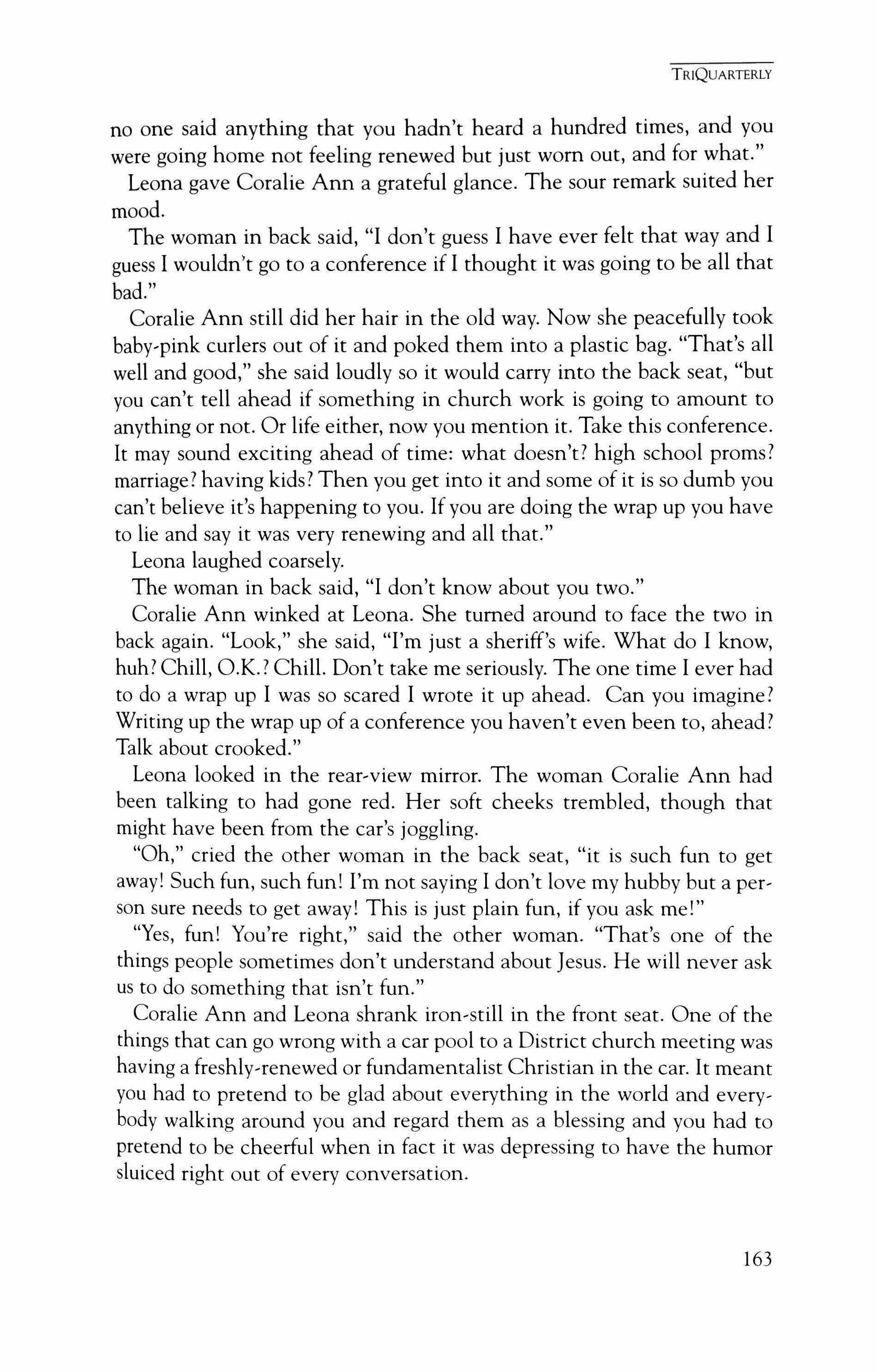
no one said anything that you hadn't heard a hundred times, and you were going home not feeling renewed but just worn out, and for what."
Leona gave Coralie Ann a grateful glance. The sour remark suited her mood.
The woman in back said, "I don't guess I have ever felt that way and I guess I wouldn't go to a conference if I thought it was going to be all that bad."
Coralie Ann still did her hair in the old way. Now she peacefully took baby-pink curlers out of it and poked them into a plastic bag. "That's all well and good," she said loudly so it would carry into the back seat, "but you can't tell ahead if something in church work is going to amount to anything or not. Or life either, now you mention it. Take this conference. It may sound exciting ahead of time: what doesn't? high school proms? marriage? having kids? Then you get into it and some of it is so dumb you can't believe it's happening to you. If you are doing the wrap up you have to lie and say it was very renewing and all that."
Leona laughed coarsely.
The woman in back said, "I don't know about you two."
Coralie Ann winked at Leona. She turned around to face the two in back again. "Look," she said, "I'm just a sheriff's wife. What do I know, huh? Chill, O.K.? Chill. Don't take me seriously. The one time I ever had to do a wrap up I was so scared I wrote it up ahead. Can you imagine? Writing up the wrap up of a conference you haven't even been to, ahead? Talk about crooked."
Leona looked in the rear-view mirror. The woman Coralie Ann had been talking to had gone red. Her soft cheeks trembled, though that might have been from the car's joggling.
"Oh," cried the other woman in the back seat, "it is such fun to get away! Such fun, such fun! I'm not saying I don't love my hubby but a person sure needs to get away! This is just plain fun, if you ask me!"
"Yes, fun! You're right," said the other woman. "That's one of the things people sometimes don't understand about Jesus. He will never ask us to do something that isn't fun."
Coralie Ann and Leona shrank iron-still in the front seat. One of the things that can go wrong with a car pool to a District church meeting was having a freshly-renewed or fundamentalist Christian in the car. It meant you had to pretend to be glad about everything in the world and everybody walking around you and regard them as a blessing and you had to pretend to be cheerful when in fact it was depressing to have the humor sluiced right out of every conversation.
TRIQUARTERLY
163
TRIQUARTERLY
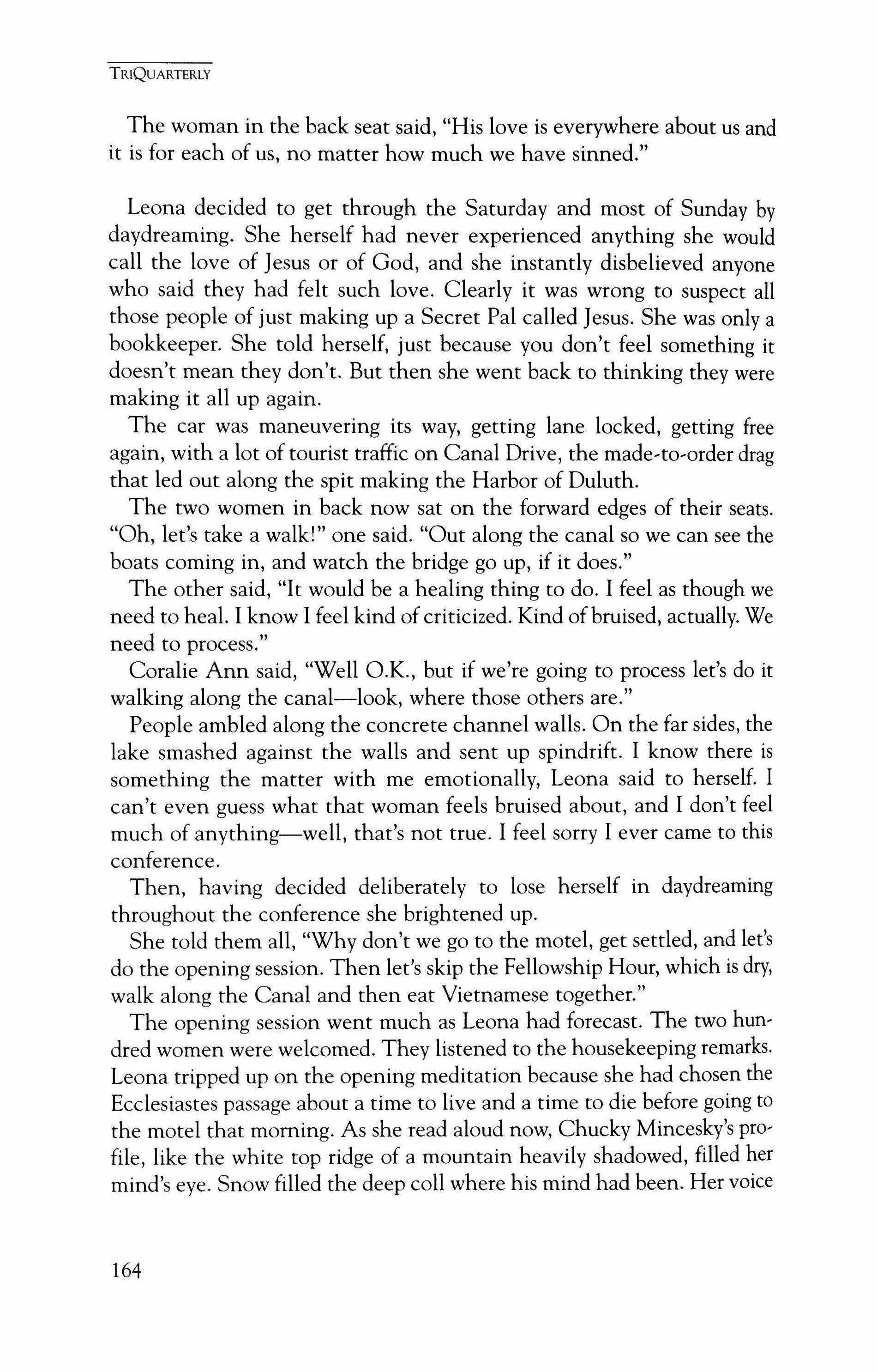
The woman in the back seat said, "His love is everywhere about us and it is for each of us, no matter how much we have sinned."
Leona decided to get through the Saturday and most of Sunday by daydreaming. She herself had never experienced anything she would call the love of Jesus or of God, and she instantly disbelieved anyone who said they had felt such love. Clearly it was wrong to suspect all those people of just making up a Secret Pal called Jesus. She was only a bookkeeper. She told herself, just because you don't feel something it doesn't mean they don't. But then she went back to thinking they were making it all up again.
The car was maneuvering its way, getting lane locked, getting free again, with a lot of tourist traffic on Canal Drive, the made-to-order drag that led out along the spit making the Harbor of Duluth.
The two women in back now sat on the forward edges of their seats. "Oh, let's take a walk!" one said. "Out along the canal so we can see the boats coming in, and watch the bridge go up, if it does."
The other said, "It would be a healing thing to do. I feel as though we need to heal. I know I feel kind of criticized. Kind of bruised, actually. We need to process."
Coralie Ann said, "Well O.K., but if we're going to process let's do it walking along the canal-look, where those others are."
People ambled along the concrete channel walls. On the far sides, the lake smashed against the walls and sent up spindrift. I know there is something the matter with me emotionally, Leona said to herself. I can't even guess what that woman feels bruised about, and I don't feel much of anything-well, that's not true. I feel sorry I ever came to this conference.
Then, having decided deliberately to lose herself in daydreaming throughout the conference she brightened up.
She told them all, "Why don't we go to the motel, get settled, and let's do the opening session. Then let's skip the Fellowship Hour, which is dry, walk along the Canal and then eat Vietnamese together."
The opening session went much as Leona had forecast. The two hundred women were welcomed. They listened to the housekeeping remarks. Leona tripped up on the opening meditation because she had chosen the Ecclesiastes passage about a time to live and a time to die before going to the motel that morning. As she read aloud now, Chucky Mincesky's profile, like the white top ridge of a mountain heavily shadowed, filled her mind's eye. Snow filled the deep coll where his mind had been. Her voice
164
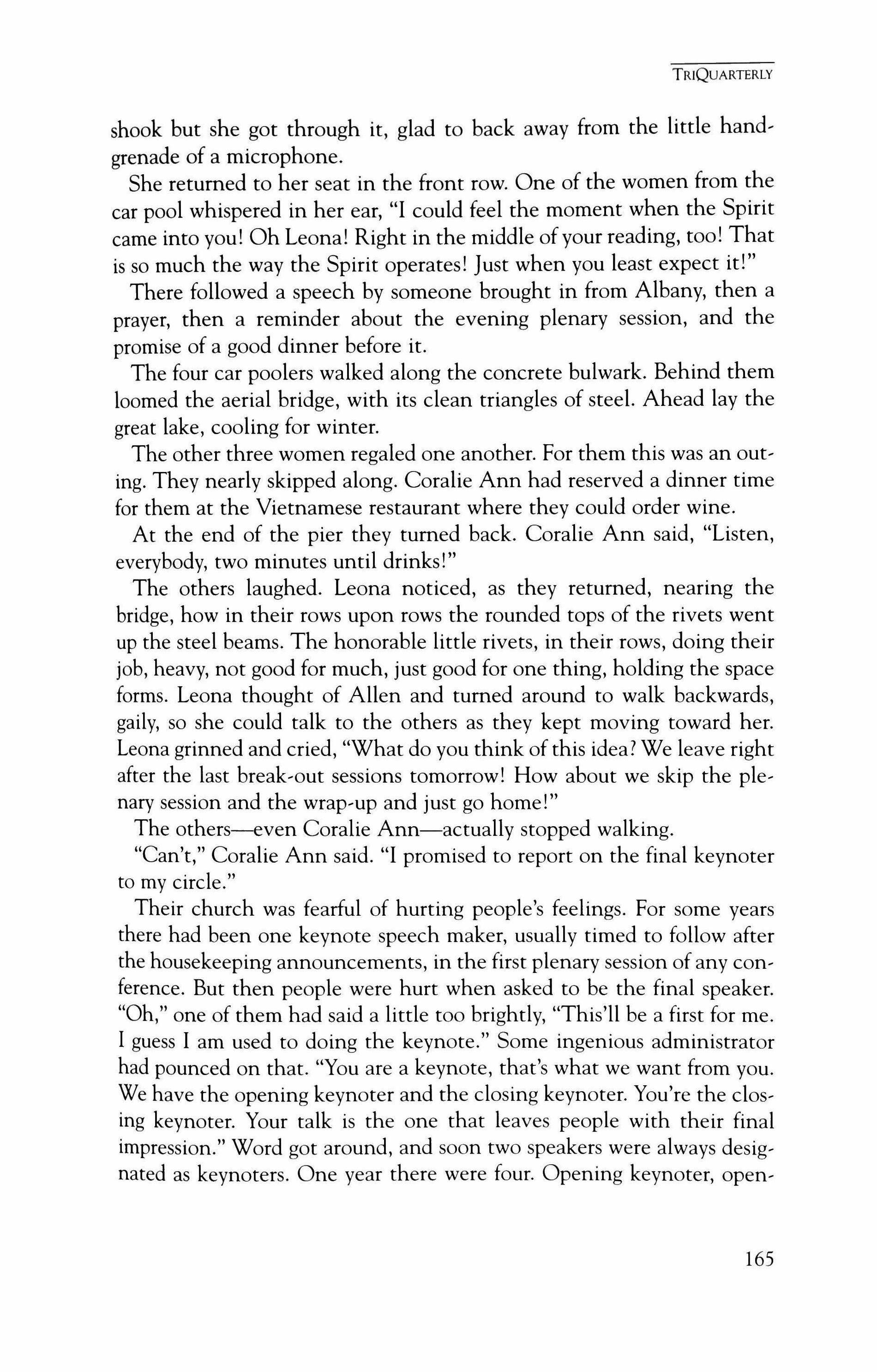
shook but she got through it, glad to back away from the little handgrenade of a microphone.
She returned to her seat in the front row. One of the women from the car pool whispered in her ear, "I could feel the moment when the Spirit came into you! Oh Leona! Right in the middle of your reading, too! That is so much the way the Spirit operates! Just when you least expect it!"
There followed a speech by someone brought in from Albany, then a prayer, then a reminder about the evening plenary session, and the promise of a good dinner before it.
The four car poolers walked along the concrete bulwark. Behind them loomed the aerial bridge, with its clean triangles of steel. Ahead lay the great lake, cooling for winter.
The other three women regaled one another. For them this was an outing. They nearly skipped along. Coralie Ann had reserved a dinner time for them at the Vietnamese restaurant where they could order wine.
At the end of the pier they turned back. Coralie Ann said, "Listen, everybody, two minutes until drinks!"
The others laughed. Leona noticed, as they returned, nearing the bridge, how in their rows upon rows the rounded tops of the rivets went up the steel beams. The honorable little rivets, in their rows, doing their job, heavy, not good for much, just good for one thing, holding the space forms. Leona thought of Allen and turned around to walk backwards, gaily, so she could talk to the others as they kept moving toward her. Leona grinned and cried, "What do you think of this idea? We leave right after the last break-out sessions tomorrow! How about we skip the plenary session and the wrap-up and just go home!"
The others-even Coralie Ann-actually stopped walking.
"Can't," Coralie Ann said. "I promised to report on the final keynoter to my circle."
Their church was fearful of hurting people's feelings. For some years there had been one keynote speech maker, usually timed to follow after the housekeeping announcements, in the first plenary session of any conference. But then people were hurt when asked to be the final speaker. "Oh," one of them had said a little too brightly, "This'll be a first for me. I guess I am used to doing the keynote." Some ingenious administrator had pounced on that. "You are a keynote, that's what we want from you. We have the opening keynoter and the closing keynoter. You're the closing keynoter. Your talk is the one that leaves people with their final impression." Word got around, and soon two speakers were always designated as keynoters. One year there were four. Opening keynoter, open-
TRIQUARTERLY
165
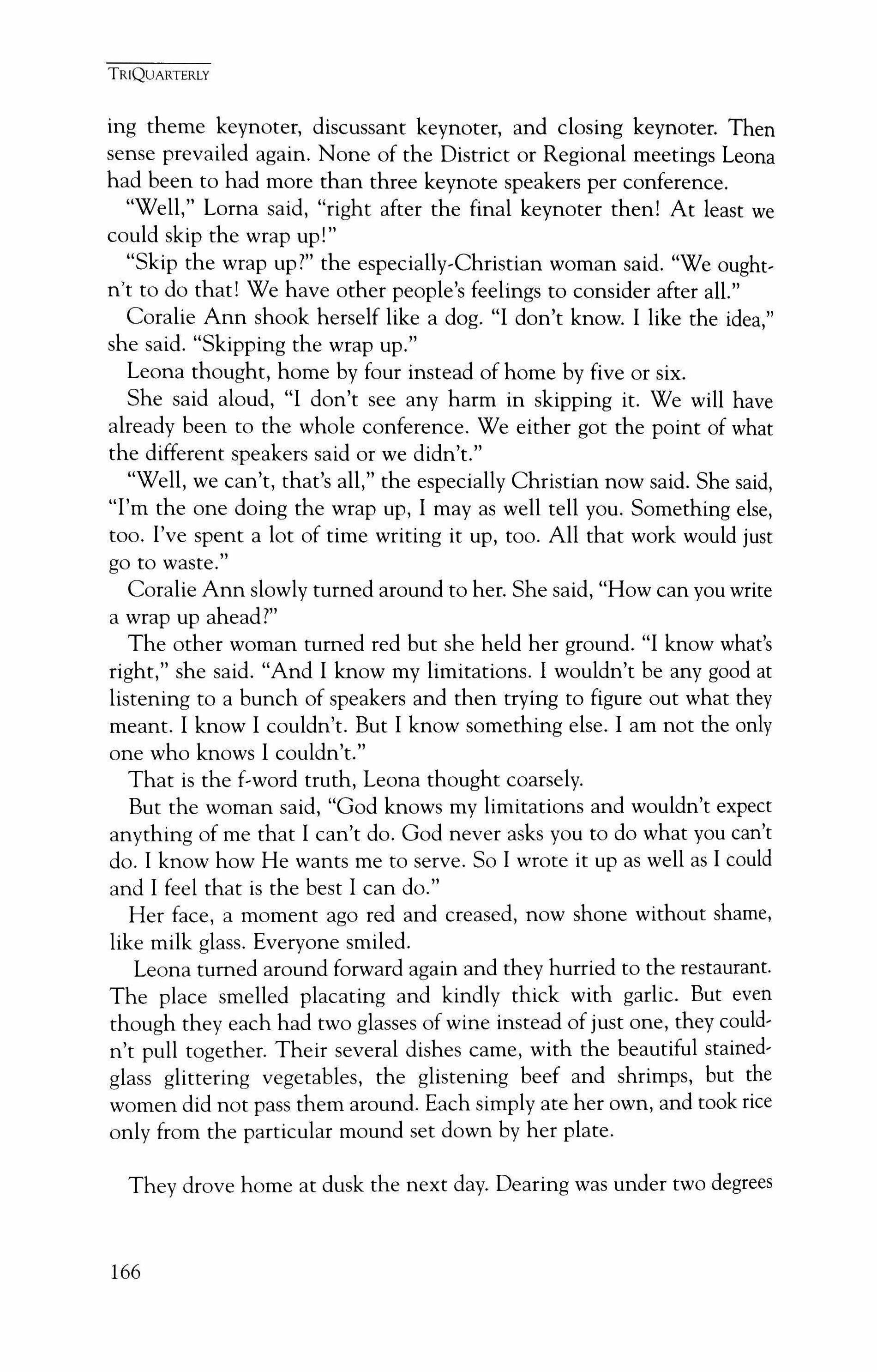
ing theme keynoter, discussant keynoter, and closing keynoter. Then sense prevailed again. None of the District or Regional meetings Leona had been to had more than three keynote speakers per conference.
"Well," Lorna said, "right after the final keynoter then! At least we could skip the wrap up!"
"Skip the wrap up?" the especially-Christian woman said. "We oughtn't to do that! We have other people's feelings to consider after all."
Coralie Ann shook herself like a dog. "I don't know. I like the idea," she said. "Skipping the wrap up."
Leona thought, home by four instead of home by five or six.
She said aloud, "I don't see any harm in skipping it. We will have already been to the whole conference. We either got the point of what the different speakers said or we didn't."
"Well, we can't, that's all," the especially Christian now said. She said, "I'm the one doing the wrap up, I may as well tell you. Something else, too. I've spent a lot of time writing it up, too. All that work would just go to waste."
Coralie Ann slowly turned around to her. She said, "How can you write a wrap up ahead?"
The other woman turned red but she held her ground. "I know what's right," she said. "And I know my limitations. I wouldn't be any good at listening to a bunch of speakers and then trying to figure out what they meant. I know I couldn't. But I know something else. I am not the only one who knows I couldn't."
That is the f-word truth, Leona thought coarsely.
But the woman said, "God knows my limitations and wouldn't expect anything of me that I can't do. God never asks you to do what you can't do. I know how He wants me to serve. So I wrote it up as well as I could and I feel that is the best I can do."
Her face, a moment ago red and creased, now shone without shame, like milk glass. Everyone smiled.
Leona turned around forward again and they hurried to the restaurant. The place smelled placating and kindly thick with garlic. But even though they each had two glasses of wine instead of just one, they couldn't pull together. Their several dishes came, with the beautiful stainedglass glittering vegetables, the glistening beef and shrimps, but the women did not pass them around. Each simply ate her own, and took rice only from the particular mound set down by her plate.
They drove home at dusk the next day. Dearing was under two degrees
TRIQUARTERLY
166
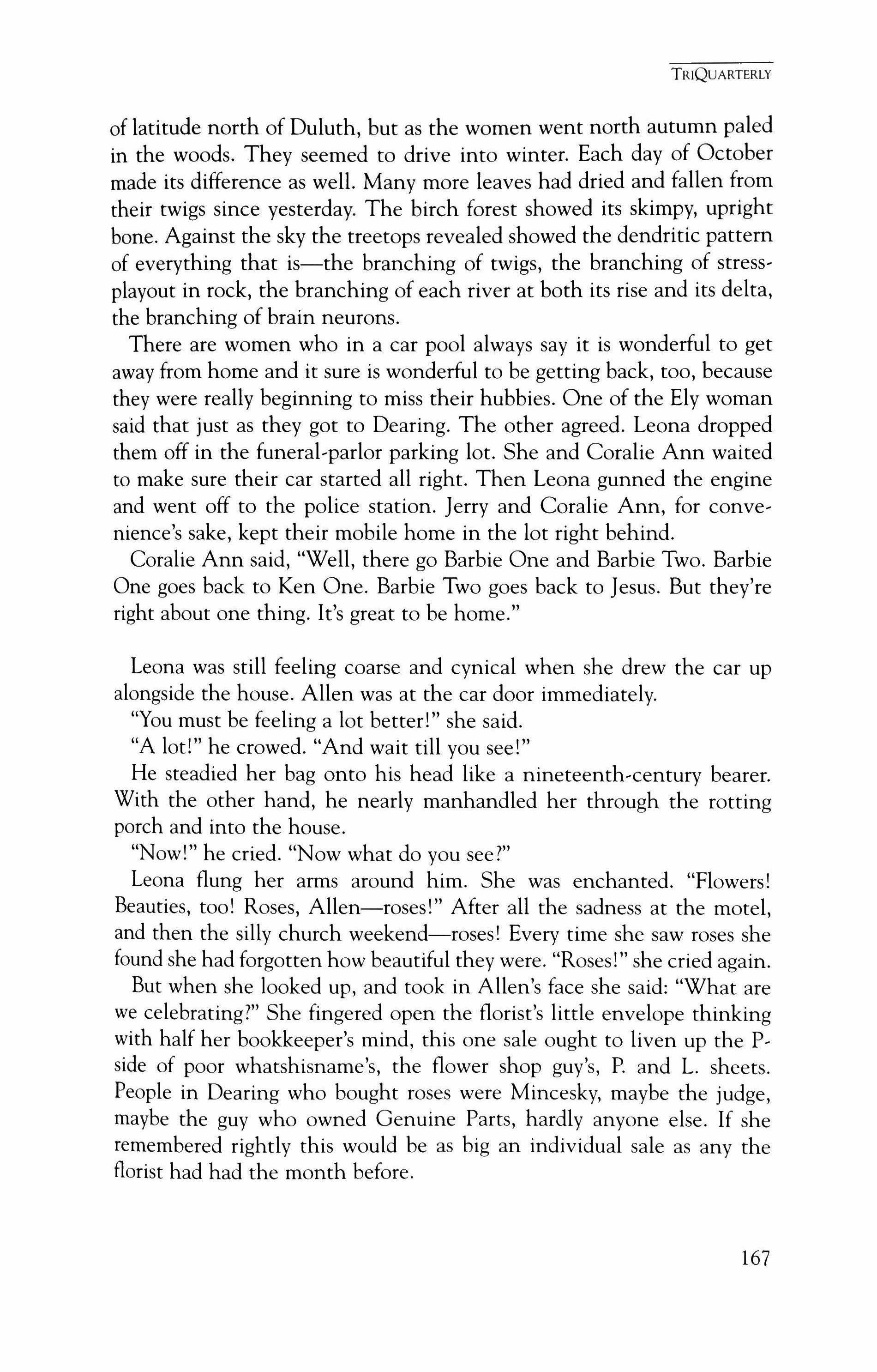
of latitude north of Duluth, but as the women went north autumn paled in the woods. They seemed to drive into winter. Each day of October made its difference as well. Many more leaves had dried and fallen from their twigs since yesterday. The birch forest showed its skimpy, upright bone. Against the sky the treetops revealed showed the dendritic pattern of everything that is-the branching of twigs, the branching of stressplayout in rock, the branching of each river at both its rise and its delta, the branching of brain neurons.
There are women who in a car pool always say it is wonderful to get away from home and it sure is wonderful to be getting back, too, because they were really beginning to miss their hubbies. One of the Ely woman said that just as they got to Dearing. The other agreed. Leona dropped them off in the funeral-parlor parking lot. She and Coralie Ann waited to make sure their car started all right. Then Leona gunned the engine and went off to the police station. Jerry and Coralie Ann, for convenience's sake, kept their mobile home in the lot right behind.
Coralie Ann said, "Well, there go Barbie One and Barbie Two. Barbie One goes back to Ken One. Barbie Two goes back to Jesus. But they're right about one thing. It's great to be home."
Leona was still feeling coarse and cynical when she drew the car up alongside the house. Allen was at the car door immediately.
"You must be feeling a lot better!" she said.
"A lot!" he crowed. "And wait till you see!"
He steadied her bag onto his head like a nineteenth-century bearer. With the other hand, he nearly manhandled her through the rotting porch and into the house.
UN I" h d "N h d 7" ow. e cne. ow w at 0 you see.
Leona flung her arms around him. She was enchanted. "Flowers! Beauties, too! Roses, Allen-roses!" After all the sadness at the motel, and then the silly church weekend-roses! Every time she saw roses she found she had forgotten how beautiful they were. "Roses!" she cried again. But when she looked up, and took in Allen's face she said: "What are we celebrating?" She fingered open the florist's little envelope thinking with half her bookkeeper's mind, this one sale ought to liven up the Pside of poor whatshisname's, the flower shop guy's, P. and L. sheets. People in Dearing who bought roses were Mincesky, maybe the judge, maybe the guy who owned Genuine Parts, hardly anyone else. If she remembered rightly this would be as big an individual sale as any the florist had had the month before.
TRIQUARTERLY
167

TRIQUARTERLY
"Don't you see anything else?" cried Allen. He nearly danced around her. She felt irritated by his boyish enthusiasm. He had done something nice for her, she supposed, and now wanted to be petted for it. He was such a baby. He had no idea that she had worried about him in the car, for hours, really, underneath and intermingling with her other worries. And she had made up her mind again, as she had to do every day, not to feel wistful that he bungled it every time he did business with anyone. And he usually moved slowly. He would never do anything with dispatch! Why didn't he? Wasn't that a man's responsibility? No-it wasn't. She was being a sexist. Still, still one expected no matter what she expected, she felt irritated because she had to make herself be patient, first about herself for being so upset by that Mincesky kid's suicide, then about Allen, then about those women in the car with their soapy, selfindulgent lying-she had forced herself to be sociable and nonjudgmental and cheerful. She felt gritty and heavy with her thoughts. She had longed for Allen. She realized that late Saturday and all during the daytime on Sunday she had wanted to lie in bed with Allen. But she had wanted him in a slow, deep frame of things. She wanted him because he was quiet and he was what he was-not this ignited colt prancing about, begging her to be enthusiastic about something.
But all of a sudden he seemed to change his mind. "Oh, never mind," he said. "Sit down."
The couch clearly showed he had spent restless hours on it. The afghan, a knitted wedding present made of acrylic yam, was wadded up at the foot. The white-encased pillow she had brought from their bed yesterday lay piled on top of the ordinary sofa pillows, deeply dented by Allen's head. She thought he may have spent the night there.
"Wait till you hear," he said. He had fetched out their filigreed silverplate tray, which he admired but she didn't. She never saw it but she thought of how she had made Allen write the thank-you note for it. Allen handed her a glass from it, filled right up to the top. It spilled over a little as she took it.
"Wine!" she said.
"We're celebrating!" he said. "Just you hear!"
He told everything, looking hard at her all the while, as if to make sure she didn't misunderstand his feeling of each moment.
He had been very sick with the flu before she left for the motel the day before. He was still healing from the surgery of two weeks earlier as well.
168

He had been touched at how she fixed him up on the couch, with hot water bag and Kleenex and a large mixing bowl in case he had to vomit quickly. When Leona's car had backed away from the house, stopped, and then gone down the street and he couldn't hear anything of its engine he felt lonely for a moment. In the next moment he didn't mind that Leona was gone. This surprised him, but he couldn't deny it. He was not in the mood for her brisk practicality. She was such a problem-solver-well, and weakened from sickness, a little starving, really half dreaming, he didn't feel like all her common sense. He wanted just to moon around through his thoughts, lighting wherever his mind felt like it.
From the couch he could see the first of the oak leaves going. Allen lay there half-awake, absently sliding one fingertip back and forth along his surgical scar. The scar was a narrow, gradually lowering little mountain ridge. He felt a little piteous, the way he had sometimes felt as a boy. As a boy he had fantasized committing suicide not for any wanting of death-he had loved life, actually-but for the sake ofthe delicious vision of how terrible his parents would feel. They would come home and find him dead, dead on a couch, just as he lay now. If only we had loved him more, they would say. Especially his father would apologize. His father would say to his mother, "And I am sorry for sorry for everything else, too." Allen felt reminiscent of that boyhood fantasy now, but mainly only for the fun of it. Mostly he was glad to be getting over the flu, glad the surgery had gone well: he felt affectionate and protective of his body as it went about healing itself. He lay there, contented enough, weak and full ofdaydreams. Out the window, a mist clarified itself here and there in the brome grasses and quack. He felt slack-hearted and yet moved by the brown sight outside. He dozed. He dreamed about his mother.
He woke shaken, unnerved, scornful of his own sensitivities. Outright scornful. He turned on the radio to clear the air of emotion. Someone announced that in Dearing, Minnesota, a young boy had been found, a case of apparent suicide in a motel. Charles Mincesky Junior. Allen had sat bolt upright. Chucky Mincesky, not a kid he knew well, but the son of his landlord.
Then fast as a mist, fear poured over Allen. Not altruistic fear, but fear for his own death. He knew better but got afraid of his own death anyway. He told himself, he was only twenty-three. If one isn't of a nationality that gets invaded and bullied to death by some other nationality, one doesn't die at twenty-three. He was helped by nature. A loon called in octave-that is, not the best-known, trilling laugh, but the full-octave squawk, which is their comfort sound as opposed to their fear sound.
TRIQUARTERLY
169
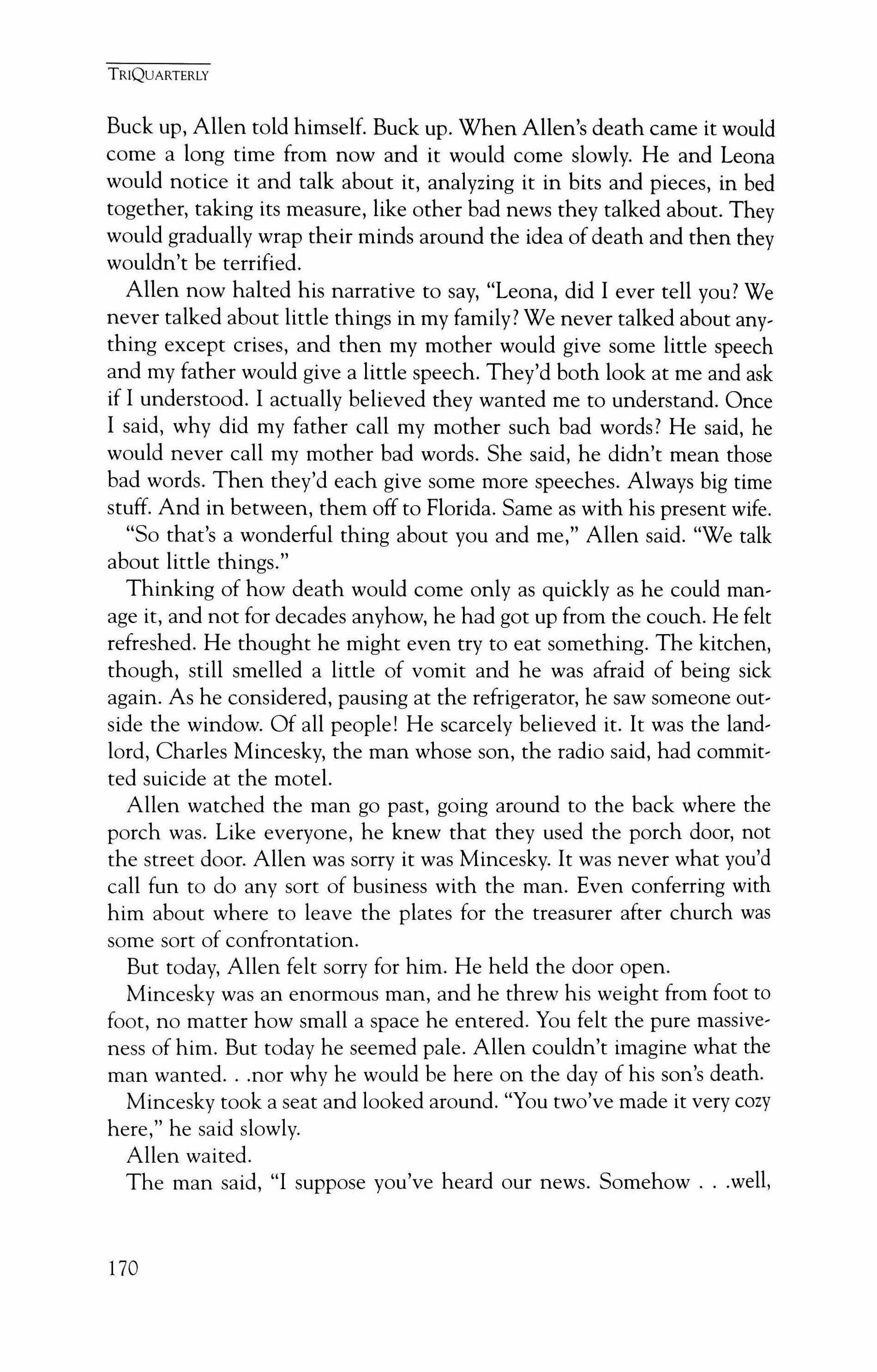
TRIQUARTERLY
Buck up, Allen told himself. Buck up. When Allen's death came it would come a long time from now and it would come slowly. He and Leona would notice it and talk about it, analyzing it in bits and pieces, in bed together, taking its measure, like other bad news they talked about. They would gradually wrap their minds around the idea of death and then they wouldn't be terrified.
Allen now halted his narrative to say, "Leona, did I ever tell you? We never talked about little things in my family? We never talked about anything except crises, and then my mother would give some little speech and my father would give a little speech. They'd both look at me and ask if I understood. I actually believed they wanted me to understand. Once I said, why did my father call my mother such bad words? He said, he would never call my mother bad words. She said, he didn't mean those bad words. Then they'd each give some more speeches. Always big time stuff. And in between, them off to Florida. Same as with his present wife.
"So that's a wonderful thing about you and me," Allen said. "We talk about little things."
Thinking of how death would come only as quickly as he could manage it, and not for decades anyhow, he had got up from the couch. He felt refreshed. He thought he might even try to eat something. The kitchen, though, still smelled a little of vomit and he was afraid of being sick again. As he considered, pausing at the refrigerator, he saw someone outside the window. Of all people! He scarcely believed it. It was the landlord, Charles Mincesky, the man whose son, the radio said, had committed suicide at the motel.
Allen watched the man go past, going around to the back where the porch was. Like everyone, he knew that they used the porch door, not the street door. Allen was sorry it was Mincesky. It was never what you'd call fun to do any sort of business with the man. Even conferring with him about where to leave the plates for the treasurer after church was some sort of confrontation.
But today, Allen felt sorry for him. He held the door open.
Mincesky was an enormous man, and he threw his weight from foot to foot, no matter how small a space he entered. You felt the pure massiveness of him. But today he seemed pale. Allen couldn't imagine what the man wanted nor why he would be here on the day of his son's death.
Mincesky took a seat and looked around. "You two've made it very cozy here," he said slowly.
Allen waited.
The man said, "I suppose you've heard our news. Somehow well,
170
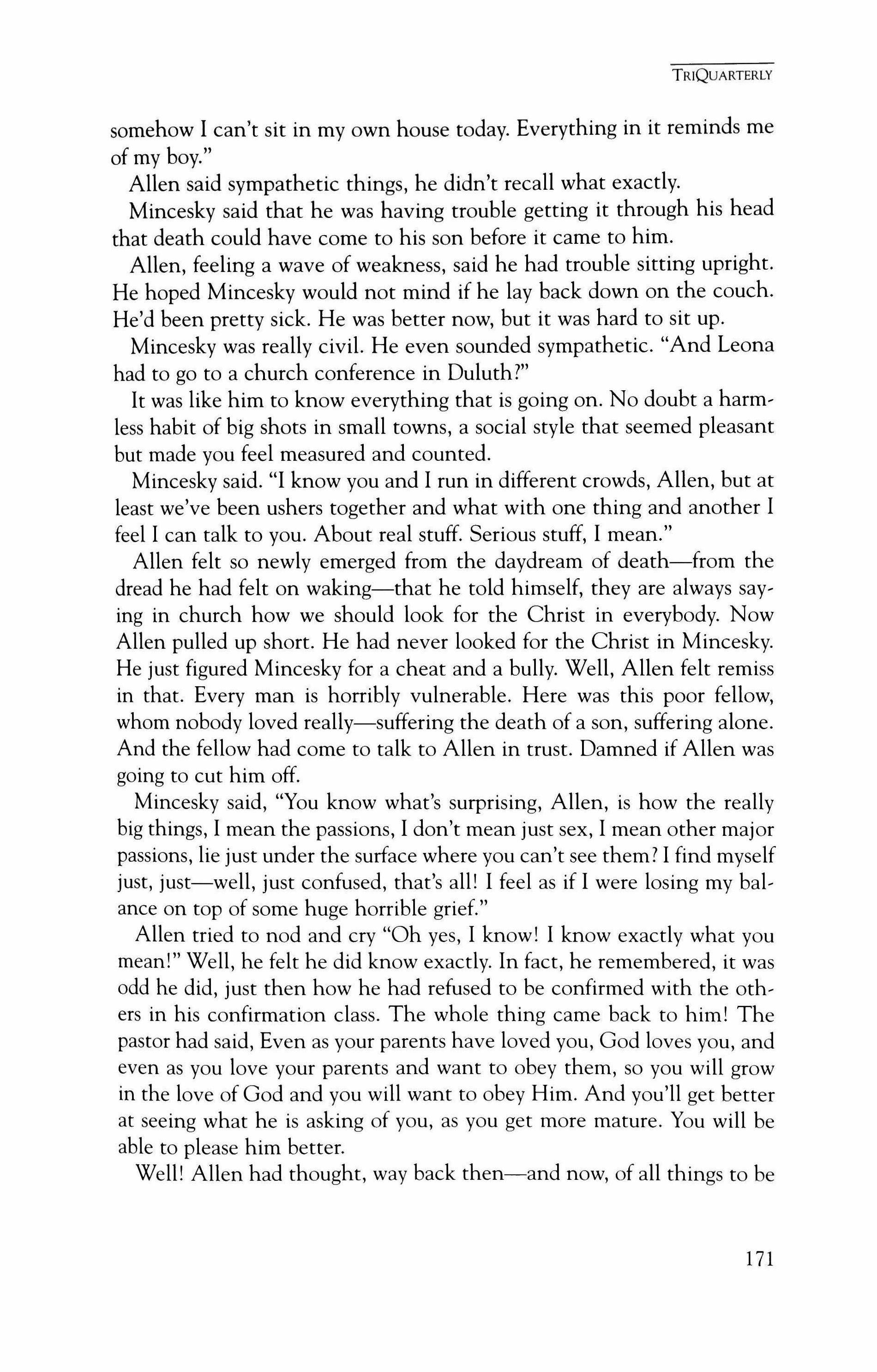
somehow I can't sit in my own house today. Everything in it reminds me of my boy."
Allen said sympathetic things, he didn't recall what exactly.
Mincesky said that he was having trouble getting it through his head that death could have come to his son before it came to him.
Allen, feeling a wave of weakness, said he had trouble sitting upright. He hoped Mincesky would not mind if he lay back down on the couch. He'd been pretty sick. He was better now, but it was hard to sit up.
Mincesky was really civil. He even sounded sympathetic. "And Leona had to go to a church conference in Duluth?"
It was like him to know everything that is going on. No doubt a harmless habit of big shots in small towns, a social style that seemed pleasant but made you feel measured and counted.
Mincesky said. "I know you and I run in different crowds, Allen, but at least we've been ushers together and what with one thing and another I feel I can talk to you. About real stuff. Serious stuff, I mean."
Allen felt so newly emerged from the daydream of death-from the dread he had felt on waking-that he told himself, they are always saying in church how we should look for the Christ in everybody. Now Allen pulled up short. He had never looked for the Christ in Mincesky. He just figured Mincesky for a cheat and a bully. Well, Allen felt remiss in that. Every man is horribly vulnerable. Here was this poor fellow, whom nobody loved really-suffering the death of a son, suffering alone. And the fellow had come to talk to Allen in trust. Damned if Allen was going to cut him off.
Mincesky said, "You know what's surprising, Allen, is how the really big things, I mean the passions, I don't mean just sex, I mean other major passions, lie just under the surface where you can't see them? I find myself just, just-well, just confused, that's all! I feel as if I were losing my balance on top of some huge horrible grief."
Allen tried to nod and cry "Oh yes, I know! I know exactly what you mean!" Well, he felt he did know exactly. In fact, he remembered, it was odd he did, just then how he had refused to be confirmed with the others in his confirmation class. The whole thing came back to him! The pastor had said, Even as your parents have loved you, God loves you, and even as you love your parents and want to obey them, so you will grow in the love of God and you will want to obey Him. And you'll get better at seeing what he is asking of you, as you get more mature. You will be able to please him better.
Well! Allen had thought, way back then-and now, of all things to be
TRIQUARTERLY
171
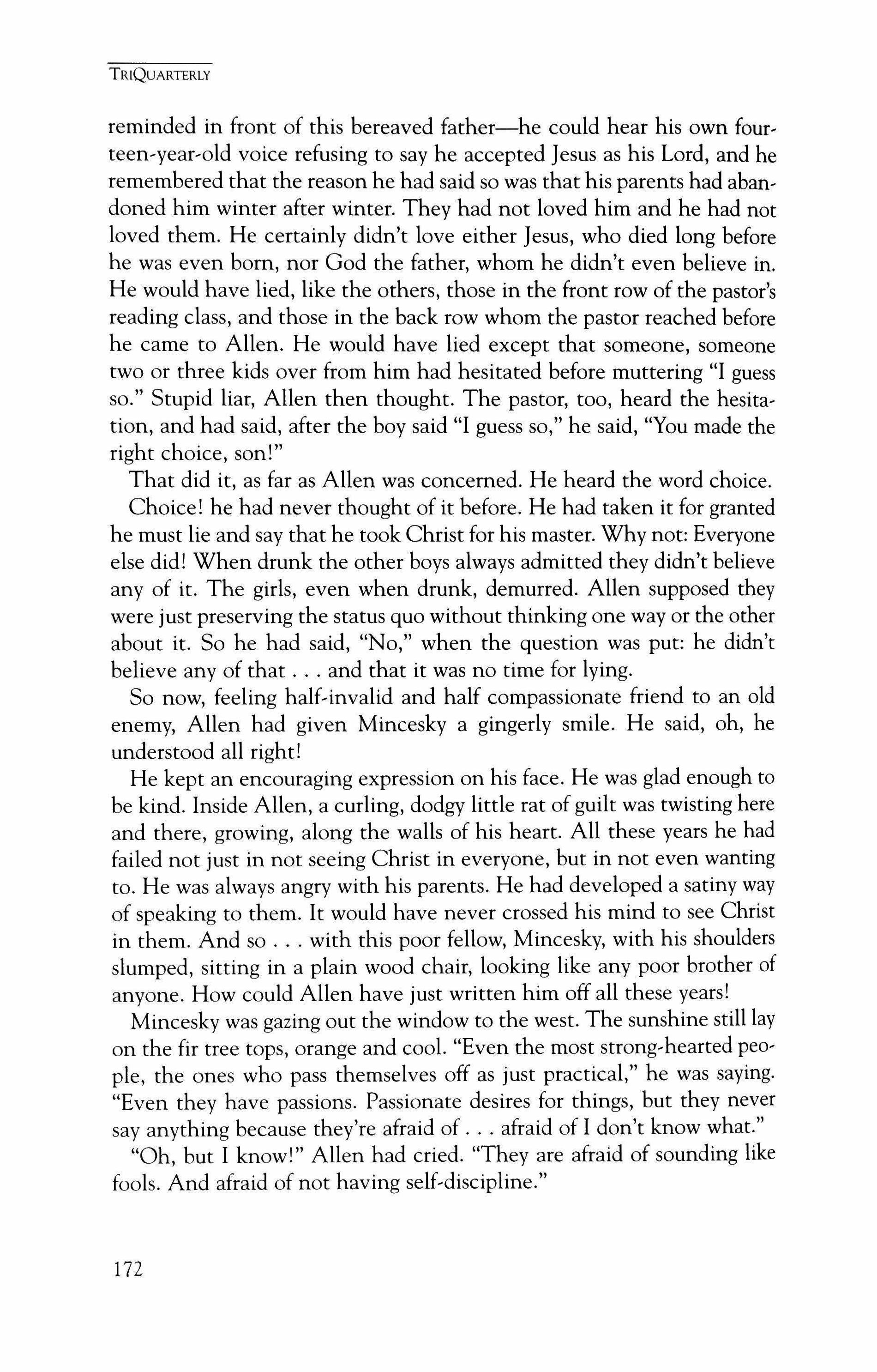
reminded in front of this bereaved father-he could hear his own fourteen-year-old voice refusing to say he accepted Jesus as his Lord, and he remembered that the reason he had said so was that his parents had abandoned him winter after winter. They had not loved him and he had not loved them. He certainly didn't love either Jesus, who died long before he was even born, nor God the father, whom he didn't even believe in. He would have lied, like the others, those in the front row of the pastor's reading class, and those in the back row whom the pastor reached before he came to Allen. He would have lied except that someone, someone two or three kids over from him had hesitated before muttering "I guess so." Stupid liar, Allen then thought. The pastor, too, heard the hesitation, and had said, after the boy said "I guess so," he said, "You made the right choice, son!"
That did it, as far as Allen was concerned. He heard the word choice. Choice! he had never thought of it before. He had taken it for granted he must lie and say that he took Christ for his master. Why not: Everyone else did! When drunk the other boys always admitted they didn't believe any of it. The girls, even when drunk, demurred. Allen supposed they were just preserving the status quo without thinking one way or the other about it. So he had said, "No," when the question was put: he didn't believe any of that and that it was no time for lying.
So now, feeling half-invalid and half compassionate friend to an old enemy, Allen had given Mincesky a gingerly smile. He said, oh, he understood all right!
He kept an encouraging expression on his face. He was glad enough to be kind. Inside Allen, a curling, dodgy little rat of guilt was twisting here and there, growing, along the walls of his heart. All these years he had failed not just in not seeing Christ in everyone, but in not even wanting to. He was always angry with his parents. He had developed a satiny way of speaking to them. It would have never crossed his mind to see Christ in them. And so with this poor fellow, Mincesky, with his shoulders slumped, sitting in a plain wood chair, looking like any poor brother of anyone. How could Allen have just written him off all these years!
Mincesky was gazing out the window to the west. The sunshine still lay on the fir tree tops, orange and cool. "Even the most strong-hearted people, the ones who pass themselves off as just practical," he was saying. "Even they have passions. Passionate desires for things, but they never say anything because they're afraid of afraid of I don't know what."
"Oh, but I know!" Allen had cried. "They are afraid of sounding like fools. And afraid of not having self-discipline."
TRIQUARTERLY
172

"I bet you're right!" said Mincesky in a level way. "Allen, I bet that's right on the mark!"
Then he gazed off again. "Everybody wants pretty simple things, really," he said. "A man wants to die before his son does. A woman wants a house. A child wants to be loved we aren't very complicated, Allen. We talk big and tough but at the bottom we have simple passions."
They talked some more. Allen was curious to know more of how the man grieved for his son, but Mincesky was steering away from that. Even the most carefully educated people, he was saying, and he allowed to Allen that he met a lot of them-pretended they were cool-headed and down-to-earth businesspeople, but fact was, at bottom, they wanted simple things.
The talk went on. Somehow Allen began to realize that his own wife was one of those people with a good business head. And what did she seem to want? Mincesky was talking about any woman wanted to own her own home. Oh, they might prevaricate, of course, and make up some rationalization or other, but they all wanted a home of their own-
Allen exclaimed silently to himself, "And Leona would! She would! Even if she didn't admit it."
All this year, he thought, I haven't been really listening to Leona.
In the end, Allen wrote a check for $2,000 of the $2,037 that he and Leona had in their savings account. The house was theirs. Mincesky had stood up shortly after that. He said, "You made the right choice, son." He handed Allen the purchase agreement.
"And Leona," Allen wound up now, "There it is!" He pointed to the top of the bookshelf.
He had framed it in a ten-cents-store diploma frame, the mitered corners ofwhich met well enough. The metal was painted black with a goldcolor stripe.
Eventually Leona was able to speak. "Allen," she said, "didn't you wonder that he asked you for exactly the same amount for a purchase agreement as we have in our savings account?"
He looked at her. "No, we had $2,037." But he stopped.
He said, "What are you saying, Leona?"
"I'm saying that he knew I would be gone because as a Worship & Growth Committee chairperson he knew the women had District in Duluth. So he looked up our account balance at the bank."
"You mean he planned this?" said Allen in a whisper.
TRIQUARTERLY
173
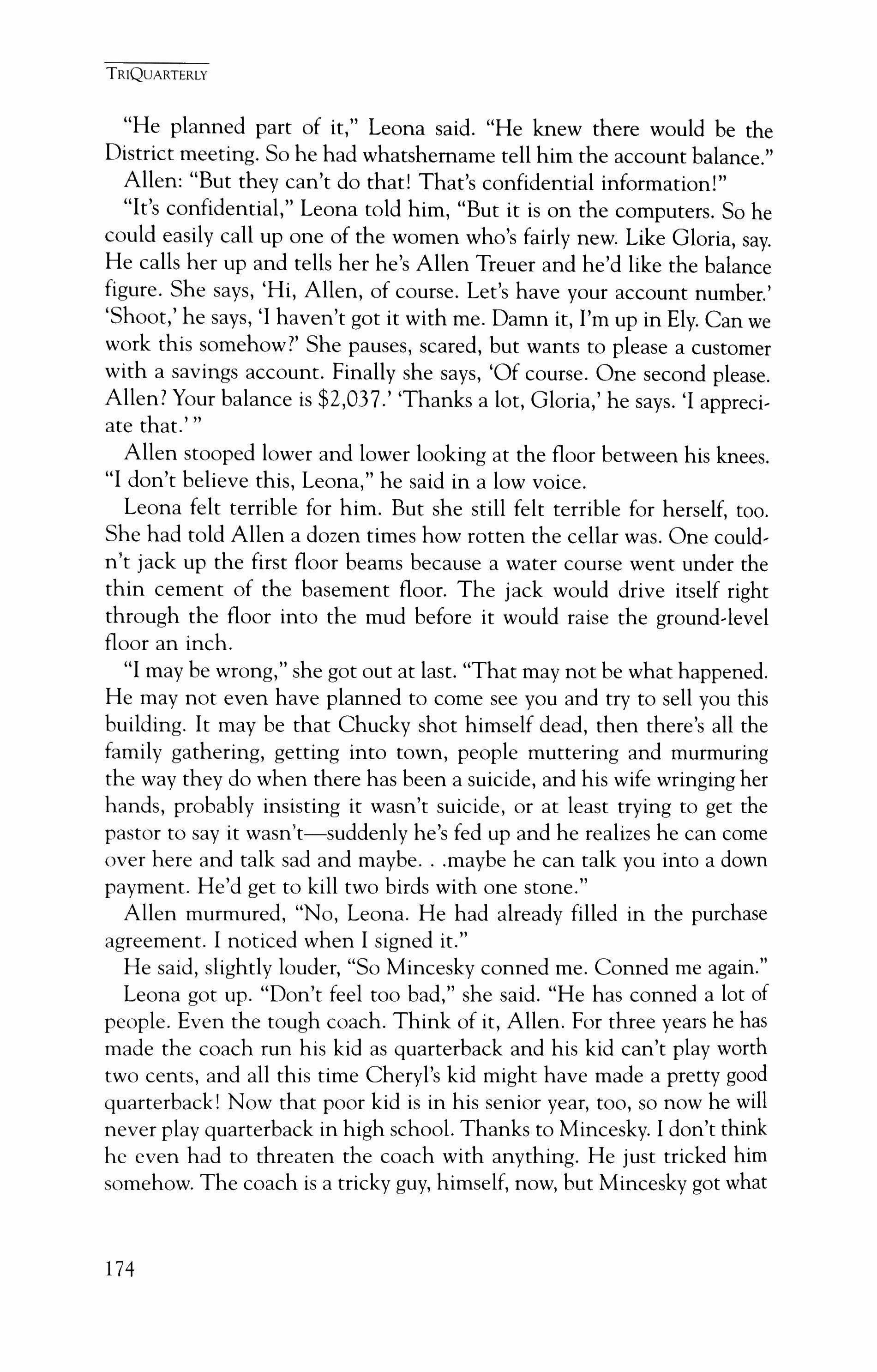
"He planned part of it," Leona said. "He knew there would be the District meeting. So he had whatshername tell him the account balance."
Allen: "But they can't do that! That's confidential information!"
"It's confidential," Leona told him, "But it is on the computers. So he could easily call up one of the women who's fairly new. Like Gloria, say. He calls her up and tells her he's Allen Treuer and he'd like the balance figure. She says, 'Hi, Allen, of course. Let's have your account number.' 'Shoot,' he says, 'I haven't got it with me. Damn it, I'm up in Ely. Can we work this somehow?' She pauses, scared, but wants to please a customer with a savings account. Finally she says, 'Of course. One second please. Allen? Your balance is $2,037.' 'Thanks a lot, Gloria,' he says. 'I appreciate that.'
Allen stooped lower and lower looking at the floor between his knees. "I don't believe this, Leona," he said in a low voice.
Leona felt terrible for him. But she still felt terrible for herself, too. She had told Allen a dozen times how rotten the cellar was. One couldn't jack up the first floor beams because a water course went under the thin cement of the basement floor. The jack would drive itself right through the floor into the mud before it would raise the ground-level floor an inch.
"I may be wrong," she got out at last. "That may not be what happened. He may not even have planned to come see you and try to sell you this building. It may be that Chucky shot himself dead, then there's all the family gathering, getting into town, people muttering and murmuring the way they do when there has been a suicide, and his wife wringing her hands, probably insisting it wasn't suicide, or at least trying to get the pastor to say it wasn't-suddenly he's fed up and he realizes he can come over here and talk sad and maybe maybe he can talk you into a down payment. He'd get to kill two birds with one stone."
Allen murmured, "No, Leona. He had already filled in the purchase agreement. I noticed when I signed it."
He said, slightly louder, "So Mincesky conned me. Conned me again."
Leona got up. "Don't feel too bad," she said. "He has conned a lot of people. Even the tough coach. Think of it, Allen. For three years he has made the coach run his kid as quarterback and his kid can't play worth two cents, and all this time Cheryl's kid might have made a pretty good quarterback! Now that poor kid is in his senior year, too, so now he will never play quarterback in high school. Thanks to Mincesky. I don't think he even had to threaten the coach with anything. He just tricked him somehow. The coach is a tricky guy, himself, now, but Mincesky got what
TRIQUARTERLY
174
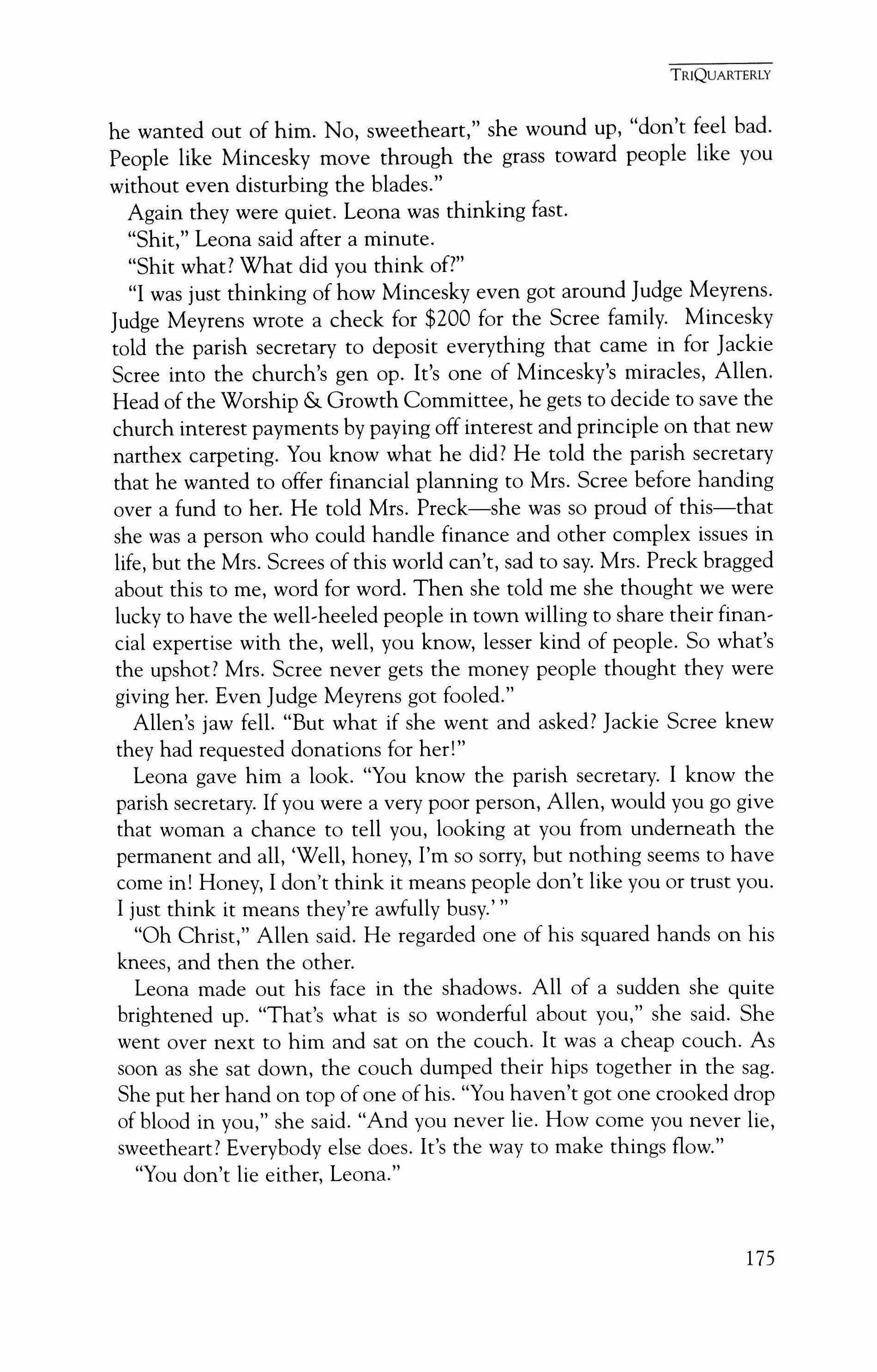
he wanted out of him. No, sweetheart," she wound up, "don't feel bad. People like Mincesky move through the grass toward people like you without even disturbing the blades."
Again they were quiet. Leona was thinking fast. "Shit," Leona said after a minute.
"Shit what? What did you think of?"
"I was just thinking of how Mincesky even got around Judge Meyrens. Judge Meyrens wrote a check for $200 for the Scree family. Mincesky told the parish secretary to deposit everything that came in for Jackie Scree into the church's gen op. It's one of Mincesky's miracles, Allen. Head of the Worship & Growth Committee, he gets to decide to save the church interest payments by paying off interest and principle on that new narthex carpeting. You know what he did? He told the parish secretary that he wanted to offer financial planning to Mrs. Scree before handing over a fund to her. He told Mrs. Preck-she was so proud of this-that she was a person who could handle finance and other complex issues in life, but the Mrs. Screes of this world can't, sad to say. Mrs. Preck bragged about this to me, word for word. Then she told me she thought we were lucky to have the well-heeled people in town willing to share their financial expertise with the, well, you know, lesser kind of people. So what's the upshot? Mrs. Scree never gets the money people thought they were giving her. Even Judge Meyrens got fooled."
Allen's jaw fell. "But what if she went and asked? Jackie Scree knew they had requested donations for her!"
Leona gave him a look. "You know the parish secretary. I know the parish secretary. If you were a very poor person, Allen, would you go give that woman a chance to tell you, looking at you from underneath the permanent and all, 'Well, honey, I'm so sorry, but nothing seems to have come in! Honey, I don't think it means people don't like you or trust you. I just think it means they're awfully busy.'
"Oh Christ," Allen said. He regarded one of his squared hands on his knees, and then the other.
Leona made out his face in the shadows. All of a sudden she quite brightened up. "That's what is so wonderful about you," she said. She went over next to him and sat on the couch. It was a cheap couch. As soon as she sat down, the couch dumped their hips together in the sag. She put her hand on top of one of his. "You haven't got one crooked drop of blood in you," she said. "And you never lie. How come you never lie, sweetheart? Everybody else does. It's the way to make things flow."
"You don't lie either, Leona."
TRIQUARTERLY
175
TRIQUARTERLY

"You're like a big oak tree, tell you the truth," she said. He said in a bitter tone, "You're always saying that. Well, I'll tell you something. I am no more like an oak tree than a bowl of vomit."
"No," she said, because all the time he was talking she was secretly moving ahead with some planning inside herself, "no, it is true the house smells of vomit, but you are like an oak tree. All you do is breathe air, with your leaves, and drink water and minerals with your roots, and get more stature all the time. And you never move. You're where I know where you are. But with a snake like Mincesky-"
"I don't want to hear that snake and oak tree stuff, Leona."
"A snake," she went on. "It never stays still, If it wants to be in constant motion it goes into constant motion. And the way it identifies its prey is by their warm hearts. And you have a warm heart, so that guy, Mincesky, just naturally goes for you. He sees you sitting at a football game and thinks to himself, 'I wonder if there isn't some way I could empty Treuer's pocket a little!'
"That's how snakes think."
Allen said, "Leona, you really are awfully cynical. People really just plainly aren't as bad as you think they are."
Leona's church served its funerals on a rotation. Each circle took a funeral in its tum, now Eunice Circle, now Ruth Circle, now Esther Circle. Esther Circle had any funeral coming up this week. The system worked so well that almost all arrangements could be made by telephone in the last day or so-arrangements for bringing the food to the church kitchen, arrival times for the workers, making sure sandwiches stand covered with plastic wrap, setting up the coffee, questions of who could or would stay to clean up.
The chairperson of Esther Circle was out of town, so it fell to Leona to make the telephone calls. Seven women told her they would love to help but couldn't because "they worked." Leona called five older women, one of whom had broken her hip. She got a promise from two of the remaining four. Then she went back to two of the women who "worked" and asked if they could get off work. One said she'd try, but her tone of voice suggested that was the last Leona would hear from her. The other said, "Frankly, Leona, I am not too excited about serving this particular funeral."
Leona asked her what that was about.
That boy, the woman explained, has desecrated the holy life that God
176
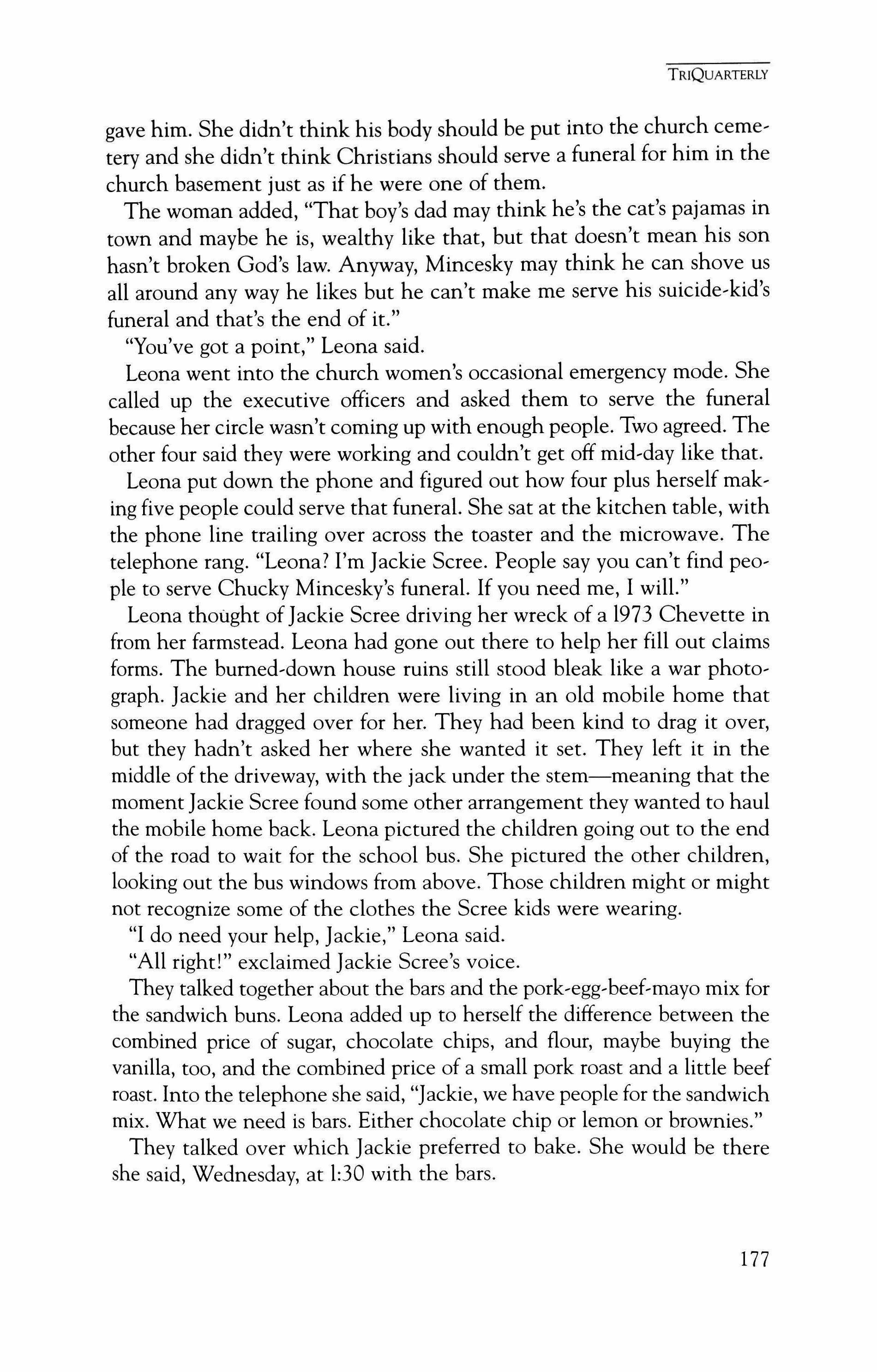
gave him. She didn't think his body should be put into the church cemetery and she didn't think Christians should serve a funeral for him in the church basement just as if he were one of them.
The woman added, "That boy's dad may think he's the cat's pajamas in town and maybe he is, wealthy like that, but that doesn't mean his son hasn't broken God's law. Anyway, Mincesky may think he can shove us all around any way he likes but he can't make me serve his suicide-kid's funeral and that's the end of it."
"You've got a point," Leona said.
Leona went into the church women's occasional emergency mode. She called up the executive officers and asked them to serve the funeral because her circle wasn't coming up with enough people. Two agreed. The other four said they were working and couldn't get off mid-day like that.
Leona put down the phone and figured out how four plus herself making five people could serve that funeral. She sat at the kitchen table, with the phone line trailing over across the toaster and the microwave. The telephone rang. "Leona? I'm Jackie Scree. People say you can't find people to serve Chucky Mincesky's funeral. If you need me, I will."
Leona thought ofJackie Scree driving her wreck of a 1973 Chevette in from her farmstead. Leona had gone out there to help her fill out claims forms. The burned-down house ruins still stood bleak like a war photograph. Jackie and her children were living in an old mobile home that someone had dragged over for her. They had been kind to drag it over, but they hadn't asked her where she wanted it set. They left it in the middle of the driveway, with the jack under the stem-meaning that the moment Jackie Scree found some other arrangement they wanted to haul the mobile home back. Leona pictured the children going out to the end of the road to wait for the school bus. She pictured the other children, looking out the bus windows from above. Those children might or might not recognize some of the clothes the Scree kids were wearing.
"I do need your help, Jackie," Leona said.
"All right!" exclaimed Jackie Scree's voice.
They talked together about the bars and the pork-egg-beef-mayo mix for the sandwich buns. Leona added up to herself the difference between the combined price of sugar, chocolate chips, and flour, maybe buying the vanilla, too, and the combined price of a small pork roast and a little beef roast. Into the telephone she said, "Jackie, we have people for the sandwich mix. What we need is bars. Either chocolate chip or lemon or brownies."
They talked over which Jackie preferred to bake. She would be there she said, Wednesday, at 1:30 with the bars.
TRIQUARTERLY
177
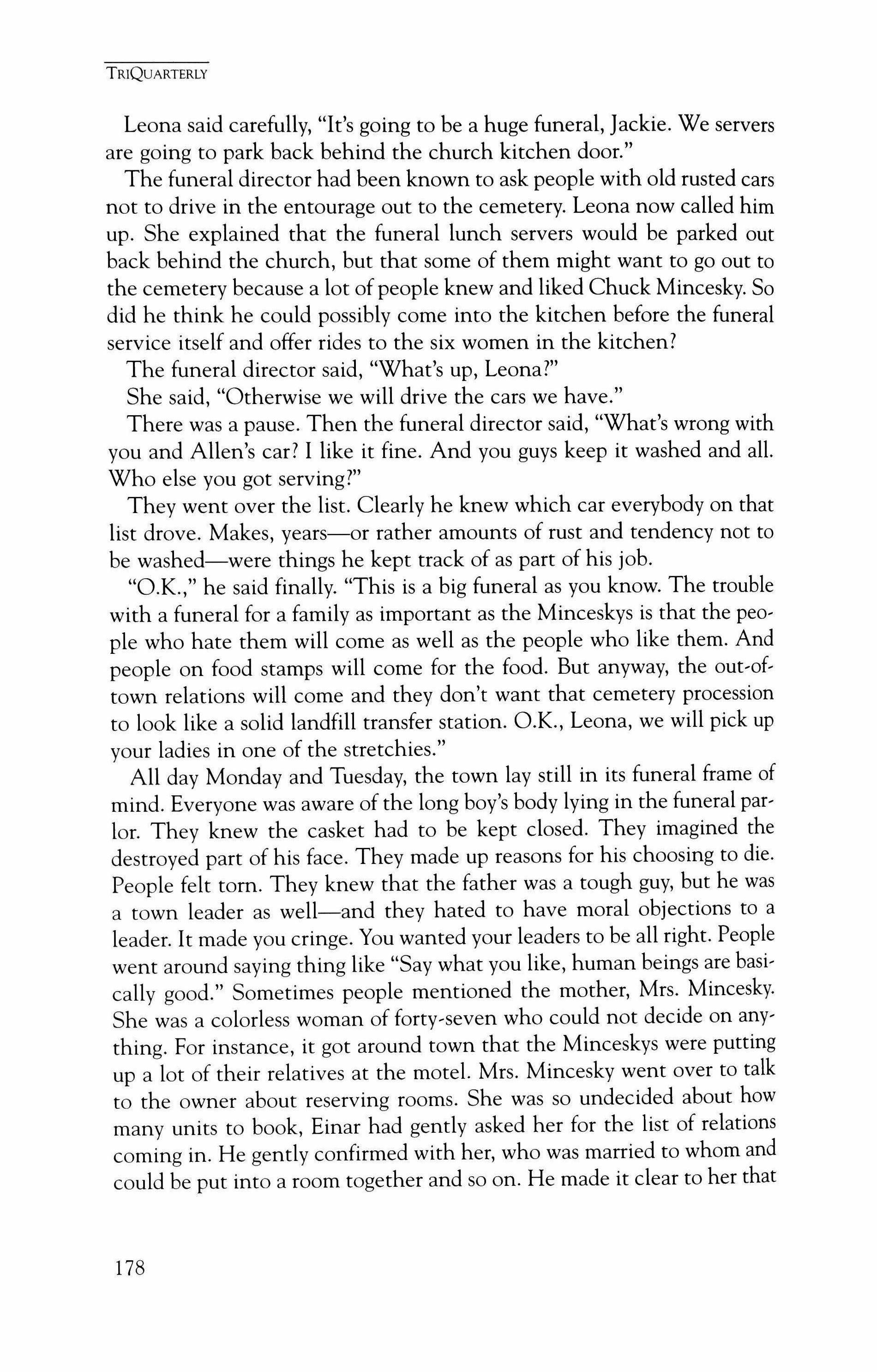
TRIQUARTERLY
Leona said carefully, "It's going to be a huge funeral, Jackie. We servers are going to park back behind the church kitchen door."
The funeral director had been known to ask people with old rusted cars not to drive in the entourage out to the cemetery. Leona now called him up. She explained that the funeral lunch servers would be parked out back behind the church, but that some of them might want to go out to the cemetery because a lot ofpeople knew and liked Chuck Mincesky. So did he think he could possibly come into the kitchen before the funeral service itself and offer rides to the six women in the kitchen?
The funeral director said, "What's up, Leona?"
She said, "Otherwise we will drive the cars we have."
There was a pause. Then the funeral director said, "What's wrong with you and Allen's car? I like it fine. And you guys keep it washed and all. Who else you got serving?"
They went over the list. Clearly he knew which car everybody on that list drove. Makes, years-or rather amounts of rust and tendency not to be washed-were things he kept track of as part of his job.
"O.K.," he said finally. "This is a big funeral as you know. The trouble with a funeral for a family as important as the Minceskys is that the people who hate them will come as well as the people who like them. And people on food stamps will come for the food. But anyway, the out-oftown relations will come and they don't want that cemetery procession to look like a solid landfill transfer station. O.K., Leona, we will pick up your ladies in one of the stretchies."
All day Monday and Tuesday, the town lay still in its funeral frame of mind. Everyone was aware of the long boy's body lying in the funeral parlor. They knew the casket had to be kept closed. They imagined the destroyed part of his face. They made up reasons for his choosing to die. People felt torn. They knew that the father was a tough guy, but he was a town leader as well-and they hated to have moral objections to a leader. It made you cringe. You wanted your leaders to be all right. People went around saying thing like "Say what you like, human beings are basically good." Sometimes people mentioned the mother, Mrs. Mincesky. She was a colorless woman of forty-seven who could not decide on anything. For instance, it got around town that the Minceskys were putting up a lot of their relatives at the motel. Mrs. Mincesky went over to talk to the owner about reserving rooms. She was so undecided about how many units to book, Einar had gently asked her for the list of relations coming in. He gently confirmed with her, who was married to whom and could be put into a room together and so on. He made it clear to her that
178
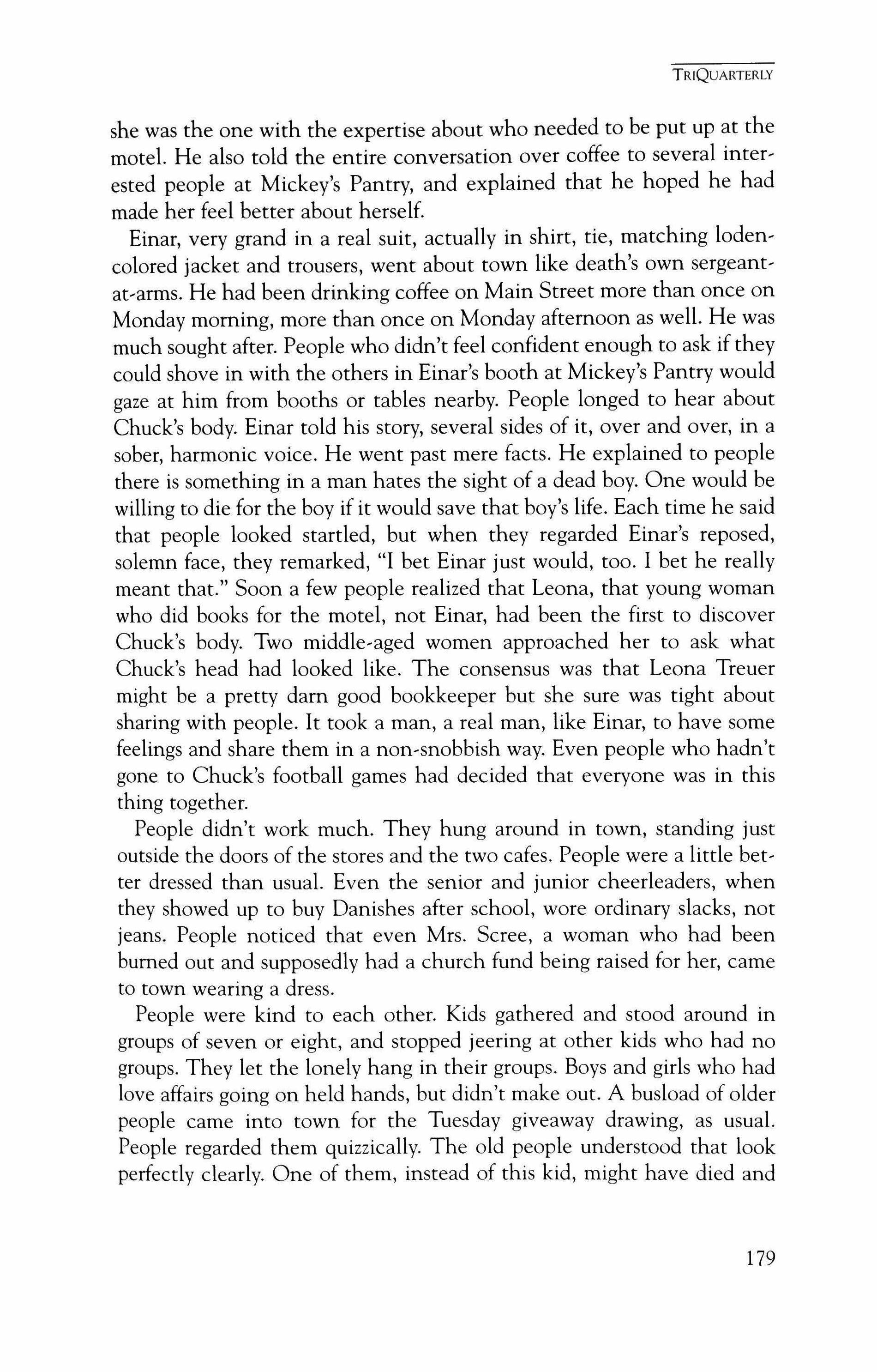
she was the one with the expertise about who needed to be put up at the motel. He also told the entire conversation over coffee to several interested people at Mickey's Pantry, and explained that he hoped he had made her feel better about herself.
Einar, very grand in a real suit, actually in shirt, tie, matching lodencolored jacket and trousers, went about town like death's own sergeantat-arms. He had been drinking coffee on Main Street more than once on Monday morning, more than once on Monday afternoon as well. He was much sought after. People who didn't feel confident enough to ask if they could shove in with the others in Einar's booth at Mickey's Pantry would gaze at him from booths or tables nearby. People longed to hear about Chuck's body. Einar told his story, several sides of it, over and over, in a sober, harmonic voice. He went past mere facts. He explained to people there is something in a man hates the sight of a dead boy. One would be willing to die for the boy if it would save that boy's life. Each time he said that people looked startled, but when they regarded Einar's reposed, solemn face, they remarked, "I bet Einar just would, too. I bet he really meant that." Soon a few people realized that Leona, that young woman who did books for the motel, not Einar, had been the first to discover Chuck's body. Two middle-aged women approached her to ask what Chuck's head had looked like. The consensus was that Leona Treuer might be a pretty dam good bookkeeper but she sure was tight about sharing with people. It took a man, a real man, like Einar, to have some feelings and share them in a non-snobbish way. Even people who hadn't gone to Chuck's football games had decided that everyone was in this thing together.
People didn't work much. They hung around in town, standing just outside the doors of the stores and the two cafes. People were a little better dressed than usual. Even the senior and junior cheerleaders, when they showed up to buy Danishes after school, wore ordinary slacks, not jeans. People noticed that even Mrs. Scree, a woman who had been burned out and supposedly had a church fund being raised for her, came to town wearing a dress.
People were kind to each other. Kids gathered and stood around in groups of seven or eight, and stopped jeering at other kids who had no groups. They let the lonely hang in their groups. Boys and girls who had love affairs going on held hands, but didn't make out. A busload of older people came into town for the Tuesday giveaway drawing, as usual. People regarded them quizzically. The old people understood that look perfectly clearly. One of them, instead of this kid, might have died and
TRIQUARTERLY
179
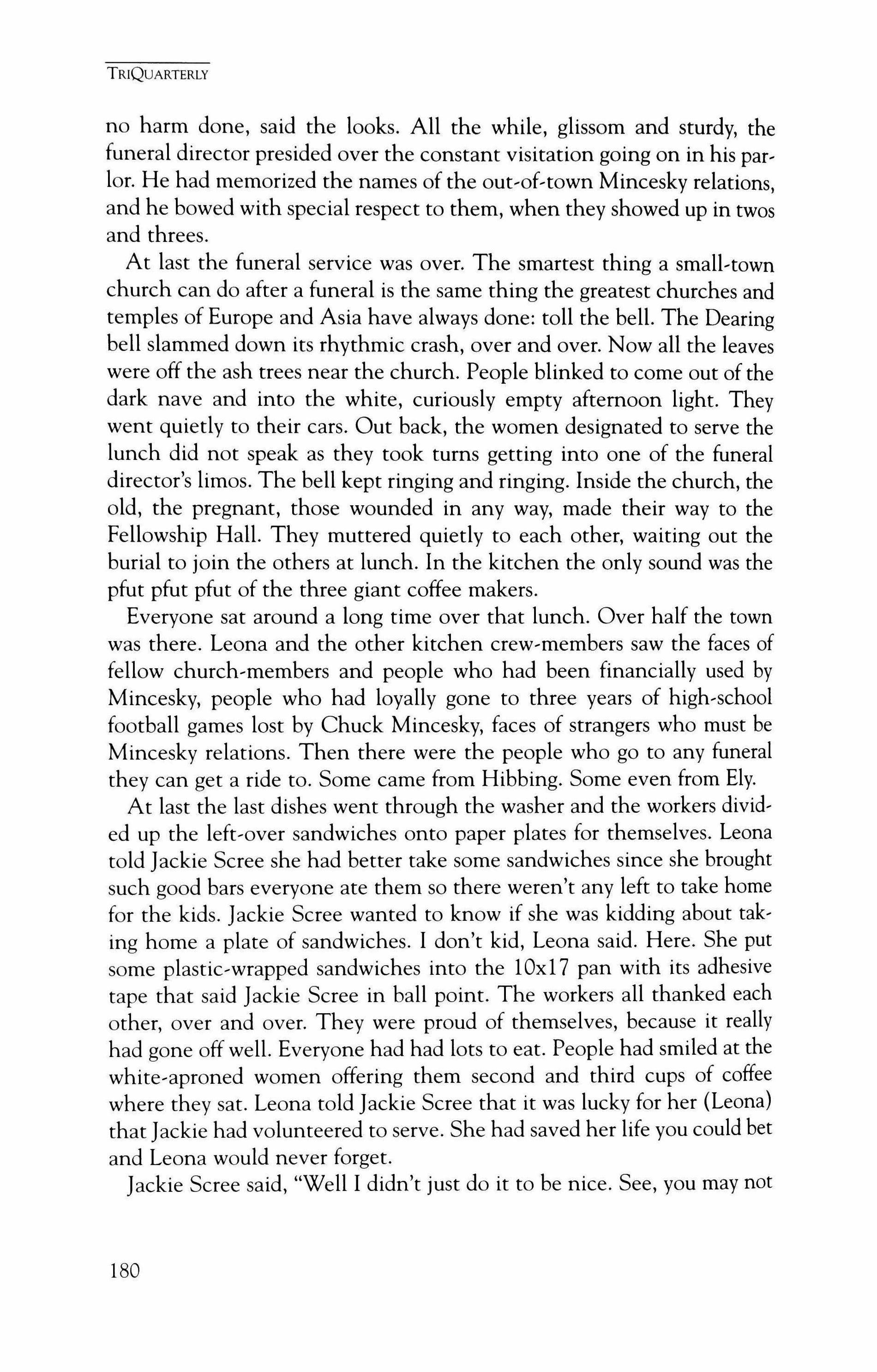
no harm done, said the looks. All the while, glissom and sturdy, the funeral director presided over the constant visitation going on in his parlor. He had memorized the names of the out-of-town Mincesky relations, and he bowed with special respect to them, when they showed up in twos and threes.
At last the funeral service was over. The smartest thing a small-town church can do after a funeral is the same thing the greatest churches and temples of Europe and Asia have always done: toll the bell. The Dearing bell slammed down its rhythmic crash, over and over. Now all the leaves were off the ash trees near the church. People blinked to come out of the dark nave and into the white, curiously empty afternoon light. They went quietly to their cars. Out back, the women designated to serve the lunch did not speak as they took turns getting into one of the funeral director's limos. The bell kept ringing and ringing. Inside the church, the old, the pregnant, those wounded in any way, made their way to the Fellowship Hall. They muttered quietly to each other, waiting out the burial to join the others at lunch. In the kitchen the only sound was the pfut pfut pfut of the three giant coffee makers.
Everyone sat around a long time over that lunch. Over half the town was there. Leona and the other kitchen crew-members saw the faces of fellow church-members and people who had been financially used by Mincesky, people who had loyally gone to three years of high-school football games lost by Chuck Mincesky, faces of strangers who must be Mincesky relations. Then there were the people who go to any funeral they can get a ride to. Some came from Hibbing. Some even from Ely.
At last the last dishes went through the washer and the workers divided up the left-over sandwiches onto paper plates for themselves. Leona told Jackie Scree she had better take some sandwiches since she brought such good bars everyone ate them so there weren't any left to take home for the kids. Jackie Scree wanted to know if she was kidding about taking home a plate of sandwiches. I don't kid, Leona said. Here. She put some plastic-wrapped sandwiches into the lOx17 pan with its adhesive tape that said Jackie Scree in ball point. The workers all thanked each other, over and over. They were proud of themselves, because it really had gone off well. Everyone had had lots to eat. People had smiled at the white-aproned women offering them second and third cups of coffee where they sat. Leona told Jackie Scree that it was lucky for her (Leona) that Jackie had volunteered to serve. She had saved her life you could bet and Leona would never forget.
Jackie Scree said, "Well I didn't just do it to be nice. See, you may not
TRIQUARTERLY
180
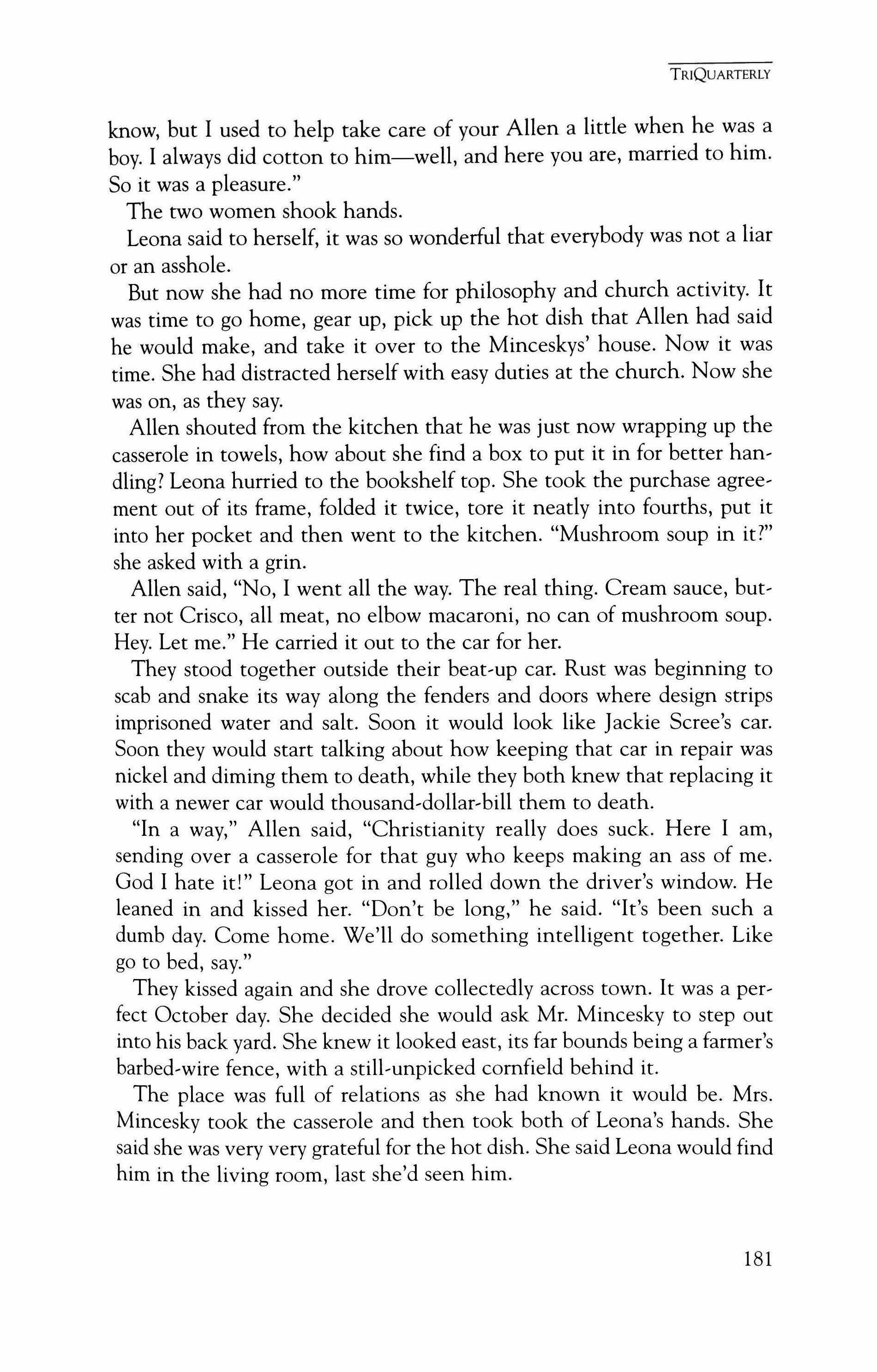
know, but I used to help take care of your Allen a little when he was a boy. I always did cotton to him-well, and here you are, married to him. So it was a pleasure."
The two women shook hands.
Leona said to herself, it was so wonderful that everybody was not a liar or an asshole.
But now she had no more time for philosophy and church activity. It was time to go home, gear up, pick up the hot dish that Allen had said he would make, and take it over to the Minceskys' house. Now it was time. She had distracted herself with easy duties at the church. Now she was on, as they say.
Allen shouted from the kitchen that he was just now wrapping up the casserole in towels, how about she find a box to put it in for better han, dling? Leona hurried to the bookshelf top. She took the purchase agree' ment out of its frame, folded it twice, tore it neatly into fourths, put it into her pocket and then went to the kitchen. "Mushroom soup in it?" she asked with a grin.
Allen said, "No, I went all the way. The real thing. Cream sauce, but, ter not Crisco, all meat, no elbow macaroni, no can of mushroom soup. Hey. Let me." He carried it out to the car for her.
They stood together outside their beat-up car. Rust was beginning to scab and snake its way along the fenders and doors where design strips imprisoned water and salt. Soon it would look like Jackie Scree's car. Soon they would start talking about how keeping that car in repair was nickel and diming them to death, while they both knew that replacing it with a newer car would thousand-dollar-bill them to death.
"In a way," Allen said, "Christianity really does suck. Here I am, sending over a casserole for that guy who keeps making an ass of me. God I hate it!" Leona got in and rolled down the driver's window. He leaned in and kissed her. "Don't be long," he said. "It's been such a dumb day. Come home. We'll do something intelligent together. Like go to bed, say."
They kissed again and she drove collectedly across town. It was a per, fect October day. She decided she would ask Mr. Mincesky to step out into his back yard. She knew it looked east, its far bounds being a farmer's barbed-wire fence, with a still-unpicked cornfield behind it.
The place was full of relations as she had known it would be. Mrs. Mincesky took the casserole and then took both of Leona's hands. She said she was very very grateful for the hot dish. She said Leona would find him in the living room, last she'd seen him.
TRIQUARTERLY
181
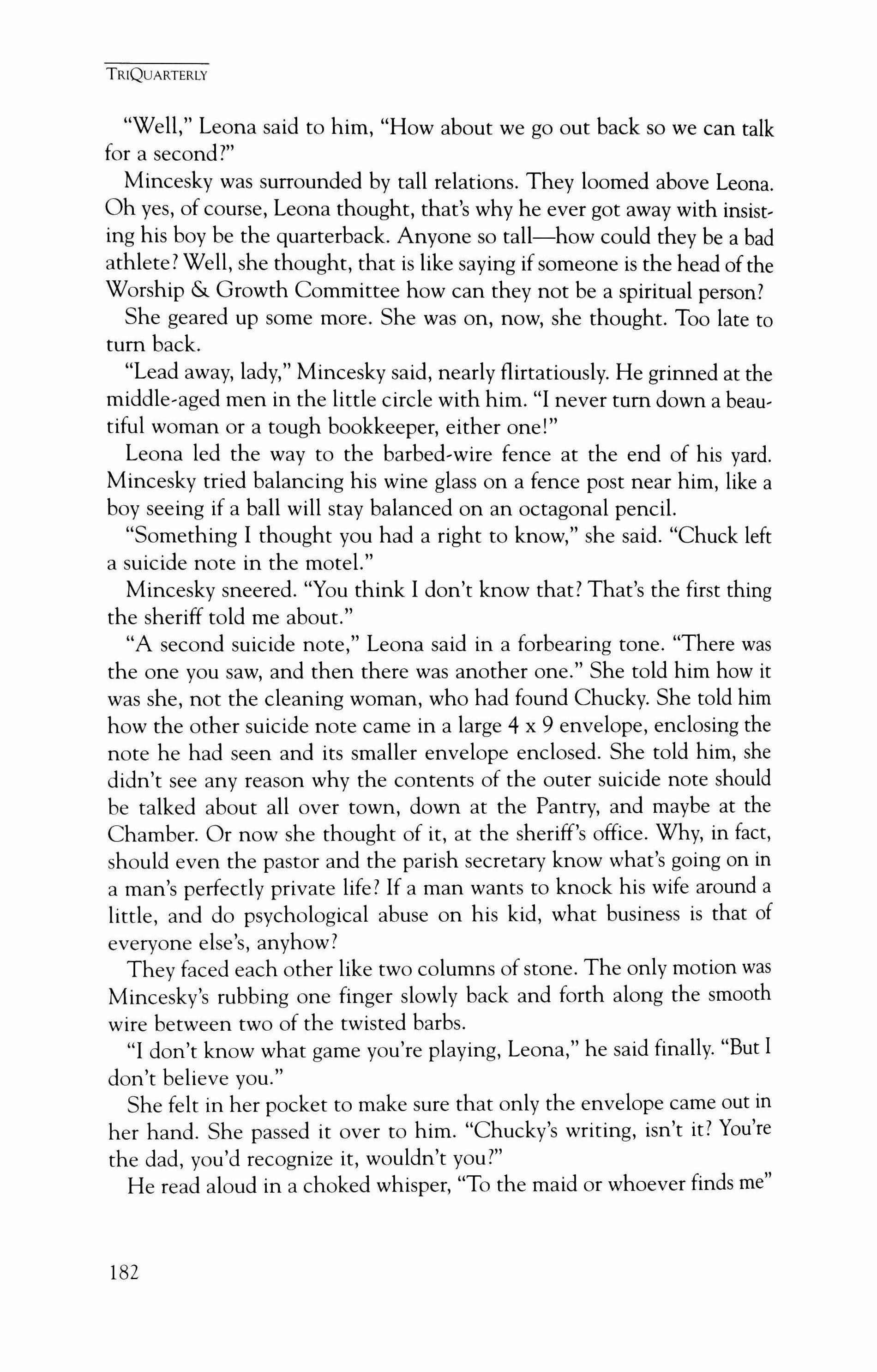
"Well," Leona said to him, "How about we go out back so we can talk for a second?"
Mincesky was surrounded by tall relations. They loomed above Leona. Oh yes, of course, Leona thought, that's why he ever got away with insisting his boy be the quarterback. Anyone so tall-how could they be a bad athlete? Well, she thought, that is like saying if someone is the head ofthe Worship & Growth Committee how can they not be a spiritual person?
She geared up some more. She was on, now, she thought. Too late to turn back.
"Lead away, lady," Mincesky said, nearly flirtatiously. He grinned at the middle-aged men in the little circle with him. "I never turn down a beautiful woman or a tough bookkeeper, either one!"
Leona led the way to the barbed-wire fence at the end of his yard. Mincesky tried balancing his wine glass on a fence post near him, like a boy seeing if a ball will stay balanced on an octagonal pencil.
"Something I thought you had a right to know," she said. "Chuck left a suicide note in the motel."
Mincesky sneered. "You think I don't know that? That's the first thing the sheriff told me about."
"A second suicide note," Leona said in a forbearing tone. "There was the one you saw, and then there was another one." She told him how it was she, not the cleaning woman, who had found Chucky. She told him how the other suicide note came in a large 4 x 9 envelope, enclosing the note he had seen and its smaller envelope enclosed. She told him, she didn't see any reason why the contents of the outer suicide note should be talked about all over town, down at the Pantry, and maybe at the Chamber. Or now she thought of it, at the sheriff's office. Why, in fact, should even the pastor and the parish secretary know what's going on in a man's perfectly private life? If a man wants to knock his wife around a little, and do psychological abuse on his kid, what business is that of everyone else's, anyhow?
They faced each other like two columns of stone. The only motion was Mincesky's rubbing one finger slowly back and forth along the smooth wire between two of the twisted barbs.
"I don't know what game you're playing, Leona," he said finally. "But I don't believe you."
She felt in her pocket to make sure that only the envelope came out in her hand. She passed it over to him. "Chucky's writing, isn't it? You're the dad, you'd recognize it, wouldn't you?"
He read aloud in a choked whisper, "To the maid or whoever finds me"
TRIQUARTERLY
182
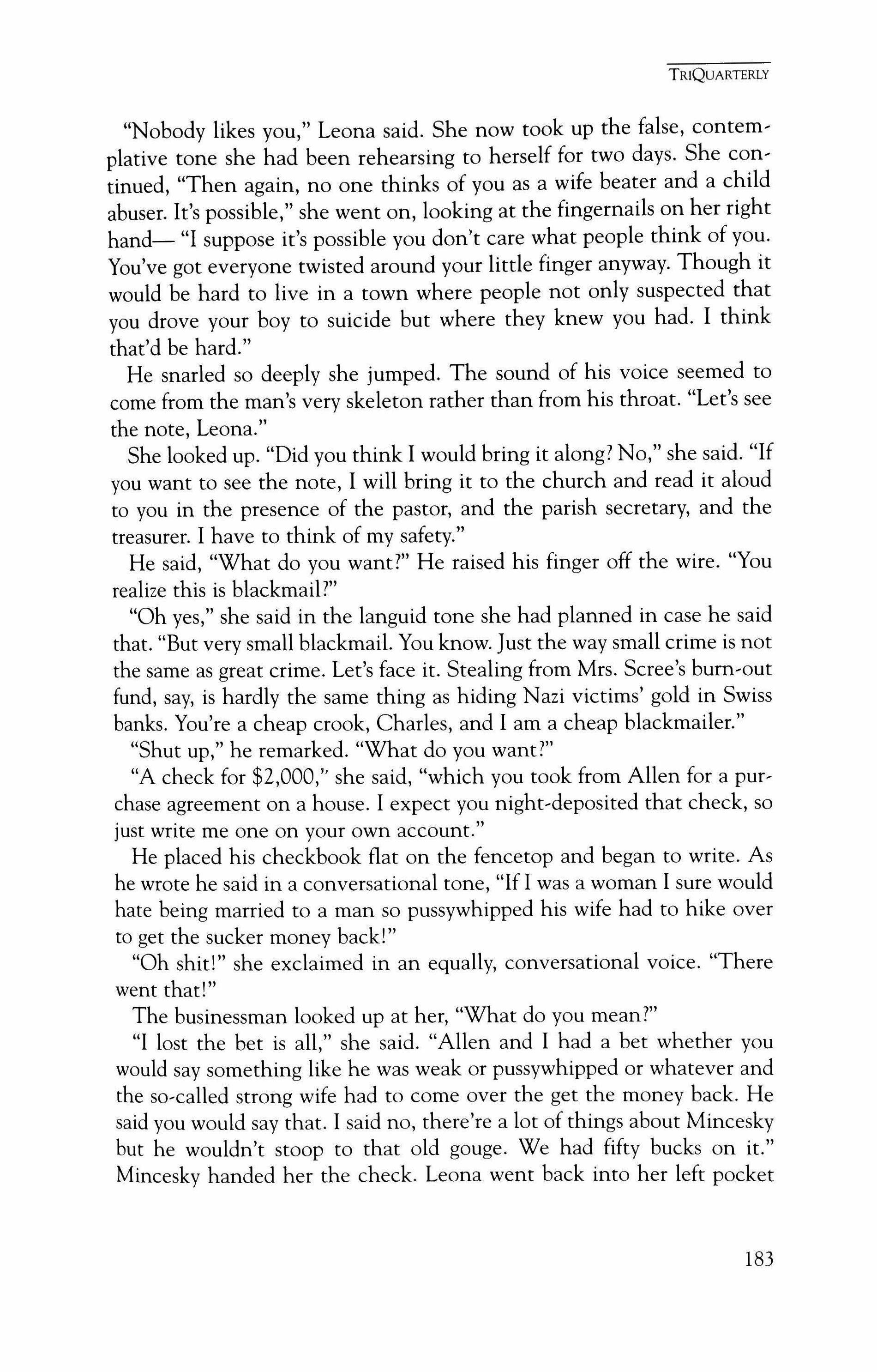
"Nobody likes you," Leona said. She now took up the false, contemplative tone she had been rehearsing to herself for two days. She continued, "Then again, no one thinks of you as a wife beater and a child abuser. It's possible," she went on, looking at the fingernails on her right hand- "I suppose it's possible you don't care what people think of you. You've got everyone twisted around your little finger anyway. Though it would be hard to live in a town where people not only suspected that you drove your boy to suicide but where they knew you had. I think that'd be hard."
He snarled so deeply she jumped. The sound of his voice seemed to come from the man's very skeleton rather than from his throat. "Let's see the note, Leona."
She looked up. "Did you think I would bring it along? No," she said. "If you want to see the note, I will bring it to the church and read it aloud to you in the presence of the pastor, and the parish secretary, and the treasurer. I have to think of my safety."
He said, "What do you want?" He raised his finger off the wire. "You realize this is blackmail?"
"Oh yes," she said in the languid tone she had planned in case he said that. "But very small blackmail. You know. Just the way small crime is not the same as great crime. Let's face it. Stealing from Mrs. Scree's bum-out fund, say, is hardly the same thing as hiding Nazi victims' gold in Swiss banks. You're a cheap crook, Charles, and I am a cheap blackmailer."
"Shut up," he remarked. "What do you want?"
"A check for $2,000," she said, "which you took from Allen for a purchase agreement on a house. I expect you night-deposited that check, so just write me one on your own account."
He placed his checkbook flat on the fencetop and began to write. As he wrote he said in a conversational tone, "If I was a woman I sure would hate being married to a man so pussywhipped his wife had to hike over to get the sucker money back!"
"Oh shit!" she exclaimed in an equally, conversational voice. "There went that!"
The businessman looked up at her, "What do you mean?"
"I lost the bet is all," she said. "Allen and I had a bet whether you would say something like he was weak or pussywhipped or whatever and the so-called strong wife had to come over the get the money back. He said you would say that. I said no, there're a lot of things about Mincesky but he wouldn't stoop to that old gouge. We had fifty bucks on it." Mincesky handed her the check. Leona went back into her left pocket
TRIQUARTERLY
183
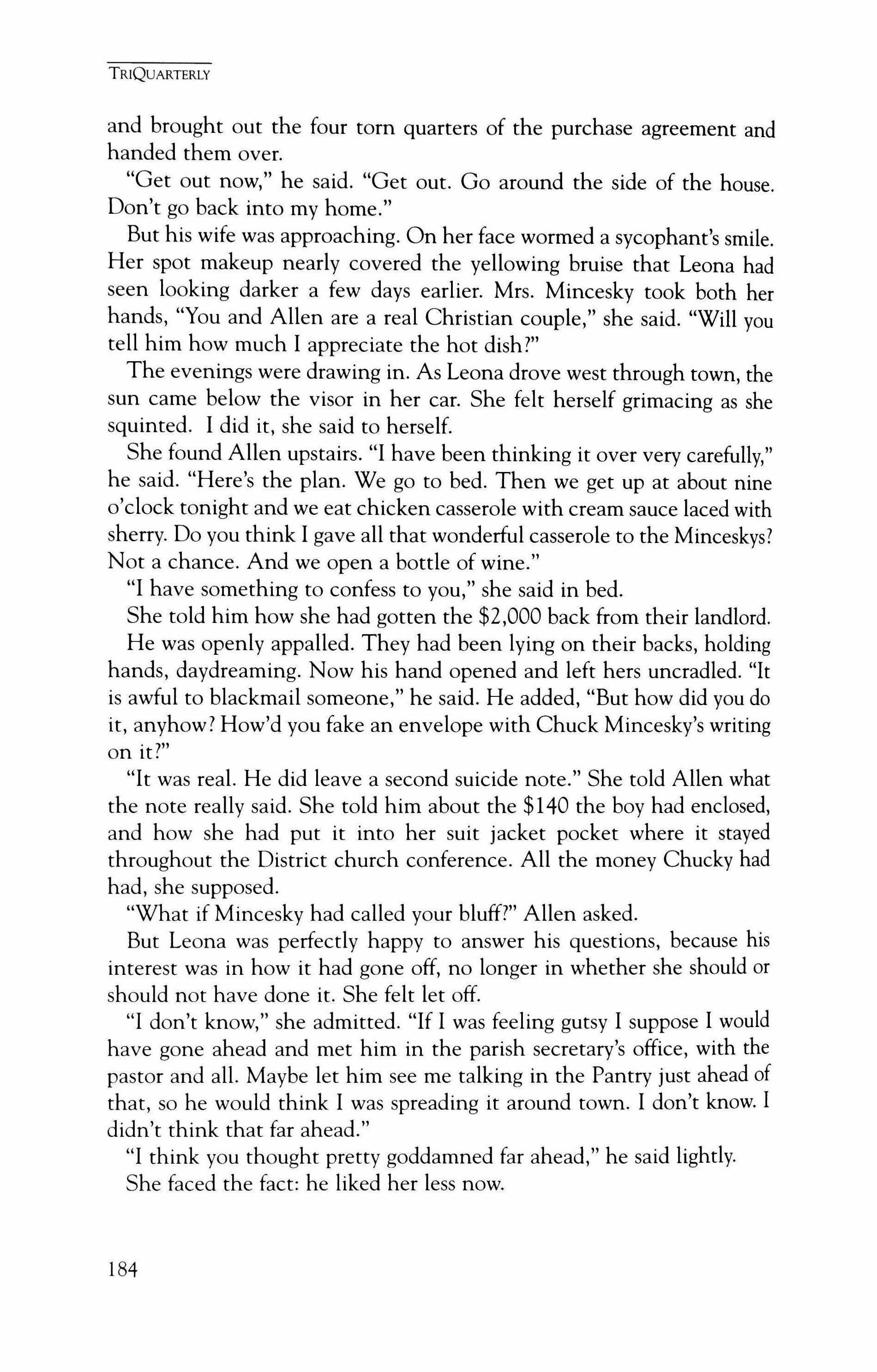
and brought out the four torn quarters of the purchase agreement and handed them over.
"Get out now," he said. "Get out. Go around the side of the house. Don't go back into my home."
But his wife was approaching. On her face wormed a sycophant's smile. Her spot makeup nearly covered the yellowing bruise that Leona had seen looking darker a few days earlier. Mrs. Mincesky took both her hands, "You and Allen are a real Christian couple," she said. "Will you tell him how much I appreciate the hot dish?"
The evenings were drawing in. As Leona drove west through town, the sun came below the visor in her car. She felt herself grimacing as she squinted. I did it, she said to herself.
She found Allen upstairs. "I have been thinking it over very carefully," he said. "Here's the plan. We go to bed. Then we get up at about nine 0'clock tonight and we eat chicken casserole with cream sauce laced with sherry. Do you think I gave all that wonderful casserole to the Minceskys? Not a chance. And we open a bottle of wine."
"I have something to confess to you," she said in bed.
She told him how she had gotten the $2,000 back from their landlord. He was openly appalled. They had been lying on their backs, holding hands, daydreaming. Now his hand opened and left hers uncradled. "It is awful to blackmail someone," he said. He added, "But how did you do it, anyhow? How'd you fake an envelope with Chuck Mincesky's writing on it?"
"It was real. He did leave a second suicide note." She told Allen what the note really said. She told him about the $140 the boy had enclosed, and how she had put it into her suit jacket pocket where it stayed throughout the District church conference. All the money Chucky had had, she supposed.
"What if Mincesky had called your bluff?" Allen asked.
But Leona was perfectly happy to answer his questions, because his interest was in how it had gone off, no longer in whether she should or should not have done it. She felt let off.
"I don't know," she admitted. "If I was feeling gutsy I suppose I would have gone ahead and met him in the parish secretary's office, with the pastor and all. Maybe let him see me talking in the Pantry just ahead of that, so he would think I was spreading it around town. I don't know. I didn't think that far ahead."
"I think you thought pretty goddamned far ahead," he said lightly. She faced the fact: he liked her less now.
TRIQUARTERLY
184
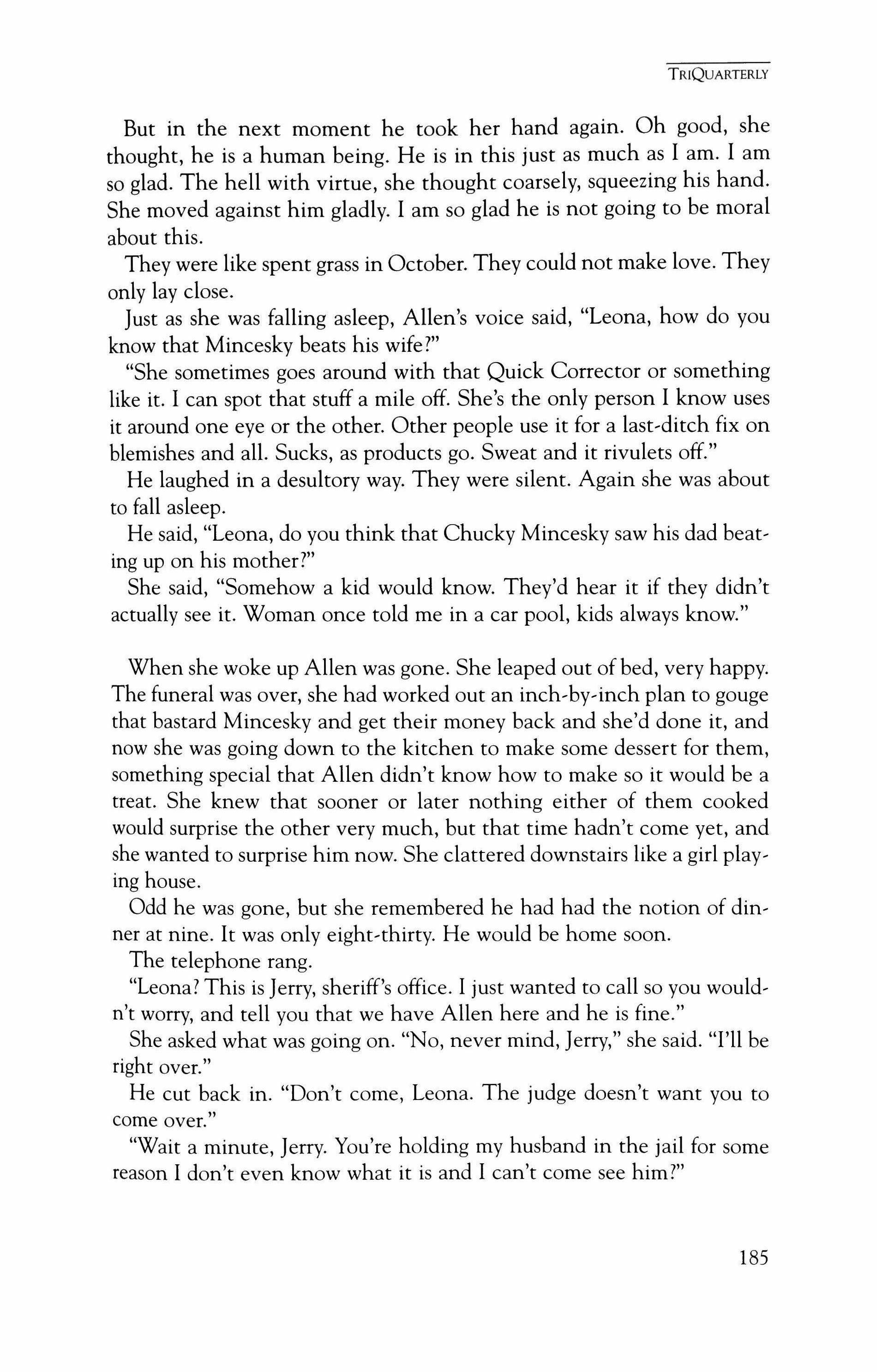
But in the next moment he took her hand again. Oh good, she thought, he is a human being. He is in this just as much as I am. I am so glad. The hell with virtue, she thought coarsely, squeezing his hand. She moved against him gladly. I am so glad he is not going to be moral about this.
They were like spent grass in October. They could not make love. They only lay close.
Just as she was falling asleep, Allen's voice said, "Leona, how do you know that Minceskv beats his wife?"
"She sometimes goes around with that Quick Corrector or something like it. I can spot that stuff a mile off. She's the only person I know uses it around one eye or the other. Other people use it for a last-ditch fix on blemishes and all. Sucks, as products go. Sweat and it rivulets off."
He laughed in a desultory way. They were silent. Again she was about to fall asleep.
He said, "Leona, do you think that Chucky Mincesky saw his dad beating up on his mother?"
She said, "Somehow a kid would know. They'd hear it if they didn't actually see it. Woman once told me in a car pool, kids always know."
When she woke up Allen was gone. She leaped out of bed, very happy. The funeral was over, she had worked out an inch-by-inch plan to gouge that bastard Mincesky and get their money back and she'd done it, and now she was going down to the kitchen to make some dessert for them, something special that Allen didn't know how to make so it would be a treat. She knew that sooner or later nothing either of them cooked would surprise the other very much, but that time hadn't come yet, and she wanted to surprise him now. She clattered downstairs like a girl playing house.
Odd he was gone, but she remembered he had had the notion of dinner at nine. It was only eight-thirty. He would be home soon.
The telephone rang.
"Leona? This is Jerry, sheriff's office. I just wanted to call so you wouldn't worry, and tell you that we have Allen here and he is fine."
She asked what was going on. "No, never mind, Jerry," she said. "I'll be right over."
He cut back in. "Don't come, Leona. The judge doesn't want you to come over."
"Wait a minute, Jerry. You're holding my husband in the jail for some reason I don't even know what it is and I can't come see him?"
TRIQUARTERLY
185

Jerry's voice, very steady: "Judge says absolutely not. Allen's supposed to be locked up for tonight and the court will arraign him tomorrow at ten o'clock. But you're not supposed to come over."
Leona found her voice. "Why are you holding him? Can't I talk to him?"
Jerry said, "Naw, Leona. He's made his one telephone call. Judge says, we're going by the rules. He made the right call, too, if you ask me. He called the judge. So the judge says hold him all night so it's a day in jail. Obey all the rules. So I said, Leona's got to know where he is, you know, and she's going to ask, what are we holding Allen for? and the judge says, tell her but no visiting tonight. Judge says, he's arraigning Allen ten o'clock tomorrow. He said, tell you very clearly when the hearing is. People have a right to go to it. That's what he said. So Coralie Ann, she's been calling up different people. Leona, you and Allen, you got a lot of friends it turns out. Cheryl whatshername. She said she's calling everyone she knows."
"Yes but why are you holding Allen?" Leona said.
"Well," Jerry said, "Apparently he went over to the Minceskys' earlier tonight. They were having supper and all, with all those relatives still in town. And Allen assaulted Charles Mincesky. So someone called the police which is me and I went over and picked up Allen. Then when we got back to the jail, Allen called the judge-hey, Leona, Coralie Ann wants to talk to you."
"Leona? This is Coralie Ann. Listen, I'm taking care of Allen O.K. Only light bruising and he didn't lose any teeth or anything. He has a shiner but we got ice on it. And Leona, normally, we hold someone here overnight? Normally what we do, we give them a choice of a TV dinner from the freezer, they can have the turkey or the veggie. I just wanted you to know that I ran over to the minimarket and got a 'Tbone for Allen. Onion rings, too. Not as good as homemade but still, you know, onion rings are onion rings. And Leona, he is going to be fine. Jerry and I, we bandaged up his hand, he didn't break anything, and the eye'll be O.K. I just wanted you to know."
"Christ, thank you very much," said Leona. "Thank you, Coralie Ann. But I thought Allen slugged Mincesky? Did Mincesky slug him back?"
Coralie Ann's tone was crisp. "Allen did pretty well," she said. "Pretty dam well considering. He got in one, I think. Jerry said he kind of missed but got him in the ear." (She turned half-away from the phone and bellowed, "[er, did you say Allen got Mincesky one in the ear?" male voice in the background, back to Leona.) "Yeah, he says he did pretty good
TRIQUARTERLY
186
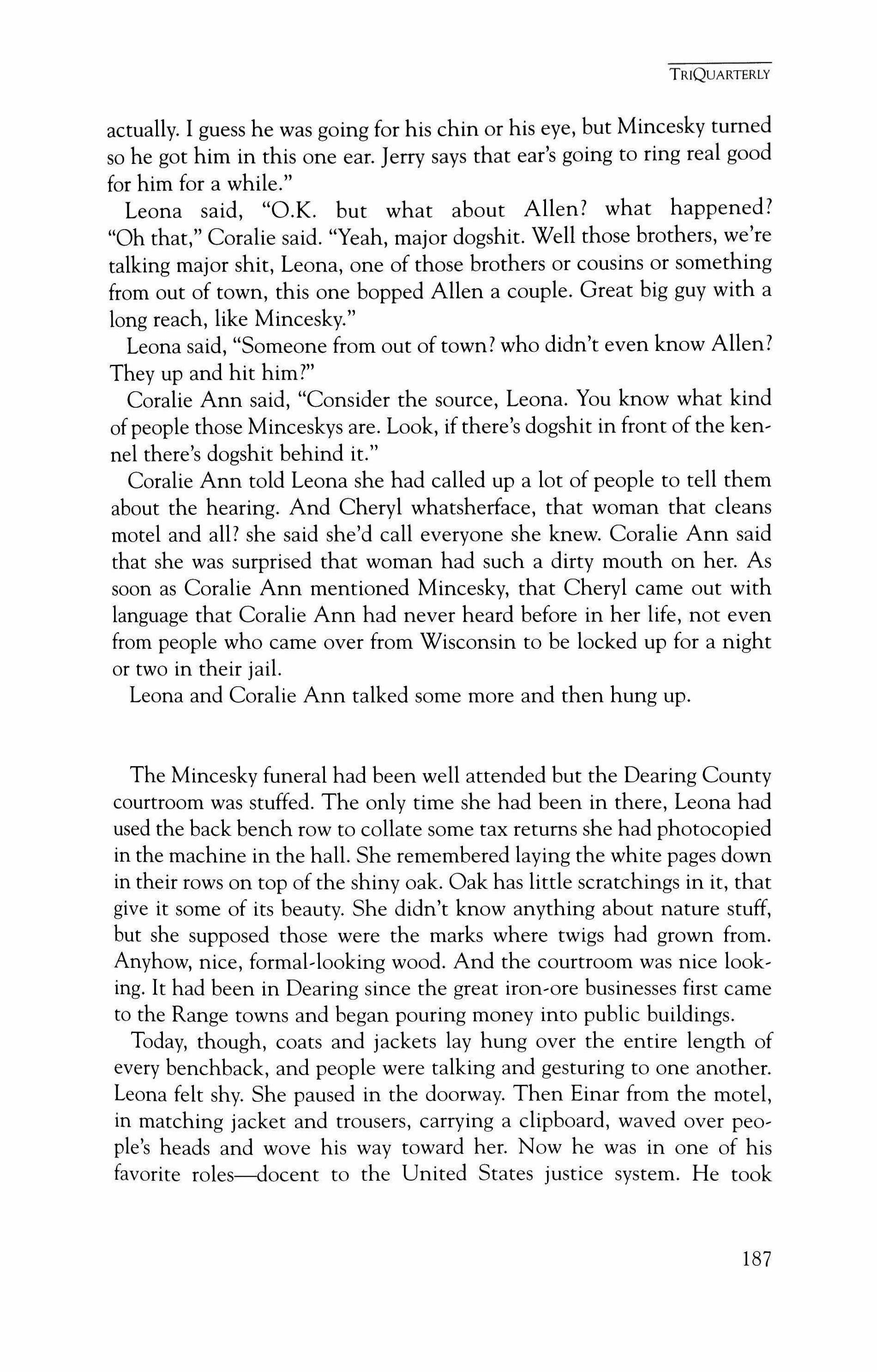
actually. I guess he was going for his chin or his eye, but Mincesky turned so he got him in this one ear. Jerry says that ear's going to ring real good for him for a while."
Leona said, "O.K. but what about Allen? what happened? "Oh that," Coralie said. "Yeah, major dogshit. Well those brothers, we're talking major shit, Leona, one of those brothers or cousins or something from out of town, this one bopped Allen a couple. Great big guy with a long reach, like Mincesky."
Leona said, "Someone from out of town? who didn't even know Allen? They up and hit him?"
Coralie Ann said, "Consider the source, Leona. You know what kind ofpeople those Minceskys are. Look, if there's dogshit in front of the ken, nel there's dogshit behind it."
Coralie Ann told Leona she had called up a lot of people to tell them about the hearing. And Cheryl whatsherface, that woman that cleans motel and all? she said she'd call everyone she knew. Coralie Ann said that she was surprised that woman had such a dirty mouth on her. As soon as Coralie Ann mentioned Mincesky, that Cheryl came out with language that Coralie Ann had never heard before in her life, not even from people who came over from Wisconsin to be locked up for a night or two in their jail.
Leona and Coralie Ann talked some more and then hung up.
The Mincesky funeral had been well attended but the Dearing County courtroom was stuffed. The only time she had been in there, Leona had used the back bench row to collate some tax returns she had photocopied in the machine in the hall. She remembered laying the white pages down in their rows on top of the shiny oak. Oak has little scratchings in it, that give it some of its beauty. She didn't know anything about nature stuff, but she supposed those were the marks where twigs had grown from. Anyhow, nice, formal,looking wood. And the courtroom was nice look, ing. It had been in Dearing since the great iron-ore businesses first came to the Range towns and began pouring money into public buildings. Today, though, coats and jackets lay hung over the entire length of every benchback, and people were talking and gesturing to one another. Leona felt shy. She paused in the doorway. Then Einar from the motel, in matching jacket and trousers, carrying a clipboard, waved over people's heads and wove his way toward her. Now he was in one of his favorite roles---docent to the United States justice system. He took 187
TRIQUARTERLY
TRIQUARTERLY

Leona by the arm and floated his announcement to those nearby: "Here she is! Here she is! Here, shove along, would you? Here's our Leona! Of all people she gets a seat!" People turned around and grinned at her. On both sides of the aisle people made sitting space for her. Now everyone was sitting down.
Leona peered between heads to see who all was up front. One of the sheriff's men was laying papers on the judge's desk. Leona recalled that he was that worthless lowlife that tried to claim he didn't have any income except his social security. When the feds got after him he had called Leona and asked her if she would just testify that she had done his taxes for the last three years and she could attest to the fact he had just about zero per annum income. Now he was a sheriff's deputy. He went out a side door up front. Someone else, perhaps a bailiff, came in. Then the lowlife returned, this time bringing Allen Treuer by the arm but not cuffed. They sat down at the defense counsel table. Charles Mincesky already sat at a smaller table at a table between Allen's and the front row of audience.
Jerry, the sheriff himself, looking very spruce, with a visible press to his khaki shirt, now shouted, "All rise!" and everyone, combed or tousled, kempt or unkempt, got to their feet. He went on: "The Court ofthe State of Minnesota, Dearing County, is now in session, the Honorable John Meyrens, Justice presiding."
Judge Meyrens appeared in a black gown. He went up onto the platform and took his seat. He said loudly, "You may be seated."
Then he looked around, as if he had noticed the filled courtroom for the first time. The people, on their part, now took in their judge, many of them for the first and perhaps the only time in their lives, dressed in the raiment of his profession. He still had, of course, the familiar curly hair and the same about-to-smile expression. This was the benign, middle-aged face of their friend. People recalled how he shouted unjudgelike things at their football games and liked him for it. He had even been reprimanded by the refs, just five days ago at Homecoming, right there under the Friday bright lights in front of them all, for conduct unbecoming to sportsmanship. For that particular behavior, they not only liked but loved him. So here he was in his regalia and everyone settled down with wiggly smiles at their neighbors and watched. They hoped he would bring about some indecipherable but basically good thing.
Judge Meyrens said, "This is the case of the People of the State of Minnesota versus Allen Curtiss Treuer, Docket number 68,547. Is the defendant present in Court?"
188

Jerry said, "Yes he is, your honor."
The judge then looked directly at Allen. "Mr. Treuer, you have been charged with assault and trespassing. How do you plead?"
"Guilty, your honor," Allen said.
A single, almost lyrical sigh waved across the whole courtroom. Following that floating sound, total silence. Judge, bailiff, court reporter, sheriff, deputies, defendant and plaintiff, and the roomful of people-all were still.
The judge said, "Since neither defendant nor prosecution have elected to be represented by counsel, I will now ask Charles Mincesky to explain his position in this case."
Clearly, Allen Curtiss Treuer of this county had entered the home of Charles Mincesky at 413 East End Avenue for the purpose of assault. He had struck Charles Mincesky. Guests of the household had called the police. The sheriff had brought Allen Treuer to the jail and incarcerated him for the night.
In a polite voice, Judge Meyrens then asked Mr. Mincesky if he would be willing to tell all of his side of the story.
"Willing! You bet I'm willing!" snapped Mincesky. "He came right in, when my relatives and my family and I were grieving for our dead boy. He just came right in and said a lot of crazy stuff, and then tried to slug me, the dumb ass."
The judge said, "Keep all language clean or I will have you fined."
Mincesky said, "He tried to slug me but he missed."
The judge said, "Are you saying that he missed? That he did not hit you ?"
"I meant he missed my face. He's hardly an athlete. He just ticked my ear."
"PI h ease s ow your ear.
It was red, oddly shaped, like a plantain leaf.
The judge looked at the recorder and said, "Record that Allen Treuer landed a blow on Charles Mincesky's right ear." He looked back at Mincesky. "What did he say before he landed the blow on your ear?"
"C ff h razy stu your onor.
"Be specific."
"I don't remember that crazy stuff he said, shouting and crying, too. Yeah, he was crying."
"Please remember it," the judge remarked. "I will then ask Mr. Treuer to confirm it."
Mincesky spoke quietly. His back was to the audience. The judge said, "Will you please speak plainly so everyone can hear."
TRIQUARTERLY
189
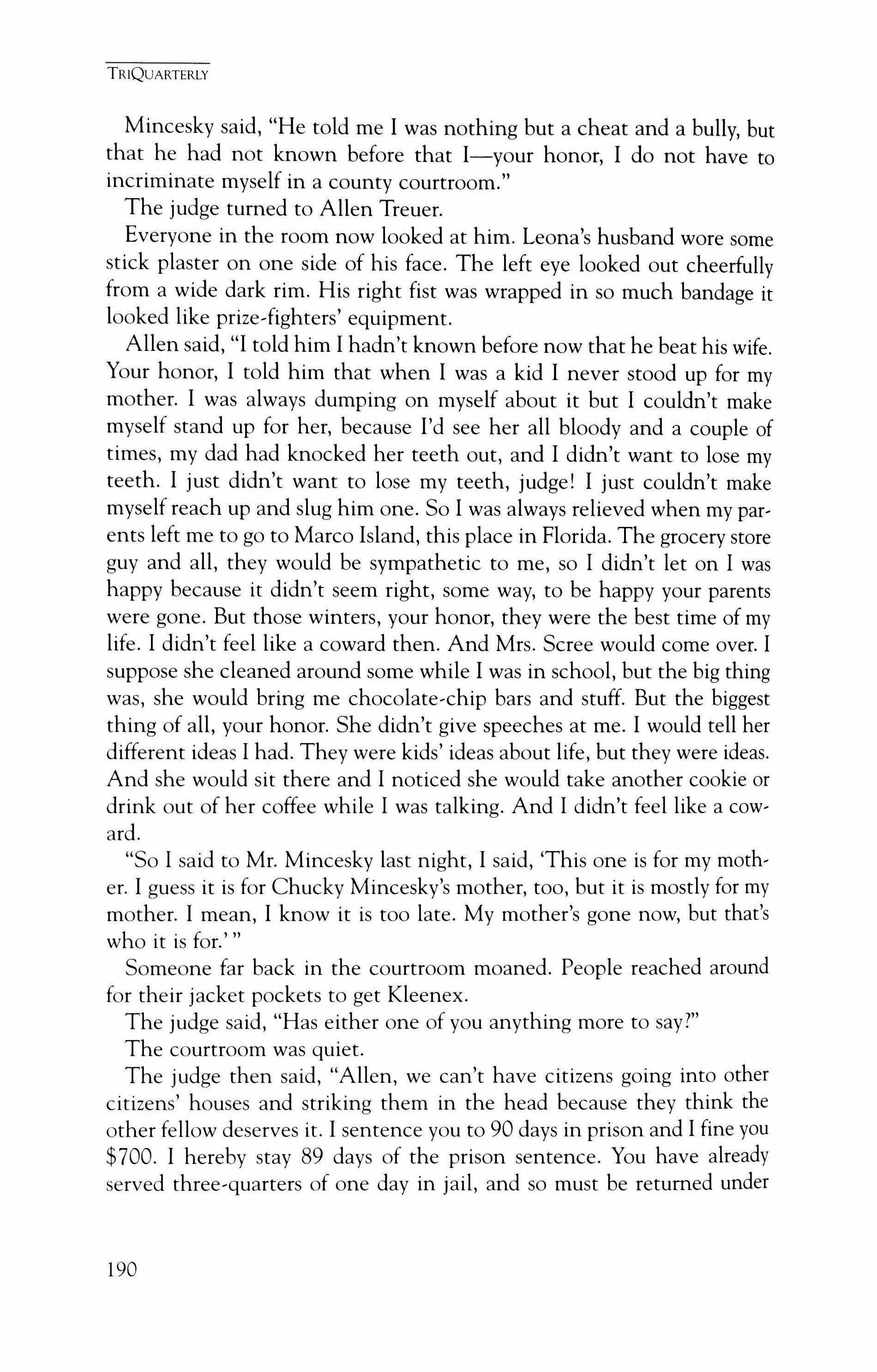
Mincesky said, "He told me I was nothing but a cheat and a bully, but that he had not known before that I-your honor, I do not have to incriminate myself in a county courtroom."
The judge turned to Allen Treuer.
Everyone in the room now looked at him. Leona's husband wore some stick plaster on one side of his face. The left eye looked out cheerfully from a wide dark rim. His right fist was wrapped in so much bandage it looked like prize-fighters' equipment.
Allen said, "I told him I hadn't known before now that he beat his wife. Your honor, I told him that when I was a kid I never stood up for my mother. I was always dumping on myself about it but I couldn't make myself stand up for her, because I'd see her all bloody and a couple of times, my dad had knocked her teeth out, and I didn't want to lose my teeth. I just didn't want to lose my teeth, judge! I just couldn't make myself reach up and slug him one. So I was always relieved when my parents left me to go to Marco Island, this place in Florida. The grocery store guy and all, they would be sympathetic to me, so I didn't let on I was happy because it didn't seem right, some way, to be happy your parents were gone. But those winters, your honor, they were the best time of my life. I didn't feel like a coward then. And Mrs. Scree would come over. I suppose she cleaned around some while I was in school, but the big thing was, she would bring me chocolate-chip bars and stuff. But the biggest thing of all, your honor. She didn't give speeches at me. I would tell her different ideas I had. They were kids' ideas about life, but they were ideas. And she would sit there and I noticed she would take another cookie or drink out of her coffee while I was talking. And I didn't feel like a coward.
"So I said to Mr. Mincesky last night, I said, 'This one is for my mother. I guess it is for Chucky Mincesky's mother, too, but it is mostly for my mother. I mean, I know it is too late. My mother's gone now, but that's who it is for.'
Someone far back in the courtroom moaned. People reached around for their jacket pockets to get Kleenex.
The judge said, "Has either one of you anything more to say?"
The courtroom was quiet.
The judge then said, "Allen, we can't have citizens going into other citizens' houses and striking them in the head because they think the other fellow deserves it. I sentence you to 90 days in prison and I fine you $700. I hereby stay 89 days of the prison sentence. You have already served three-quarters of one day in jail, and so must be returned under
TRIQUARTERLY
190
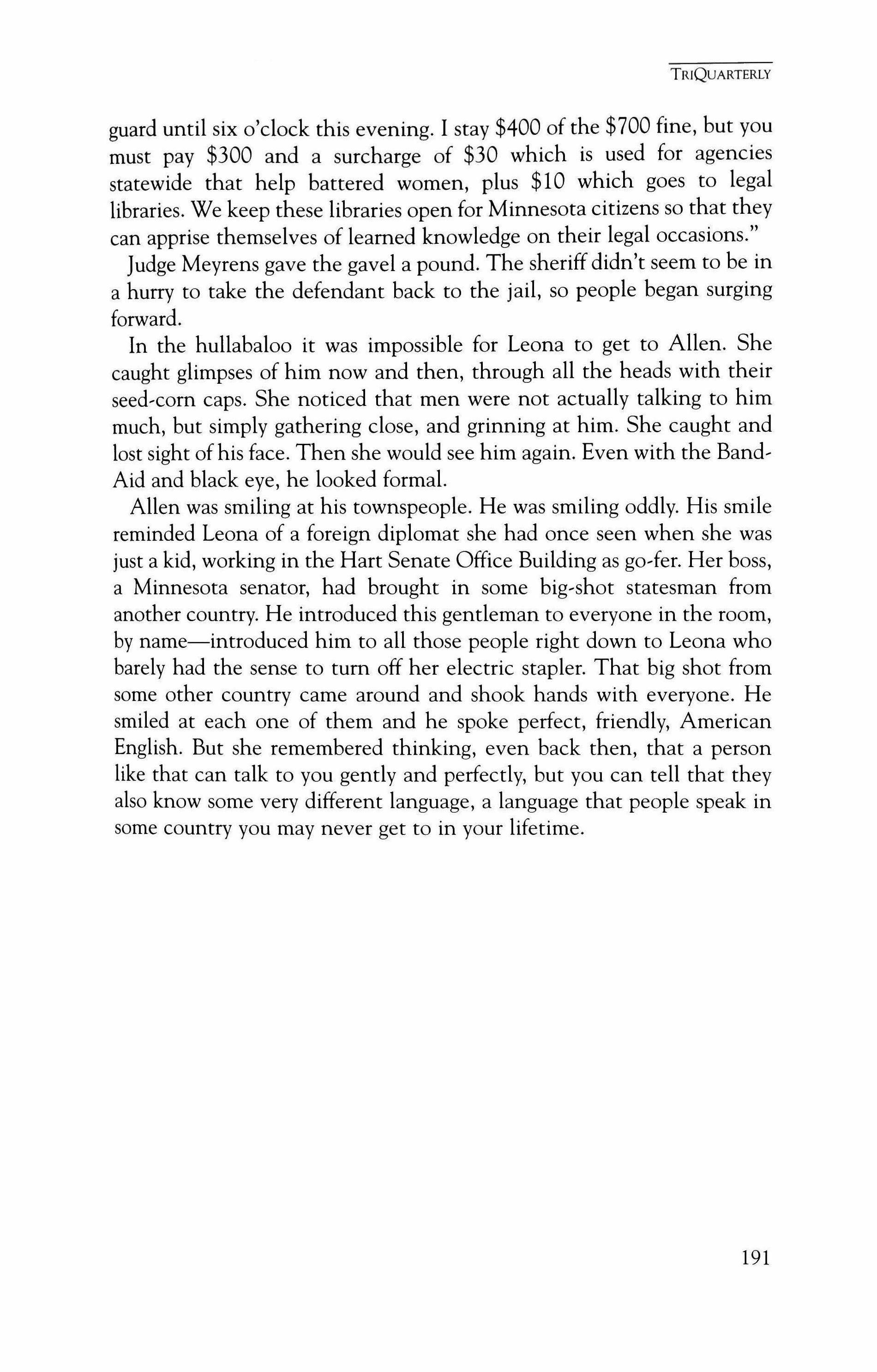
guard until six o'clock this evening. I stay $400 of the $700 fine, but you must pay $300 and a surcharge of $30 which is used for agencies statewide that help battered women, plus $10 which goes to legal libraries. We keep these libraries open for Minnesota citizens so that they can apprise themselves of learned knowledge on their legal occasions."
Judge Meyrens gave the gavel a pound. The sheriff didn't seem to be in a hurry to take the defendant back to the jail, so people began surging forward.
In the hullabaloo it was impossible for Leona to get to Allen. She caught glimpses of him now and then, through all the heads with their seed-corn caps. She noticed that men were not actually talking to him much, but simply gathering close, and grinning at him. She caught and lost sight ofhis face. Then she would see him again. Even with the BandAid and black eye, he looked formal.
Allen was smiling at his townspeople. He was smiling oddly. His smile reminded Leona of a foreign diplomat she had once seen when she was just a kid, working in the Hart Senate Office Building as go-fer. Her boss, a Minnesota senator, had brought in some big-shot statesman from another country. He introduced this gentleman to everyone in the room, by name-introduced him to all those people right down to Leona who barely had the sense to tum off her electric stapler. That big shot from some other country came around and shook hands with everyone. He smiled at each one of them and he spoke perfect, friendly, American English. But she remembered thinking, even back then, that a person like that can talk to you gently and perfectly, but you can tell that they also know some very different language, a language that people speak in some country you may never get to in your lifetime.
TRIQUARTERLY
191
Technician
Leigh Buchanan Bienen
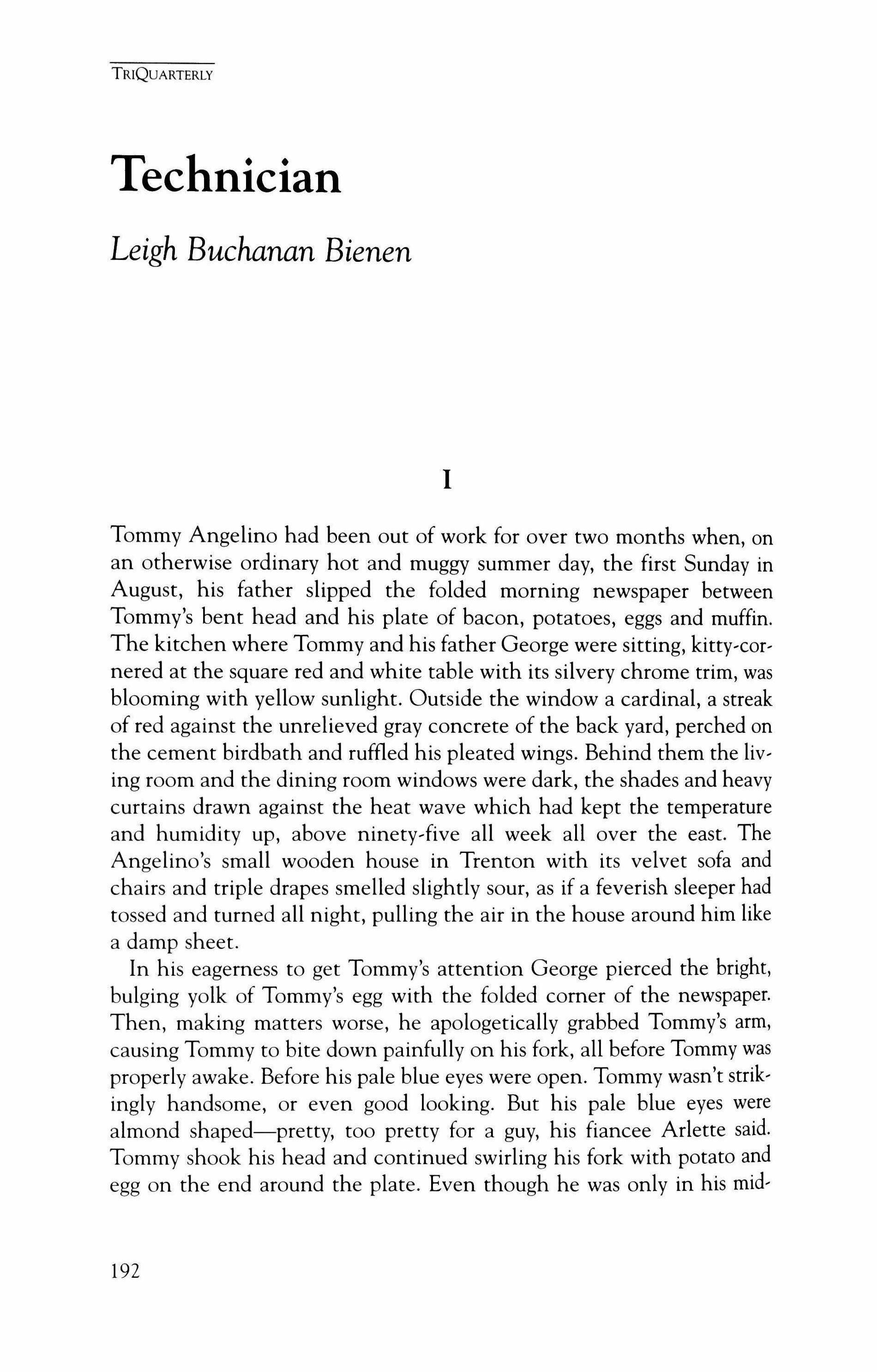
ITommy Angelino had been out of work for over two months when, on an otherwise ordinary hot and muggy summer day, the first Sunday in August, his father slipped the folded morning newspaper between Tommy's bent head and his plate of bacon, potatoes, eggs and muffin. The kitchen where Tommy and his father George were sitting, kitty-cornered at the square red and white table with its silvery chrome trim, was blooming with yellow sunlight. Outside the window a cardinal, a streak of red against the unrelieved gray concrete of the back yard, perched on the cement birdbath and ruffled his pleated wings. Behind them the living room and the dining room windows were dark, the shades and heavy curtains drawn against the heat wave which had kept the temperature and humidity up, above ninety-five all week all over the east. The Angelino's small wooden house in Trenton with its velvet sofa and chairs and triple drapes smelled slightly sour, as if a feverish sleeper had tossed and turned all night, pulling the air in the house around him like a damp sheet.
In his eagerness to get Tommy's attention George pierced the bright, bulging yolk of Tommy's egg with the folded comer of the newspaper. Then, making matters worse, he apologetically grabbed Tommy's arm, causing Tommy to bite down painfully on his fork, all before Tommy was properly awake. Before his pale blue eyes were open. Tommy wasn't strikingly handsome, or even good looking. But his pale blue eyes were almond shaped-pretty, too pretty for a guy, his fiancee Arlette said. Tommy shook his head and continued swirling his fork with potato and egg on the end around the plate. Even though he was only in his mid-
TRIQUARTERLY
192
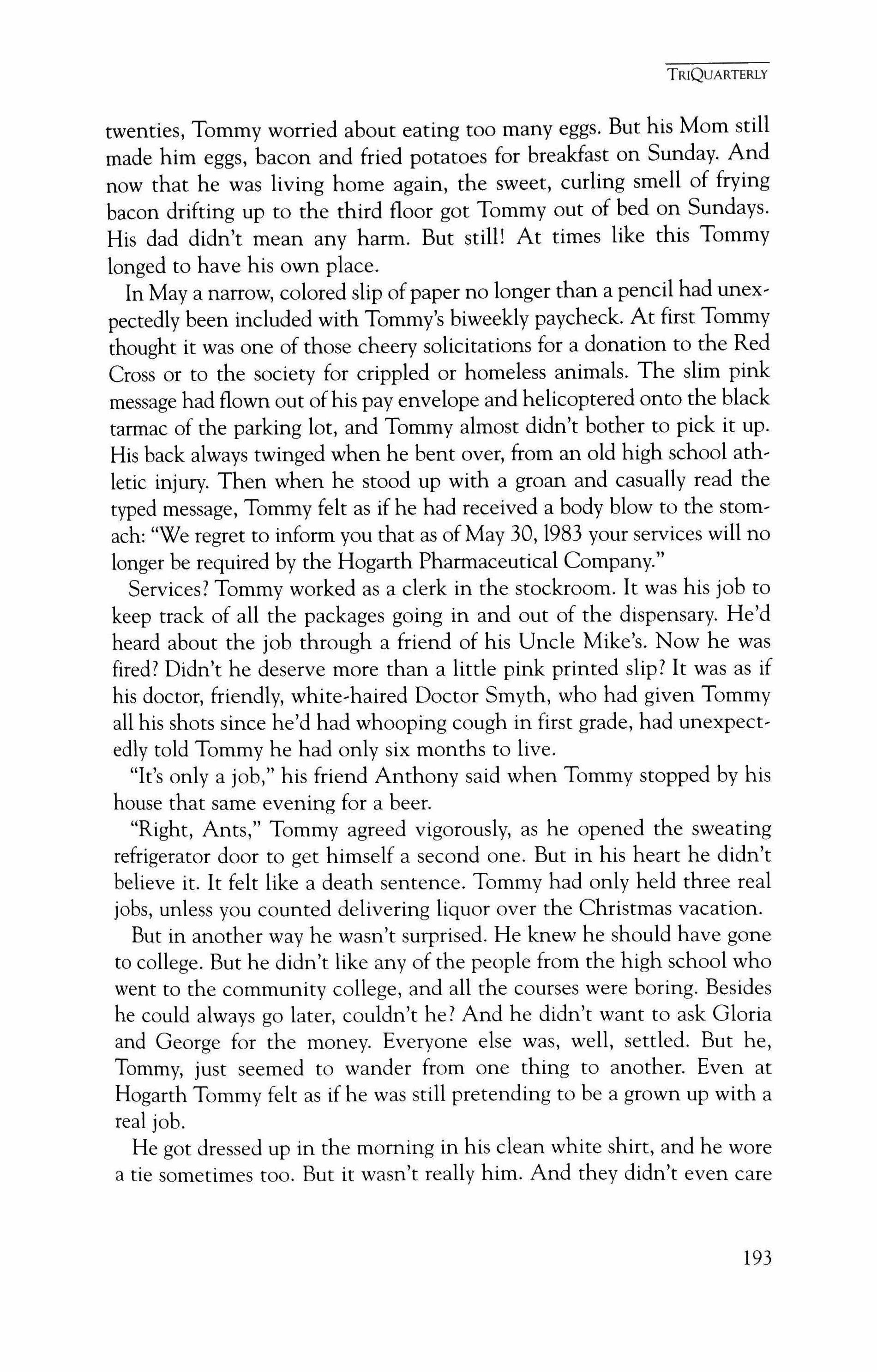
twenties, Tommy worried about eating too many eggs. But his Mom still made him eggs, bacon and fried potatoes for breakfast on Sunday. And now that he was living home again, the sweet, curling smell of frying bacon drifting up to the third floor got Tommy out of bed on Sundays. His dad didn't mean any harm. But still! At times like this Tommy longed to have his own place.
In Maya narrow, colored slip of paper no longer than a pencil had unexpectedly been included with Tommy's biweekly paycheck. At first Tommy thought it was one of those cheery solicitations for a donation to the Red Cross or to the society for crippled or homeless animals. The slim pink message had flown out ofhis pay envelope and helicoptered onto the black tarmac of the parking lot, and Tommy almost didn't bother to pick it up. His back always twinged when he bent over, from an old high school athletic injury. Then when he stood up with a groan and casually read the typed message, Tommy felt as if he had received a body blow to the stomach: "We regret to inform you that as of May 30, 1983 your services will no longer be required by the Hogarth Pharmaceutical Company." Services? Tommy worked as a clerk in the stockroom. It was his job to keep track of all the packages going in and out of the dispensary. He'd heard about the job through a friend of his Uncle Mike's. Now he was fired? Didn't he deserve more than a little pink printed slip? It was as if his doctor, friendly, white-haired Doctor Smyth, who had given Tommy all his shots since he'd had whooping cough in first grade, had unexpectedly told Tommy he had only six months to live.
"It's only a job," his friend Anthony said when Tommy stopped by his house that same evening for a beer.
"Right, Ants," Tommy agreed vigorously, as he opened the sweating refrigerator door to get himself a second one. But in his heart he didn't believe it. It felt like a death sentence. Tommy had only held three real jobs, unless you counted delivering liquor over the Christmas vacation.
But in another way he wasn't surprised. He knew he should have gone to college. But he didn't like any of the people from the high school who went to the community college, and all the courses were boring. Besides he could always go later, couldn't he? And he didn't want to ask Gloria and George for the money. Everyone else was, well, settled. But he, Tommy, just seemed to wander from one thing to another. Even at Hogarth Tommy felt as if he was still pretending to be a grown up with a real job.
He got dressed up in the morning in his clean white shirt, and he wore a tie sometimes too. But it wasn't really him. And they didn't even care
TRIQUARTERLY
193
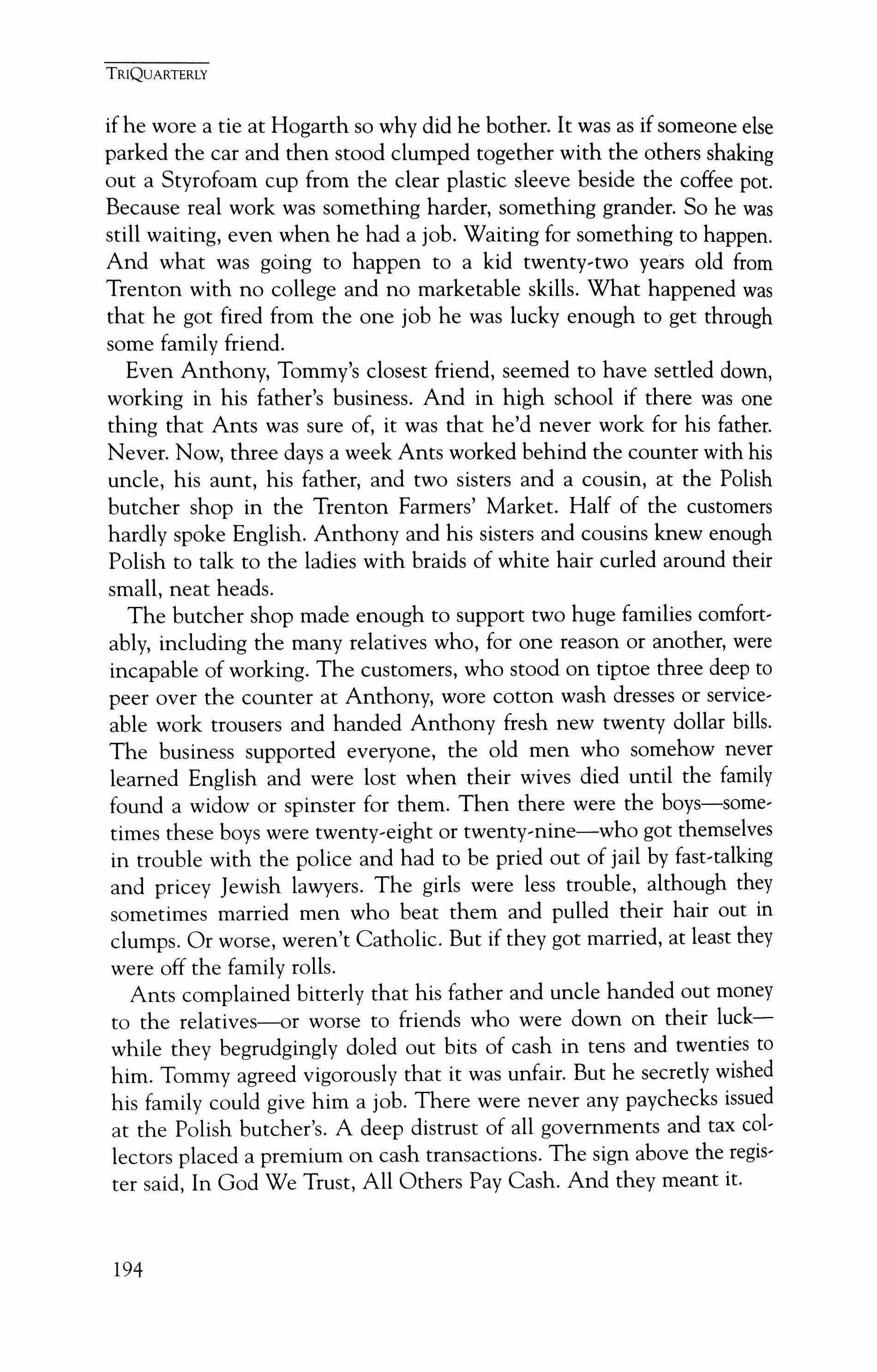
if he wore a tie at Hogarth so why did he bother. It was as if someone else parked the car and then stood clumped together with the others shaking out a Styrofoam cup from the clear plastic sleeve beside the coffee pot. Because real work was something harder, something grander. So he was still waiting, even when he had a job. Waiting for something to happen. And what was going to happen to a kid twenty-two years old from Trenton with no college and no marketable skills. What happened was that he got fired from the one job he was lucky enough to get through some family friend.
Even Anthony, Tommy's closest friend, seemed to have settled down, working in his father's business. And in high school if there was one thing that Ants was sure of, it was that he'd never work for his father. Never. Now, three days a week Ants worked behind the counter with his uncle, his aunt, his father, and two sisters and a cousin, at the Polish butcher shop in the Trenton Farmers' Market. Half of the customers hardly spoke English. Anthony and his sisters and cousins knew enough Polish to talk to the ladies with braids of white hair curled around their small, neat heads.
The butcher shop made enough to support two huge families comfortably, including the many relatives who, for one reason or another, were incapable of working. The customers, who stood on tiptoe three deep to peer over the counter at Anthony, wore cotton wash dresses or serviceable work trousers and handed Anthony fresh new twenty dollar bills. The business supported everyone, the old men who somehow never learned English and were lost when their wives died until the family found a widow or spinster for them. Then there were the boys-sometimes these boys were twenty-eight or twenty-nine-e-who got themselves in trouble with the police and had to be pried out of jail by fast-talking and pricey Jewish lawyers. The girls were less trouble, although they sometimes married men who beat them and pulled their hair out in clumps. Or worse, weren't Catholic. But if they got married, at least they were off the family rolls.
Ants complained bitterly that his father and uncle handed out money to the relatives-or worse to friends who were down on their luckwhile they begrudgingly doled out bits of cash in tens and twenties to him. Tommy agreed vigorously that it was unfair. But he secretly wished his family could give him a job. There were never any paychecks issued at the Polish butcher's. A deep distrust of all governments and tax collectors placed a premium on cash transactions. The sign above the register said, In God We Trust, All Others Pay Cash. And they meant it.
TRIQUARTERLY
194
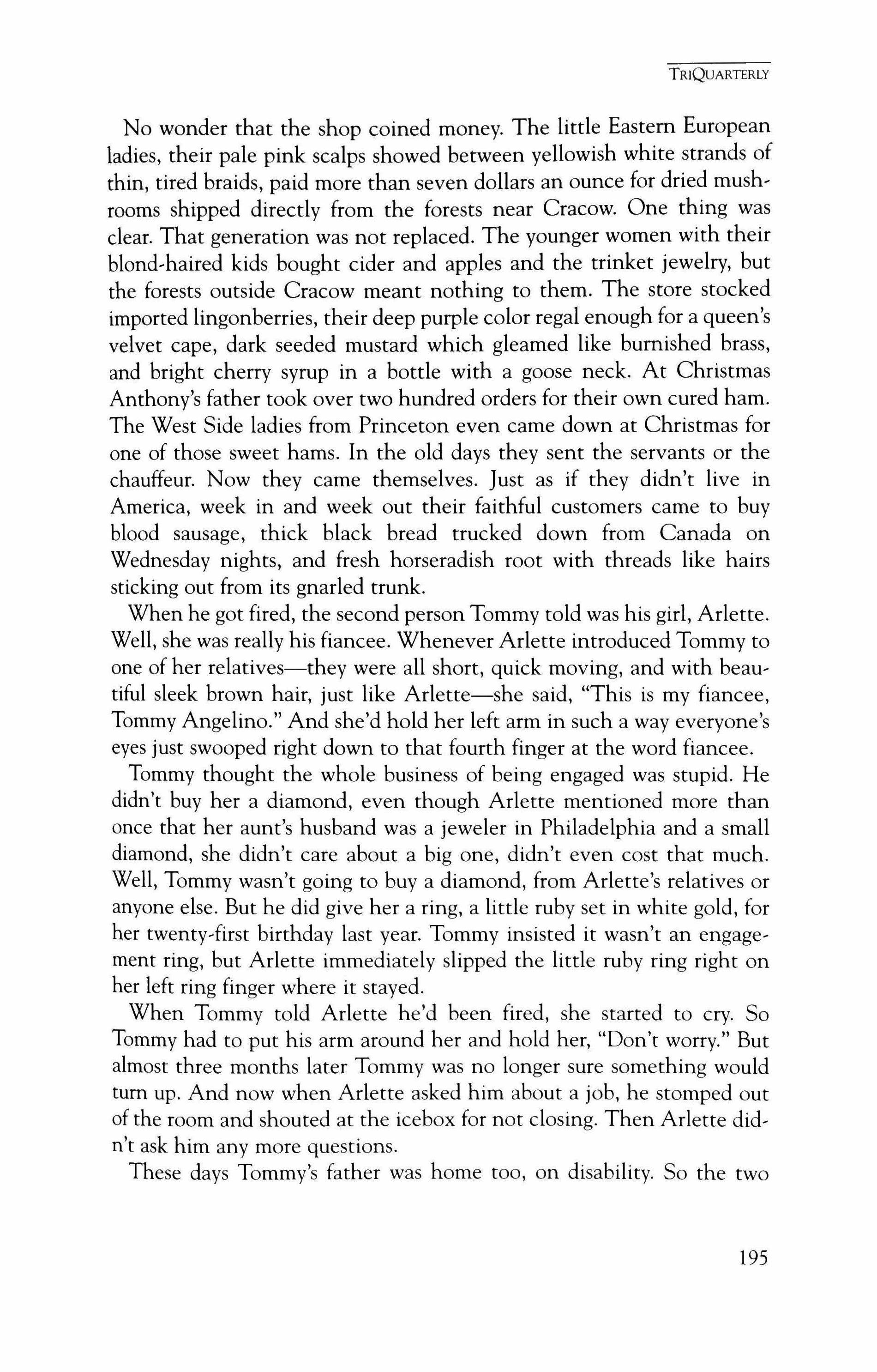
No wonder that the shop coined money. The little Eastern European ladies, their pale pink scalps showed between yellowish white strands of thin, tired braids, paid more than seven dollars an ounce for dried mushrooms shipped directly from the forests near Cracow. One thing was clear. That generation was not replaced. The younger women with their blond-haired kids bought cider and apples and the trinket jewelry, but the forests outside Cracow meant nothing to them. The store stocked imported lingonberries, their deep purple color regal enough for a queen's velvet cape, dark seeded mustard which gleamed like burnished brass, and bright cherry syrup in a bottle with a goose neck. At Christmas Anthony's father took over two hundred orders for their own cured ham. The West Side ladies from Princeton even came down at Christmas for one of those sweet hams. In the old days they sent the servants or the chauffeur. Now they came themselves. Just as if they didn't live in America, week in and week out their faithful customers came to buy blood sausage, thick black bread trucked down from Canada on Wednesday nights, and fresh horseradish root with threads like hairs sticking out from its gnarled trunk.
When he got fired, the second person Tommy told was his girl, Arlette. Well, she was really his fiancee. Whenever Arlette introduced Tommy to one of her relatives-they were all short, quick moving, and with beautiful sleek brown hair, just like Arlette-she said, "This is my fiancee, Tommy Angelino." And she'd hold her left arm in such a way everyone's eyes just swooped right down to that fourth finger at the word fiancee. Tommy thought the whole business of being engaged was stupid. He didn't buy her a diamond, even though Arlette mentioned more than once that her aunt's husband was a jeweler in Philadelphia and a small diamond, she didn't care about a big one, didn't even cost that much. Well, Tommy wasn't going to buy a diamond, from Arlette's relatives or anyone else. But he did give her a ring, a little ruby set in white gold, for her twenty-first birthday last year. Tommy insisted it wasn't an engagement ring, but Arlette immediately slipped the little ruby ring right on her left ring finger where it stayed.
When Tommy told Arlette he'd been fired, she started to cry. So Tommy had to put his arm around her and hold her, "Don't worry." But almost three months later Tommy was no longer sure something would tum up. And now when Arlette asked him about a job, he stomped out of the room and shouted at the icebox for not closing. Then Arlette didn't ask him any more questions.
These days Tommy's father was home too, on disability. So the two
TRIQUARTERLY
195

men rattled around the house getting on each other's nerves. They even managed to annoy Tommy's mother, Gloria, who was as even tempered as a sunny day in June. Tommy complained to his mother that his dad sat in his bathrobe all day in front of the television, forecasting doom, not only for the immediate members of their relatively small Italian family, but for the rest of what he called civilization as well.
George dragged Tommy down three flights of stairs to watch a shaky news clip showing a collapsed fireman being administered oxygen on the sidewalk. Nothing seemed to cheer up George more than goodness gone wrong. That the person who thought he was doing the right thing, turned out to cause harm. The policeman who was chasing a fleeing two-bit drug seller when his heavy foot slipped on the accelerator, running his car up on the sidewalk and breaking the back of a woman loading groceries into her car. "That brought them up short," George would say gleefully, as if he himself had been responsible for bringing the poor foolish do-gooder up short. No justice, he would croak cheerfully at Tommy with his teeth out.
To his mother Tommy complained bitterly that George had the TV blasting all day-he was hard of hearing-making Tommy a prisoner in his attic room, which was stifling in August. While George whispered to Gloria as they lay beside one another right beneath Tommy's room, that if he, George, were able-bodied and single and in his twenties in 1983, he'd surely have found another job by now. He wouldn't lie on his back listening to some expensive tape recorder, waiting for work to corne to him. We didn't have all that expensive junk to play with either, he explained to Gloria, as if he thought she had suddenly arrived on earth from another planet.
Gloria sighed and rolled over in the sticky night. "That air conditioner must be broken, again," Gloria answered, and they both listened to the uneven gasps of the machine jammed into the scarred window frame.
Before his sickness. Well, it wasn't really a sickness. Before his injury George-he'd been christened Georgio by his Italian grandmotherbefore this happened, before his accident, George had never missed a day of work or spent a day in bed. When Georgio's father had been engaged to Tommy's grandmother they rode the trolley from Camden to Trenton, without any fear in the evening, and then the two of them sat on a stone bench, eating ices in the cool peaceful shadows of the old city graveyard. There, overarching, stippled sycamore and weeping cherry trees shaded both the tombstones of George Washington's soldiers and the graves of babies who died of whooping cough or diphtheria in the nineteenth
TRIQUARTERLY
196
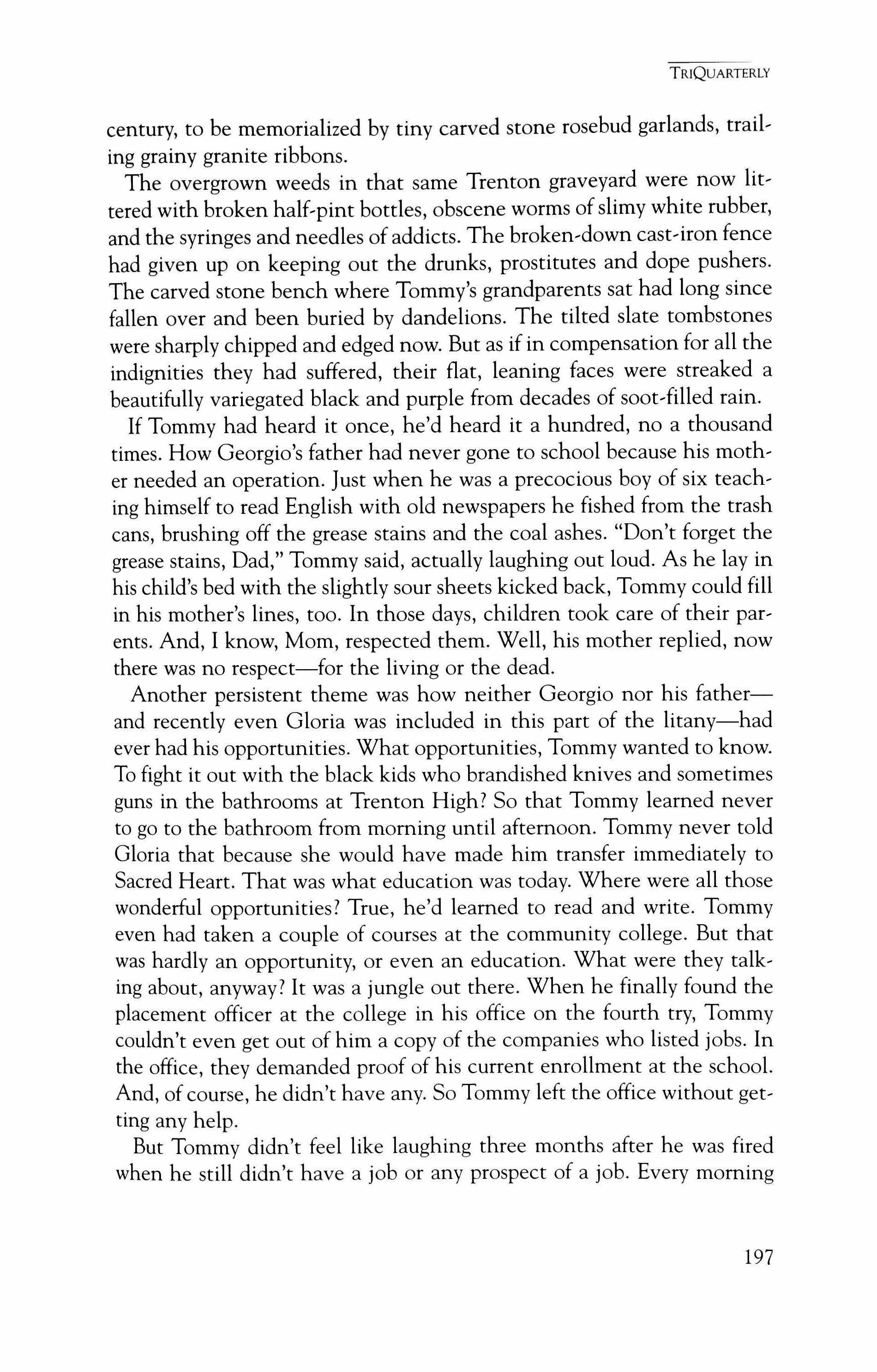
century, to be memorialized by tiny carved stone rosebud garlands, trailing grainy granite ribbons.
The overgrown weeds in that same Trenton graveyard were now littered with broken half-pint bottles, obscene worms ofslimy white rubber, and the syringes and needles of addicts. The broken-down cast-iron fence had given up on keeping out the drunks, prostitutes and dope pushers. The carved stone bench where Tommy's grandparents sat had long since fallen over and been buried by dandelions. The tilted slate tombstones were sharply chipped and edged now. But as if in compensation for all the indignities they had suffered, their flat, leaning faces were streaked a beautifully variegated black and purple from decades of soot-filled rain.
If Tommy had heard it once, he'd heard it a hundred, no a thousand times. How Georgie's father had never gone to school because his mother needed an operation. Just when he was a precocious boy of six teaching himself to read English with old newspapers he fished from the trash cans, brushing off the grease stains and the coal ashes. "Don't forget the grease stains, Dad," Tommy said, actually laughing out loud. As he lay in his child's bed with the slightly sour sheets kicked back, Tommy could fill in his mother's lines, too. In those days, children took care of their parents. And, I know, Mom, respected them. Well, his mother replied, now there was no respect-for the living or the dead.
Another persistent theme was how neither Georgio nor his fatherand recently even Gloria was included in this part of the litany-had ever had his opportunities. What opportunities, Tommy wanted to know. To fight it out with the black kids who brandished knives and sometimes guns in the bathrooms at Trenton High? So that Tommy learned never to go to the bathroom from morning until afternoon. Tommy never told Gloria that because she would have made him transfer immediately to Sacred Heart. That was what education was today. Where were all those wonderful opportunities? True, he'd learned to read and write. Tommy even had taken a couple of courses at the community college. But that was hardly an opportunity, or even an education. What were they talking about, anyway? It was a jungle out there. When he finally found the placement officer at the college in his office on the fourth try, Tommy couldn't even get out of him a copy of the companies who listed jobs. In the office, they demanded proof of his current enrollment at the school. And, of course, he didn't have any. So Tommy left the office without getting any help.
But Tommy didn't feel like laughing three months after he was fired when he still didn't have a job or any prospect of a job. Every morning
TRIQUARTERLY
197
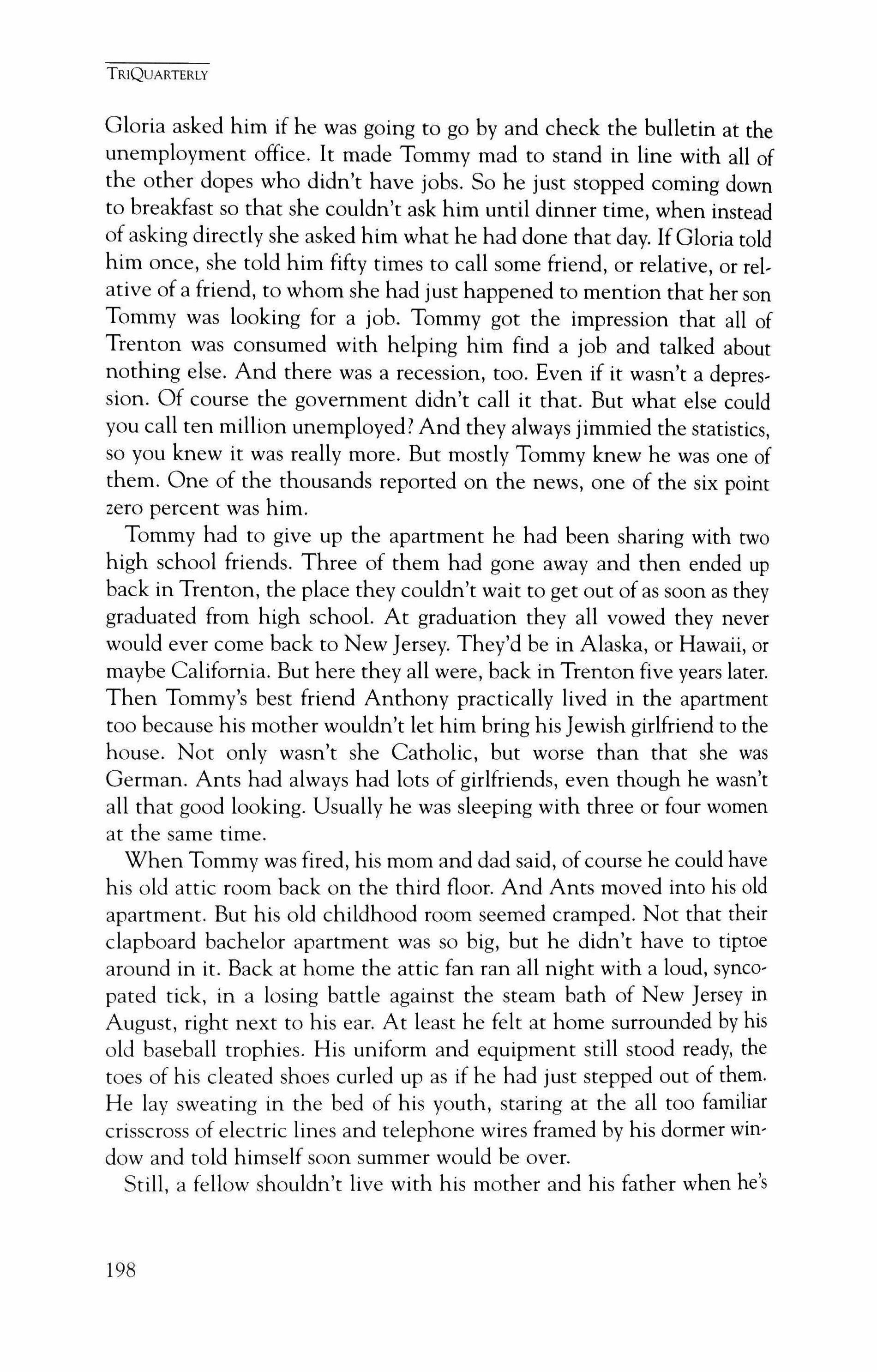
TRIQUARTERLY
Gloria asked him if he was going to go by and check the bulletin at the unemployment office. It made Tommy mad to stand in line with all of the other dopes who didn't have jobs. So he just stopped coming down to breakfast so that she couldn't ask him until dinner time, when instead of asking directly she asked him what he had done that day. If Gloria told him once, she told him fifty times to call some friend, or relative, or relative of a friend, to whom she had just happened to mention that her son Tommy was looking for a job. Tommy got the impression that all of Trenton was consumed with helping him find a job and talked about nothing else. And there was a recession, too. Even if it wasn't a depression. Of course the government didn't call it that. But what else could you call ten million unemployed? And they always jimmied the statistics, so you knew it was really more. But mostly Tommy knew he was one of them. One of the thousands reported on the news, one of the six point zero percent was him.
Tommy had to give up the apartment he had been sharing with two high school friends. Three of them had gone away and then ended up back in Trenton, the place they couldn't wait to get out of as soon as they graduated from high school. At graduation they all vowed they never would ever come back to New Jersey. They'd be in Alaska, or Hawaii, or maybe California. But here they all were, back in Trenton five years later. Then Tommy's best friend Anthony practically lived in the apartment too because his mother wouldn't let him bring his Jewish girlfriend to the house. Not only wasn't she Catholic, but worse than that she was German. Ants had always had lots of girlfriends, even though he wasn't all that good looking. Usually he was sleeping with three or four women at the same time.
When Tommy was fired, his mom and dad said, of course he could have his old attic room back on the third floor. And Ants moved into his old apartment. But his old childhood room seemed cramped. Not that their clapboard bachelor apartment was so big, but he didn't have to tiptoe around in it. Back at home the attic fan ran all night with a loud, syncopated tick, in a losing battle against the steam bath of New Jersey in August, right next to his ear. At least he felt at home surrounded by his old baseball trophies. His uniform and equipment still stood ready, the toes of his cleated shoes curled up as if he had just stepped out of them. He lay sweating in the bed of his youth, staring at the all too familiar crisscross of electric lines and telephone wires framed by his dormer window and told himself soon summer would be over.
Still, a fellow shouldn't live with his mother and his father when he's
198
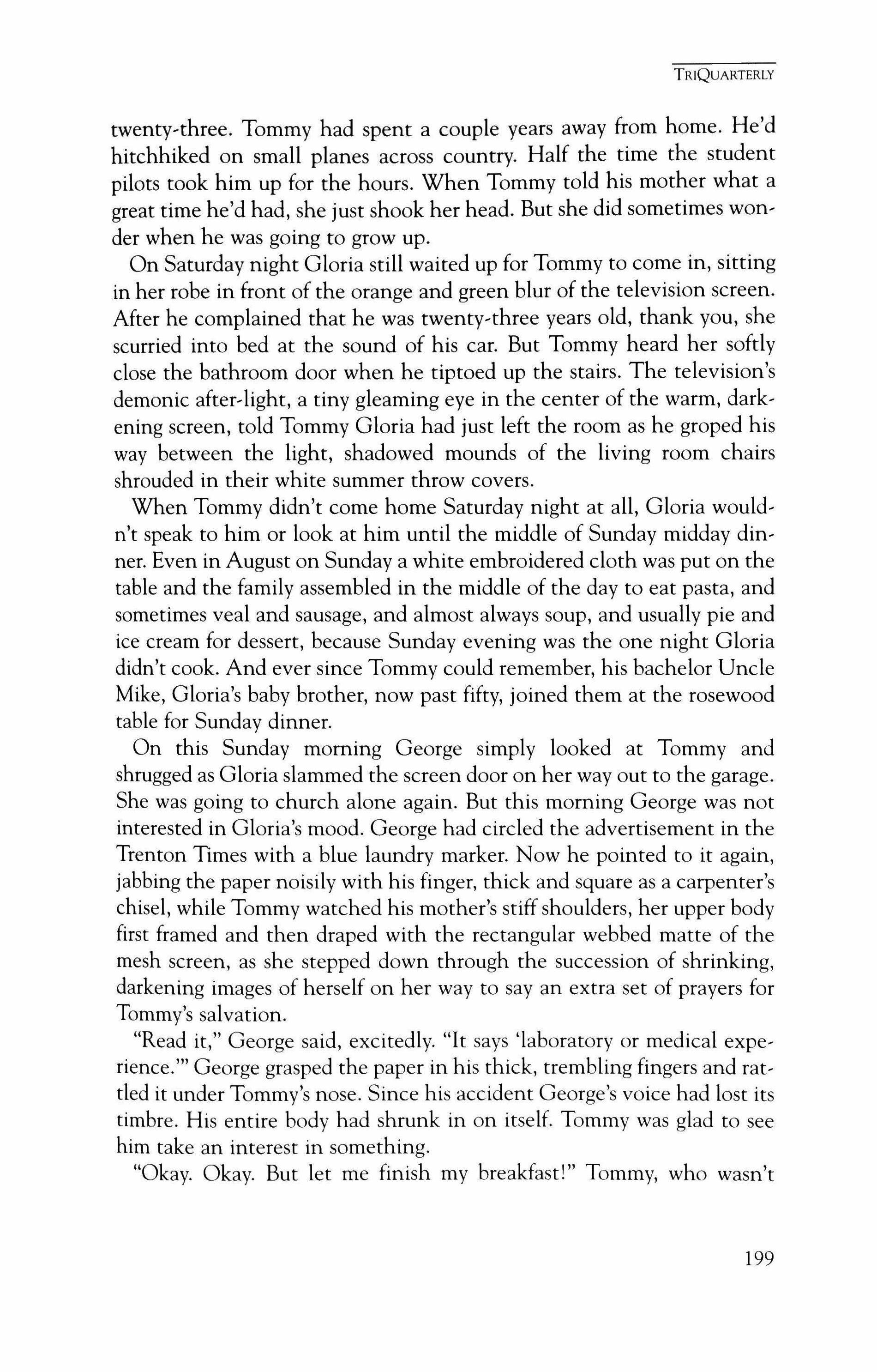
twenty-three. Tommy had spent a couple years away from home. He'd hitchhiked on small planes across country. Half the time the student pilots took him up for the hours. When Tommy told his mother what a great time he'd had, she just shook her head. But she did sometimes wonder when he was going to grow up.
On Saturday night Gloria still waited up for Tommy to come in, sitting in her robe in front of the orange and green blur of the television screen. After he complained that he was twenty-three years old, thank you, she scurried into bed at the sound of his car. But Tommy heard her softly close the bathroom door when he tiptoed up the stairs. The television's demonic after-light, a tiny gleaming eye in the center of the warm, darkening screen, told Tommy Gloria had just left the room as he groped his way between the light, shadowed mounds of the living room chairs shrouded in their white summer throw covers.
When Tommy didn't come home Saturday night at all, Gloria wouldn't speak to him or look at him until the middle of Sunday midday dinnero Even in August on Sunday a white embroidered cloth was put on the table and the family assembled in the middle of the day to eat pasta, and sometimes veal and sausage, and almost always soup, and usually pie and ice cream for dessert, because Sunday evening was the one night Gloria didn't cook. And ever since Tommy could remember, his bachelor Uncle Mike, Gloria's baby brother, now past fifty, joined them at the rosewood table for Sunday dinner.
On this Sunday morning George simply looked at Tommy and shrugged as Gloria slammed the screen door on her way out to the garage. She was going to church alone again. But this morning George was not interested in Gloria's mood. George had circled the advertisement in the Trenton Times with a blue laundry marker. Now he pointed to it again, jabbing the paper noisily with his finger, thick and square as a carpenter's chisel, while Tommy watched his mother's stiff shoulders, her upper body first framed and then draped with the rectangular webbed matte of the mesh screen, as she stepped down through the succession of shrinking, darkening images of herself on her way to sayan extra set of prayers for Tommy's salvation.
"Read it," George said, excitedly. "It says 'laboratory or medical experience.'" George grasped the paper in his thick, trembling fingers and rattled it under Tommy's nose. Since his accident George's voice had lost its timbre. His entire body had shrunk in on itself. Tommy was glad to see him take an interest in something.
"Okay. Okay. But let me finish my breakfast!" Tommy, who wasn't
TRIQUARTERLY
199
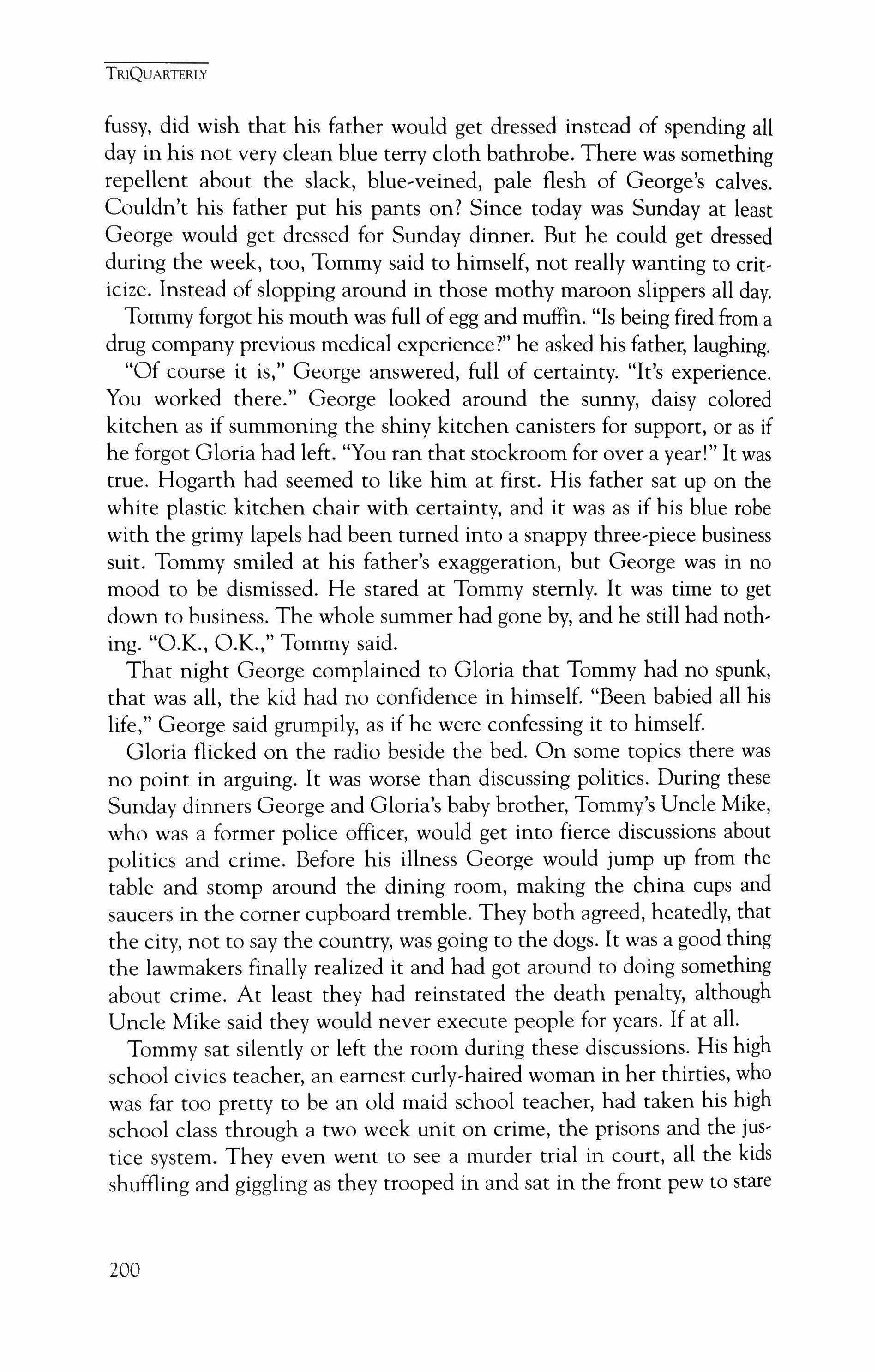
TRIQUARTERLY
fussy, did wish that his father would get dressed instead of spending all day in his not very clean blue terry cloth bathrobe. There was something repellent about the slack, blue-veined, pale flesh of George's calves. Couldn't his father put his pants on? Since today was Sunday at least George would get dressed for Sunday dinner. But he could get dressed during the week, too, Tommy said to himself, not really wanting to criticize. Instead of slopping around in those mothy maroon slippers all day. Tommy forgot his mouth was full of egg and muffin. "Is being fired from a drug company previous medical experience?" he asked his father, laughing.
"Of course it is," George answered, full of certainty. "It's experience. You worked there." George looked around the sunny, daisy colored kitchen as if summoning the shiny kitchen canisters for support, or as if he forgot Gloria had left. "You ran that stockroom for over a year!" It was true. Hogarth had seemed to like him at first. His father sat up on the white plastic kitchen chair with certainty, and it was as if his blue robe with the grimy lapels had been turned into a snappy three-piece business suit. Tommy smiled at his father's exaggeration, but George was in no mood to be dismissed. He stared at Tommy sternly. It was time to get down to business. The whole summer had gone by, and he still had nothing. "O.K., O.K.," Tommy said.
That night George complained to Gloria that Tommy had no spunk, that was all, the kid had no confidence in himself. "Been babied all his life," George said grumpily, as if he were confessing it to himself.
Gloria flicked on the radio beside the bed. On some topics there was no point in arguing. It was worse than discussing politics. During these Sunday dinners George and Gloria's baby brother, Tommy's Uncle Mike, who was a former police officer, would get into fierce discussions about politics and crime. Before his illness George would jump up from the table and stomp around the dining room, making the china cups and saucers in the corner cupboard tremble. They both agreed, heatedly, that the city, not to say the country, was going to the dogs. It was a good thing the lawmakers finally realized it and had got around to doing something about crime. At least they had reinstated the death penalty, although Uncle Mike said they would never execute people for years. If at all.
Tommy sat silently or left the room during these discussions. His high school civics teacher, an earnest curly-haired woman in her thirties, who was far too pretty to be an old maid school teacher, had taken his high school class through a two week unit on crime, the prisons and the justice system. They even went to see a murder trial in court, all the kids shuffling and giggling as they trooped in and sat in the front pew to stare
200
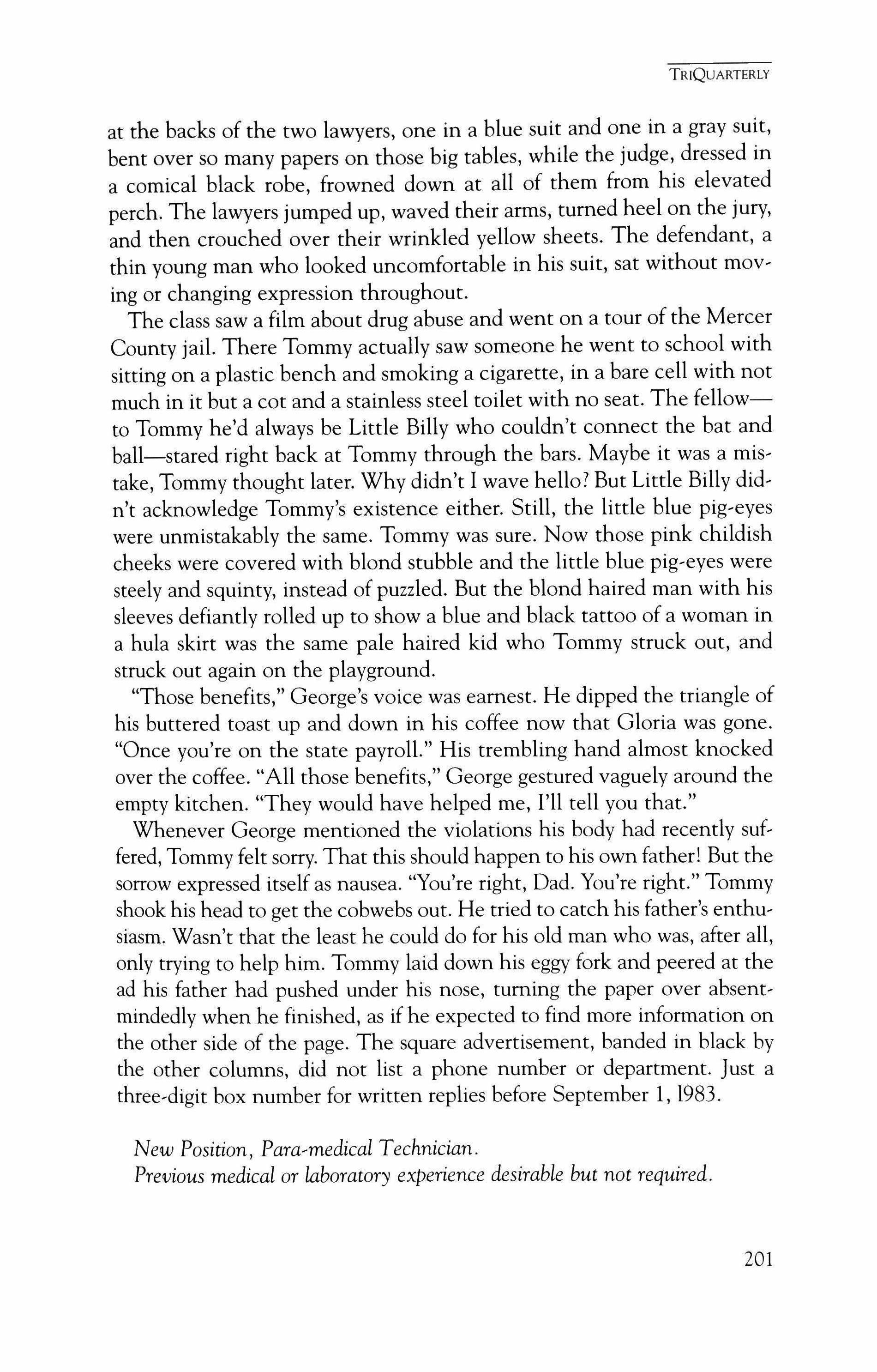
at the backs of the two lawyers, one in a blue suit and one in a gray suit, bent over so many papers on those big tables, while the judge, dressed in a comical black robe, frowned down at all of them from his elevated perch. The lawyers jumped up, waved their arms, turned heel on the jury, and then crouched over their wrinkled yellow sheets. The defendant, a thin young man who looked uncomfortable in his suit, sat without moving or changing expression throughout.
The class saw a film about drug abuse and went on a tour of the Mercer County jail. There Tommy actually saw someone he went to school with sitting on a plastic bench and smoking a cigarette, in a bare cell with not much in it but a cot and a stainless steel toilet with no seat. The fellowto Tommy he'd always be Little Billy who couldn't connect the bat and ball-stared right back at Tommy through the bars. Maybe it was a mistake, Tommy thought later. Why didn't I wave hello? But Little Billy didn't acknowledge Tommy's existence either. Still, the little blue pig-eyes were unmistakably the same. Tommy was sure. Now those pink childish cheeks were covered with blond stubble and the little blue pig-eyes were steely and squinty, instead of puzzled. But the blond haired man with his sleeves defiantly rolled up to show a blue and black tattoo of a woman in a hula skirt was the same pale haired kid who Tommy struck out, and struck out again on the playground.
"Those benefits," George's voice was earnest. He dipped the triangle of his buttered toast up and down in his coffee now that Gloria was gone. "Once you're on the state payroll." His trembling hand almost knocked over the coffee. "All those benefits," George gestured vaguely around the empty kitchen. "They would have helped me, I'll tell you that."
Whenever George mentioned the violations his body had recently suffered, Tommy felt sorry. That this should happen to his own father! But the sorrow expressed itself as nausea. "You're right, Dad. You're right." Tommy shook his head to get the cobwebs out. He tried to catch his father's enthusiasm. Wasn't that the least he could do for his old man who was, after all, only trying to help him. Tommy laid down his eggy fork and peered at the ad his father had pushed under his nose, turning the paper over absentmindedly when he finished, as if he expected to find more information on the other side of the page. The square advertisement, banded in black by the other columns, did not list a phone number or department. Just a three-digit box number for written replies before September I, 1983.
New Position, Para-medical Technician.
Previous medical or laboratory experience desirable but not required.
TRIQUARTERLY
201
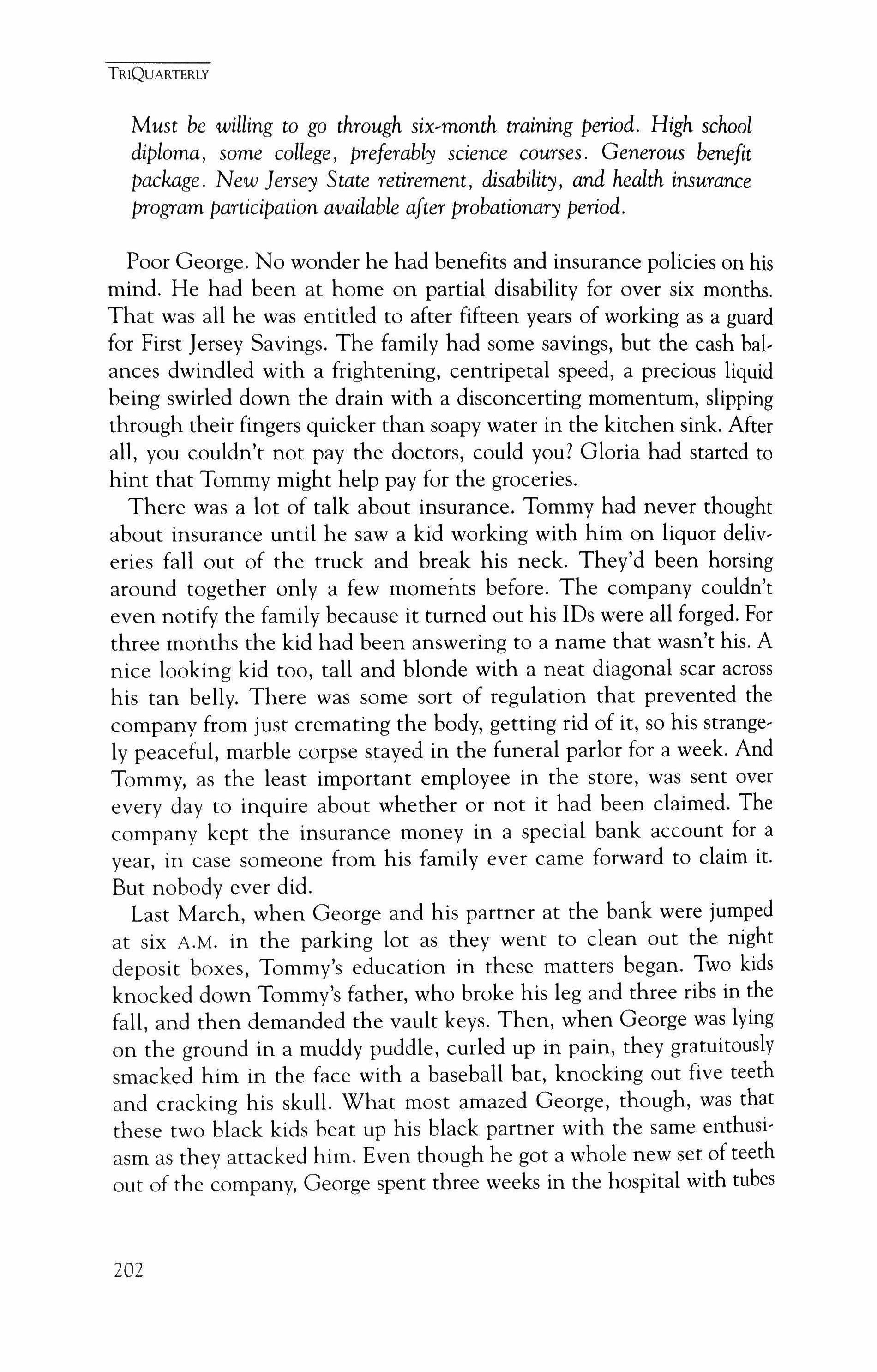
TRIQUARTERLY
Must be willing to go through six�month training period. High school diploma, some college, preferably science courses. Generous benefit package. New Jersey S tate retirement, disability, and health insurance program participation available after probationary period.
Poor George. No wonder he had benefits and insurance policies on his mind. He had been at home on partial disability for over six months. That was all he was entitled to after fifteen years of working as a guard for First Jersey Savings. The family had some savings, but the cash balances dwindled with a frightening, centripetal speed, a precious liquid being swirled down the drain with a disconcerting momentum, slipping through their fingers quicker than soapy water in the kitchen sink. After all, you couldn't not pay the doctors, could you? Gloria had started to hint that Tommy might help pay for the groceries.
There was a lot of talk about insurance. Tommy had never thought about insurance until he saw a kid working with him on liquor deliveries fall out of the truck and break his neck. They'd been horsing around together only a few moments before. The company couldn't even notify the family because it turned out his lOs were all forged. For three months the kid had been answering to a name that wasn't his. A nice looking kid too, tall and blonde with a neat diagonal scar across his tan belly. There was some sort of regulation that prevented the company from just cremating the body, getting rid of it, so his strangely peaceful, marble corpse stayed in the funeral parlor for a week. And Tommy, as the least important employee in the store, was sent over every day to inquire about whether or not it had been claimed. The company kept the insurance money in a special bank account for a year, in case someone from his family ever came forward to claim it. But nobody ever did.
Last March, when George and his partner at the bank were jumped at six A.M. in the parking lot as they went to clean out the night deposit boxes, Tommy's education in these matters began. Two kids knocked down Tommy's father, who broke his leg and three ribs in the fall, and then demanded the vault keys. Then, when George was lying on the ground in a muddy puddle, curled up in pain, they gratuitously smacked him in the face with a baseball bat, knocking out five teeth and cracking his skull. What most amazed George, though, was that these two black kids beat up his black partner with the same enthusiasm as they attacked him. Even though he got a whole new set of teeth out of the company, George spent three weeks in the hospital with tubes
202
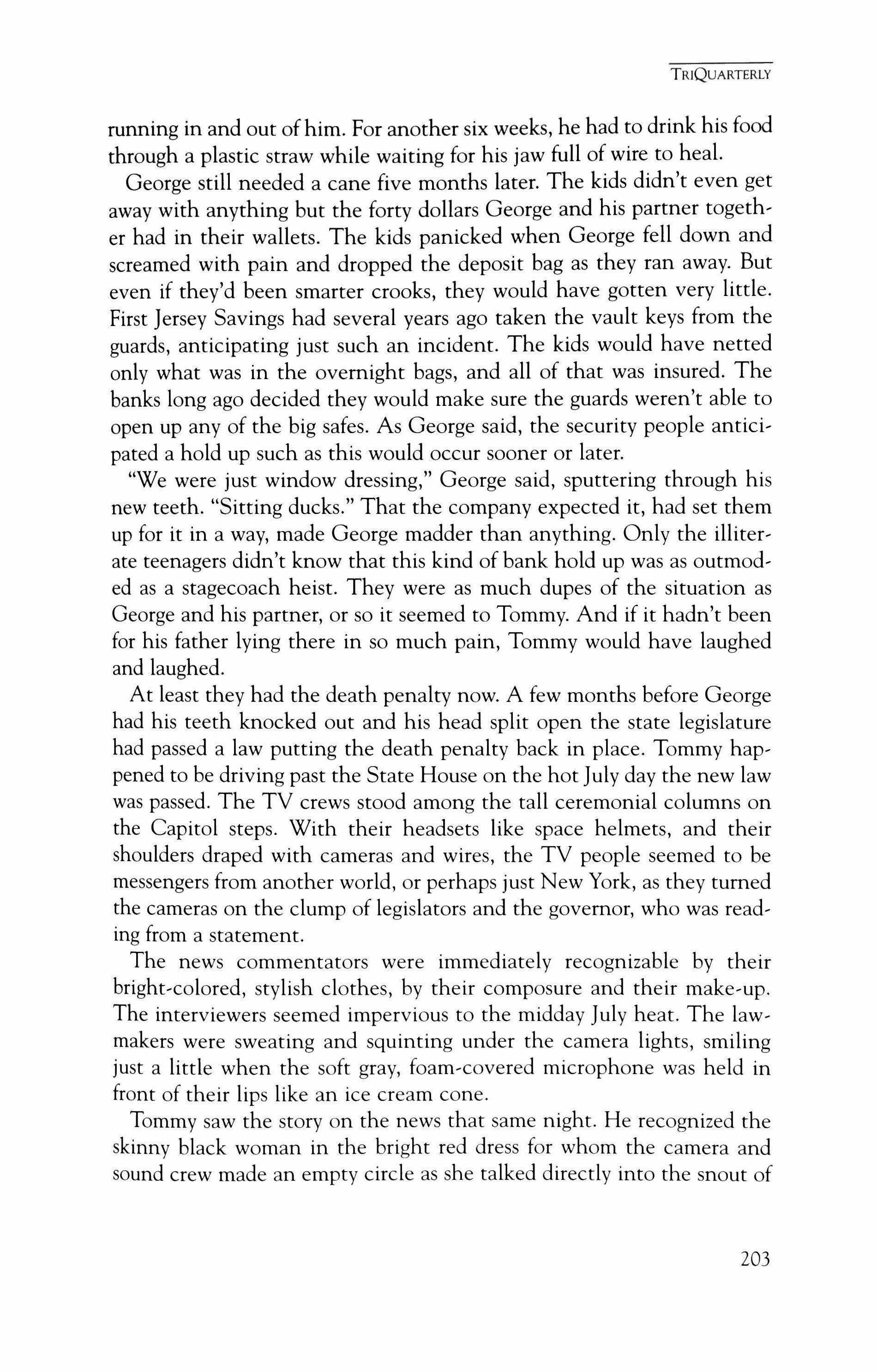
running in and out ofhim. For another six weeks, he had to drink his food through a plastic straw while waiting for his jaw full of wire to heal.
George still needed a cane five months later. The kids didn't even get away with anything but the forty dollars George and his partner together had in their wallets. The kids panicked when George fell down and screamed with pain and dropped the deposit bag as they ran away. But even if they'd been smarter crooks, they would have gotten very little. First Jersey Savings had several years ago taken the vault keys from the guards, anticipating just such an incident. The kids would have netted only what was in the overnight bags, and all of that was insured. The banks long ago decided they would make sure the guards weren't able to open up any of the big safes. As George said, the security people anticipated a hold up such as this would occur sooner or later.
"We were just window dressing," George said, sputtering through his new teeth. "Sitting ducks." That the company expected it, had set them up for it in a way, made George madder than anything. Only the illiterate teenagers didn't know that this kind of bank hold up was as outmoded as a stagecoach heist. They were as much dupes of the situation as George and his partner, or so it seemed to Tommy. And if it hadn't been for his father lying there in so much pain, Tommy would have laughed and laughed.
At least they had the death penalty now. A few months before George had his teeth knocked out and his head split open the state legislature had passed a law putting the death penalty back in place. Tommy happened to be driving past the State House on the hot July day the new law was passed. The TV crews stood among the tall ceremonial columns on the Capitol steps. With their headsets like space helmets, and their shoulders draped with cameras and wires, the TV people seemed to be messengers from another world, or perhaps just New York, as they turned the cameras on the clump of legislators and the governor, who was reading from a statement.
The news commentators were immediately recognizable by their bright-colored, stylish clothes, by their composure and their make-up. The interviewers seemed impervious to the midday July heat. The lawmakers were sweating and squinting under the camera lights, smiling just a little when the soft gray, foam-covered microphone was held in front of their lips like an ice cream cone.
Tommy saw the story on the news that same night. He recognized the skinny black woman in the bright red dress for whom the camera and sound crew made an empty circle as she talked directly into the snout of
TRIQUARTERLY
203
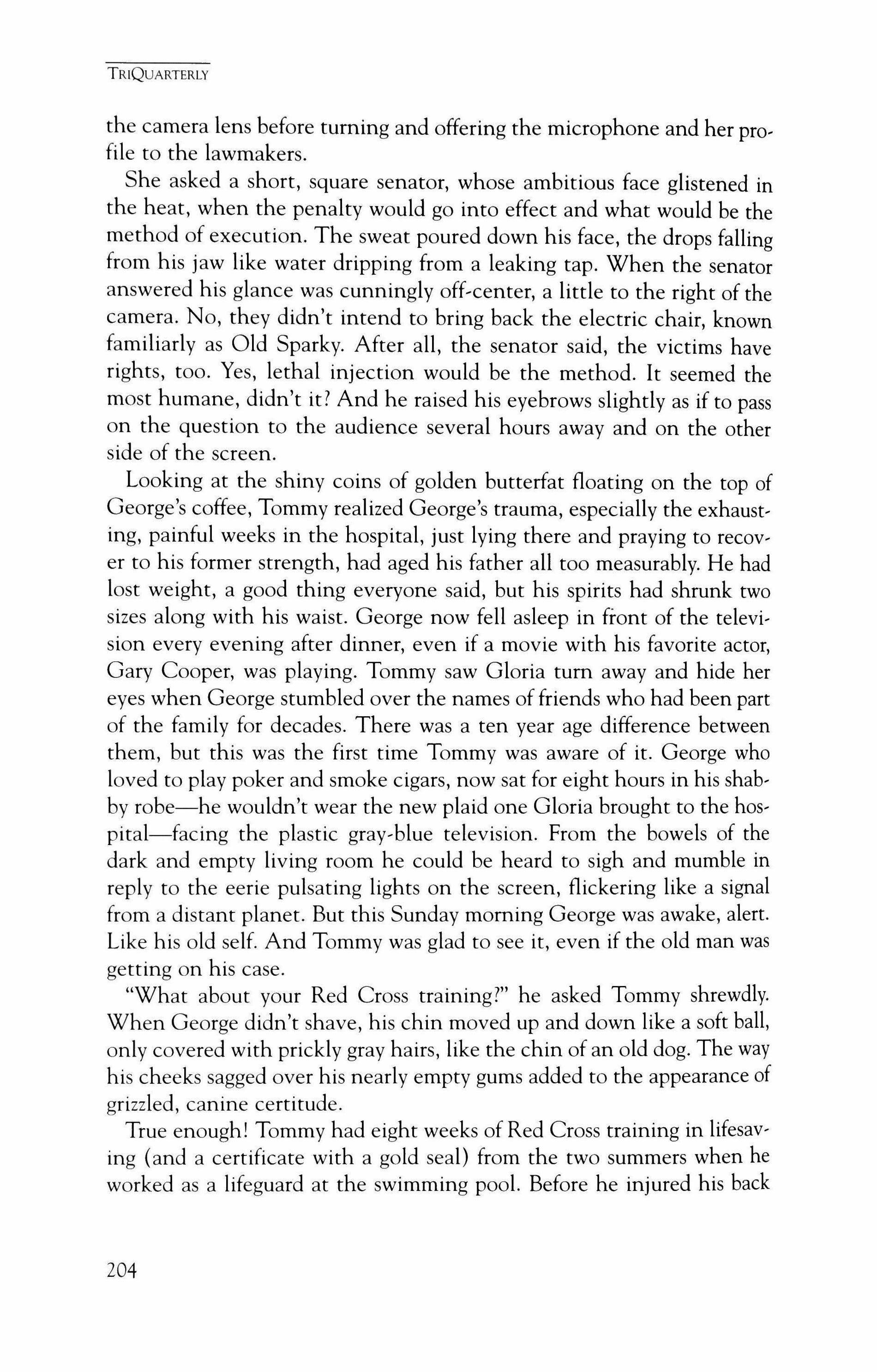
TRIQUARTERLY
the camera lens before turning and offering the microphone and her profile to the lawmakers.
She asked a short, square senator, whose ambitious face glistened in the heat, when the penalty would go into effect and what would be the method of execution. The sweat poured down his face, the drops falling from his jaw like water dripping from a leaking tap. When the senator answered his glance was cunningly off-center, a little to the right of the camera. No, they didn't intend to bring back the electric chair, known familiarly as Old Sparky. After all, the senator said, the victims have rights, too. Yes, lethal injection would be the method. It seemed the most humane, didn't it? And he raised his eyebrows slightly as if to pass on the question to the audience several hours away and on the other side of the screen.
Looking at the shiny coins of golden butterfat floating on the top of George's coffee, Tommy realized George's trauma, especially the exhausting, painful weeks in the hospital, just lying there and praying to recover to his former strength, had aged his father all too measurably. He had lost weight, a good thing everyone said, but his spirits had shrunk two sizes along with his waist. George now fell asleep in front of the television every evening after dinner, even if a movie with his favorite actor, Gary Cooper, was playing. Tommy saw Gloria tum away and hide her eyes when George stumbled over the names of friends who had been part of the family for decades. There was a ten year age difference between them, but this was the first time Tommy was aware of it. George who loved to play poker and smoke cigars, now sat for eight hours in his shabby robe-he wouldn't wear the new plaid one Gloria brought to the hospital-facing the plastic gray-blue television. From the bowels of the dark and empty living room he could be heard to sigh and mumble in reply to the eerie pulsating lights on the screen, flickering like a signal from a distant planet. But this Sunday morning George was awake, alert. Like his old self. And Tommy was glad to see it, even if the old man was getting on his case.
"What about your Red Cross training?" he asked Tommy shrewdly. When George didn't shave, his chin moved up and down like a soft ball, only covered with prickly gray hairs, like the chin of an old dog. The way his cheeks sagged over his nearly empty gums added to the appearance of grizzled, canine certitude.
True enough! Tommy had eight weeks of Red Cross training in lifesaving (and a certificate with a gold seal) from the two summers when he worked as a lifeguard at the swimming pool. Before he injured his back
204
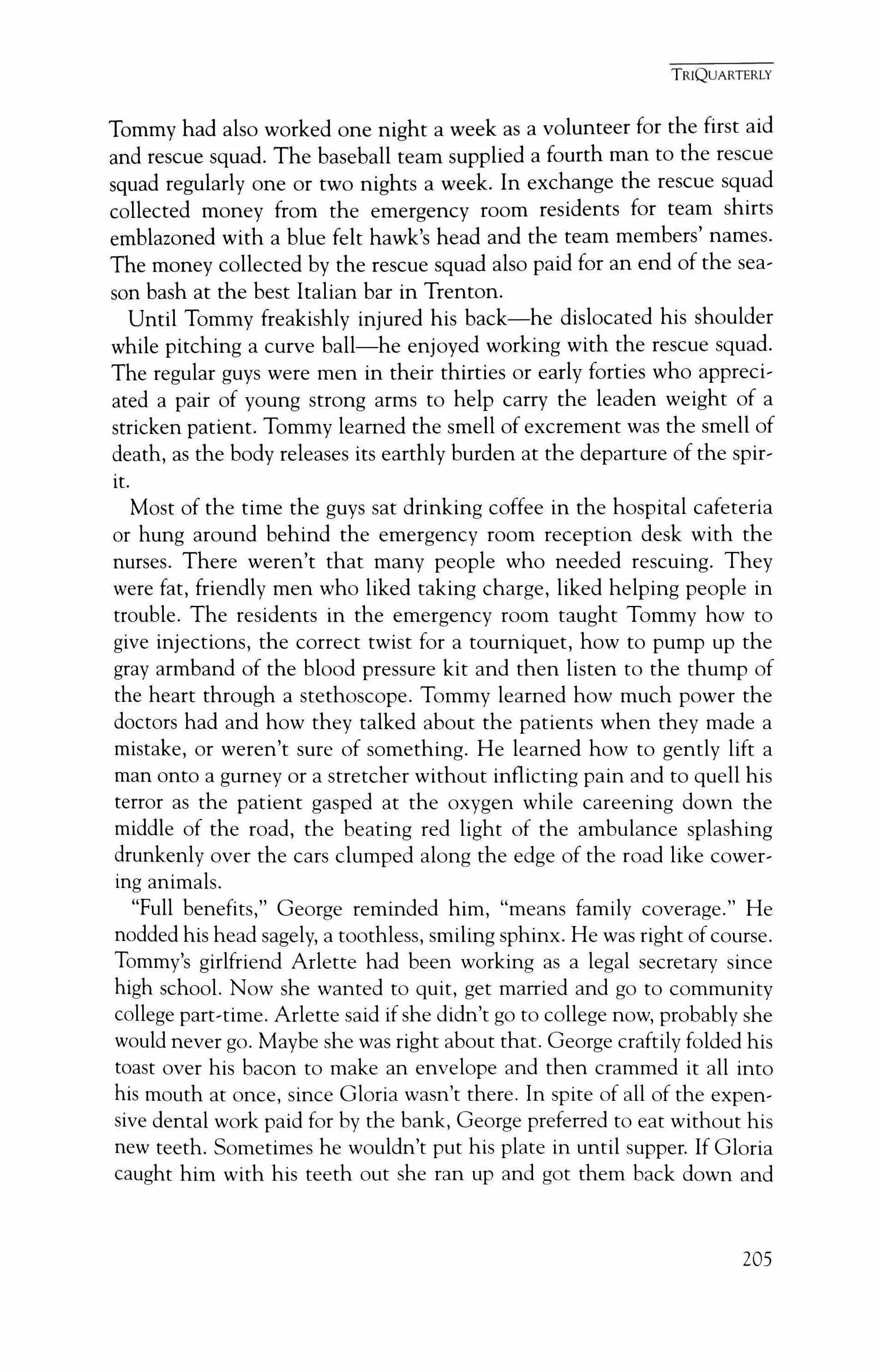
Tommy had also worked one night a week as a volunteer for the first aid and rescue squad. The baseball team supplied a fourth man to the rescue squad regularly one or two nights a week. In exchange the rescue squad collected money from the emergency room residents for team shirts emblazoned with a blue felt hawk's head and the team members' names. The money collected by the rescue squad also paid for an end of the season bash at the best Italian bar in Trenton.
Until Tommy freakishly injured his back-he dislocated his shoulder while pitching a curve ball-he enjoyed working with the rescue squad. The regular guys were men in their thirties or early forties who appreciated a pair of young strong arms to help carry the leaden weight of a stricken patient. Tommy learned the smell of excrement was the smell of death, as the body releases its earthly burden at the departure of the spirit.
Most of the time the guys sat drinking coffee in the hospital cafeteria or hung around behind the emergency room reception desk with the nurses. There weren't that many people who needed rescuing. They were fat, friendly men who liked taking charge, liked helping people in trouble. The residents in the emergency room taught Tommy how to give injections, the correct twist for a tourniquet, how to pump up the gray armband of the blood pressure kit and then listen to the thump of the heart through a stethoscope. Tommy learned how much power the doctors had and how they talked about the patients when they made a mistake, or weren't sure of something. He learned how to gently lift a man onto a gurney or a stretcher without inflicting pain and to quell his terror as the patient gasped at the oxygen while careening down the middle of the road, the beating red light of the ambulance splashing drunkenly over the cars clumped along the edge of the road like cowering animals.
"Full benefits," George reminded him, "means family coverage." He nodded his head sagely, a toothless, smiling sphinx. He was right of course. Tommy's girlfriend Arlette had been working as a legal secretary since high school. Now she wanted to quit, get married and go to community college part-time. Arlette said if she didn't go to college now, probably she would never go. Maybe she was right about that. George craftily folded his toast over his bacon to make an envelope and then crammed it all into his mouth at once, since Gloria wasn't there. In spite of all of the expensive dental work paid for by the bank, George preferred to eat without his new teeth. Sometimes he wouldn't put his plate in until supper. If Gloria caught him with his teeth out she ran up and got them back down and
TRIQUARTERLY
205
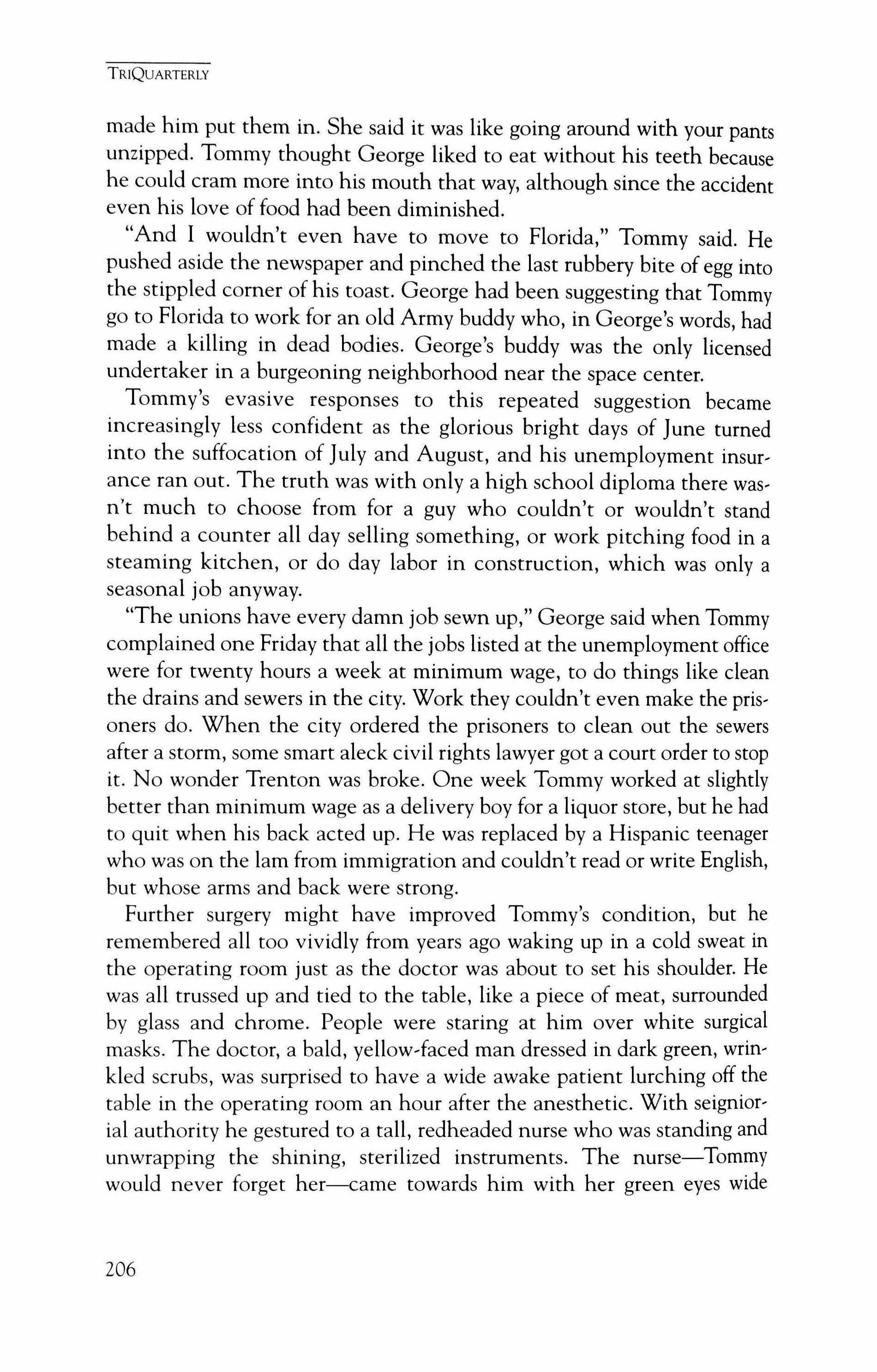
TRIQUARTERLY
made him put them in. She said it was like going around with your pants unzipped. Tommy thought George liked to eat without his teeth because he could cram more into his mouth that way, although since the accident even his love of food had been diminished.
"And I wouldn't even have to move to Florida," Tommy said. He pushed aside the newspaper and pinched the last rubbery bite of egg into the stippled comer of his toast. George had been suggesting that Tommy go to Florida to work for an old Army buddy who, in George's words, had made a killing in dead bodies. George's buddy was the only licensed undertaker in a burgeoning neighborhood near the space center.
Tommy's evasive responses to this repeated suggestion became increasingly less confident as the glorious bright days of June turned into the suffocation of July and August, and his unemployment insurance ran out. The truth was with only a high school diploma there wasn't much to choose from for a guy who couldn't or wouldn't stand behind a counter all day selling something, or work pitching food in a steaming kitchen, or do day labor in construction, which was only a seasonal job anyway.
"The unions have every damn job sewn up," George said when Tommy complained one Friday that all the jobs listed at the unemployment office were for twenty hours a week at minimum wage, to do things like clean the drains and sewers in the city. Work they couldn't even make the prisoners do. When the city ordered the prisoners to clean out the sewers after a storm, some smart aleck civil rights lawyer got a court order to stop it. No wonder Trenton was broke. One week Tommy worked at slightly better than minimum wage as a delivery boy for a liquor store, but he had to quit when his back acted up. He was replaced by a Hispanic teenager who was on the lam from immigration and couldn't read or write English, but whose arms and back were strong.
Further surgery might have improved Tommy's condition, but he remembered all too vividly from years ago waking up in a cold sweat in the operating room just as the doctor was about to set his shoulder. He was all trussed up and tied to the table, like a piece of meat, surrounded by glass and chrome. People were staring at him over white surgical masks. The doctor, a bald, yellow-faced man dressed in dark green, wrinkled scrubs, was surprised to have a wide awake patient lurching off the table in the operating room an hour after the anesthetic. With seigniorial authority he gestured to a tall, redheaded nurse who was standing and unwrapping the shining, sterilized instruments. The nurse-Tommy would never forget her-came towards him with her green eyes wide
206
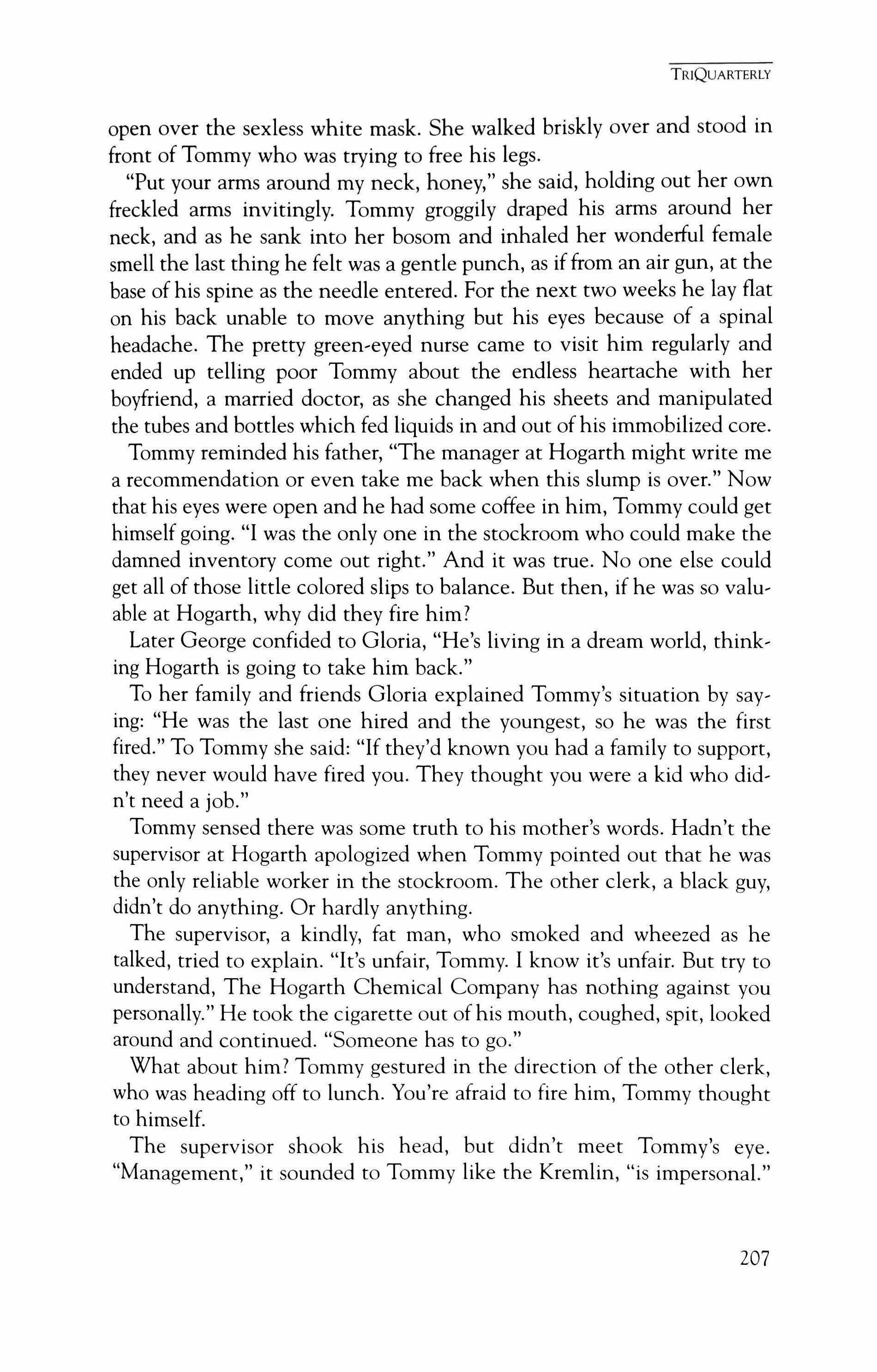
open over the sexless white mask. She walked briskly over and stood in front of Tommy who was trying to free his legs.
"Put your arms around my neck, honey," she said, holding out her own freckled arms invitingly. Tommy groggily draped his arms around her neck, and as he sank into her bosom and inhaled her wonderful female smell the last thing he felt was a gentle punch, as if from an air gun, at the base of his spine as the needle entered. For the next two weeks he lay flat on his back unable to move anything but his eyes because of a spinal headache. The pretty green-eyed nurse came to visit him regularly and ended up telling poor Tommy about the endless heartache with her boyfriend, a married doctor, as she changed his sheets and manipulated the tubes and bottles which fed liquids in and out of his immobilized core.
Tommy reminded his father, "The manager at Hogarth might write me a recommendation or even take me back when this slump is over." Now that his eyes were open and he had some coffee in him, Tommy could get himself going. "I was the only one in the stockroom who could make the damned inventory come out right." And it was true. No one else could get all of those little colored slips to balance. But then, if he was so valuable at Hogarth, why did they fire him?
Later George confided to Gloria, "He's living in a dream world, thinking Hogarth is going to take him back."
To her family and friends Gloria explained Tommy's situation by saying: "He was the last one hired and the youngest, so he was the first fired." To Tommy she said: "If they'd known you had a family to support, they never would have fired you. They thought you were a kid who didn't need a job."
Tommy sensed there was some truth to his mother's words. Hadn't the supervisor at Hogarth apologized when Tommy pointed out that he was the only reliable worker in the stockroom. The other clerk, a black guy, didn't do anything. Or hardly anything.
The supervisor, a kindly, fat man, who smoked and wheezed as he talked, tried to explain. "It's unfair, Tommy. I know it's unfair. But try to understand, The Hogarth Chemical Company has nothing against you personally." He took the cigarette out of his mouth, coughed, spit, looked around and continued. "Someone has to go."
What about him? Tommy gestured in the direction of the other clerk, who was heading off to lunch. You're afraid to fire him, Tommy thought to himself.
The supervisor shook his head, but didn't meet Tommy's eye. "Management," it sounded to Tommy like the Kremlin, "is impersonal."
TRIQUARTERLY
207
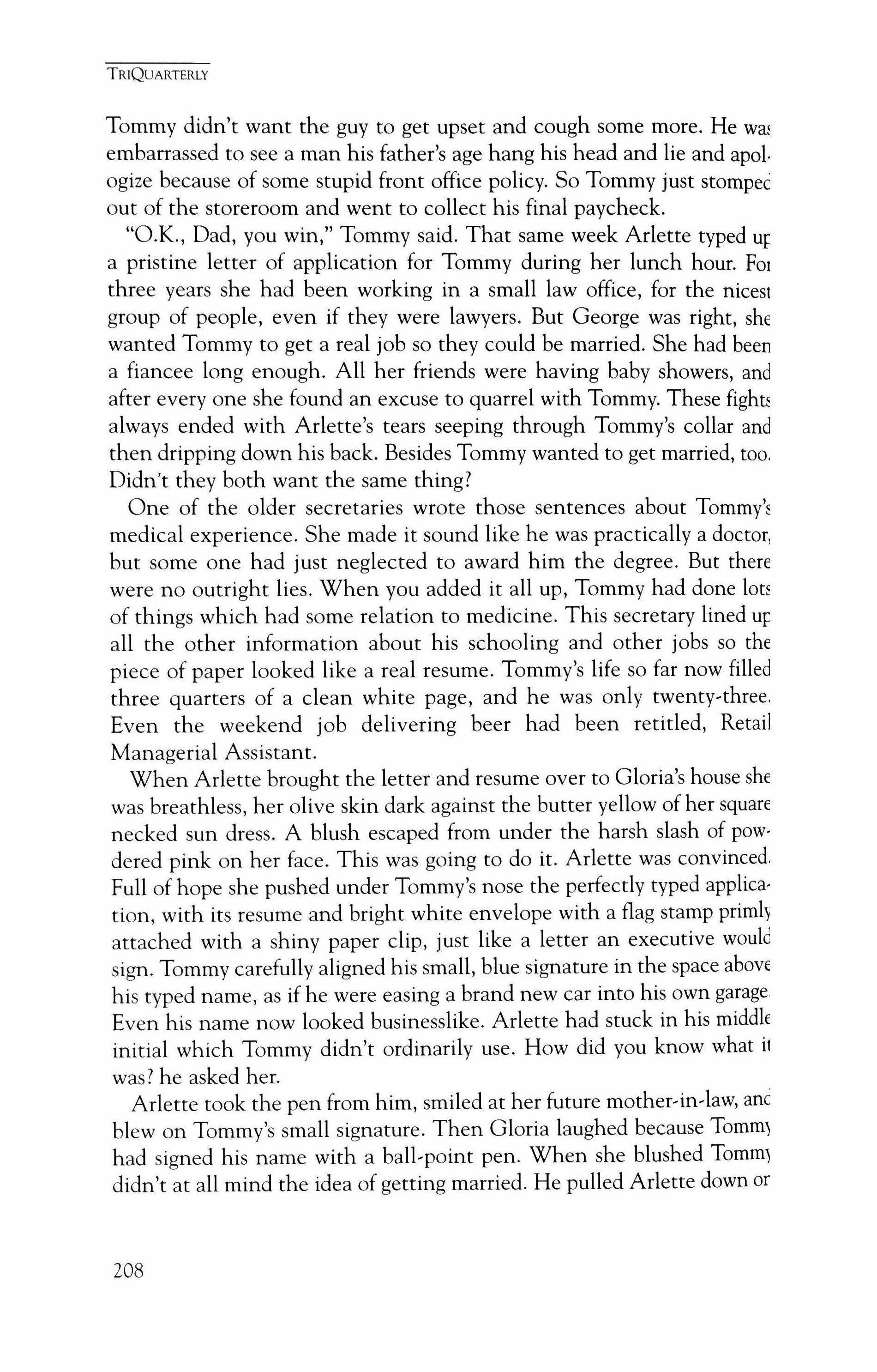
Tommy didn't want the guy to get upset and cough some more. He wa: embarrassed to see a man his father's age hang his head and lie and apol. ogize because of some stupid front office policy. So Tommy just stornpec out of the storeroom and went to collect his final paycheck.
"O.K., Dad, you win," Tommy said. That same week Arlette typed u� a pristine letter of application for Tommy during her lunch hour. FOI three years she had been working in a small law office, for the nicest group of people, even if they were lawyers. But George was right, she wanted Tommy to get a real job so they could be married. She had been a fiancee long enough. All her friends were having baby showers, and after everyone she found an excuse to quarrel with Tommy. These fight, always ended with Arlette's tears seeping through Tommy's collar and then dripping down his back. Besides Tommy wanted to get married, too. Didn't they both want the same thing?
One of the older secretaries wrote those sentences about Tommy's medical experience. She made it sound like he was practically a doctor, but some one had just neglected to award him the degree. But there were no outright lies. When you added it all up, Tommy had done Ion of things which had some relation to medicine. This secretary lined up all the other information about his schooling and other jobs so the piece of paper looked like a real resume. Tommy's life so far now filled three quarters of a clean white page, and he was only twenty-three. Even the weekend job delivering beer had been retitled, Retail Managerial Assistant.
When Arlette brought the letter and resume over to Gloria's house she was breathless, her olive skin dark against the butter yellow of her square necked sun dress. A blush escaped from under the harsh slash of powdered pink on her face. This was going to do it. Arlette was convinced. Full of hope she pushed under Tommy's nose the perfectly typed application, with its resume and bright white envelope with a flag stamp primly attached with a shiny paper clip, just like a letter an executive would sign. Tommy carefully aligned his small, blue signature in the space above his typed name, as if he were easing a brand new car into his own garage Even his name now looked businesslike. Arlette had stuck in his middle initial which Tommy didn't ordinarily use. How did you know what it was? he asked her.
Arlette took the pen from him, smiled at her future mother-in-law, anc blew on Tommy's small signature. Then Gloria laughed because Tomm; had signed his name with a ball-point pen. When she blushed Tomrrr, didn't at all mind the idea of getting married. He pulled Arlette down or
TRIQUARTERLY
208
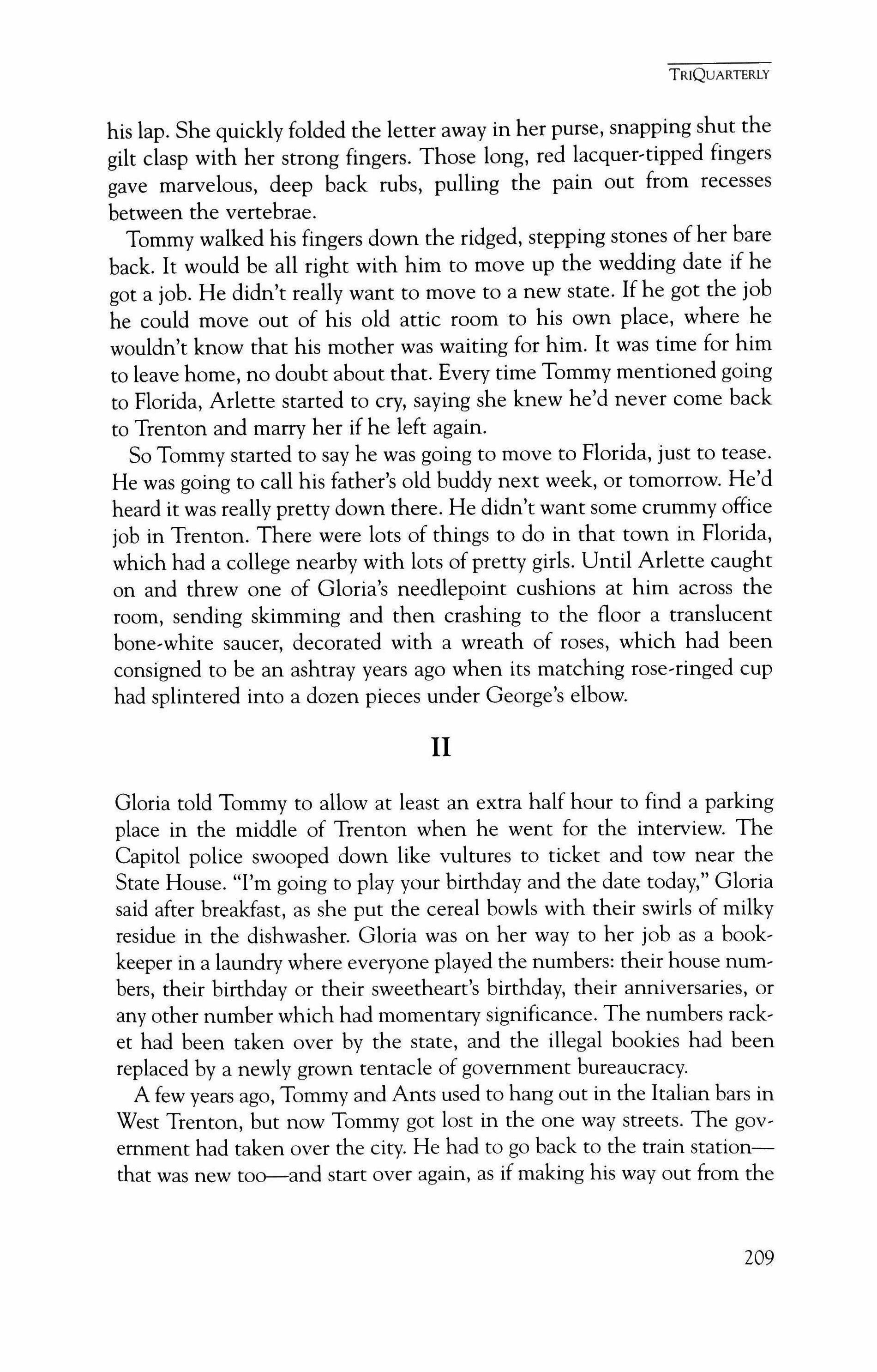
his lap. She quickly folded the letter away in her purse, snapping shut the gilt clasp with her strong fingers. Those long, red lacquer-tipped fingers gave marvelous, deep back rubs, pulling the pain out from recesses between the vertebrae.
Tommy walked his fingers down the ridged, stepping stones of her bare back. It would be all right with him to move up the wedding date if he got a job. He didn't really want to move to a new state. If he got the job he could move out of his old attic room to his own place, where he wouldn't know that his mother was waiting for him. It was time for him to leave home, no doubt about that. Every time Tommy mentioned going to Florida, Arlette started to cry, saying she knew he'd never come back to Trenton and marry her if he left again.
So Tommy started to say he was going to move to Florida, just to tease. He was going to call his father's old buddy next week, or tomorrow. He'd heard it was really pretty down there. He didn't want some crummy office job in Trenton. There were lots of things to do in that town in Florida, which had a college nearby with lots of pretty girls. Until Arlette caught on and threw one of Gloria's needlepoint cushions at him across the room, sending skimming and then crashing to the floor a translucent bone-white saucer, decorated with a wreath of roses, which had been consigned to be an ashtray years ago when its matching rose-ringed cup had splintered into a dozen pieces under George's elbow.
II
Gloria told Tommy to allow at least an extra half hour to find a parking place in the middle of Trenton when he went for the interview. The Capitol police swooped down like vultures to ticket and tow near the State House. "I'm going to play your birthday and the date today," Gloria said after breakfast, as she put the cereal bowls with their swirls of milky residue in the dishwasher. Gloria was on her way to her job as a bookkeeper in a laundry where everyone played the numbers: their house numbers, their birthday or their sweetheart's birthday, their anniversaries, or any other number which had momentary significance. The numbers racket had been taken over by the state, and the illegal bookies had been replaced by a newly grown tentacle of government bureaucracy.
A few years ago, Tommy and Ants used to hang out in the Italian bars in West Trenton, but now Tommy got lost in the one way streets. The government had taken over the city. He had to go back to the train stationthat was new too-s-and start over again, as if making his way out from the
TRIQUARTERLY
209
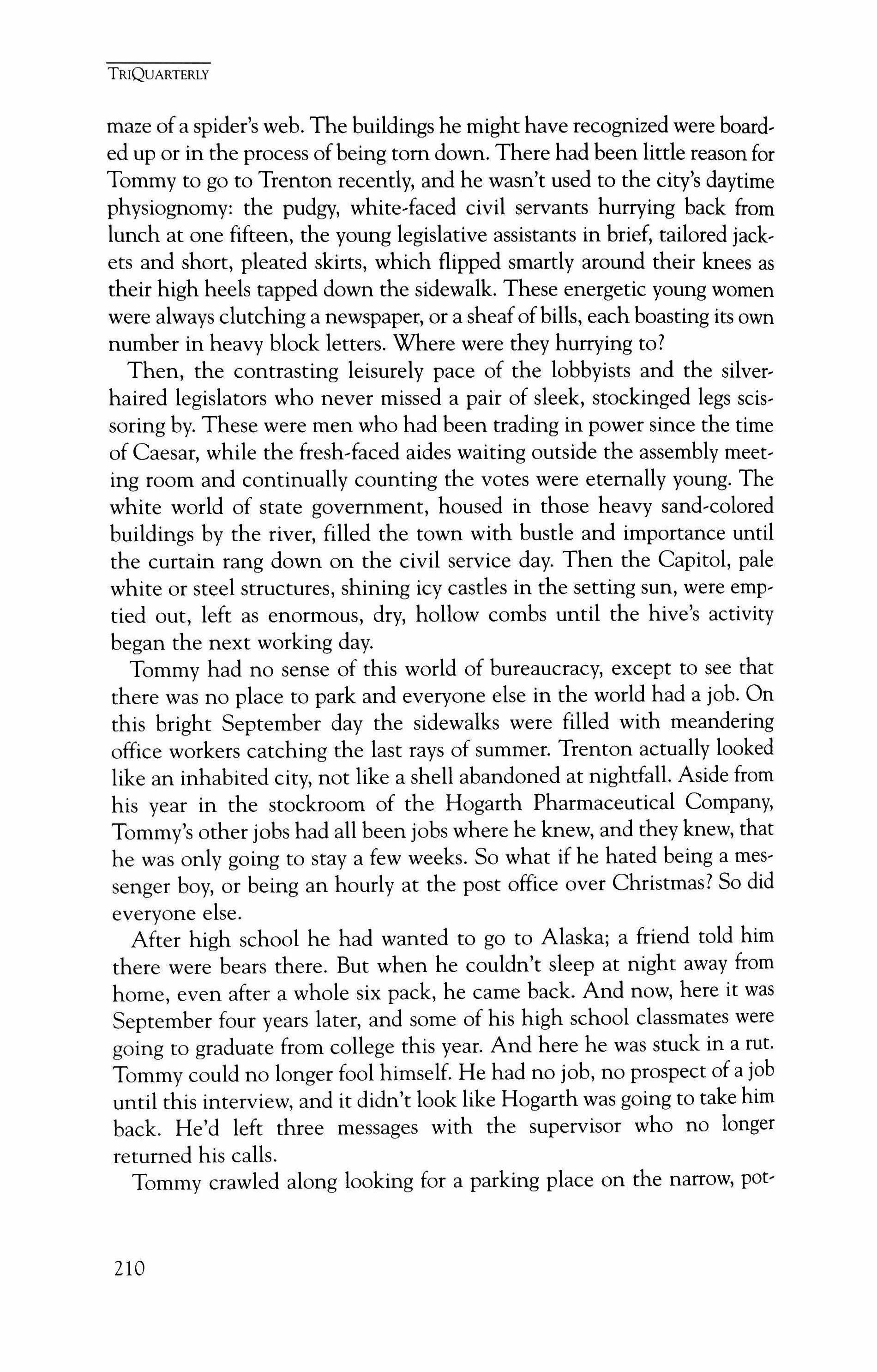
maze of a spider's web. The buildings he might have recognized were boarded up or in the process ofbeing tom down. There had been little reason for Tommy to go to Trenton recently, and he wasn't used to the city's daytime physiognomy: the pudgy, white-faced civil servants hurrying back from lunch at one fifteen, the young legislative assistants in brief, tailored jackets and short, pleated skirts, which flipped smartly around their knees as their high heels tapped down the sidewalk. These energetic young women were always clutching a newspaper, or a sheafofbills, each boasting its own number in heavy block letters. Where were they hurrying to?
Then, the contrasting leisurely pace of the lobbyists and the silverhaired legislators who never missed a pair of sleek, stockinged legs scissoring by. These were men who had been trading in power since the time of Caesar, while the fresh-faced aides waiting outside the assembly meeting room and continually counting the votes were eternally young. The white world of state government, housed in those heavy sand-colored buildings by the river, filled the town with bustle and importance until the curtain rang down on the civil service day. Then the Capitol, pale white or steel structures, shining icy castles in the setting sun, were emptied out, left as enormous, dry, hollow combs until the hive's activity began the next working day.
Tommy had no sense of this world of bureaucracy, except to see that there was no place to park and everyone else in the world had a job. On this bright September day the sidewalks were filled with meandering office workers catching the last rays of summer. Trenton actually looked like an inhabited city, not like a shell abandoned at nightfall. Aside from his year in the stockroom of the Hogarth Pharmaceutical Company, Tommy's other jobs had all been jobs where he knew, and they knew, that he was only going to stay a few weeks. So what if he hated being a messenger boy, or being an hourly at the post office over Christmas? So did everyone else.
After high school he had wanted to go to Alaska; a friend told him there were bears there. But when he couldn't sleep at night away from home, even after a whole six pack, he came back. And now, here it was September four years later, and some of his high school classmates were going to graduate from college this year. And here he was stuck in a rut.
Tommy could no longer fool himself. He had no job, no prospect of a job until this interview, and it didn't look like Hogarth was going to take him back. He'd left three messages with the supervisor who no longer returned his calls.
Tommy crawled along looking for a parking place on the narrow, pot-
TRIQUARTERLY
210
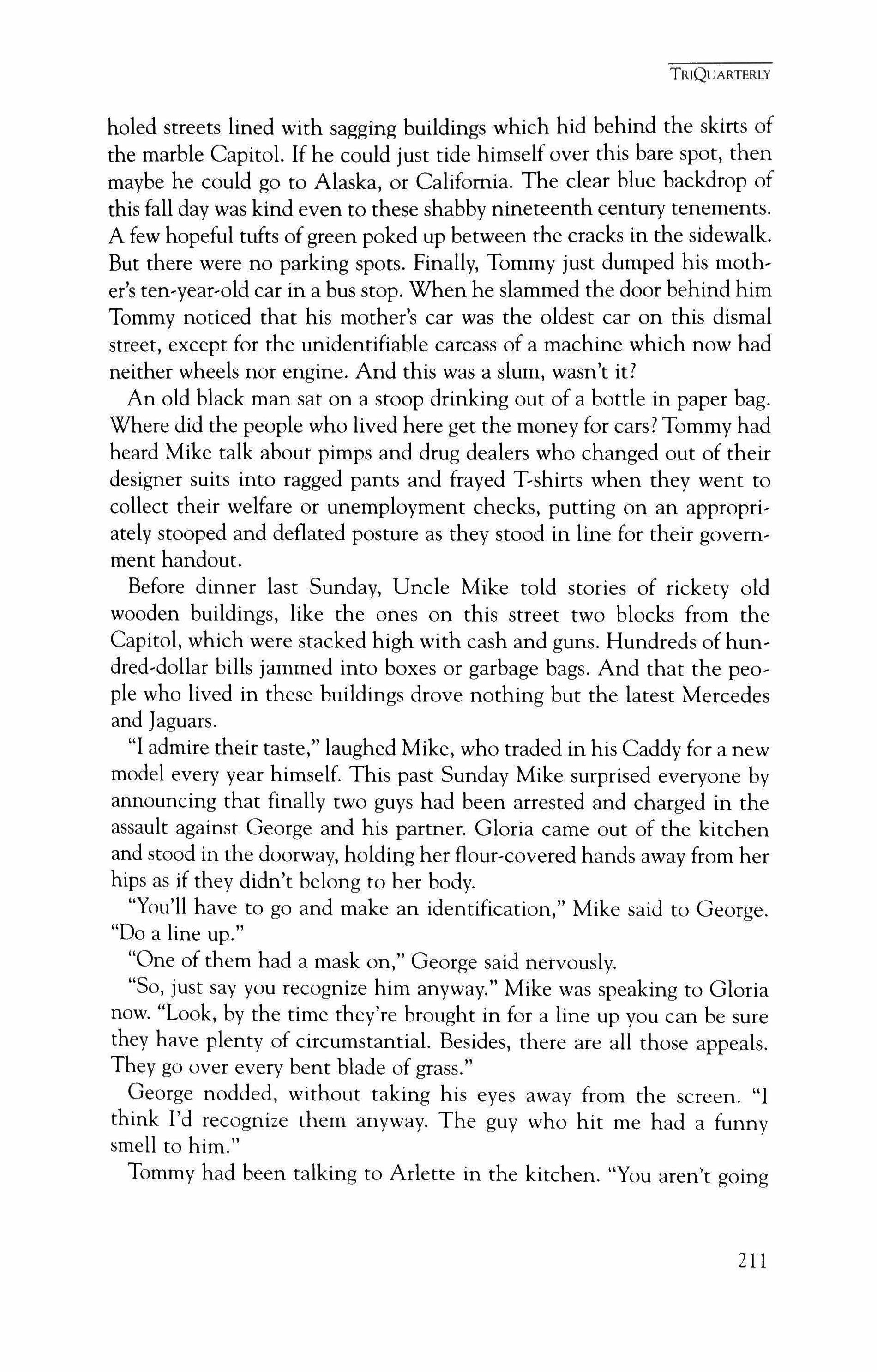
holed streets lined with sagging buildings which hid behind the skirts of the marble Capitol. If he could just tide himself over this bare spot, then maybe he could go to Alaska, or California. The clear blue backdrop of this fall day was kind even to these shabby nineteenth century tenements. A few hopeful tufts of green poked up between the cracks in the sidewalk. But there were no parking spots. Finally, Tommy just dumped his mother's ten-year-old car in a bus stop. When he slammed the door behind him Tommy noticed that his mother's car was the oldest car on this dismal street, except for the unidentifiable carcass of a machine which now had neither wheels nor engine. And this was a slum, wasn't it?
An old black man sat on a stoop drinking out of a bottle in paper bag. Where did the people who lived here get the money for cars? Tommy had heard Mike talk about pimps and drug dealers who changed out of their designer suits into ragged pants and frayed T�shirts when they went to collect their welfare or unemployment checks, putting on an appropriately stooped and deflated posture as they stood in line for their government handout.
Before dinner last Sunday, Uncle Mike told stories of rickety old wooden buildings, like the ones on this street two blocks from the Capitol, which were stacked high with cash and guns. Hundreds of hundred-dollar bills jammed into boxes or garbage bags. And that the people who lived in these buildings drove nothing but the latest Mercedes and Jaguars.
"I admire their taste," laughed Mike, who traded in his Caddy for a new model every year himself. This past Sunday Mike surprised everyone by announcing that finally two guys had been arrested and charged in the assault against George and his partner. Gloria came out of the kitchen and stood in the doorway, holding her flour�covered hands away from her hips as if they didn't belong to her body.
"You'll have to go and make an identification," Mike said to George. "Do a line up."
"One of them had a mask on," George said nervously.
"So, just say you recognize him anyway." Mike was speaking to Gloria now. "Look, by the time they're brought in for a line up you can be sure they have plenty of circumstantial. Besides, there are all those appeals. They go over every bent blade of grass."
George nodded, without taking his eyes away from the screen. "I think I'd recognize them anyway. The guy who hit me had a funny smell to him."
Tommy had been talking to Arlette in the kitchen. "You aren't going
TRIQUARTERLY
211
TRIQUARTERLY
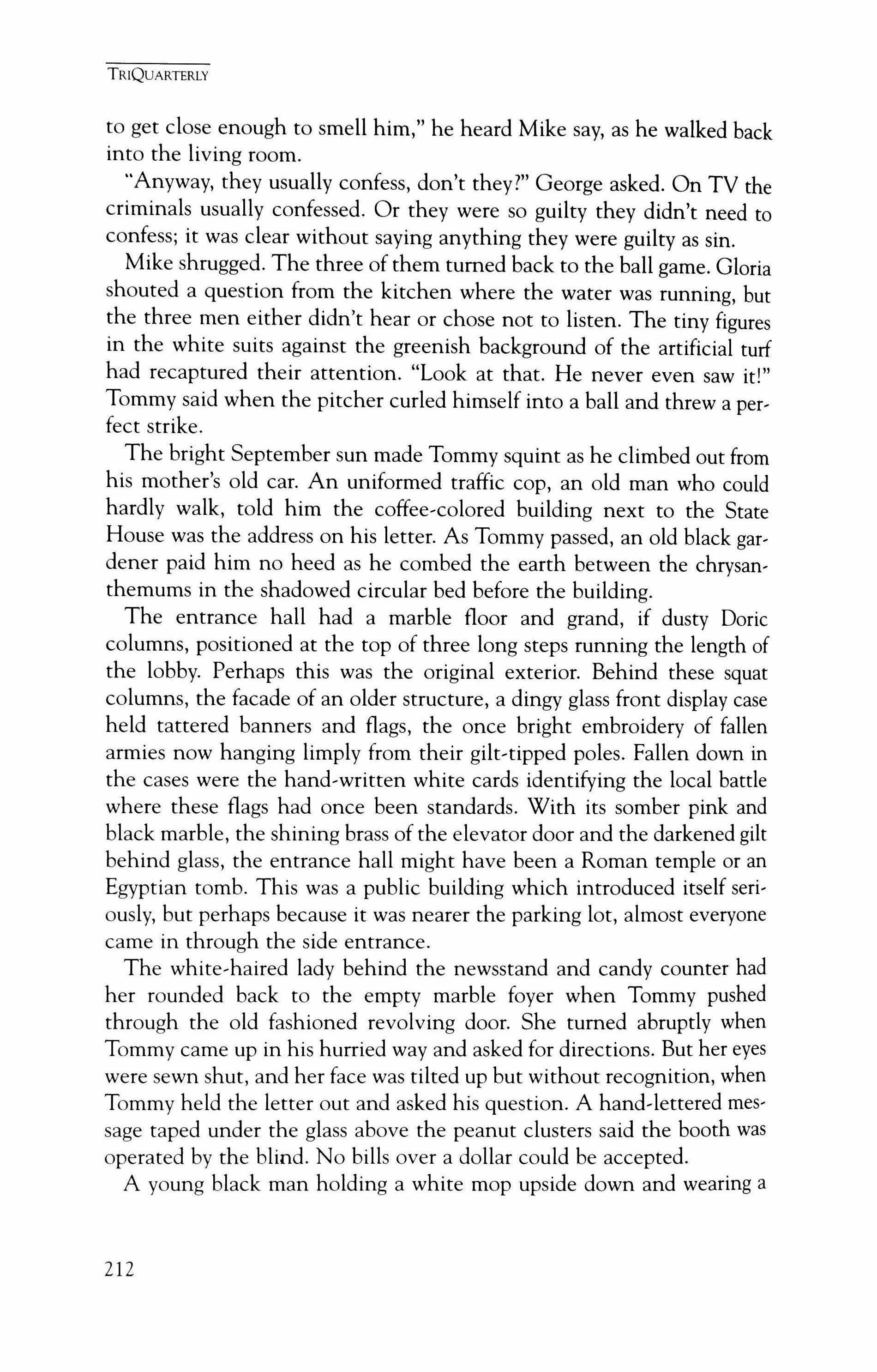
to get close enough to smell him," he heard Mike say, as he walked back into the living room.
"Anyway, they usually confess, don't they?" George asked. On TV the criminals usually confessed. Or they were so guilty they didn't need to confess; it was clear without saying anything they were guilty as sin.
Mike shrugged. The three of them turned back to the ball game. Gloria shouted a question from the kitchen where the water was running, but the three men either didn't hear or chose not to listen. The tiny figures in the white suits against the greenish background of the artificial turf had recaptured their attention. "Look at that. He never even saw it!" Tommy said when the pitcher curled himself into a ball and threw a perfect strike.
The bright September sun made Tommy squint as he climbed out from his mother's old car. An uniformed traffic cop, an old man who could hardly walk, told him the coffee-colored building next to the State House was the address on his letter. As Tommy passed, an old black gardener paid him no heed as he combed the earth between the chrysanthemums in the shadowed circular bed before the building.
The entrance hall had a marble floor and grand, if dusty Doric columns, positioned at the top of three long steps running the length of the lobby. Perhaps this was the original exterior. Behind these squat columns, the facade of an older structure, a dingy glass front display case held tattered banners and flags, the once bright embroidery of fallen armies now hanging limply from their gilt-tipped poles. Fallen down in the cases were the hand-written white cards identifying the local battle where these flags had once been standards. With its somber pink and black marble, the shining brass of the elevator door and the darkened gilt behind glass, the entrance hall might have been a Roman temple or an Egyptian tomb. This was a public building which introduced itself seriously, but perhaps because it was nearer the parking lot, almost everyone came in through the side entrance.
The white-haired lady behind the newsstand and candy counter had her rounded back to the empty marble foyer when Tommy pushed through the old fashioned revolving door. She turned abruptly when Tommy came up in his hurried way and asked for directions. But her eyes were sewn shut, and her face was tilted up but without recognition, when Tommy held the letter out and asked his question. A hand-lettered message taped under the glass above the peanut clusters said the booth was operated by the blind. No bills over a dollar could be accepted.
A young black man holding a white mop upside down and wearing a
212
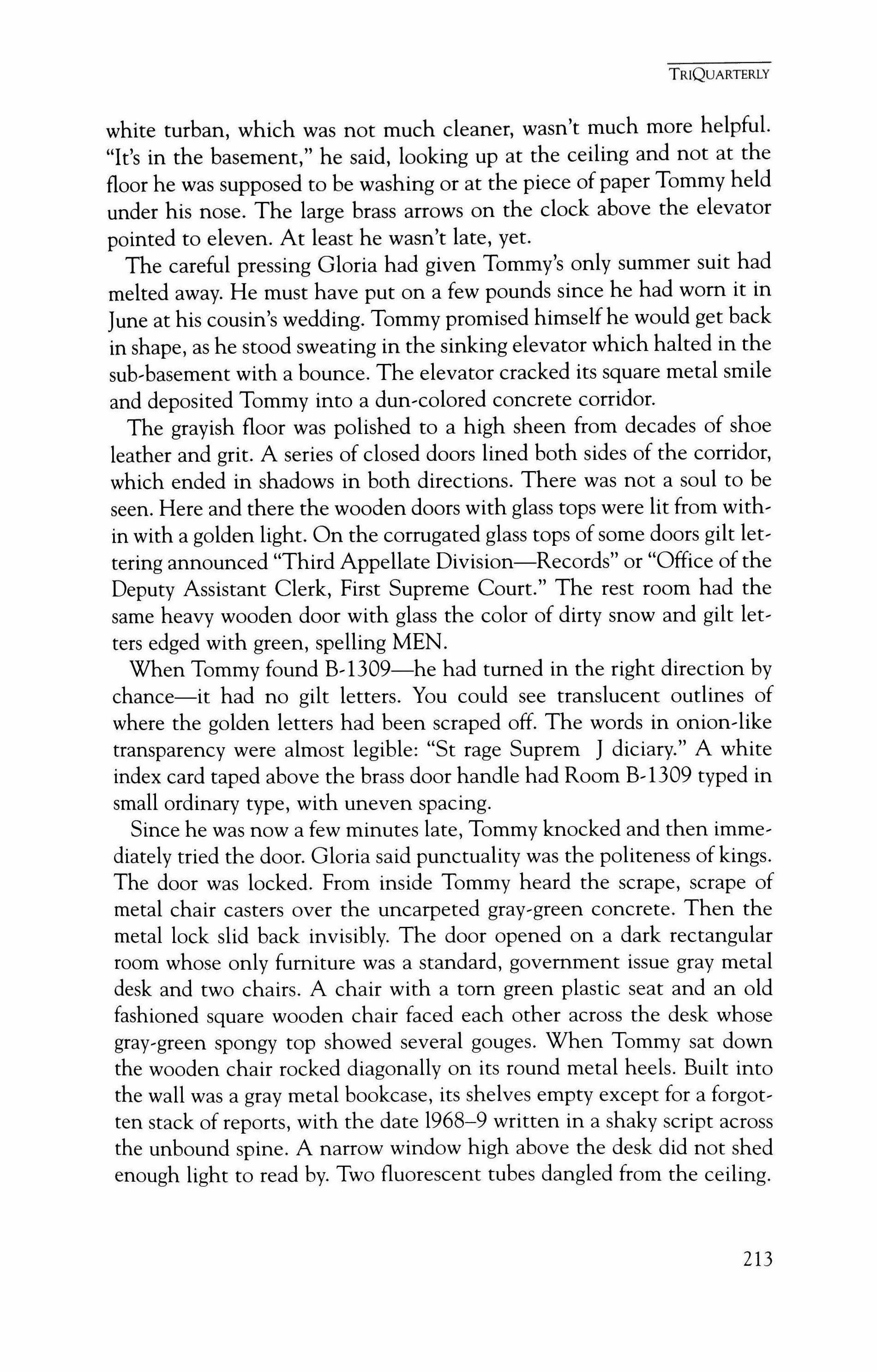
white turban, which was not much cleaner, wasn't much more helpful. "It's in the basement," he said, looking up at the ceiling and not at the floor he was supposed to be washing or at the piece of paper Tommy held under his nose. The large brass arrows on the clock above the elevator pointed to eleven. At least he wasn't late, yet.
The careful pressing Gloria had given Tommy's only summer suit had melted away. He must have put on a few pounds since he had worn it in June at his cousin's wedding. Tommy promised himselfhe would get back in shape, as he stood sweating in the sinking elevator which halted in the sub-basement with a bounce. The elevator cracked its square metal smile and deposited Tommy into a dun-colored concrete corridor.
The grayish floor was polished to a high sheen from decades of shoe leather and grit. A series of closed doors lined both sides of the corridor, which ended in shadows in both directions. There was not a soul to be seen. Here and there the wooden doors with glass tops were lit from within with a golden light. On the corrugated glass tops of some doors gilt lettering announced "Third Appellate Division-Records" or "Office of the Deputy Assistant Clerk, First Supreme Court." The rest room had the same heavy wooden door with glass the color of dirty snow and gilt letters edged with green, spelling MEN.
When Tommy found B-1309-he had turned in the right direction by chance-it had no gilt letters. You could see translucent outlines of where the golden letters had been scraped off. The words in onion-like transparency were almost legible: "St rage Suprem J diciary." A white index card taped above the brass door handle had Room B-1309 typed in small ordinary type, with uneven spacing.
Since he was now a few minutes late, Tommy knocked and then immediately tried the door. Gloria said punctuality was the politeness of kings. The door was locked. From inside Tommy heard the scrape, scrape of metal chair casters over the uncarpeted gray-green concrete. Then the metal lock slid back invisibly. The door opened on a dark rectangular room whose only furniture was a standard, government issue gray metal desk and two chairs. A chair with a tom green plastic seat and an old fashioned square wooden chair faced each other across the desk whose gray-green spongy top showed several gouges. When Tommy sat down the wooden chair rocked diagonally on its round metal heels. Built into the wall was a gray metal bookcase, its shelves empty except for a forgotten stack of reports, with the date 1968-9 written in a shaky script across the unbound spine. A narrow window high above the desk did not shed enough light to read by. Two fluorescent tubes dangled from the ceiling.
TRIQUARTERLY
213
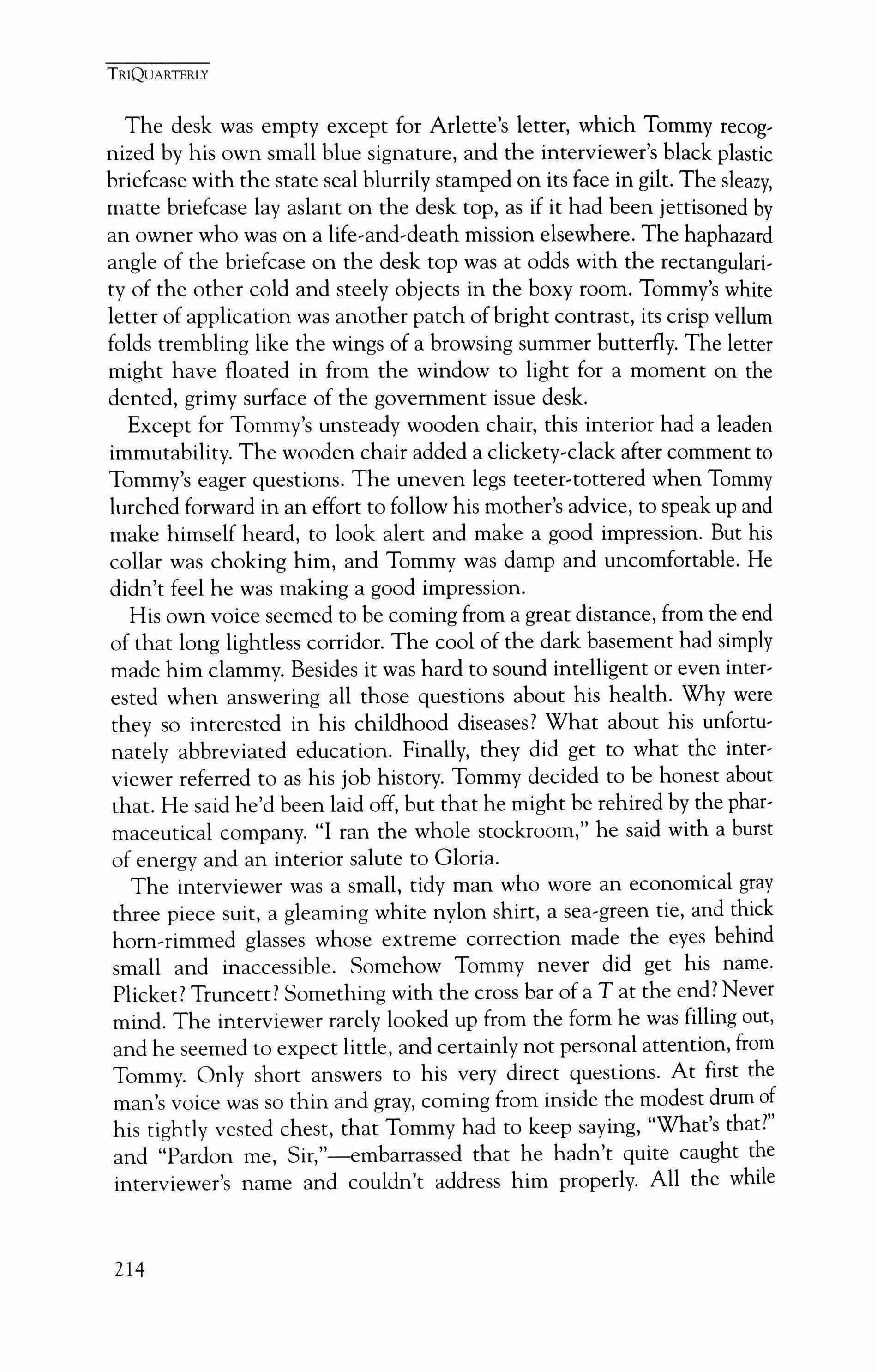
TRIQUARTERLY
The desk was empty except for Arlette's letter, which Tommy recognized by his own small blue signature, and the interviewer's black plastic briefcase with the state seal blurrily stamped on its face in gilt. The sleazy, matte briefcase lay aslant on the desk top, as if it had been jettisoned by an owner who was on a life-and-death mission elsewhere. The haphazard angle of the briefcase on the desk top was at odds with the rectangularity of the other cold and steely objects in the boxy room. Tommy's white letter of application was another patch of bright contrast, its crisp vellum folds trembling like the wings of a browsing summer butterfly. The letter might have floated in from the window to light for a moment on the dented, grimy surface of the government issue desk.
Except for Tommy's unsteady wooden chair, this interior had a leaden immutability. The wooden chair added a clickety-clack after comment to Tommy's eager questions. The uneven legs teeter-tottered when Tommy lurched forward in an effort to follow his mother's advice, to speak up and make himself heard, to look alert and make a good impression. But his collar was choking him, and Tommy was damp and uncomfortable. He didn't feel he was making a good impression.
His own voice seemed to be coming from a great distance, from the end of that long lightless corridor. The cool of the dark basement had simply made him clammy. Besides it was hard to sound intelligent or even interested when answering all those questions about his health. Why were they so interested in his childhood diseases? What about his unfortunately abbreviated education. Finally, they did get to what the interviewer referred to as his job history. Tommy decided to be honest about that. He said he'd been laid off, but that he might be rehired by the pharmaceutical company. "I ran the whole stockroom," he said with a burst of energy and an interior salute to Gloria.
The interviewer was a small, tidy man who wore an economical gray three piece suit, a gleaming white nylon shirt, a sea-green tie, and thick horn-rimmed glasses whose extreme correction made the eyes behind small and inaccessible. Somehow Tommy never did get his name. Plicket? Truncett? Something with the cross bar of a T at the end? Never mind. The interviewer rarely looked up from the form he was filling out, and he seemed to expect little, and certainly not personal attention, from Tommy. Only short answers to his very direct questions. At first the man's voice was so thin and gray, coming from inside the modest drum of his tightly vested chest, that Tommy had to keep saying, "What's that?" and "Pardon me, Sir,"-embarrassed that he hadn't quite caught the interviewer's name and couldn't address him properly. All the while
214

Tommy was leaning forward so that the wooden chair clickety-clacked after his interjections like false teeth.
The interviewer wrote down Tommy's simple answers on a white and black Xeroxed form which had Tommy's name printed in pencil at the top. Tommy had no way of knowing whether he was the first, the tenth, or the hundredth person to be considered for the advertised position. When the interviewer asked about his police record, Tommy hesitated for just a minute. He had been arrested with Ants for joyriding in high school. They took Ants' Uncle's car, and damned if he didn't call the police. Then one other time Tommy had been arrested with a whole party of kids on the shore and booked for smoking pot. Tommy thought both of these probably weren't on any record, but he told the interviewer about the joyriding incident anyway. Explained it. Said, he and his best friend borrowed a relative's car. That way, if it came up. And as for the marijuana incident, he had given an absent friend's name and address to the police in Asbury Park anyhow.
When Tommy inquired about his chances, the man raised his head and stared at Tommy through his thick, concealing lenses and only said: "Of course there have been a number of inappropriate applications." Tommy stared back with his mouth open. What could be meant by that? "Your profile and qualifications are more in line with what we had in mind." Later when Tommy told Gloria that, she agreed it was encouraging. That sounded positive, didn't it? The interviewer said little else, however, and he clearly didn't like answering questions.
The job was in a state correctional institution. It involved some training, and there would be variery in the work. When Tommy asked about salary, the gray man looked up in a little book and then quoted Tommy a range offigures. Even Gloria was agreeably surprised. It was much more than what he had been making at Hogarth. By the time you counted the free health insurance-maybe that was why they asked so many questions about his medical history-and the other benefits, like retirement, it was more than three times Tommy's former wage.
Tommy noticed that the interviewer had filled up only about half of the page with his pale, neat writing. Tommy asked to sign the sheet at the bottom where the date was. They didn't seem to want Tommy's stamp on anything else. At the end of the interview the man threw Arlette's beautifully typed letter into the empty mouth of the gray metal wastebasket, which seemed a shame to Tommy, although he guessed they had everything they needed, his name, date and social security number now, as well as his phone number.
TRIQUARTERLY
215
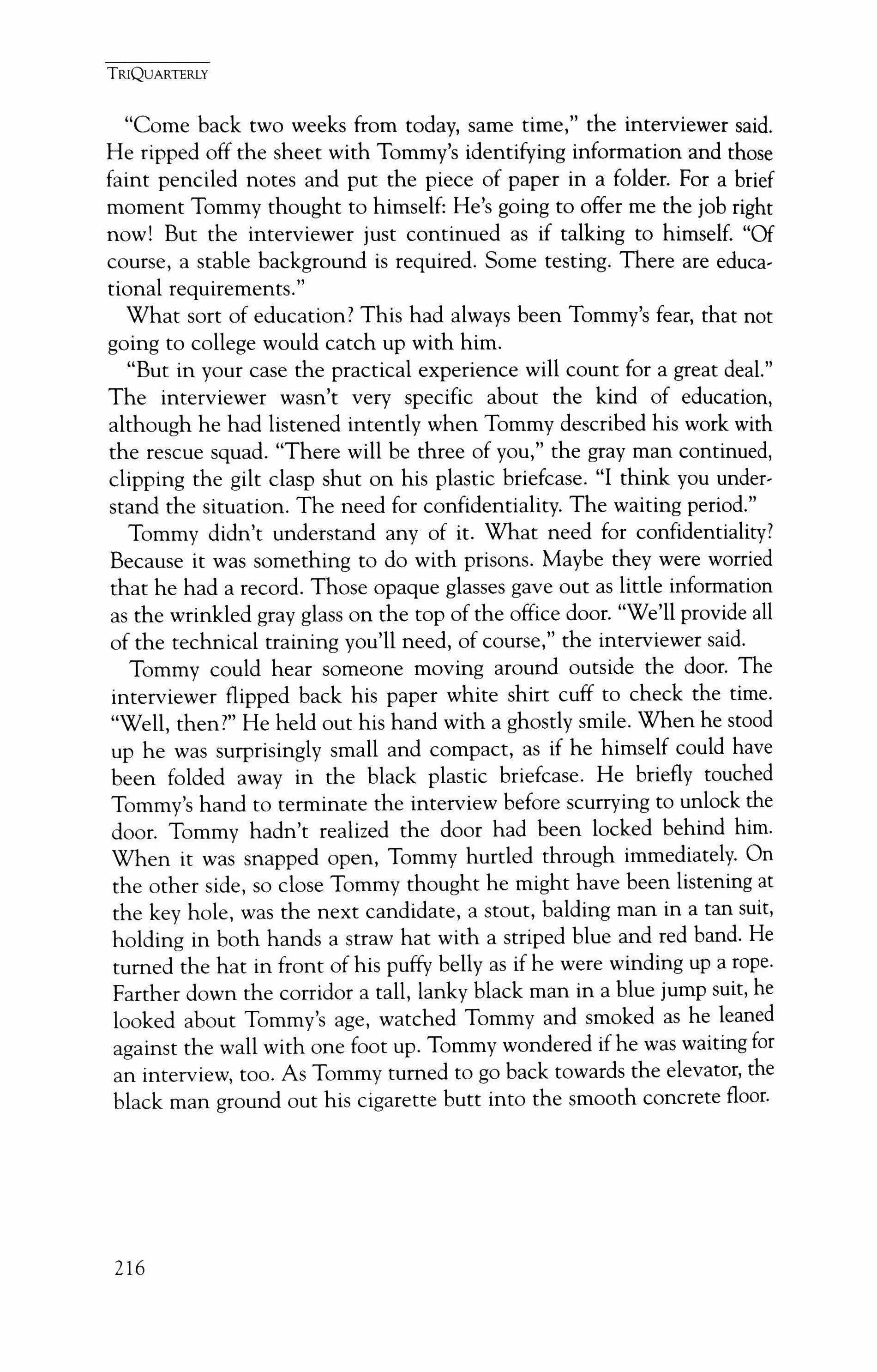
"Come back two weeks from today, same time," the interviewer said. He ripped off the sheet with Tommy's identifying information and those faint penciled notes and put the piece of paper in a folder. For a brief moment Tommy thought to himself: He's going to offer me the job right now! But the interviewer just continued as if talking to himself. "Of course, a stable background is required. Some testing. There are educational requirements."
What sort of education? This had always been Tommy's fear, that not going to college would catch up with him.
"But in your case the practical experience will count for a great deal." The interviewer wasn't very specific about the kind of education, although he had listened intently when Tommy described his work with the rescue squad. "There will be three of you," the gray man continued, clipping the gilt clasp shut on his plastic briefcase. "I think you understand the situation. The need for confidentiality. The waiting period." Tommy didn't understand any of it. What need for confidentiality? Because it was something to do with prisons. Maybe they were worried that he had a record. Those opaque glasses gave out as little information as the wrinkled gray glass on the top of the office door. "We'll provide all of the technical training you'll need, of course," the interviewer said.
Tommy could hear someone moving around outside the door. The interviewer flipped back his paper white shirt cuff to check the time. "Well, then?" He held out his hand with a ghostly smile. When he stood up he was surprisingly small and compact, as if he himself could have been folded away in the black plastic briefcase. He briefly touched Tommy's hand to terminate the interview before scurrying to unlock the door. Tommy hadn't realized the door had been locked behind him. When it was snapped open, Tommy hurtled through immediately. On the other side, so close Tommy thought he might have been listening at the key hole, was the next candidate, a stout, balding man in a tan suit, holding in both hands a straw hat with a striped blue and red band. He turned the hat in front of his puffy belly as if he were winding up a rope. Farther down the corridor a tall, lanky black man in a blue jump suit, he looked about Tommy's age, watched Tommy and smoked as he leaned against the wall with one foot up. Tommy wondered if he was waiting for an interview, too. As Tommy turned to go back towards the elevator, the black man ground out his cigarette butt into the smooth concrete floor.
TRIQUARTERLY
216
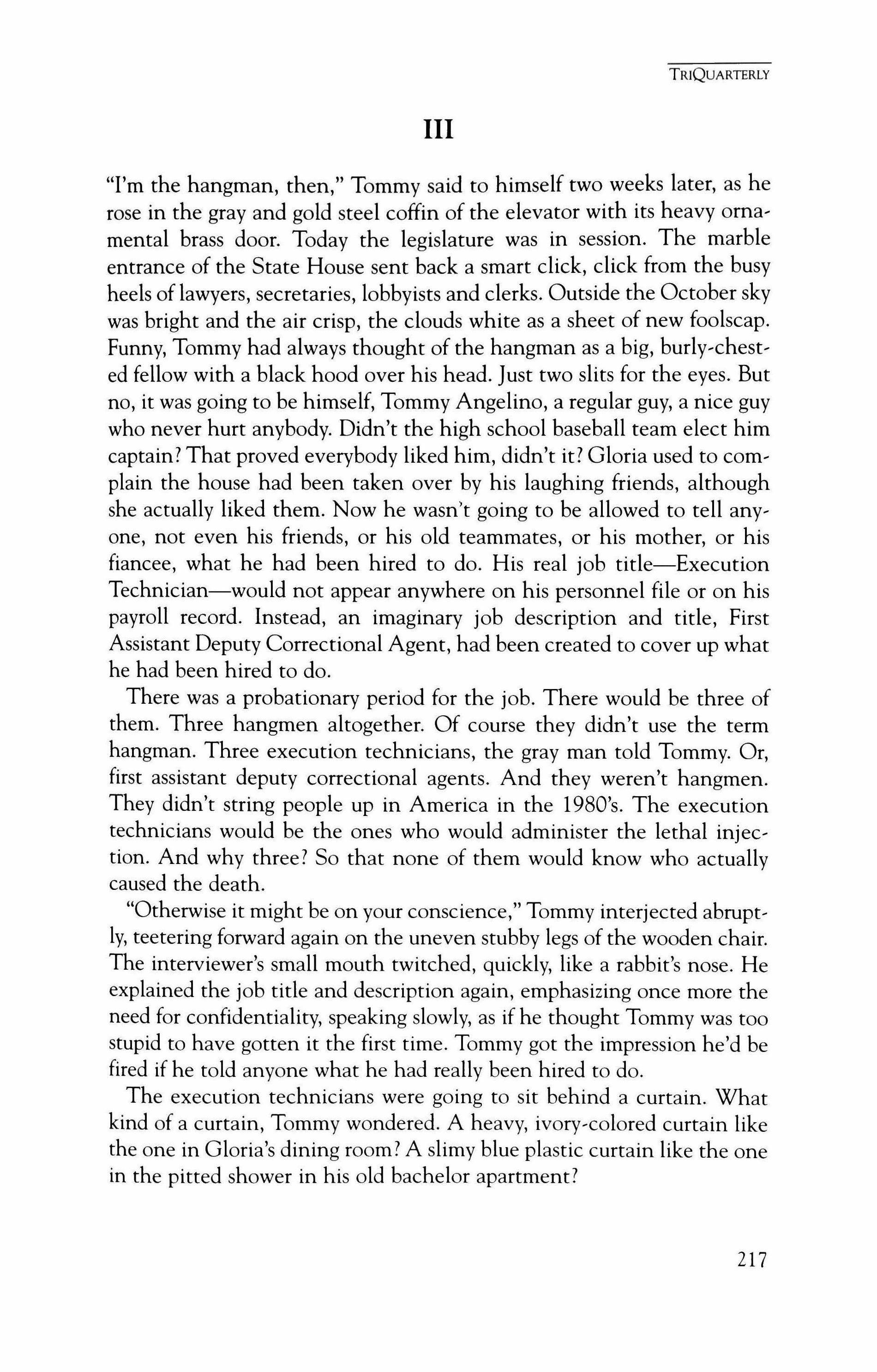
III
"I'm the hangman, then," Tommy said to himself two weeks later, as he rose in the gray and gold steel coffin of the elevator with its heavy ornamental brass door. Today the legislature was in session. The marble entrance of the State House sent back a smart click, click from the busy heels of lawyers, secretaries, lobbyists and clerks. Outside the October sky was bright and the air crisp, the clouds white as a sheet of new foolscap. Funny, Tommy had always thought of the hangman as a big, burly-chested fellow with a black hood over his head. Just two slits for the eyes. But no, it was going to be himself, Tommy Angelino, a regular guy, a nice guy who never hurt anybody. Didn't the high school baseball team elect him captain? That proved everybody liked him, didn't it? Gloria used to cornplain the house had been taken over by his laughing friends, although she actually liked them. Now he wasn't going to be allowed to tell anyone, not even his friends, or his old teammates, or his mother, or his fiancee, what he had been hired to do. His real job title-Execution Technician-would not appear anywhere on his personnel file or on his payroll record. Instead, an imaginary job description and title, First Assistant Deputy Correctional Agent, had been created to cover up what he had been hired to do.
There was a probationary period for the job. There would be three of them. Three hangmen altogether. Of course they didn't use the term hangman. Three execution technicians, the gray man told Tommy. Or, first assistant deputy correctional agents. And they weren't hangmen. They didn't string people up in America in the 1980's. The execution technicians would be the ones who would administer the lethal injection. And why three? So that none of them would know who actually caused the death.
"Otherwise it might be on your conscience," Tommy interjected abruptly, teetering forward again on the uneven stubby legs of the wooden chair. The interviewer's small mouth twitched, quickly, like a rabbit's nose. He explained the job title and description again, emphasizing once more the need for confidentiality, speaking slowly, as if he thought Tommy was too stupid to have gotten it the first time. Tommy got the impression he'd be fired if he told anyone what he had really been hired to do.
The execution technicians were going to sit behind a curtain. What kind of a curtain, Tommy wondered. A heavy, ivory-colored curtain like the one in Gloria's dining room? A slimy blue plastic curtain like the one in the pitted shower in his old bachelor apartment?
TRIQUARTERLY
217
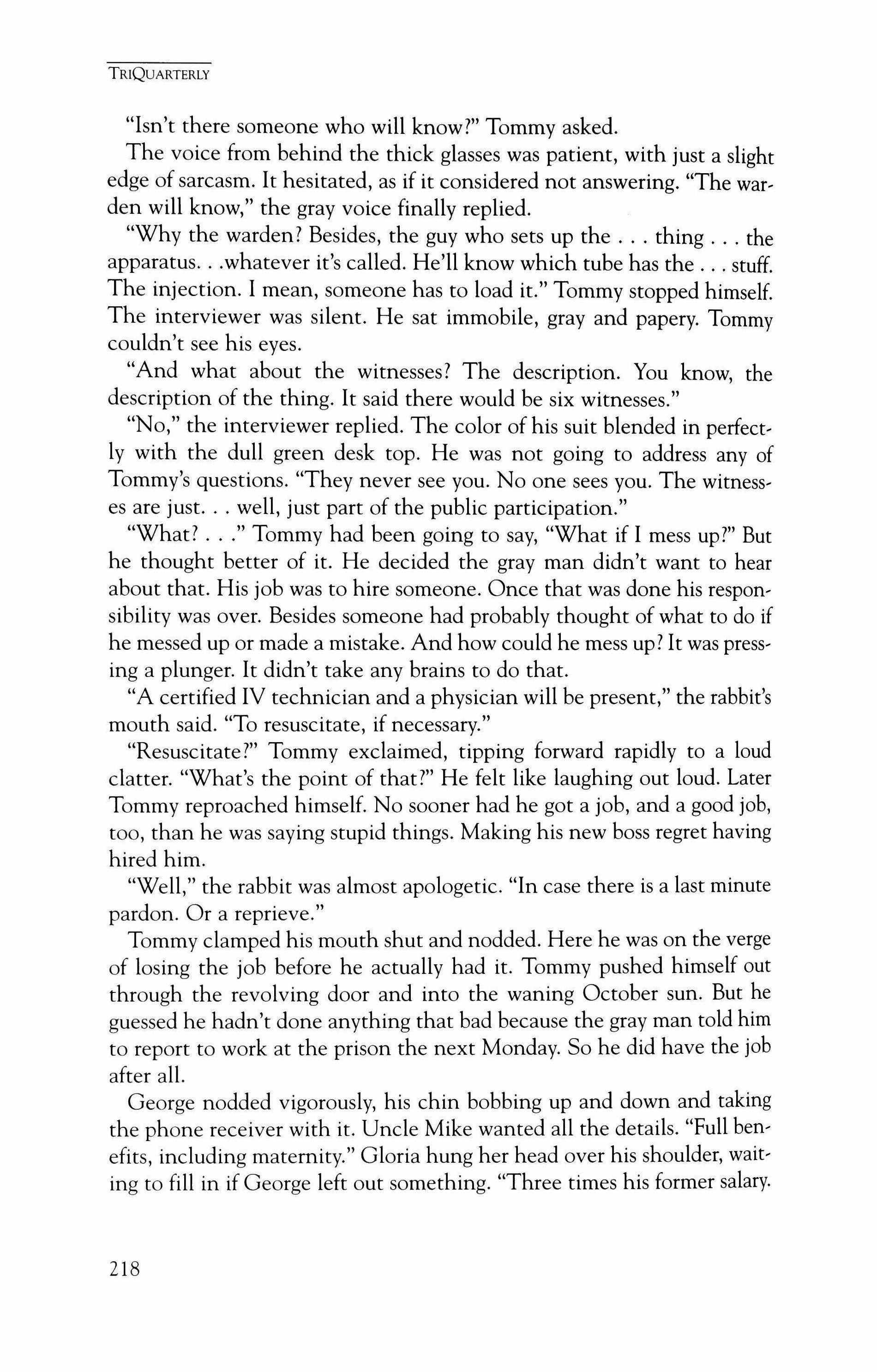
TRIQUARTERLY
"Isn't there someone who will know?" Tommy asked. The voice from behind the thick glasses was patient, with just a slight edge of sarcasm. It hesitated, as if it considered not answering. "The warden will know," the gray voice finally replied.
"Why the warden? Besides, the guy who sets up the thing the apparatus whatever it's called. He'll know which tube has the stuff. The injection. I mean, someone has to load it." Tommy stopped himself. The interviewer was silent. He sat immobile, gray and papery. Tommy couldn't see his eyes.
"And what about the witnesses? The description. You know, the description of the thing. It said there would be six witnesses."
"No," the interviewer replied. The color of his suit blended in perfectly with the dull green desk top. He was not going to address any of Tommy's questions. "They never see you. No one sees you. The witnesses are just well, just part of the public participation."
"What? Tommy had been going to say, "What if I mess up?" But he thought better of it. He decided the gray man didn't want to hear about that. His job was to hire someone. Once that was done his responsibility was over. Besides someone had probably thought of what to do if he messed up or made a mistake. And how could he mess up? It was pressing a plunger. It didn't take any brains to do that.
"A certified IV technician and a physician will be present," the rabbit's mouth said. "To resuscitate, if necessary."
"Resuscitate?" Tommy exclaimed, tipping forward rapidly to a loud clatter. "What's the point of that?" He felt like laughing out loud. Later Tommy reproached himself. No sooner had he got a job, and a good job, too, than he was saying stupid things. Making his new boss regret having hired him.
"Well," the rabbit was almost apologetic. "In case there is a last minute pardon. Or a reprieve."
Tommy clamped his mouth shut and nodded. Here he was on the verge of losing the job before he actually had it. Tommy pushed himself out through the revolving door and into the waning October sun. But he guessed he hadn't done anything that bad because the gray man told him to report to work at the prison the next Monday. So he did have the job after all.
George nodded vigorously, his chin bobbing up and down and taking the phone receiver with it. Uncle Mike wanted all the details. "Full benefits, including maternity." Gloria hung her head over his shoulder, waiting to fill in if George left out something. "Three times his former salary.
218
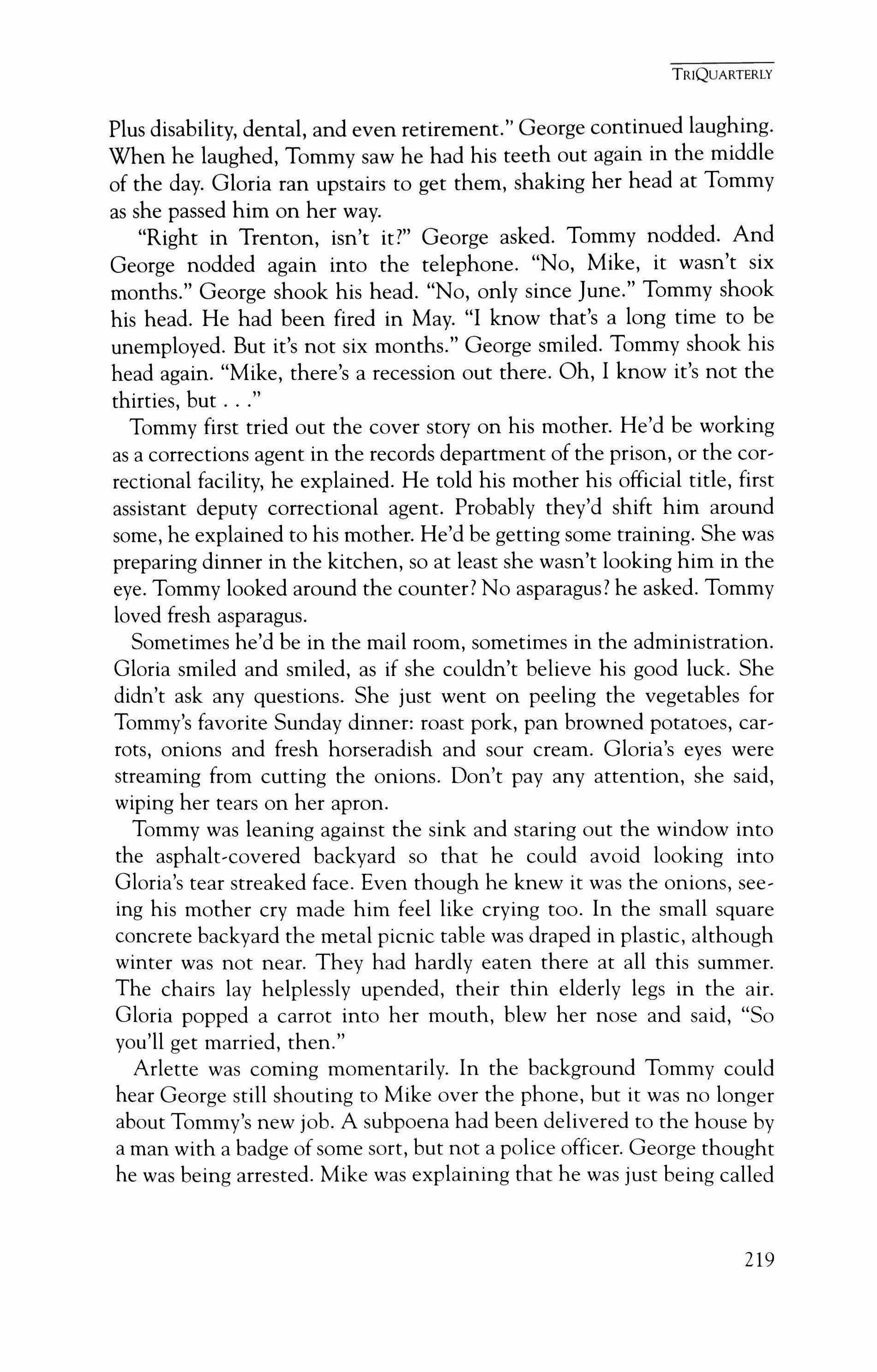
Plus disability, dental, and even retirement." George continued laughing. When he laughed, Tommy saw he had his teeth out again in the middle of the day. Gloria ran upstairs to get them, shaking her head at Tommy as she passed him on her way.
"Right in Trenton, isn't it?" George asked. Tommy nodded. And George nodded again into the telephone. "No, Mike, it wasn't six months." George shook his head. "No, only since June." Tommy shook his head. He had been fired in May. "I know that's a long time to be unemployed. But it's not six months." George smiled. Tommy shook his head again. "Mike, there's a recession out there. Oh, I know it's not the thirties, but
Tommy first tried out the cover story on his mother. He'd be working as a corrections agent in the records department of the prison, or the correctional facility, he explained. He told his mother his official title, first assistant deputy correctional agent. Probably they'd shift him around some, he explained to his mother. He'd be getting some training. She was preparing dinner in the kitchen, so at least she wasn't looking him in the eye. Tommy looked around the counter? No asparagus? he asked. Tommy loved fresh asparagus.
Sometimes he'd be in the mail room, sometimes in the administration. Gloria smiled and smiled, as if she couldn't believe his good luck. She didn't ask any questions. She just went on peeling the vegetables for Tommy's favorite Sunday dinner: roast pork, pan browned potatoes, carrots, onions and fresh horseradish and sour cream. Gloria's eyes were streaming from cutting the onions. Don't pay any attention, she said, wiping her tears on her apron.
Tommy was leaning against the sink and staring out the window into the asphalt-covered backyard so that he could avoid looking into Gloria's tear streaked face. Even though he knew it was the onions, seeing his mother cry made him feel like crying too. In the small square concrete backyard the metal picnic table was draped in plastic, although winter was not near. They had hardly eaten there at all this summer. The chairs lay helplessly upended, their thin elderly legs in the air. Gloria popped a carrot into her mouth, blew her nose and said, "So you'll get married, then."
Arlette was coming momentarily. In the background Tommy could hear George still shouting to Mike over the phone, but it was no longer about Tommy's new job. A subpoena had been delivered to the house by a man with a badge of some sort, but not a police officer. George thought he was being arrested. Mike was explaining that he was just being called
TRIQUARTERLY
219
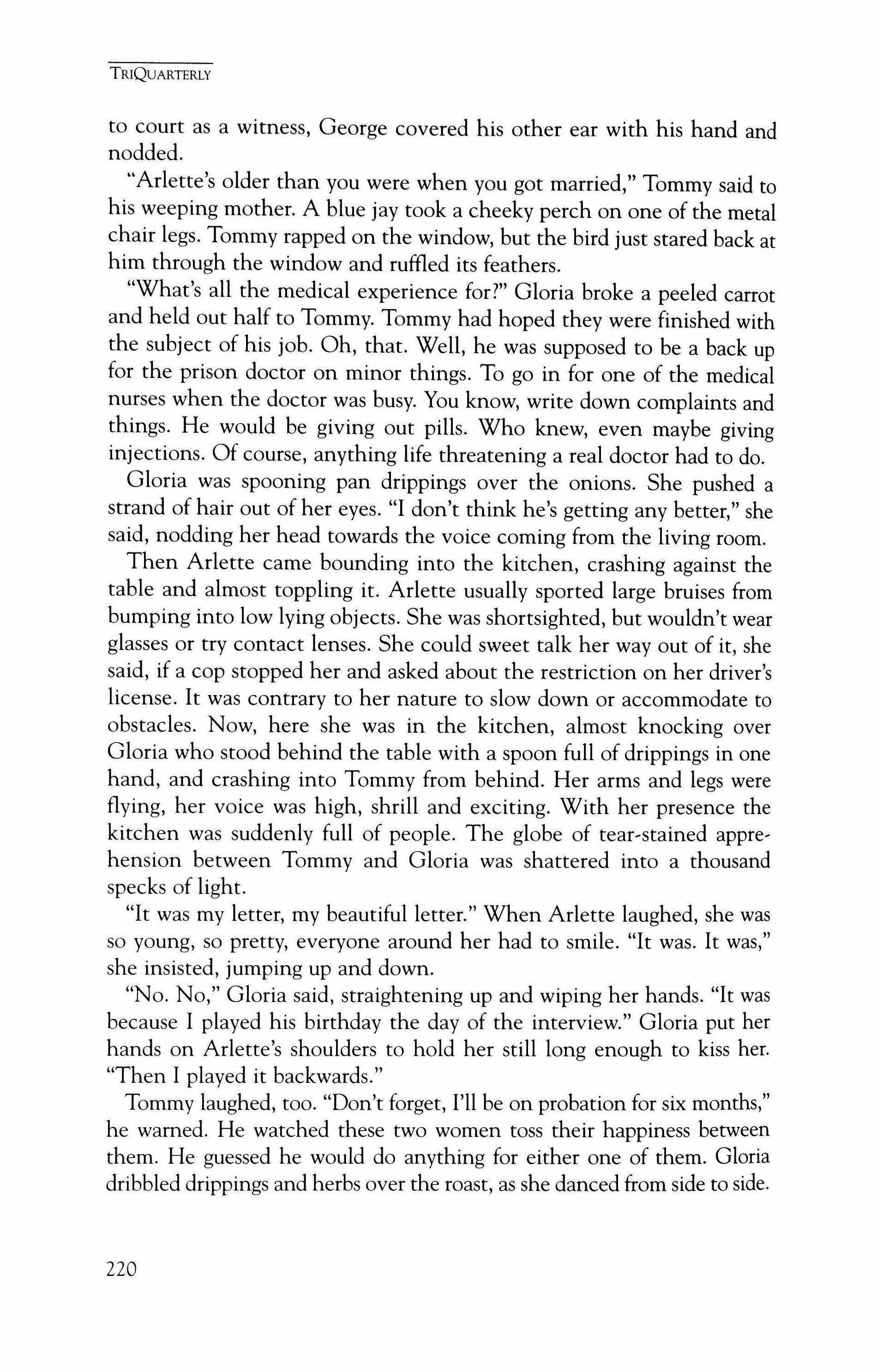
to court as a witness, George covered his other ear with his hand and nodded.
"Arlette's older than you were when you got married," Tommy said to his weeping mother. A blue jay took a cheeky perch on one of the metal chair legs. Tommy rapped on the window, but the bird just stared back at him through the window and ruffled its feathers.
"What's all the medical experience for?" Gloria broke a peeled carrot and held out half to Tommy. Tommy had hoped they were finished with the subject of his job. Oh, that. Well, he was supposed to be a back up for the prison doctor on minor things. To go in for one of the medical nurses when the doctor was busy. You know, write down complaints and things. He would be giving out pills. Who knew, even maybe giving injections. Of course, anything life threatening a real doctor had to do.
Gloria was spooning pan drippings over the onions. She pushed a strand of hair out of her eyes. "I don't think he's getting any better," she said, nodding her head towards the voice coming from the living room.
Then Arlette came bounding into the kitchen, crashing against the table and almost toppling it. Arlette usually sported large bruises from bumping into low lying objects. She was shortsighted, but wouldn't wear glasses or try contact lenses. She could sweet talk her way out of it, she said, if a cop stopped her and asked about the restriction on her driver's license. It was contrary to her nature to slow down or accommodate to obstacles. Now, here she was in the kitchen, almost knocking over Gloria who stood behind the table with a spoon full of drippings in one hand, and crashing into Tommy from behind. Her arms and legs were flying, her voice was high, shrill and exciting. With her presence the kitchen was suddenly full of people. The globe of tear-stained apprehension between Tommy and Gloria was shattered into a thousand specks of light.
"It was my letter, my beautiful letter." When Arlette laughed, she was so young, so pretty, everyone around her had to smile. "It was. It was," she insisted, jumping up and down.
"No. No," Gloria said, straightening up and wiping her hands. "It was because I played his birthday the day of the interview." Gloria put her hands on Arlette's shoulders to hold her still long enough to kiss her. "Then I played it backwards."
Tommy laughed, too. "Don't forget, I'll be on probation for six months," he warned. He watched these two women toss their happiness between them. He guessed he would do anything for either one of them. Gloria dribbled drippings and herbs over the roast, as she danced from side to side.
TRIQUARTERLY
220
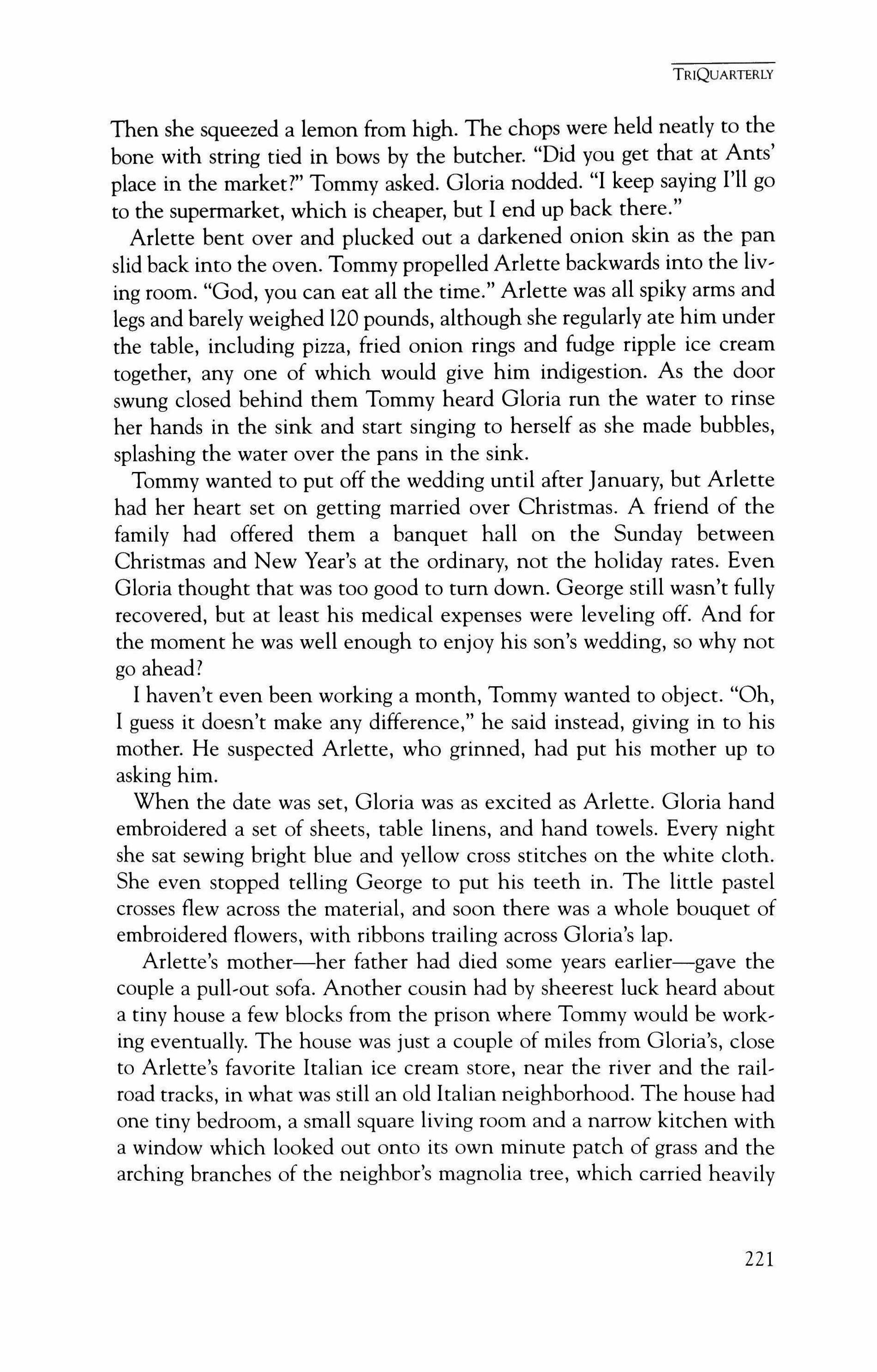
Then she squeezed a lemon from high. The chops were held neatly to the bone with string tied in bows by the butcher. "Did you get that at Ants' place in the market?" Tommy asked. Gloria nodded. "I keep saying I'll go to the supermarket, which is cheaper, but I end up back there."
Arlette bent over and plucked out a darkened onion skin as the pan slid back into the oven. Tommy propelled Arlette backwards into the living room. "God, you can eat all the time." Arlette was all spiky arms and legs and barely weighed 120 pounds, although she regularly ate him under the table, including pizza, fried onion rings and fudge ripple ice cream together, anyone of which would give him indigestion. As the door swung closed behind them Tommy heard Gloria run the water to rinse her hands in the sink and start singing to herself as she made bubbles, splashing the water over the pans in the sink.
Tommy wanted to put off the wedding until after January, but Arlette had her heart set on getting married over Christmas. A friend of the family had offered them a banquet hall on the Sunday between Christmas and New Year's at the ordinary, not the holiday rates. Even Gloria thought that was too good to tum down. George still wasn't fully recovered, but at least his medical expenses were leveling off. And for the moment he was well enough to enjoy his son's wedding, so why not go ahead?
I haven't even been working a month, Tommy wanted to object. "Oh, I guess it doesn't make any difference," he said instead, giving in to his mother. He suspected Arlette, who grinned, had put his mother up to asking him.
When the date was set, Gloria was as excited as Arlette. Gloria hand embroidered a set of sheets, table linens, and hand towels. Every night she sat sewing bright blue and yellow cross stitches on the white cloth. She even stopped telling George to put his teeth in. The little pastel crosses flew across the material, and soon there was a whole bouquet of embroidered flowers, with ribbons trailing across Gloria's lap.
Arlette's mother-her father had died some years earlier-gave the couple a pull-out sofa. Another cousin had by sheerest luck heard about a tiny house a few blocks from the prison where Tommy would be working eventually. The house was just a couple of miles from Gloria's, close to Arlette's favorite Italian ice cream store, near the river and the railroad tracks, in what was still an old Italian neighborhood. The house had one tiny bedroom, a small square living room and a narrow kitchen with a window which looked out onto its own minute patch of grass and the arching branches of the neighbor's magnolia tree, which carried heavily
TRIQUARTERLY
221
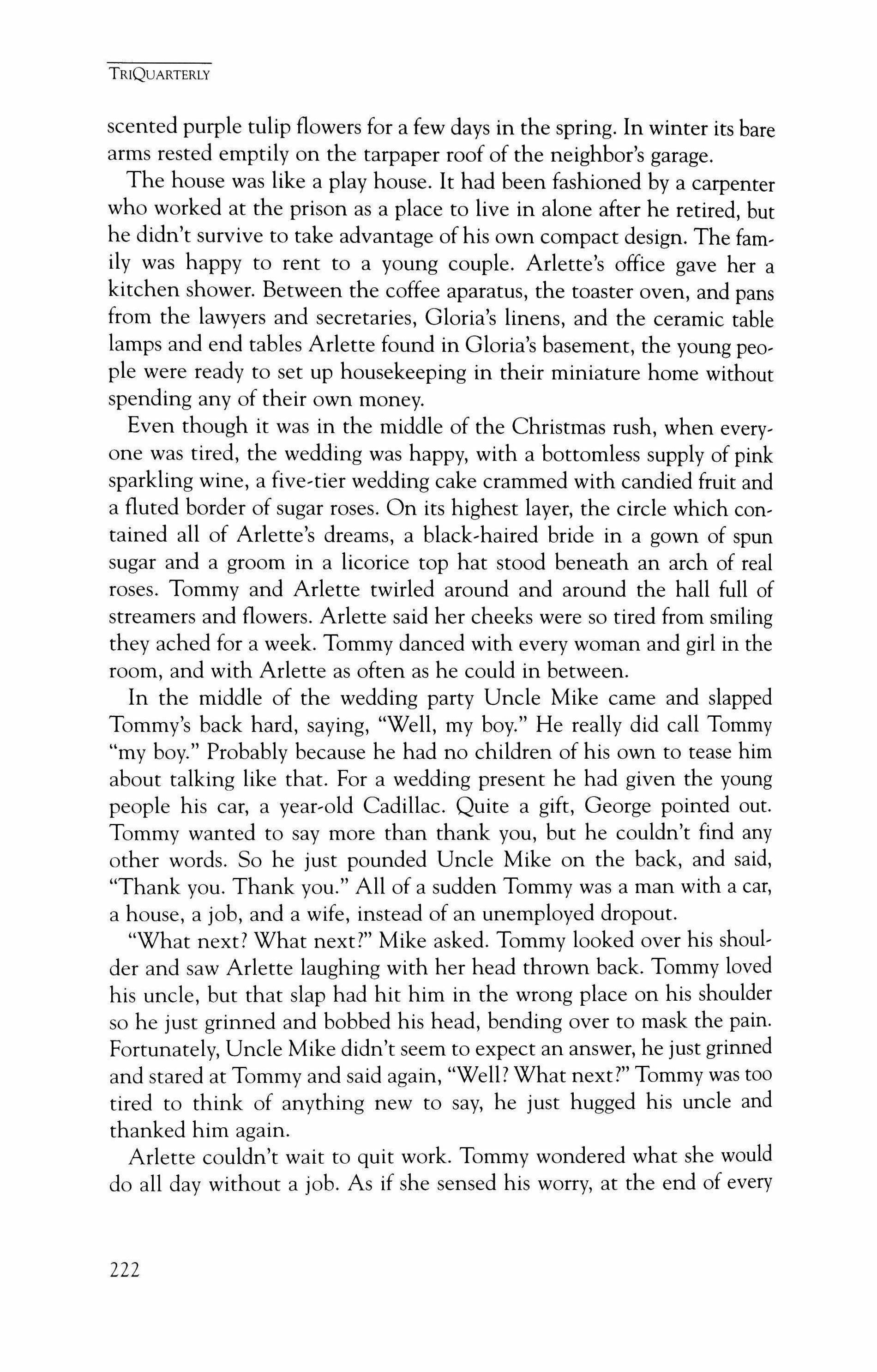
scented purple tulip flowers for a few days in the spring. In winter its bare arms rested emptily on the tarpaper roof of the neighbor's garage.
The house was like a play house. It had been fashioned by a carpenter who worked at the prison as a place to live in alone after he retired, but he didn't survive to take advantage of his own compact design. The family was happy to rent to a young couple. Arlette's office gave her a kitchen shower. Between the coffee aparatus, the toaster oven, and pans from the lawyers and secretaries, Gloria's linens, and the ceramic table lamps and end tables Arlette found in Gloria's basement, the young people were ready to set up housekeeping in their miniature home without spending any of their own money.
Even though it was in the middle of the Christmas rush, when everyone was tired, the wedding was happy, with a bottomless supply of pink sparkling wine, a five-tier wedding cake crammed with candied fruit and a fluted border of sugar roses. On its highest layer, the circle which contained all of Arlette's dreams, a black-haired bride in a gown of spun sugar and a groom in a licorice top hat stood beneath an arch of real roses. Tommy and Arlette twirled around and around the hall full of streamers and flowers. Arlette said her cheeks were so tired from smiling they ached for a week. Tommy danced with every woman and girl in the room, and with Arlette as often as he could in between.
In the middle of the wedding party Uncle Mike came and slapped Tommy's back hard, saying, "Well, my boy." He really did call Tommy "my boy." Probably because he had no children of his own to tease him about talking like that. For a wedding present he had given the young people his car, a year-old Cadillac. Quite a gift, George pointed out. Tommy wanted to say more than thank you, but he couldn't find any other words. So he just pounded Uncle Mike on the back, and said, "Thank you. Thank you." All of a sudden Tommy was a man with a car, a house, a job, and a wife, instead of an unemployed dropout. "What next? What next?" Mike asked. Tommy looked over his shoulder and saw Arlette laughing with her head thrown back. Tommy loved his uncle, but that slap had hit him in the wrong place on his shoulder so he just grinned and bobbed his head, bending over to mask the pain. Fortunately, Uncle Mike didn't seem to expect an answer, he just grinned and stared at Tommy and said again, "Well? What next?" Tommy was too tired to think of anything new to say, he just hugged his uncle and thanked him again.
Arlette couldn't wait to quit work. Tommy wondered what she would do all day without a job. As if she sensed his worry, at the end of every
TRIQUARTERLY
222

day Arlette told Tommy in detail about how she spent her time, looking for a bathroom rug, having lunch with the still unmarried and now frankly envious girls from her high school who felt trapped as clerks and secretaries in the state government.
Arlette never asked Tommy what he did all day. What he did was serious, and important, and permanent. Actually Tommy didn't care much what she did during the day as long as every night she was waiting for him to come home. After dinner they hurried into the boxlike bedroom which barely held their new queen-sized bed and made love and fell asleep in each others arms. Then Tommy woke in the next morning and waited for the night all day the next day.
Arlette turned the tiny house into a home for two surprised people who had never had more than a room to call their own. Gloria said it first, Tommy overheard her. He's very happy, she said. He's really very happy. And it was true. To think that only a few months ago Tommy had actually considered moving to Florida. Who would want to live there? To think he considered going to work for that old friend of his father's, the mortician. Had even thought, in more than a passing way, it would be fun to be single in Florida near that community college. How foolish and youthful that all seemed now. He was a married man, with a home, a job and a car.
Tommy left the house promptly at 8:45 each morning. At 7:30 Arlette fixed him a hot breakfast of oatmeal, bacon and eggs, or waffles or French toast-which she ate as well. At this rate he'd look like the other paunchy guards in a matter of months. When Tommy didn't exercise, the flab came and draped itself in layers all over him, like a shroud. Then Tommy went off to the little room he had been assigned temporarily in the basement of one of the anonymous state office buildings. There he had his own desk, chair, a bookcase and nothing to put in it and a phone. The supervisor explained that during the probationary period it had been decided to house him away from the prison. Later, the supervisor explained, when he was in training at the prison, he would have an office, or at least a cubicle, there. But now his presence among the other prison officers would just raise questions, since there was nothing for him to do, yet. He had been hired, but no one was sure what to do with him. Someone was working out the details.
"How come you're in the State House all the time?" Gloria asked suspiciously. "What are you doing?" Gloria sensed that paper work would not be what Tommy was going to be doing. She sometimes called Tommy from the dry cleaning plant where she worked when the shift was chang-
TRIQUARTERLY
223
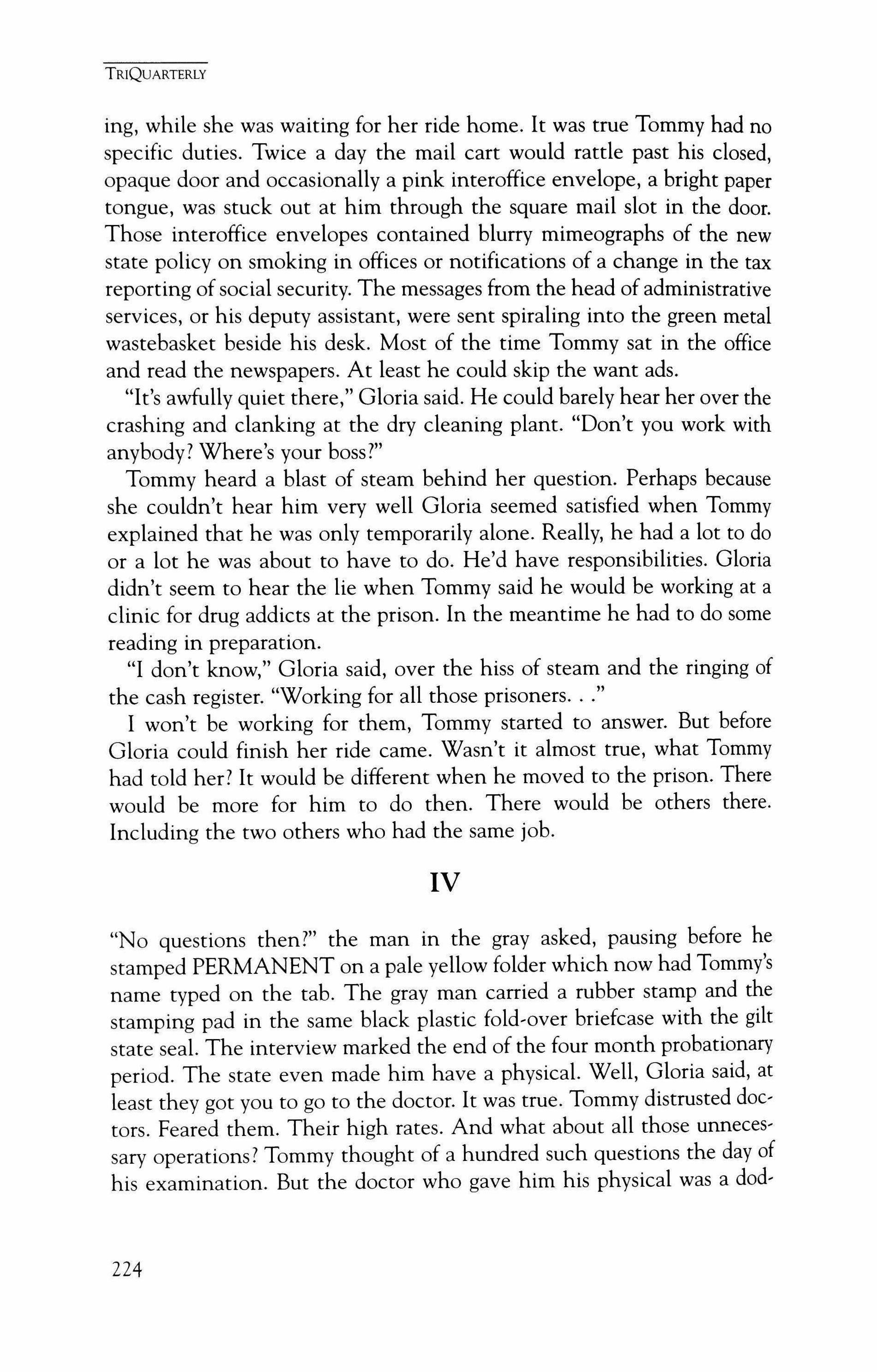
ing, while she was waiting for her ride home. It was true Tommy had no specific duties. Twice a day the mail cart would rattle past his closed, opaque door and occasionally a pink interoffice envelope, a bright paper tongue, was stuck out at him through the square mail slot in the door. Those interoffice envelopes contained blurry mimeographs of the new state policy on smoking in offices or notifications of a change in the tax reporting of social security. The messages from the head of administrative services, or his deputy assistant, were sent spiraling into the green metal wastebasket beside his desk. Most of the time Tommy sat in the office and read the newspapers. At least he could skip the want ads.
"It's awfully quiet there," Gloria said. He could barely hear her over the crashing and clanking at the dry cleaning plant. "Don't you work with anybody? Where's your boss?"
Tommy heard a blast of steam behind her question. Perhaps because she couldn't hear him very well Gloria seemed satisfied when Tommy explained that he was only temporarily alone. Really, he had a lot to do or a lot he was about to have to do. He'd have responsibilities. Gloria didn't seem to hear the lie when Tommy said he would be working at a clinic for drug addicts at the prison. In the meantime he had to do some reading in preparation.
"I don't know," Gloria said, over the hiss of steam and the ringing of the cash register. "Working for all those prisoners
I won't be working for them, Tommy started to answer. But before Gloria could finish her ride came. Wasn't it almost true, what Tommy had told her? It would be different when he moved to the prison. There would be more for him to do then. There would be others there. Including the two others who had the same job.
IV
"No questions then?" the man in the gray asked, pausing before he stamped PERMANENT on a pale yellow folder which now had Tommy's name typed on the tab. The gray man carried a rubber stamp and the stamping pad in the same black plastic fold-over briefcase with the gilt state seal. The interview marked the end of the four month probationary period. The state even made him have a physical. Well, Gloria said, at least they got you to go to the doctor. It was true. Tommy distrusted doctors. Feared them. Their high rates. And what about all those unnecessary operations? Tommy thought of a hundred such questions the day of his examination. But the doctor who gave him his physical was a dod-
TRIQUARTERLY
224
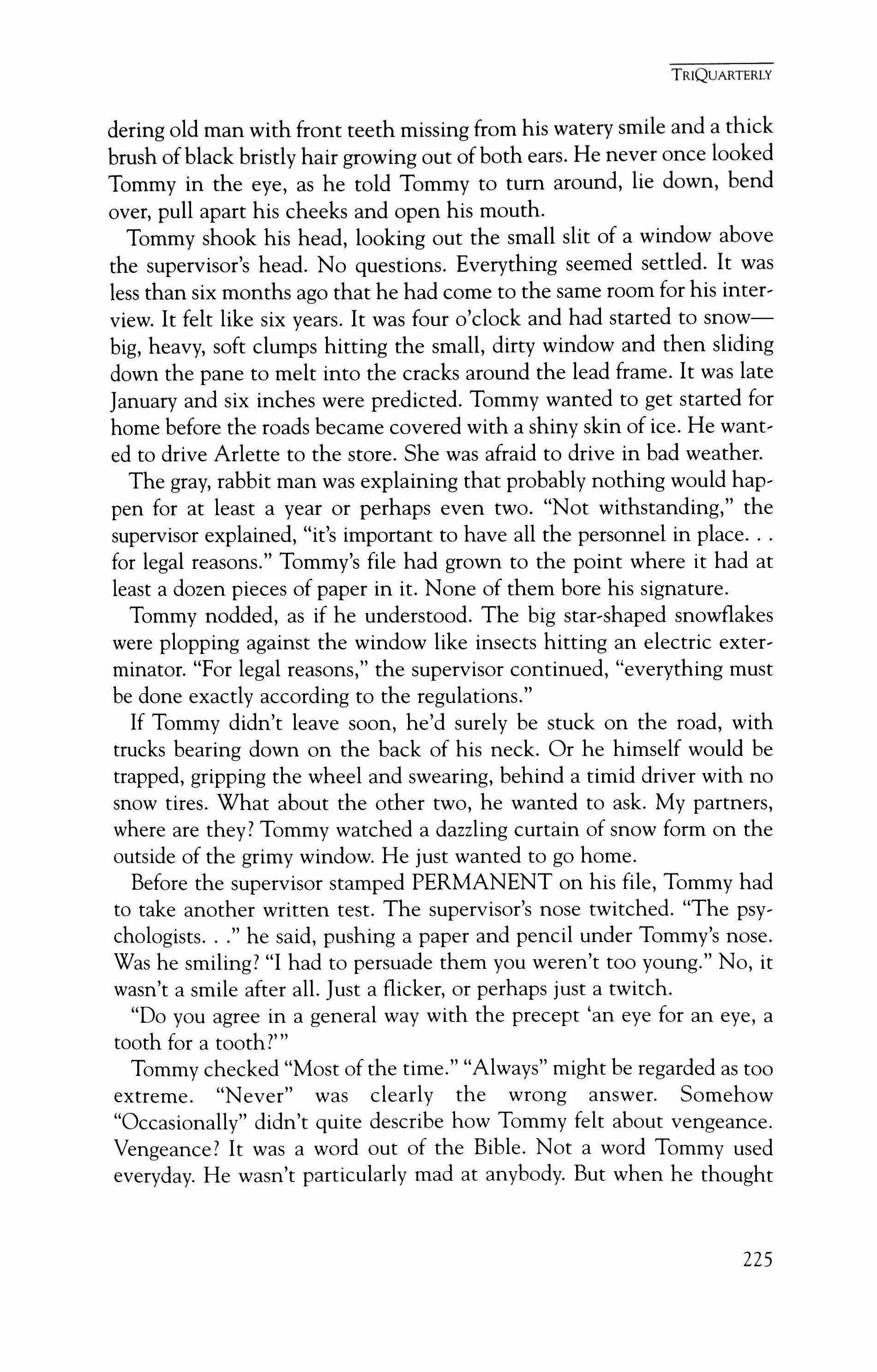
dering old man with front teeth missing from his watery smile and a thick brush ofblack bristly hair growing out of both ears. He never once looked Tommy in the eye, as he told Tommy to tum around, lie down, bend over, pull apart his cheeks and open his mouth.
Tommy shook his head, looking out the small slit of a window above the supervisor's head. No questions. Everything seemed settled. It was less than six months ago that he had come to the same room for his interview. It felt like six years. It was four o'clock and had started to snowbig, heavy, soft clumps hitting the small, dirty window and then sliding down the pane to melt into the cracks around the lead frame. It was late January and six inches were predicted. Tommy wanted to get started for home before the roads became covered with a shiny skin of ice. He wanted to drive Arlette to the store. She was afraid to drive in bad weather.
The gray, rabbit man was explaining that probably nothing would happen for at least a year or perhaps even two. "Not withstanding," the supervisor explained, "it's important to have all the personnel in place for legal reasons." Tommy's file had grown to the point where it had at least a dozen pieces of paper in it. None of them bore his signature.
Tommy nodded, as if he understood. The big star-shaped snowflakes were plopping against the window like insects hitting an electric exterminator. "For legal reasons," the supervisor continued, "everything must be done exactly according to the regulations."
If Tommy didn't leave soon, he'd surely be stuck on the road, with trucks bearing down on the back of his neck. Or he himself would be trapped, gripping the wheel and swearing, behind a timid driver with no snow tires. What about the other two, he wanted to ask. My partners, where are they? Tommy watched a dazzling curtain of snow form on the outside of the grimy window. He just wanted to go home.
Before the supervisor stamped PERMANENT on his file, Tommy had to take another written test. The supervisor's nose twitched. "The psychologists he said, pushing a paper and pencil under Tommy's nose. Was he smiling? "I had to persuade them you weren't too young." No, it wasn't a smile after all. Just a flicker, or perhaps just a twitch.
"Do you agree in a general way with the precept 'an eye for an eye, a tooth for a tooth?'"
Tommy checked "Most of the time." "Always" might be regarded as too extreme. "Never" was clearly the wrong answer. Somehow "Occasionally" didn't quite describe how Tommy felt about vengeance. Vengeance? It was a word out of the Bible. Not a word Tommy used everyday. He wasn't particularly mad at anybody. But when he thought
TRIQUARTERLY
225
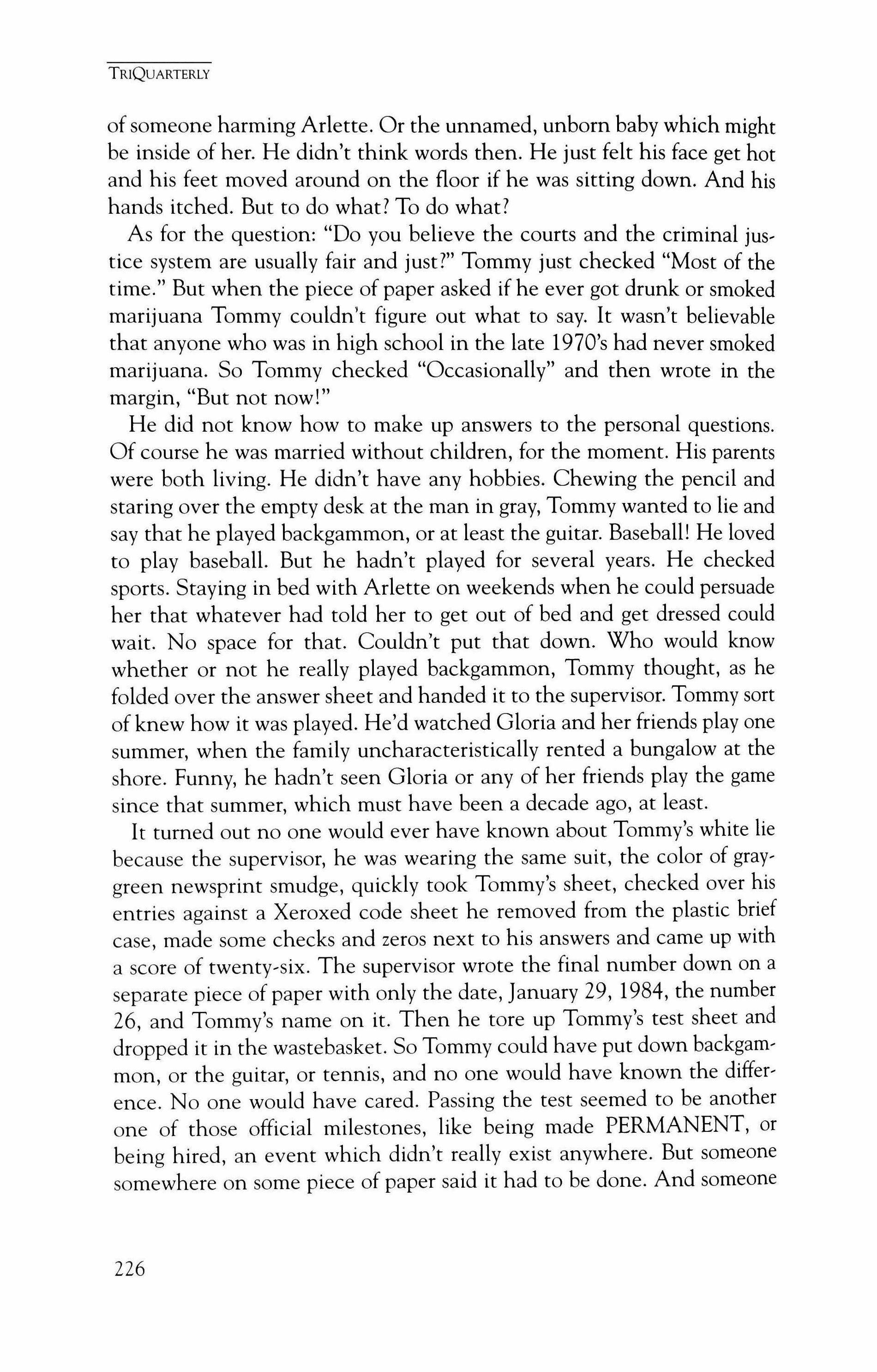
of someone harming Arlette. Or the unnamed, unborn baby which might be inside of her. He didn't think words then. He just felt his face get hot and his feet moved around on the floor if he was sitting down. And his hands itched. But to do what? To do what?
As for the question: "Do you believe the courts and the criminal justice system are usually fair and just?" Tommy just checked "Most of the time." But when the piece of paper asked if he ever got drunk or smoked marijuana Tommy couldn't figure out what to say. It wasn't believable that anyone who was in high school in the late 1970's had never smoked marijuana. So Tommy checked "Occasionally" and then wrote in the margin, "But not now!"
He did not know how to make up answers to the personal questions. Of course he was married without children, for the moment. His parents were both living. He didn't have any hobbies. Chewing the pencil and staring over the empty desk at the man in gray, Tommy wanted to lie and say that he played backgammon, or at least the guitar. Baseball! He loved to play baseball. But he hadn't played for several years. He checked sports. Staying in bed with Arlette on weekends when he could persuade her that whatever had told her to get out of bed and get dressed could wait. No space for that. Couldn't put that down. Who would know whether or not he really played backgammon, Tommy thought, as he folded over the answer sheet and handed it to the supervisor. Tommy sort of knew how it was played. He'd watched Gloria and her friends play one summer, when the family uncharacteristically rented a bungalow at the shore. Funny, he hadn't seen Gloria or any of her friends play the game since that summer, which must have been a decade ago, at least.
It turned out no one would ever have known about Tommy's white lie because the supervisor, he was wearing the same suit, the color of graygreen newsprint smudge, quickly took Tommy's sheet, checked over his entries against a Xeroxed code sheet he removed from the plastic brief case, made some checks and zeros next to his answers and came up with a score of twenty-six. The supervisor wrote the final number down on a separate piece of paper with only the date, January 29, 1984, the number 26, and Tommy's name on it. Then he tore up Tommy's test sheet and dropped it in the wastebasket. So Tommy could have put down backgammon, or the guitar, or tennis, and no one would have known the difference. No one would have cared. Passing the test seemed to be another one of those official milestones, like being made PERMANENT, or being hired, an event which didn't really exist anywhere. But someone somewhere on some piece of paper said it had to be done. And someone
TRIQUARTERLY
226
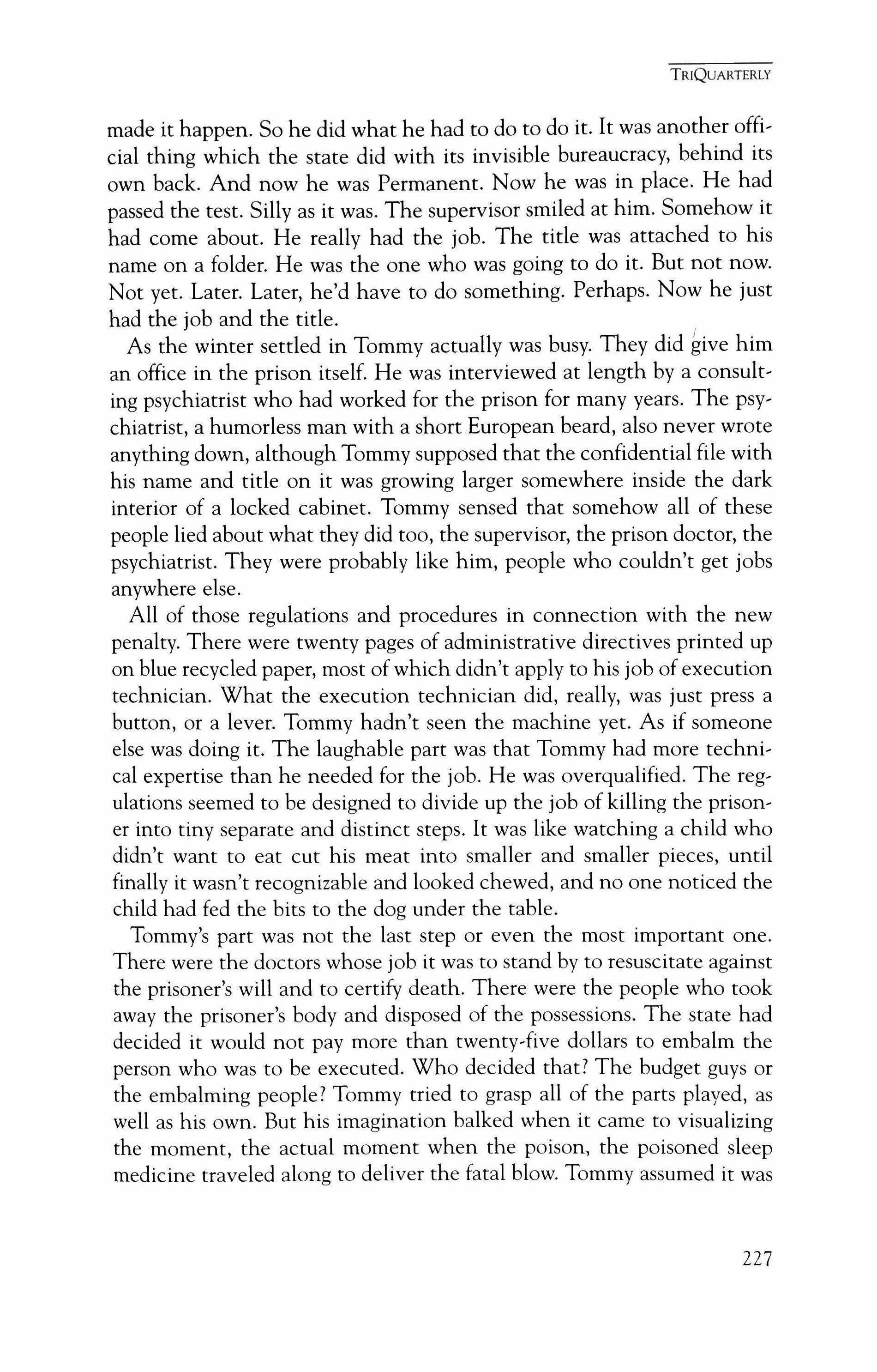
made it happen. So he did what he had to do to do it. It was another official thing which the state did with its invisible bureaucracy, behind its own back. And now he was Permanent. Now he was in place. He had passed the test. Silly as it was. The supervisor smiled at him. Somehow it had come about. He really had the job. The title was attached to his name on a folder. He was the one who was going to do it. But not now. Not yet. Later. Later, he'd have to do something. Perhaps. Now he just had the job and the title.
As the winter settled in Tommy actually was busy. They did give him an office in the prison itself. He was interviewed at length by a consulting psychiatrist who had worked for the prison for many years. The psychiatrist, a humorless man with a short European beard, also never wrote anything down, althoughTommy supposed that the confidential file with his name and title on it was growing larger somewhere inside the dark interior of a locked cabinet. Tommy sensed that somehow all of these people lied about what they did too, the supervisor, the prison doctor, the psychiatrist. They were probably like him, people who couldn't get jobs anywhere else.
All of those regulations and procedures in connection with the new penalty. There were twenty pages of administrative directives printed up on blue recycled paper, most of which didn't apply to his job of execution technician. What the execution technician did, really, was just press a button, or a lever. Tommy hadn't seen the machine yet. As if someone else was doing it. The laughable part was that Tommy had more technical expertise than he needed for the job. He was overqualified. The regulations seemed to be designed to divide up the job of killing the prisoner into tiny separate and distinct steps. It was like watching a child who didn't want to eat cut his meat into smaller and smaller pieces, until finally it wasn't recognizable and looked chewed, and no one noticed the child had fed the bits to the dog under the table.
Tommy's part was not the last step or even the most important one. There were the doctors whose job it was to stand by to resuscitate against the prisoner's will and to certify death. There were the people who took away the prisoner's body and disposed of the possessions. The state had decided it would not pay more than twenty-five dollars to embalm the person who was to be executed. Who decided that? The budget guys or the embalming people? Tommy tried to grasp all of the parts played, as well as his own. But his imagination balked when it came to visualizing the moment, the actual moment when the poison, the poisoned sleep medicine traveled along to deliver the fatal blow. Tommy assumed it was
TRIQUARTERLY
227
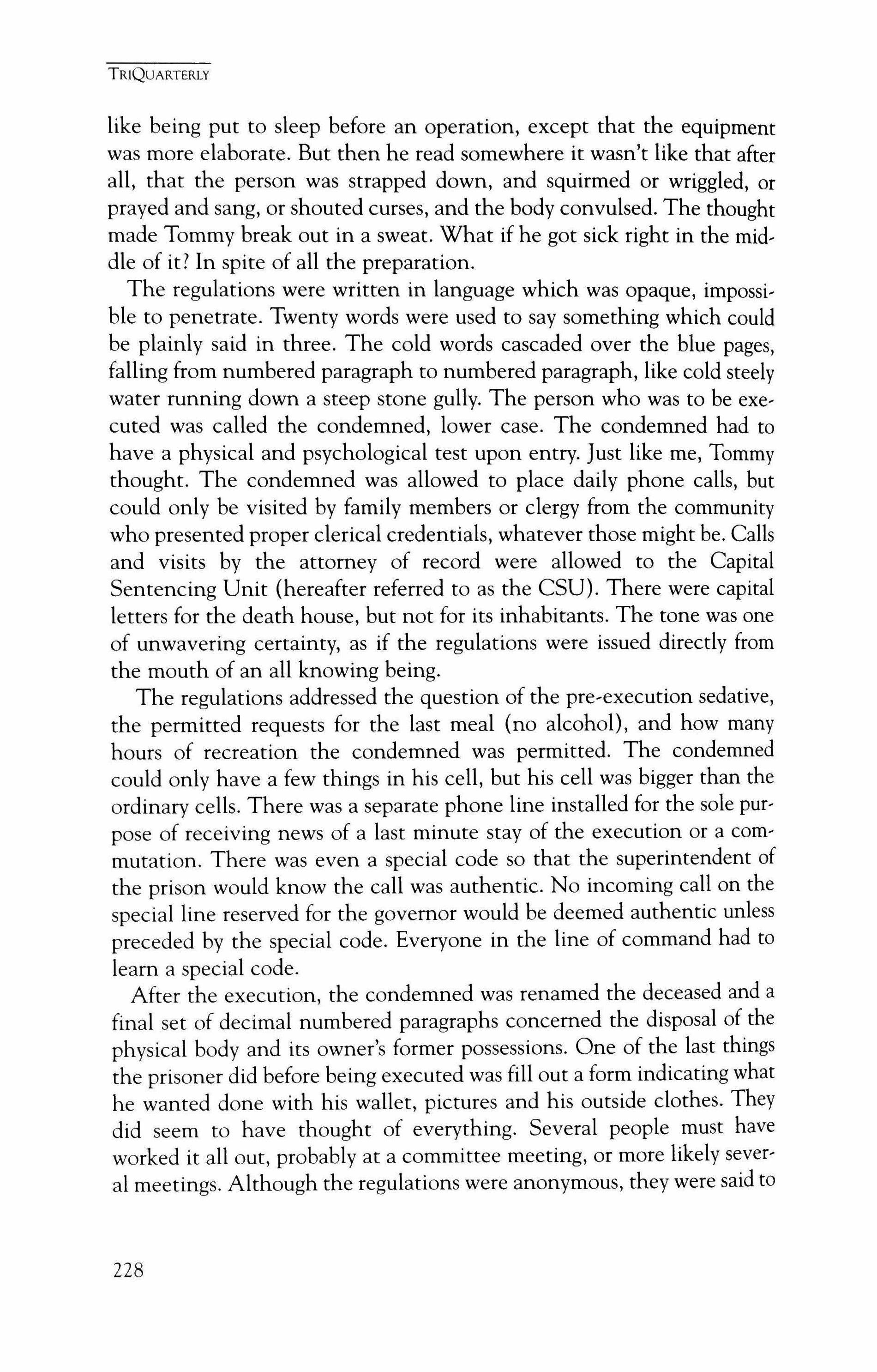
TRIQUARTERLY
like being put to sleep before an operation, except that the equipment was more elaborate. But then he read somewhere it wasn't like that after all, that the person was strapped down, and squirmed or wriggled, or prayed and sang, or shouted curses, and the body convulsed. The thought made Tommy break out in a sweat. What if he got sick right in the middle of it? In spite of all the preparation.
The regulations were written in language which was opaque, impossible to penetrate. Twenty words were used to say something which could be plainly said in three. The cold words cascaded over the blue pages, falling from numbered paragraph to numbered paragraph, like cold steely water running down a steep stone gully. The person who was to be executed was called the condemned, lower case. The condemned had to have a physical and psychological test upon entry. Just like me, Tommy thought. The condemned was allowed to place daily phone calls, but could only be visited by family members or clergy from the community who presented proper clerical credentials, whatever those might be. Calls and visits by the attorney of record were allowed to the Capital Sentencing Unit (hereafter referred to as the CSU). There were capital letters for the death house, but not for its inhabitants. The tone was one of unwavering certainty, as if the regulations were issued directly from the mouth of an all knowing being.
The regulations addressed the question of the pre-execution sedative, the permitted requests for the last meal (no alcohol), and how many hours of recreation the condemned was permitted. The condemned could only have a few things in his cell, but his cell was bigger than the ordinary cells. There was a separate phone line installed for the sole purpose of receiving news of a last minute stay of the execution or a commutation. There was even a special code so that the superintendent of the prison would know the call was authentic. No incoming call on the special line reserved for the governor would be deemed authentic unless preceded by the special code. Everyone in the line of command had to learn a special code.
After the execution, the condemned was renamed the deceased and a final set of decimal numbered paragraphs concerned the disposal of the physical body and its owner's former possessions. One of the last things the prisoner did before being executed was fill out a form indicating what he wanted done with his wallet, pictures and his outside clothes. They did seem to have thought of everything. Several people must have worked it all out, probably at a committee meeting, or more likely several meetings. Although the regulations were anonymous, they were said to
228
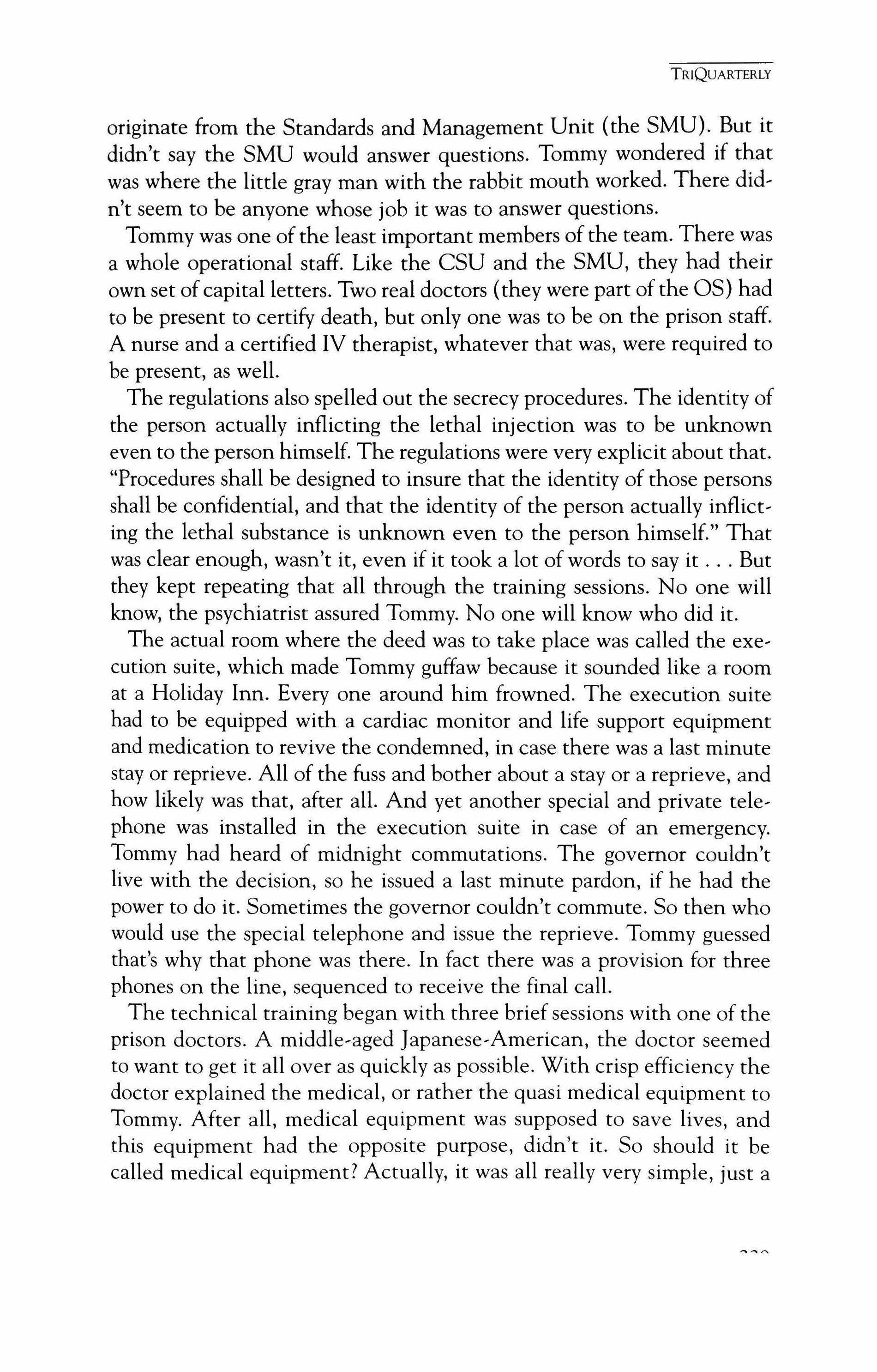
originate from the Standards and Management Unit (the SMU). But it didn't say the SMU would answer questions. Tommy wondered if that was where the little gray man with the rabbit mouth worked. There did, n't seem to be anyone whose job it was to answer questions.
Tommy was one of the least important members of the team. There was a whole operational staff. Like the CSU and the SMU, they had their own set ofcapital letters. Two real doctors (they were part of the OS) had to be present to certify death, but only one was to be on the prison staff. A nurse and a certified IV therapist, whatever that was, were required to be present, as well.
The regulations also spelled out the secrecy procedures. The identity of the person actually inflicting the lethal injection was to be unknown even to the person himself. The regulations were very explicit about that. "Procedures shall be designed to insure that the identity of those persons shall be confidential, and that the identity of the person actually inflict, ing the lethal substance is unknown even to the person himself." That was clear enough, wasn't it, even if it took a lot of words to say it But they kept repeating that all through the training sessions. No one will know, the psychiatrist assured Tommy. No one will know who did it.
The actual room where the deed was to take place was called the execution suite, which made Tommy guffaw because it sounded like a room at a Holiday Inn. Every one around him frowned. The execution suite had to be equipped with a cardiac monitor and life support equipment and medication to revive the condemned, in case there was a last minute stay or reprieve. All of the fuss and bother about a stay or a reprieve, and how likely was that, after all. And yet another special and private telephone was installed in the execution suite in case of an emergency. Tommy had heard of midnight commutations. The governor couldn't live with the decision, so he issued a last minute pardon, if he had the power to do it. Sometimes the governor couldn't commute. So then who would use the special telephone and issue the reprieve. Tommy guessed that's why that phone was there. In fact there was a provision for three phones on the line, sequenced to receive the final call.
The technical training began with three brief sessions with one of the prison doctors. A middle-aged [apanese-American, the doctor seemed to want to get it all over as quickly as possible. With crisp efficiency the doctor explained the medical, or rather the quasi medical equipment to Tommy. After all, medical equipment was supposed to save lives, and this equipment had the opposite purpose, didn't it. So should it be called medical equipment? Actually, it was all really very simple, just a
TRIQUARTERLY
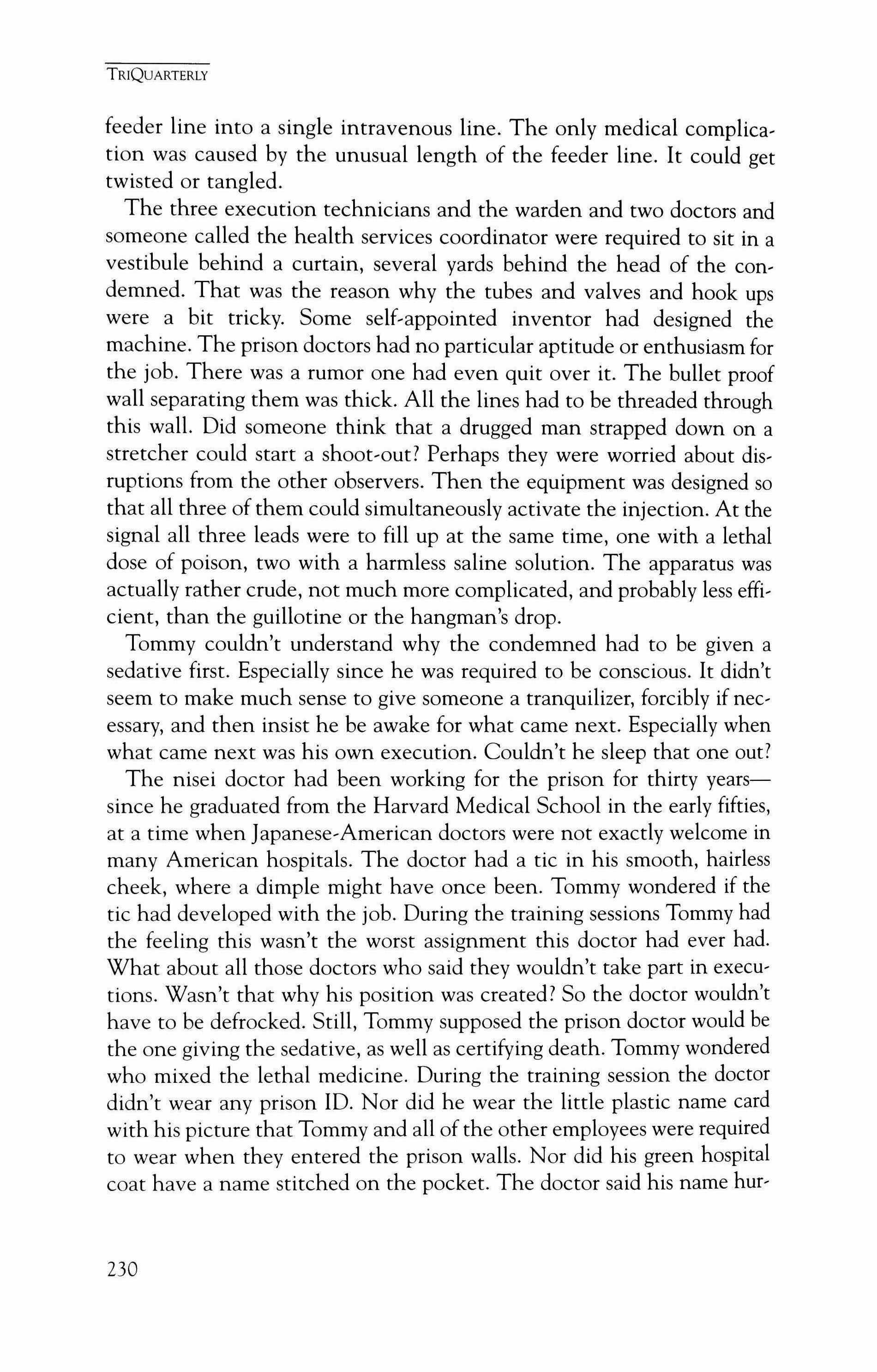
TRIQUARTERLY
feeder line into a single intravenous line. The only medical complication was caused by the unusual length of the feeder line. It could get twisted or tangled.
The three execution technicians and the warden and two doctors and someone called the health services coordinator were required to sit in a vestibule behind a curtain, several yards behind the head of the condemned. That was the reason why the tubes and valves and hook ups were a bit tricky. Some self-appointed inventor had designed the machine. The prison doctors had no particular aptitude or enthusiasm for the job. There was a rumor one had even quit over it. The bullet proof wall separating them was thick. All the lines had to be threaded through this wall. Did someone think that a drugged man strapped down on a stretcher could start a shoot-out? Perhaps they were worried about disruptions from the other observers. Then the equipment was designed so that all three of them could simultaneously activate the injection. At the signal all three leads were to fill up at the same time, one with a lethal dose of poison, two with a harmless saline solution. The apparatus was actually rather crude, not much more complicated, and probably less efficient, than the guillotine or the hangman's drop.
Tommy couldn't understand why the condemned had to be given a sedative first. Especially since he was required to be conscious. It didn't seem to make much sense to give someone a tranquilizer, forcibly if necessary, and then insist he be awake for what came next. Especially when what came next was his own execution. Couldn't he sleep that one out?
The nisei doctor had been working for the prison for thirty yearssince he graduated from the Harvard Medical School in the early fifties, at a time when Japanese-American doctors were not exactly welcome in many American hospitals. The doctor had a tic in his smooth, hairless cheek, where a dimple might have once been. Tommy wondered if the tic had developed with the job. During the training sessions Tommy had the feeling this wasn't the worst assignment this doctor had ever had. What about all those doctors who said they wouldn't take part in executions. Wasn't that why his position was created? So the doctor wouldn't have to be defrocked. Still, Tommy supposed the prison doctor would be the one giving the sedative, as well as certifying death. Tommy wondered who mixed the lethal medicine. During the training session the doctor didn't wear any prison ID. Nor did he wear the little plastic name card with his picture that Tommy and all of the other employees were required to wear when they entered the prison walls. Nor did his green hospital coat have a name stitched on the pocket. The doctor said his name hur-
230
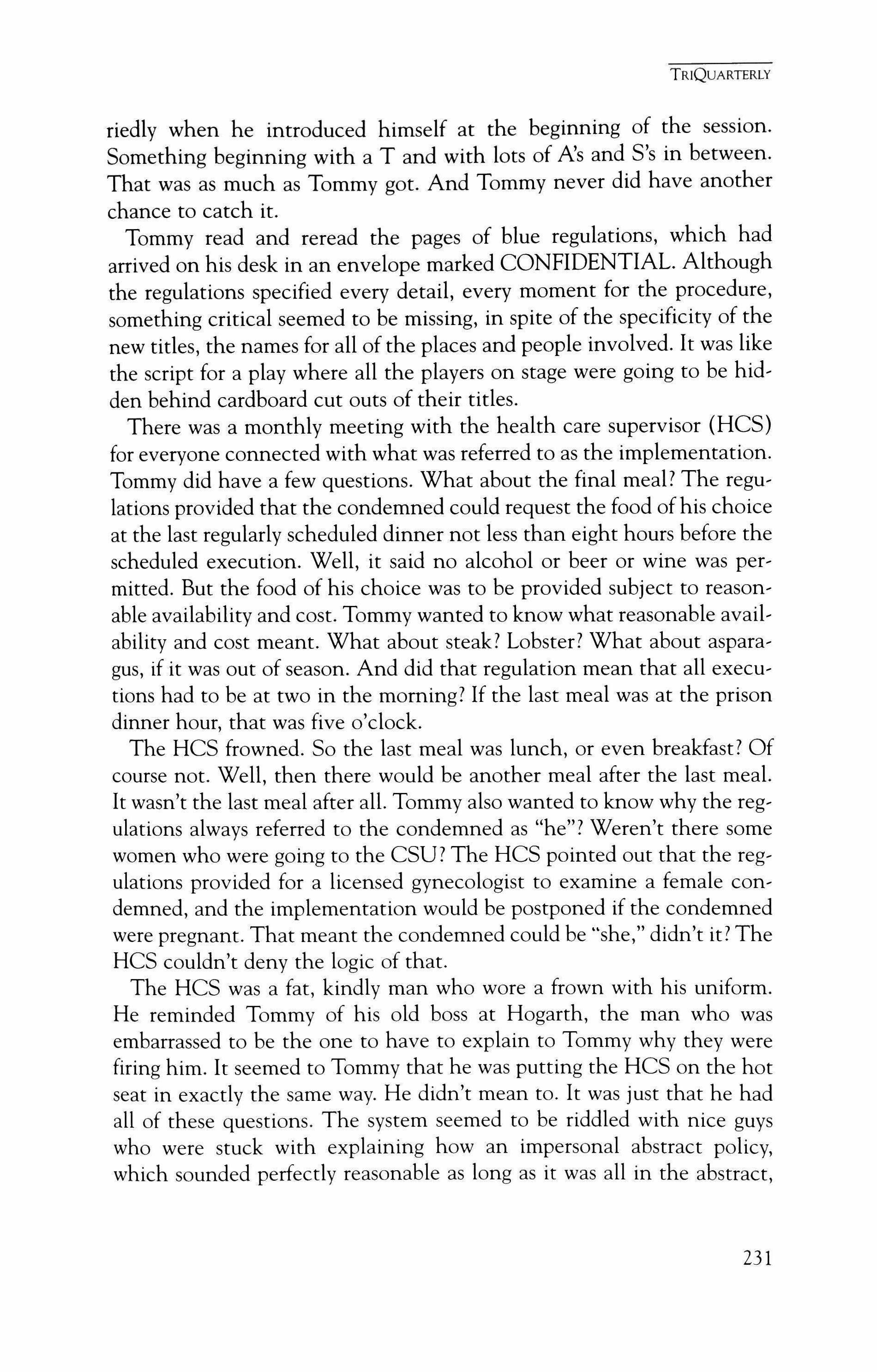
riedly when he introduced himself at the beginning of the session. Something beginning with a T and with lots of Ns and S's in between. That was as much as Tommy got. And Tommy never did have another chance to catch it.
Tommy read and reread the pages of blue regulations, which had arrived on his desk in an envelope marked CONFIDENTIAL. Although the regulations specified every detail, every moment for the procedure, something critical seemed to be missing, in spite of the specificity of the new titles, the names for all of the places and people involved. It was like the script for a play where all the players on stage were going to be hidden behind cardboard cut outs of their titles.
There was a monthly meeting with the health care supervisor (HCS) for everyone connected with what was referred to as the implementation. Tommy did have a few questions. What about the final meal? The regulations provided that the condemned could request the food of his choice at the last regularly scheduled dinner not less than eight hours before the scheduled execution. Well, it said no alcohol or beer or wine was permitted. But the food of his choice was to be provided subject to reasonable availability and cost. Tommy wanted to know what reasonable availability and cost meant. What about steak? Lobster? What about asparagus, if it was out of season. And did that regulation mean that all executions had to be at two in the morning? If the last meal was at the prison dinner hour, that was five o'clock.
The HCS frowned. So the last meal was lunch, or even breakfast? Of course not. Well, then there would be another meal after the last meal. It wasn't the last meal after all. Tommy also wanted to know why the regulations always referred to the condemned as "he"? Weren't there some women who were going to the CSU? The HCS pointed out that the regulations provided for a licensed gynecologist to examine a female condemned, and the implementation would be postponed if the condemned were pregnant. That meant the condemned could be "she," didn't it? The HCS couldn't deny the logic of that.
The HCS was a fat, kindly man who wore a frown with his uniform. He reminded Tommy of his old boss at Hogarth, the man who was embarrassed to be the one to have to explain to Tommy why they were firing him. It seemed to Tommy that he was putting the HCS on the hot seat in exactly the same way. He didn't mean to. It was just that he had all of these questions. The system seemed to be riddled with nice guys who were stuck with explaining how an impersonal abstract policy, which sounded perfectly reasonable as long as it was all in the abstract,
TRIQUARTERLY
231
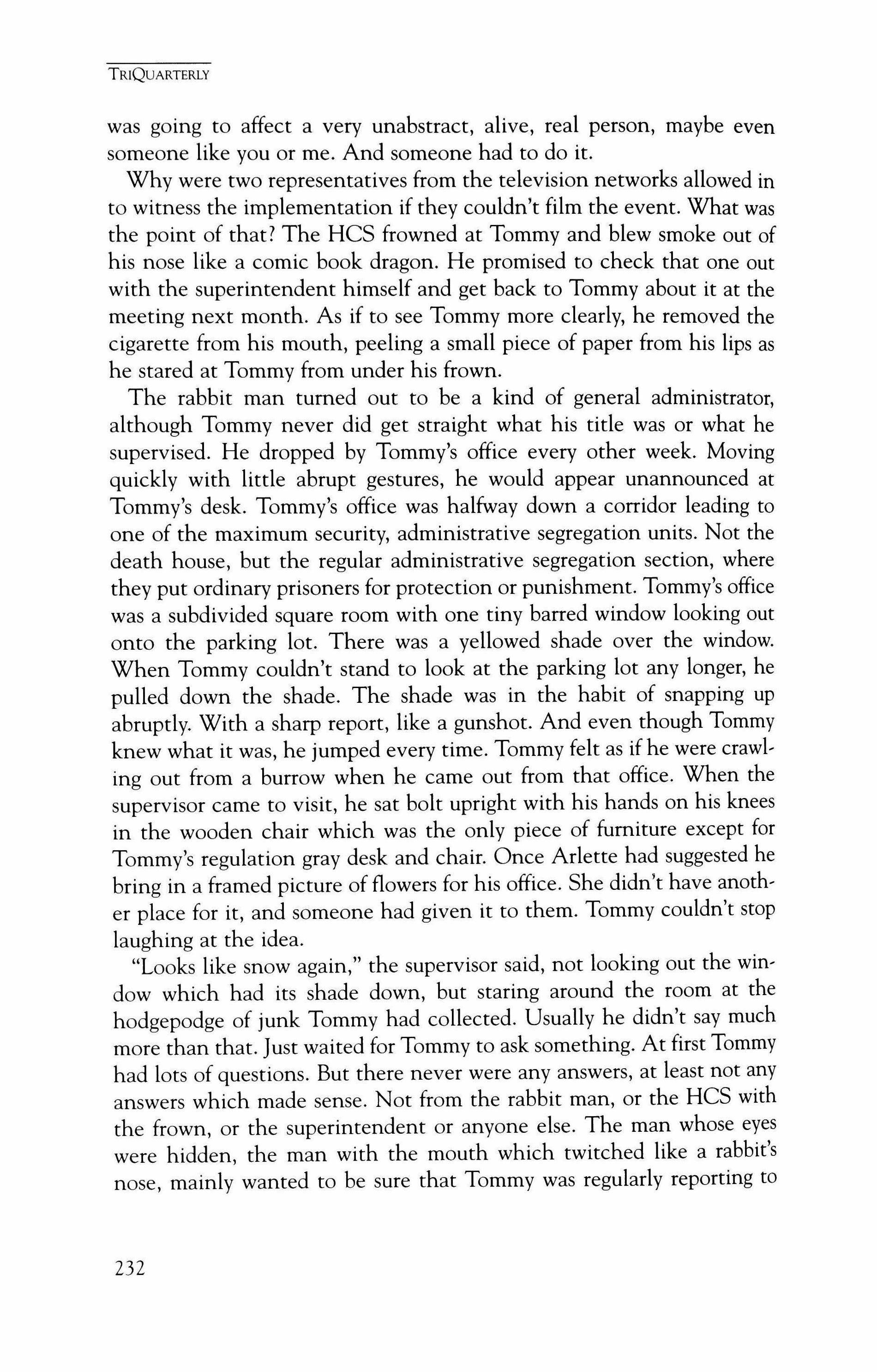
was going to affect a very unabstract, alive, real person, maybe even someone like you or me. And someone had to do it.
Why were two representatives from the television networks allowed in to witness the implementation if they couldn't film the event. What was the point of that? The HCS frowned at Tommy and blew smoke out of his nose like a comic book dragon. He promised to check that one out with the superintendent himself and get back to Tommy about it at the meeting next month. As if to see Tommy more clearly, he removed the cigarette from his mouth, peeling a small piece of paper from his lips as he stared at Tommy from under his frown.
The rabbit man turned out to be a kind of general administrator, although Tommy never did get straight what his title was or what he supervised. He dropped by Tommy's office every other week. Moving quickly with little abrupt gestures, he would appear unannounced at Tommy's desk. Tommy's office was halfway down a corridor leading to one of the maximum security, administrative segregation units. Not the death house, but the regular administrative segregation section, where they put ordinary prisoners for protection or punishment. Tommy's office was a subdivided square room with one tiny barred window looking out onto the parking lot. There was a yellowed shade over the window. When Tommy couldn't stand to look at the parking lot any longer, he pulled down the shade. The shade was in the habit of snapping up abruptly. With a sharp report, like a gunshot. And even though Tommy knew what it was, he jumped every time. Tommy felt as if he were crawling out from a burrow when he came out from that office. When the supervisor came to visit, he sat bolt upright with his hands on his knees in the wooden chair which was the only piece of furniture except for Tommy's regulation gray desk and chair. Once Arlette had suggested he bring in a framed picture of flowers for his office. She didn't have another place for it, and someone had given it to them. Tommy couldn't stop laughing at the idea.
"Looks like snow again," the supervisor said, not looking out the window which had its shade down, but staring around the room at the hodgepodge of junk Tommy had collected. Usually he didn't say much more than that. Just waited for Tommy to ask something. At first Tommy had lots of questions. But there never were any answers, at least not any answers which made sense. Not from the rabbit man, or the HCS with the frown, or the superintendent or anyone else. The man whose eyes were hidden, the man with the mouth which twitched like a rabbit's nose, mainly wanted to be sure that Tommy was regularly reporting to
TRIQUARTERLY
232
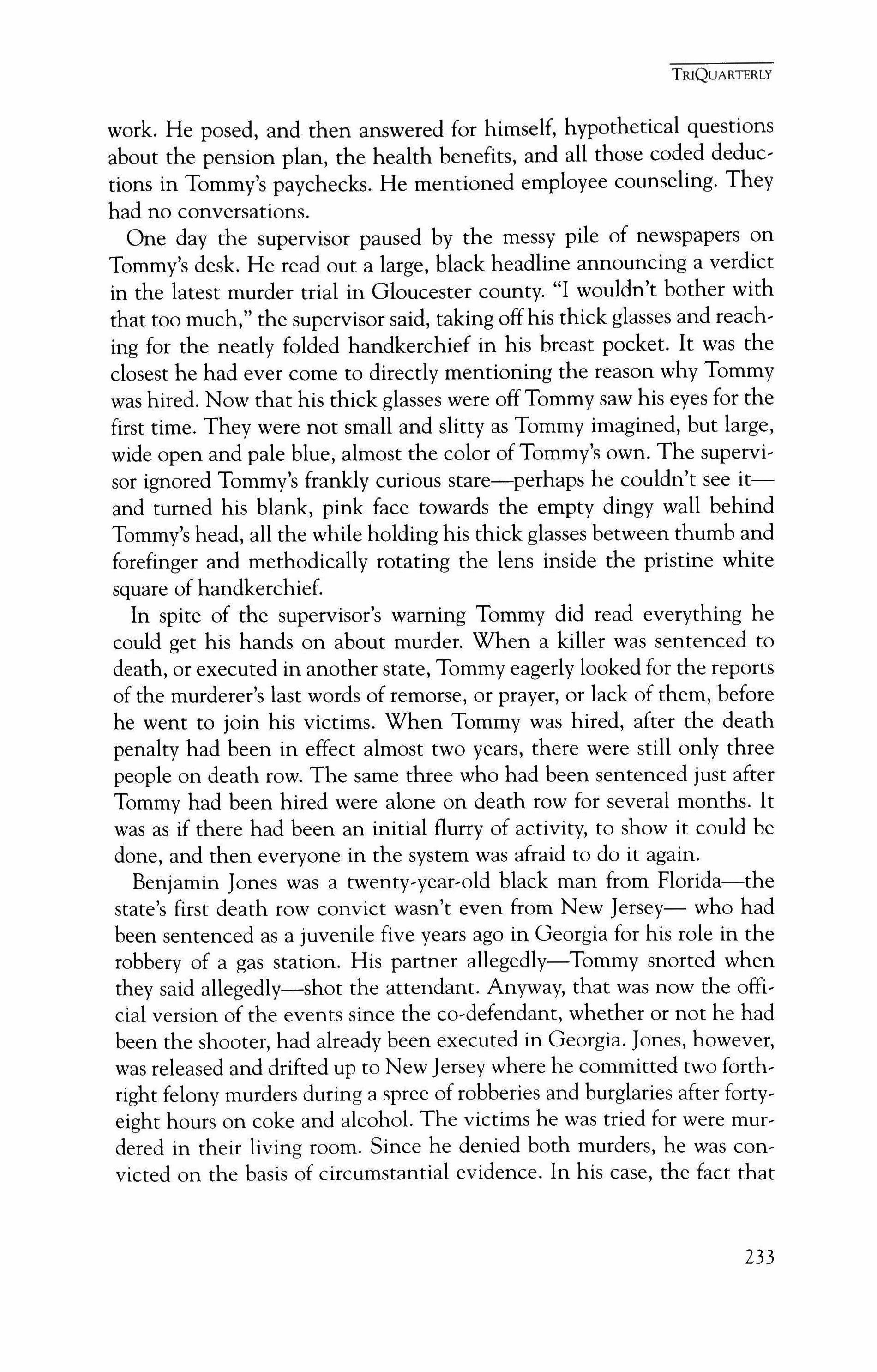
work. He posed, and then answered for himself, hypothetical questions about the pension plan, the health benefits, and all those coded deductions in Tommy's paychecks. He mentioned employee counseling. They had no conversations.
One day the supervisor paused by the messy pile of newspapers on Tommy's desk. He read out a large, black headline announcing a verdict in the latest murder trial in Gloucester county. "I wouldn't bother with that too much," the supervisor said, taking offhis thick glasses and reaching for the neatly folded handkerchief in his breast pocket. It was the closest he had ever come to directly mentioning the reason why Tommy was hired. Now that his thick glasses were offTommy saw his eyes for the first time. They were not small and slitry as Tommy imagined, but large, wide open and pale blue, almost the color of Tommy's own. The supervisor ignored Tommy's frankly curious stare-perhaps he couldn't see itand turned his blank, pink face towards the empty dingy wall behind Tommy's head, all the while holding his thick glasses between thumb and forefinger and methodically rotating the lens inside the pristine white square of handkerchief.
In spite of the supervisor's warning Tommy did read everything he could get his hands on about murder. When a killer was sentenced to death, or executed in another state, Tommy eagerly looked for the reports of the murderer's last words of remorse, or prayer, or lack of them, before he went to join his victims. When Tommy was hired, after the death penalty had been in effect almost two years, there were still only three people on death row. The same three who had been sentenced just after Tommy had been hired were alone on death row for several months. It was as if there had been an initial flurry of activity, to show it could be done, and then everyone in the system was afraid to do it again.
Benjamin Jones was a twenty-year-old black man from Florida-the state's first death row convict wasn't even from New Jersey- who had been sentenced as a juvenile five years ago in Georgia for his role in the robbery of a gas station. His partner allegedly-Tommy snorted when they said allegedly-shot the attendant. Anyway, that was now the official version of the events since the co-defendant, whether or not he had been the shooter, had already been executed in Georgia. Jones, however, was released and drifted up to New Jersey where he committed two forthright felony murders during a spree of robberies and burglaries after fortyeight hours on coke and alcohol. The victims he was tried for were murdered in their living room. Since he denied both murders, he was convicted on the basis of circumstantial evidence. In his case, the fact that
TRIQUARTERLY
233
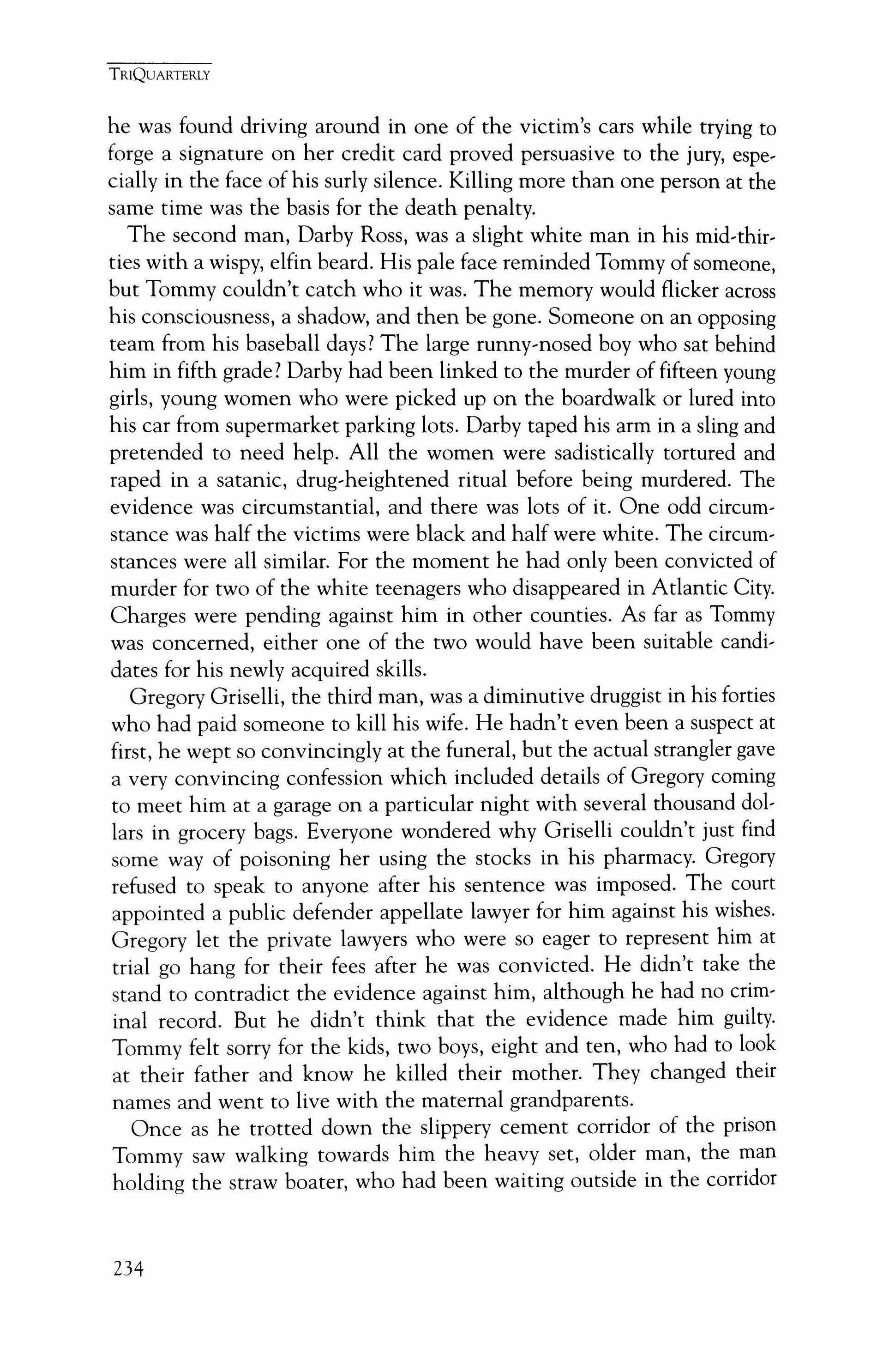
TRIQUARTERLY
he was found driving around in one of the victim's cars while trying to forge a signature on her credit card proved persuasive to the jury, especially in the face of his surly silence. Killing more than one person at the same time was the basis for the death penalty.
The second man, Darby Ross, was a slight white man in his mid-thirties with a wispy, elfin beard. His pale face reminded Tommy of someone, but Tommy couldn't catch who it was. The memory would flicker across his consciousness, a shadow, and then be gone. Someone on an opposing team from his baseball days? The large runny-nosed boy who sat behind him in fifth grade? Darby had been linked to the murder of fifteen young girls, young women who were picked up on the boardwalk or lured into his car from supermarket parking lots. Darby taped his arm in a sling and pretended to need help. All the women were sadistically tortured and raped in a satanic, drug-heightened ritual before being murdered. The evidence was circumstantial, and there was lots of it. One odd circumstance was half the victims were black and half were white. The circumstances were all similar. For the moment he had only been convicted of murder for two of the white teenagers who disappeared in Atlantic City. Charges were pending against him in other counties. As far as Tommy was concerned, either one of the two would have been suitable candidates for his newly acquired skills.
Gregory Griselli, the third man, was a diminutive druggist in his forties who had paid someone to kill his wife. He hadn't even been a suspect at first, he wept so convincingly at the funeral, but the actual strangler gave a very convincing confession which included details of Gregory coming to meet him at a garage on a particular night with several thousand dollars in grocery bags. Everyone wondered why Griselli couldn't just find some way of poisoning her using the stocks in his pharmacy. Gregory refused to speak to anyone after his sentence was imposed. The court appointed a public defender appellate lawyer for him against his wishes. Gregory let the private lawyers who were so eager to represent him at trial go hang for their fees after he was convicted. He didn't take the stand to contradict the evidence against him, although he had no criminal record. But he didn't think that the evidence made him guilty. Tommy felt sorry for the kids, two boys, eight and ten, who had to look at their father and know he killed their mother. They changed their names and went to live with the maternal grandparents. Once as he trotted down the slippery cement corridor of the prison Tommy saw walking towards him the heavy set, older man, the man holding the straw boater, who had been waiting outside in the corridor
234
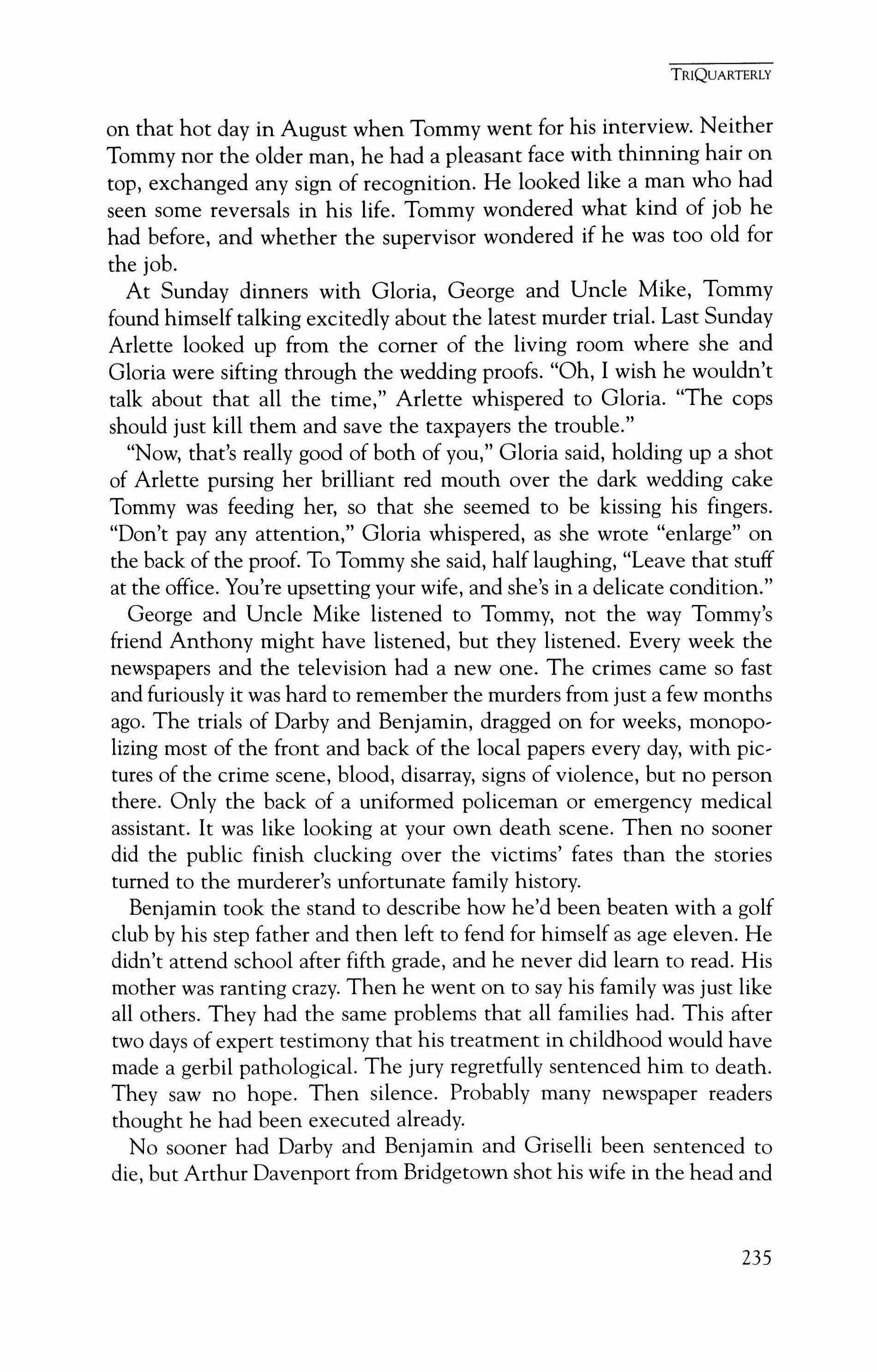
on that hot day in August when Tommy went for his interview. Neither Tommy nor the older man, he had a pleasant face with thinning hair on top, exchanged any sign of recognition. He looked like a man who had seen some reversals in his life. Tommy wondered what kind of job he had before, and whether the supervisor wondered if he was too old for the job.
At Sunday dinners with Gloria, George and Uncle Mike, Tommy found himself talking excitedly about the latest murder trial. Last Sunday Arlette looked up from the comer of the living room where she and Gloria were sifting through the wedding proofs. "Oh, I wish he wouldn't talk about that all the time," Arlette whispered to Gloria. "The cops should just kill them and save the taxpayers the trouble."
"Now, that's really good of both of you," Gloria said, holding up a shot of Arlette pursing her brilliant red mouth over the dark wedding cake Tommy was feeding her, so that she seemed to be kissing his fingers. "Don't pay any attention," Gloria whispered, as she wrote "enlarge" on the back of the proof. To Tommy she said, half laughing, "Leave that stuff at the office. You're upsetting your wife, and she's in a delicate condition."
George and Uncle Mike listened to Tommy, not the way Tommy's friend Anthony might have listened, but they listened. Every week the newspapers and the television had a new one. The crimes came so fast and furiously it was hard to remember the murders from just a few months ago. The trials of Darby and Benjamin, dragged on for weeks, monopolizing most of the front and back of the local papers every day, with pictures of the crime scene, blood, disarray, signs of violence, but no person there. Only the back of a uniformed policeman or emergency medical assistant. It was like looking at your own death scene. Then no sooner did the public finish clucking over the victims' fates than the stories turned to the murderer's unfortunate family history.
Benjamin took the stand to describe how he'd been beaten with a golf club by his step father and then left to fend for himself as age eleven. He didn't attend school after fifth grade, and he never did learn to read. His mother was ranting crazy. Then he went on to say his family was just like all others. They had the same problems that all families had. This after two days of expert testimony that his treatment in childhood would have made a gerbil pathological. The jury regretfully sentenced him to death. They saw no hope. Then silence. Probably many newspaper readers thought he had been executed already.
No sooner had Darby and Benjamin and Griselli been sentenced to die, but Arthur Davenport from Bridgetown shot his wife in the head and 235
TRIQUARTERLY
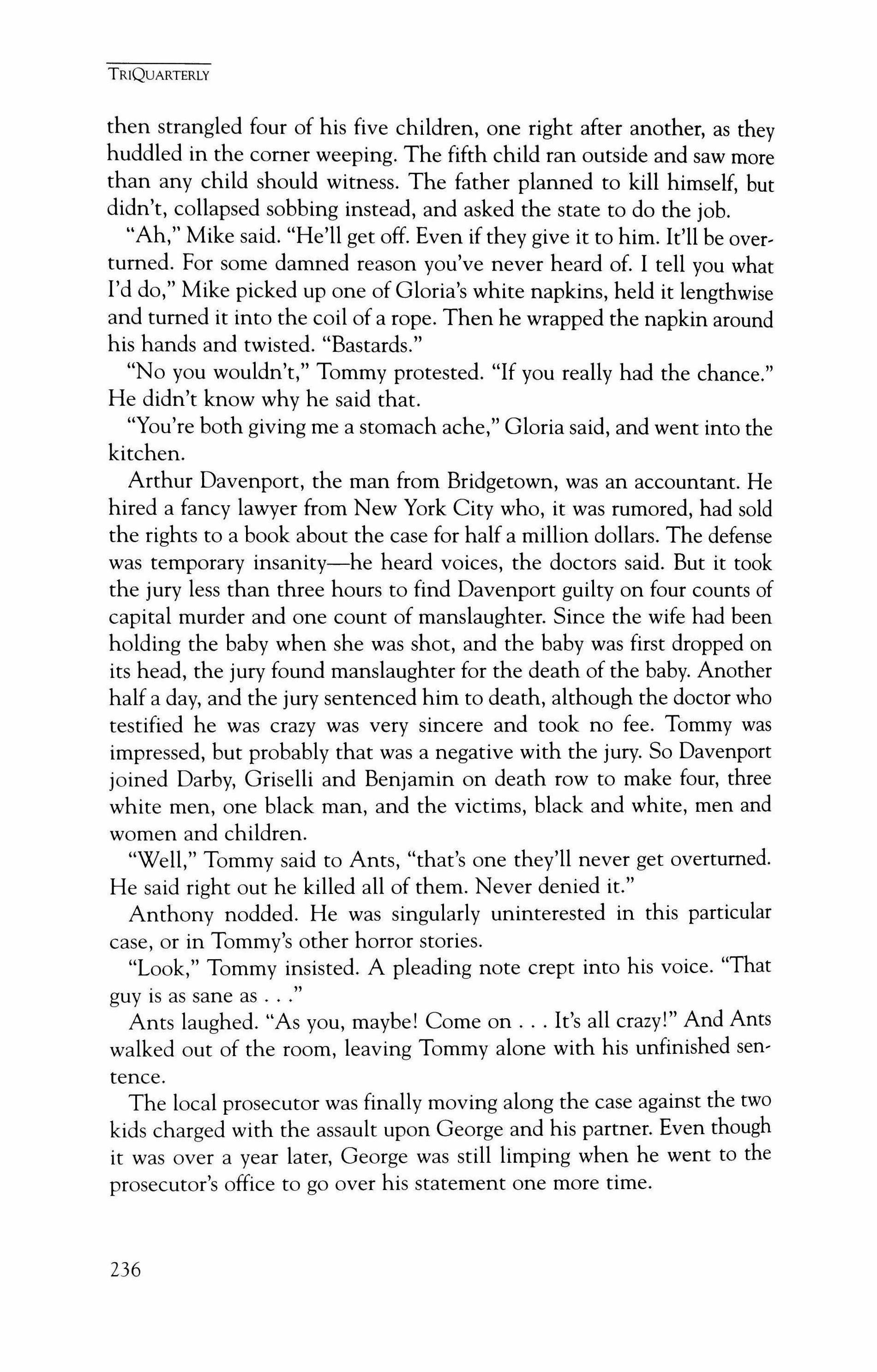
then strangled four of his five children, one right after another, as they huddled in the comer weeping. The fifth child ran outside and saw more than any child should witness. The father planned to kill himself, but didn't, collapsed sobbing instead, and asked the state to do the job.
"Ah," Mike said. "He'll get off. Even if they give it to him. It'll be overturned. For some damned reason you've never heard of. I tell you what I'd do," Mike picked up one of Gloria's white napkins, held it lengthwise and turned it into the coil of a rope. Then he wrapped the napkin around his hands and twisted. "Bastards."
"No you wouldn't," Tommy protested. "If you really had the chance." He didn't know why he said that.
"You're both giving me a stomach ache," Gloria said, and went into the kitchen.
Arthur Davenport, the man from Bridgetown, was an accountant. He hired a fancy lawyer from New York City who, it was rumored, had sold the rights to a book about the case for half a million dollars. The defense was temporary insanity-he heard voices, the doctors said. But it took the jury less than three hours to find Davenport guilty on four counts of capital murder and one count of manslaughter. Since the wife had been holding the baby when she was shot, and the baby was first dropped on its head, the jury found manslaughter for the death of the baby. Another half a day, and the jury sentenced him to death, although the doctor who testified he was crazy was very sincere and took no fee. Tommy was impressed, but probably that was a negative with the jury. So Davenport joined Darby, Griselli and Benjamin on death row to make four, three white men, one black man, and the victims, black and white, men and women and children.
"Well," Tommy said to Ants, "that's one they'll never get overturned. He said right out he killed all of them. Never denied it."
Anthony nodded. He was singularly uninterested in this particular case, or in Tommy's other horror stories.
"Look," Tommy insisted. A pleading note crept into his voice. "That guy IS as sane as
Ants laughed. "As you, maybe! Come on It's all crazy!" And Ants walked out of the room, leaving Tommy alone with his unfinished sentence.
The local prosecutor was finally moving along the case against the two kids charged with the assault upon George and his partner. Even though it was over a year later, George was still limping when he went to the prosecutor's office to go over his statement one more time.
TRIQUARTERLY
236

"One wore a mask," George said to Tommy. "At the line up I wasn't sure. But my partner picked him right out. It must be the right ones." Turned out the two punks-neither of them had ever worked a day in his life-were out on bail and waiting trial on an almost identical robbery in another town when George and his partner were attacked. They didn't get much from that robbery either. Nor had they learned anything from being in jail. The judge let them out because they were supposed to be in school, and because no one had been seriously hurt. But one of the men went on disability because he was afraid to come back to work. George kept asking Mike what he thought would happen this time.
"Don't tell your Dad," Uncle Mike said in a whisper when Tommy asked the same question, "but the case will plead out. They'll probably get time served." Apparently the evidence wasn't considered particularly strong, in spite of the identification by both George and his partner and some marked bills. The two kids claimed to be elsewhere, home asleep in their beds like good boys.
"Punks," Mike said. "Besides, the prosecutor took one look at your dad and saw that he'd be a terrible witness." According to Mike the prosecutor could tell George would be shaky on the stand, that he would waver on the identification. The kids themselves would not be witnesses. They both had arrests and a couple of convictions, although neither one was twenty-one yet.
"But why?" Tommy asked again. How could anyone not believe and trust his father, or at least feel sorry for him. The more Tommy read about lawyers, the picky little rules, the court formalities, and most of all about how long everything took, the less sense any of it made. The prosecutors would hang a desperate man who stole a loaf of bread to feed his starving children, and the defense attorneys would ask the jury to recommend the most rabid mass murderer for outpatient psychiatric counseling. The judges fell asleep on the bench, or didn't understand the arguments, and the police shot twelve-year-old kids in the back when they ran down the city alleys. Meanwhile those on bail or on parole, or awaiting trial, went on crime sprees as if violence was about to go out of style. And that didn't seem too likely. Or maybe it was just their last chance. Reading the daily newspapers could make a law abiding citizen want to round up his own neighborhood lynch mob. Finally, Tommy just concentrated upon the crimes themselves-weren't they horrible enough to justify any kind of punishment? Who cared how the defendants got to the execution suite, or when they had their last meal, or what it all cost.
Alone in his little cinder block office with its limited view of the facil-
TRIQUARTERLY
237
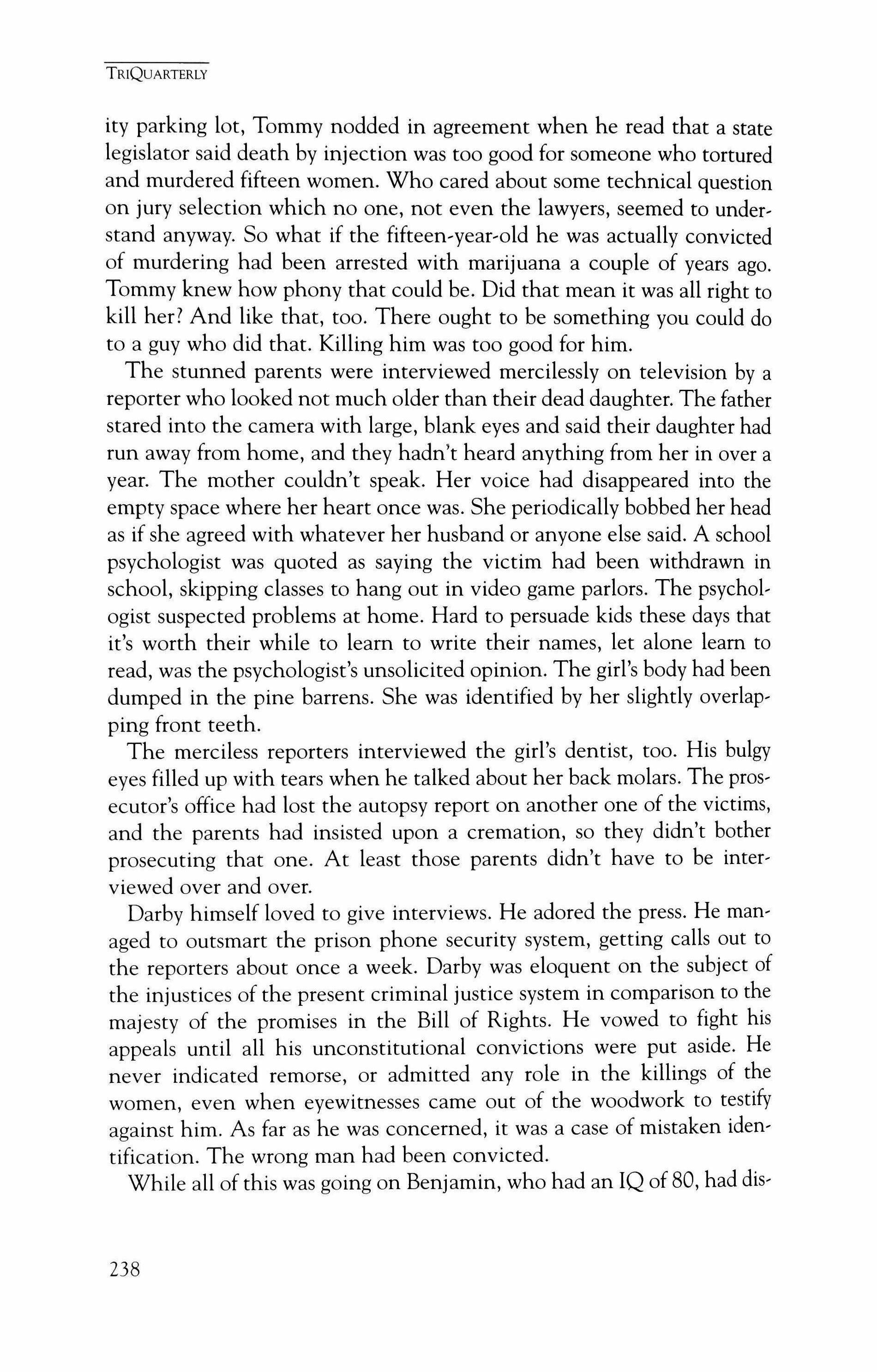
ity parking lot, Tommy nodded in agreement when he read that a state legislator said death by injection was too good for someone who tortured and murdered fifteen women. Who cared about some technical question on jury selection which no one, not even the lawyers, seemed to understand anyway. So what if the fifteen-year-old he was actually convicted of murdering had been arrested with marijuana a couple of years ago. Tommy knew how phony that could be. Did that mean it was all right to kill her? And like that, too. There ought to be something you could do to a guy who did that. Killing him was too good for him.
The stunned parents were interviewed mercilessly on television by a reporter who looked not much older than their dead daughter. The father stared into the camera with large, blank eyes and said their daughter had run away from home, and they hadn't heard anything from her in over a year. The mother couldn't speak. Her voice had disappeared into the empty space where her heart once was. She periodically bobbed her head as if she agreed with whatever her husband or anyone else said. A school psychologist was quoted as saying the victim had been withdrawn in school, skipping classes to hang out in video game parlors. The psychologist suspected problems at home. Hard to persuade kids these days that it's worth their while to learn to write their names, let alone learn to read, was the psychologist's unsolicited opinion. The girl's body had been dumped in the pine barrens. She was identified by her slightly overlapping front teeth.
The merciless reporters interviewed the girl's dentist, too. His bulgy eyes filled up with tears when he talked about her back molars. The prosecutor's office had lost the autopsy report on another one of the victims, and the parents had insisted upon a cremation, so they didn't bother prosecuting that one. At least those parents didn't have to be interviewed over and over.
Darby himself loved to give interviews. He adored the press. He managed to outsmart the prison phone security system, getting calls out to the reporters about once a week. Darby was eloquent on the subject of the injustices of the present criminal justice system in comparison to the majesty of the promises in the Bill of Rights. He vowed to fight his appeals until all his unconstitutional convictions were put aside. He never indicated remorse, or admitted any role in the killings of the women, even when eyewitnesses came out of the woodwork to testify against him. As far as he was concerned, it was a case of mistaken identification. The wrong man had been convicted.
While all of this was going on Benjamin, who had an IQ of 80, had dis-
TRIQUARTERLY
238
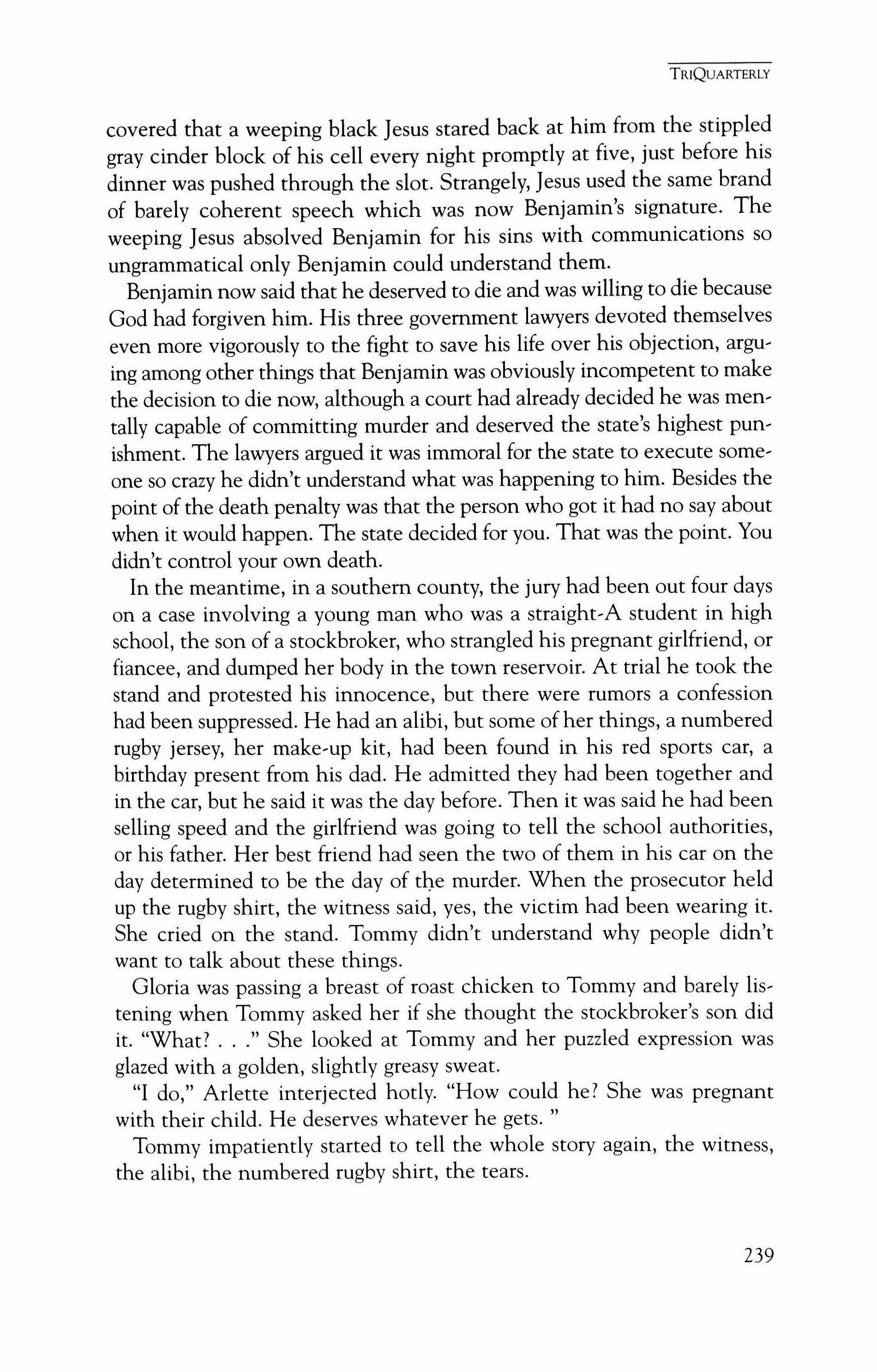
covered that a weeping black Jesus stared back at him from the stippled gray cinder block of his cell every night promptly at five, just before his dinner was pushed through the slot. Strangely, Jesus used the same brand of barely coherent speech which was now Benjamin's signature. The weeping Jesus absolved Benjamin for his sins with communications so ungrammatical only Benjamin could understand them.
Benjamin now said that he deserved to die and was willing to die because God had forgiven him. His three government lawyers devoted themselves even more vigorously to the fight to save his life over his objection, arguing among other things that Benjamin was obviously incompetent to make the decision to die now, although a court had already decided he was mentally capable of committing murder and deserved the state's highest punishment. The lawyers argued it was immoral for the state to execute someone so crazy he didn't understand what was happening to him. Besides the point of the death penalty was that the person who got it had no say about when it would happen. The state decided for you. That was the point. You didn't control your own death.
In the meantime, in a southern county, the jury had been out four days on a case involving a young man who was a straight-A student in high school, the son of a stockbroker, who strangled his pregnant girlfriend, or fiancee, and dumped her body in the town reservoir. At trial he took the stand and protested his innocence, but there were rumors a confession had been suppressed. He had an alibi, but some of her things, a numbered rugby jersey, her make-up kit, had been found in his red sports car, a birthday present from his dad. He admitted they had been together and in the car, but he said it was the day before. Then it was said he had been selling speed and the girlfriend was going to tell the school authorities, or his father. Her best friend had seen the two of them in his car on the day determined to be the day of the murder. When the prosecutor held up the rugby shirt, the witness said, yes, the victim had been wearing it. She cried on the stand. Tommy didn't understand why people didn't want to talk about these things.
Gloria was passing a breast of roast chicken to Tommy and barely listening when Tommy asked her if she thought the stockbroker's son did it. "What? She looked at Tommy and her puzzled expression was glazed with a golden, slightly greasy sweat.
"I do," Arlette interjected hotly. "How could he? She was pregnant with their child. He deserves whatever he gets. "
Tommy impatiently started to tell the whole story again, the witness, the alibi, the numbered rugby shirt, the tears.
TRIQUARTERLY
239
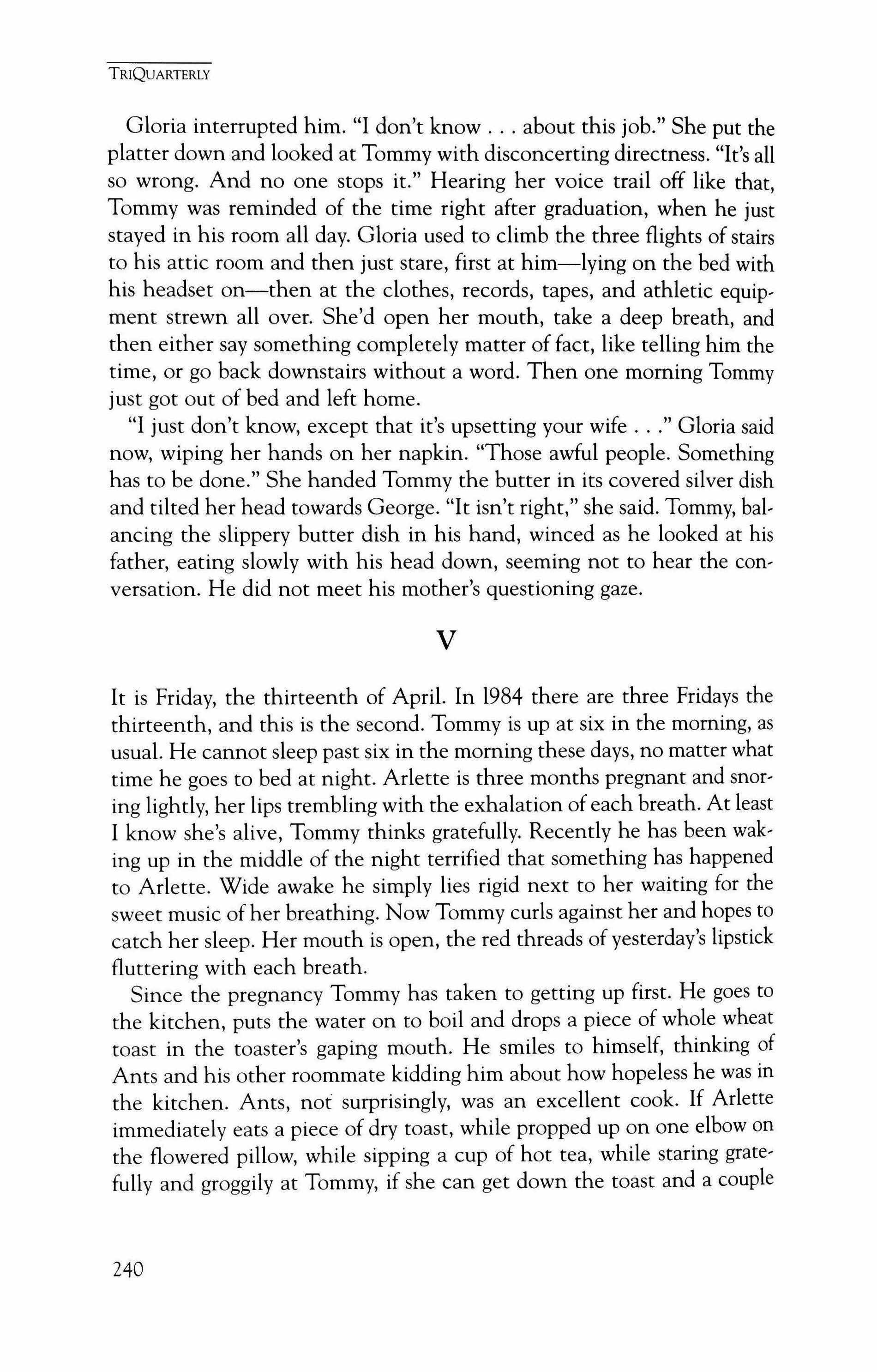
TRIQUARTERLY
Gloria interrupted him. "I don't know about this job." She put the platter down and looked at Tommy with disconcerting directness. "It's all so wrong. And no one stops it." Hearing her voice trail off like that, Tommy was reminded of the time right after graduation, when he just stayed in his room all day. Gloria used to climb the three flights of stairs to his attic room and then just stare, first at him-lying on the bed with his headset on-then at the clothes, records, tapes, and athletic equipment strewn all over. She'd open her mouth, take a deep breath, and then either say something completely matter of fact, like telling him the time, or go back downstairs without a word. Then one morning Tommy just got out of bed and left home.
"I just don't know, except that it's upsetting your wife Gloria said now, wiping her hands on her napkin. "Those awful people. Something has to be done." She handed Tommy the butter in its covered silver dish and tilted her head towards George. "It isn't right," she said. Tommy, balancing the slippery butter dish in his hand, winced as he looked at his father, eating slowly with his head down, seeming not to hear the conversation. He did not meet his mother's questioning gaze.
vIt is Friday, the thirteenth of April. In 1984 there are three Fridays the thirteenth, and this is the second. Tommy is up at six in the morning, as usual. He cannot sleep past six in the morning these days, no matter what time he goes to bed at night. Arlette is three months pregnant and snoring lightly, her lips trembling with the exhalation of each breath. At least I know she's alive, Tommy thinks gratefully. Recently he has been waking up in the middle of the night terrified that something has happened to Arlette. Wide awake he simply lies rigid next to her waiting for the sweet music ofher breathing. Now Tommy curls against her and hopes to catch her sleep. Her mouth is open, the red threads of yesterday's lipstick fluttering with each breath.
Since the pregnancy Tommy has taken to getting up first. He goes to the kitchen, puts the water on to boil and drops a piece of whole wheat toast in the toaster's gaping mouth. He smiles to himself, thinking of Ants and his other roommate kidding him about how hopeless he was in the kitchen. Ants, not surprisingly, was an excellent cook. If Arlette immediately eats a piece of dry toast, while propped up on one elbow on the flowered pillow, while sipping a cup of hot tea, while staring gratefully and groggily at Tommy, if she can get down the toast and a couple
240
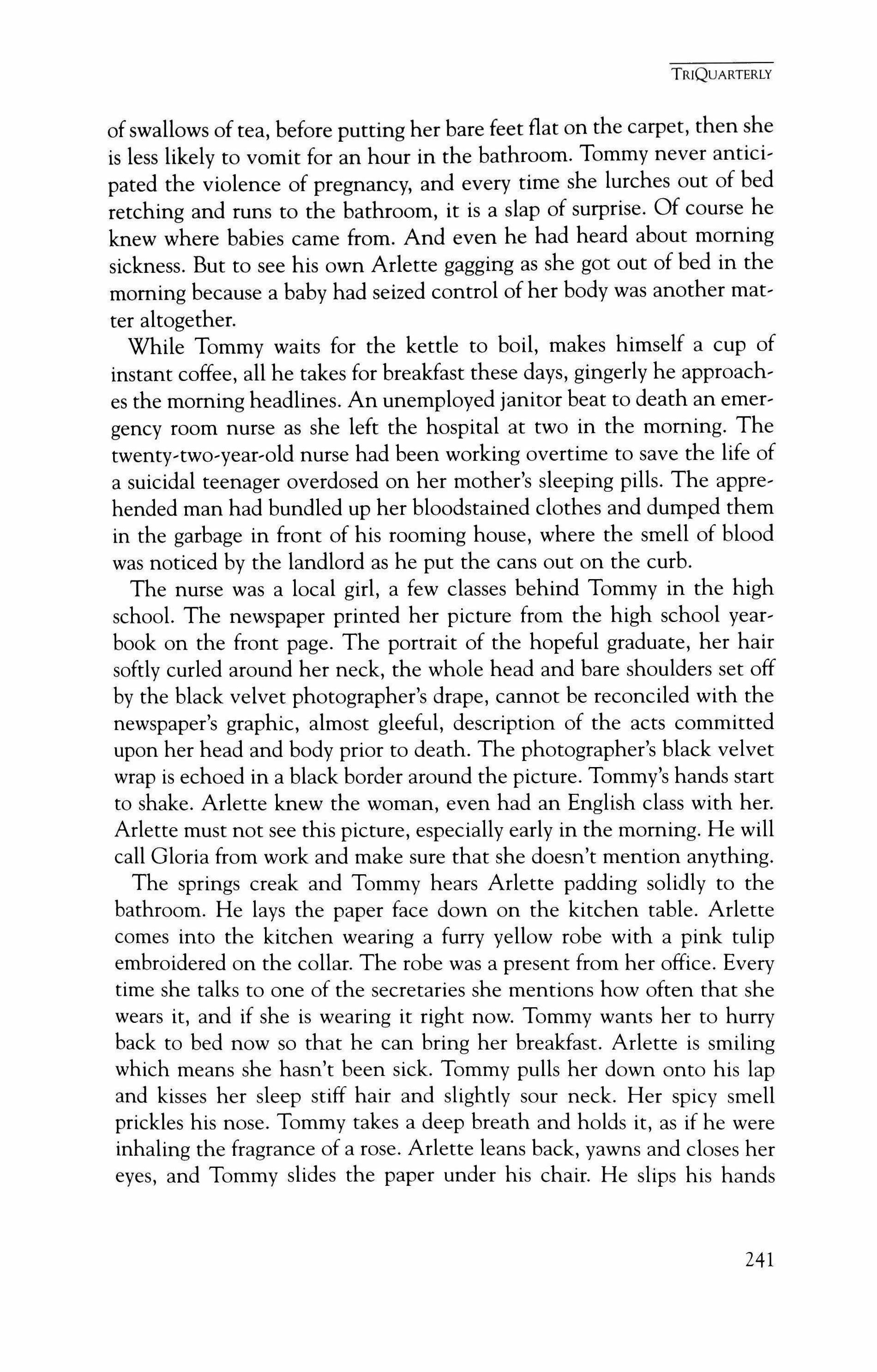
of swallows of tea, before putting her bare feet flat on the carpet, then she is less likely to vomit for an hour in the bathroom. Tommy never anticipated the violence of pregnancy, and every time she lurches out of bed retching and runs to the bathroom, it is a slap of surprise. Of course he knew where babies came from. And even he had heard about morning sickness. But to see his own Arlette gagging as she got out of bed in the morning because a baby had seized control of her body was another matter altogether.
While Tommy waits for the kettle to boil, makes himself a cup of instant coffee, all he takes for breakfast these days, gingerly he approaches the morning headlines. An unemployed janitor beat to death an emergency room nurse as she left the hospital at two in the morning. The twenty-two-year-old nurse had been working overtime to save the life of a suicidal teenager overdosed on her mother's sleeping pills. The apprehended man had bundled up her bloodstained clothes and dumped them in the garbage in front of his rooming house, where the smell of blood was noticed by the landlord as he put the cans out on the curb.
The nurse was a local girl, a few classes behind Tommy in the high school. The newspaper printed her picture from the high school yearbook on the front page. The portrait of the hopeful graduate, her hair softly curled around her neck, the whole head and bare shoulders set off by the black velvet photographer's drape, cannot be reconciled with the newspaper's graphic, almost gleeful, description of the acts committed upon her head and body prior to death. The photographer's black velvet wrap is echoed in a black border around the picture. Tommy's hands start to shake. Arlette knew the woman, even had an English class with her. Arlette must not see this picture, especially early in the morning. He will call Gloria from work and make sure that she doesn't mention anything.
The springs creak and Tommy hears Arlette padding solidly to the bathroom. He lays the paper face down on the kitchen table. Arlette comes into the kitchen wearing a furry yellow robe with a pink tulip embroidered on the collar. The robe was a present from her office. Every time she talks to one of the secretaries she mentions how often that she wears it, and if she is wearing it right now. Tommy wants her to hurry back to bed now so that he can bring her breakfast. Arlette is smiling which means she hasn't been sick. Tommy pulls her down onto his lap and kisses her sleep stiff hair and slightly sour neck. Her spicy smell prickles his nose. Tommy takes a deep breath and holds it, as if he were inhaling the fragrance of a rose. Arlette leans back, yawns and closes her eyes, and Tommy slides the paper under his chair. He slips his hands
TRIQUARTERLY
241
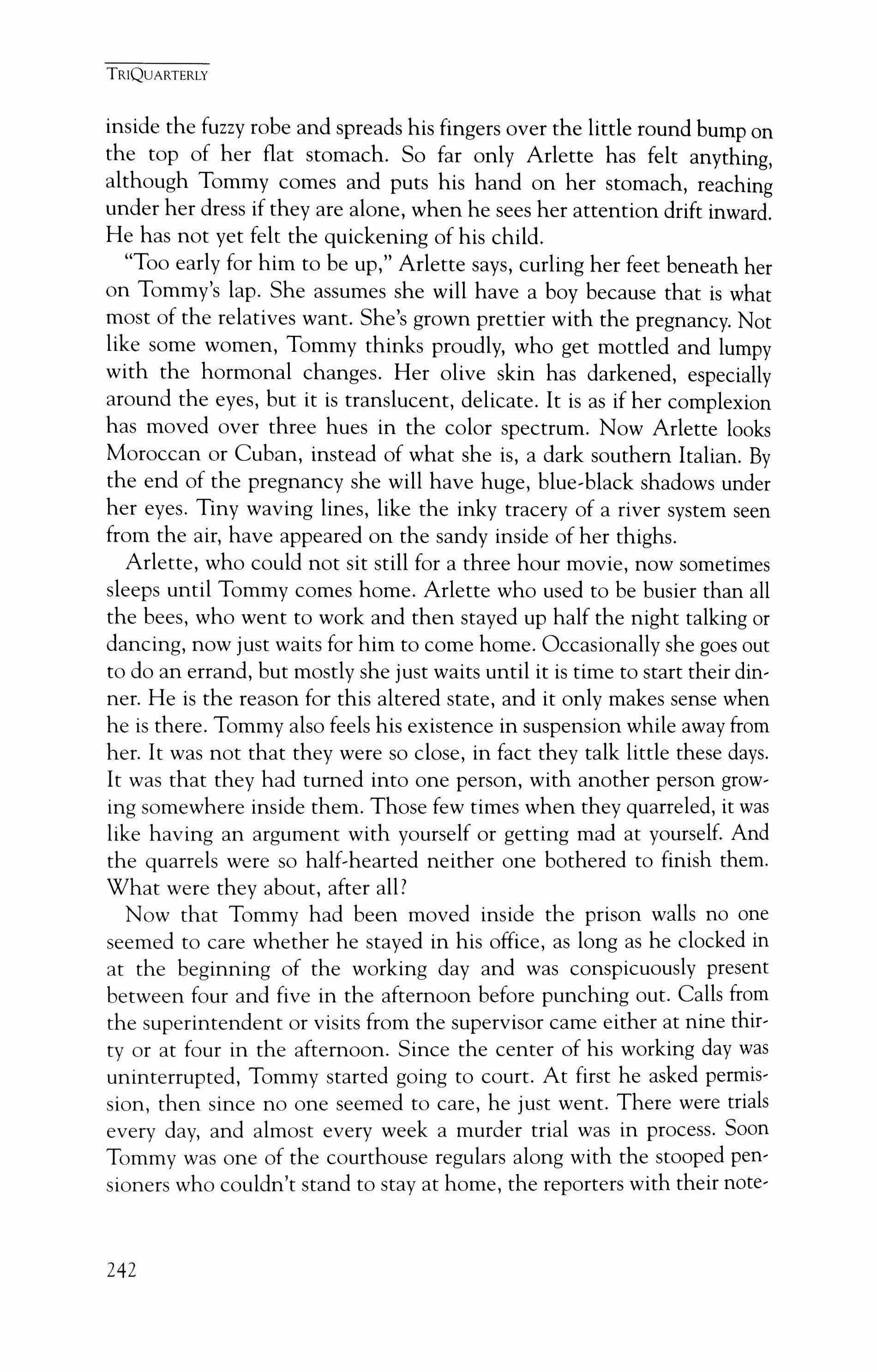
TRIQUARTERLY
inside the fuzzy robe and spreads his fingers over the little round bump on the top of her flat stomach. So far only Arlette has felt anything, although Tommy comes and puts his hand on her stomach, reaching under her dress if they are alone, when he sees her attention drift inward. He has not yet felt the quickening of his child.
"Too early for him to be up," Arlette says, curling her feet beneath her on Tommy's lap. She assumes she will have a boy because that is what most of the relatives want. She's grown prettier with the pregnancy. Not like some women, Tommy thinks proudly, who get mottled and lumpy with the hormonal changes. Her olive skin has darkened, especially around the eyes, but it is translucent, delicate. It is as if her complexion has moved over three hues in the color spectrum. Now Arlette looks Moroccan or Cuban, instead of what she is, a dark southern Italian. By the end of the pregnancy she will have huge, blue-black shadows under her eyes. Tiny waving lines, like the inky tracery of a river system seen from the air, have appeared on the sandy inside of her thighs.
Arlette, who could not sit still for a three hour movie, now sometimes sleeps until Tommy comes home. Arlette who used to be busier than all the bees, who went to work and then stayed up half the night talking or dancing, now just waits for him to come home. Occasionally she goes out to do an errand, but mostly she just waits until it is time to start their dinner. He is the reason for this altered state, and it only makes sense when he is there. Tommy also feels his existence in suspension while away from her. It was not that they were so close, in fact they talk little these days. It was that they had turned into one person, with another person growing somewhere inside them. Those few times when they quarreled, it was like having an argument with yourself or getting mad at yourself. And the quarrels were so half-hearted neither one bothered to finish them. What were they about, after all?
Now that Tommy had been moved inside the prison walls no one seemed to care whether he stayed in his office, as long as he clocked in at the beginning of the working day and was conspicuously present between four and five in the afternoon before punching out. Calls from the superintendent or visits from the supervisor came either at nine thirty or at four in the afternoon. Since the center of his working day was uninterrupted, Tommy started going to court. At first he asked permission, then since no one seemed to care, he just went. There were trials every day, and almost every week a murder trial was in process. Soon Tommy was one of the courthouse regulars along with the stooped pensioners who couldn't stand to stay at home, the reporters with their note-
242
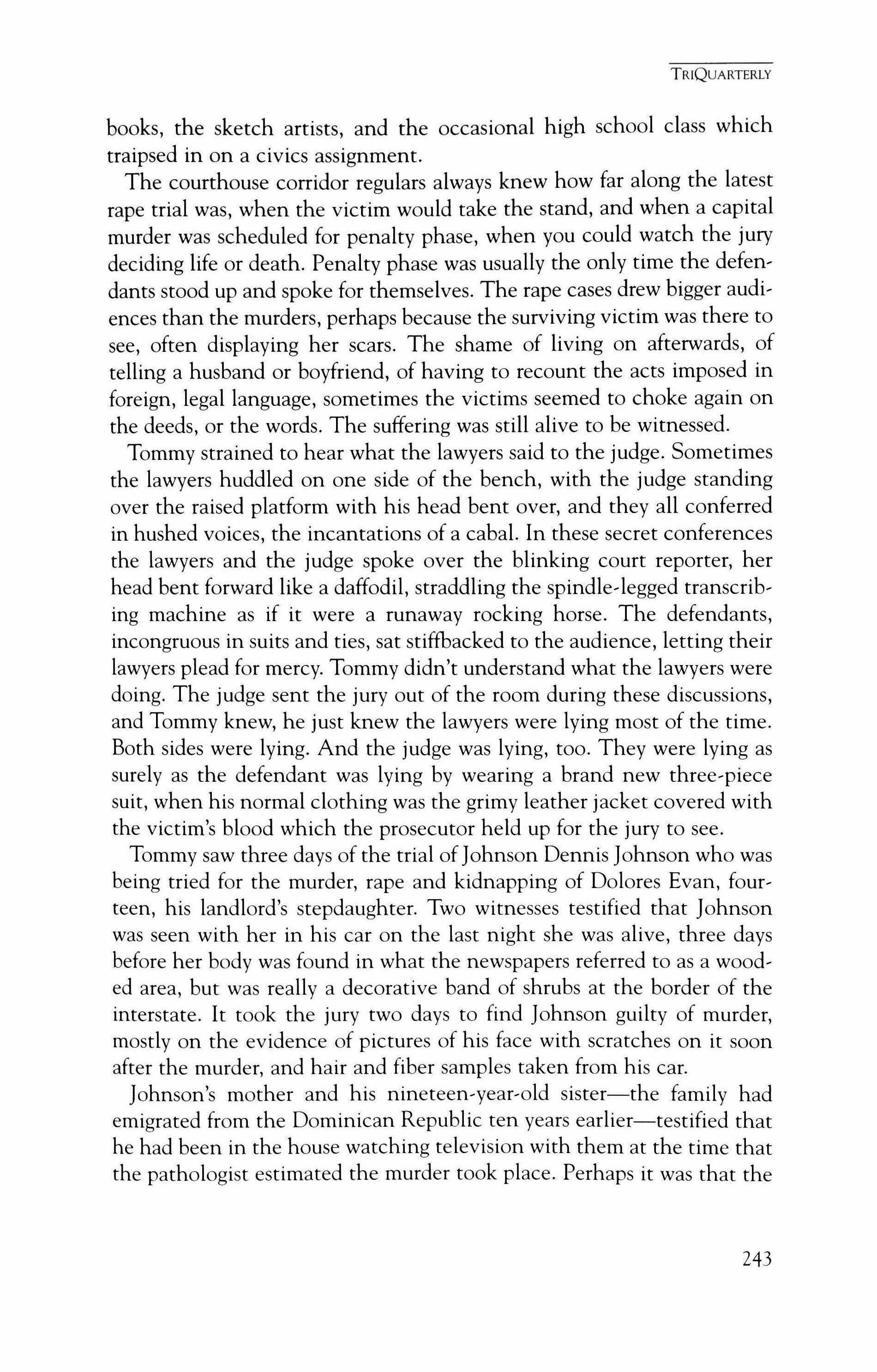
books, the sketch artists, and the occasional high school class which traipsed in on a civics assignment.
The courthouse corridor regulars always knew how far along the latest rape trial was, when the victim would take the stand, and when a capital murder was scheduled for penalty phase, when you could watch the jury deciding life or death. Penalty phase was usually the only time the defendants stood up and spoke for themselves. The rape cases drew bigger audiences than the murders, perhaps because the surviving victim was there to see, often displaying her scars. The shame of living on afterwards, of telling a husband or boyfriend, of having to recount the acts imposed in foreign, legal language, sometimes the victims seemed to choke again on the deeds, or the words. The suffering was still alive to be witnessed.
Tommy strained to hear what the lawyers said to the judge. Sometimes the lawyers huddled on one side of the bench, with the judge standing over the raised platform with his head bent over, and they all conferred in hushed voices, the incantations of a cabaL In these secret conferences the lawyers and the judge spoke over the blinking court reporter, her head bent forward like a daffodil, straddling the spindle-legged transcribing machine as if it were a runaway rocking horse. The defendants, incongruous in suits and ties, sat stiffbacked to the audience, letting their lawyers plead for mercy. Tommy didn't understand what the lawyers were doing. The judge sent the jury out of the room during these discussions, and Tommy knew, he just knew the lawyers were lying most of the time. Both sides were lying. And the judge was lying, too. They were lying as surely as the defendant was lying by wearing a brand new three-piece suit, when his normal clothing was the grimy leather jacket covered with the victim's blood which the prosecutor held up for the jury to see.
Tommy saw three days of the trial ofJohnson Dennis Johnson who was being tried for the murder, rape and kidnapping of Dolores Evan, fourteen, his landlord's stepdaughter. Two witnesses testified that Johnson was seen with her in his car on the last night she was alive, three days before her body was found in what the newspapers referred to as a wooded area, but was really a decorative band of shrubs at the border of the interstate. It took the jury two days to find Johnson guilty of murder, mostly on the evidence of pictures of his face with scratches on it soon after the murder, and hair and fiber samples taken from his car.
Johnson's mother and his nineteen-year-old sister-the family had emigrated from the Dominican Republic ten years earlier-testified that he had been in the house watching television with them at the time that the pathologist estimated the murder took place. Perhaps it was that the
TRIQUARTERLY
243
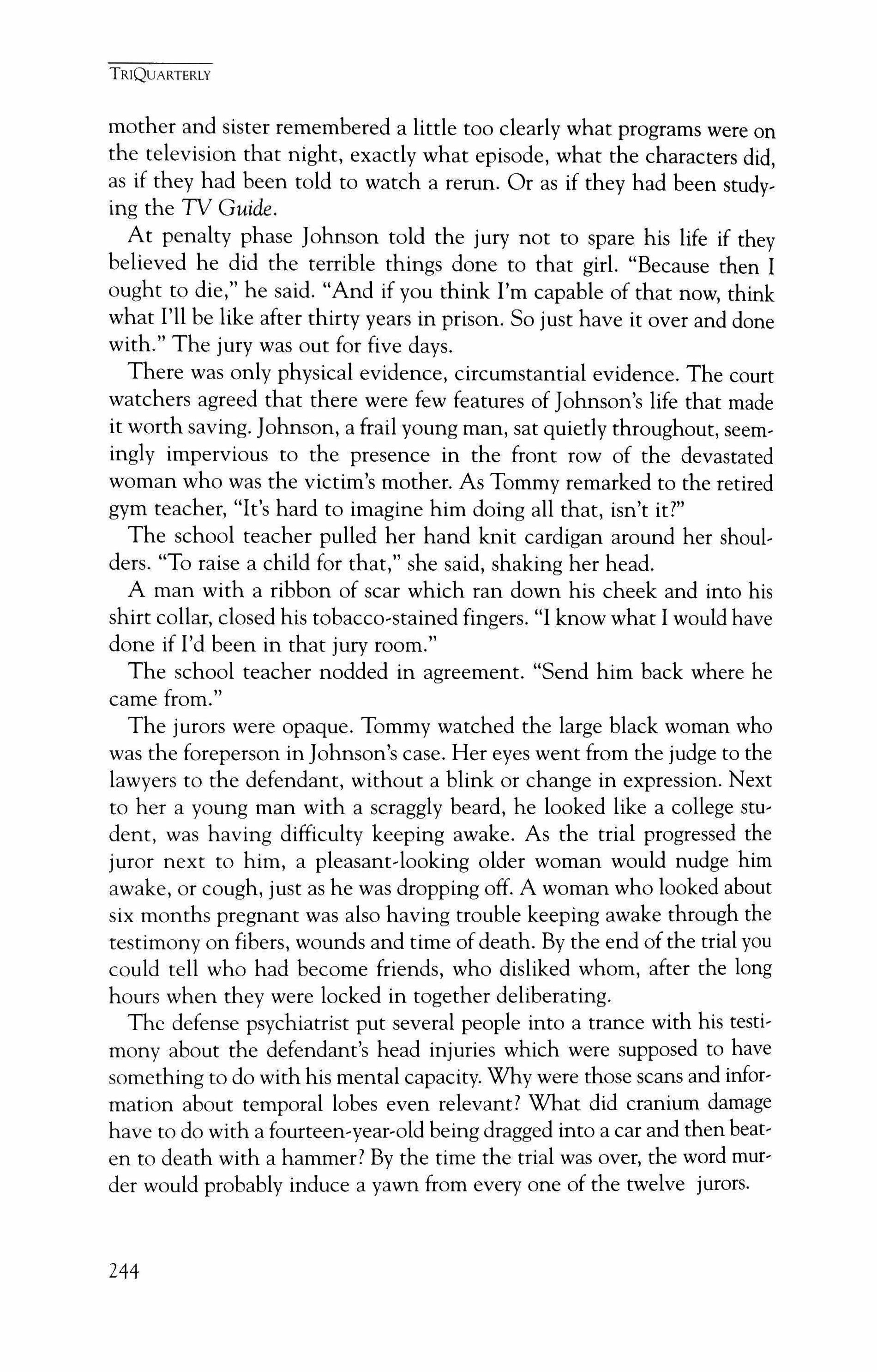
mother and sister remembered a little too clearly what programs were on the television that night, exactly what episode, what the characters did, as if they had been told to watch a rerun. Or as if they had been studying the TV Guide.
At penalty phase Johnson told the jury not to spare his life if they believed he did the terrible things done to that girl. "Because then I ought to die," he said. "And if you think I'm capable of that now, think what I'll be like after thirty years in prison. So just have it over and done with." The jury was out for five days.
There was only physical evidence, circumstantial evidence. The court watchers agreed that there were few features of Johnson's life that made it worth saving. Johnson, a frail young man, sat quietly throughout, seemingly impervious to the presence in the front row of the devastated woman who was the victim's mother. As Tommy remarked to the retired gym teacher, "It's hard to imagine him doing all that, isn't it?"
The school teacher pulled her hand knit cardigan around her shoulders. "To raise a child for that," she said, shaking her head.
A man with a ribbon of scar which ran down his cheek and into his shirt collar, closed his tobacco-stained fingers. "I know what I would have done if I'd been in that jury room."
The school teacher nodded in agreement. "Send him back where he came from."
The jurors were opaque. Tommy watched the large black woman who was the foreperson in Johnson's case. Her eyes went from the judge to the lawyers to the defendant, without a blink or change in expression. Next to her a young man with a scraggly beard, he looked like a college student, was having difficulty keeping awake. As the trial progressed the juror next to him, a pleasant-looking older woman would nudge him awake, or cough, just as he was dropping off. A woman who looked about six months pregnant was also having trouble keeping awake through the testimony on fibers, wounds and time ofdeath. By the end of the trial you could tell who had become friends, who disliked whom, after the long hours when they were locked in together deliberating.
The defense psychiatrist put several people into a trance with his testimony about the defendant's head injuries which were supposed to have something to do with his mental capacity. Why were those scans and information about temporal lobes even relevant? What did cranium damage have to do with a fourteen-year-old being dragged into a car and then beaten to death with a hammer? By the time the trial was over, the word murder would probably induce a yawn from every one of the twelve jurors.
TRIQUARTERLY
244
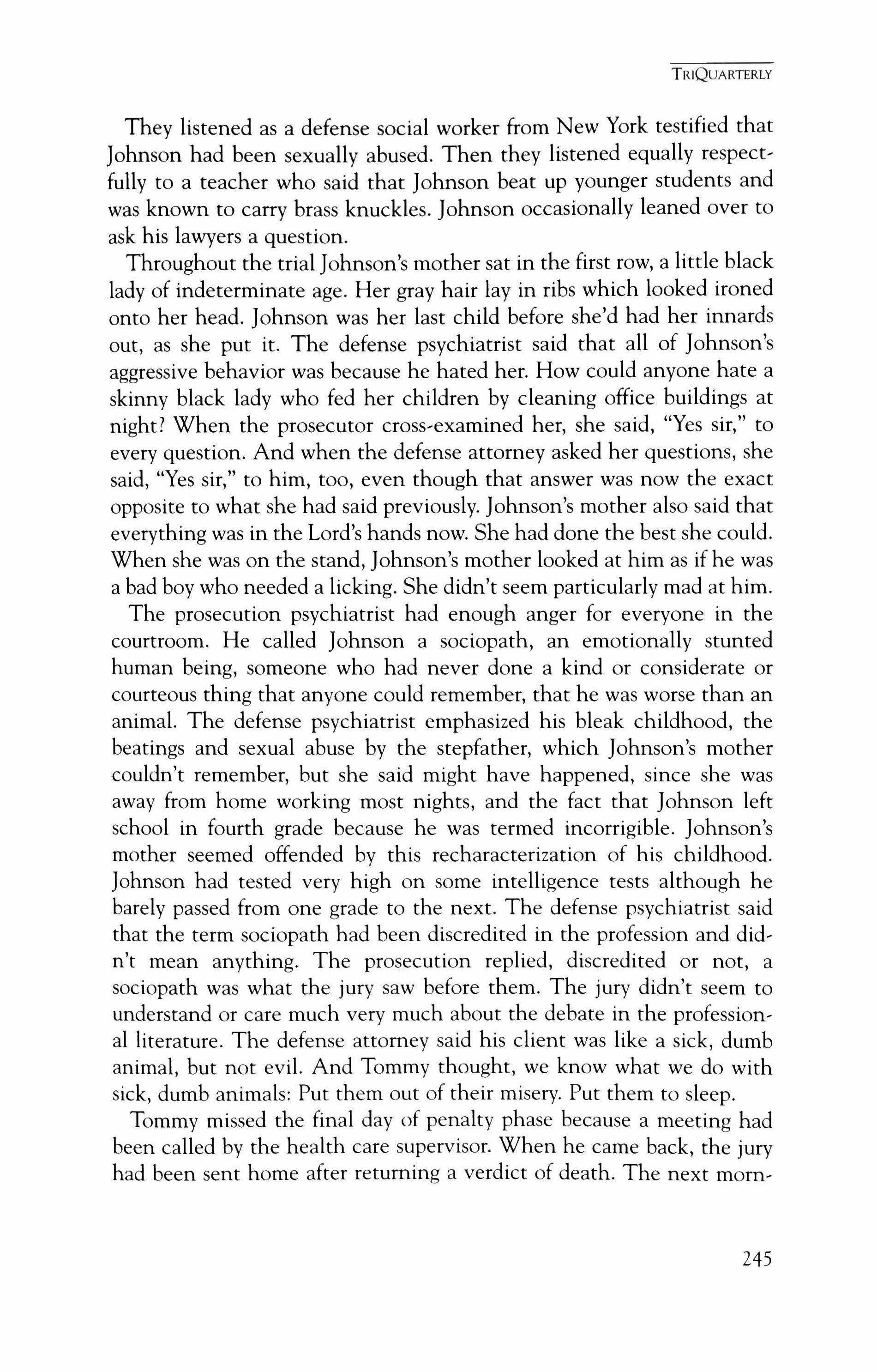
They listened as a defense social worker from New York testified that Johnson had been sexually abused. Then they listened equally respectfully to a teacher who said that Johnson beat up younger students and was known to carry brass knuckles. Johnson occasionally leaned over to ask his lawyers a question.
Throughout the trial Johnson's mother sat in the first row, a little black lady of indeterminate age. Her gray hair lay in ribs which looked ironed onto her head. Johnson was her last child before she'd had her innards out, as she put it. The defense psychiatrist said that all of Johnson's aggressive behavior was because he hated her. How could anyone hate a skinny black lady who fed her children by cleaning office buildings at night? When the prosecutor cross-examined her, she said, "Yes sir," to every question. And when the defense attorney asked her questions, she said, "Yes sir," to him, too, even though that answer was now the exact opposite to what she had said previously. Johnson's mother also said that everything was in the Lord's hands now. She had done the best she could. When she was on the stand, Johnson's mother looked at him as if he was a bad boy who needed a licking. She didn't seem particularly mad at him. The prosecution psychiatrist had enough anger for everyone in the courtroom. He called Johnson a sociopath, an emotionally stunted human being, someone who had never done a kind or considerate or courteous thing that anyone could remember, that he was worse than an animal. The defense psychiatrist emphasized his bleak childhood, the beatings and sexual abuse by the stepfather, which Johnson's mother couldn't remember, but she said might have happened, since she was away from home working most nights, and the fact that Johnson left school in fourth grade because he was termed incorrigible. Johnson's mother seemed offended by this recharacterization of his childhood. Johnson had tested very high on some intelligence tests although he barely passed from one grade to the next. The defense psychiatrist said that the term sociopath had been discredited in the profession and didn't mean anything. The prosecution replied, discredited or not, a sociopath was what the jury saw before them. The jury didn't seem to understand or care much very much about the debate in the professional literature. The defense attorney said his client was like a sick, dumb animal, but not evil. And Tommy thought, we know what we do with sick, dumb animals: Put them out of their misery. Put them to sleep. Tommy missed the final day of penalty phase because a meeting had been called by the health care supervisor. When he came back, the jury had been sent home after returning a verdict of death. The next morn-
TRIQUARTERLY
245

ing Tommy read that Johnson laughed and laughed for hours back in his cell. The jurors said in post verdict interviews that most of them favored death from the first day, but one juror held out for five days.
Tommy wished he could talk to Ants about these things. He even wanted to tell Ants-first swearing him to secrecy, which they used to do for girls, or cars, or money-about the true nature of his job. But Anthony was undergoing his own metamorphosis. He had fallen in love. With Julia, the daughter of a wealthy tax lawyer from Princeton. Ants was in no mood to listen. Anthony's mother called Tommy to tell him how bad it was. "Slumming," was the word Anthony's mother used, spitting out her disgust. "She's just slumming with a Pollack from Trenton." Tommy was shocked that Ants mother would say that about her own son.
Whatever the girl's intentions Ants hardly came around anymore. He let his hair grow, rode a motorcycle, and was a foreigner when he peeled around the comer onto Tommy and Arlette's quiet street. Arlette just stared and stared at Julia who came without lipstick and seemed to have no interest in clothes, although her very pale jeans sported a designer label. The fascination was mutual. Julia couldn't take her eyes off of Arlette's distended stomach and bloated face. They were, after all, the same age. From her pregnancy torpor Arlette looked at Julia's pink and white complexion with envy. Even in blue jeans, there was nothing haphazard about this young woman. Her hair was the color of white honey, with pale flecks in it. Arlette told Tommy with an edge to her voice that such color didn't happen by itself. When Julia spoke, her voice was low and firm, each syllable clear as a school bell.
Tommy thought she had a figure to knock your eyes out. But she had a lot of silly ideas and plenty to say for herself, unasked. She had ideas about the United Nations and the President and foreign policy. And crime and lawyers, too. Listening to this confident voice emerging from such a pretty mouth, Tommy could see why Ants was in love with her. She felt sorry for prisoners, whose lives might have been straightened out by a child guidance counselor. Tommy certainly didn't believe that, and he contradicted her hotly. But it upset both Ants and Arlette when they argued. Ants had only known her for a year. Was a year of being in love a reason not to see your best friend? But Ants just didn't seem to want to come spend Saturday with Tommy, doing what they used to do, anything or nothing.
During the few hours when Arlette is not ministering to her pregnant body's incessant demands for food or sleep, she and Tommy are silent together, communicating with gestures. Tommy senses he can't reach
TRIQUARTERLY
246

her. It is as if she has disappeared deep inside herself, as if her whole self has wrapped itself around the creature growing inside of her. She hears what Tommy says, but she is only listening to the tiny being. Tommy stares at her puffy face and rounded belly with its bouncing cheerful mound of pubic hair and is happy if she is not feeling nauseous or exhausted.
Recently Arlette has become afraid to be alone in the house at night. In the evening they curl up under the comforter and watch movies on their tiny television. Arlette refuses to see anything with blood or violence. Her favorites are the melodramas, and she cries and laughs, even when she has seen the film before. It is as if the pregnancy-something they started together-has thrown up a wall between them and around them. The pregnancy, a simple bodily function, has transported Arlette's spirit into a realm where Tommy cannot follow. Tommy stands at the gate waiting for her to return. When he is not with her he feels fiercely protective. He restrains himself from calling home in the middle of the day. And when they venture outside Tommy positions himself to shield the round bump where the baby is swimming in wait.
The county prosecutor hadn't even bothered to inform George and his partner that the case against their two assailants had been concluded. Tommy heard by chance that the kids were scheduled for sentencing. George got dressed in a suit and tie, and he and Tommy sat for hours waiting for the case to be called. George asked his partner if he wanted to come, but he was already back at work. "You're better off forgetting all that," he told George. "You'll never get satisfaction there."
Finally, after listening to the incomprehensible legalese, George had just told Tommy he was ready to go home, when the judge announced their case. The defendants both entered pleas to aggravated assault. The audience in the courtroom was very grave when the two boys-they seemed shockingly young-were escorted into the court with an armed guard in shackles. A woman in the front row, Tommy assumed it was one of the mother's, buried her head in a blue Kleenex. Before the judge pronounced sentence, he delivered a lecture about the importance of setting an example. The two boys stood with their heads bowed and said nothing. But the fact was the kids would be out on the street again in six months.
As they filed out of the courtroom, their chains clanking, George caught the eye of the taller one. "Did you see that?" George's voice was shaking. "He recognized me."
"How do you know?" Tommy asked, leaning forward. George's voice carried over the coming and goings of defendants and lawyers.
TRIQUARTERLY
247

TRIQUARTERLY
The uniformed bailiff frowned and leaned over to silence George with a tap on the shoulder. The next case had started. A new group of defendants and lawyers stood up below the judge who stifled a yawn.
"I don't want to hear about it," Gloria said when they came home. It made her sick to her stomach to think of those kids getting out. "And you she said accusingly to Tommy, "the taxpayers pay you to take care of the Then, under her breath, she said bastards."
Tommy was so surprised to hear his mother swear that the unformed accusation against himself didn't register. Besides Tommy's two cousins were at the house and they wanted to talk football.
"I can't believe your mother said 'bastards,'" Arlette said. Arlette spends hours on the phone talking to Gloria. Once Gloria hinted that her son could have done better than to marry a neighborhood girl with no college, but now Arlette is the daughter she never had. At first Gloria didn't want Tommy to know, but Arlette got it out of her. Gloria had gone to the doctor. It wasn't certain, yet. They were still doing tests.
Tests? What kind of tests, Tommy asked. But Arlette just said they were doing tests- female tests. Tommy could tell when Arlette was talking to Gloria about medical things because she'd pull the phone receiver around the comer, go into the tiny closet and close the door. She talked from among the raincoats and jackets while only the curled blue phone cord emerged from inside the closet. Neither of them would tell Tommy anything, so he walked out onto their small back porch and stared at the metal door of the garage. The inside was jammed with half empty paint cans, splintered lumber, and a broken power mower. Its dull tarpaper roof became a source of glory during the week when the purple magnolia tree bloomed and its flowers were draped across it.
Mr. Russo next door often greeted Tommy by asking Tommy if he had a nice day. Tommy remembered the gentle purple and white tulip blossoms carelessly releasing their faint perfume into the cluttered yard. Tommy couldn't remember if it had been a nice day or not. He'd been inside all day, first at the office, then at the courthouse. The summer fragrance of the river reminded Tommy of how much he hated being indoors.
Tommy was surprised Arlette didn't seem to miss her job. Bending over with laughter, until he had to laugh too, Arlette used to tell Tommy and Gloria how the secretaries called and pretended to be a collection agency when they wanted the clients to pay their legal bills, and the outrageous lies they told to cover up for the lawyers when they couldn't be found. No, Arlette didn't seem to miss any of it. Arlette who was always grab-
248
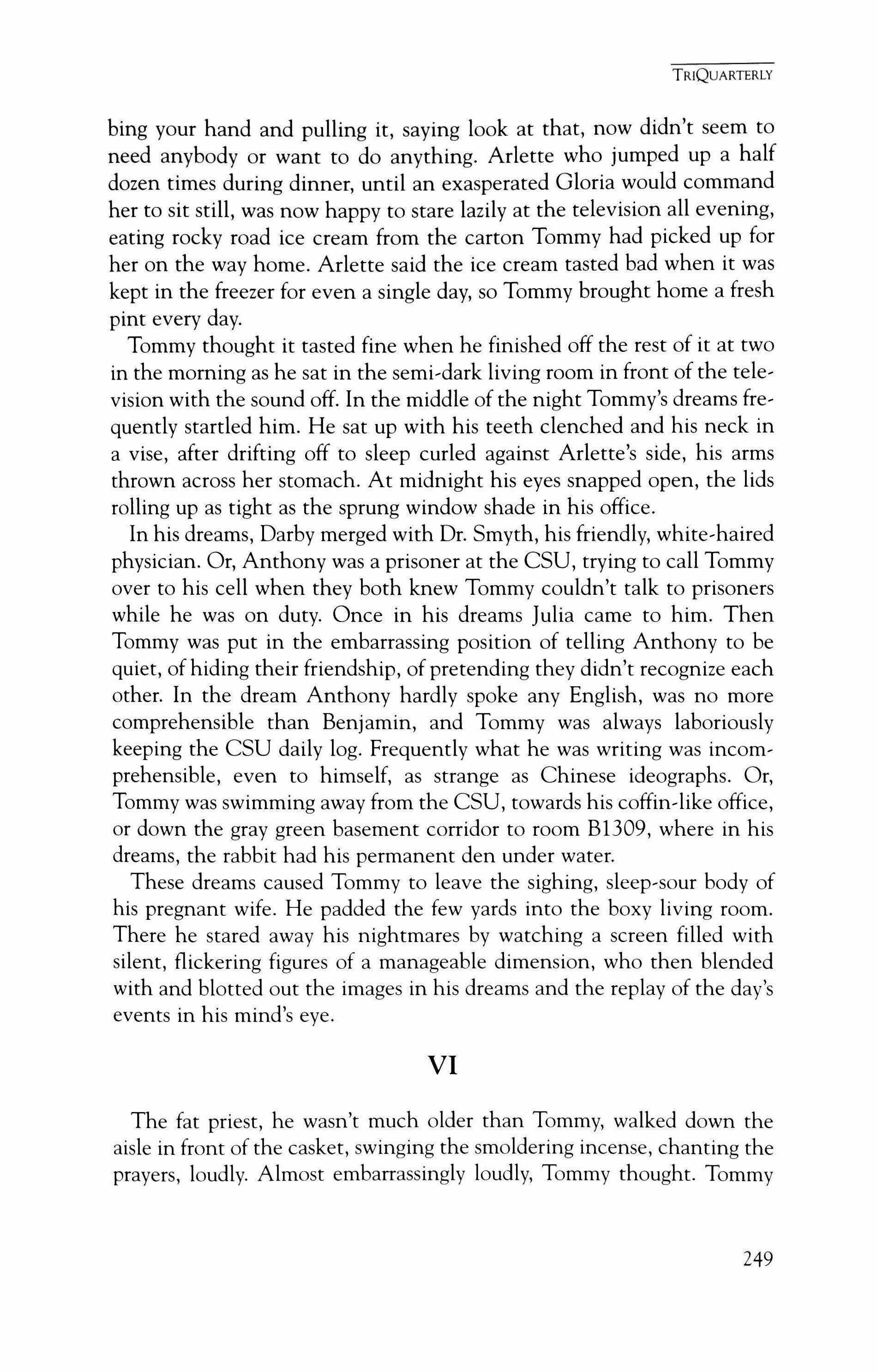
bing your hand and pulling it, saying look at that, now didn't seem to need anybody or want to do anything. Arlette who jumped up a half dozen times during dinner, until an exasperated Gloria would command her to sit still, was now happy to stare lazily at the television all evening, eating rocky road ice cream from the carton Tommy had picked up for her on the way home. Arlette said the ice cream tasted bad when it was kept in the freezer for even a single day, so Tommy brought home a fresh pint every day.
Tommy thought it tasted fine when he finished off the rest of it at two in the morning as he sat in the semi-dark living room in front of the television with the sound off. In the middle of the night Tommy's dreams frequently startled him. He sat up with his teeth clenched and his neck in a vise, after drifting off to sleep curled against Arlette's side, his arms thrown across her stomach. At midnight his eyes snapped open, the lids rolling up as tight as the sprung window shade in his office.
In his dreams, Darby merged with Dr. Smyth, his friendly, white-haired physician. Or, Anthony was a prisoner at the CSU, trying to call Tommy over to his cell when they both knew Tommy couldn't talk to prisoners while he was on duty. Once in his dreams Julia came to him. Then Tommy was put in the embarrassing position of telling Anthony to be quiet, of hiding their friendship, of pretending they didn't recognize each other. In the dream Anthony hardly spoke any English, was no more comprehensible than Benjamin, and Tommy was always laboriously keeping the CSU daily log. Frequently what he was writing was incomprehensible, even to himself, as strange as Chinese ideographs. Or, Tommy was swimming away from the CSU, towards his coffin-like office, or down the gray green basement corridor to room B1309, where in his dreams, the rabbit had his permanent den under water.
These dreams caused Tommy to leave the sighing, sleep-sour body of his pregnant wife. He padded the few yards into the boxy living room. There he stared away his nightmares by watching a screen filled with silent, flickering figures of a manageable dimension, who then blended with and blotted out the images in his dreams and the replay of the day's events in his mind's eye.
VI
The fat priest, he wasn't much older than Tommy, walked down the aisle in front of the casket, swinging the smoldering incense, chanting the prayers, loudly. Almost embarrassingly loudly, Tommy thought. Tommy 249
TRIQUARTERLY
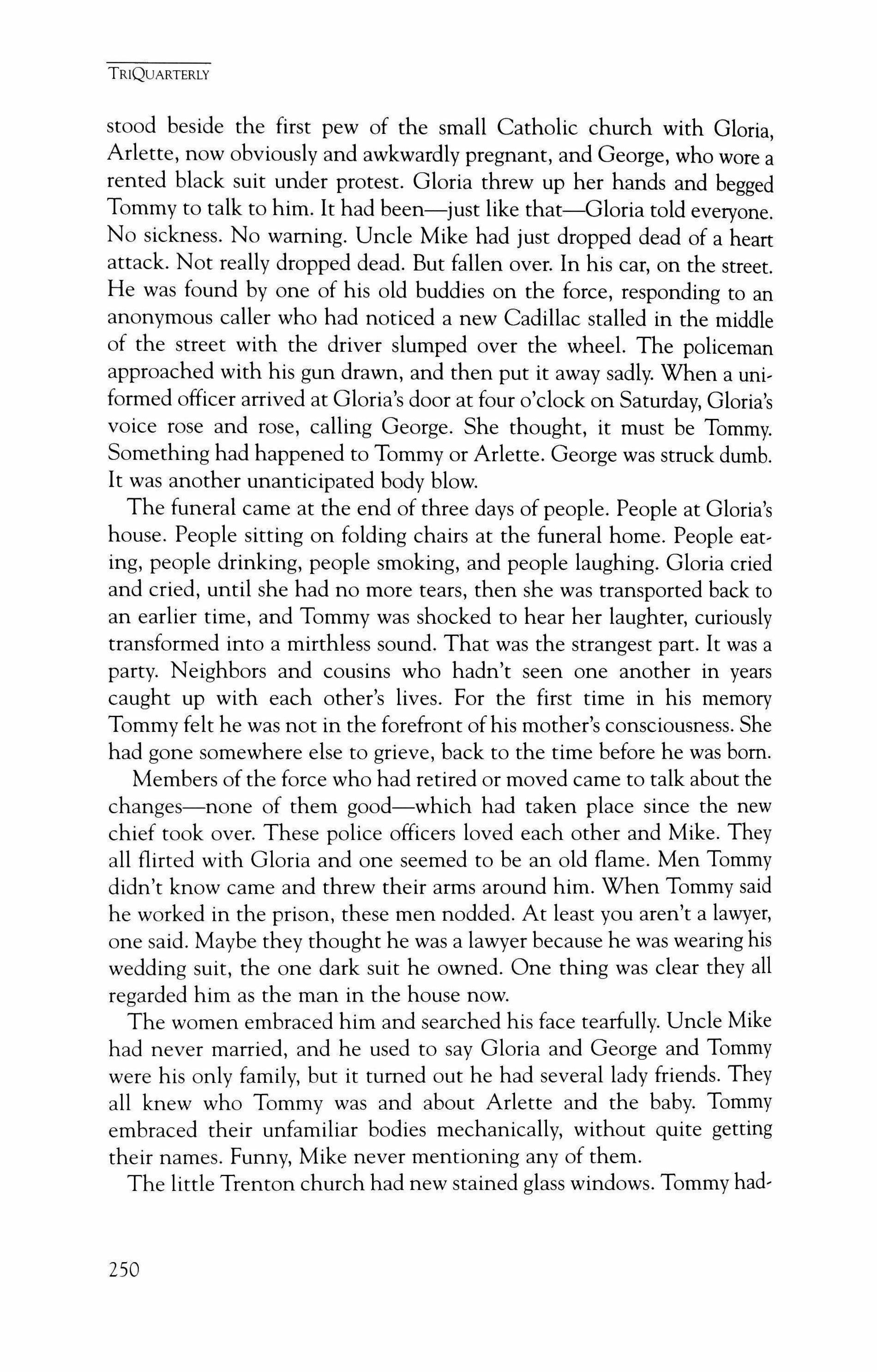
TRIQUARTERLY
stood beside the first pew of the small Catholic church with Gloria, Arlette, now obviously and awkwardly pregnant, and George, who wore a rented black suit under protest. Gloria threw up her hands and begged Tommy to talk to him. It had been-just like that-Gloria told everyone. No sickness. No warning. Uncle Mike had just dropped dead of a heart attack. Not really dropped dead. But fallen over. In his car, on the street. He was found by one of his old buddies on the force, responding to an anonymous caller who had noticed a new Cadillac stalled in the middle of the street with the driver slumped over the wheel. The policeman approached with his gun drawn, and then put it away sadly. When a uniformed officer arrived at Gloria's door at four o'clock on Saturday, Gloria's voice rose and rose, calling George. She thought, it must be Tommy. Something had happened to Tommy or Arlette. George was struck dumb. It was another unanticipated body blow.
The funeral came at the end of three days of people. People at Gloria's house. People sitting on folding chairs at the funeral home. People eating, people drinking, people smoking, and people laughing. Gloria cried and cried, until she had no more tears, then she was transported back to an earlier time, and Tommy was shocked to hear her laughter, curiously transformed into a mirthless sound. That was the strangest part. It was a party. Neighbors and cousins who hadn't seen one another in years caught up with each other's lives. For the first time in his memory Tommy felt he was not in the forefront ofhis mother's consciousness. She had gone somewhere else to grieve, back to the time before he was born.
Members of the force who had retired or moved came to talk about the changes-none of them good-which had taken place since the new chief took over. These police officers loved each other and Mike. They all flirted with Gloria and one seemed to be an old flame. Men Tommy didn't know came and threw their arms around him. When Tommy said he worked in the prison, these men nodded. At least you aren't a lawyer, one said. Maybe they thought he was a lawyer because he was wearing his wedding suit, the one dark suit he owned. One thing was clear they all regarded him as the man in the house now.
The women embraced him and searched his face tearfully. Uncle Mike had never married, and he used to say Gloria and George and Tommy were his only family, but it turned out he had several lady friends. They all knew who Tommy was and about Arlette and the baby. Tommy embraced their unfamiliar bodies mechanically, without quite getting their names. Funny, Mike never mentioning any of them.
The little Trenton church had new stained glass windows. Tommy had-
250

n't been inside the church for years in spite of, or perhaps because of, Gloria's protestations. Tommy remembered the church as dark, but now celebrating his uncle's death the church was flooded with light. The blues and reds and yellows of the new stained glass pictures were bright as cartoon colors. Surrounding them the plaster was white, as shiny and white as the priest's surplice. Two altar boys, one blond and one dark, swung the incense behind the priest. They were more angelic than the blunt featured women with heavy, gauze-covered arms who were pictured as guarding heaven.
Gloria picked out an expensive casket, a heavy silver-gray model, which bore a stylistic resemblance to Mike's Cadillac, Tommy thought. George said it was ridiculous to spend thousands of dollars on a box which was going in the ground. Gloria said, fine, she'd spend her own savings for it. Tommy had never heard them fight, and he didn't know Gloria had her own money. Then it turned out that Mike had a policeman's burial policy which paid for the casket, the funeral and everything. The heavy casket sat up high on its rubber wheeled cart, covered with a white silk cloth with a gold embroidered cross throughout the ceremony. The white and gold cloth dropped ceremoniously to the floor in heavy folds, like the stone drapery on a graveyard statute.
Flowers were banked at both sides of the altar. Most prominent was a large blue and white wreath in the shape of a policeman's badge with Mike's number, 1010, in blue carnations at the center. Throughout the chanting, the raising and lowering of the chalice, the taking of the wafer on the tongue, the drinking of the blood, the wiping away of the human touch with a white satin cloth, Tommy kept glancing over at the blue and white badge made out of flowers. The wreath was propped on an easel, so that it was level with the altar. So that was what being a cop came down to, a corny wreath at your funeral with your number on it.
Tommy and the other five pallbearers lifted the silver and gray casket on their shoulders and placed it gently on the red extended tongue of carpet from the hearse, then stood silently as it was withdrawn. Tommy shivered as the coffin slid onto the red carpet. The shield of flowers followed in its own separate limousine, ahead of the family.
In June of 1984 the newspapers seemed to carry more than the usual quantum of greed, misery and suffering. The averted faces of American boy soldiers, their shoulders weighed down with expensive weaponry, stared blankly out of the front page from the camera flattened backdrop of jungle. They looked bewildered, reluctant killers who wished they were watching the war on television.
TRIQUARTERLY
251
TRIQUARTERLY

At home the most recent murder involved a young Hispanic, Enrico Ruiz, who kidnapped a couple of white teenagers parked near a lake. Raped the girl, shot the boyfriend in the head, then shot the girl in the back and left her for dead. She survived to make the identification, but was paralyzed for life. The jury didn't take long. In four hours they came back with a unanimous verdict: guilty. Another two hours, and they voted for death, with no mitigation. The murderer was eighteen at his trial. It wasn't clear how much he understood about the goings on in the courtroom. His attorney and some civil liberties organization were quoted in the morning newspapers as saying that one of the principal issues on appeal would be whether the law permitted the execution of someone who was a juvenile at the time of the crime. His lawyer was quoted as saying after the verdict, "He's just a kid."
"A kid?" Tommy blurted it out loud in the kitchen. "You can't call someone who does that a kid."
"Tommy?" Arlette's voice was distant, feminine. Tommy was waiting for the water to boil again so he could bring her tea and toast. "What's the matter?"
"Nothing. Nothing." Those lawyers! They ought to go on trial instead of the killers. Tommy burned his tongue on his coffee and then banged his mug down on the kitchen table, splashing hot liquid on his hand as well.
There had been some spotting in the sixth month, and Arlette had been ordered to stay in bed. Tommy walked into the bedroom, waving his arms and carrying the newspaper. Arlette looked so pasty Tommy forgot what he was saying. He opened the window and plumped up a pillow behind her back. She gave him a watery smile. Her belly was stretched now, although the rest of her body was still thin. She was only comfortable lying half on her side with a pillow under one knee. The doctor was concerned about blood clots, too. Arlette, who had never been sick a day in her life, turned out to be fragile in pregnancy. Sometimes she cried and said she always wanted ten children, but she didn't think she could stand to go through this even one more time. Who would have expected this? She had always been healthy as a horse.
By any objective standard Arlette now looks terrible, but every blemish and distention is heartbreakingly dear to Tommy. He lies next to her, and the warmth radiates from her belly into his groin and up to his chest. Now when he laces his fingers over her belly Tommy feels the poke of a tiny elbow or the bump of a heel. When they lie next to one another they watched the ripples circumnavigate her navel. Only a few more weeks
252
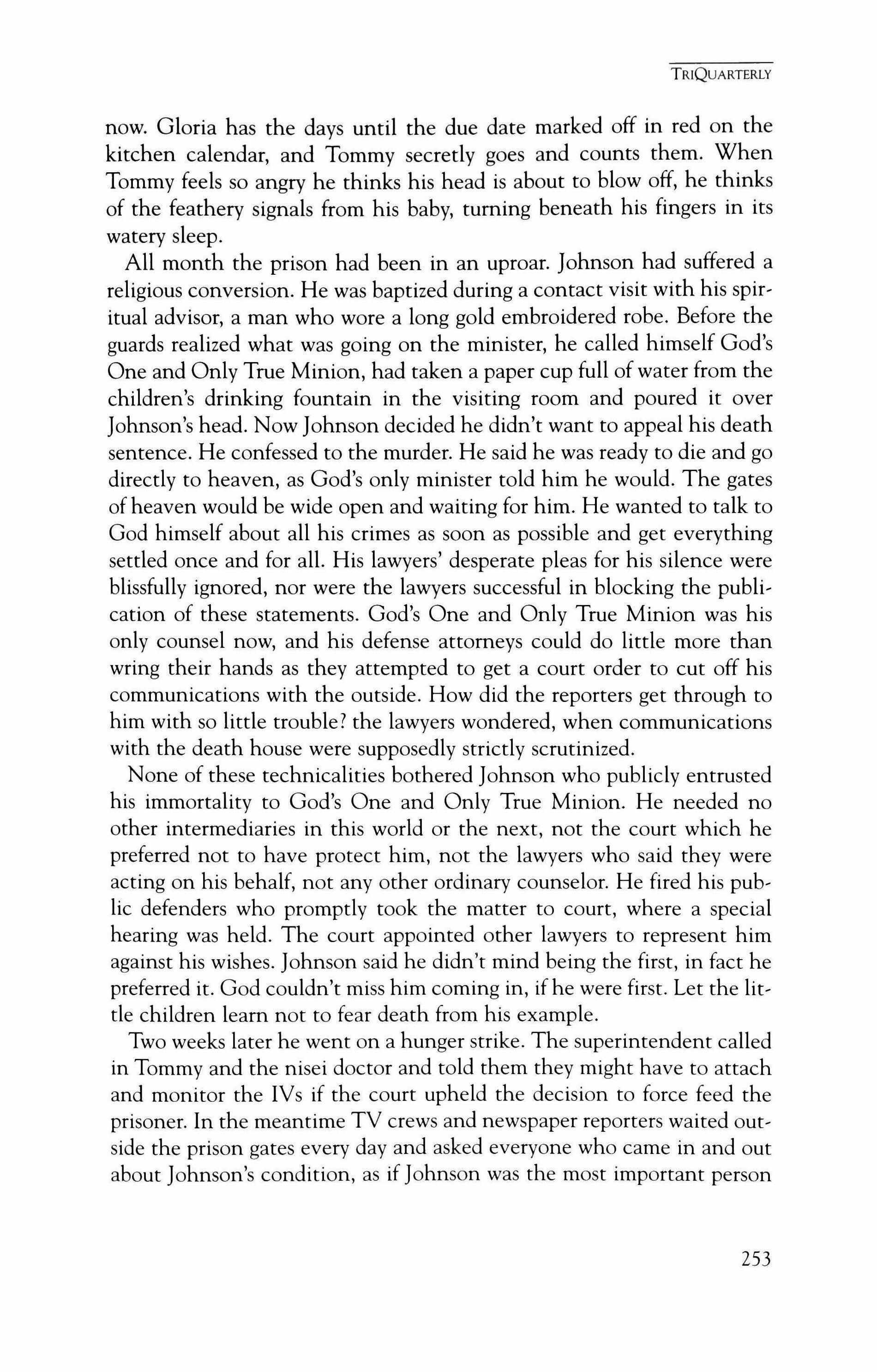
now. Gloria has the days until the due date marked off in red on the kitchen calendar, and Tommy secretly goes and counts them. When Tommy feels so angry he thinks his head is about to blow off, he thinks of the feathery signals from his baby, turning beneath his fingers in its watery sleep.
All month the prison had been in an uproar. Johnson had suffered a religious conversion. He was baptized during a contact visit with his spiritual advisor, a man who wore a long gold embroidered robe. Before the guards realized what was going on the minister, he called himself God's One and Only True Minion, had taken a paper cup full of water from the children's drinking fountain in the visiting room and poured it over Johnson's head. Now Johnson decided he didn't want to appeal his death sentence. He confessed to the murder. He said he was ready to die and go directly to heaven, as God's only minister told him he would. The gates of heaven would be wide open and waiting for him. He wanted to talk to God himself about all his crimes as soon as possible and get everything settled once and for all. His lawyers' desperate pleas for his silence were blissfully ignored, nor were the lawyers successful in blocking the publication of these statements. God's One and Only True Minion was his only counsel now, and his defense attorneys could do little more than wring their hands as they attempted to get a court order to cut off his communications with the outside. How did the reporters get through to him with so little trouble? the lawyers wondered, when communications with the death house were supposedly strictly scrutinized.
None of these technicalities bothered Johnson who publicly entrusted his immortality to God's One and Only True Minion. He needed no other intermediaries in this world or the next, not the court which he preferred not to have protect him, not the lawyers who said they were acting on his behalf, not any other ordinary counselor. He fired his public defenders who promptly took the matter to court, where a special hearing was held. The court appointed other lawyers to represent him against his wishes. Johnson said he didn't mind being the first, in fact he preferred it. God couldn't miss him coming in, if he were first. Let the little children learn not to fear death from his example.
Two weeks later he went on a hunger strike. The superintendent called in Tommy and the nisei doctor and told them they might have to attach and monitor the IVs if the court upheld the decision to force feed the prisoner. In the meantime TV crews and newspaper reporters waited outside the prison gates every day and asked everyone who came in and out about Johnson's condition, as if Johnson was the most important person
TRIQUARTERLY
253
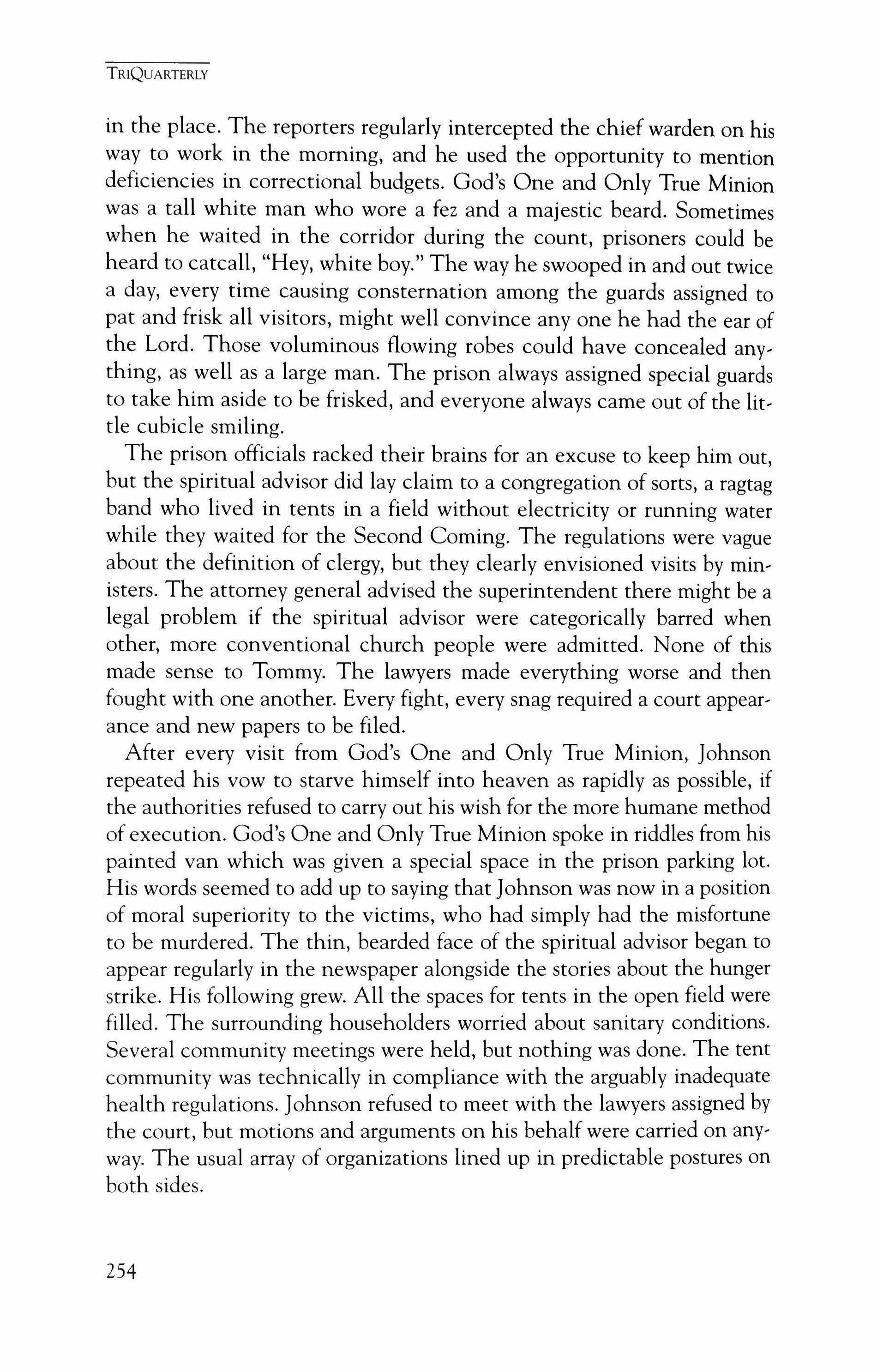
in the place. The reporters regularly intercepted the chief warden on his way to work in the morning, and he used the opportunity to mention deficiencies in correctional budgets. God's One and Only True Minion was a tall white man who wore a fez and a majestic beard. Sometimes when he waited in the corridor during the count, prisoners could be heard to catcall, "Hey, white boy." The way he swooped in and out twice a day, every time causing consternation among the guards assigned to pat and frisk all visitors, might well convince anyone he had the ear of the Lord. Those voluminous flowing robes could have concealed anything, as well as a large man. The prison always assigned special guards to take him aside to be frisked, and everyone always came out of the little cubicle smiling.
The prison officials racked their brains for an excuse to keep him out, but the spiritual advisor did lay claim to a congregation of sorts, a ragtag band who lived in tents in a field without electricity or running water while they waited for the Second Coming. The regulations were vague about the definition of clergy, but they clearly envisioned visits by ministers. The attorney general advised the superintendent there might be a legal problem if the spiritual advisor were categorically barred when other, more conventional church people were admitted. None of this made sense to Tommy. The lawyers made everything worse and then fought with one another. Every fight, every snag required a court appearance and new papers to be filed.
After every visit from God's One and Only True Minion, Johnson repeated his vow to starve himself into heaven as rapidly as possible, if the authorities refused to carry out his wish for the more humane method of execution. God's One and Only True Minion spoke in riddles from his painted van which was given a special space in the prison parking lot. His words seemed to add up to saying that Johnson was now in a position of moral superiority to the victims, who had simply had the misfortune to be murdered. The thin, bearded face of the spiritual advisor began to appear regularly in the newspaper alongside the stories about the hunger strike. His following grew. All the spaces for tents in the open field were filled. The surrounding householders worried about sanitary conditions. Several community meetings were held, but nothing was done. The tent community was technically in compliance with the arguably inadequate health regulations. Johnson refused to meet with the lawyers assigned by the court, but motions and arguments on his behalf were carried on anyway. The usual array of organizations lined up in predictable postures on both sides.
TRIQUARTERLY
254
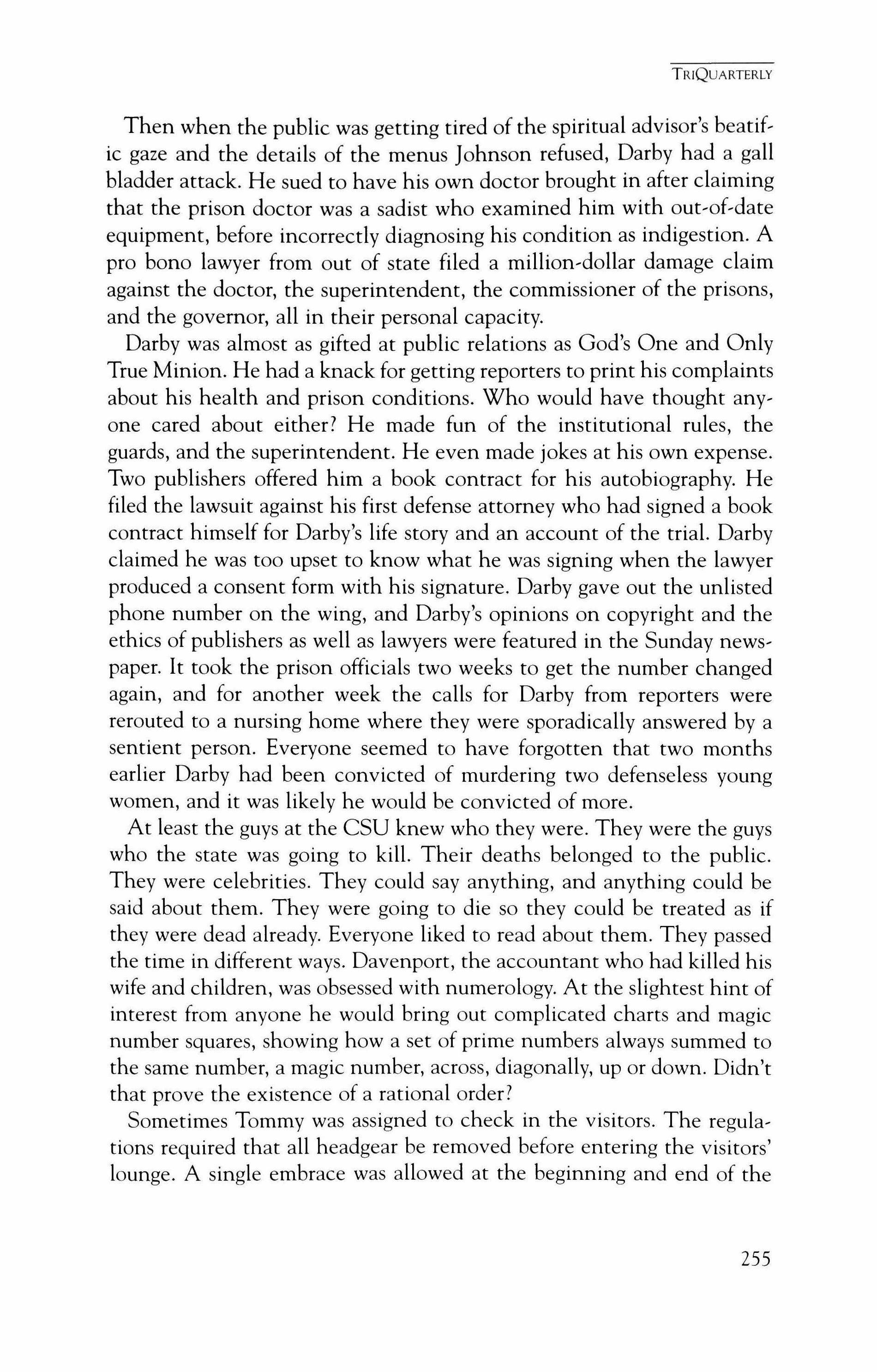
Then when the public was getting tired of the spiritual advisor's beatific gaze and the details of the menus Johnson refused, Darby had a gall bladder attack. He sued to have his own doctor brought in after claiming that the prison doctor was a sadist who examined him with out-of-date equipment, before incorrectly diagnosing his condition as indigestion. A pro bono lawyer from out of state filed a million-dollar damage claim against the doctor, the superintendent, the commissioner of the prisons, and the governor, all in their personal capacity.
Darby was almost as gifted at public relations as God's One and Only True Minion. He had a knack for getting reporters to print his complaints about his health and prison conditions. Who would have thought anyone cared about either? He made fun of the institutional rules, the guards, and the superintendent. He even made jokes at his own expense. Two publishers offered him a book contract for his autobiography. He filed the lawsuit against his first defense attorney who had signed a book contract himself for Darby's life story and an account of the trial. Darby claimed he was too upset to know what he was signing when the lawyer produced a consent form with his signature. Darby gave out the unlisted phone number on the wing, and Darby's opinions on copyright and the ethics of publishers as well as lawyers were featured in the Sunday newspaper. It took the prison officials two weeks to get the number changed again, and for another week the calls for Darby from reporters were rerouted to a nursing home where they were sporadically answered by a sentient person. Everyone seemed to have forgotten that two months earlier Darby had been convicted of murdering two defenseless young women, and it was likely he would be convicted of more.
At least the guys at the CSU knew who they were. They were the guys who the state was going to kill. Their deaths belonged to the public. They were celebrities. They could say anything, and anything could be said about them. They were going to die so they could be treated as if they were dead already. Everyone liked to read about them. They passed the time in different ways. Davenport, the accountant who had killed his wife and children, was obsessed with numerology. At the slightest hint of interest from anyone he would bring out complicated charts and magic number squares, showing how a set of prime numbers always summed to the same number, a magic number, across, diagonally, up or down. Didn't that prove the existence of a rational order?
Sometimes Tommy was assigned to check in the visitors. The regulations required that all headgear be removed before entering the visitors' lounge. A single embrace was allowed at the beginning and end of the 255
TRIQUARTERLY
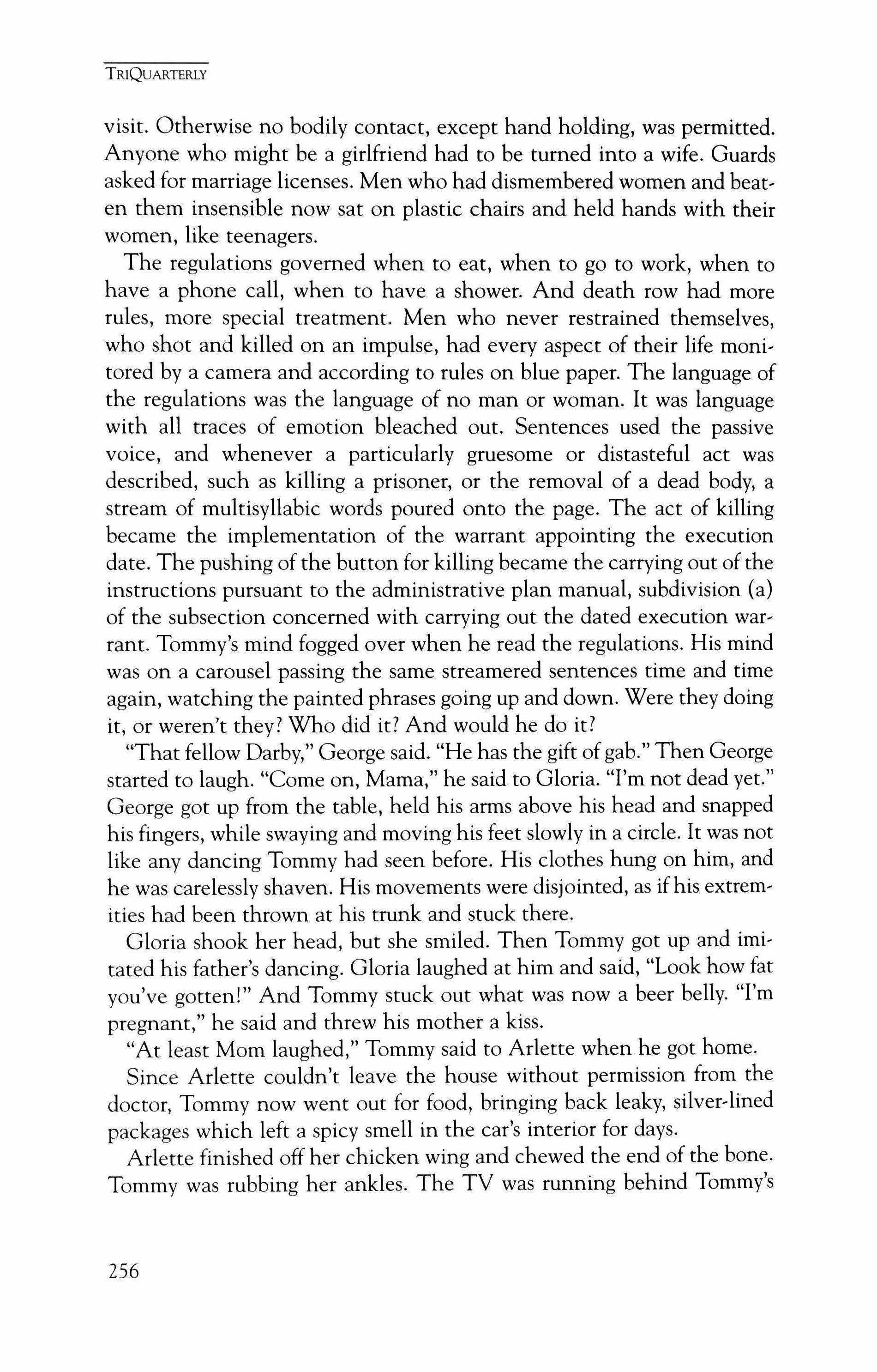
visit. Otherwise no bodily contact, except hand holding, was permitted. Anyone who might be a girlfriend had to be turned into a wife. Guards asked for marriage licenses. Men who had dismembered women and beaten them insensible now sat on plastic chairs and held hands with their women, like teenagers.
The regulations governed when to eat, when to go to work, when to have a phone call, when to have a shower. And death row had more rules, more special treatment. Men who never restrained themselves, who shot and killed on an impulse, had every aspect of their life monitored by a camera and according to rules on blue paper. The language of the regulations was the language of no man or woman. It was language with all traces of emotion bleached out. Sentences used the passive voice, and whenever a particularly gruesome or distasteful act was described, such as killing a prisoner, or the removal of a dead body, a stream of multisyllabic words poured onto the page. The act of killing became the implementation of the warrant appointing the execution date. The pushing of the button for killing became the carrying out of the instructions pursuant to the administrative plan manual, subdivision (a) of the subsection concerned with carrying out the dated execution warrant. Tommy's mind fogged over when he read the regulations. His mind was on a carousel passing the same streamered sentences time and time again, watching the painted phrases going up and down. Were they doing it, or weren't they? Who did it? And would he do it?
"That fellow Darby," George said. "He has the gift ofgab." Then George started to laugh. "Come on, Mama," he said to Gloria. "I'm not dead yet." George got up from the table, held his arms above his head and snapped his fingers, while swaying and moving his feet slowly in a circle. It was not like any dancing Tommy had seen before. His clothes hung on him, and he was carelessly shaven. His movements were disjointed, as ifhis extremities had been thrown at his trunk and stuck there.
Gloria shook her head, but she smiled. Then Tommy got up and imitated his father's dancing. Gloria laughed at him and said, "Look how fat you've gotten!" And Tommy stuck out what was now a beer belly. "I'm pregnant," he said and threw his mother a kiss.
"At least Mom laughed," Tommy said to Arlette when he got home.
Since Arlette couldn't leave the house without permission from the doctor, Tommy now went out for food, bringing back leaky, silver-lined packages which left a spicy smell in the car's interior for days.
Arlette finished off her chicken wing and chewed the end of the bone. Tommy was rubbing her ankles. The TV was running behind Tommy's
TRIQUARTERLY
256
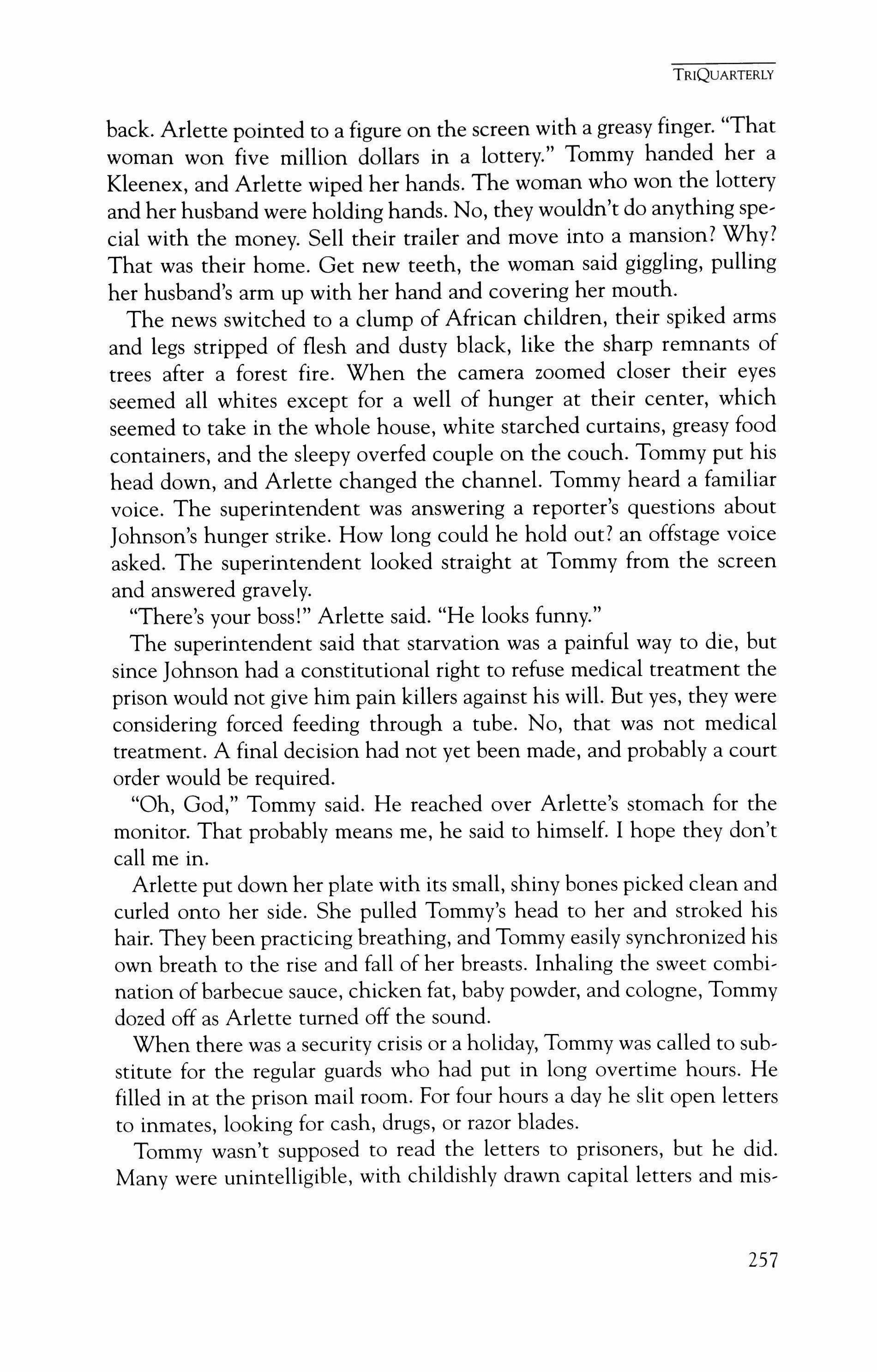
back. Arlette pointed to a figure on the screen with a greasy finger. "That woman won five million dollars in a lottery." Tommy handed her a Kleenex, and Arlette wiped her hands. The woman who won the lottery and her husband were holding hands. No, they wouldn't do anything special with the money. Sell their trailer and move into a mansion? Why? That was their home. Get new teeth, the woman said giggling, pulling her husband's arm up with her hand and covering her mouth.
The news switched to a clump of African children, their spiked arms and legs stripped of flesh and dusty black, like the sharp remnants of trees after a forest fire. When the camera zoomed closer their eyes seemed all whites except for a well of hunger at their center, which seemed to take in the whole house, white starched curtains, greasy food containers, and the sleepy overfed couple on the couch. Tommy put his head down, and Arlette changed the channel. Tommy heard a familiar voice. The superintendent was answering a reporter's questions about Johnson's hunger strike. How long could he hold out? an offstage voice asked. The superintendent looked straight at Tommy from the screen and answered gravely.
"There's your boss!" Arlette said. "He looks funny."
The superintendent said that starvation was a painful way to die, but since Johnson had a constitutional right to refuse medical treatment the prison would not give him pain killers against his will. But yes, they were considering forced feeding through a tube. No, that was not medical treatment. A final decision had not yet been made, and probably a court order would be required.
"Oh, God," Tommy said. He reached over Arlette's stomach for the monitor. That probably means me, he said to himself. I hope they don't call me in.
Arlette put down her plate with its small, shiny bones picked clean and curled onto her side. She pulled Tommy's head to her and stroked his hair. They been practicing breathing, and Tommy easily synchronized his own breath to the rise and fall of her breasts. Inhaling the sweet combination ofbarbecue sauce, chicken fat, baby powder, and cologne, Tommy dozed off as Arlette turned off the sound.
When there was a security crisis or a holiday, Tommy was called to substitute for the regular guards who had put in long overtime hours. He filled in at the prison mail room. For four hours a day he slit open letters to inmates, looking for cash, drugs, or razor blades.
Tommy wasn't supposed to read the letters to prisoners, but he did. Many were unintelligible, with childishly drawn capital letters and mis-
TRIQUARTERLY
257
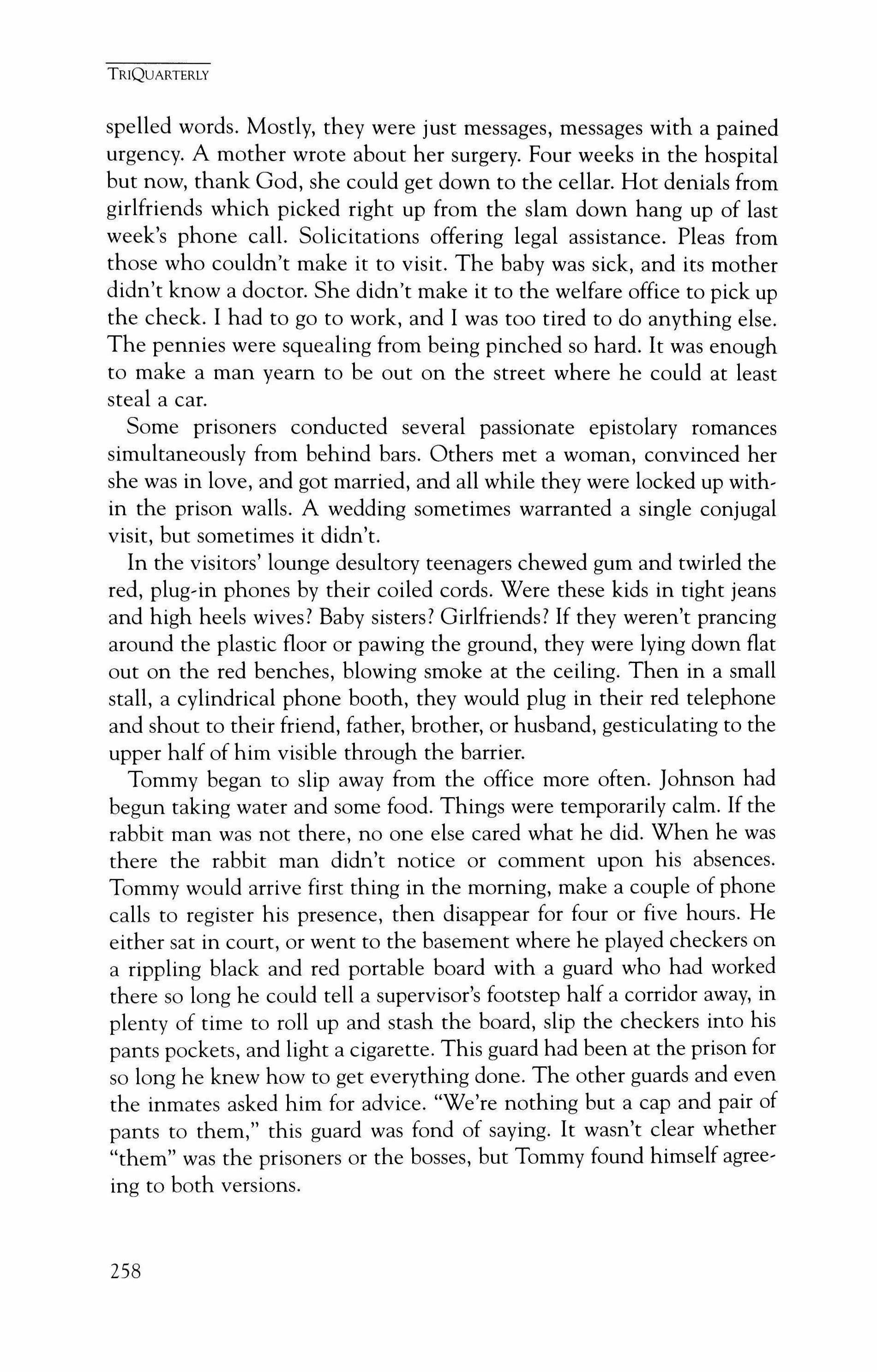
spelled words. Mostly, they were just messages, messages with a pained urgency. A mother wrote about her surgery. Four weeks in the hospital but now, thank God, she could get down to the cellar. Hot denials from girlfriends which picked right up from the slam down hang up of last week's phone call. Solicitations offering legal assistance. Pleas from those who couldn't make it to visit. The baby was sick, and its mother didn't know a doctor. She didn't make it to the welfare office to pick up the check. I had to go to work, and I was too tired to do anything else. The pennies were squealing from being pinched so hard. It was enough to make a man yearn to be out on the street where he could at least steal a car.
Some prisoners conducted several passionate epistolary romances simultaneously from behind bars. Others met a woman, convinced her she was in love, and got married, and all while they were locked up within the prison walls. A wedding sometimes warranted a single conjugal visit, but sometimes it didn't.
In the visitors' lounge desultory teenagers chewed gum and twirled the red, plug-in phones by their coiled cords. Were these kids in tight jeans and high heels wives? Baby sisters? Girlfriends? If they weren't prancing around the plastic floor or pawing the ground, they were lying down flat out on the red benches, blowing smoke at the ceiling. Then in a small stall, a cylindrical phone booth, they would plug in their red telephone and shout to their friend, father, brother, or husband, gesticulating to the upper half of him visible through the barrier.
Tommy began to slip away from the office more often. Johnson had begun taking water and some food. Things were temporarily calm. If the rabbit man was not there, no one else cared what he did. When he was there the rabbit man didn't notice or comment upon his absences. Tommy would arrive first thing in the morning, make a couple of phone calls to register his presence, then disappear for four or five hours. He either sat in court, or went to the basement where he played checkers on a rippling black and red portable board with a guard who had worked there so long he could tell a supervisor's footstep half a corridor away, in plenty of time to roll up and stash the board, slip the checkers into his pants pockets, and light a cigarette. This guard had been at the prison for so long he knew how to get everything done. The other guards and even the inmates asked him for advice. "We're nothing but a cap and pair of pants to them," this guard was fond of saying. It wasn't clear whether "them" was the prisoners or the bosses, but Tommy found himself agreeing to both versions.
TRIQUARTERLY
258

The guards hated courts, judges and lawyers. They talked about the appeals going on and on forever. They said, by the time the feds get around to the new death sentences we'll all be retired. And it was true, wasn't it? The courts seemed to have endless amounts of time for these death cases, but a civil case couldn't get a hearing. The appeals dragged on for years, with the costs multiplying exponentially, as the legal system chased its own tail. Still, Tommy was relieved it was all taking so long. Then it wasn't Tommy's problem, was it? He didn't make the decision. It was his job to run law books from Darby's cell back and forth to the library. It was Tommy's job to write in the daily log book for the CSU every time he brought a book of cases for Darby or delivered a holy message for Benjamin. His entries included the time and place: "delivered law books (three)" or "No.6 shouting, 10 P.M. to 10:45 P.M. January 31. Others yelled at him to shut up."
The rest of the prison activities revolved around the count. Three times a day all prisoners had to be counted and located. The count took over an hour, and no one, guard or prisoner, could move from one wing to another while the numbers were being called out over the loudspeaker. If there was a discrepancy in the totals for a wing or section, all the names for that wing were read out over the loudspeaker and the prisoners answered individually by their names and numbers.
The prison was old, except for the death house which had been refurbished and included the latest technical innovations in security. In the rest of the prison, the walls, the windows, and the offices were dirty and surpassingly ugly. No one was to be gratified by being here. There was not a colorful picture nor a graceful curve anywhere. The doors were opened by an old computer buried in a central control room.
The guards, most of whom had barely graduated from high school, were like the astronauts trapped in a space craft, at the mercy of the people far away. They were powerless to change the trajectory of their ship or open the doors. The control panel was crude, wooden with big red and green lights. It looked as if it had been hammered together on weekends in the prison shop, and it probably had been. Buzzers went off as the men stared out through a thick plastic bulletproof barrier. God help the guard who was taken hostage, since everyone else would be huddled in here. If the prison went up in a riot, the control room operators would be encased in a bubble, pushing buttons and sounding alarms, hoping the electricity would not be cut.
The death house was the most modem, even luxurious, part of the place. It had been rebuilt as soon as the penalty was reinstated, with
TRIQUARTERLY
259
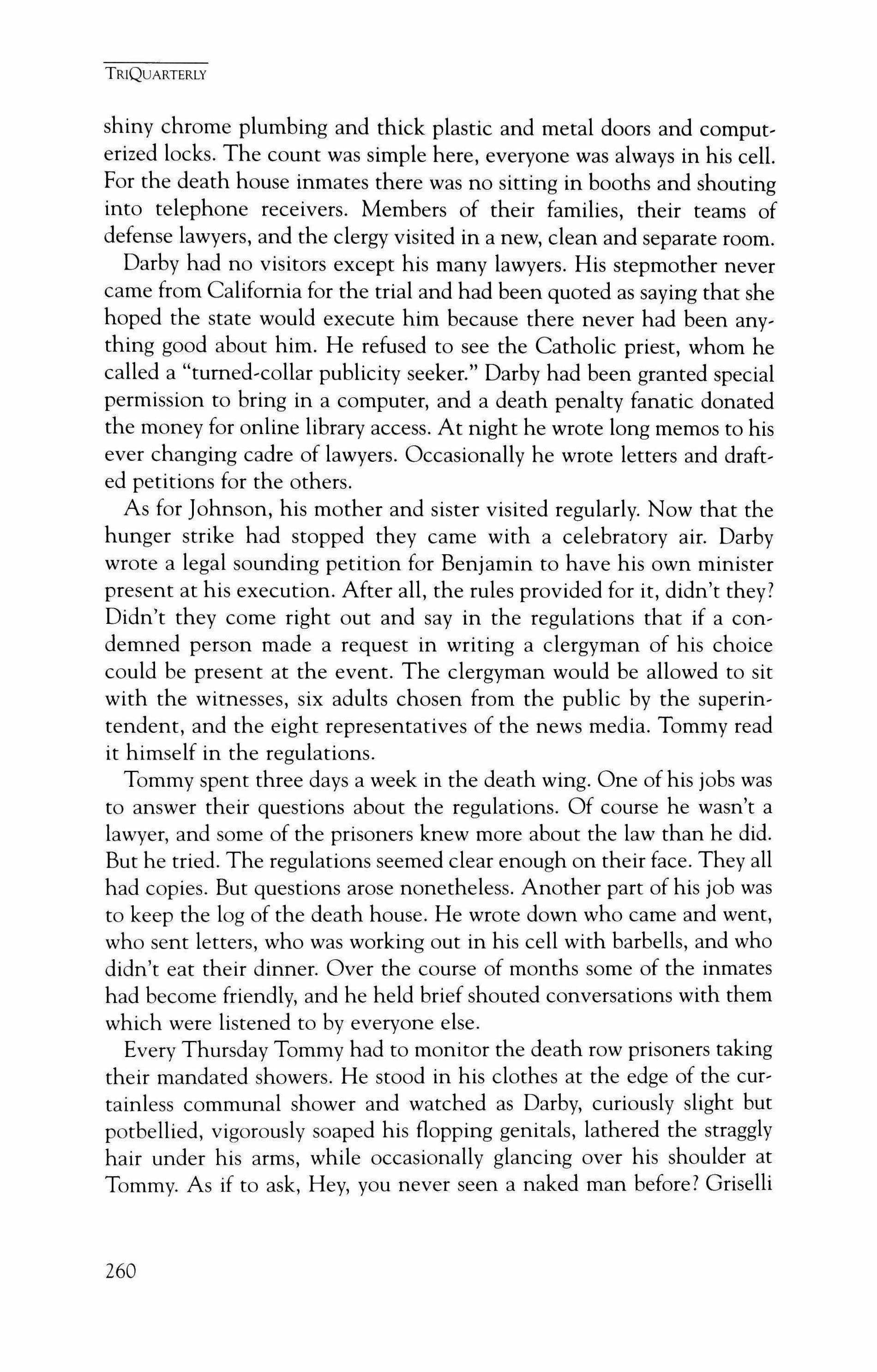
shiny chrome plumbing and thick plastic and metal doors and computerized locks. The count was simple here, everyone was always in his cell. For the death house inmates there was no sitting in booths and shouting into telephone receivers. Members of their families, their teams of defense lawyers, and the clergy visited in a new, clean and separate room.
Darby had no visitors except his many lawyers. His stepmother never came from California for the trial and had been quoted as saying that she hoped the state would execute him because there never had been any, thing good about him. He refused to see the Catholic priest, whom he called a "turned-collar publicity seeker." Darby had been granted special permission to bring in a computer, and a death penalty fanatic donated the money for online library access. At night he wrote long memos to his ever changing cadre of lawyers. Occasionally he wrote letters and draft, ed petitions for the others.
As for Johnson, his mother and sister visited regularly. Now that the hunger strike had stopped they came with a celebratory air. Darby wrote a legal sounding petition for Benjamin to have his own minister present at his execution. After all, the rules provided for it, didn't they? Didn't they come right out and say in the regulations that if a con, demned person made a request in writing a clergyman of his choice could be present at the event. The clergyman would be allowed to sit with the witnesses, six adults chosen from the public by the superin, tendent, and the eight representatives of the news media. Tommy read it himself in the regulations.
Tommy spent three days a week in the death wing. One of his jobs was to answer their questions about the regulations. Of course he wasn't a lawyer, and some of the prisoners knew more about the law than he did. But he tried. The regulations seemed clear enough on their face. They all had copies. But questions arose nonetheless. Another part of his job was to keep the log of the death house. He wrote down who came and went, who sent letters, who was working out in his cell with barbells, and who didn't eat their dinner. Over the course of months some of the inmates had become friendly, and he held brief shouted conversations with them which were listened to by everyone else.
Every Thursday Tommy had to monitor the death row prisoners taking their mandated showers. He stood in his clothes at the edge of the cur, tainless communal shower and watched as Darby, curiously slight but potbellied, vigorously soaped his flopping genitals, lathered the straggly hair under his arms, while occasionally glancing over his shoulder at Tommy. As if to ask, Hey, you never seen a naked man before? Griselli
TRIQUARTERLY
260
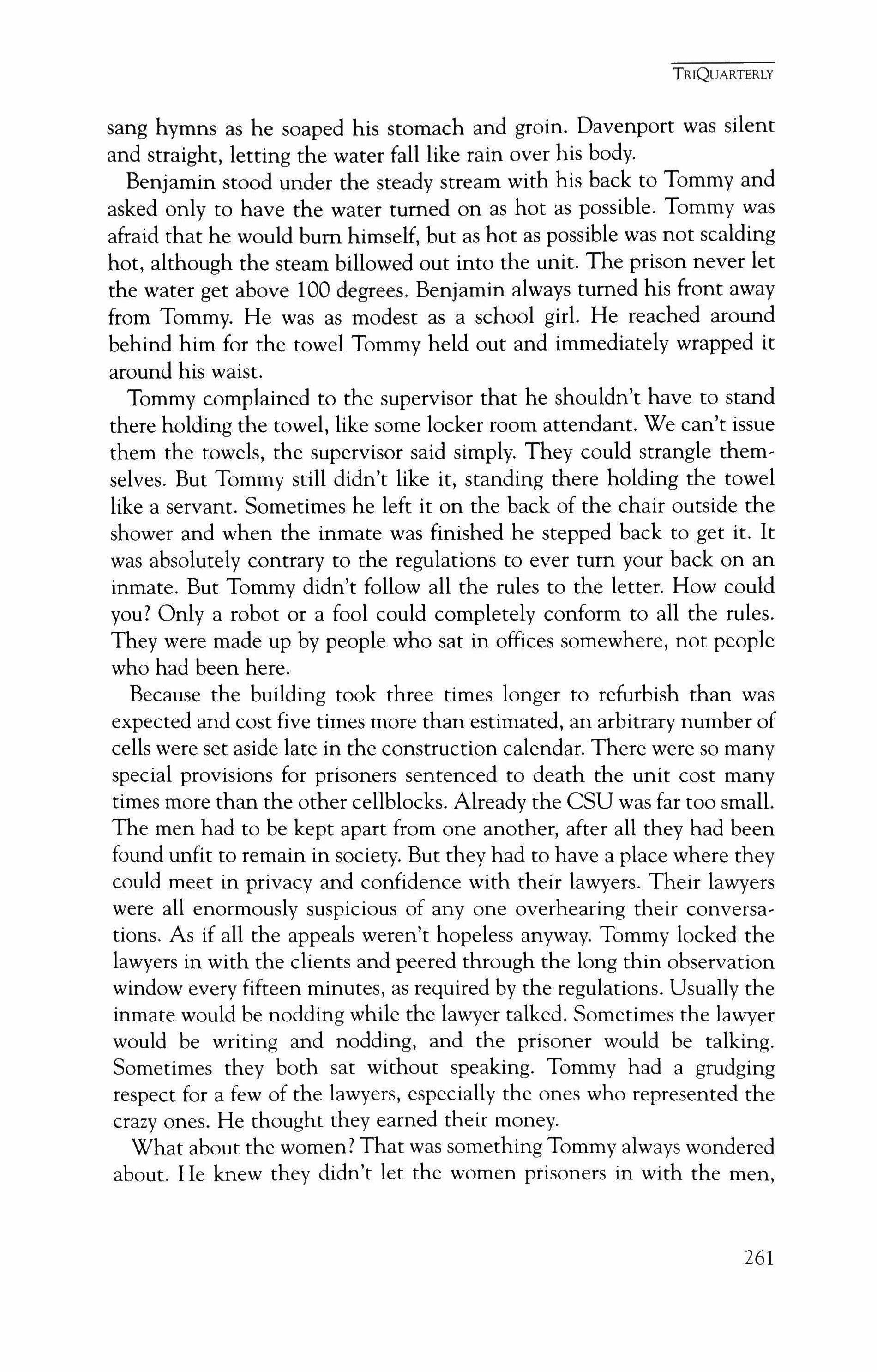
sang hymns as he soaped his stomach and groin. Davenport was silent and straight, letting the water fall like rain over his body.
Benjamin stood under the steady stream with his back to Tommy and asked only to have the water turned on as hot as possible. Tommy was afraid that he would bum himself, but as hot as possible was not scalding hot, although the steam billowed out into the unit. The prison never let the water get above 100 degrees. Benjamin always turned his front away from Tommy. He was as modest as a school girl. He reached around behind him for the towel Tommy held out and immediately wrapped it around his waist.
Tommy complained to the supervisor that he shouldn't have to stand there holding the towel, like some locker room attendant. We can't issue them the towels, the supervisor said simply. They could strangle themselves. But Tommy still didn't like it, standing there holding the towel like a servant. Sometimes he left it on the back of the chair outside the shower and when the inmate was finished he stepped back to get it. It was absolutely contrary to the regulations to ever tum your back on an inmate. But Tommy didn't follow all the rules to the letter. How could you? Only a robot or a fool could completely conform to all the rules. They were made up by people who sat in offices somewhere, not people who had been here.
Because the building took three times longer to refurbish than was expected and cost five times more than estimated, an arbitrary number of cells were set aside late in the construction calendar. There were so many special provisions for prisoners sentenced to death the unit cost many times more than the other cellblocks. Already the CSU was far too small. The men had to be kept apart from one another, after all they had been found unfit to remain in society. But they had to have a place where they could meet in privacy and confidence with their lawyers. Their lawyers were all enormously suspicious of anyone overhearing their conversations. As if all the appeals weren't hopeless anyway. Tommy locked the lawyers in with the clients and peered through the long thin observation window every fifteen minutes, as required by the regulations. Usually the inmate would be nodding while the lawyer talked. Sometimes the lawyer would be writing and nodding, and the prisoner would be talking. Sometimes they both sat without speaking. Tommy had a grudging respect for a few of the lawyers, especially the ones who represented the crazy ones. He thought they earned their money.
What about the women? That was something Tommy always wondered about. He knew they didn't let the women prisoners in with the men,
TRIQUARTERLY
261
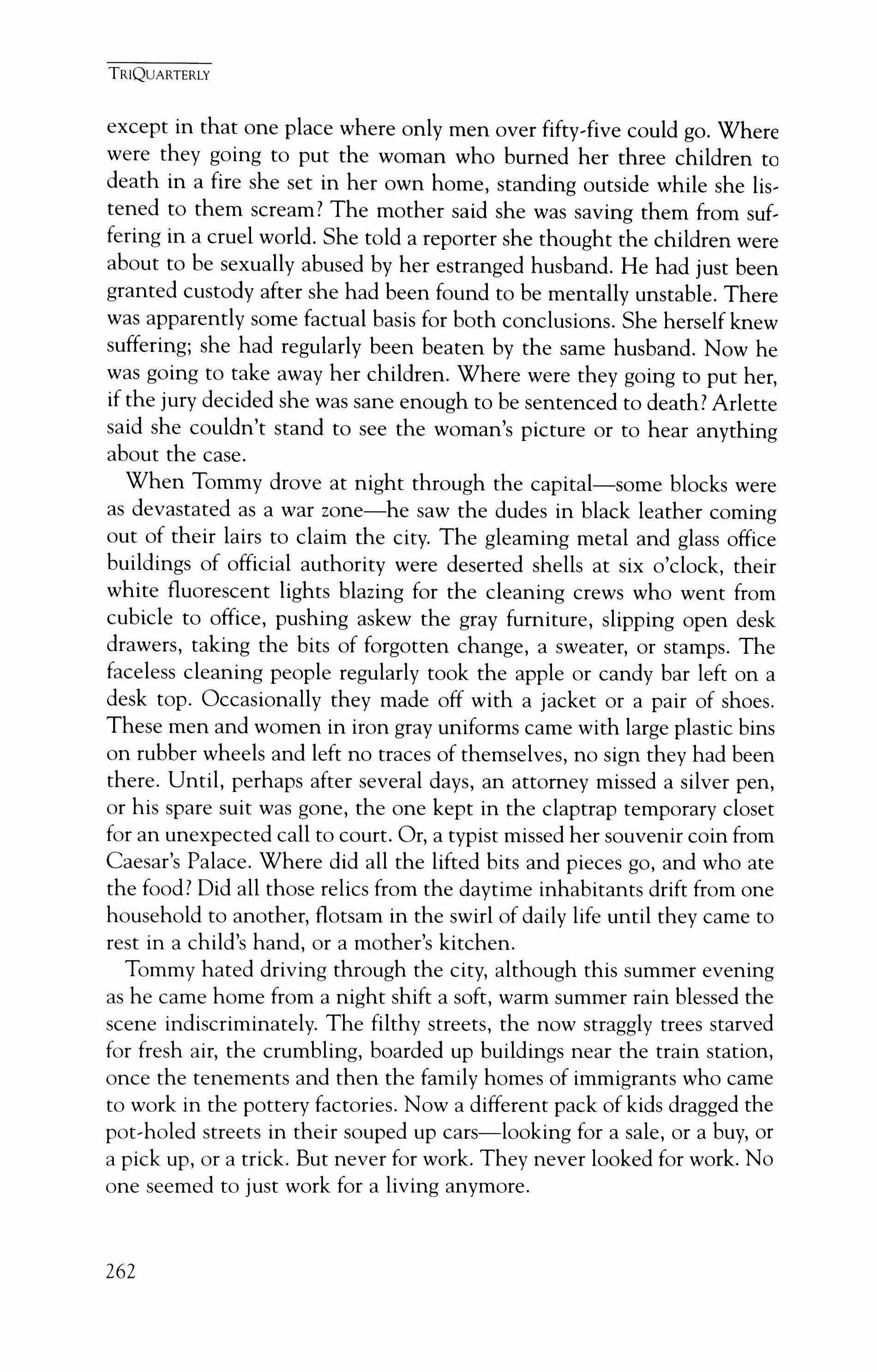
except in that one place where only men over fifty-five could go. Where were they going to put the woman who burned her three children to death in a fire she set in her own home, standing outside while she listened to them scream? The mother said she was saving them from suffering in a cruel world. She told a reporter she thought the children were about to be sexually abused by her estranged husband. He had just been granted custody after she had been found to be mentally unstable. There was apparently some factual basis for both conclusions. She herself knew suffering; she had regularly been beaten by the same husband. Now he was going to take away her children. Where were they going to put her, if the jury decided she was sane enough to be sentenced to death? Arlette said she couldn't stand to see the woman's picture or to hear anything about the case.
When Tommy drove at night through the capital-some blocks were as devastated as a war zone-he saw the dudes in black leather coming out of their lairs to claim the city. The gleaming metal and glass office buildings of official authority were deserted shells at six o'clock, their white fluorescent lights blazing for the cleaning crews who went from cubicle to office, pushing askew the gray furniture, slipping open desk drawers, taking the bits of forgotten change, a sweater, or stamps. The faceless cleaning people regularly took the apple or candy bar left on a desk top. Occasionally they made off with a jacket or a pair of shoes. These men and women in iron gray uniforms came with large plastic bins on rubber wheels and left no traces of themselves, no sign they had been there. Until, perhaps after several days, an attorney missed a silver pen, or his spare suit was gone, the one kept in the claptrap temporary closet for an unexpected call to court. Or, a typist missed her souvenir coin from Caesar's Palace. Where did all the lifted bits and pieces go, and who ate the food? Did all those relics from the daytime inhabitants drift from one household to another, flotsam in the swirl of daily life until they came to rest in a child's hand, or a mother's kitchen.
Tommy hated driving through the city, although this summer evening as he came home from a night shift a soft, warm summer rain blessed the scene indiscriminately. The filthy streets, the now straggly trees starved for fresh air, the crumbling, boarded up buildings near the train station, once the tenements and then the family homes of immigrants who came to work in the pottery factories. Now a different pack of kids dragged the pot-holed streets in their souped up cars-looking for a sale, or a buy, or a pick up, or a trick. But never for work. They never looked for work. No one seemed to just work for a living anymore.
TRIQUARTERLY
262
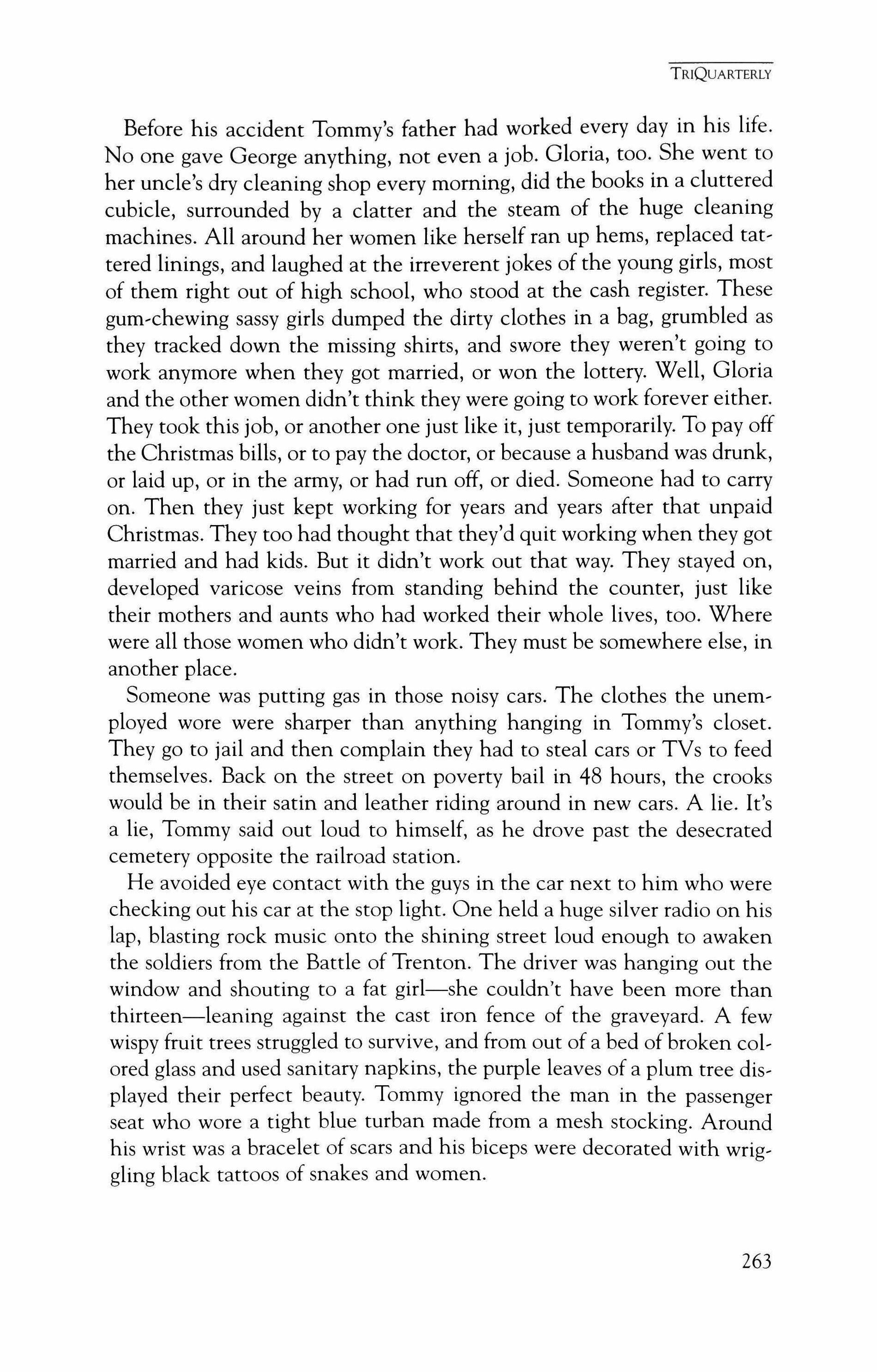
Before his accident Tommy's father had worked every day in his life. No one gave George anything, not even a job. Gloria, too. She went to her uncle's dry cleaning shop every morning, did the books in a cluttered cubicle, surrounded by a clatter and the steam of the huge cleaning machines. All around her women like herself ran up hems, replaced tat, tered linings, and laughed at the irreverent jokes of the young girls, most of them right out of high school, who stood at the cash register. These gum-chewing sassy girls dumped the dirty clothes in a bag, grumbled as they tracked down the missing shirts, and swore they weren't going to work anymore when they got married, or won the lottery. Well, Gloria and the other women didn't think they were going to work forever either. They took this job, or another one just like it, just temporarily. To payoff the Christmas bills, or to pay the doctor, or because a husband was drunk, or laid up, or in the army, or had run off, or died. Someone had to carry on. Then they just kept working for years and years after that unpaid Christmas. They too had thought that they'd quit working when they got married and had kids. But it didn't work out that way. They stayed on, developed varicose veins from standing behind the counter, just like their mothers and aunts who had worked their whole lives, too. Where were all those women who didn't work. They must be somewhere else, in another place.
Someone was putting gas in those noisy cars. The clothes the unernployed wore were sharper than anything hanging in Tommy's closet. They go to jail and then complain they had to steal cars or TVs to feed themselves. Back on the street on poverty bail in 48 hours, the crooks would be in their satin and leather riding around in new cars. A lie. It's a lie, Tommy said out loud to himself, as he drove past the desecrated cemetery opposite the railroad station.
He avoided eye contact with the guys in the car next to him who were checking out his car at the stop light. One held a huge silver radio on his lap, blasting rock music onto the shining street loud enough to awaken the soldiers from the Battle of Trenton. The driver was hanging out the window and shouting to a fat girl-she couldn't have been more than thirteen-leaning against the cast iron fence of the graveyard. A few wispy fruit trees struggled to survive, and from out of a bed of broken colored glass and used sanitary napkins, the purple leaves of a plum tree displayed their perfect beauty. Tommy ignored the man in the passenger seat who wore a tight blue turban made from a mesh stocking. Around his wrist was a bracelet of scars and his biceps were decorated with wriggling black tattoos of snakes and women.
TRIQUARTERLY
263
TRIQUARTERLY
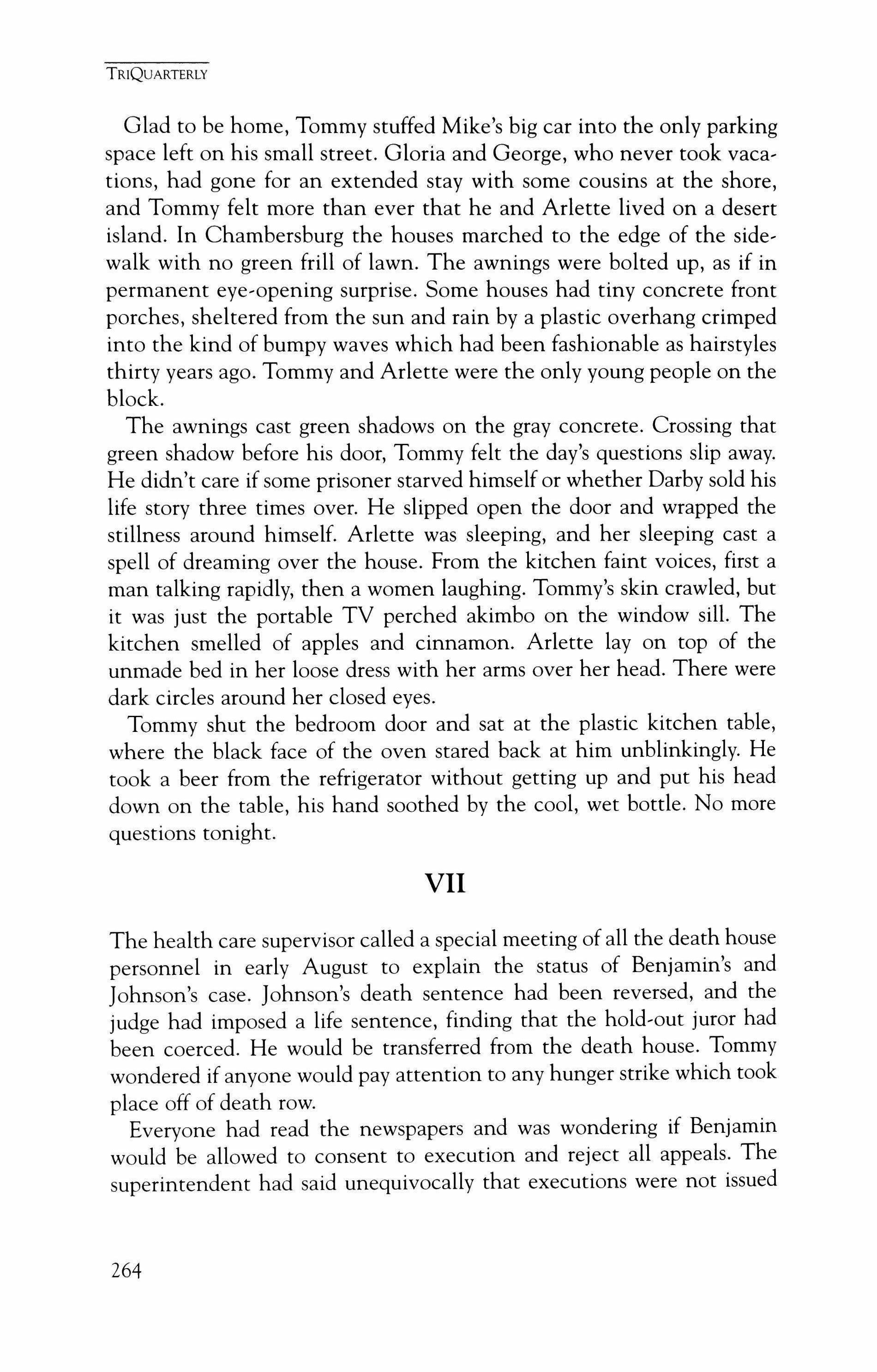
Glad to be home, Tommy stuffed Mike's big car into the only parking space left on his small street. Gloria and George, who never took vacations, had gone for an extended stay with some cousins at the shore, and Tommy felt more than ever that he and Arlette lived on a desert island. In Chambersburg the houses marched to the edge of the sidewalk with no green frill of lawn. The awnings were bolted up, as if in permanent eye-opening surprise. Some houses had tiny concrete front porches, sheltered from the sun and rain by a plastic overhang crimped into the kind of bumpy waves which had been fashionable as hairstyles thirty years ago. Tommy and Arlette were the only young people on the block.
The awnings cast green shadows on the gray concrete. Crossing that green shadow before his door, Tommy felt the day's questions slip away. He didn't care if some prisoner starved himself or whether Darby sold his life story three times over. He slipped open the door and wrapped the stillness around himself. Arlette was sleeping, and her sleeping cast a spell of dreaming over the house. From the kitchen faint voices, first a man talking rapidly, then a women laughing. Tommy's skin crawled, but it was just the portable TV perched akimbo on the window sill. The kitchen smelled of apples and cinnamon. Arlette lay on top of the unmade bed in her loose dress with her arms over her head. There were dark circles around her closed eyes.
Tommy shut the bedroom door and sat at the plastic kitchen table, where the black face of the oven stared back at him unblinkingly. He took a beer from the refrigerator without getting up and put his head down on the table, his hand soothed by the cool, wet bottle. No more questions tonight.
VII
The health care supervisor called a special meeting of all the death house personnel in early August to explain the status of Benjamin's and Johnson's case. Johnson's death sentence had been reversed, and the judge had imposed a life sentence, finding that the hold-out juror had been coerced. He would be transferred from the death house. Tommy wondered if anyone would pay attention to any hunger strike which took place off of death row.
Everyone had read the newspapers and was wondering if Benjamin would be allowed to consent to execution and reject all appeals. The superintendent had said unequivocally that executions were not issued
264
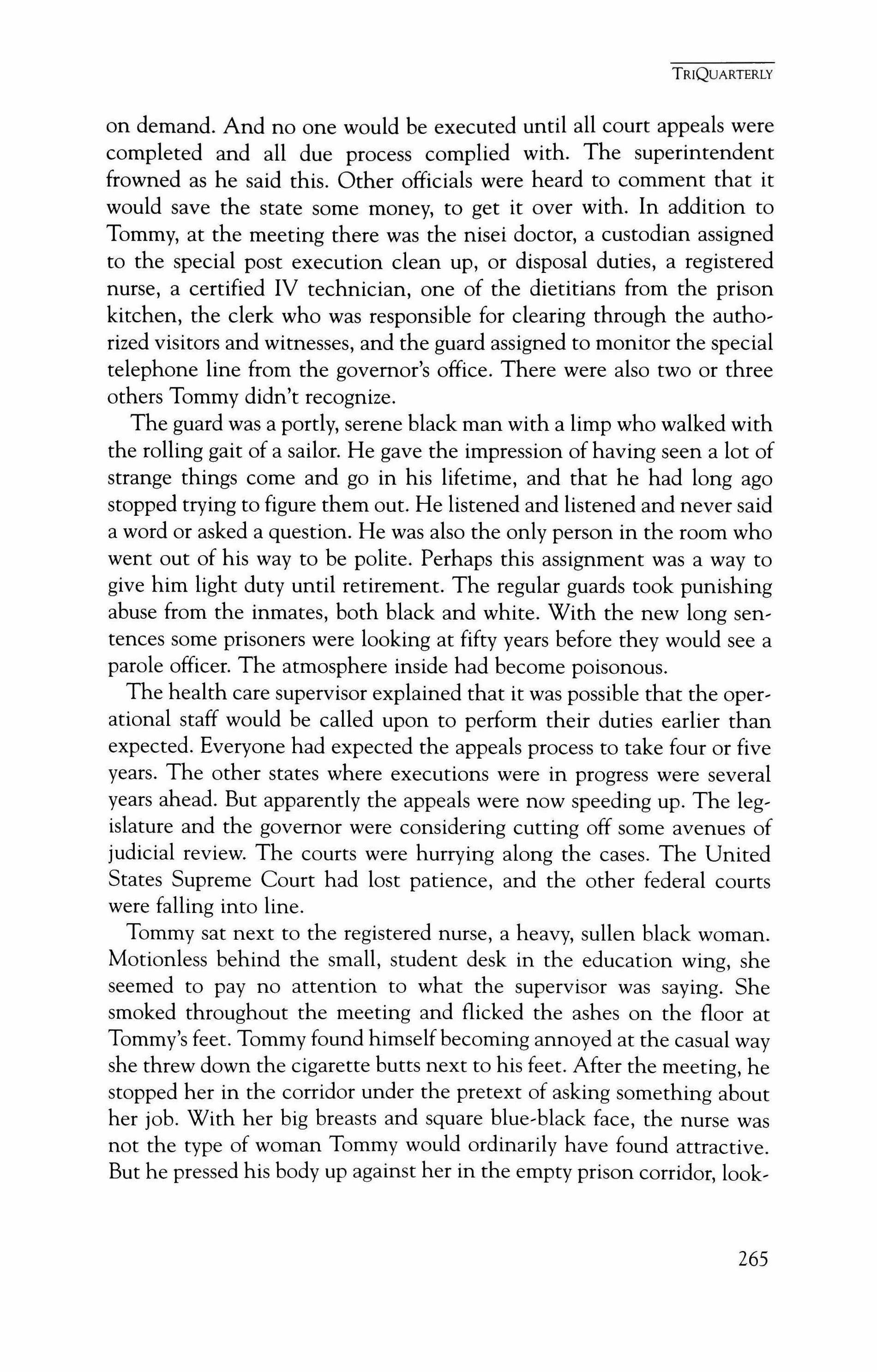
on demand. And no one would be executed until all court appeals were completed and all due process complied with. The superintendent frowned as he said this. Other officials were heard to comment that it would save the state some money, to get it over with. In addition to Tommy, at the meeting there was the nisei doctor, a custodian assigned to the special post execution clean up, or disposal duties, a registered nurse, a certified IV technician, one of the dietitians from the prison kitchen, the clerk who was responsible for clearing through the authorized visitors and witnesses, and the guard assigned to monitor the special telephone line from the governor's office. There were also two or three others Tommy didn't recognize.
The guard was a portly, serene black man with a limp who walked with the rolling gait of a sailor. He gave the impression of having seen a lot of strange things come and go in his lifetime, and that he had long ago stopped trying to figure them out. He listened and listened and never said a word or asked a question. He was also the only person in the room who went out of his way to be polite. Perhaps this assignment was a way to give him light duty until retirement. The regular guards took punishing abuse from the inmates, both black and white. With the new long sentences some prisoners were looking at fifty years before they would see a parole officer. The atmosphere inside had become poisonous.
The health care supervisor explained that it was possible that the operational staff would be called upon to perform their duties earlier than expected. Everyone had expected the appeals process to take four or five years. The other states where executions were in progress were several years ahead. But apparently the appeals were now speeding up. The legislature and the governor were considering cutting off some avenues of judicial review. The courts were hurrying along the cases. The United States Supreme Court had lost patience, and the other federal courts were falling into line.
Tommy sat next to the registered nurse, a heavy, sullen black woman. Motionless behind the small, student desk in the education wing, she seemed to pay no attention to what the supervisor was saying. She smoked throughout the meeting and flicked the ashes on the floor at Tommy's feet. Tommy found himself becoming annoyed at the casual way she threw down the cigarette butts next to his feet. After the meeting, he stopped her in the corridor under the pretext of asking something about her job. With her big breasts and square blue-black face, the nurse was not the type of woman Tommy would ordinarily have found attractive. But he pressed his body up against her in the empty prison corridor, look-
TRIQUARTERLY
265

ing around furtively to make sure no office doors were open and no legs appeared down the hall.
The nurse looked up at him with large dark eyes, first surprised, then with hatred. She rubbed herself against him painfully and then turned and sauntered away down the corridor, showing him her thick back and broad behind. Tommy didn't even know her name, but he remained in a state of excitement all day. When he came home he shouted at Arlette, even though she had gotten out of bed especially to prepare him a favorite dinner: pork chops, fresh com, and sliced beefsteak tomatoes interlocked with rings of red Bermuda onion. She had even cooked Tommy a lemon meringue pie. This day had been an active day for her. Tommy forgot what was like to be unemployed, not to have anywhere to go in the morning. The rhythm of work made the weeks fly. Tommy liked coming to work, and he no longer thought about Alaska. He didn't even miss his old friend Ants any more. Preparations for the rehearsal had begun. The health care supervisor wanted to do a dry run of the procedures. Not that anything was imminent. But just to be prepared. To make sure all the personnel were in place and everyone knew what to do. Mostly, it was waiting. Waiting for someone else to make a decision. Waiting for the last tum down from the last court. Waiting for the phone call from the governor which would not come, waiting for the condemned to be wheeled in, waiting for the signal to give the injection. The whole process was nothing more than one big wait. Tommy was being paid thousands of dollars to wait to do an act which would take a few seconds, at most. Killing took so little time, especially in comparison to saving life. It was a lot easier. The pages of regulations, the special staff with their functions described in high flying, obfuscating language, the supposedly elaborate equipment and the specially designated facilities were a bureaucratic smoke screen. What was to be done was really very simple. It was the pretense that it was something other than simple which was complicated and hard to understand. Why bother? Why not just say what it was?
As if the institution wasn't in enough of a tiZZY, the sentencing of Enrico Ruiz, the Hispanic who raped and murdered two teenagers, was causing additional confusion. The Department of Prisons said they couldn't put him on death row because a regulation said that a person under 21 could not be confined with adult inmates. But another regulation required all persons sentenced to death to be confined together in that special section of the prison set aside for them. The others sentenced to death were necessarily adults, weren't they? There were rumors that
TRIQUARTERLY
266
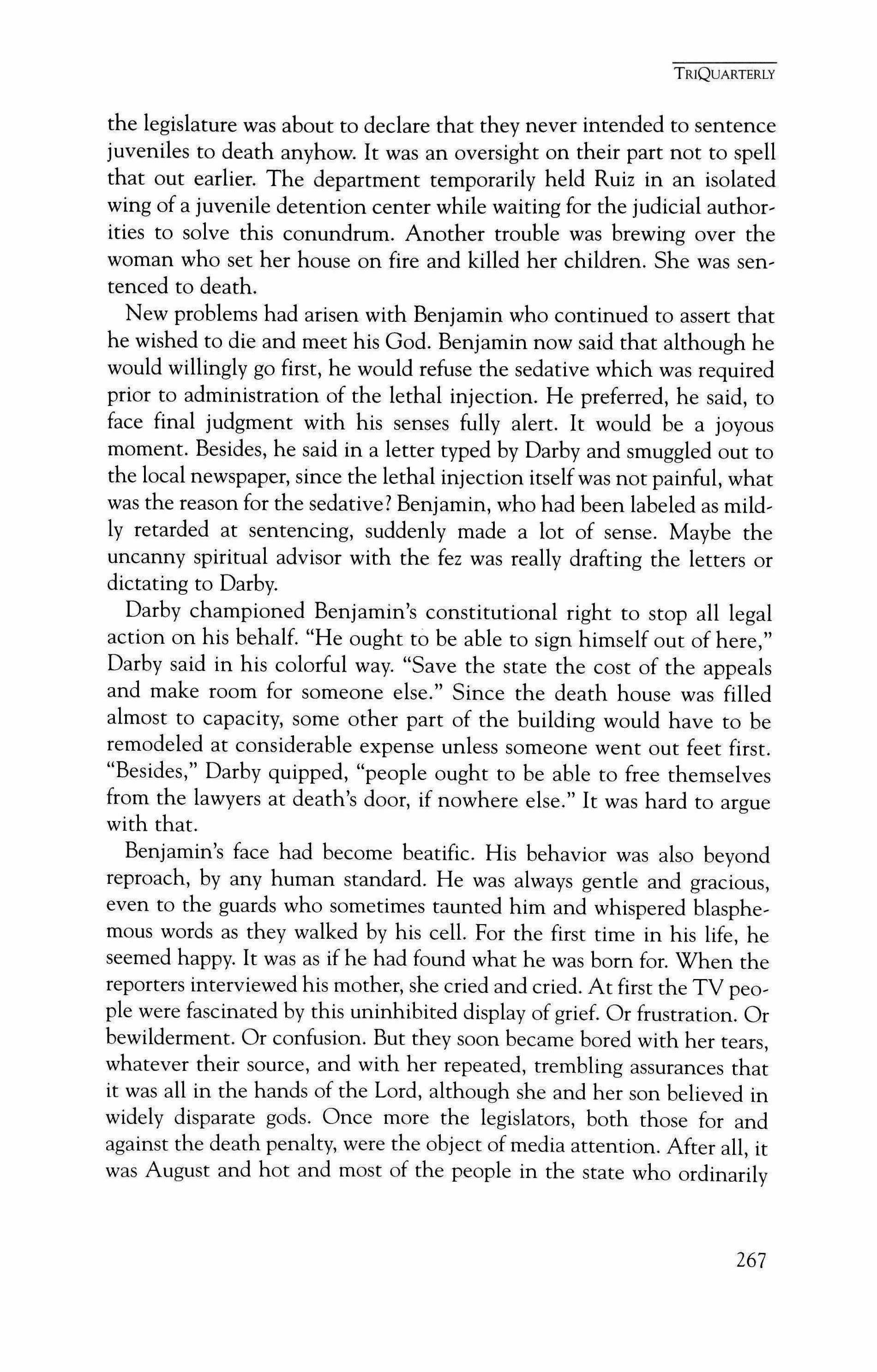
the legislature was about to declare that they never intended to sentence juveniles to death anyhow. It was an oversight on their part not to spell that out earlier. The department temporarily held Ruiz in an isolated wing of a juvenile detention center while waiting for the judicial authorities to solve this conundrum. Another trouble was brewing over the woman who set her house on fire and killed her children. She was sentenced to death.
New problems had arisen with Benjamin who continued to assert that he wished to die and meet his God. Benjamin now said that although he would willingly go first, he would refuse the sedative which was required prior to administration of the lethal injection. He preferred, he said, to face final judgment with his senses fully alert. It would be a joyous moment. Besides, he said in a letter typed by Darby and smuggled out to the local newspaper, since the lethal injection itself was not painful, what was the reason for the sedative? Benjamin, who had been labeled as mildly retarded at sentencing, suddenly made a lot of sense. Maybe the uncanny spiritual advisor with the fez was really drafting the letters or dictating to Darby.
Darby championed Benjamin's constitutional right to stop all legal action on his behalf. "He ought to be able to sign himself out of here," Darby said in his colorful way. "Save the state the cost of the appeals and make room for someone else." Since the death house was filled almost to capacity, some other part of the building would have to be remodeled at considerable expense unless someone went out feet first. "Besides," Darby quipped, "people ought to be able to free themselves from the lawyers at death's door, if nowhere else." It was hard to argue with that.
Benjamin's face had become beatific. His behavior was also beyond reproach, by any human standard. He was always gentle and gracious, even to the guards who sometimes taunted him and whispered blasphemous words as they walked by his cell. For the first time in his life, he seemed happy. It was as if he had found what he was born for. When the reporters interviewed his mother, she cried and cried. At first the TV people were fascinated by this uninhibited display of grief. Or frustration. Or bewilderment. Or confusion. But they soon became bored with her tears, whatever their source, and with her repeated, trembling assurances that it was all in the hands of the Lord, although she and her son believed in widely disparate gods. Once more the legislators, both those for and against the death penalty, were the object of media attention. After all, it was August and hot and most of the people in the state who ordinarily
TRIQUARTERLY
267
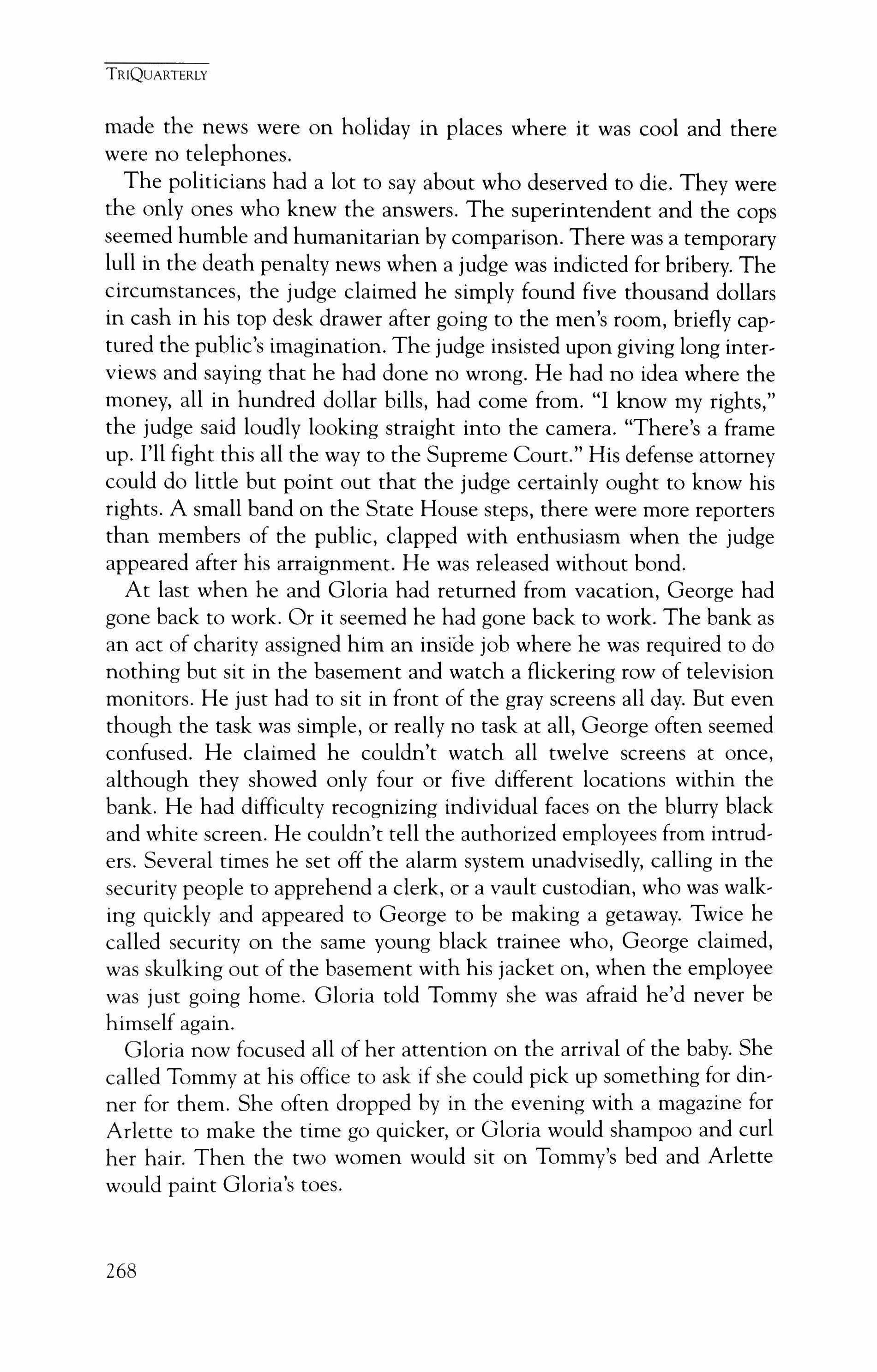
made the news were on holiday in places where it was cool and there were no telephones.
The politicians had a lot to say about who deserved to die. They were the only ones who knew the answers. The superintendent and the cops seemed humble and humanitarian by comparison. There was a temporary lull in the death penalty news when a judge was indicted for bribery. The circumstances, the judge claimed he simply found five thousand dollars in cash in his top desk drawer after going to the men's room, briefly captured the public's imagination. The judge insisted upon giving long interviews and saying that he had done no wrong. He had no idea where the money, all in hundred dollar bills, had come from. "I know my rights," the judge said loudly looking straight into the camera. "There's a frame up. I'll fight this all the way to the Supreme Court." His defense attorney could do little but point out that the judge certainly ought to know his rights. A small band on the State House steps, there were more reporters than members of the public, clapped with enthusiasm when the judge appeared after his arraignment. He was released without bond.
At last when he and Gloria had returned from vacation, George had gone back to work. Or it seemed he had gone back to work. The bank as an act of charity assigned him an inside job where he was required to do nothing but sit in the basement and watch a flickering row of television monitors. He just had to sit in front of the gray screens all day. But even though the task was simple, or really no task at all, George often seemed confused. He claimed he couldn't watch all twelve screens at once, although they showed only four or five different locations within the bank. He had difficulty recognizing individual faces on the blurry black and white screen. He couldn't tell the authorized employees from intruders. Several times he set off the alarm system unadvisedly, calling in the security people to apprehend a clerk, or a vault custodian, who was walking quickly and appeared to George to be making a getaway. Twice he called security on the same young black trainee who, George claimed, was skulking out of the basement with his jacket on, when the employee was just going home. Gloria told Tommy she was afraid he'd never be himself again.
Gloria now focused all of her attention on the arrival of the baby. She called Tommy at his office to ask if she could pick up something for dinner for them. She often dropped by in the evening with a magazine for Arlette to make the time go quicker, or Gloria would shampoo and curl her hair. Then the two women would sit on Tommy's bed and Arlette would paint Gloria's toes.
TRIQUARTERLY
268

Now Tommy could honestly say he was too busy to talk to his mother when she called him at the office. He stomped his feet under the desk and told Gloria that he could hear his boss was coming, and he had to hang up. Once Gloria called when the nurse was in the office and Tommy had locked the door. They were drinking some rum Tommy brought in. "Who's that with you?" Gloria asked, when she heard the woman's low laugh. "Who are you talking to?"
Tommy said that it was probably better if she didn't call him any more at the office. "I'll see you Sunday, Ma," he said. "Did you play my number today?" Certainly Gloria was the only person who ever asked what he did at work.
Tommy rarely saw Anthony who had moved into an apartment with Julia, over the hysterical objections of her father. Ants was planning to go get a job, even it was only at minimum wage, in the town where Julia was going to college. Anthony still worked three days a week at the Polish butcher shop, but neither his father nor his uncle spoke to him. They paid him his wages in cash without a word. The only person who would talk to him at the family butcher shop was Ginny, his seventeenyear-old cousin. She was more in love with him than ever since he let his hair grow and started riding around on the motorcycle.
Ants asked Tommy for tips on how to find a job in a new city. Tommy had to laugh. "Remember me?" he felt like saying, "I was unemployed for six months." But instead, he told Ants, "Just keep showing up at the unemployment office. In a college town, there will be work."
Anthony nodded grimly and asked Tommy if he could come and stay for a few days while Julia went home to get her clothes ready for college. He also asked if he could take Tommy's only dark suit.
Johnson had resumed his hunger strike. A ruling came down to force feed him. Now a lawsuit was started challenging the legality of the forced feeding. He had to recover his strength. Since he wasn't now under a sentence of death, no one had much interest in whether he wanted to live or die. Johnson himself was characteristically philosophical about the new ruling. He believed he would be sentenced to death again, at some other legal proceeding, even though the imposition of the life sentence could not be appealed. He said he wouldn't resist the forced feeding, even though he knew the process was painful, tortuous even. He was quoted as saying that he was sure the state would soon see the error of its ways and stop feeding and keeping him alive against his will.
The spiritual advisor said he was going to pray for the Supreme Court to be enlightened by the Divine Spirit and lift the order. One of
TRIQUARTERLY
269
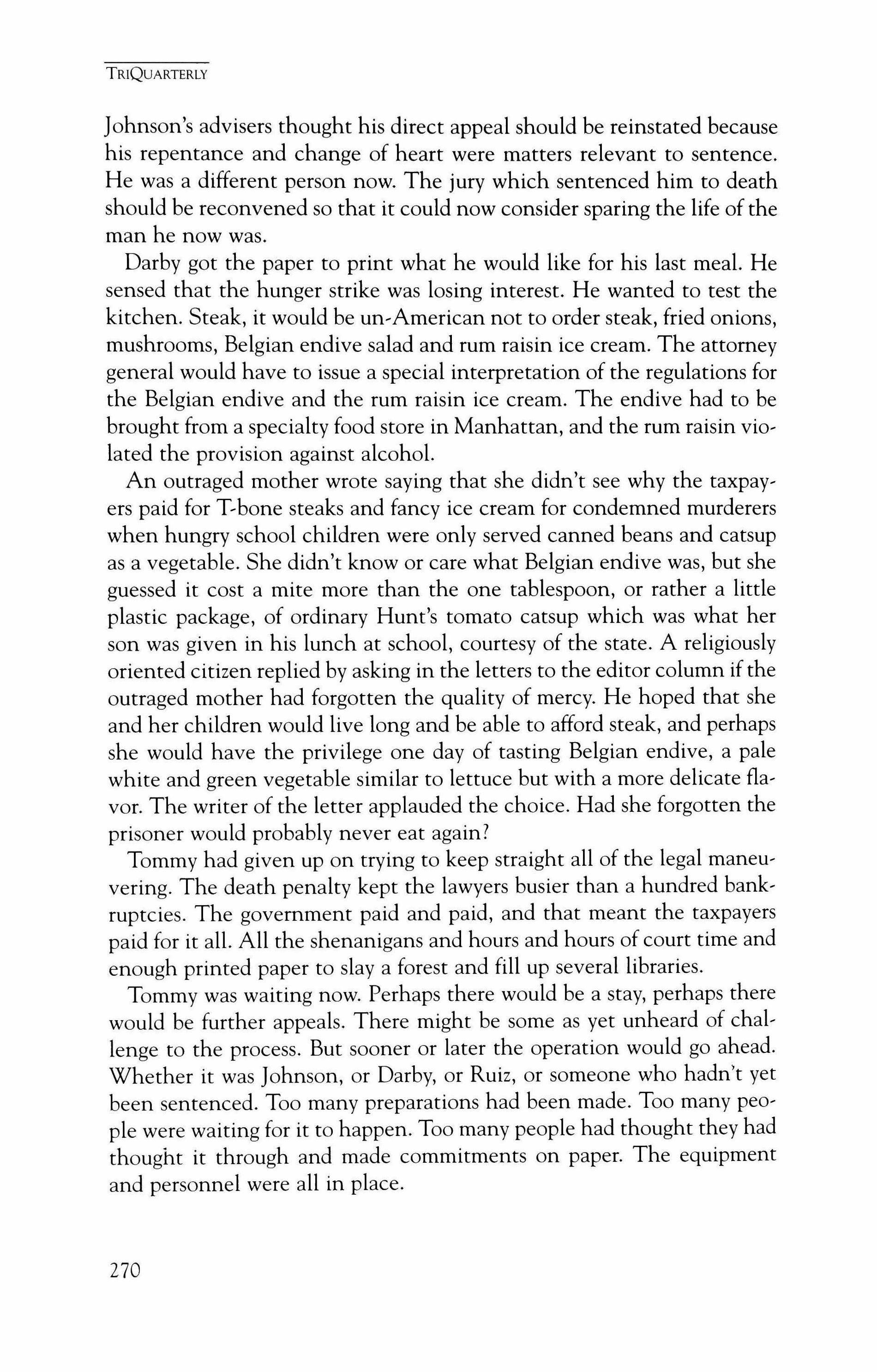
Johnson's advisers thought his direct appeal should be reinstated because his repentance and change of heart were matters relevant to sentence. He was a different person now. The jury which sentenced him to death should be reconvened so that it could now consider sparing the life of the man he now was.
Darby got the paper to print what he would like for his last meal. He sensed that the hunger strike was losing interest. He wanted to test the kitchen. Steak, it would be uri-American not to order steak, fried onions, mushrooms, Belgian endive salad and rum raisin ice cream. The attorney general would have to issue a special interpretation of the regulations for the Belgian endive and the rum raisin ice cream. The endive had to be brought from a specialty food store in Manhattan, and the rum raisin violated the provision against alcohol.
An outraged mother wrote saying that she didn't see why the taxpayers paid for 'Tbone steaks and fancy ice cream for condemned murderers when hungry school children were only served canned beans and catsup as a vegetable. She didn't know or care what Belgian endive was, but she guessed it cost a mite more than the one tablespoon, or rather a little plastic package, of ordinary Hunt's tomato catsup which was what her son was given in his lunch at school, courtesy of the state. A religiously oriented citizen replied by asking in the letters to the editor column ifthe outraged mother had forgotten the quality of mercy. He hoped that she and her children would live long and be able to afford steak, and perhaps she would have the privilege one day of tasting Belgian endive, a pale white and green vegetable similar to lettuce but with a more delicate flavor. The writer of the letter applauded the choice. Had she forgotten the prisoner would probably never eat again?
Tommy had given up on trying to keep straight all of the legal maneuvering. The death penalty kept the lawyers busier than a hundred bankruptcies. The government paid and paid, and that meant the taxpayers paid for it all. All the shenanigans and hours and hours of court time and enough printed paper to slay a forest and fill up several libraries.
Tommy was waiting now. Perhaps there would be a stay, perhaps there would be further appeals. There might be some as yet unheard of challenge to the process. But sooner or later the operation would go ahead. Whether it was Johnson, or Darby, or Ruiz, or someone who hadn't yet been sentenced. Too many preparations had been made. Too many people were waiting for it to happen. Too many people had thought they had thought it through and made commitments on paper. The equipment and personnel were all in place.
TRIQUARTERLY
270
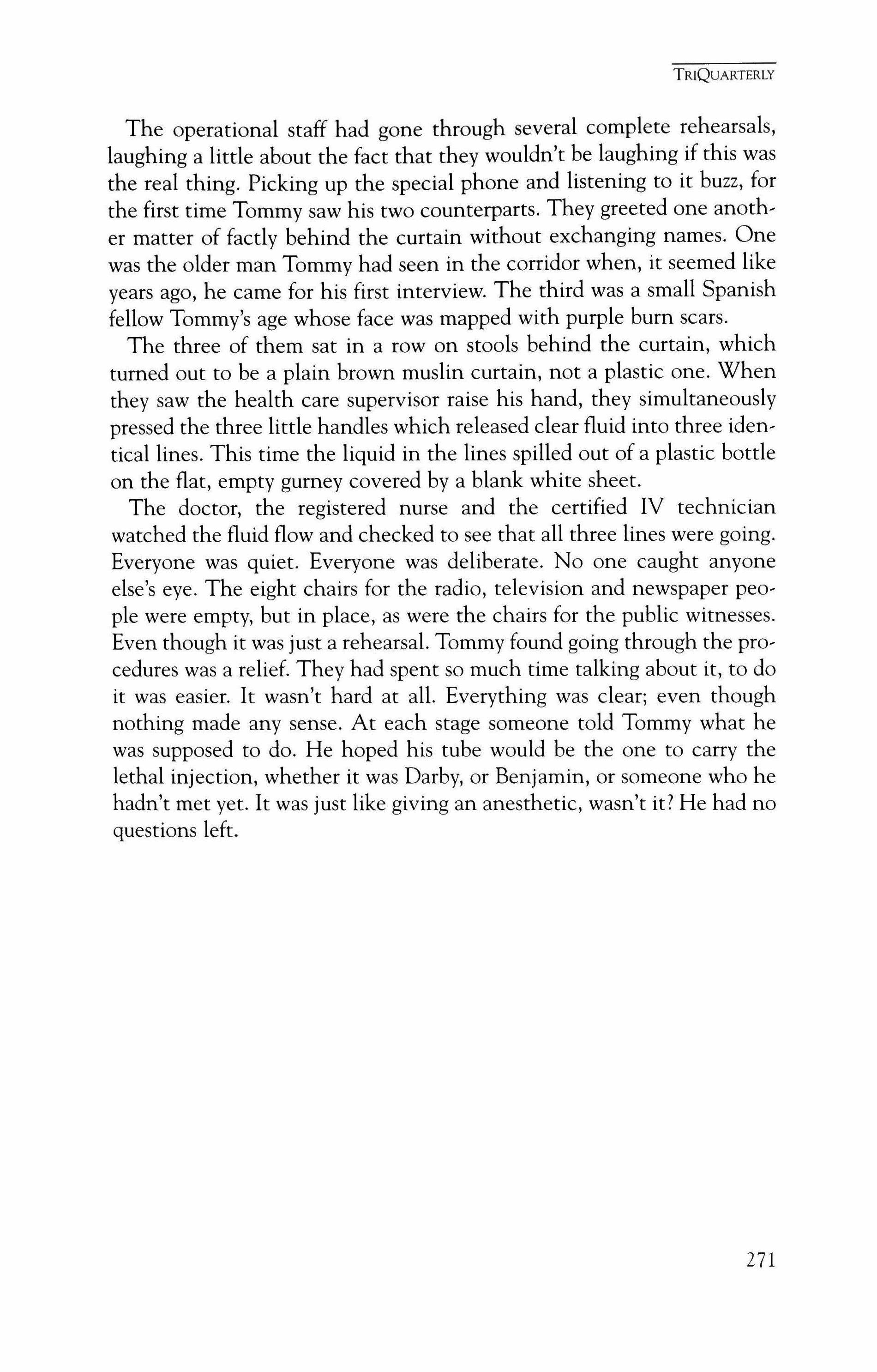
The operational staff had gone through several complete rehearsals, laughing a little about the fact that they wouldn't be laughing if this was the real thing. Picking up the special phone and listening to it buzz, for the first time Tommy saw his two counterparts. They greeted one another matter of factly behind the curtain without exchanging names. One was the older man Tommy had seen in the corridor when, it seemed like years ago, he came for his first interview. The third was a small Spanish fellow Tommy's age whose face was mapped with purple bum scars.
The three of them sat in a row on stools behind the curtain, which turned out to be a plain brown muslin curtain, not a plastic one. When they saw the health care supervisor raise his hand, they simultaneously pressed the three little handles which released clear fluid into three identical lines. This time the liquid in the lines spilled out of a plastic bottle on the flat, empty gurney covered by a blank white sheet.
The doctor, the registered nurse and the certified IV technician watched the fluid flow and checked to see that all three lines were going. Everyone was quiet. Everyone was deliberate. No one caught anyone else's eye. The eight chairs for the radio, television and newspaper people were empty, but in place, as were the chairs for the public witnesses. Even though it was just a rehearsal. Tommy found going through the procedures was a relief. They had spent so much time talking about it, to do it was easier. It wasn't hard at all. Everything was clear; even though nothing made any sense. At each stage someone told Tommy what he was supposed to do. He hoped his tube would be the one to carry the lethal injection, whether it was Darby, or Benjamin, or someone who he hadn't met yet. It was just like giving an anesthetic, wasn't it? He had no questions left.
TRIQUARTERLY
271
Contributors
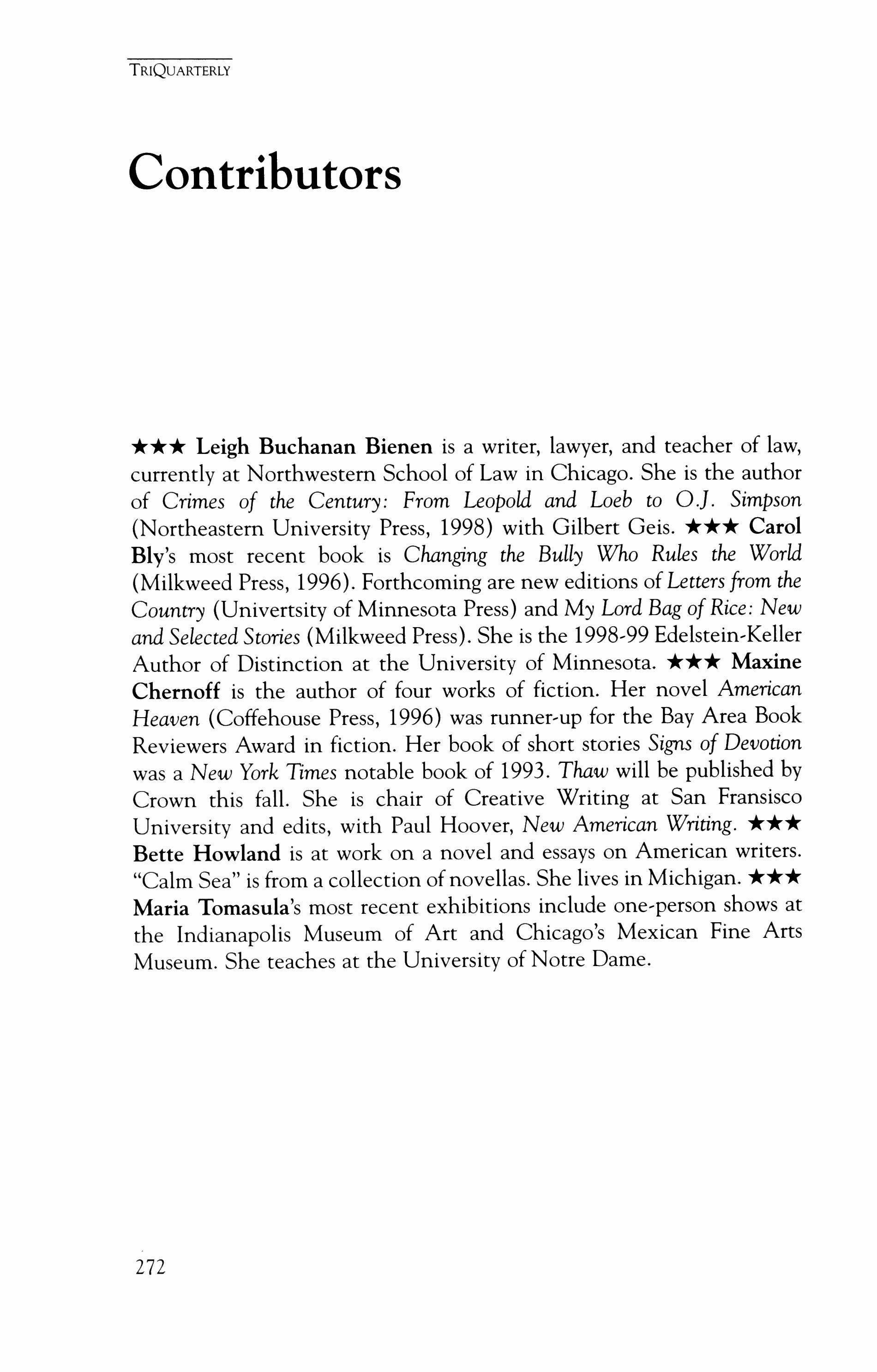
*** Leigh Buchanan Bienen is a writer, lawyer, and teacher of law, currently at Northwestern School of Law in Chicago. She is the author of Crimes of the Century: From Leopold and Loeb to 0.]. Simpson (Northeastern University Press, 1998) with Gilbert Geis. *** Carol Bly's most recent book is Changing the Bully Who Rules the World (Milkweed Press, 1996). Forthcoming are new editions of Letters from the Country (Univertsity of Minnesota Press) and My Lord Bag of Rice: New and Selected Stories (Milkweed Press). She is the 1998,99 Edelstein-Keller Author of Distinction at the University of Minnesota. *** Maxine Chernoff is the author of four works of fiction. Her novel American Heaven (Coffehouse Press, 1996) was runner-up for the Bay Area Book Reviewers Award in fiction. Her book of short stories Signs of Devotion was a New York Times notable book of 1993. Thaw will be published by Crown this fall. She is chair of Creative Writing at San Fransisco University and edits, with Paul Hoover, New American Writing. *** Bette Howland is at work on a novel and essays on American writers. "Calm Sea" is from a collection of novellas. She lives in Michigan. *** Maria Tomasula's most recent exhibitions include one-person shows at the Indianapolis Museum of Art and Chicago's Mexican Fine Arts Museum. She teaches at the University of Notre Dame.
TRIQUARTERLY
272
Indiana University Writers' Conference
Catherine Bowman
Rodney Jones
Allison Joseph
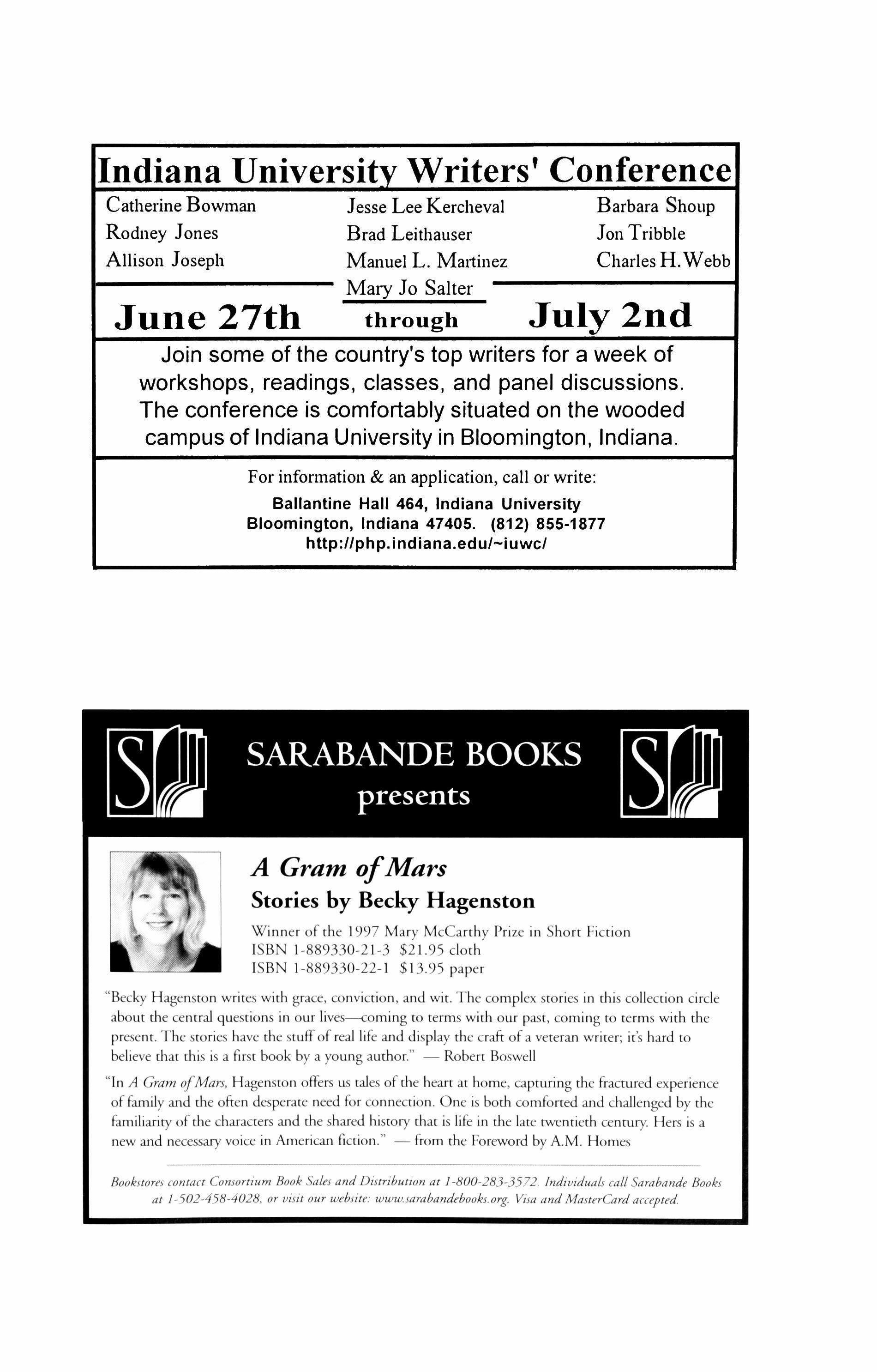
Jesse Lee Kercheval
Brad Leithauser
Manuel L. Martinez
Mary Jo Salter
Barbara Shoup
Jon Tribble
Charles H.Webb
June 27th through July 2nd
Join some of the country's top writers for a week of workshops, readings, classes, and panel discussions. The conference is comfortably situated on the wooded campus of Indiana University in Bloomington, Indiana.
For information & an application, call or write:
Ballantine Hall 464, Indiana University Bloomington, Indiana 47405. (812) 855-1877 http://php.indiana.edu/-iuwc/
A Gram ofMars Stories by Becky Hagenston
Winner of the 1997 Mary McCarthy Prize in Short Fiction
ISBN 1-889330-21-3 $21.95 cloth
ISBN 1-889330-22-1 $13.95 paper
"Becky Hagensron writes with grace, conviction, and wit. The complex stories in this collection circle about me central questions in our lives--coming to terms with our past, coming to terms with the present. The stories have me stuff of real life and display the craft of a veteran writer; it's hard to believe mat this is a first book by a young author." - Robert Boswell
"In A Gram ofMars, Hagensron offers us tales of the heart at home, capturing me fractured experience of family and me often desperate need for connection. One is born comforted and challenged by me familiarity of me characters and the shared history that is life in me late twentieth century. Hers is a new and necessary voice in American fiction." - from me Foreword by A.M. Homes
Bookstores contact Consortium Book Sales and Distribution at 1-800-283-3572. Individuals caLI Sarabande Books at 1-502-458-4028, or visit our website: www.sarabandebooks.org. Visa and MasterCard accepted.





















































































































































































































































































